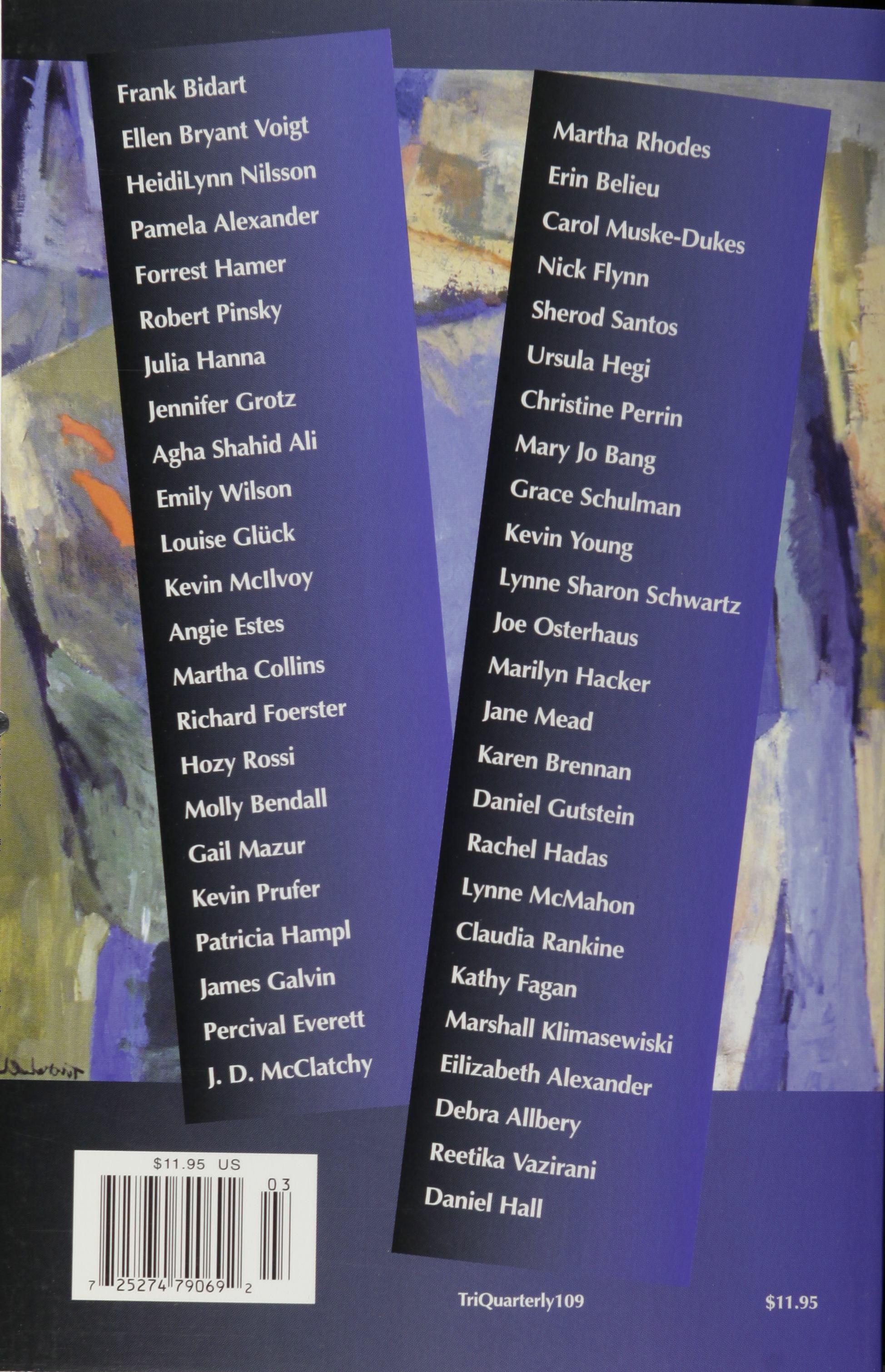






Abigail De Witt's first novel examines one woman's intimate life against the epic background of twentieth,century Europe. Within its compass is the full measure of human experience, from the whisper of faith to the wrenching passions of love and war.
"Abigail De Witt brings to life here a woman of sly and wondrous contradictions. Lili's hold on a reader will be no less ferocious than her grasp on life."
-Susan Dodd, author of Mamaw
"Abigail De Witt's wise, lyrical, elegant, and deliciously sensuous first novel is a rare pleasure from start to finish This is an 'old-fashioned' and at the same time utterly modem novel."
-Michelle Herman, author of A New and Glorious Life
"First-time novelist De Witt skillfully explores the nature of love as a door to the experience of the Divine, and the relationship between sexual and religious ecstasy."
-Booklist
"Lui is an insightful, gripping novel with the ambition and courage to engage the timeless issues of the human condition."
-Chapel Hill News
Cloth, $26.95
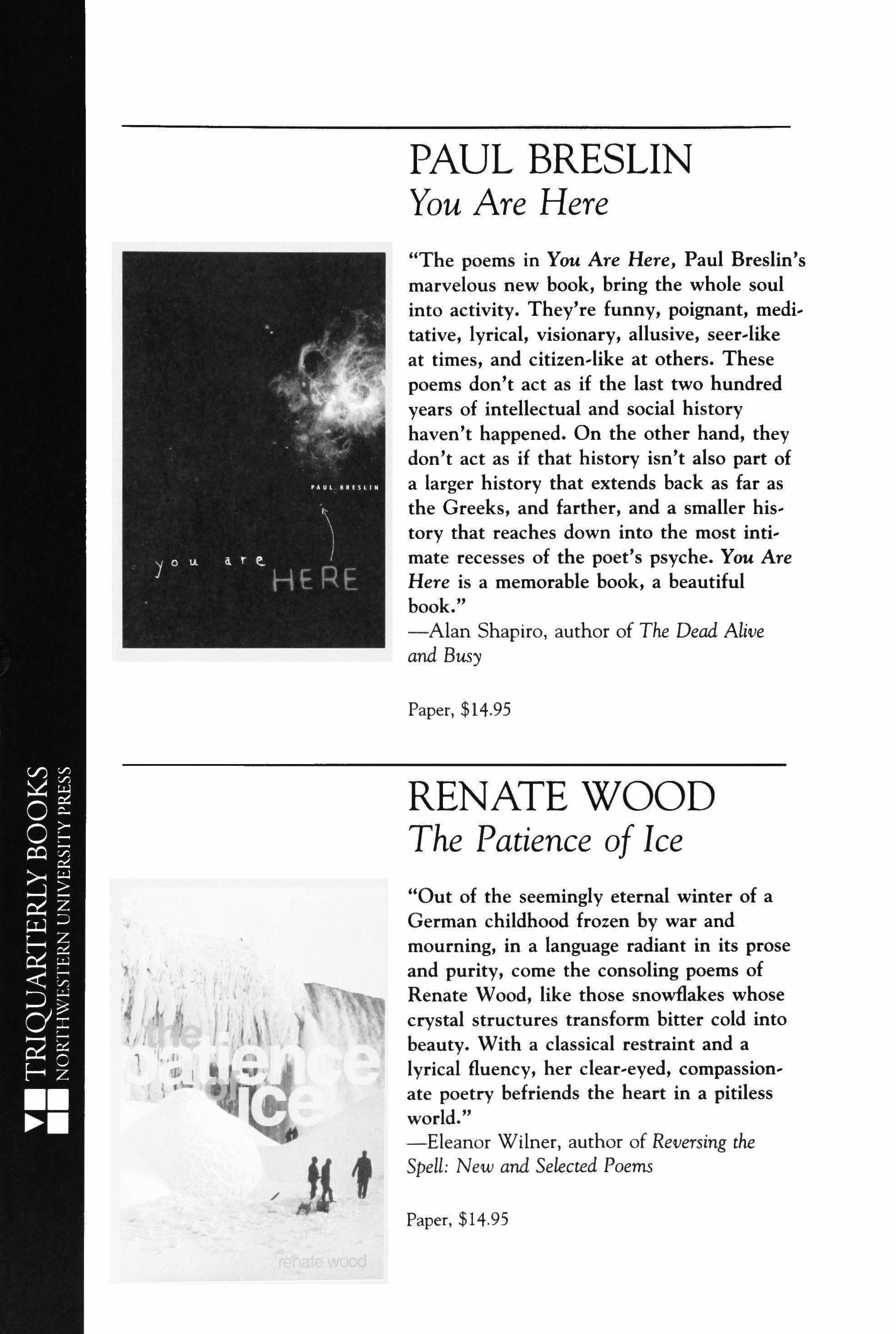
"The poems in You Are Here, Paul Breslin's marvelous new book, bring the whole soul into activity. They're funny, poignant, meditative, lyrical, visionary, allusive, seer-like at times, and citizen-like at others. These poems don't act as if the last two hundred years of intellectual and social history haven't happened. On the other hand, they don't act as if that history isn't also part of a larger history that extends back as far as the Greeks, and farther, and a smaller history that reaches down into the most intimate recesses of the poet's psyche. You Are Here is a memorable book, a beautiful book."
-Alan Shapiro, author of The Dead Alive and Busy Paper, $14.95
"Out of the seemingly eternal winter of a German childhood frozen by war and mourning, in a language radiant in its prose and purity, come the consoling poems of Renate Wood, like those snowflakes whose crystal structures transform bitter cold into beauty. With a classical restraint and a lyrical fluency, her clear-eyed, compassionate poetry befriends the heart in a pitiless world."
-Eleanor Wilner, author of Reversing the Spell: New and Selected Poems Paper, $14.95
Concerned with our pasts, both biological or mythological, and written in the language that has earned Frost admiration, Love and Scorn is the best work of a respected "poet's poet" in a single collection.
"Love and Scorn is a highly original work. The poems are hard-felt and new, with surprises around every corner. Carol Frost is a realist, a realist of excitements and exaltations. She is one of the three or four best poets of her generation."
-Donald Justice
Paper, $16.95
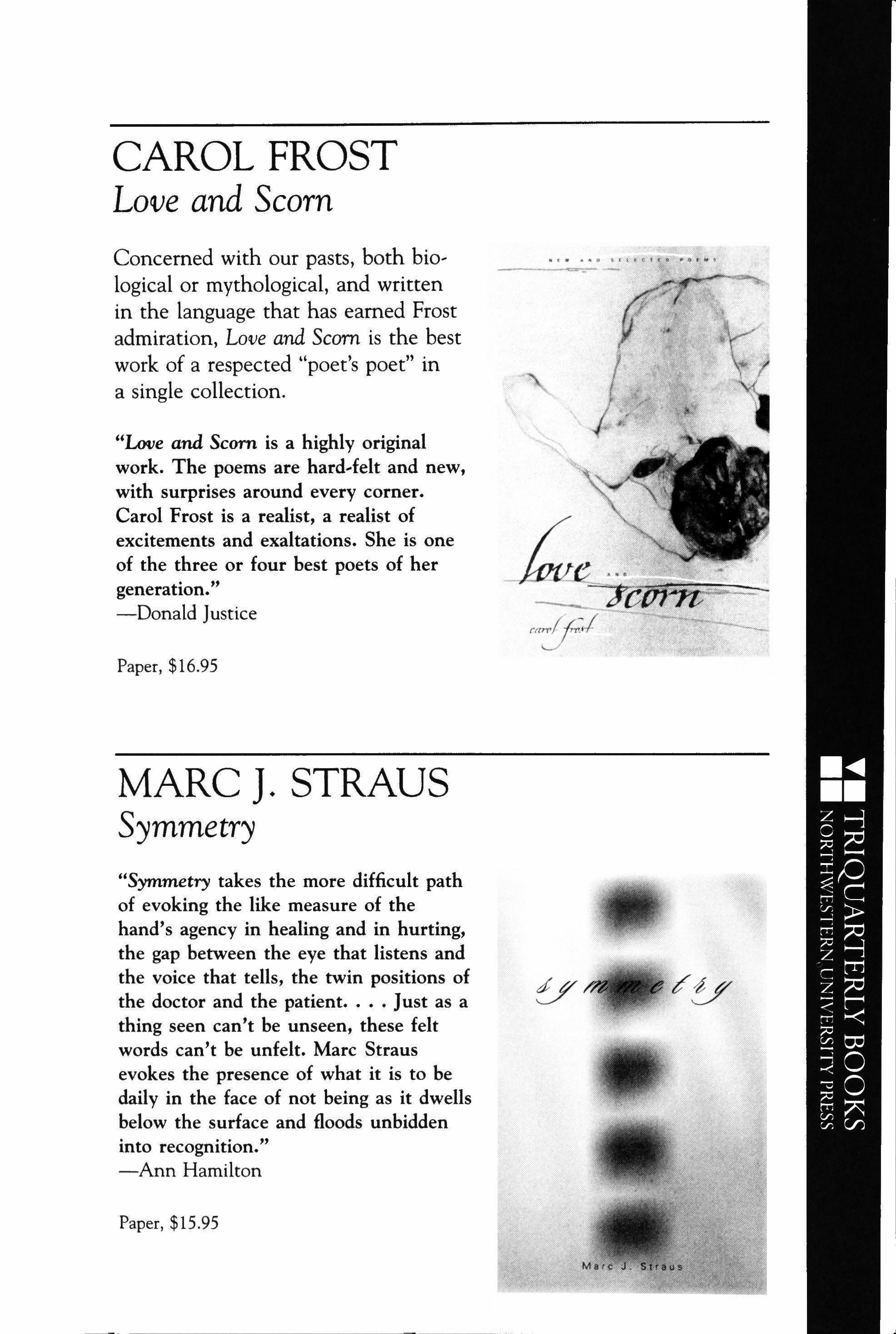
"Symmetry takes the more difficult path of evoking the like measure of the hand's agency in healing and in hurting, the gap between the eye that listens and the voice that tells, the twin positions of the doctor and the patient Just as a thing seen can't be unseen, these felt words can't be unfelt. Marc Straus evokes the presence of what it is to be daily in the face of not being as it dwells below the surface and floods unbidden into recognition."
-Ann Hamilton
Paper, $15.95
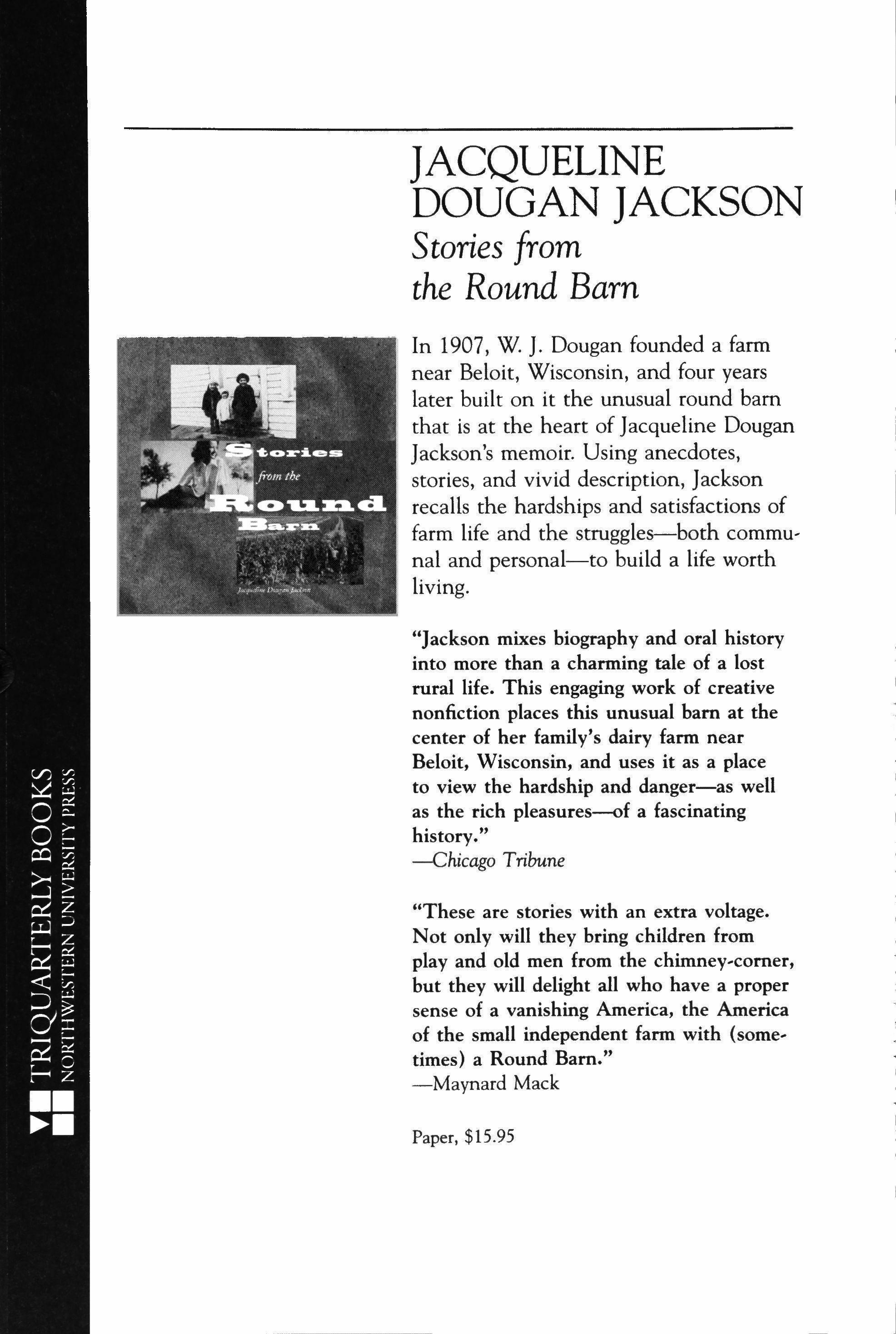
In 1907, W. J. Dougan founded a farm near Beloit, Wisconsin, and four years later built on it the unusual round bam that is at the heart of Jacqueline Dougan Jackson's memoir. Using anecdotes, stories, and vivid description, Jackson recalls the hardships and satisfactions of farm life and the struggles-both communal and personal-to build a life worth living.
"Jackson mixes biography and oral history into more than a charming tale of a lost rural life. This engaging work of creative nonfiction places this unusual bam at the center of her family's dairy farm near Beloit, Wisconsin, and uses it as a place to view the hardship and danger-as well as the rich pleasures--of a fascinating history."
-Chicago Tribune
"These are stories with an extra voltage. Not only will they bring children from play and old men from the chimney-comer, but they will delight all who have a proper sense of a vanishing America, the America of the small independent farm with (sometimes) a Round Bam."
-Maynard Mack Paper, $15.95
Editor Susan Firestone Hahn
Associate Editor Ian Morris
Production Manager Bruce Frausto Design Gini Kondziolka
Operations Coordinator Kirstie Felland
Production Editor Karen Keeley
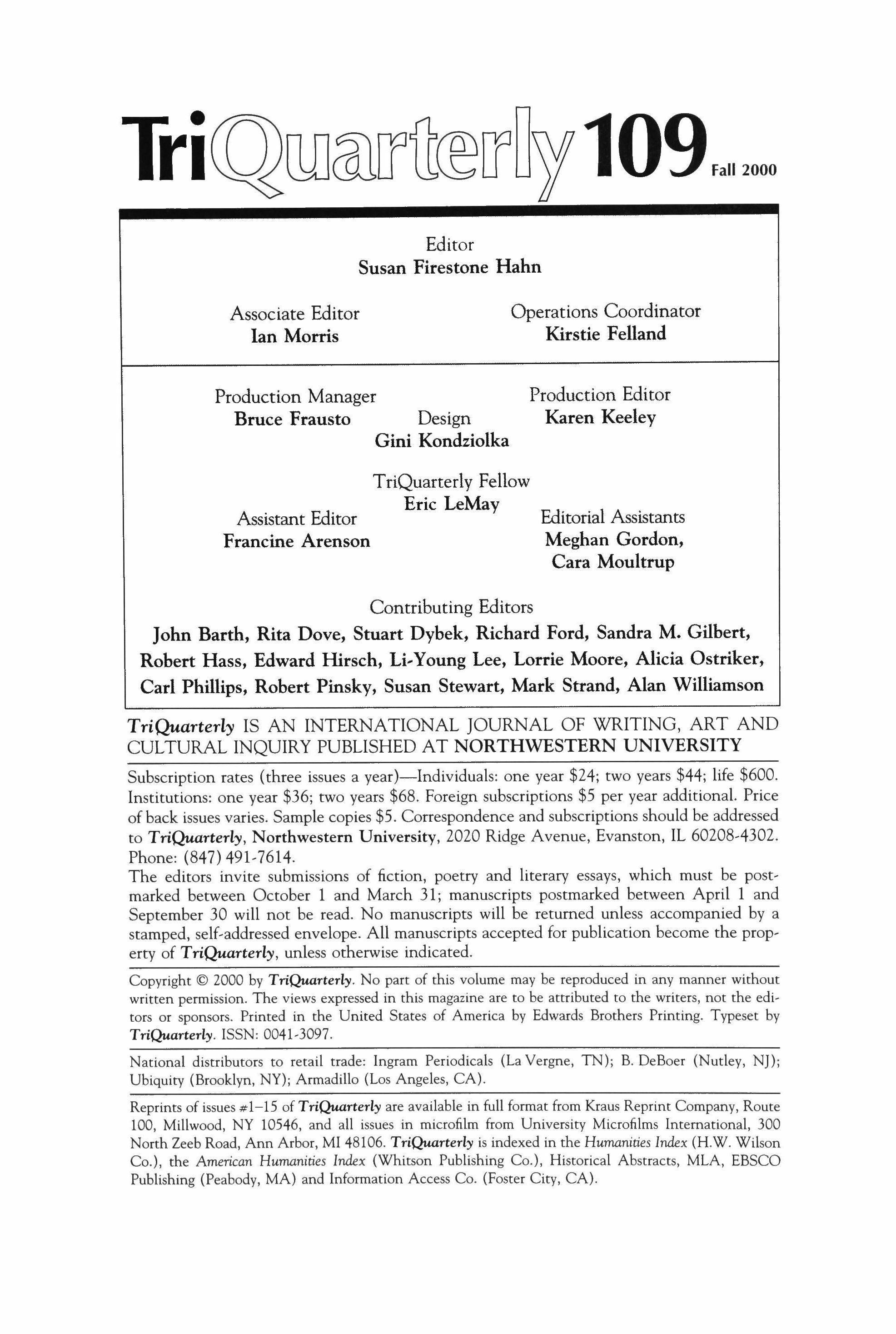
Assistant Editor Francine Arenson
TriQuarterly Fellow Eric LeMay
Editorial Assistants Meghan Gordon, Cara Moultrup
John Barth, Rita Dove, Stuart Dybek, Richard Ford, Sandra M. Gilbert, Robert Hass, Edward Hirsch, Li-Young Lee, Lorrie Moore, Alicia Ostriker, Carl Phillips, Robert Pinsky, Susan Stewart, Mark Strand, Alan Williamson
TriQuarterly IS AN INTERNATIONAL JOURNAL OF WRITING, ART AND CULTURAL INQUIRY PUBLISHED AT NORTHWESTERN UNIVERSITY
Subscription rates (three issues a year)-Individuals: one year $24; two years $44; life $600. Institutions: one year $36; two years $68. Foreign subscriptions $5 per year additional. Price of back issues varies. Sample copies $5. Correspondence and subscriptions should be addressed to TriQuarterly, Northwestern University, 2020 Ridge Avenue, Evanston, IL 60208-4302. Phone: (847) 491-7614.
The editors invite submissions of fiction, poetry and literary essays, which must be postmarked between October 1 and March 31; manuscripts postmarked between April 1 and September 30 will not be read. No manuscripts will be returned unless accompanied by a stamped, self-addressed envelope. All manuscripts accepted for publication become the properry of TriQuarterly, unless otherwise indicated.
Copyright © 2000 by TriQuarterly. No part of this volume may be reproduced in any manner without written permission. The views expressed in this magazine are to be attributed to the writers, not the editors or sponsors. Printed in the United States of America by Edwards Brothers Printing. Typeset by TriQuarterly. ISSN: 0041-3097.
National distributors to retail trade: Ingram Periodicals (La Vergne, TN); B. DeBoer (Nutley, NJ); Ubiquity (Brooklyn, NY); Armadillo (Los Angeles, CAl.
Reprints of issues # 1-15 of TriQuarterly are available in full format from Kraus Reprint Company, Route 100, Millwood, NY 10546, and all issues in microfilm from University Microfilms International, 300 North Zeeb Road, Ann Arbor, MI 48106. TriQuarterly is indexed in the Humanities Index (H.W. Wilson Co.), the American Humanities Index (Whitson Publishing Co.), Historical Abstracts, MLA, EBSCO Publishing (Peabody, MA) and Information Access Co. (Foster City, CAl.

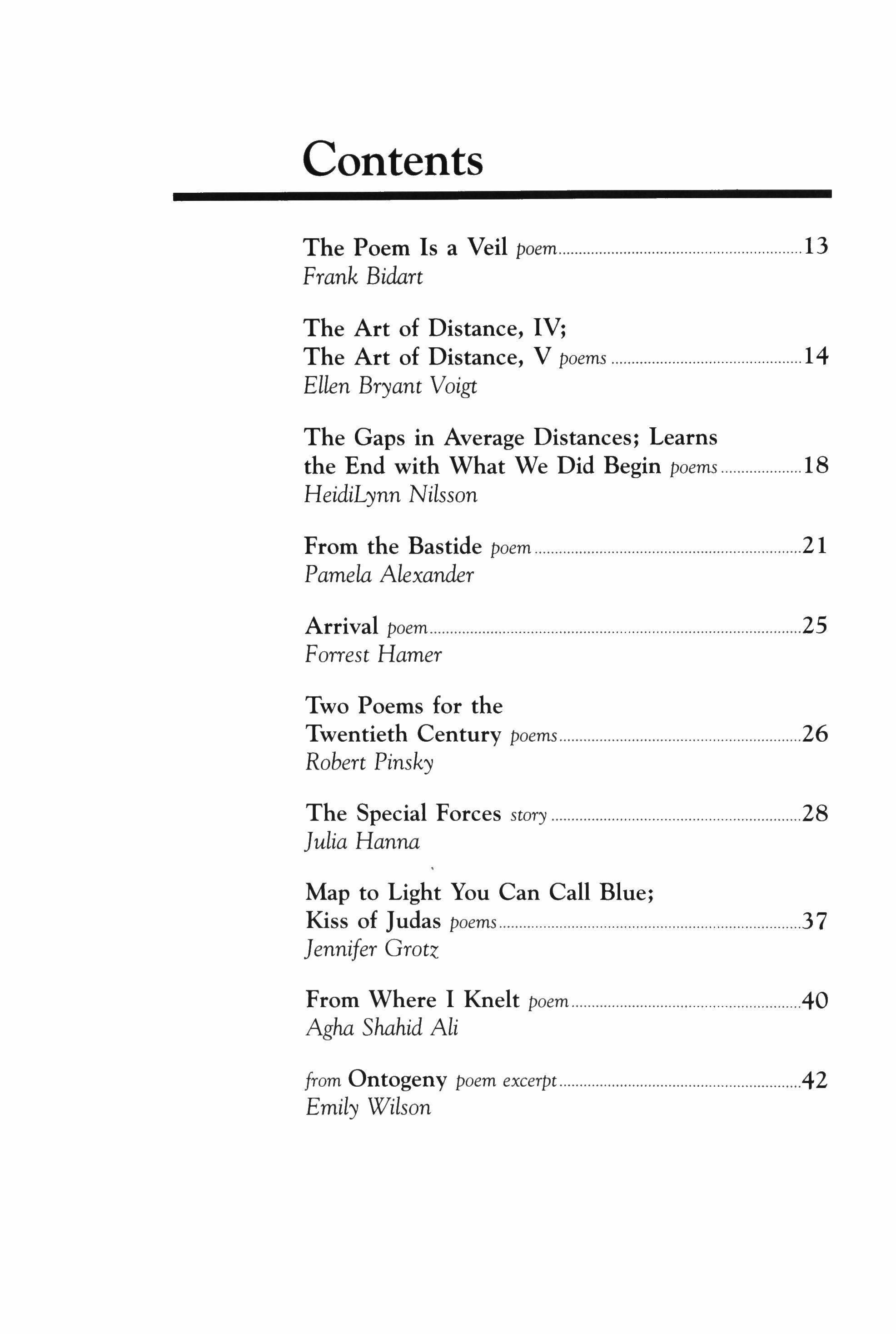
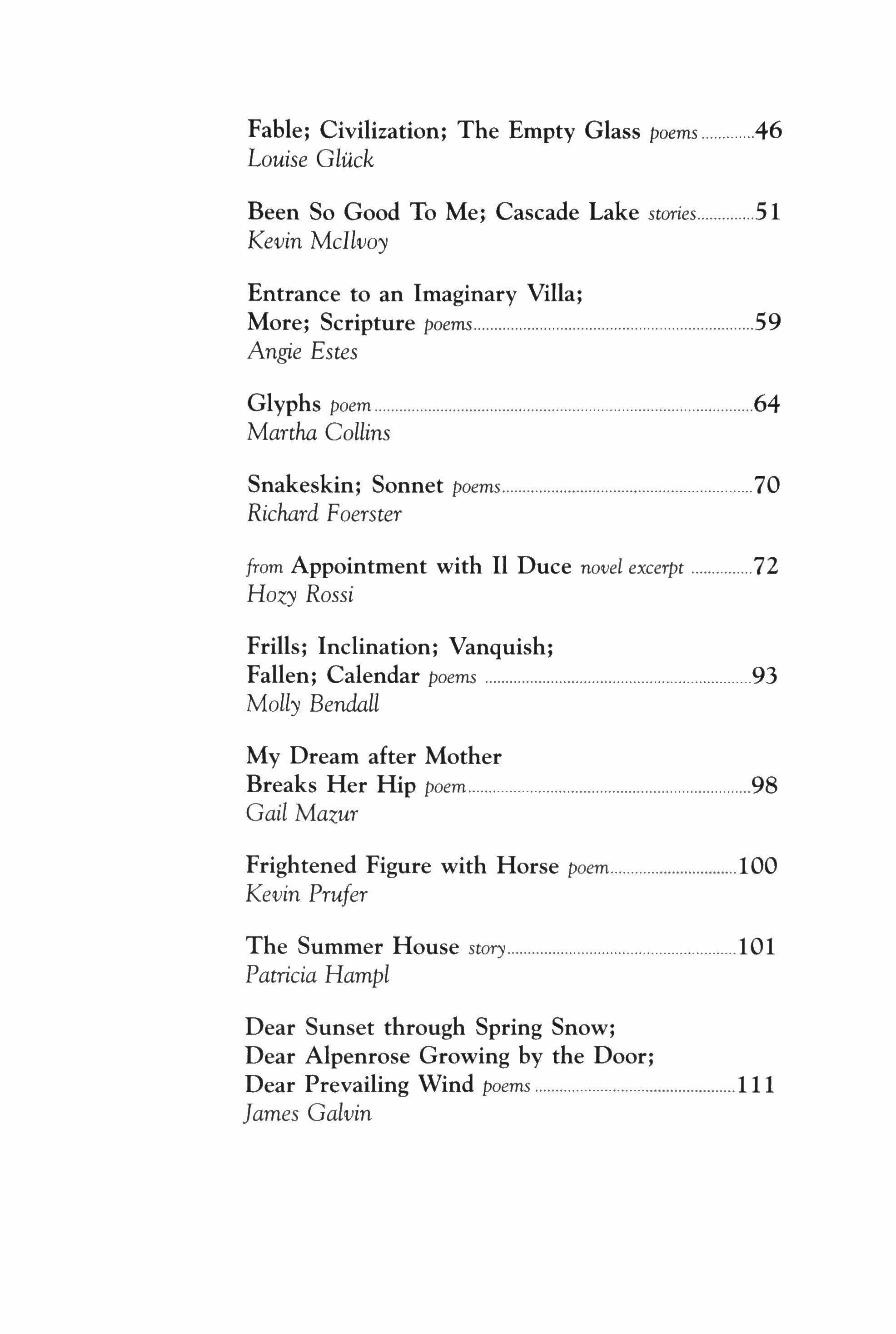
Kevin Mcllvoy
Angie Estes
Martha Collins
Richard Foerster
Hozy
Molly Bendall
Gail Mazur Frightened
Kevin Prufer
James Galvin
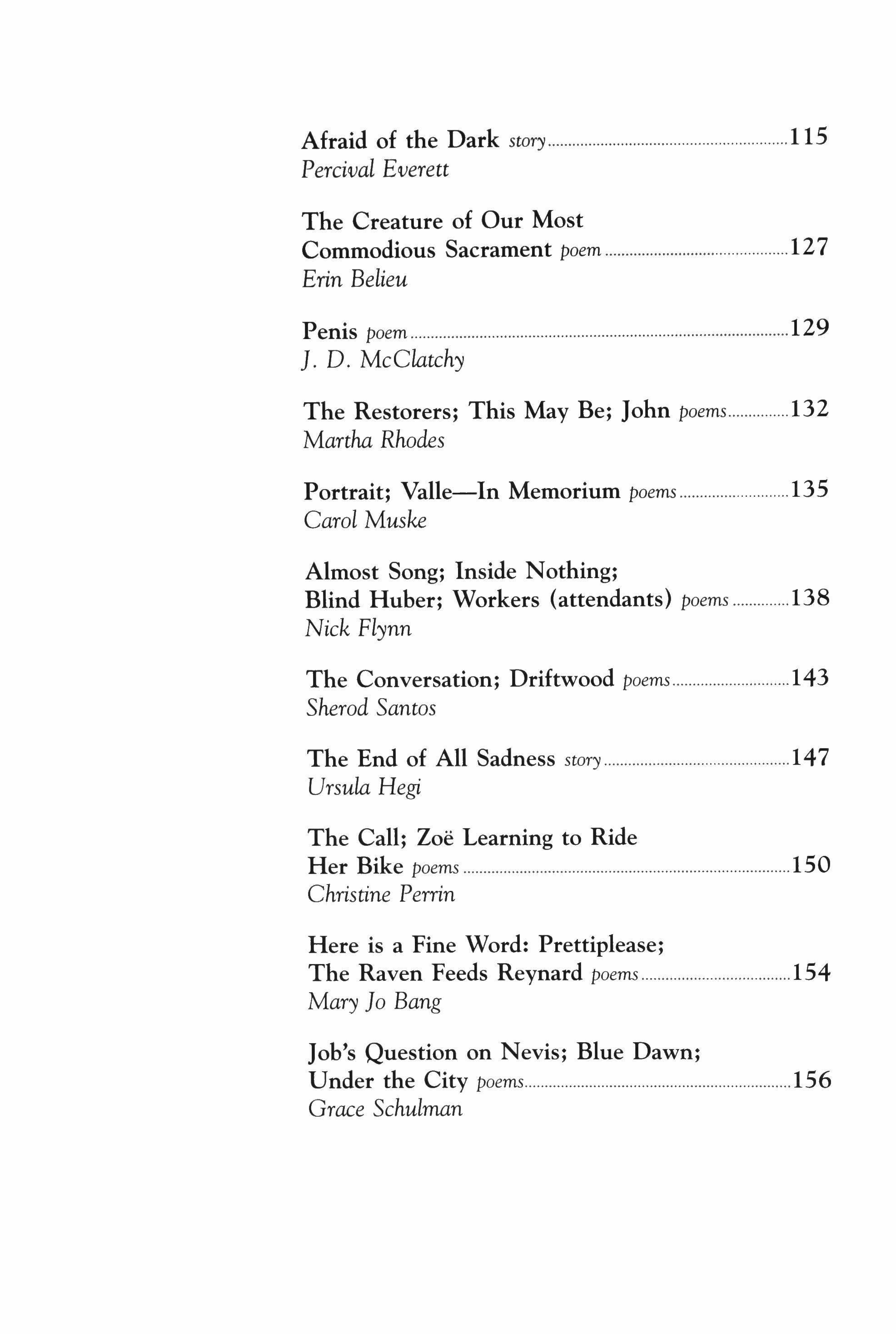
Kevin Young
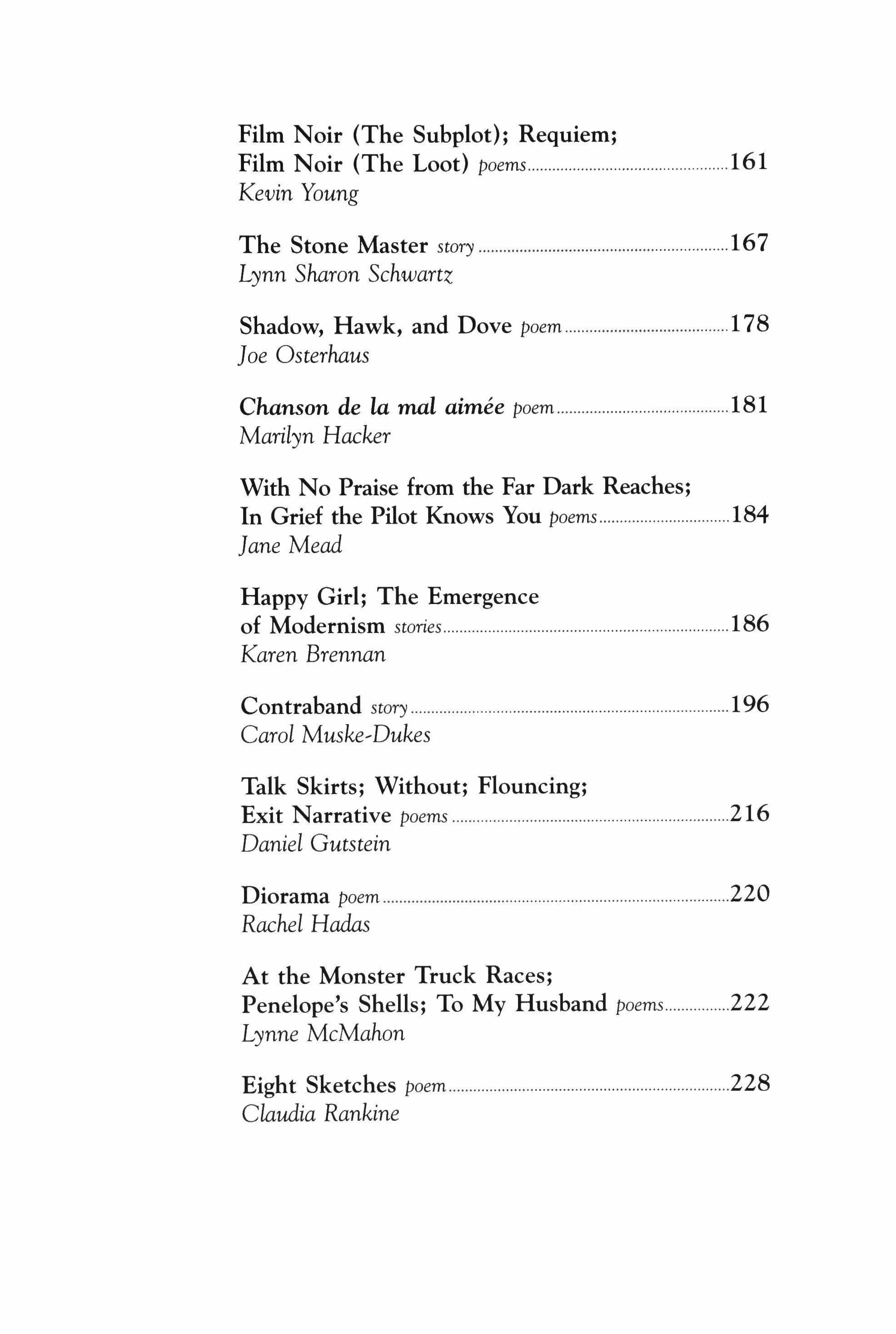
Joe Osterhaus Chanson de la mal aimee
Marilyn Hacker
With No Praise from the Far Dark Reaches; In Grief the Pilot Knows
Muske�Dukes
Daniel Gutstein
Lynne
Claudia Rankine
to
Reetika Vazirani

cover painting: Narcissus by Eve TwitcheU


VEl L,-as if silk that you in fury must thrust repeatedly high at what the eye, your eye, naked cannot see catches, clinging to its physiognomy.
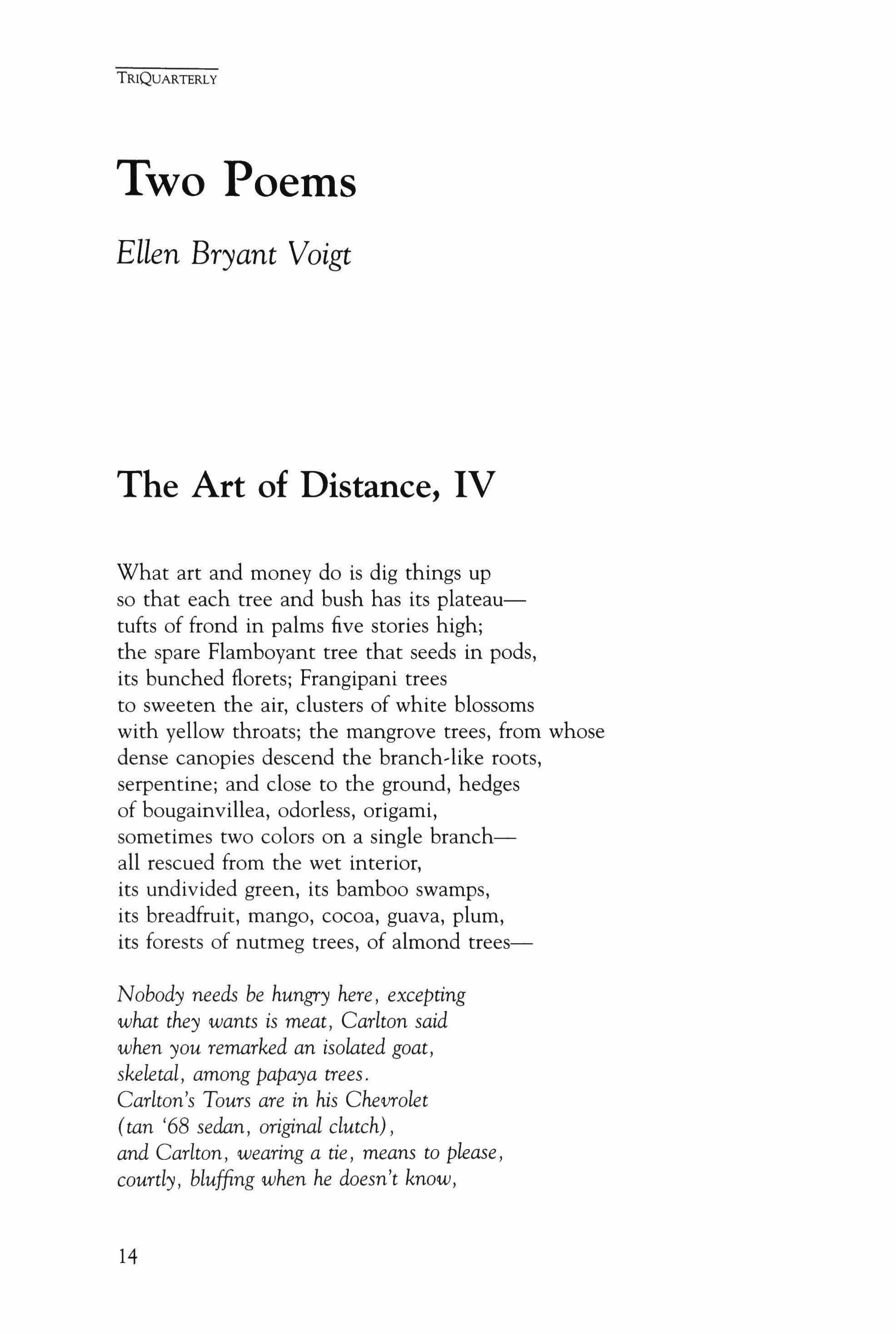
What art and money do is dig things up so that each tree and bush has its plateautufts of frond in palms five stories high; the spare Flamboyant tree that seeds in pods, its bunched florets; Frangipani trees to sweeten the air, clusters of white blossoms with yellow throats; the mangrove trees, from whose dense canopies descend the branch-like roots, serpentine; and close to the ground, hedges of bougainvillea, odorless, origami, sometimes two colors on a single branchall rescued from the wet interior, its undivided green, its bamboo swamps, its breadfruit, mango, cocoa, guava, plum, its forests of nutmeg trees, of almond trees-
Nobody needs be hungry here, excepting what they wants is meat, Carlton said when you remarked an isolated goat, skeletal, among papaya trees. Carlton's Tours are in his Chevrolet (tan '68 sedan, original clutch), and Carlton, wearing a tie, means to please, courtly, bluffing when he doesn't know,

although he knows the flora, and where to find abandoned factories that once made rum, and overgrown plantations, and also where the aborigines last took their stand: on a bare cliff, so that, having lost again, they could, and did, fling themselves to the sea.
One needs, it seems, sufficient irony: to see oneself and the island as from the clouds: a speck on the back of a gecko turning brown these weeks before the rains, as if to hide from the gray square-headed bird, its needle-nose, its white chest and belly and underwing blazed blue as it skims the azure swimming pool. Past some small blackbirds, and the doctor-bird, black with a blue face, who works like a bee the oleander bush; past the cheery banana-quit, across powdery sand, raked everyday; and past broad-leaved Sea-grapes, squat trees outposted near a ruffling surf:
How are you today? she says, and you say Thank you, fine, and how are you?, and she says Not as fine as you, and she is right: you could buy a room in the new hotel, and she cannot afford the ferry off. Want my pretty? she says, proffering her grass baskets, loofahs still in their shells, and bowls made from the gourds of a calabash tree, which also serve-she models one-as hats. Don't want to bum, she says, and even though your skin has never been so white, so soft, you tell her Not today, and look at the sea:
past riffling waves, past gulls cresting the tide like boats, past sun-struck sails, a pencil line divides dove-grey and blue from navy blue, partitioning the heavens from the earth. And every day at dusk, released from under the mangrove's raised umbrella, that cupped hand
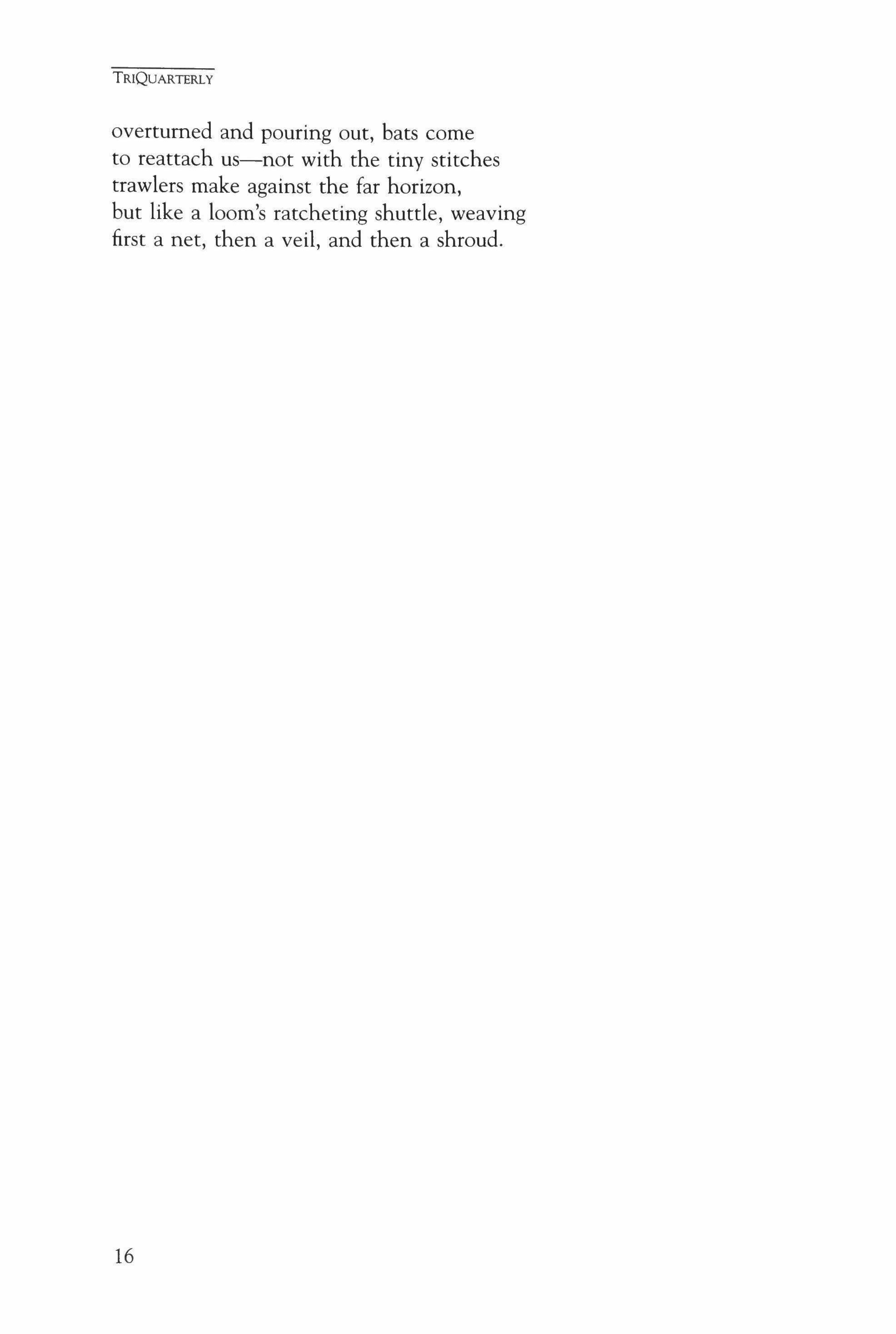
overturned and pouring out, bats come to reattach us-not with the tiny stitches trawlers make against the far horizon, but like a loom's ratcheting shuttle, weaving first a net, then a veil, and then a shroud.
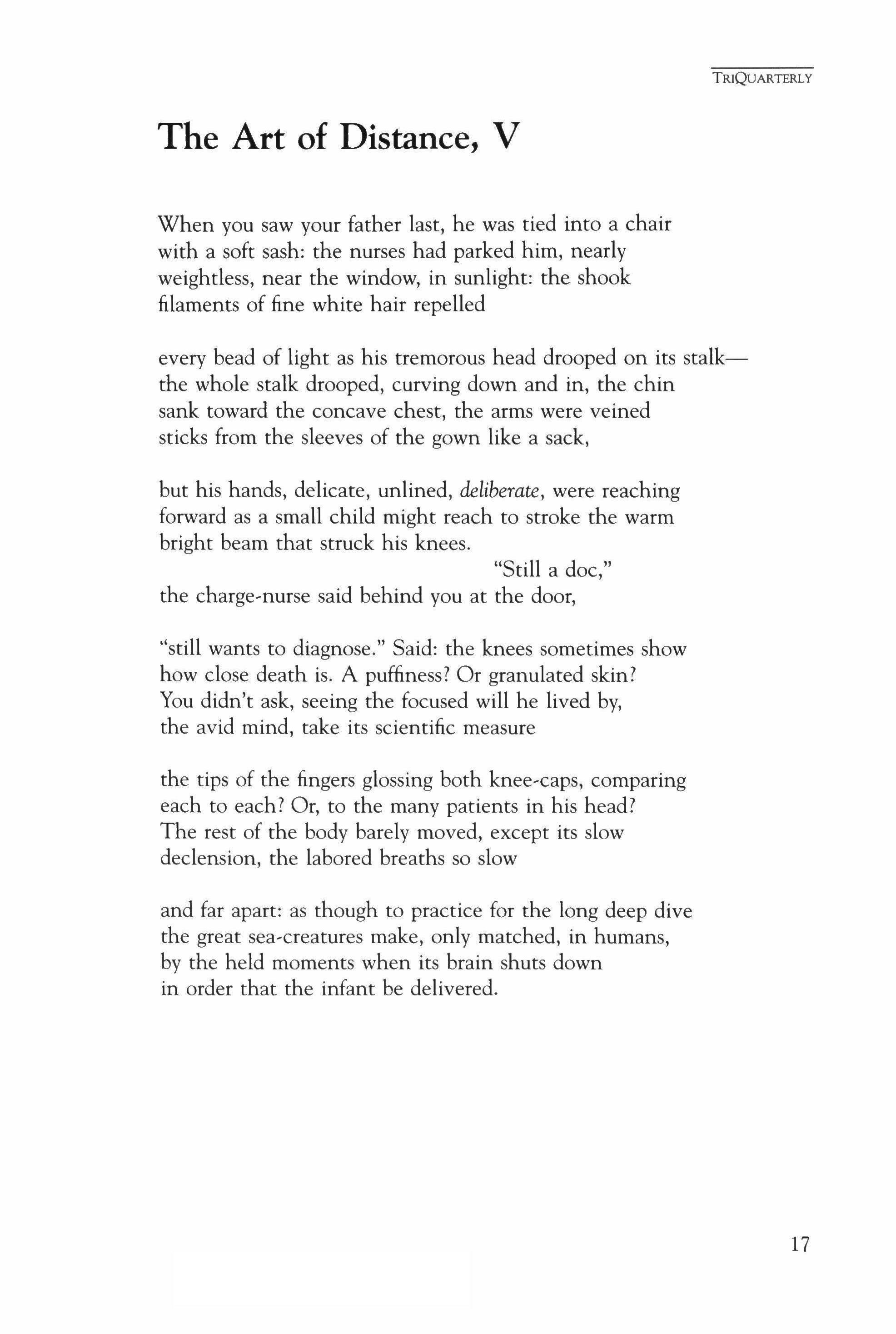
When you saw your father last, he was tied into a chair with a soft sash: the nurses had parked him, nearly weightless, near the window, in sunlight: the shook filaments of fine white hair repelled
every bead of light as his tremorous head drooped on its stalkthe whole stalk drooped, curving down and in, the chin sank toward the concave chest, the arms were veined sticks from the sleeves of the gown like a sack,
but his hands, delicate, unlined, deliberate, were reaching forward as a small child might reach to stroke the warm bright beam that struck his knees.
"Still a doc," the charge-nurse said behind you at the door,
"still wants to diagnose." Said: the knees sometimes show how close death is. A puffiness? Or granulated skin? You didn't ask, seeing the focused will he lived by, the avid mind, take its scientific measure
the tips of the fingers glossing both knee-caps, comparing each to each? Or, to the many patients in his head?
The rest of the body barely moved, except its slow declension, the labored breaths so slow
and far apart: as though to practice for the long deep dive the great sea'creatures make, only matched, in humans, by the held moments when its brain shuts down in order that the infant be delivered.
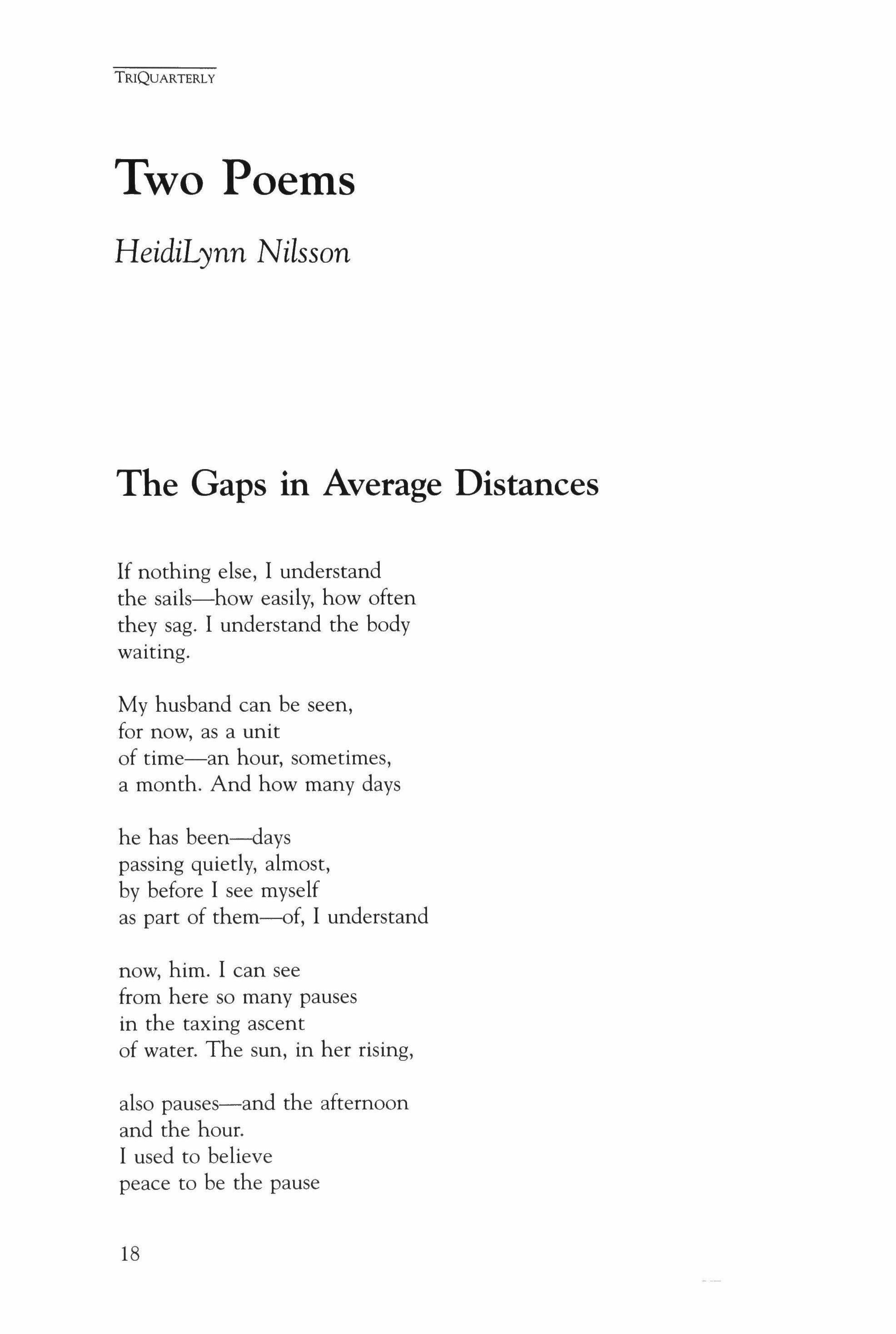
If nothing else, I understand the sails-how easily, how often they sag. I understand the body waiting.
My husband can be seen, for now, as a unit of time-an hour, sometimes, a month. And how many days he has been--days passing quietly, almost, by before I see myself as part of them-of, I understand now, him. I can see from here so many pauses in the taxing ascent of water. The sun, in her rising, also pauses-and the afternoon and the hour.
I used to believe peace to be the pause

between fears. Each calmness could unsoundly be counted abandonment-bodies of water now fishless, a human body without the fear that, mornings, sways it awake. But we all understand surfaces. And those things that stay always with us. It's that which comes and goes and comes that we can't endurethat peace which is a seagull diving, with each skipping suggestion of life, for foodthat man who carries, in his thoroughly sealed body, the wind that moves you.
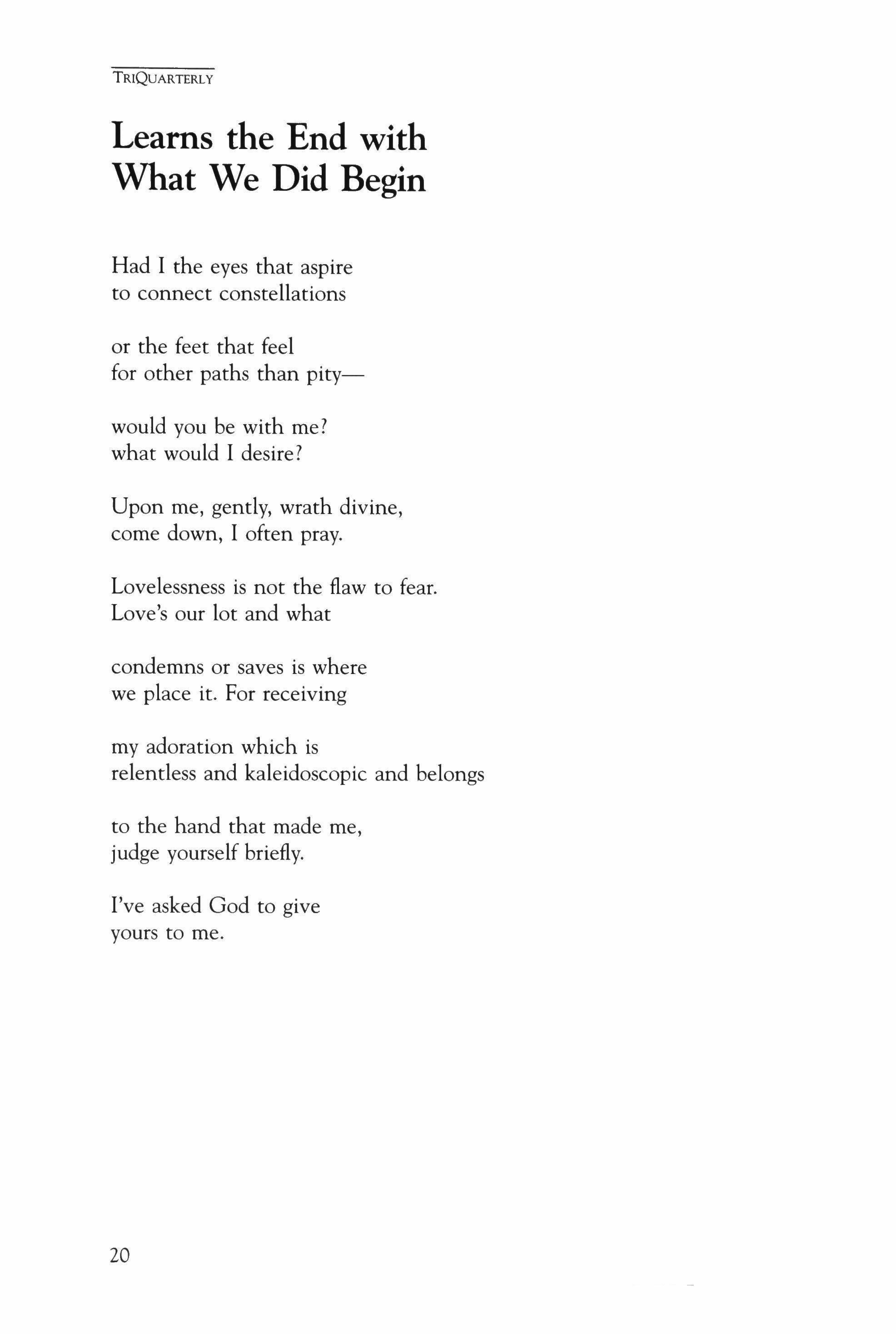
Had I the eyes that aspire to connect constellations or the feet that feel for other paths than pitywould you be with me? what would I desire?
Upon me, gently, wrath divine, come down, I often pray.
Lovelessness is not the flaw to fear. Love's our lot and what condemns or saves is where we place it. For receiving my adoration which is relentless and kaleidoscopic and belongs to the hand that made me, judge yourself briefly.
I've asked God to give yours to me.
the walled town of Puycelsi, Midi,Pyrenees

Stone village brightened by wooden shutters painted blue. The glass opens inward, lace panels swaying.
Yesterday, at dawn, a small bat flew inside to rest.
I often talk to the past as if to a child, hoping it will learn. Now I must talk to the present also because it happens in two languages.
I am a stranger. Where is the post office? The store? What color is the sky in this country?
Narrow streets. Lean past lace, past blue, take a peach from the facing neighbor's table.
The bat
As I think again of the bat, write The bat, the bat flies in. Audible landing. It crawls behind the bureau, clings.
Music in the square some nights. Beyond the walls, stars. Owls. Lyrics mostly in English.
Dear C, You are not interested in being with someone. You are interested in the appearance of being with someone.
There is no bread here on Mondays.
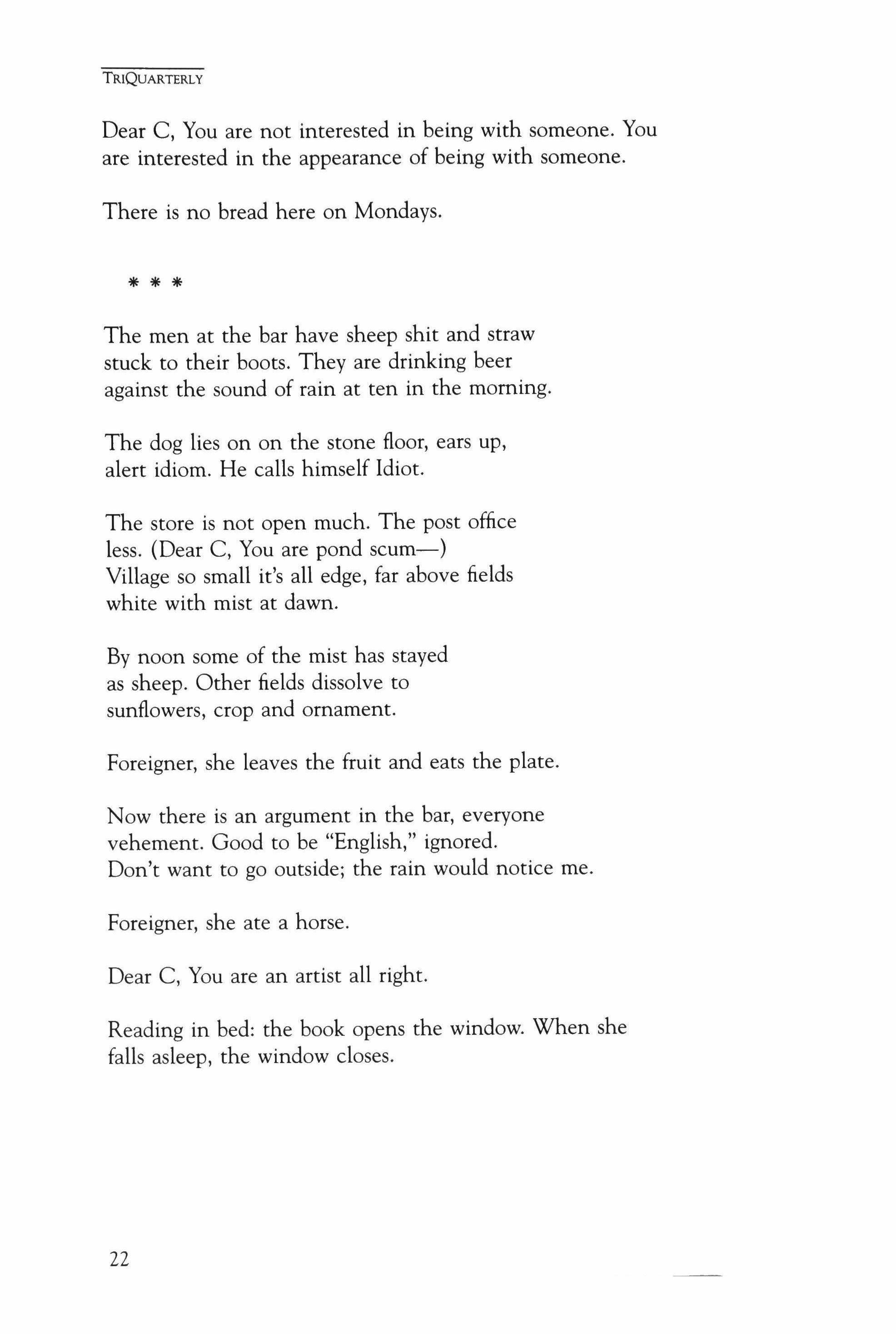
The men at the bar have sheep shit and straw stuck to their boots. They are drinking beer against the sound of rain at ten in the morning.
The dog lies on on the stone floor, ears up, alert idiom. He calls himself Idiot.
The store is not open much. The post office less. (Dear C, You are pond scum-) Village so small it's all edge, far above fields white with mist at dawn.
By noon some of the mist has stayed as sheep. Other fields dissolve to sunflowers, crop and ornament.
Foreigner, she leaves the fruit and eats the plate.
Now there is an argument in the bar, everyone vehement. Good to be "English," ignored. Don't want to go outside; the rain would notice me.
Foreigner, she ate a horse.
Dear C, You are an artist all right.
Reading in bed: the book opens the window. When she falls asleep, the window closes.
Having the words lined up, ready, lets no moment surprise. I load words, a future pretending to be the present.
Otherwise.
Have you seen the button from my wolf? I have lost him.
Yesterday a white day, no shadows. We wandered, counting waterfalls and losing count. Butterflies in zones as we climbed. Black at first; in the high meadows, yellow, or pale blue with white edges. Fewer at the rocky summit, and all white.
Back late. A stone on the doorstep turns into a toad. Sparkling wine and cous-cous
and the town loud with tinsel music from a little fair. Its carousel crowded with space ships, motorcycles, tanks with guns. Just one paltry dragon and something like a llama.
Sixty-vear-olds dance under strings of colored lights. The music follows us home, upstairs, to bed.

The bar's window looks to a slant of hill. Some clouds drift left to right, like reading, so I see them first. Some clouds go the other way.
The clock strikes twice each hour. It just struck twelve. In a few minutes it will be noon again.
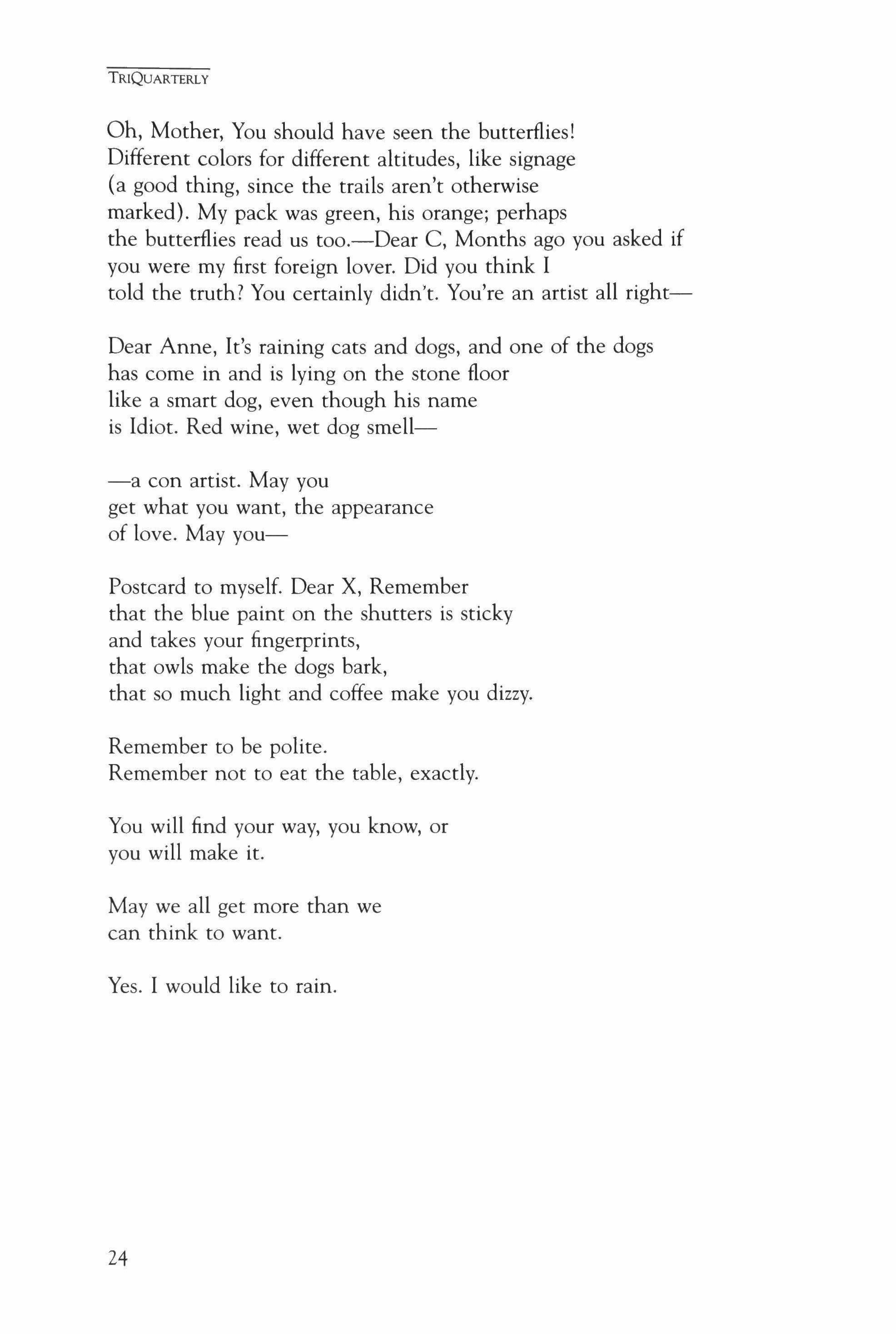
Oh, Mother, You should have seen the butterflies! Different colors for different altitudes, like signage (a good thing, since the trails aren't otherwise marked). My pack was green, his orange; perhaps the butterflies read us too.-Dear C, Months ago you asked if you were my first foreign lover. Did you think I told the truth? You certainly didn't. You're an artist all right-
Dear Anne, It's raining cats and dogs, and one of the dogs has come in and is lying on the stone floor like a smart dog, even though his name is Idiot. Red wine, wet dog smell-
-a can artist. May you get what you want, the appearance of love. May you-
Postcard to myself. Dear X, Remember that the blue paint on the shutters is sticky and takes your fingerprints, that owls make the dogs bark, that so much light and coffee make you dizzy.
Remember to be polite. Remember not to eat the table, exactly.
You will find your way, you know, or you will make it.
May we all get more than we can think to want.
Yes. I would like to rain.
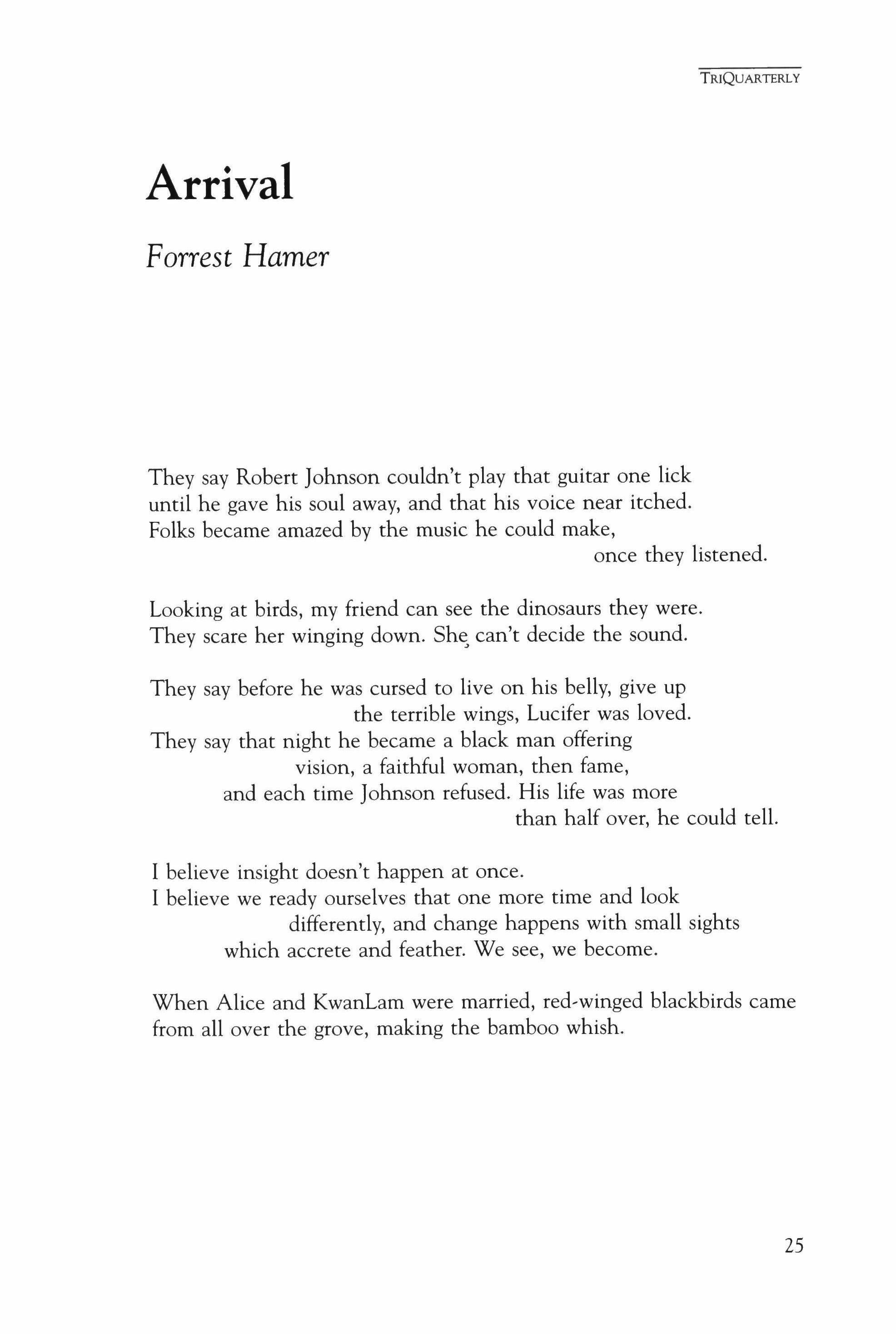
They say Robert Johnson couldn't play that guitar one lick until he gave his soul away, and that his voice near itched. Folks became amazed by the music he could make, once they listened.
Looking at birds, my friend can see the dinosaurs they were. They scare her winging down. She can't decide the sound.
They say before he was cursed to live on his belly, give up the terrible wings, Lucifer was loved. They say that night he became a black man offering vision, a faithful woman, then fame, and each time Johnson refused. His life was more than half over, he could tell.
I believe insight doesn't happen at once.
I believe we ready ourselves that one more time and look differently, and change happens with small sights which accrete and feather. We see, we become.
When Alice and KwanLam were married, red-winged blackbirds came from all over the grove, making the bamboo whish.

Winged mind of a child running with arms out straight. Cloudscape of white below us, or a city glittering at night In a zodiac of wants. Dresden, Hiroshima, descending dove's might Blossoming in fires. Glider, dogfighting biplanes, airlift, jet. The cockpit gauges and needles diagramming thought, Trembling in the upward gesture swifter than hearing or sightMind thrown further outward from earth: winged mind of flight
Thrown outward from earth as a digital spirit. The primate hand
Tilts winglike from star to star, reaching in coded signals to find Uncrossable spaces between galaxies, cold gulf spanned By no metal or muscle, but by vibrations finer than sound Or light, intelligence that we contrive to send By mystic fires of intention above water and land And beyond, like a child running to fly, windlike, winged mind.
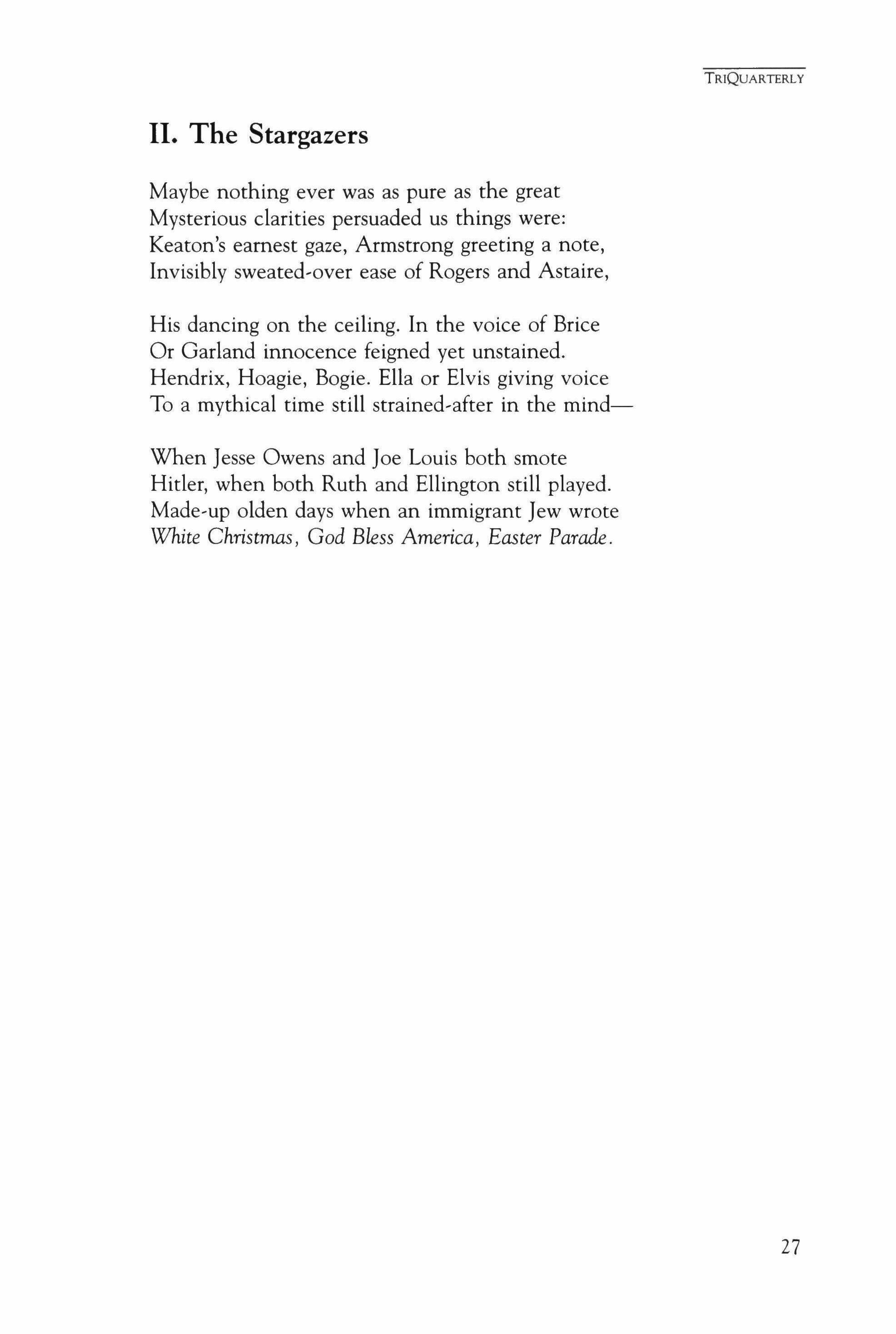
Maybe nothing ever was as pure as the great Mysterious clarities persuaded us things were: Keaton's earnest gaze, Armstrong greeting a note, Invisibly sweated-over ease of Rogers and Astaire,
His dancing on the ceiling. In the voice of Brice Or Garland innocence feigned yet unstained.
Hendrix, Hoagie, Bogie. Ella or Elvis giving voice To a mythical time still strained-after in the mind-
When Jesse Owens and Joe Louis both smote Hitler, when both Ruth and Ellington still played. Made-up olden days when an immigrant Jew wrote White Christmas, God Bless America, Easter Parade.
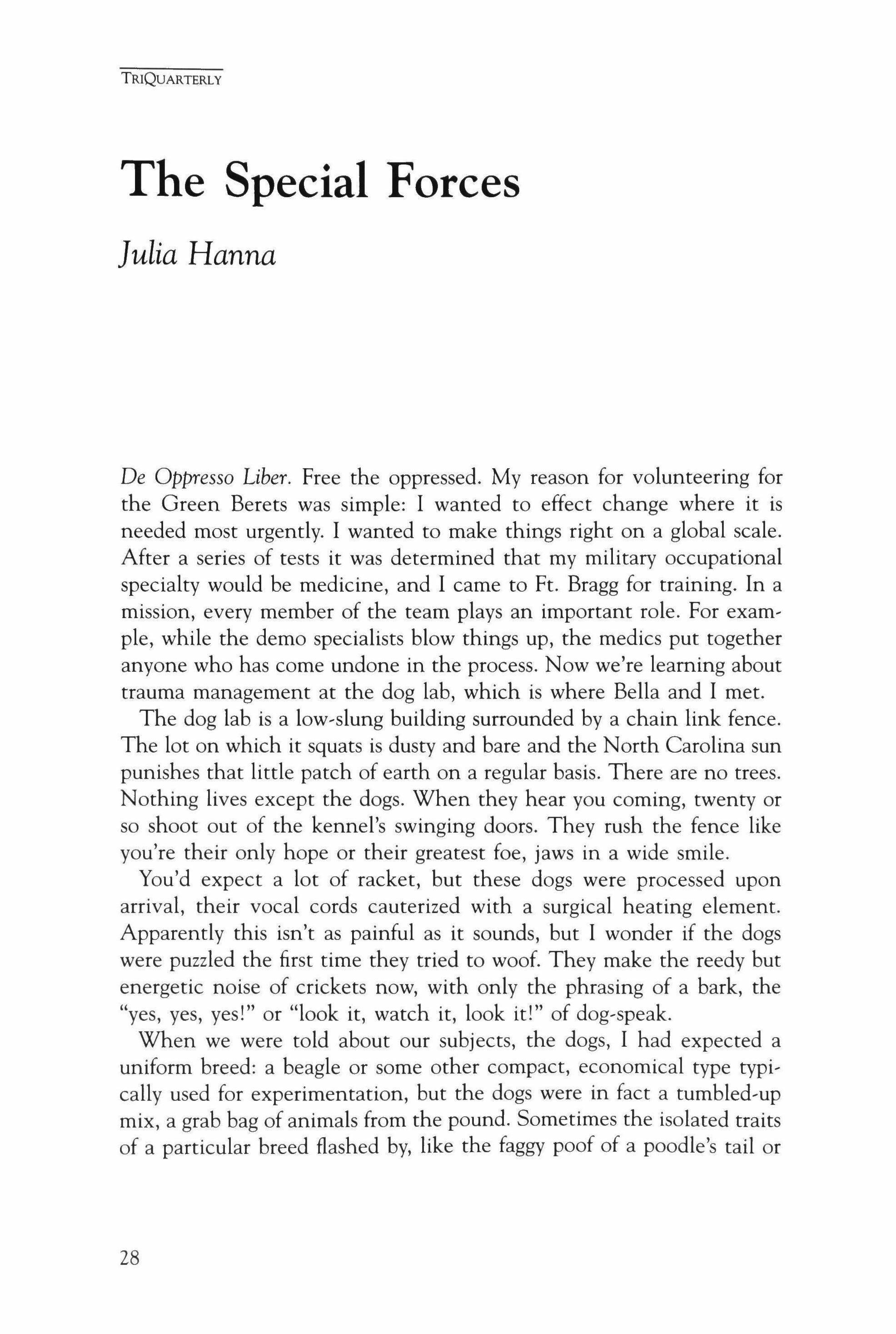
De Oppresso Liber. Free the oppressed. My reason for volunteering for the Green Berets was simple: I wanted to effect change where it is needed most urgently. I wanted to make things right on a global scale. After a series of tests it was determined that my military occupational specialty would be medicine, and I came to Ft. Bragg for training. In a mission, every member of the team plays an important role. For example, while the demo specialists blow things up, the medics put together anyone who has come undone in the process. Now we're learning about trauma management at the dog lab, which is where Bella and I met.
The dog lab is a low-slung building surrounded by a chain link fence. The lot on which it squats is dusty and bare and the North Carolina sun punishes that little patch of earth on a regular basis. There are no trees. Nothing lives except the dogs. When they hear you coming, twenty or so shoot out of the kennel's swinging doors. They rush the fence like you're their only hope or their greatest foe, jaws in a wide smile.
You'd expect a lot of racket, but these dogs were processed upon arrival, their vocal cords cauterized with a surgical heating element. Apparently this isn't as painful as it sounds, but I wonder if the dogs were puzzled the first time they tried to woof. They make the reedy but energetic noise of crickets now, with only the phrasing of a bark, the "yes, yes, yes!" or "look it, watch it, look it!" of dog-speak.
When we were told about our subjects, the dogs, I had expected a uniform breed: a beagle or some other compact, economical type typically used for experimentation, but the dogs were in fact a tumbled-up mix, a grab bag of animals from the pound. Sometimes the isolated traits of a particular breed flashed by, like the faggy poof of a poodle's tail or
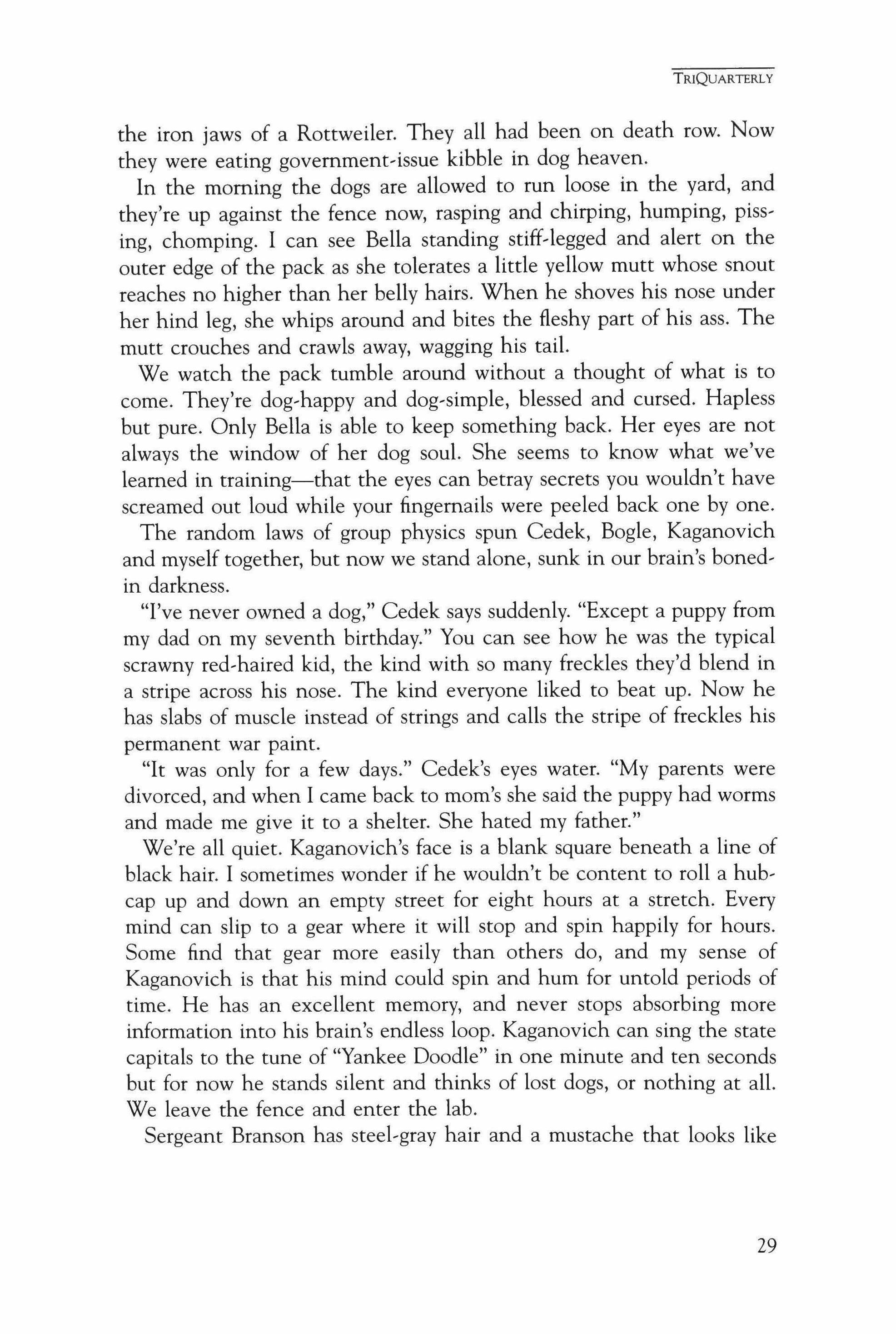
the iron jaws of a Rottweiler. They all had been on death row. Now they were eating government-issue kibble in dog heaven.
In the morning the dogs are allowed to run loose in the yard, and they're up against the fence now, rasping and chirping, humping, pissing, chomping. I can see Bella standing stiff-legged and alert on the outer edge of the pack as she tolerates a little yellow mutt whose snout reaches no higher than her belly hairs. When he shoves his nose under her hind leg, she whips around and bites the fleshy part of his ass. The mutt crouches and crawls away, wagging his tail.
We watch the pack tumble around without a thought of what is to come. They're dog-happy and dog-simple, blessed and cursed. Hapless but pure. Only Bella is able to keep something back. Her eyes are not always the window of her dog soul. She seems to know what we've learned in training-that the eyes can betray secrets you wouldn't have screamed out loud while your fingernails were peeled back one by one.
The random laws of group physics spun Cedek, Bogle, Kaganovich and myself together, but now we stand alone, sunk in our brain's bonedin darkness.
"I've never owned a dog," Cedek says suddenly. "Except a puppy from my dad on my seventh birthday." You can see how he was the typical scrawny red-haired kid, the kind with so many freckles they'd blend in a stripe across his nose. The kind everyone liked to beat up. Now he has slabs of muscle instead of strings and calls the stripe of freckles his permanent war paint.
"It was only for a few days." Cedek's eyes water. "My parents were divorced, and when I came back to mom's she said the puppy had worms and made me give it to a shelter. She hated my father."
We're all quiet. Kaganovich's face is a blank square beneath a line of black hair. I sometimes wonder if he wouldn't be content to roll a hubcap up and down an empty street for eight hours at a stretch. Every mind can slip to a gear where it will stop and spin happily for hours. Some find that gear more easily than others do, and my sense of Kaganovich is that his mind could spin and hum for untold periods of time. He has an excellent memory, and never stops absorbing more information into his brain's endless loop. Kaganovich can sing the state capitals to the tune of "Yankee Doodle" in one minute and ten seconds but for now he stands silent and thinks of lost dogs, or nothing at all. We leave the fence and enter the lab.
Sergeant Branson has steel-gray hair and a mustache that looks like
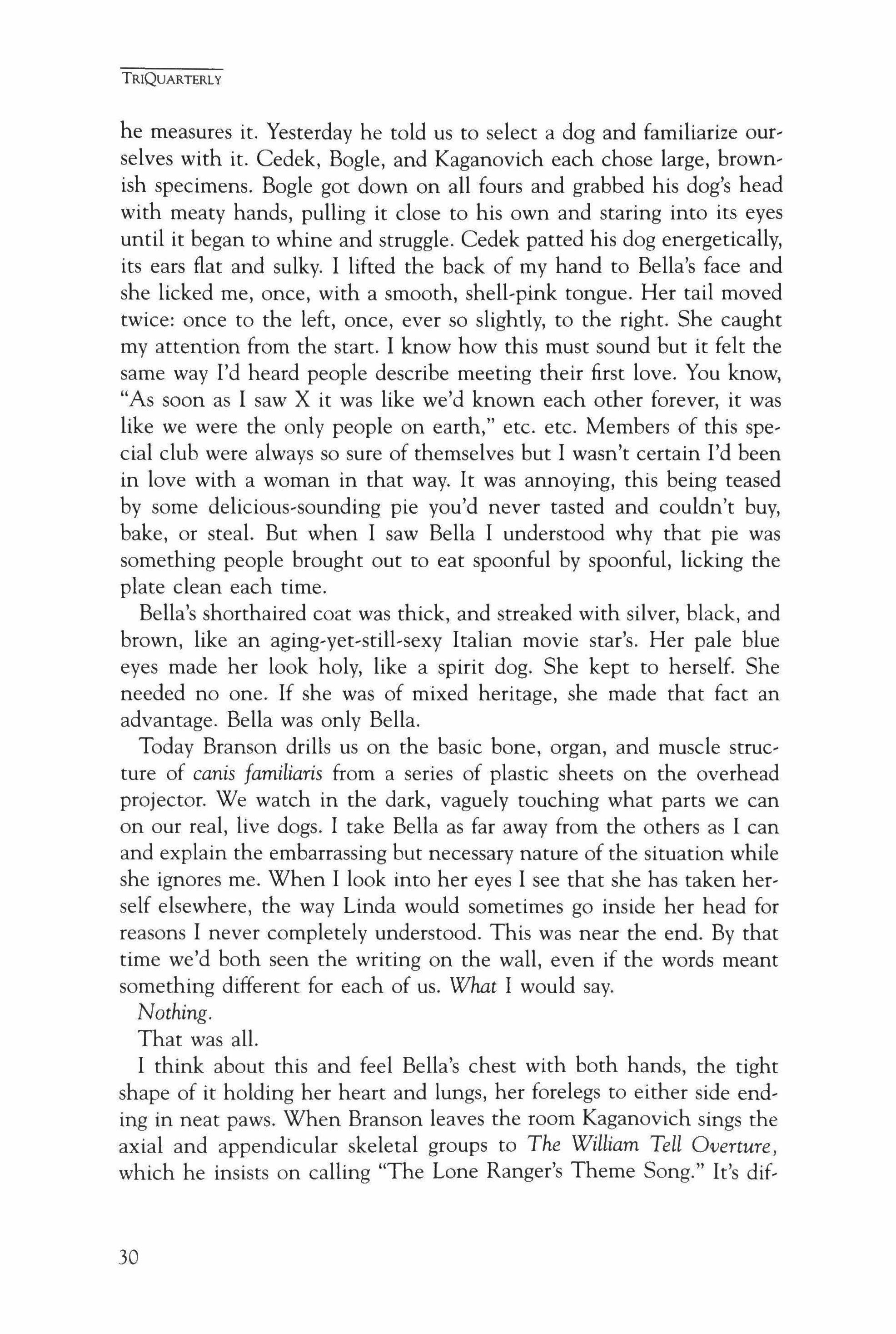
he measures it. Yesterday he told us to select a dog and familiarize our' selves with it. Cedek, Bogle, and Kaganovich each chose large, brown, ish specimens. Bogle got down on all fours and grabbed his dog's head with meaty hands, pulling it close to his own and staring into its eyes until it began to whine and struggle. Cedek patted his dog energetically, its ears flat and sulky. I lifted the back of my hand to Bella's face and she licked me, once, with a smooth, shell-pink tongue. Her tail moved twice: once to the left, once, ever so slightly, to the right. She caught my attention from the start. I know how this must sound but it felt the same way I'd heard people describe meeting their first love. You know, "As soon as I saw X it was like we'd known each other forever, it was like we were the only people on earth," etc. etc. Members of this special club were always so sure of themselves but I wasn't certain I'd been in love with a woman in that way. It was annoying, this being teased by some delicious-sounding pie you'd never tasted and couldn't buy, bake, or steal. But when I saw Bella I understood why that pie was something people brought out to eat spoonful by spoonful, licking the plate clean each time.
Bella's shorthaired coat was thick, and streaked with silver, black, and brown, like an aging-yet-still-sexy Italian movie star's. Her pale blue eyes made her look holy, like a spirit dog. She kept to herself. She needed no one. If she was of mixed heritage, she made that fact an advantage. Bella was only Bella.
Today Branson drills us on the basic bone, organ, and muscle structure of canis familiaris from a series of plastic sheets on the overhead projector. We watch in the dark, vaguely touching what parts we can on our real, live dogs. I take Bella as far away from the others as I can and explain the embarrassing but necessary nature of the situation while she ignores me. When I look into her eyes I see that she has taken herself elsewhere, the way Linda would sometimes go inside her head for reasons I never completely understood. This was near the end. By that time we'd both seen the writing on the wall, even if the words meant something different for each of us. What I would say.
Nothing.
That was all.
I think about this and feel Bella's chest with both hands, the tight shape of it holding her heart and lungs, her forelegs to either side ending in neat paws. When Branson leaves the room Kaganovich sings the axial and appendicular skeletal groups to The William Tell Overture, which he insists on calling "The Lone Ranger's Theme Song." It's dif-
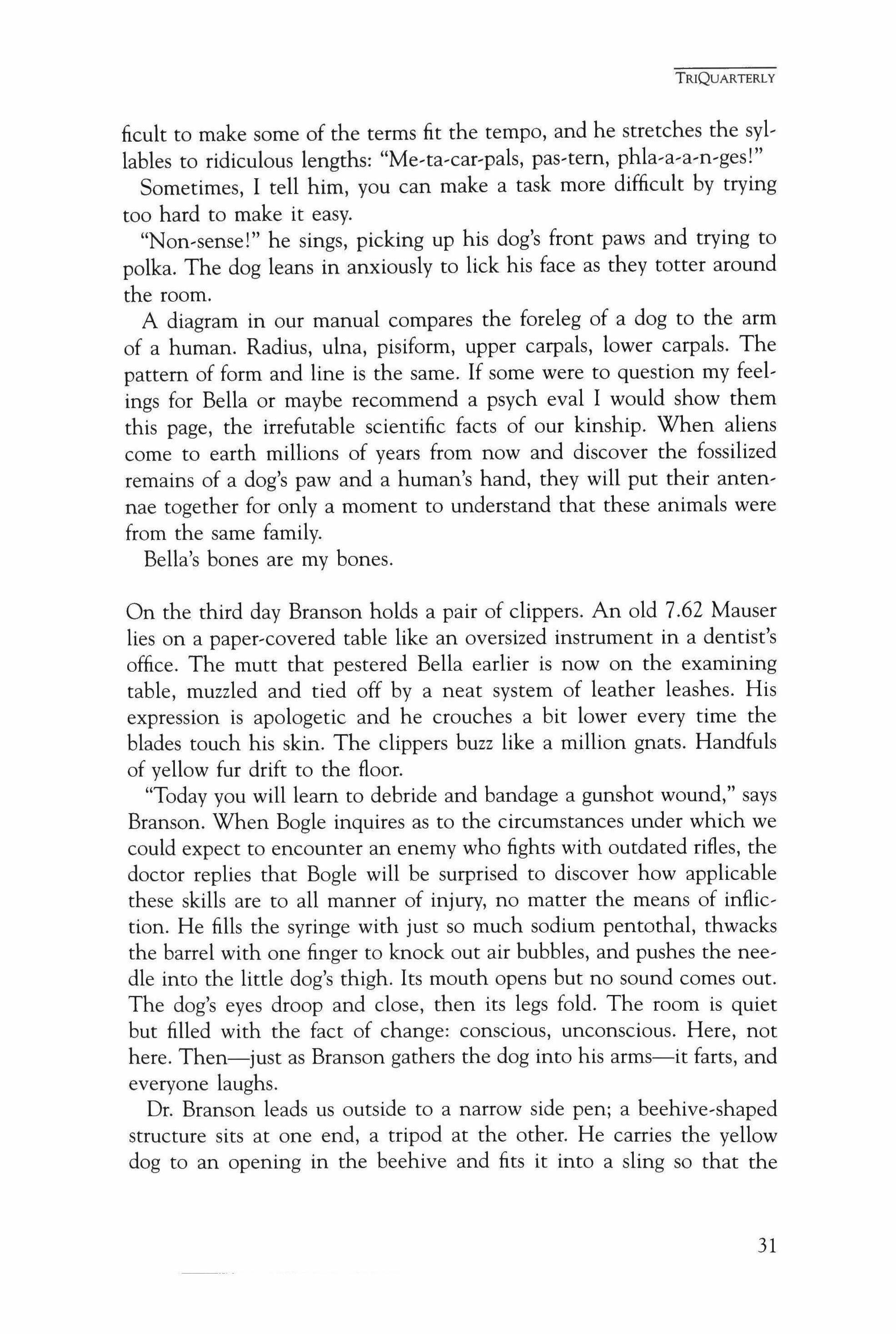
ficult to make some of the terms fit the tempo, and he stretches the syllables to ridiculous lengths: "Me-ta-car-pals, pas-tern, phla-a-a-n-ges!"
Sometimes, I tell him, you can make a task more difficult by trying too hard to make it easy.
"Non-sense!" he sings, picking up his dog's front paws and trying to polka. The dog leans in anxiously to lick his face as they totter around the room.
A diagram in our manual compares the foreleg of a dog to the arm of a human. Radius, ulna, pisiform, upper carpals, lower carpals. The pattern of form and line is the same. If some were to question my feelings for Bella or maybe recommend a psych eval I would show them this page, the irrefutable scientific facts of our kinship. When aliens come to earth millions of years from now and discover the fossilized remains of a dog's paw and a human's hand, they will put their antennae together for only a moment to understand that these animals were from the same family.
Bella's bones are my bones.
On the third day Branson holds a pair of clippers. An old 7.62 Mauser lies on a paper-covered table like an oversized instrument in a dentist's office. The mutt that pestered Bella earlier is now on the examining table, muzzled and tied off by a neat system of leather leashes. His expression is apologetic and he crouches a bit lower every time the blades touch his skin. The clippers buzz like a million gnats. Handfuls of yellow fur drift to the floor.
"Today you will learn to debride and bandage a gunshot wound," says Branson. When Bogle inquires as to the circumstances under which we could expect to encounter an enemy who fights with outdated rifles, the doctor replies that Bogle will be surprised to discover how applicable these skills are to all manner of injury, no matter the means of infliction. He fills the syringe with just so much sodium pentothal, thwacks the barrel with one finger to knock out air bubbles, and pushes the needle into the little dog's thigh. Its mouth opens but no sound comes out. The dog's eyes droop and close, then its legs fold. The room is quiet but filled with the fact of change: conscious, unconscious. Here, not here. Then-just as Branson gathers the dog into his arms-it farts, and everyone laughs.
Dr. Branson leads us outside to a narrow side pen; a beehive-shaped structure sits at one end, a tripod at the other. He carries the yellow dog to an opening in the beehive and fits it into a sling so that the
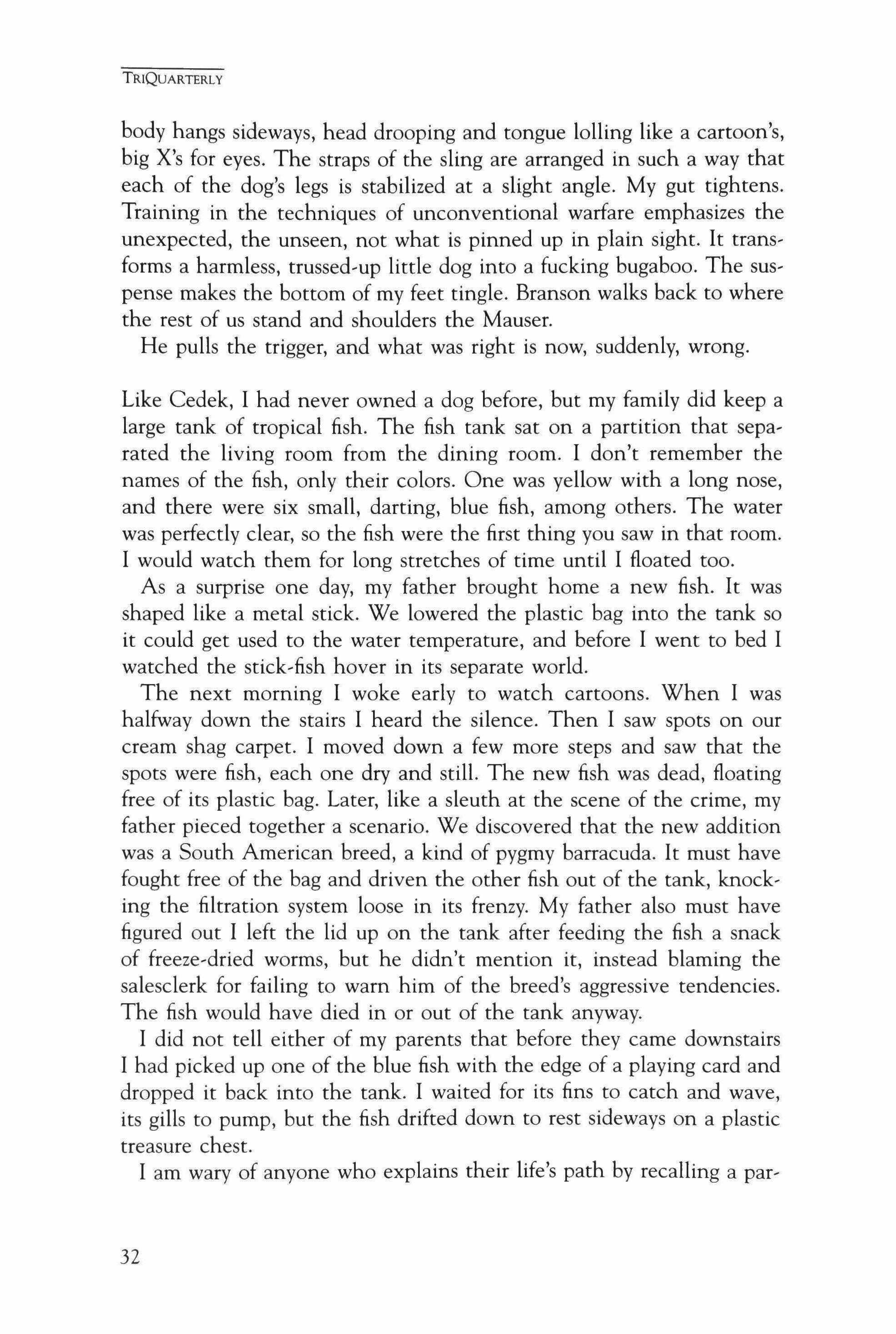
body hangs sideways, head drooping and tongue lolling like a cartoon's, big X's for eyes. The straps of the sling are arranged in such a way that each of the dog's legs is stabilized at a slight angle. My gut tightens. Training in the techniques of unconventional warfare emphasizes the unexpected, the unseen, not what is pinned up in plain sight. It transforms a harmless, trussed-up little dog into a fucking bugaboo. The suspense makes the bottom of my feet tingle. Branson walks back to where the rest of us stand and shoulders the Mauser.
He pulls the trigger, and what was right is now, suddenly, wrong.
Like Cedek, I had never owned a dog before, but my family did keep a large tank of tropical fish. The fish tank sat on a partition that separated the living room from the dining room. I don't remember the names of the fish, only their colors. One was yellow with a long nose, and there were six small, darting, blue fish, among others. The water was perfectly clear, so the fish were the first thing you saw in that room. I would watch them for long stretches of time until I floated too.
As a surprise one day, my father brought home a new fish. It was shaped like a metal stick. We lowered the plastic bag into the tank so it could get used to the water temperature, and before I went to bed I watched the stick-fish hover in its separate world.
The next morning I woke early to watch cartoons. When I was halfway down the stairs I heard the silence. Then I saw spots on our cream shag carpet. I moved down a few more steps and saw that the spots were fish, each one dry and still. The new fish was dead, floating free of its plastic bag. Later, like a sleuth at the scene of the crime, my father pieced together a scenario. We discovered that the new addition was a South American breed, a kind of pygmy barracuda. It must have fought free of the bag and driven the other fish out of the tank, knocking the filtration system loose in its frenzy. My father also must have figured out I left the lid up on the tank after feeding the fish a snack of freeze-dried worms, but he didn't mention it, instead blaming the salesclerk for failing to warn him of the breed's aggressive tendencies. The fish would have died in or out of the tank anyway.
I did not tell either of my parents that before they came downstairs I had picked up one of the blue fish with the edge of a playing card and dropped it back into the tank. I waited for its fins to catch and wave, its gills to pump, but the fish drifted down to rest sideways on a plastic treasure chest.
I am wary of anyone who explains their life's path by recalling a par-
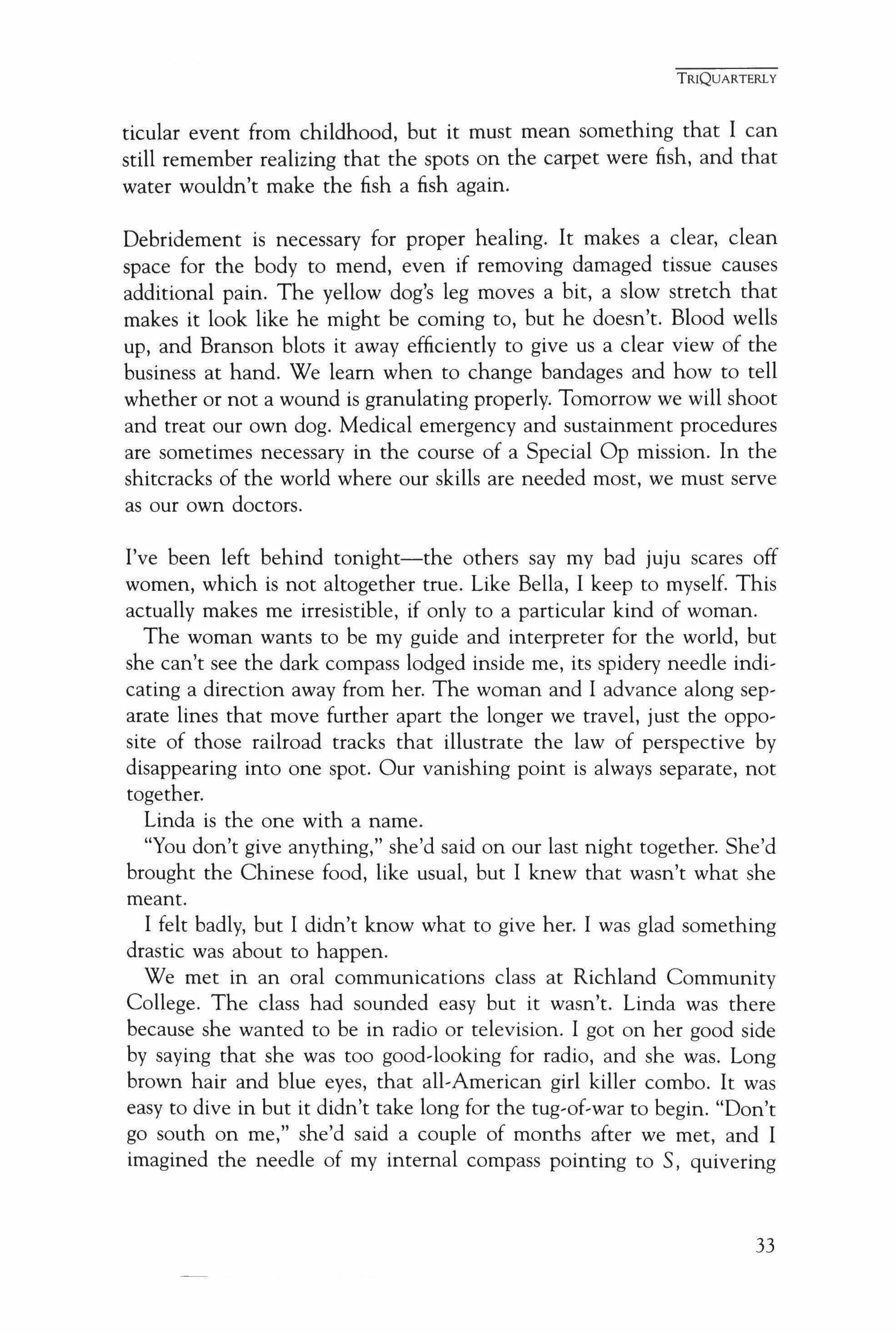
ticular event from childhood, but it must mean something that I can still remember realizing that the spots on the carpet were fish, and that water wouldn't make the fish a fish again.
Debridement is necessary for proper healing. It makes a clear, clean space for the body to mend, even if removing damaged tissue causes additional pain. The yellow dog's leg moves a bit, a slow stretch that makes it look like he might be coming to, but he doesn't. Blood wells up, and Branson blots it away efficiently to give us a clear view of the business at hand. We learn when to change bandages and how to tell whether or not a wound is granulating properly. Tomorrow we will shoot and treat our own dog. Medical emergency and sustainment procedures are sometimes necessary in the course of a Special Op mission. In the shitcracks of the world where our skills are needed most, we must serve as our own doctors.
I've been left behind tonight-the others say my bad juju scares off women, which is not altogether true. Like Bella, I keep to myself. This actually makes me irresistible, if only to a particular kind of woman.
The woman wants to be my guide and interpreter for the world, but she can't see the dark compass lodged inside me, its spidery needle indieating a direction away from her. The woman and I advance along separate lines that move further apart the longer we travel, just the opposite of those railroad tracks that illustrate the law of perspective by disappearing into one spot. Our vanishing point is always separate, not together.
Linda is the one with a name.
"You don't give anything," she'd said on our last night together. She'd brought the Chinese food, like usual, but I knew that wasn't what she meant.
I felt badly, but I didn't know what to give her. I was glad something drastic was about to happen.
We met in an oral communications class at Richland Community College. The class had sounded easy but it wasn't. Linda was there because she wanted to be in radio or television. I got on her good side by saying that she was too good-looking for radio, and she was. Long brown hair and blue eyes, that all-American girl killer combo. It was easy to dive in but it didn't take long for the tug-of-war to begin. "Don't go south on me," she'd said a couple of months after we met, and I imagined the needle of my internal compass pointing to S, quivering
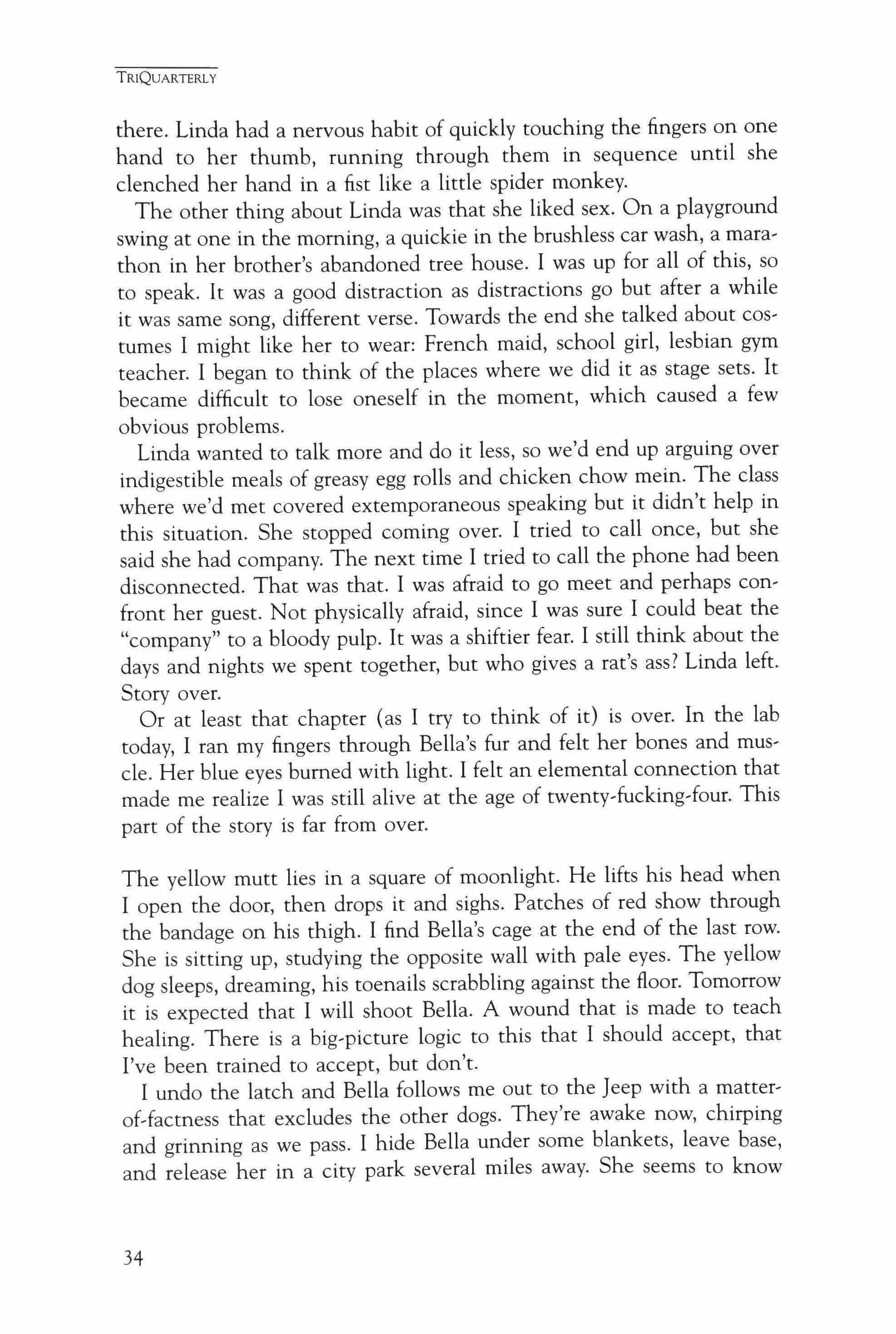
there. Linda had a nervous habit of quickly touching the fingers on one hand to her thumb, running through them in sequence until she clenched her hand in a fist like a little spider monkey.
The other thing about Linda was that she liked sex. On a playground swing at one in the morning, a quickie in the brushless car wash, a marathon in her brother's abandoned tree house. I was up for all of this, so to speak. It was a good distraction as distractions go but after a while it was same song, different verse. Towards the end she talked about costumes I might like her to wear: French maid, school girl, lesbian gym teacher. I began to think of the places where we did it as stage sets. It became difficult to lose oneself in the moment, which caused a few obvious problems.
Linda wanted to talk more and do it less, so we'd end up arguing over indigestible meals of greasy egg rolls and chicken chow mein. The class where we'd met covered extemporaneous speaking but it didn't help in this situation. She stopped coming over. I tried to call once, but she said she had company. The next time I tried to call the phone had been disconnected. That was that. I was afraid to go meet and perhaps confront her guest. Not physically afraid, since I was sure I could beat the "company" to a bloody pulp. It was a shiftier fear. I still think about the days and nights we spent together, but who gives a rat's ass? Linda left. Story over.
Or at least that chapter (as I try to think of it) is over. In the lab today, I ran my fingers through Bella's fur and felt her bones and muscle. Her blue eyes burned with light. I felt an elemental connection that made me realize I was still alive at the age of twenty-fucking-four. This part of the story is far from over.
The yellow mutt lies in a square of moonlight. He lifts his head when I open the door, then drops it and sighs. Patches of red show through the bandage on his thigh. I find Bella's cage at the end of the last row. She is sitting up, studying the opposite wall with pale eyes. The yellow dog sleeps, dreaming, his toenails scrabbling against the floor. Tomorrow it is expected that I will shoot Bella. A wound that is made to teach healing. There is a big-picture logic to this that I should accept, that I've been trained to accept, but don't.
I undo the latch and Bella follows me out to the Jeep with a matterof-factness that excludes the other dogs. They're awake now, chirping and grinning as we pass. I hide Bella under some blankets, leave base, and release her in a city park several miles away. She seems to know
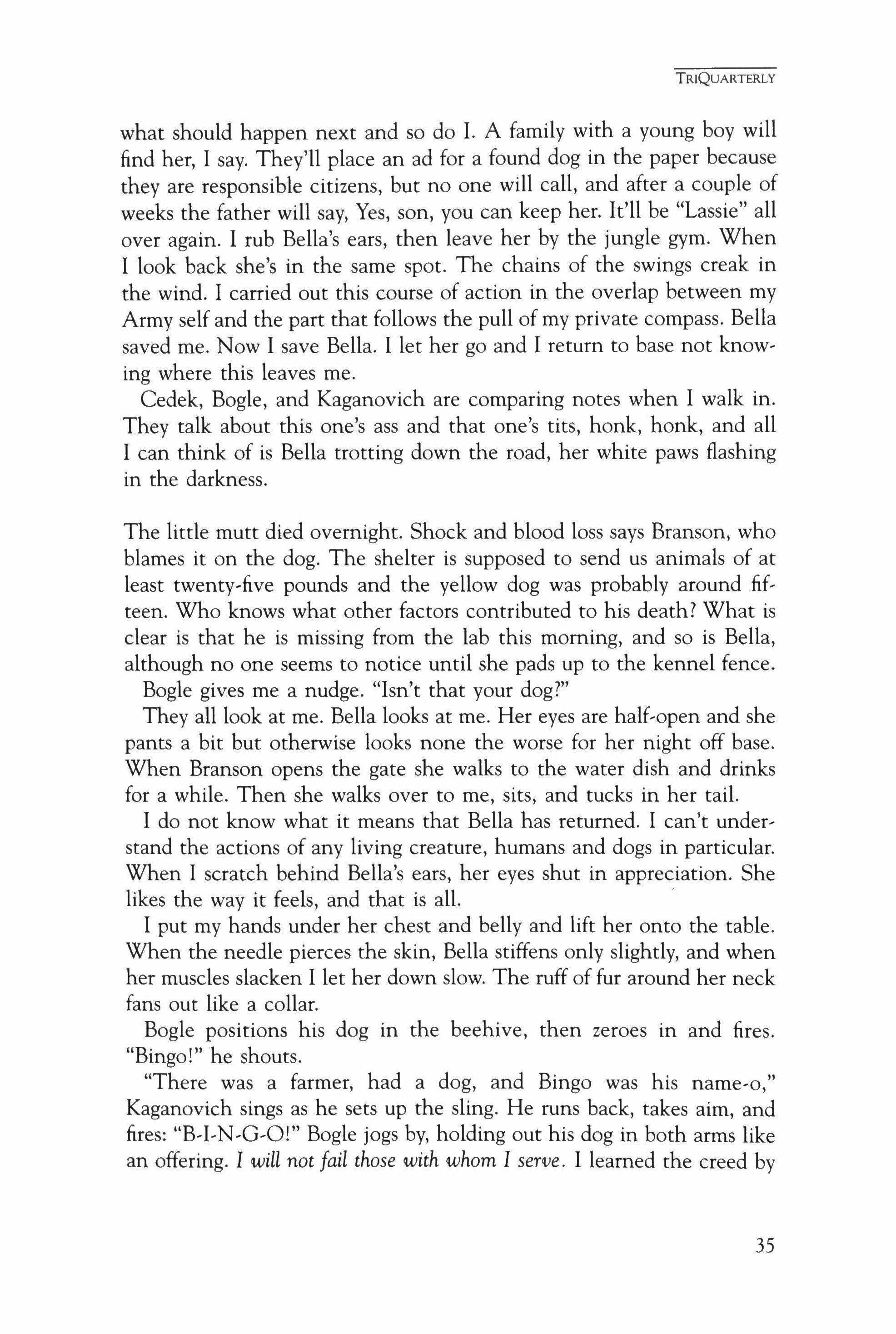
what should happen next and so do I. A family with a young boy will find her, I say. They'll place an ad for a found dog in the paper because they are responsible citizens, but no one will call, and after a couple of weeks the father will say, Yes, son, you can keep her. It'll be "Lassie" all over again. I rub Bella's ears, then leave her by the jungle gym. When I look back she's in the same spot. The chains of the swings creak in the wind. I carried out this course of action in the overlap between my Army self and the part that follows the pull of my private compass. Bella saved me. Now I save Bella. I let her go and I return to base not knowing where this leaves me.
Cedek, Bogle, and Kaganovich are comparing notes when I walk in. They talk about this one's ass and that one's tits, honk, honk, and all I can think of is Bella trotting down the road, her white paws flashing in the darkness.
The little mutt died overnight. Shock and blood loss says Branson, who blames it on the dog. The shelter is supposed to send us animals of at least twenty-five pounds and the yellow dog was probably around fifteen. Who knows what other factors contributed to his death? What is clear is that he is missing from the lab this morning, and so is Bella, although no one seems to notice until she pads up to the kennel fence.
Bogle gives me a nudge. "Isn't that your dog?"
They all look at me. Bella looks at me. Her eyes are half-open and she pants a bit but otherwise looks none the worse for her night off base. When Branson opens the gate she walks to the water dish and drinks for a while. Then she walks over to me, sits, and tucks in her tail.
I do not know what it means that Bella has returned. I can't understand the actions of any living creature, humans and dogs in particular. When I scratch behind Bella's ears, her eyes shut in appreciation. She likes the way it feels, and that is all.
I put my hands under her chest and belly and lift her onto the table. When the needle pierces the skin, Bella stiffens only slightly, and when her muscles slacken I let her down slow. The ruff of fur around her neck fans out like a collar.
Bogle positions his dog in the beehive, then zeroes in and fires. "Bingo!" he shouts.
"There was a farmer, had a dog, and Bingo was his name-o," Kaganovich sings as he sets up the sling. He runs back, takes aim, and fires: "B-I-N-G-O!" Bogle jogs by, holding out his dog in both arms like an offering. I will not fail those with whom I serve. I learned the creed by
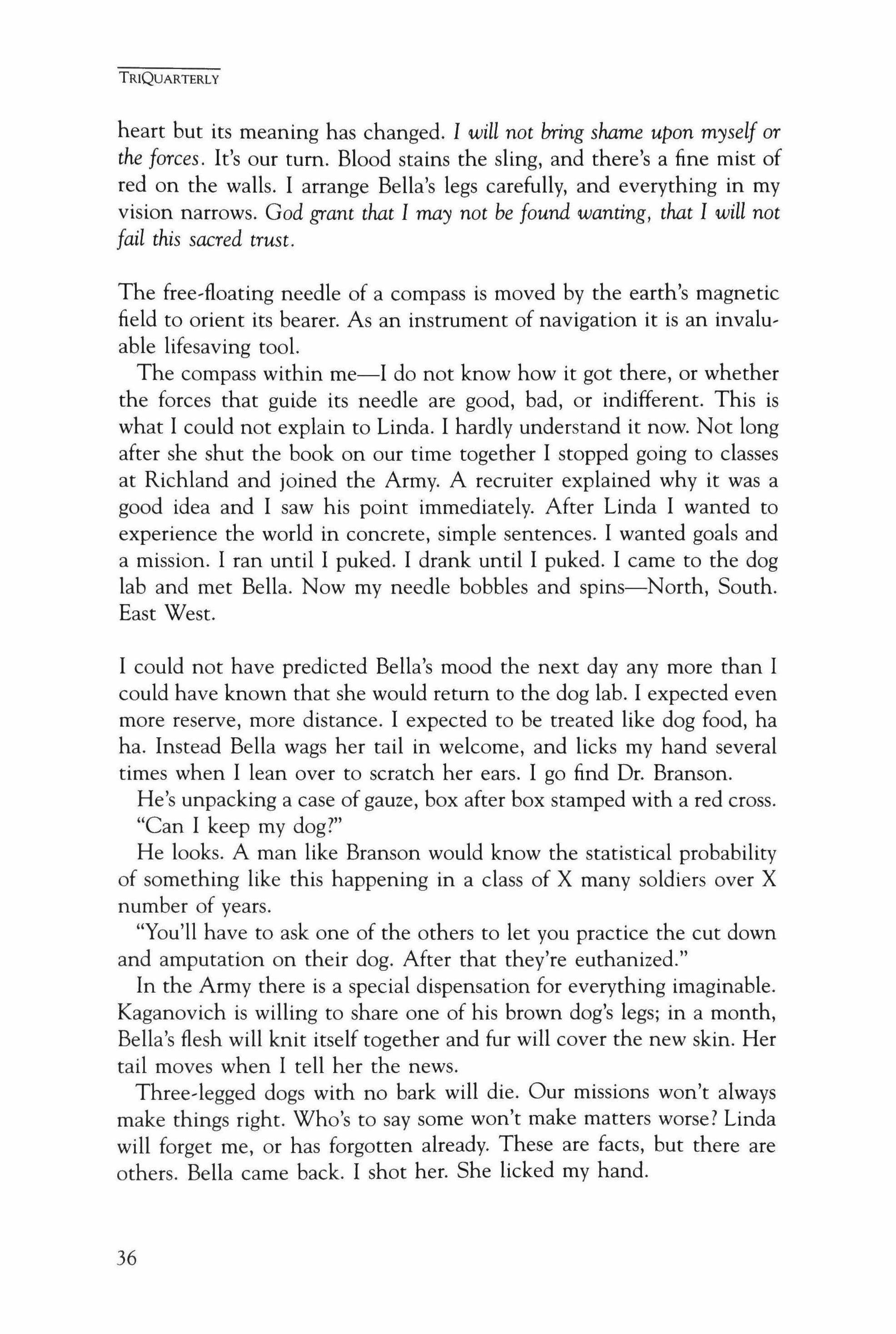
heart but its meaning has changed. I will not bring shame upon myself or the forces. It's our tum. Blood stains the sling, and there's a fine mist of red on the walls. I arrange Bella's legs carefully, and everything in my vision narrows. God grant that I may not be found wanting, that I will not fail this sacred trust.
The free,floating needle of a compass is moved by the earth's magnetic field to orient its bearer. As an instrument of navigation it is an invaluable lifesaving tool.
The compass within me-I do not know how it got there, or whether the forces that guide its needle are good, bad, or indifferent. This is what I could not explain to Linda. I hardly understand it now. Not long after she shut the book on our time together I stopped going to classes at Richland and joined the Army. A recruiter explained why it was a good idea and I saw his point immediately. After Linda I wanted to experience the world in concrete, simple sentences. I wanted goals and a mission. I ran until I puked. I drank until I puked. I came to the dog lab and met Bella. Now my needle bobbles and spins-North, South. East West.
I could not have predicted Bella's mood the next day any more than I could have known that she would return to the dog lab. I expected even more reserve, more distance. I expected to be treated like dog food, ha ha. Instead Bella wags her tail in welcome, and licks my hand several times when I lean over to scratch her ears. I go find Dr. Branson.
He's unpacking a case of gauze, box after box stamped with a red cross.
"Can I keep my dog?"
He looks. A man like Branson would know the statistical probability of something like this happening in a class of X many soldiers over X number of years.
"You'll have to ask one of the others to let you practice the cut down and amputation on their dog. After that they're euthanized."
In the Army there is a special dispensation for everything imaginable. Kaganovich is willing to share one of his brown dog's legs; in a month, Bella's flesh will knit itself together and fur will cover the new skin. Her tail moves when I tell her the news.
Three-legged dogs with no bark will die. Our missions won't always make things right. Who's to say some won't make matters worse? Linda will forget me, or has forgotten already. These are facts, but there are others. Bella came back. I shot her. She licked my hand.

Where crows gather in military V's to stitch the unhealable wound of sky. They spiral into Lake Ranson Canyon before dusk, their cries echoing on caliche, abandon. Start here, where fields of cotton mop the caprock dust that released at your birth.
The oily road leads you to wildflower graves, then back to this dust suspended in the sunset at your feet. Will this much dust be miraculous, splintered earth in air? When it settles, wipe it off the carhood as if this weren't Texan desert but what will seem impossible, what will never stop astonishing.
Spangled. Purple. Ruined. I want the words to get me back to you. The crows ruin my entrance. They sing their spangled ohhhs until the purple night makes foamy ash of you. Because I cannot stop you, I make the sunset envelop you.
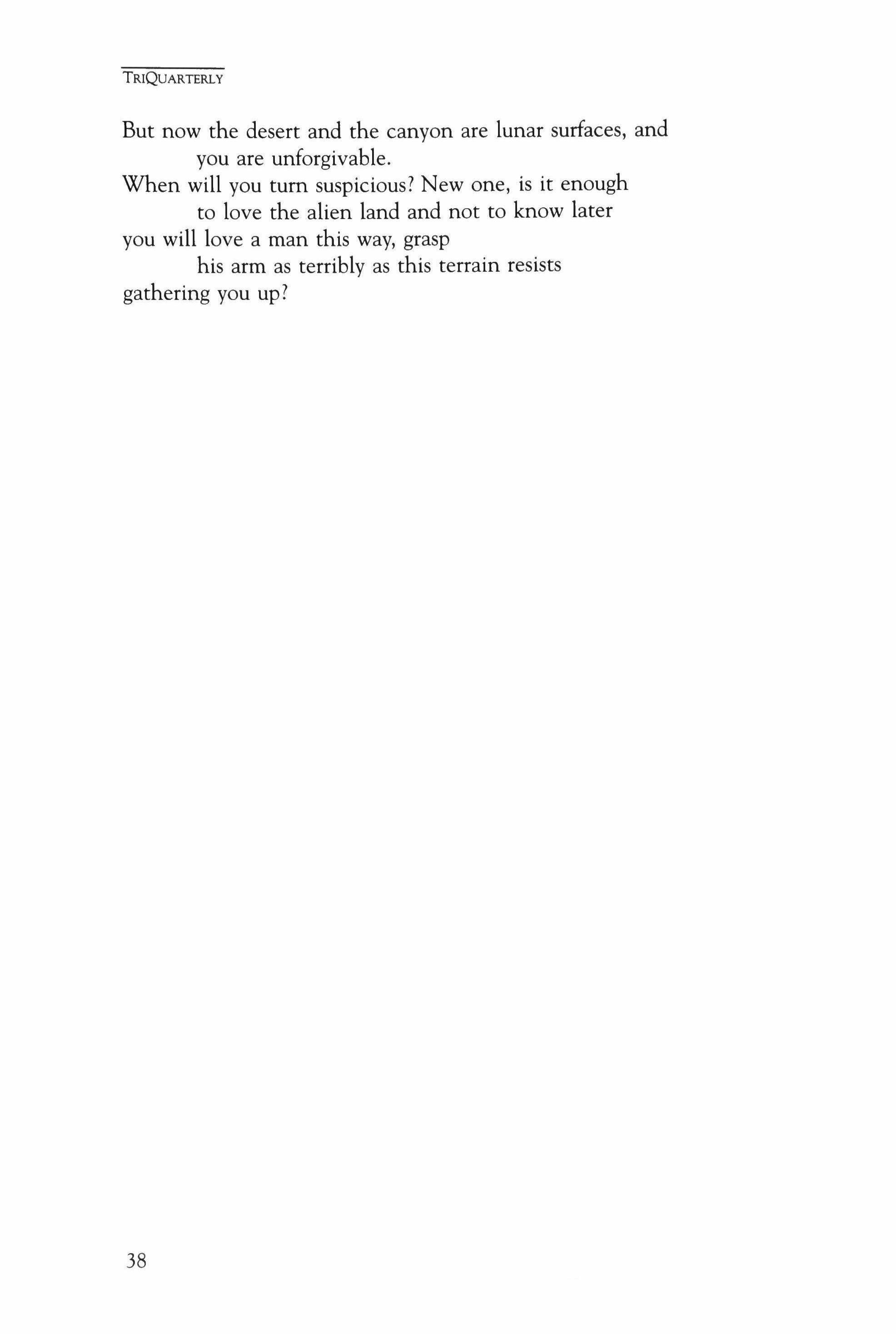
But now the desert and the canyon are lunar surfaces, and you are unforgivable. When will you tum suspicious? New one, is it enough to love the alien land and not to know later you will love a man this way, grasp his arm as terribly as this terrain resists gathering you up?

It's not greed I feel in me, the silver in my pocket slapping my thigh like knives (I know I am about to die) but the knowledge my kiss will betray you, betray me (I welcome this kiss, I want it on my lips, I want to hear its click) when I cup your chin in my hand, when I stare in your eyes (I am frightened by my Father, by my Judas, who comes sheepishly toward me through the crowd of soldiers) I am unsure it could be more full than this moment, I am so fearful of heaven, the grand cacophony of spears jabbing skyward around us, torches blazing light in your face, a redundancy (I love his dark skin and how his robe swings heavy, how he has caught me) They were dirty men to deal with, they hate you, they are jealous (why am I only love?) Find me your truest of all, I could be years but not eternity (please come kiss me) I am drawn towards a destruction (I want to be generous), and if I cry I know you forgave me before they counted coins into my palm (give myself to this inevitable, to someone oblivious in his unasking), before Peter losing his temper (I will replace the ear) Loss is what is irreplaceable (rise to this moment and say, I let you go and be and may you be pleased) So obvious in words (not control of him, not word of him, not hope of him, but permission,) I will kiss the savior (every muscle relaxed now) but I am not the one who matters (I am to be erased, so that I might exist somewhere else, present but) you will push me (like music, no traces of it afterward) gently away, seal us apart (I chose him knowing his love would be painful, would make my heart heavy and anxious for this to pass) and I am not sure how much longer I will linger (Both of us shall be wretched)
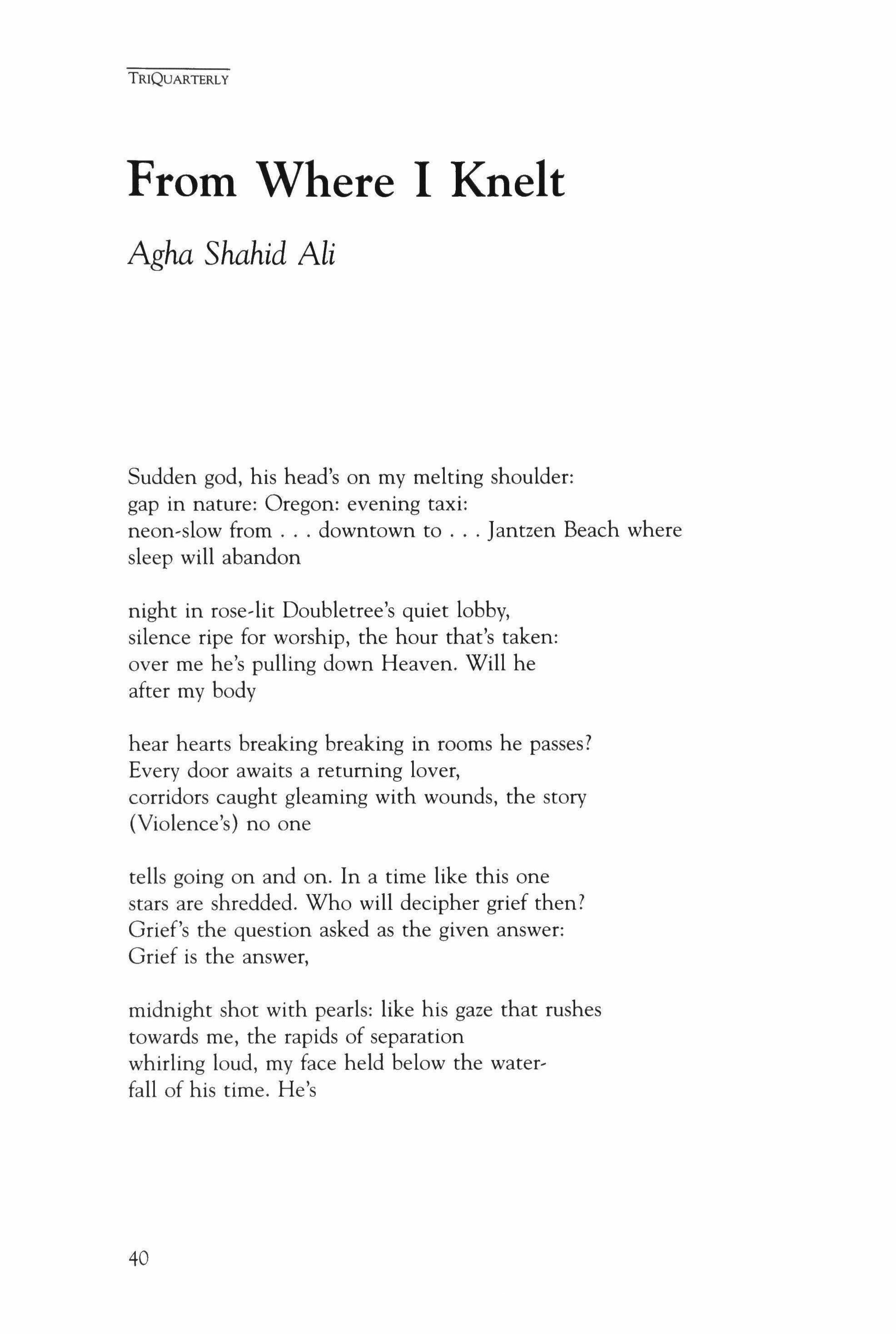
Sudden god, his head's on my melting shoulder: gap in nature: Oregon: evening taxi: neon-slow from downtown to Jantzen Beach where sleep will abandon
night in rose-lit Doubletree's quiet lobby, silence ripe for worship, the hour that's taken: over me he's pulling down Heaven. Will he after my body
hear hearts breaking breaking in rooms he passes? Every door awaits a returning lover, corridors caught gleaming with wounds, the story (Violence's) no one
tells going on and on. In a time like this one stars are shredded. Who will decipher grief then?
Grief's the question asked as the given answer: Grief is the answer,
midnight shot with pearls: like his gaze that rushes towards me, the rapids of separation whirling loud, my face held below the waterfall of his time. He's
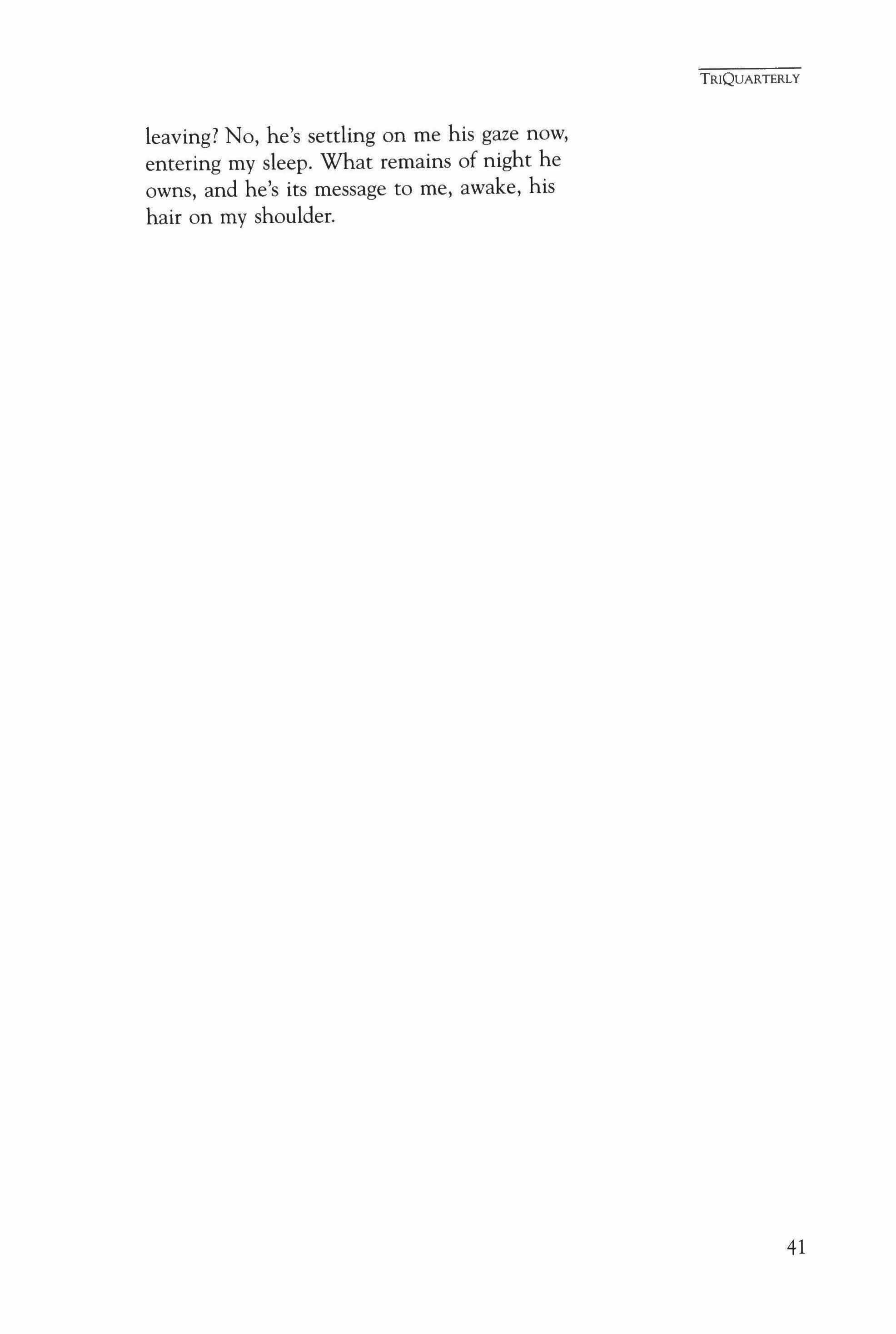
leaving? No, he's settling on me his gaze now, entering my sleep. What remains of night he owns, and he's its message to me, awake, his hair on my shoulder.

In lilacs is reason gone vegetal gone
traceless as light leaving heat in the scalp
fog wants its coastline so wholly and so forth
go the murders on old shale the congress
can't tum away from the ocean a locked office
you can see inside the narrative around pain
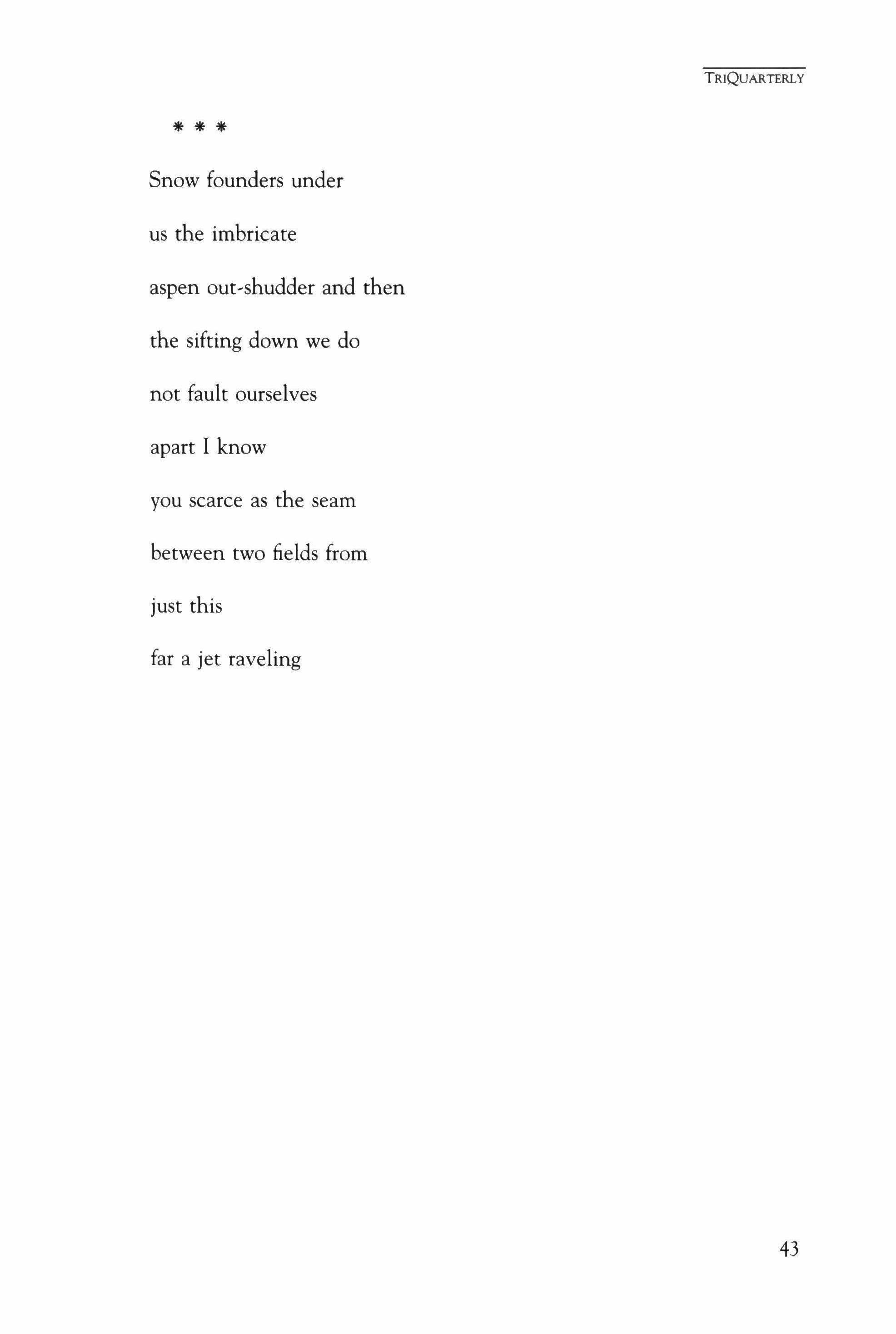
Snow founders under us the imbricate aspen out-shudder and then the sifting down we do not fault ourselves apart I know you scarce as the seam between two fields from just this far a jet raveling
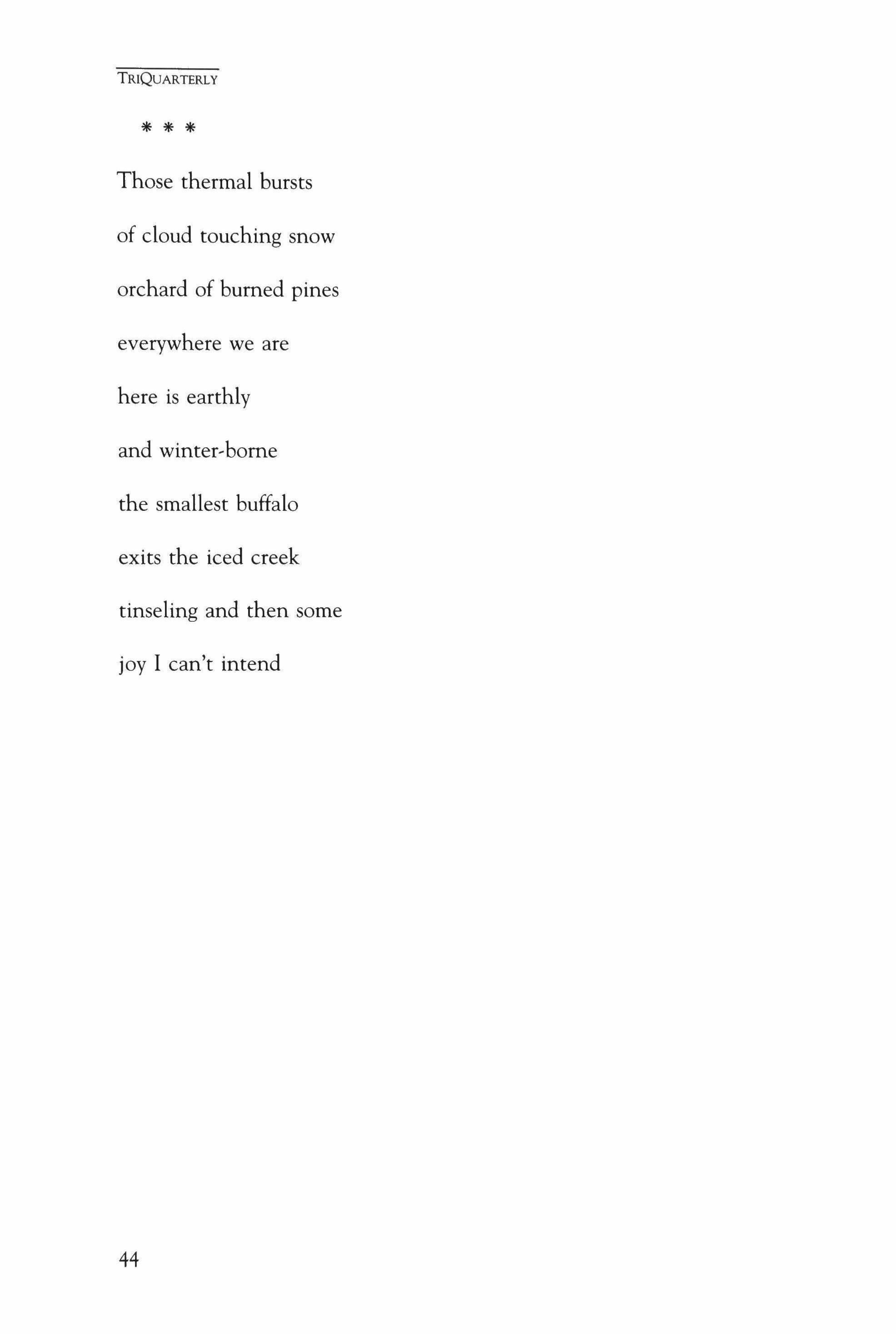
Those thermal bursts of cloud touching snow orchard of burned pines everywhere we are here is earthly and winter-borne the smallest buffalo exits the iced creek tinseling and then some joy I can't intend
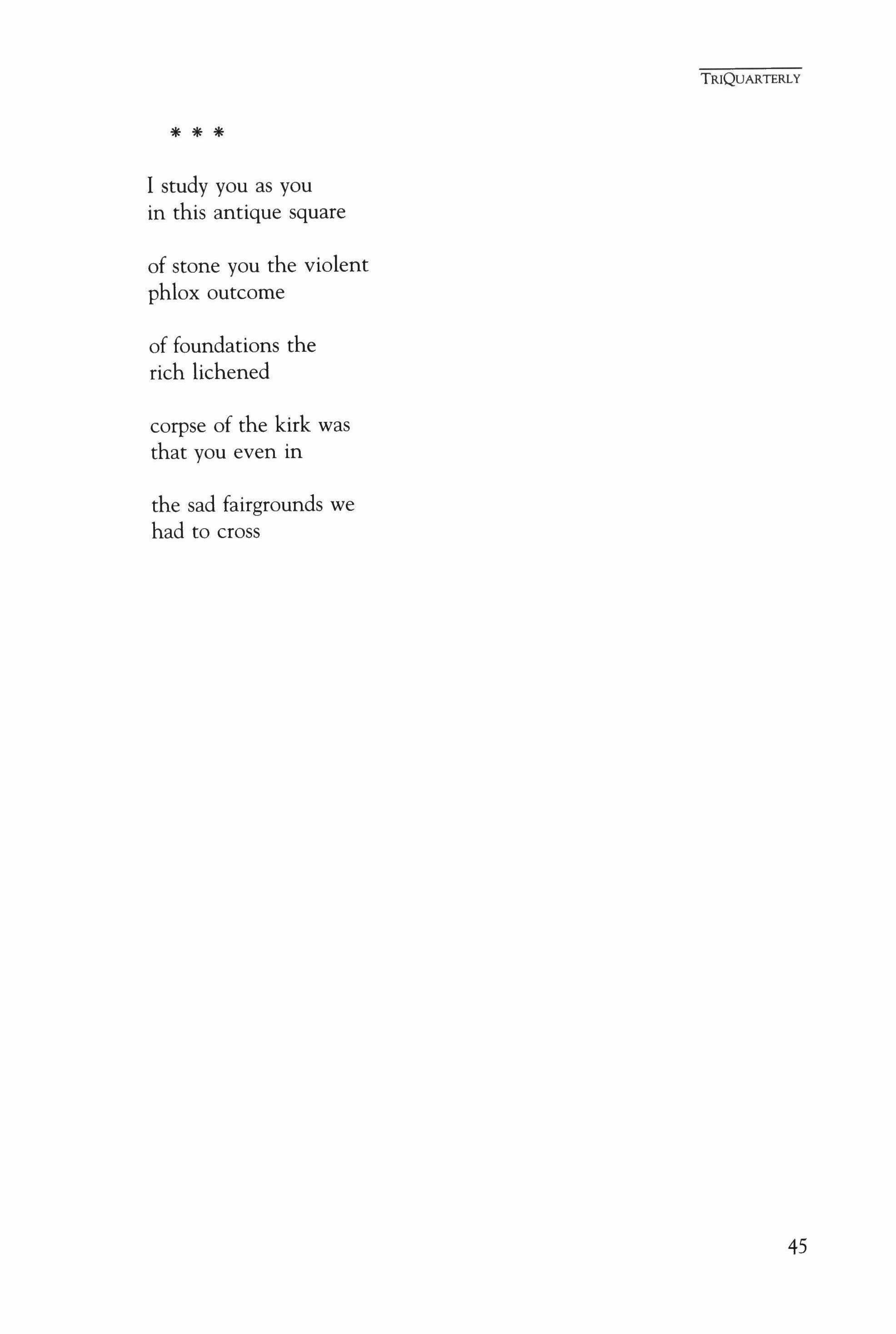
I study you as you in this antique square of stone you the violent phlox outcome of foundations the rich lichened corpse of the kirk was that you even in the sad fairgrounds we had to cross
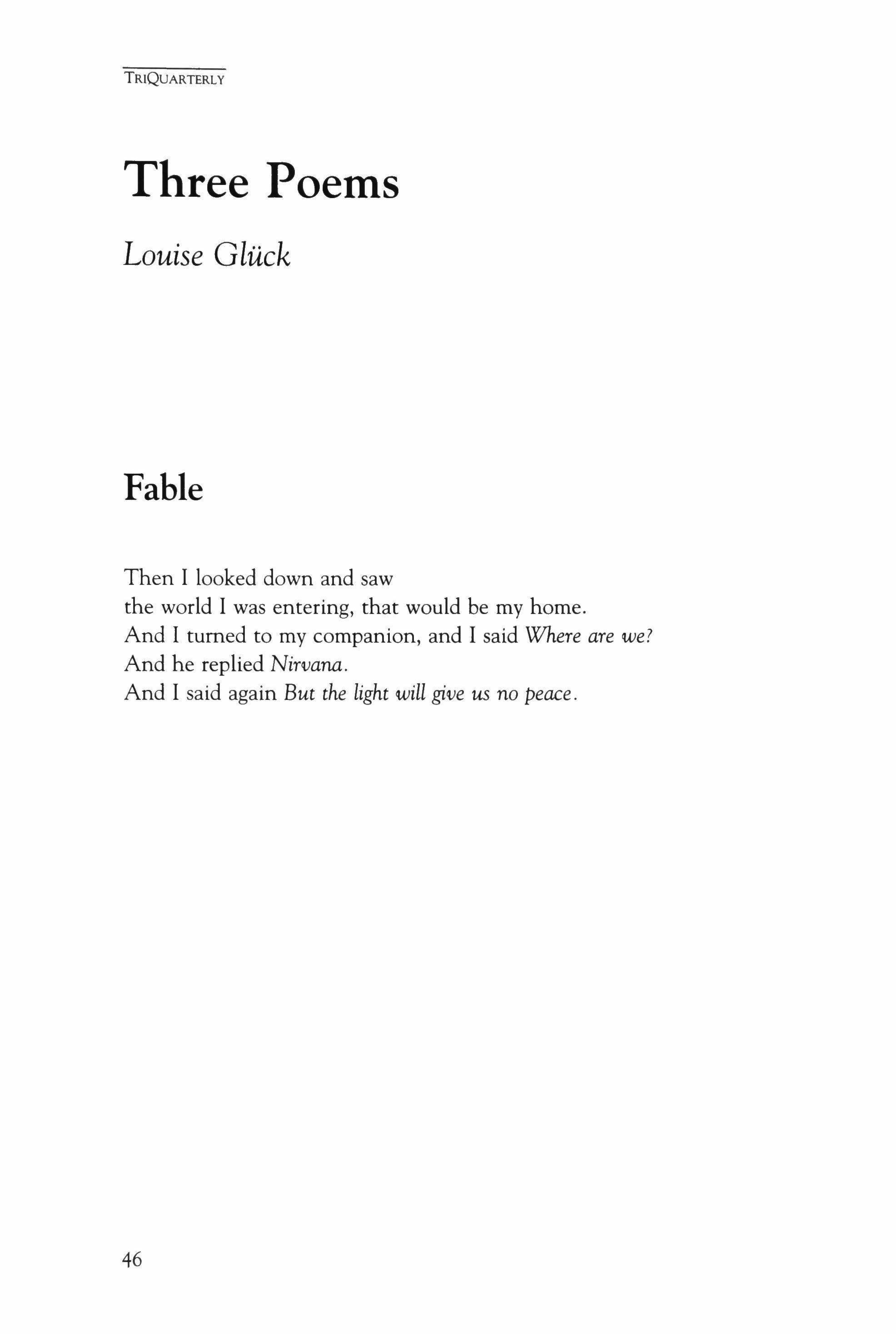
Then I looked down and saw the world I was entering, that would be my home. And I turned to my companion, and I said Where are we? And he replied Nirvana. And I said again But the light will give us no peace.
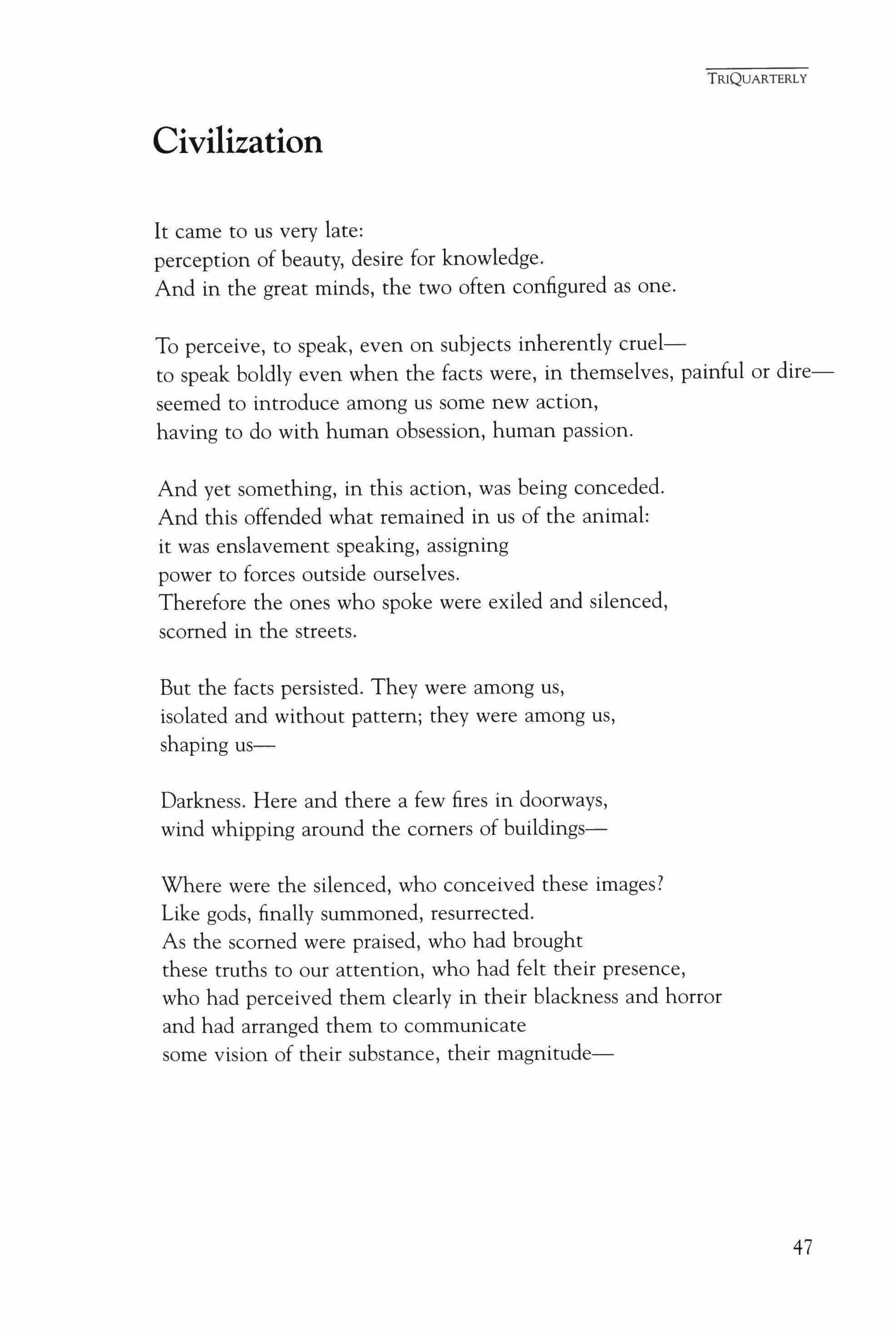
It came to us very late: perception of beauty, desire for knowledge. And in the great minds, the two often configured as one.
To perceive, to speak, even on subjects inherently cruelto speak boldly even when the facts were, in themselves, painful or direseemed to introduce among us some new action, having to do with human obsession, human passion.
And yet something, in this action, was being conceded. And this offended what remained in us of the animal: it was enslavement speaking, assigning power to forces outside ourselves. Therefore the ones who spoke were exiled and silenced, scorned in the streets.
But the facts persisted. They were among us, isolated and without pattern; they were among us, shaping us-
Darkness. Here and there a few fires in doorways, wind whipping around the comers of buildings-
Where were the silenced, who conceived these images? Like gods, finally summoned, resurrected. As the scorned were praised, who had brought these truths to our attention, who had felt their presence, who had perceived them clearly in their blackness and horror and had arranged them to communicate some vision of their substance, their magnitude-
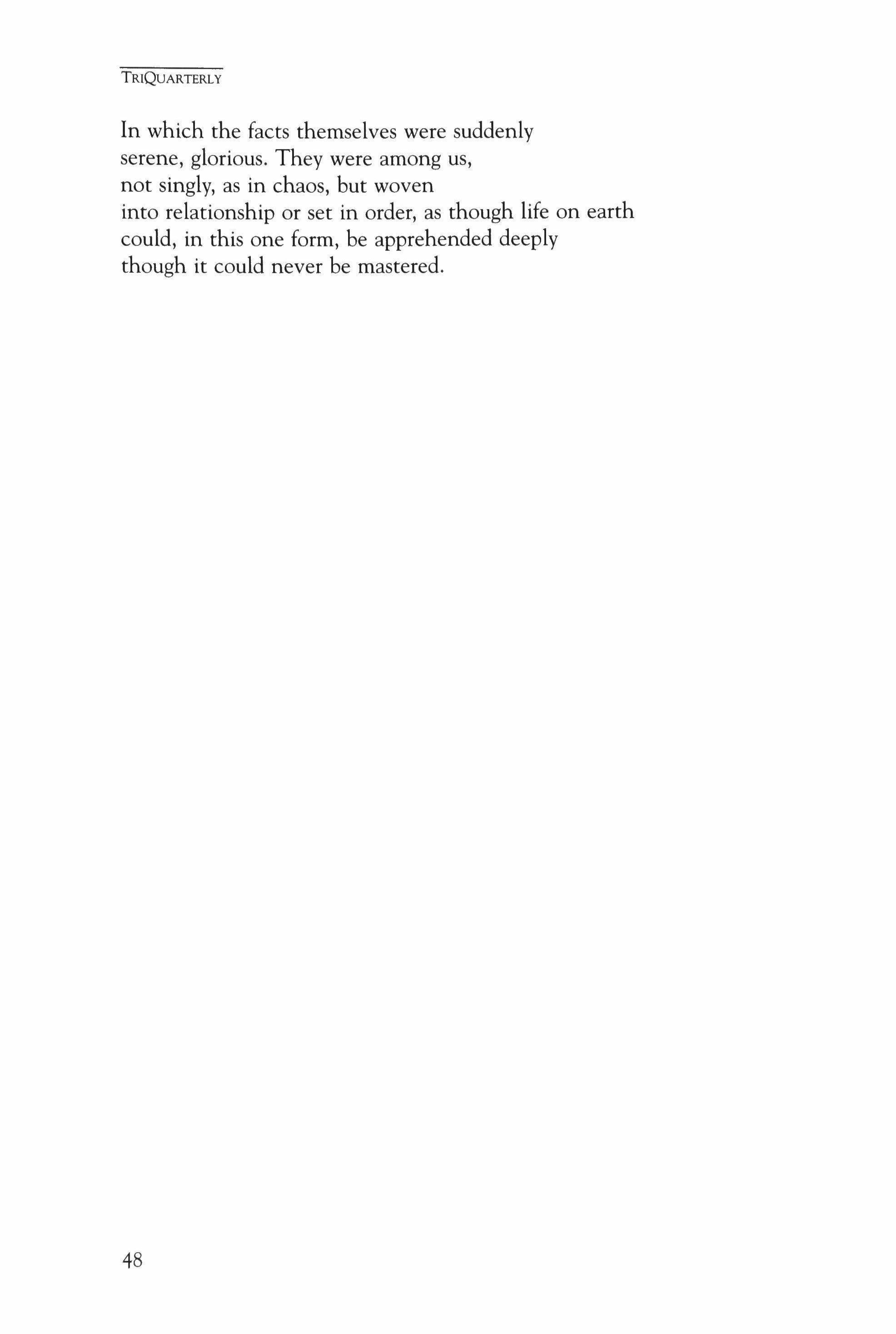
In which the facts themselves were suddenly serene, glorious. They were among us, not singly, as in chaos, but woven into relationship or set in order, as though life on earth could, in this one form, be apprehended deeply though it could never be mastered.
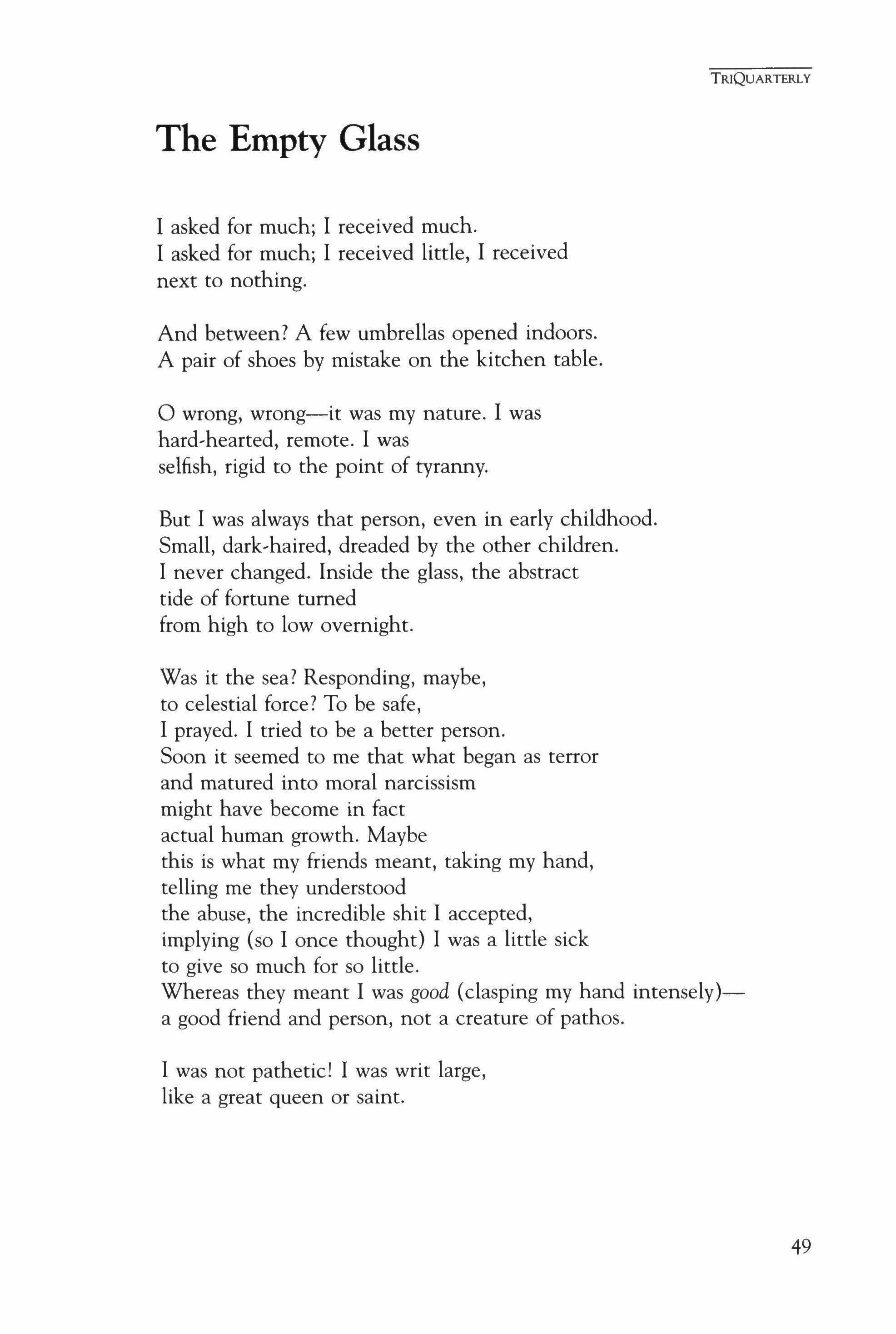
I asked for much; I received much. I asked for much; I received little, I received next to nothing.
And between? A few umbrellas opened indoors. A pair of shoes by mistake on the kitchen table.
o wrong, wrong-it was my nature. I was hard-hearted, remote. I was selfish, rigid to the point of tyranny.
But I was always that person, even in early childhood. Small, dark-haired, dreaded by the other children. I never changed. Inside the glass, the abstract tide of fortune turned from high to low overnight.
Was it the sea? Responding, maybe, to celestial force? To be safe, I prayed. I tried to be a better person. Soon it seemed to me that what began as terror and matured into moral narcissism might have become in fact actual human growth. Maybe this is what my friends meant, taking my hand, telling me they understood the abuse, the incredible shit I accepted, implying (so I once thought) I was a little sick to give so much for so little. Whereas they meant I was good (clasping my hand intensely)a good friend and person, not a creature of pathos.
I was not pathetic! I was writ large, like a great queen or saint.

Well, it all makes for interesting conjecture. And it occurs to me that what is crucial is to believe in effort, to believe some good will come of simply trying, a good completely untainted by the corrupt initiating impulse to persuade or seduce-
What are we without this?
Whirling in the dark universe, alone, afraid, unable to influence fateWhat do we have really?
Sad tricks with ladders and shoes, tricks with salt, impurely motivated recurring attempts to build character. What do we have to appease the great forces?
And I think in the end this was the question that destroyed Agemmemnon, there on the beach, the Greek ships at the ready, the sea invisible beyond the serene harbor, the future lethal, unstable: he was a fool, thinking it could be controlled. He should have said I have nothing, I am at your mercy.
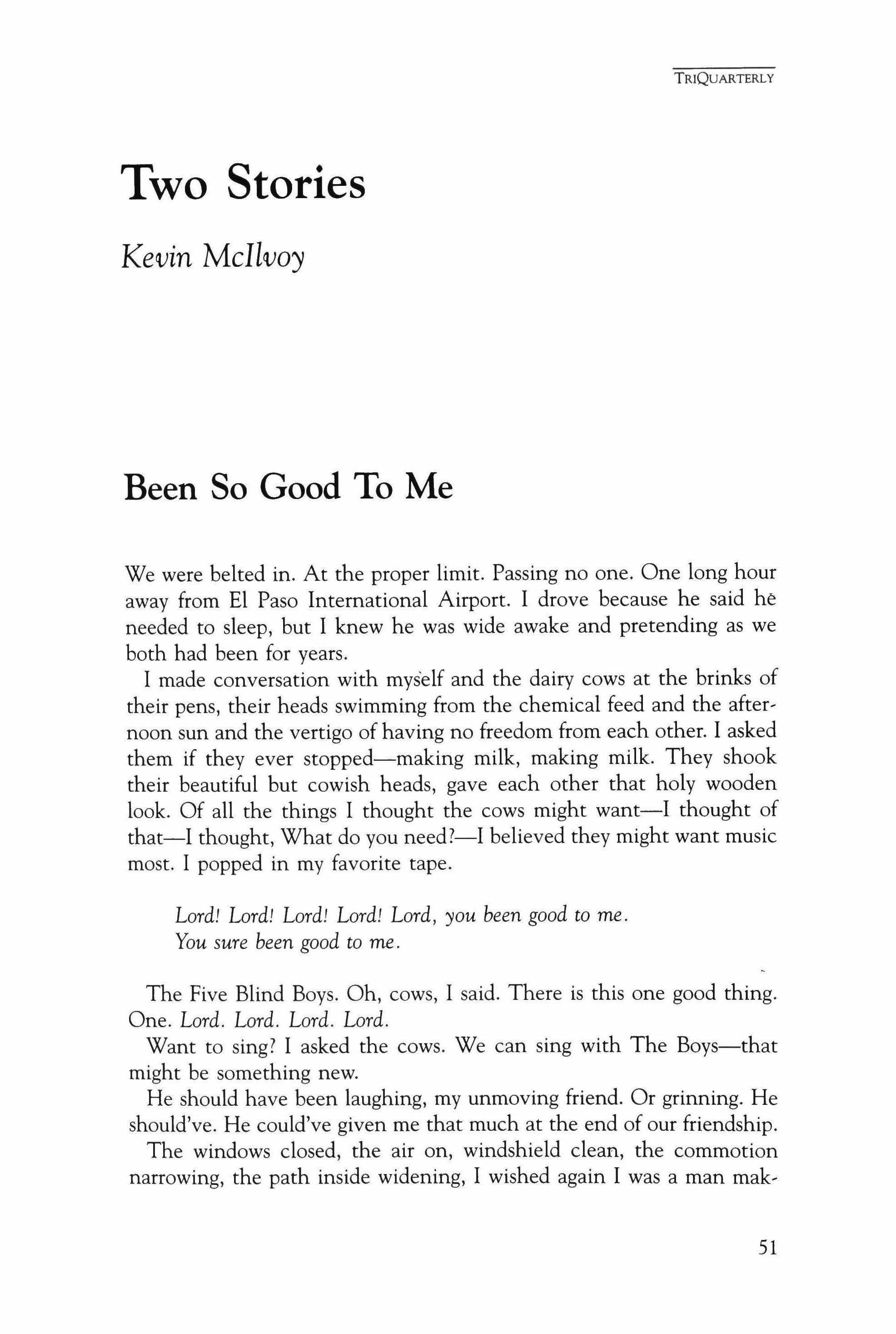
We were belted in. At the proper limit. Passing no one. One long hour away from El Paso International Airport. I drove because he said he needed to sleep, but I knew he was wide awake and pretending as we both had been for years.
I made conversation with myself and the dairy cows at the brinks of their pens, their heads swimming from the chemical feed and the afternoon sun and the vertigo of having no freedom from each other. I asked them if they ever stopped-making milk, making milk. They shook their beautiful but cowish heads, gave each other that holy wooden look. Of all the things I thought the cows might want-I thought of that-I thought, What do you need?-I believed they might want music most. I popped in my favorite tape.
Lord! Lord! Lord! Lord! Lord, you been good to me. You sure been good to me.
The Five Blind Boys. Oh, cows, I said. There is this one good thing. One. Lord. Lord. Lord. Lord.
Want to sing? I asked the cows. We can sing with The Boys-that might be something new.
He should have been laughing, my unmoving friend. Or grinning. He should've. He could've given me that much at the end of our friendship.
The windows closed, the air on, windshield clean, the commotion narrowing, the path inside widening, I wished again I was a man mak-

ing a wish at the well in the heart of my friend. Well, I wished too I had sunglasses like The Five Blind Boys do, and I wished them well wherever they were, at least sixty or seventy, rocking some First African Methodist Episcopal, or making tears flow at a brush arbor funeral, or knocking their own canes at the gates of heaven, the blue sheen of their suits blinding the faithful welcomed, at last, over heaven's borders.
Sure been good to me. Been so good to me.
How, I wanted to know, are men with the same thirst brought together, gathering other thirsting men around them? How do five blind boys find each other? At what school? At what old pine shack or glory tent pitched on what small town's outskirts? Which one cast his voice out first to bring in what he couldn't see, and then felt that bellstrike on his face, another boy singing. What age were they then? Seven or eight? Two of them searching out the vacant field, climbing the gum tree there in the hot sun and singing all the way up.
It makes no difference a�what you sayI'm a-gou: on my knees and pray-
Never calling it practice, but singing away and over and over, practicing more at the top, dawn fire and dusk on their faces and in the star-shaped leaves on the fingers of the branches.
And I'm gonna wait-s-a-wait. right hereUntil he comes.
And the two decided there should be a third for some belly to go with the heart and head.
He's my rock, my sword, my shieldHe's my wheel in the middle of the world-
Boys, their worried parents asked. Think. Where'll it lead? It led them into the tree. Hands clasped into stirrups, shoulders made into steps to launch each other up. They smelled the tree pitch and each other's intermixed sweat, and laughed at the stink. The new boy asked, When do we sing?
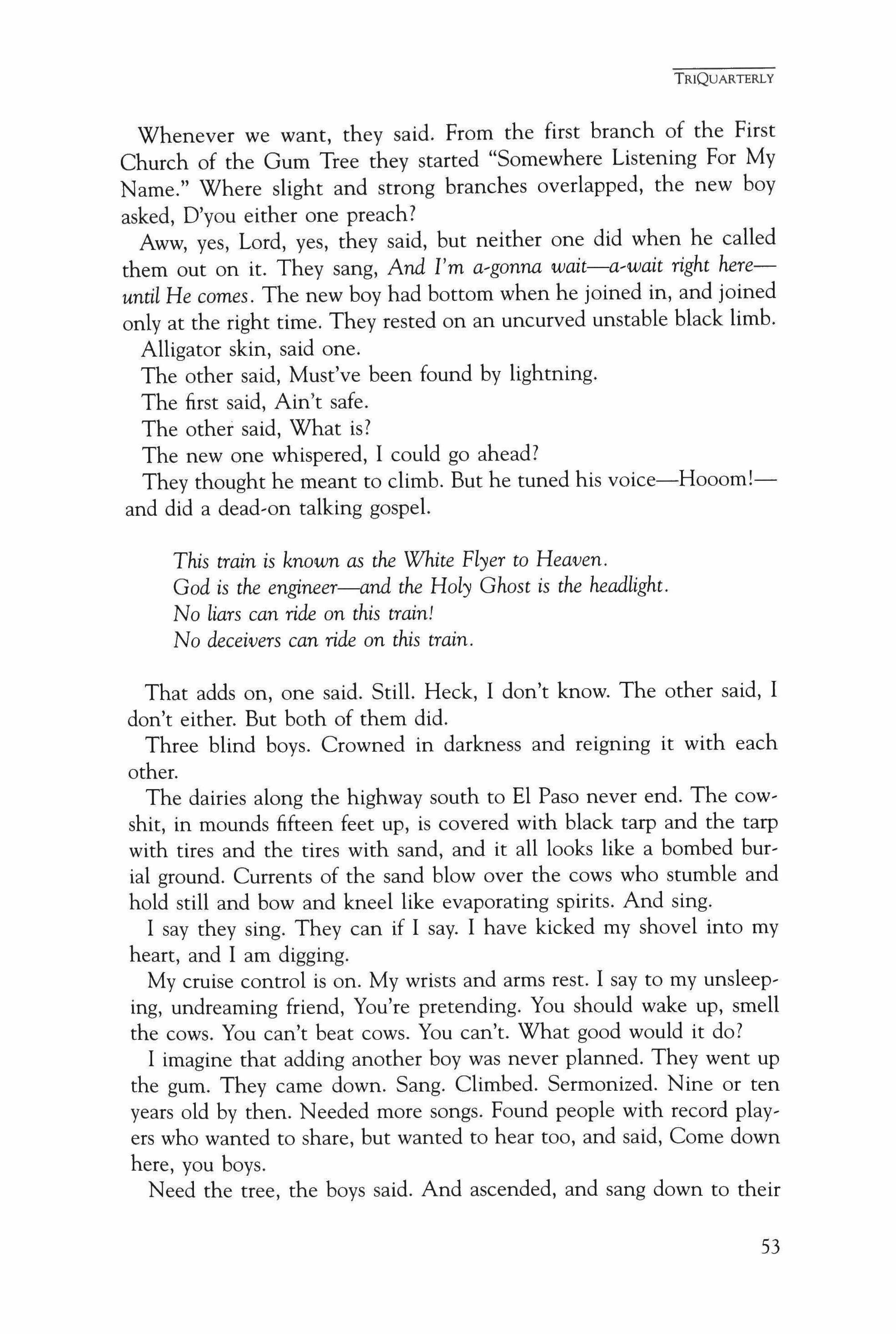
Whenever we want, they said. From the first branch of the First Church of the Gum Tree they started "Somewhere Listening For My Name." Where slight and strong branches overlapped, the new boy asked, D'you either one preach?
Aww, yes, Lord, yes, they said, but neither one did when he called them out on it. They sang, And I'm a�gonna wait-a�wait right hereuntil He comes. The new boy had bottom when he joined in, and joined only at the right time. They rested on an uncurved unstable black limb.
Alligator skin, said one.
The other said, Must've been found by lightning.
The first said, Ain't safe.
The other said, What is?
The new one whispered, I could go ahead?
They thought he meant to climb. But he tuned his voice-Hooom!and did a dead-on talking gospel.
This train is known as the White Flyer to Heaven. God is the engineer-and the Holy Ghost is the headlight. No liars can ride on this train! No deceivers can ride on this train.
That adds on, one said. Still. Heck, I don't know. The other said, I don't either. But both of them did.
Three blind boys. Crowned in darkness and reigning it with each other.
The dairies along the highway south to El Paso never end. The cowshit, in mounds fifteen feet up, is covered with black tarp and the tarp with tires and the tires with sand, and it all looks like a bombed burial ground. Currents of the sand blow over the cows who stumble and hold still and bow and kneel like evaporating spirits. And sing.
I say they sing. They can if I say. I have kicked my shovel into my heart, and I am digging.
My cruise control is on. My wrists and arms rest. I say to my unsleeping, undreaming friend, You're pretending. You should wake up, smell the cows. You can't beat cows. You can't. What good would it do?
I imagine that adding another boy was never planned. They went up the gum. They came down. Sang. Climbed. Sermonized. Nine or ten years old by then. Needed more songs. Found people with record players who wanted to share, but wanted to hear too, and said, Come down here, you boys.
Need the tree, the boys said. And ascended, and sang down to their
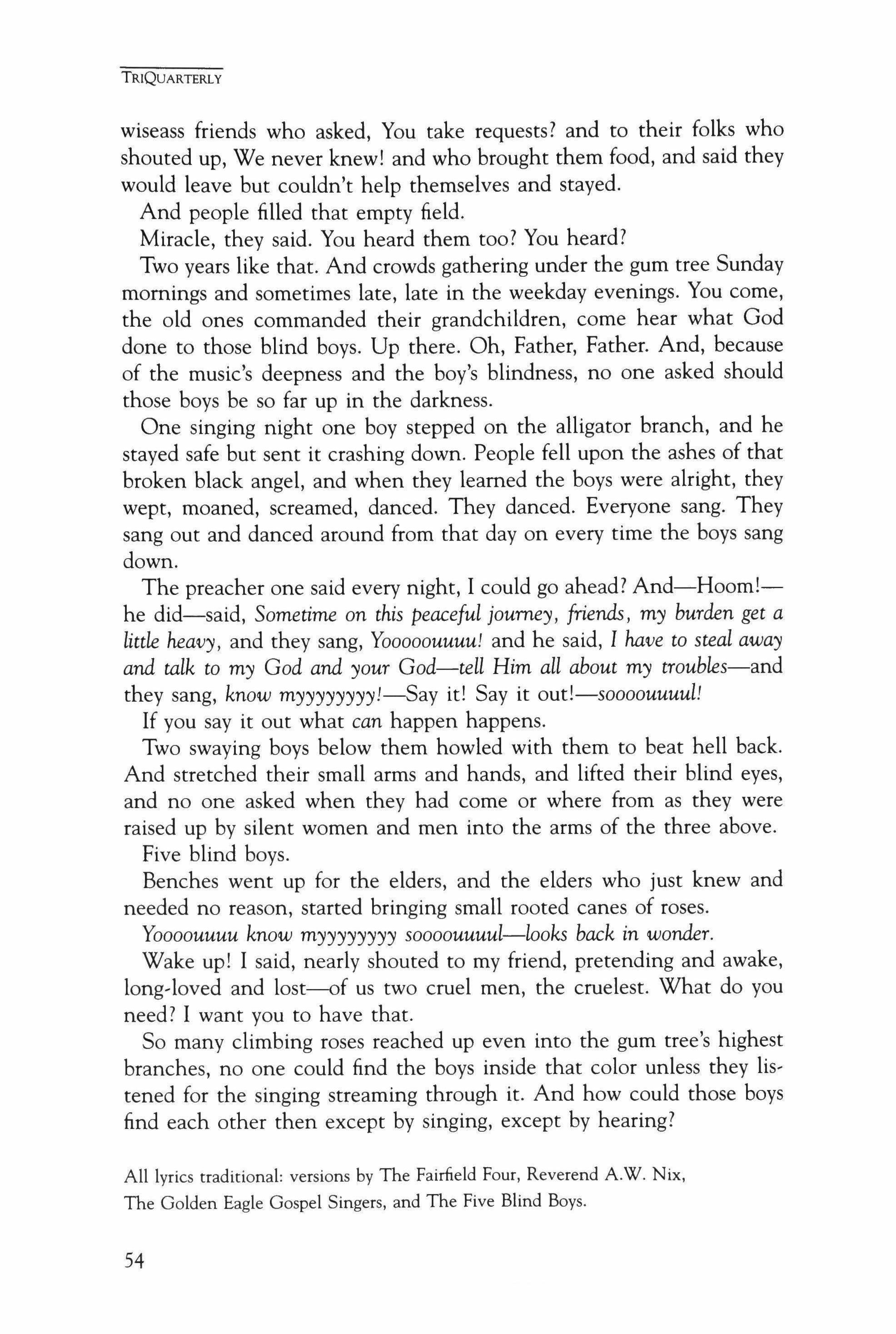
wiseass friends who asked, You take requests? and to their folks who shouted up, We never knew! and who brought them food, and said they would leave but couldn't help themselves and stayed.
And people filled that empty field.
Miracle, they said. You heard them too? You heard?
Two years like that. And crowds gathering under the gum tree Sunday mornings and sometimes late, late in the weekday evenings. You corne, the old ones commanded their grandchildren, corne hear what God done to those blind boys. Up there. Oh, Father, Father. And, because of the music's deepness and the boy's blindness, no one asked should those boys be so far up in the darkness.
One singing night one boy stepped on the alligator branch, and he stayed safe but sent it crashing down. People fell upon the ashes of that broken black angel, and when they learned the boys were alright, they wept, moaned, screamed, danced. They danced. Everyone sang. They sang out and danced around from that day on every time the boys sang down.
The preacher one said every night, I could go ahead? And-Hoom!he did-said, Sometime on this peaceful journey, friends, my burden get a little heavy, and they sang, Yooooouuuu! and he said, I have to steal away and talk to my God and your God-tell Him all about my troubles-and they sang, know myyyyyyyy!-Say it! Say it out!-soooouuuul!
If you say it out what can happen happens.
Two swaying boys below them howled with them to beat hell back. And stretched their small arms and hands, and lifted their blind eyes, and no one asked when they had corne or where from as they were raised up by silent women and men into the arms of the three above.
Five blind boys.
Benches went up for the elders, and the elders who just knew and needed no reason, started bringing small rooted canes of roses.
Yoooouuuu know myyyyyyyy soooouuuul-looks back in wonder.
Wake up! I said, nearly shouted to my friend, pretending and awake, long-loved and lost-of us two cruel men, the cruelest. What do you need? I want you to have that.
So many climbing roses reached up even into the gum tree's highest branches, no one could find the boys inside that color unless they listened for the singing streaming through it. And how could those boys find each other then except by singing, except by hearing?
All lyrics traditional: versions by The Fairfield Four, Reverend A.W. Nix, The Golden Eagle Gospel Singers, and The Five Blind Boys.
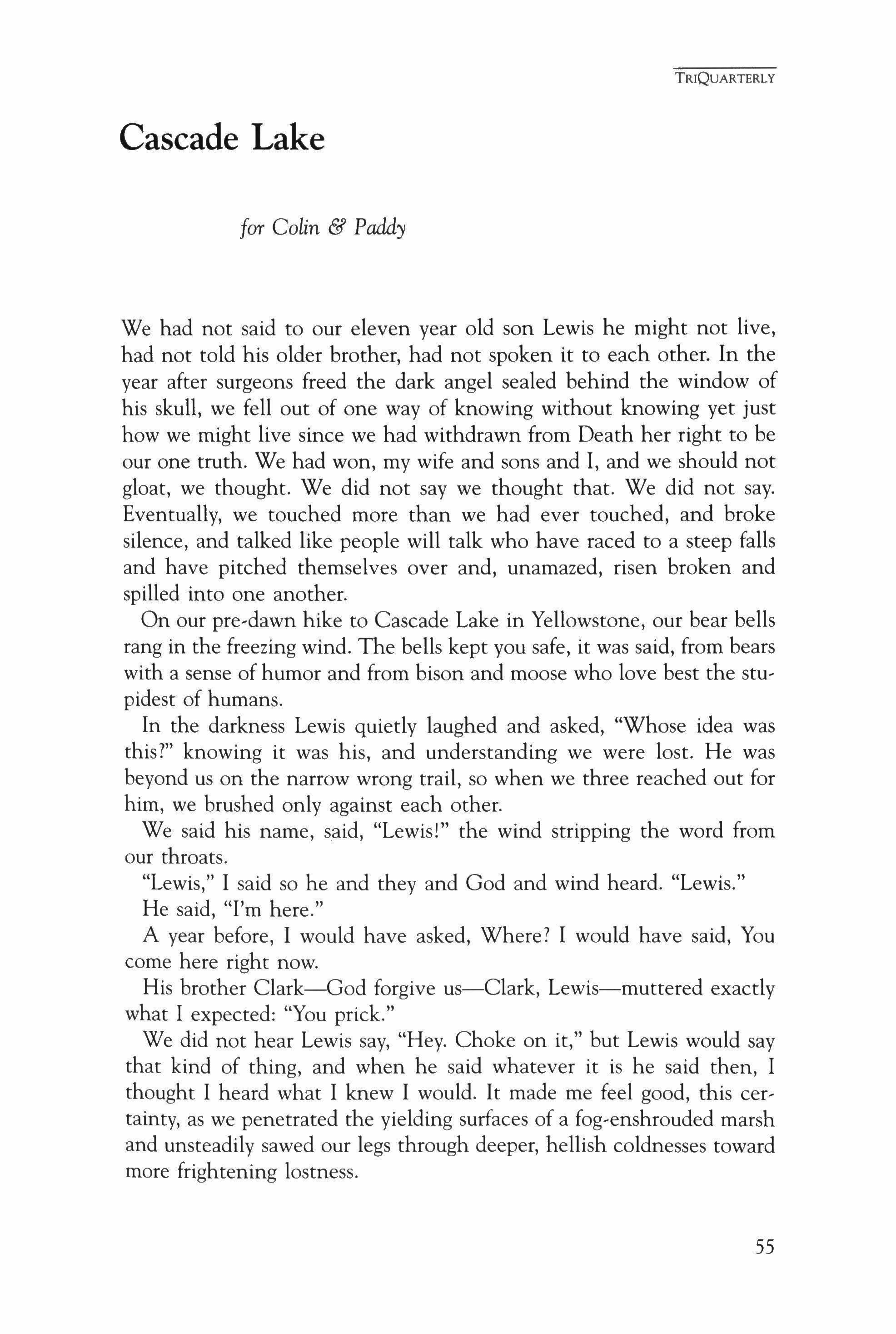
We had not said to our eleven year old son Lewis he might not live, had not told his older brother, had not spoken it to each other. In the year after surgeons freed the dark angel sealed behind the window of his skull, we fell out of one way of knowing without knowing yet just how we might live since we had withdrawn from Death her right to be our one truth. We had won, my wife and sons and I, and we should not gloat, we thought. We did not say we thought that. We did not say. Eventually, we touched more than we had ever touched, and broke silence, and talked like people will talk who have raced to a steep falls and have pitched themselves over and, unamazed, risen broken and spilled into one another.
On our pre-dawn hike to Cascade Lake in Yellowstone, our bear bells rang in the freezing wind. The bells kept you safe, it was said, from bears with a sense of humor and from bison and moose who love best the stupidest of humans.
In the darkness Lewis quietly laughed and asked, "Whose idea was this?" knowing it was his, and understanding we were lost. He was beyond us on the narrow wrong trail, so when we three reached out for him, we brushed only against each other.
We said his name, said, "Lewis!" the wind stripping the word from our throats.
"Lewis," I said so he and they and God and wind heard. "Lewis."
He said, "I'm here."
A year before, I would have asked, Where? I would have said, You come here right now.
His brother Clark-God forgive us-Clark, Lewis-muttered exactly what I expected: "You prick."
We did not hear Lewis say, "Hey. Choke on it," but Lewis would say that kind of thing, and when he said whatever it is he said then, I thought I heard what I knew I would. It made me feel good, this certainty, as we penetrated the yielding surfaces of a fog-enshrouded marsh and unsteadily sawed our legs through deeper, hellish coldnesses toward more frightening lostness.

"Suckage," said Lewis, and he pivoted right into us, he was that close. "Suckage." He pushed his flashlight under his chin, sending light up through his jaw, making his ears and eyes glow. Red light breathed from his grin, flickered like neon. "Here's where we go," he said, "along here," and pointed to the shallow stream we were almost already walking in, and said, "Watch out for that," but planted his own boot in the smooth glass of a watery black ring where a shadow that swam slingshotted out, a duck, shedding the glistening rank oil of the marsh from its belly and throat. "Ghost!" shouted Lewis, and left us in darkness again, and disappeared behind the falling curtain of stinging rain, the opening wing of night.
An hour earlier, I would have said, You, wait one second, will you? Truth is, I said this all the same, and as it always was, I was ignored. Shivering, whispering, Jean said, "Stop him" to Clark who said, "The little prick," but followed the little prick's advice and left us wandering behind, her hand lost in mine, mine in hers.
We took small steps that cracked ice, could hear the wind whip their clothes, and knew the sucking noises of their boots were close, and felt no less lost. We slogged, stumbled, heard Lewis's laughter, laughed, heard Clark's curse, cursed. It seemed like months and more miles and months of this. In Jean's breath I heard the bad solemn verses of diagnoses, the doggerel of a tumor's growth, always named its "progress." I heard the chanted names of the brain's regions and remembered each region's functions and peculiar forms of justice.
One current of violet lifted into a lighter current above it in the fog chaining our waists together in punishing cold dampness. Along the stream the weedstems whispered and the watercress swaying at the surface gasped.
"Look," said Lewis, far ahead of us, the wind and his voice one faint, fading, singing thing. He had come to the lake. He had found Clark.
We heard them slap each other's backs, the way they did. Too rough, we always said, Too rough, but it did no good and, after all, it was a good sound to hear. Where we walked, spirits of.fermenting stench closed around us. We stopped, stood in muck and grass and reeds compressed in a giant bed.
"Moose nest," said Jean, her breath close to my face. Her gloved fingers raked my sweatshirt hood back.
"They nest?" I asked.
"They nest."
"Well, Jesus Christ," I said. I pictured giant brittle eggs gently ripped
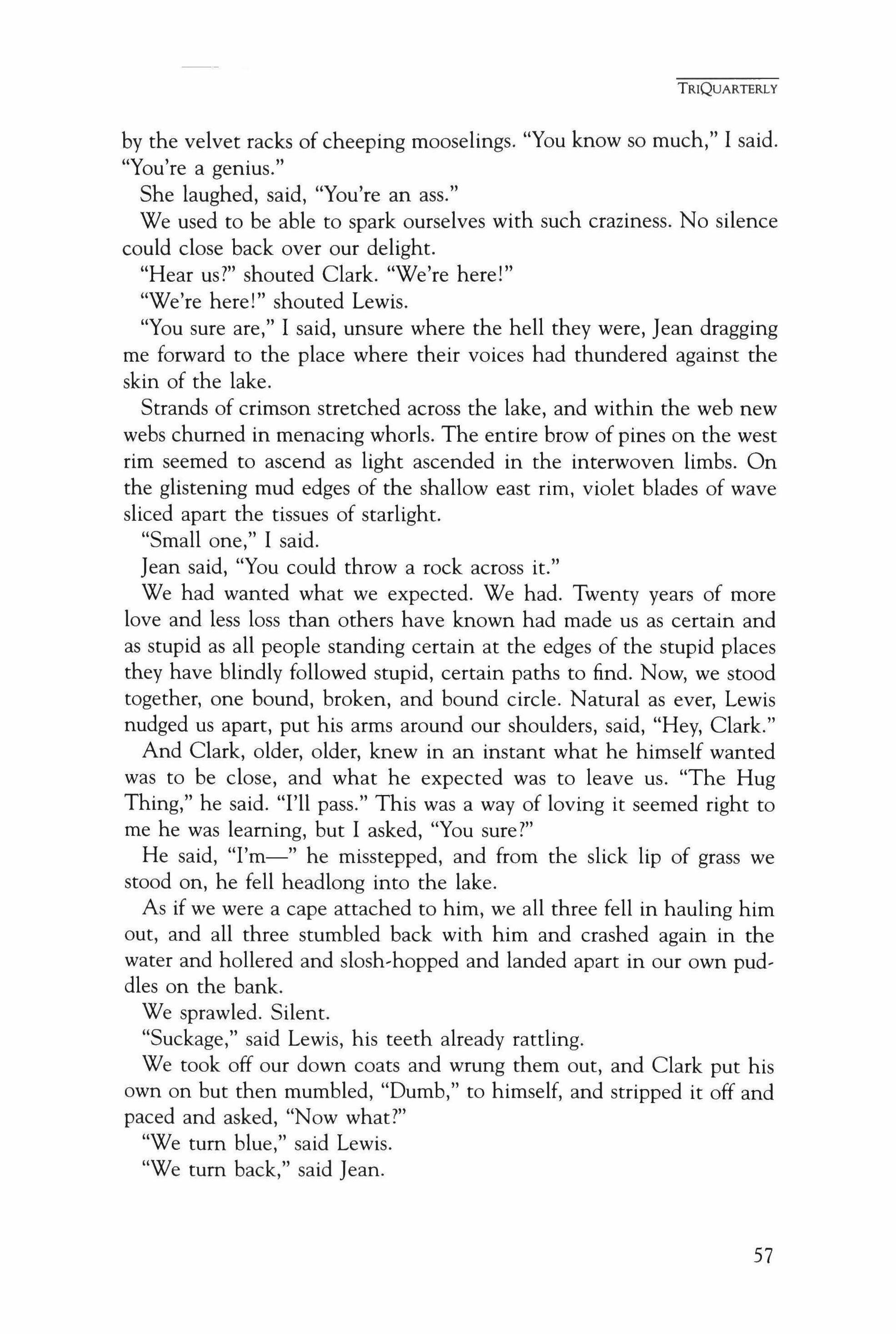
by the velvet racks of cheeping mooselings. "You know so much," I said. "You're a genius."
She laughed, said, "You're an ass."
We used to be able to spark ourselves with such craziness. No silence could close back over our delight.
"Hear us?" shouted Clark. "We're here!"
"We're here!" shouted Lewis.
"You sure are," I said, unsure where the hell they were, Jean dragging me forward to the place where their voices had thundered against the skin of the lake.
Strands of crimson stretched across the lake, and within the web new webs churned in menacing whorls. The entire brow of pines on the west rim seemed to ascend as light ascended in the interwoven limbs. On the glistening mud edges of the shallow east rim, violet blades of wave sliced apart the tissues of starlight.
"Small one," I said.
Jean said, "You could throw a rock across it."
We had wanted what we expected. We had. Twenty years of more love and less loss than others have known had made us as certain and as stupid as all people standing certain at the edges of the stupid places they have blindly followed stupid, certain paths to find. Now, we stood together, one bound, broken, and bound circle. Natural as ever, Lewis nudged us apart, put his arms around our shoulders, said, "Hey, Clark."
And Clark, older, older, knew in an instant what he himself wanted was to be close, and what he expected was to leave us. "The Hug Thing," he said. "I'll pass." This was a way of loving it seemed right to me he was learning, but I asked, "You sure?"
He said, "I'm-" he misstepped, and from the slick lip of grass we stood on, he fell headlong into the lake.
As if we were a cape attached to him, we all three fell in hauling him out, and all three stumbled back with him and crashed again in the water and hollered and slosh-hopped and landed apart in our own puddles on the bank.
We sprawled. Silent.
"Suckage," said Lewis, his teeth already rattling.
We took off our down coats and wrung them out, and Clark put his own on but then mumbled, "Dumb," to himself, and stripped it off and paced and asked, "Now what?"
"We tum blue," said Lewis.
"We tum back," said Jean.
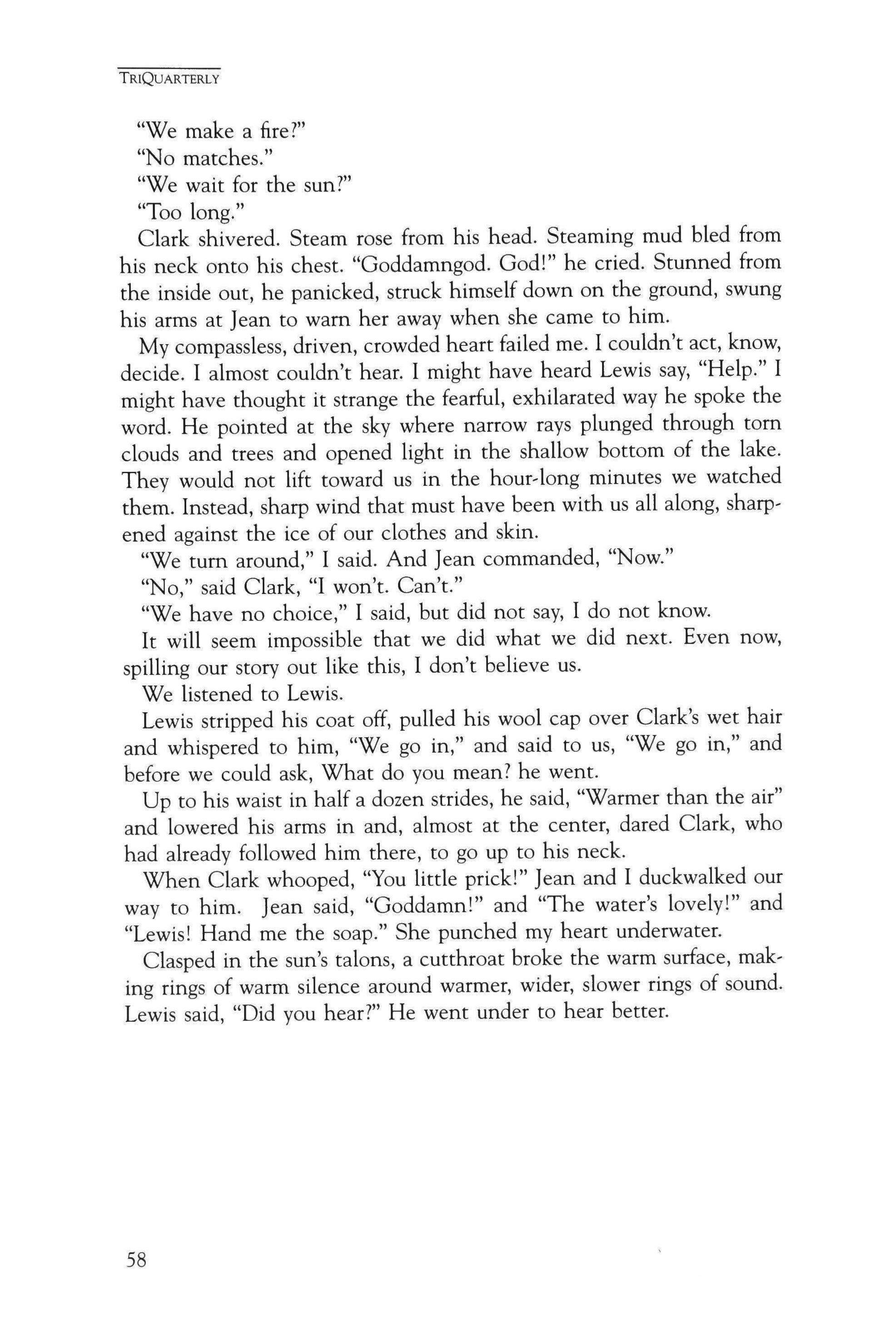
"We make a fire?"
"No matches."
"We wait for the sun?"
"Too long."
Clark shivered. Steam rose from his head. Steaming mud bled from his neck onto his chest. "Goddamngod. God!" he cried. Stunned from the inside out, he panicked, struck himself down on the ground, swung his arms at Jean to warn her away when she came to him.
My compassless, driven, crowded heart failed me. I couldn't act, know, decide. I almost couldn't hear. I might have heard Lewis say, "Help." I might have thought it strange the fearful, exhilarated way he spoke the word. He pointed at the sky where narrow rays plunged through tom clouds and trees and opened light in the shallow bottom of the lake. They would not lift toward us in the hour-long minutes we watched them. Instead, sharp wind that must have been with us all along, sharpened against the ice of our clothes and skin.
"We tum around," I said. And Jean commanded, "Now."
"No," said Clark, "I won't. Can't."
"We have no choice," I said, but did not say, I do not know.
It will seem impossible that we did what we did next. Even now, spilling our story out like this, I don't believe us.
We listened to Lewis.
Lewis stripped his coat off, pulled his wool cap over Clark's wet hair and whispered to him, "We go in," and said to us, "We go in," and before we could ask, What do you mean? he went.
Up to his waist in half a dozen strides, he said, "Warmer than the air" and lowered his arms in and, almost at the center, dared Clark, who had already followed him there, to go up to his neck.
When Clark whooped, "You little prick!" Jean and I duckwalked our way to him. Jean said, "Goddamn!" and "The water's lovely!" and "Lewis! Hand me the soap." She punched my heart underwater.
Clasped in the sun's talons, a cutthroat broke the warm surface, making rings of warm silence around warmer, wider, slower rings of sound. Lewis said, "Did you hear?" He went under to hear better.
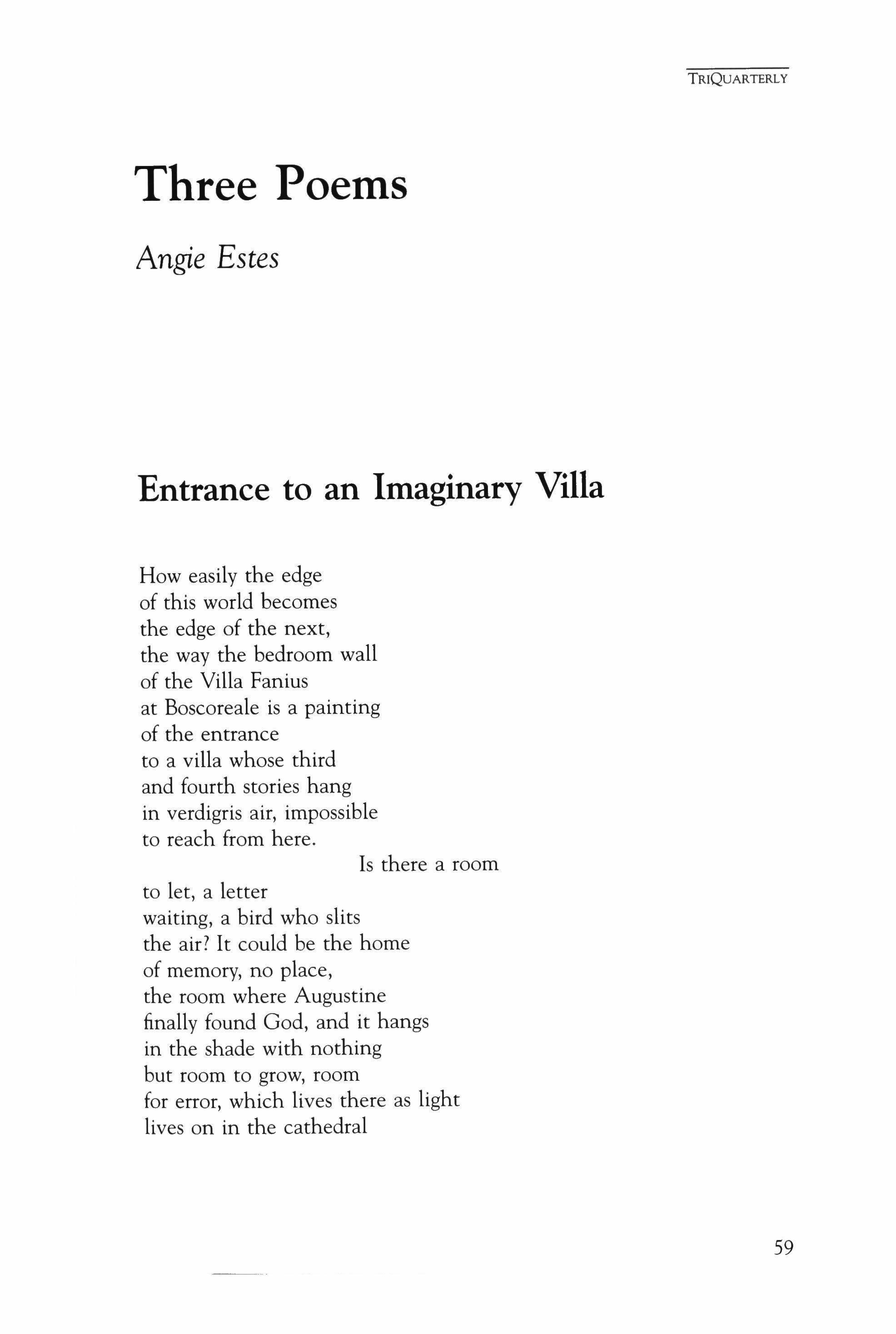
How easily the edge of this world becomes the edge of the next, the way the bedroom wall of the Villa Fanius at Boscoreale is a painting of the entrance to a villa whose third and fourth stories hang in verdigris air, impossible to reach from here.
Is there a room to let, a letter waiting, a bird who slits the air? It could be the home of memory, no place, the room where Augustine finally found God, and it hangs in the shade with nothing but room to grow, room for error, which lives there as light lives on in the cathedral
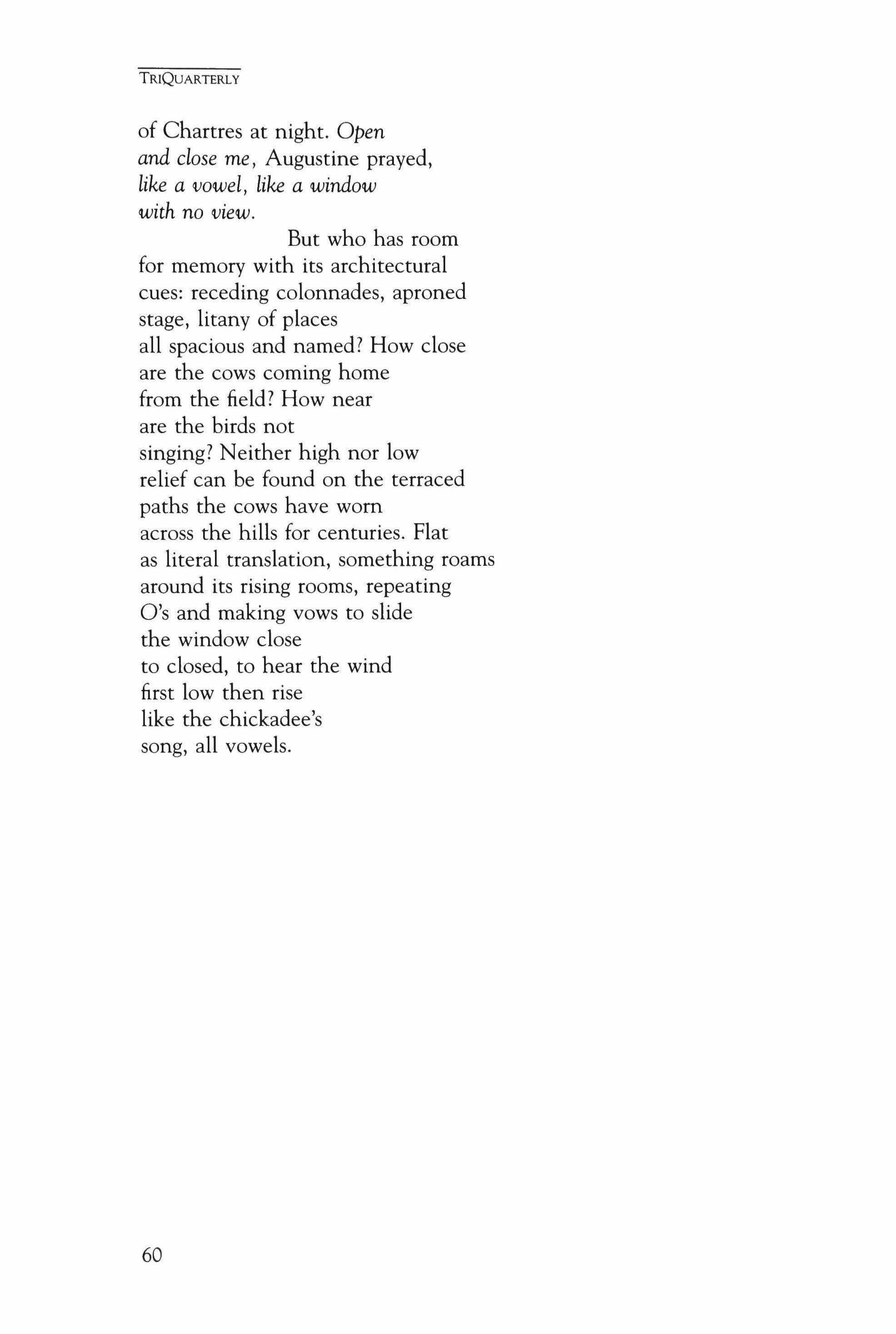
of Chartres at night. Open and close me, Augustine prayed, like a vowel, like a window with no view.
But who has room for memory with its architectural cues: receding colonnades, aproned stage, litany of places all spacious and named? How close are the cows coming home from the field? How near are the birds not singing? Neither high nor low relief can be found on the terraced paths the cows have worn across the hills for centuries. Flat as literal translation, something roams around its rising rooms, repeating O's and making vows to slide the window close to closed, to hear the wind first low then rise like the chickadee's song, all vowels.
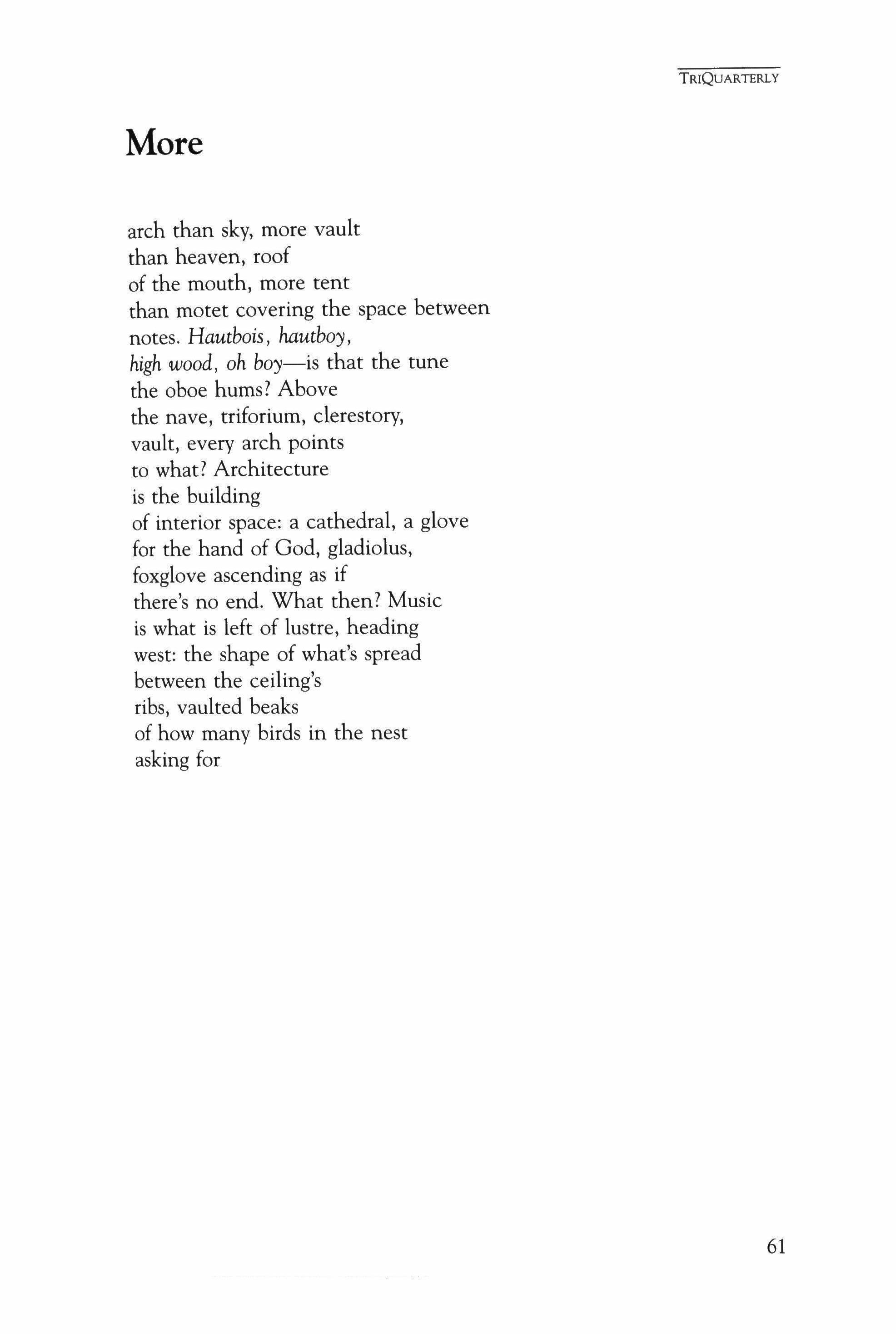
More arch than sky, more vault than heaven, roof of the mouth, more tent than motet covering the space between notes. Hautbois, hautboy, high wood, oh boy-is that the tune the oboe hums? Above the nave, triforium, clerestory, vault, every arch points to what? Architecture is the building of interior space: a cathedral, a glove for the hand of God, gladiolus, foxglove ascending as if there's no end. What then? Music is what is left of lustre, heading west: the shape of what's spread between the ceiling's ribs, vaulted beaks of how many birds in the nest asking for
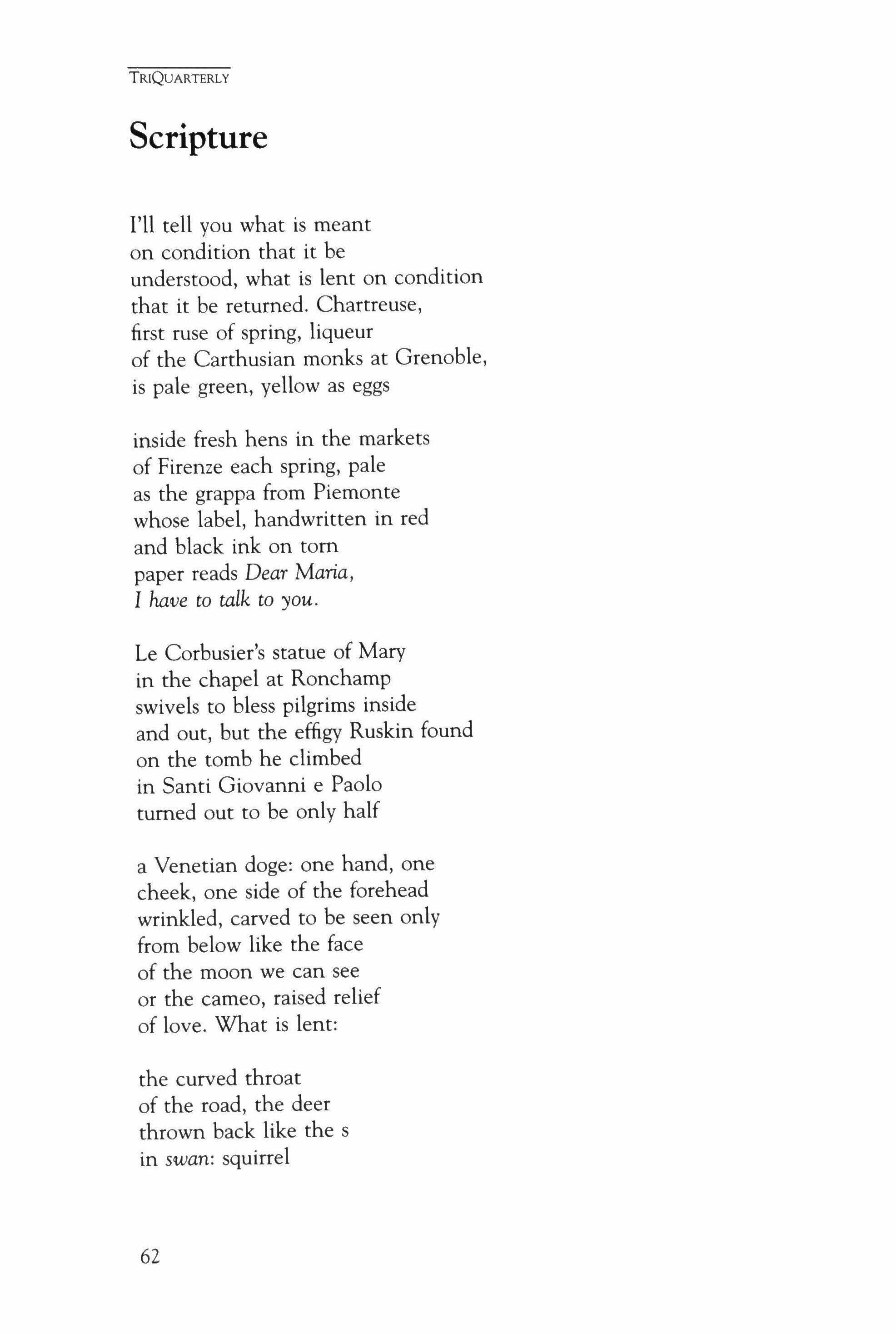
I'll tell you what is meant on condition that it be understood, what is lent on condition that it be returned. Chartreuse, first ruse of spring, liqueur of the Carthusian monks at Grenoble, is pale green, yellow as eggs inside fresh hens in the markets of Firenze each spring, pale as the grappa from Piemonte whose label, handwritten in red and black ink on torn paper reads Dear Maria, I have to talk to you.
Le Corbusier's statue of Mary in the chapel at Ronchamp swivels to bless pilgrims inside and out, but the effigy Ruskin found on the tomb he climbed in Santi Giovanni e Paolo turned out to be only half
a Venetian doge: one hand, one cheek, one side of the forehead wrinkled, carved to be seen only from below like the face of the moon we can see or the cameo, raised relief of love. What is lent: the curved throat of the road, the deer thrown back like the s in swan: squirrel
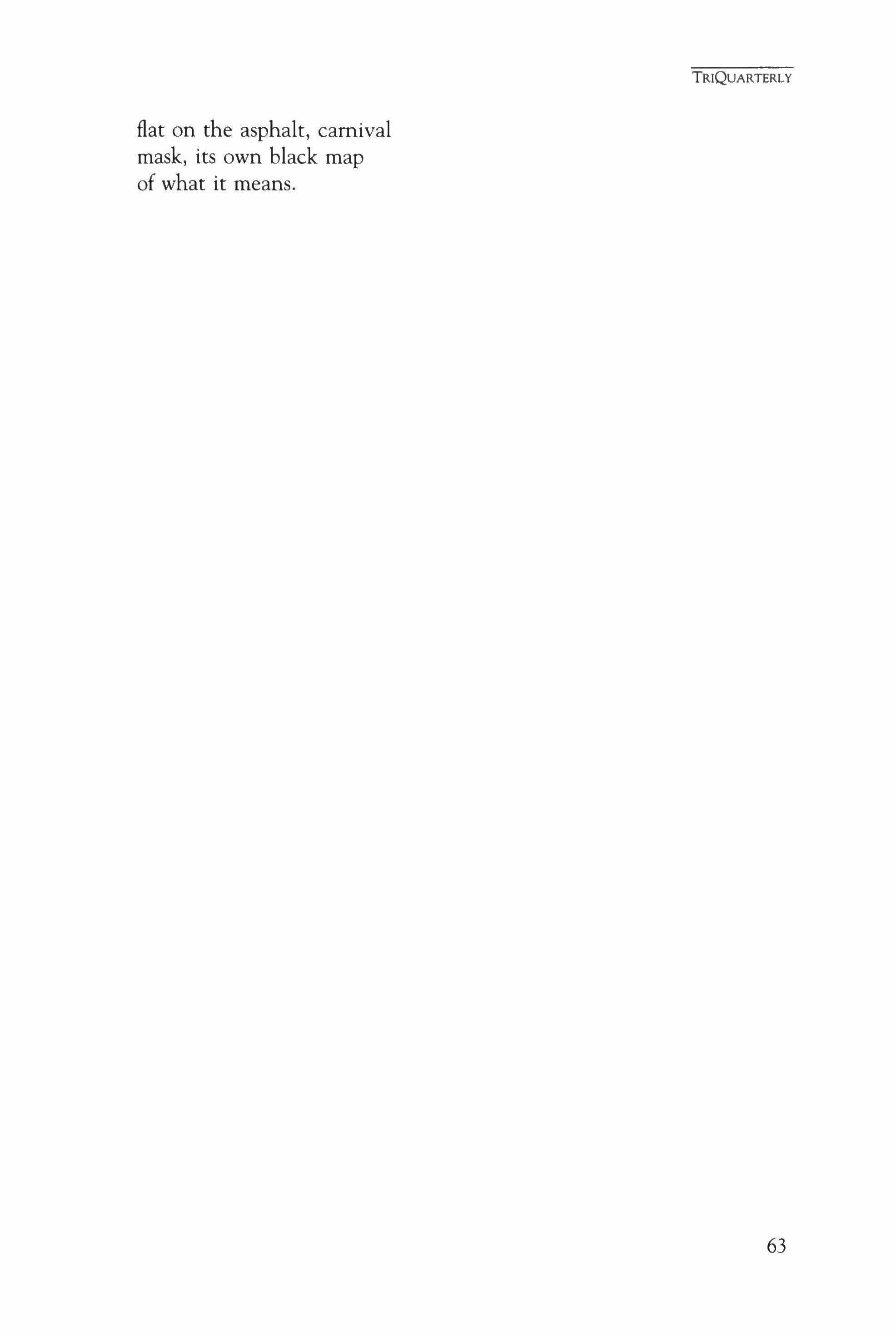
flat on the asphalt, carnival mask, its own black map of what it means.

1.
a woman strokes her finger with her finger
let's have a look inside, he said a man strokes the sides of his new moustache but I have worn the wrong clothes wasn't the doctor, was it, one snow down there, under the clouds
middle finger, index finger sewed the wrong season, seam heart, anchor around her neck who came with his fat black bag
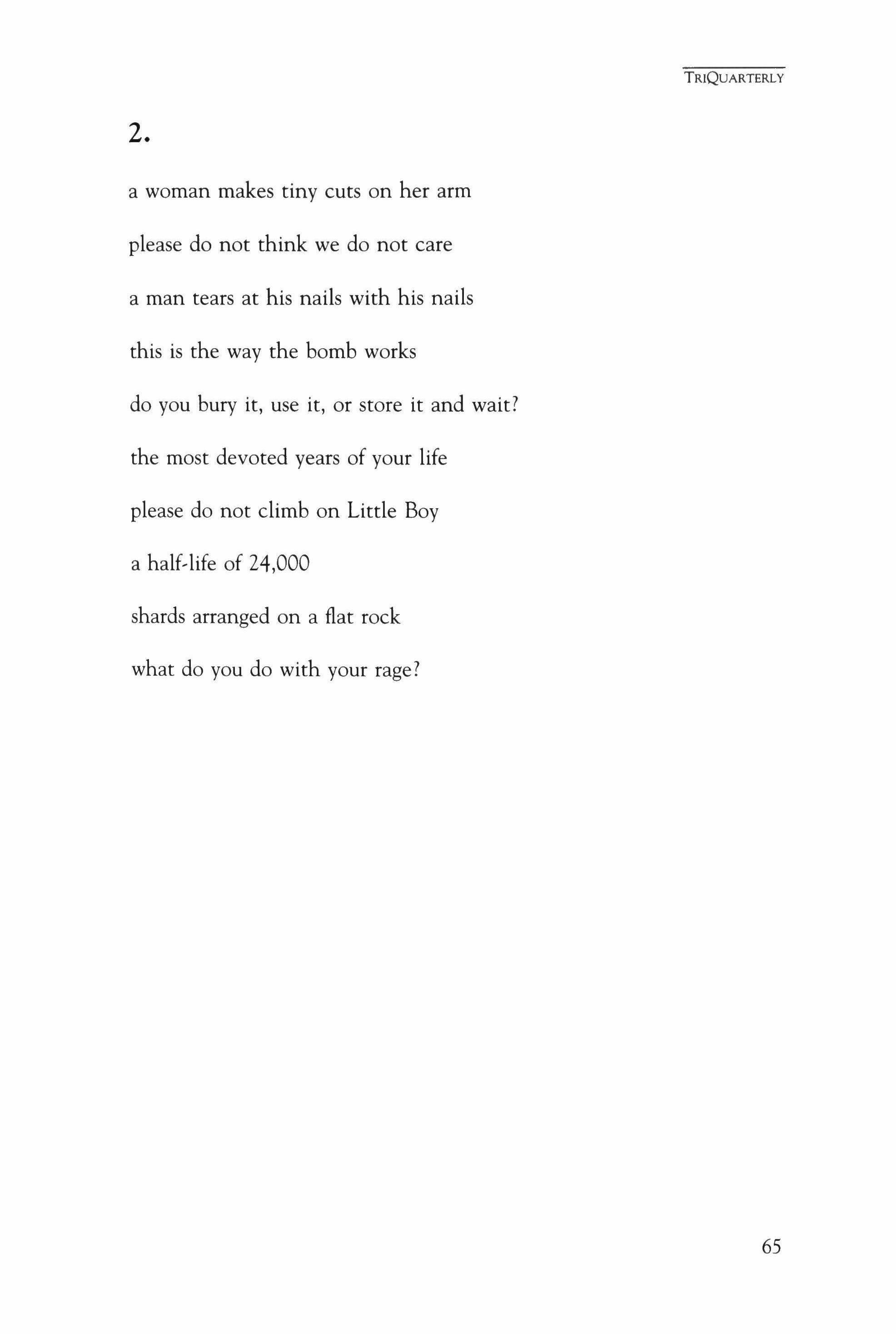
a woman makes tiny cuts on her arm
please do not think we do not care
a man tears at his nails with his nails
this is the way the bomb works
do you bury it, use it, or store it and wait?
the most devoted years of your life
please do not climb on Little Boy
a half,life of 24,000
shards arranged on a flat rock
what do you do with your rage?

bitten thumb to be in touch with sucked in held in air nonetheless there are animals in the what if there's no {something} there under your desks, the turtle said and then the forest filled with knives sky flashed with fire when I was what if there's no way to {something} keep watching this spot

what is touched?
things we have done, left, undone
who is he inviting in?
once I imagined an animal skull
unforgettable hair, the color of apricots
sweater like the one I lost
goat calf lamb where my heart
a new element
please note here
inscriptions in a cave
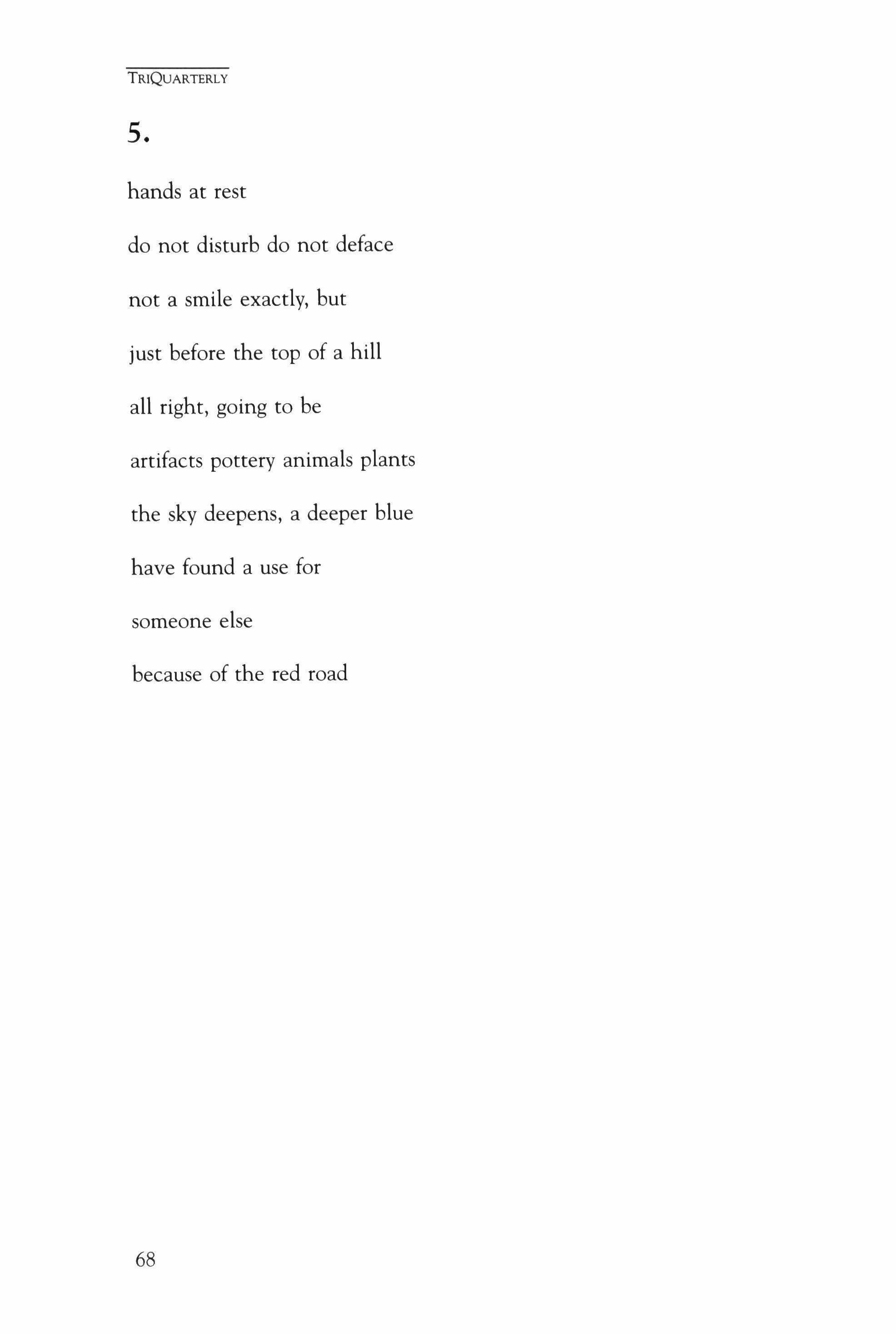
hands at rest
do not disturb do not deface not a smile exactly, but just before the top of a hill all right, going to be artifacts pottery animals plants the sky deepens, a deeper blue have found a use for someone else because of the red road
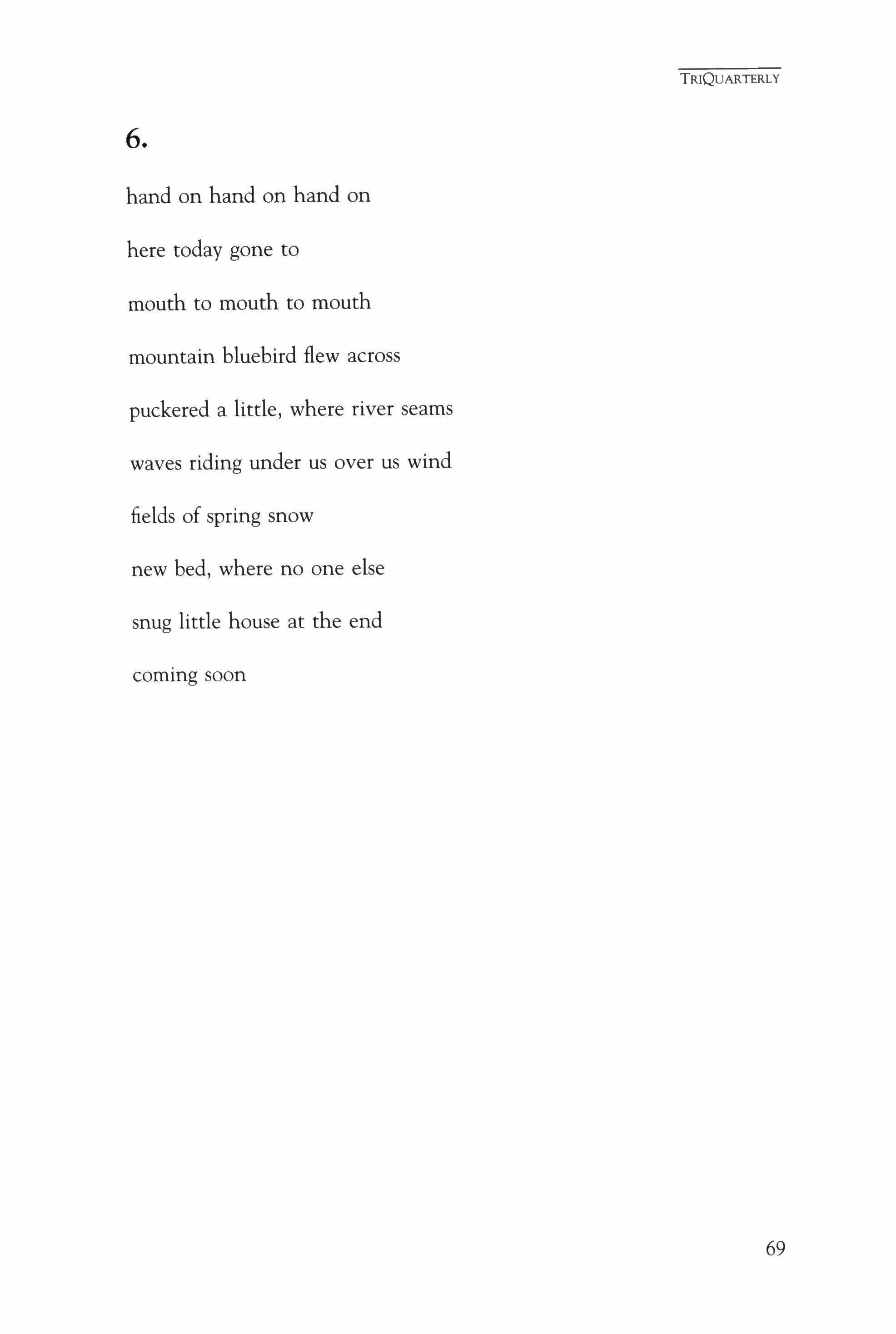
hand on hand on hand on here today gone to mouth to mouth to mouth
mountain bluebird flew across puckered a little, where river seams
waves riding under us over us wind fields of spring snow
new bed, where no one else snug little house at the end coming soon
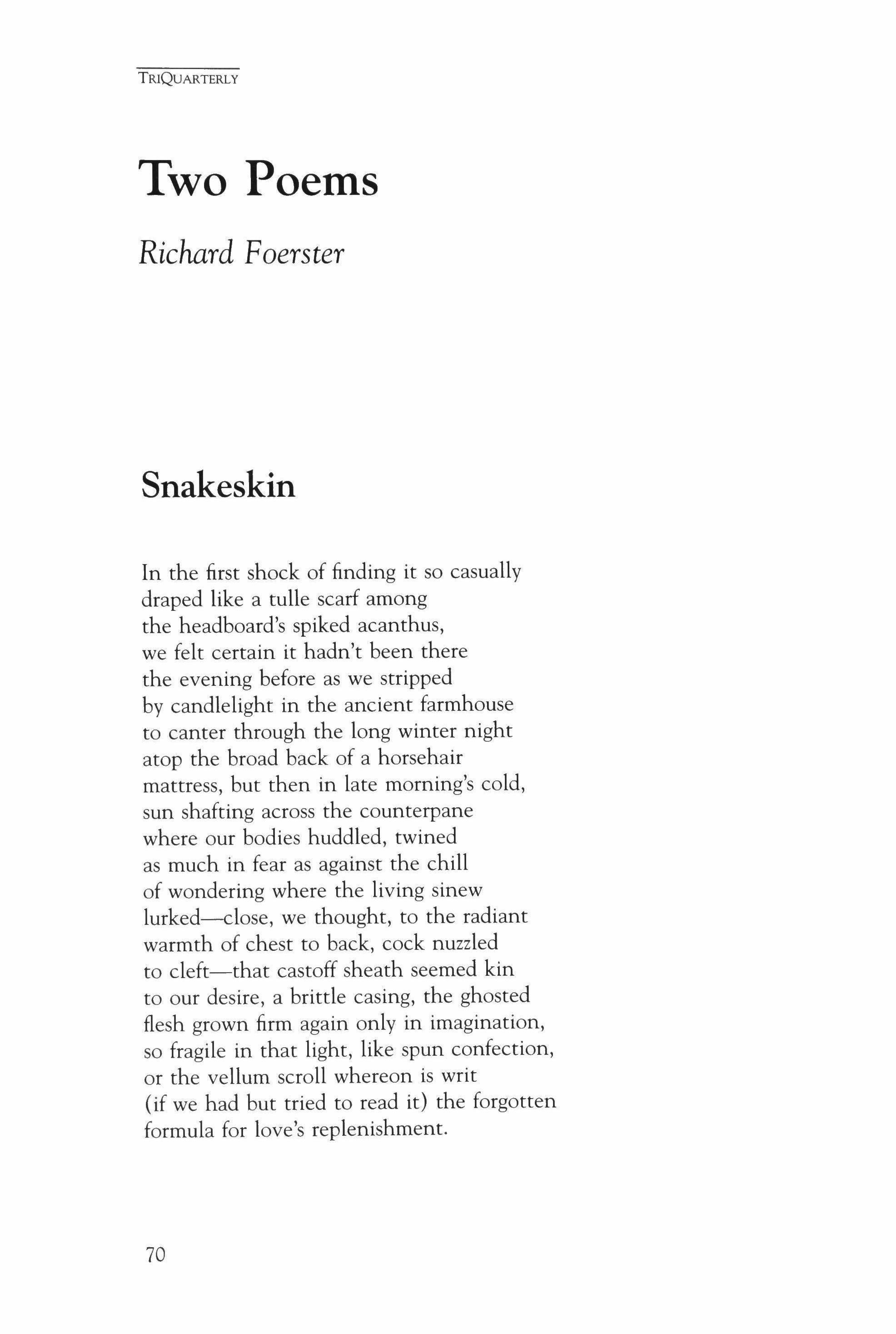
In the first shock of finding it so casually draped like a tulle scarf among the headboard's spiked acanthus, we felt certain it hadn't been there the evening before as we stripped by candlelight in the ancient farmhouse to canter through the long winter night atop the broad back of a horsehair mattress, but then in late morning's cold, sun shafting across the counterpane where our bodies huddled, twined as much in fear as against the chill of wondering where the living sinew lurked--close, we thought, to the radiant warmth of chest to back, cock nuzzled to cleft-that castoff sheath seemed kin to our desire, a brittle casing, the ghosted flesh grown firm again only in imagination, so fragile in that light, like spun confection, or the vellum scroll whereon is writ (if we had but tried to read it) the forgotten formula for love's replenishment.
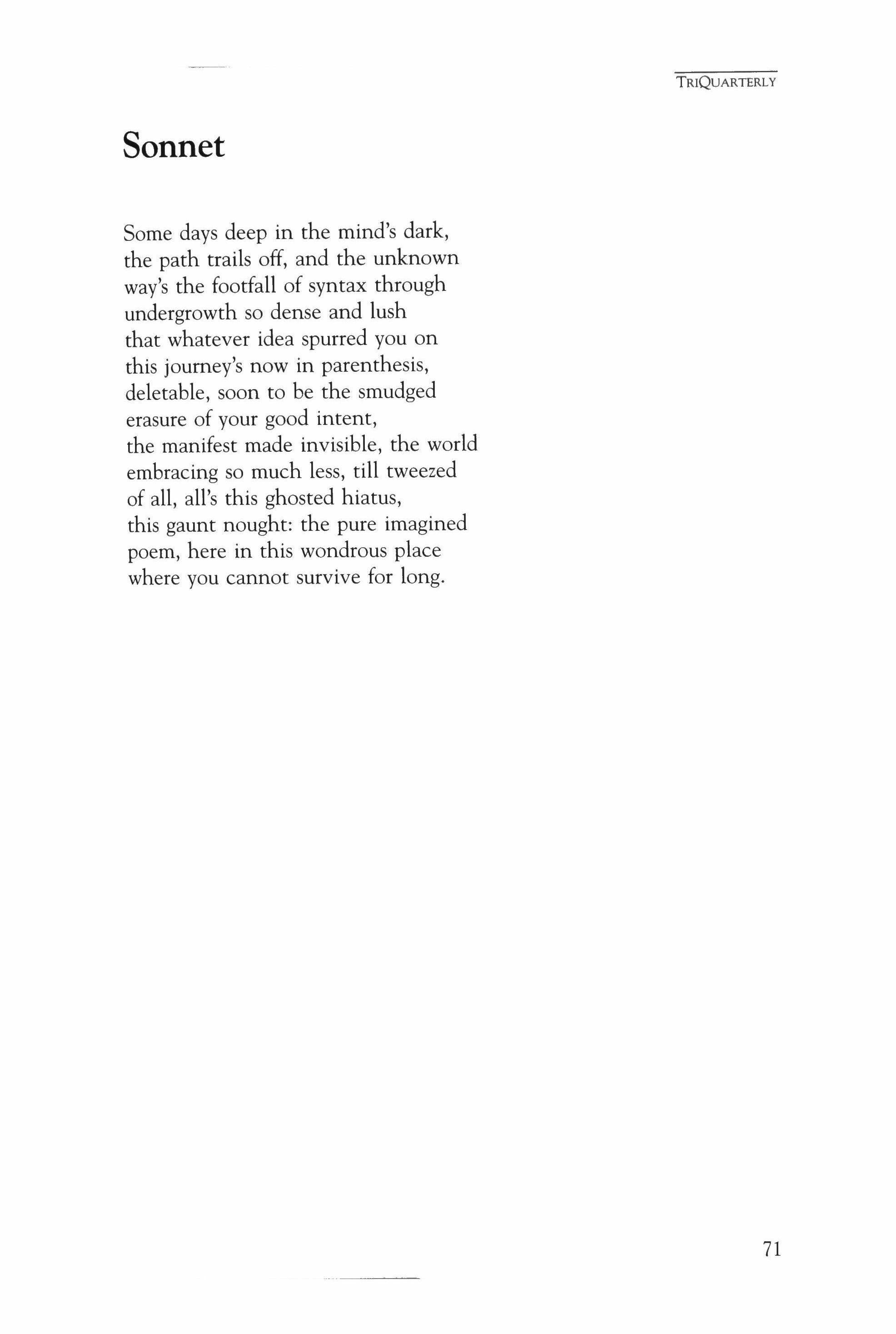
Some days deep in the mind's dark, the path trails off, and the unknown way's the footfall of syntax through undergrowth so dense and lush that whatever idea spurred you on this journey's now in parenthesis, deletable, soon to be the smudged erasure of your good intent, the manifest made invisible, the world embracing so much less, till tweezed of all, all's this ghosted hiatus, this gaunt nought: the pure imagined poem, here in this wondrous place where you cannot survive for long.
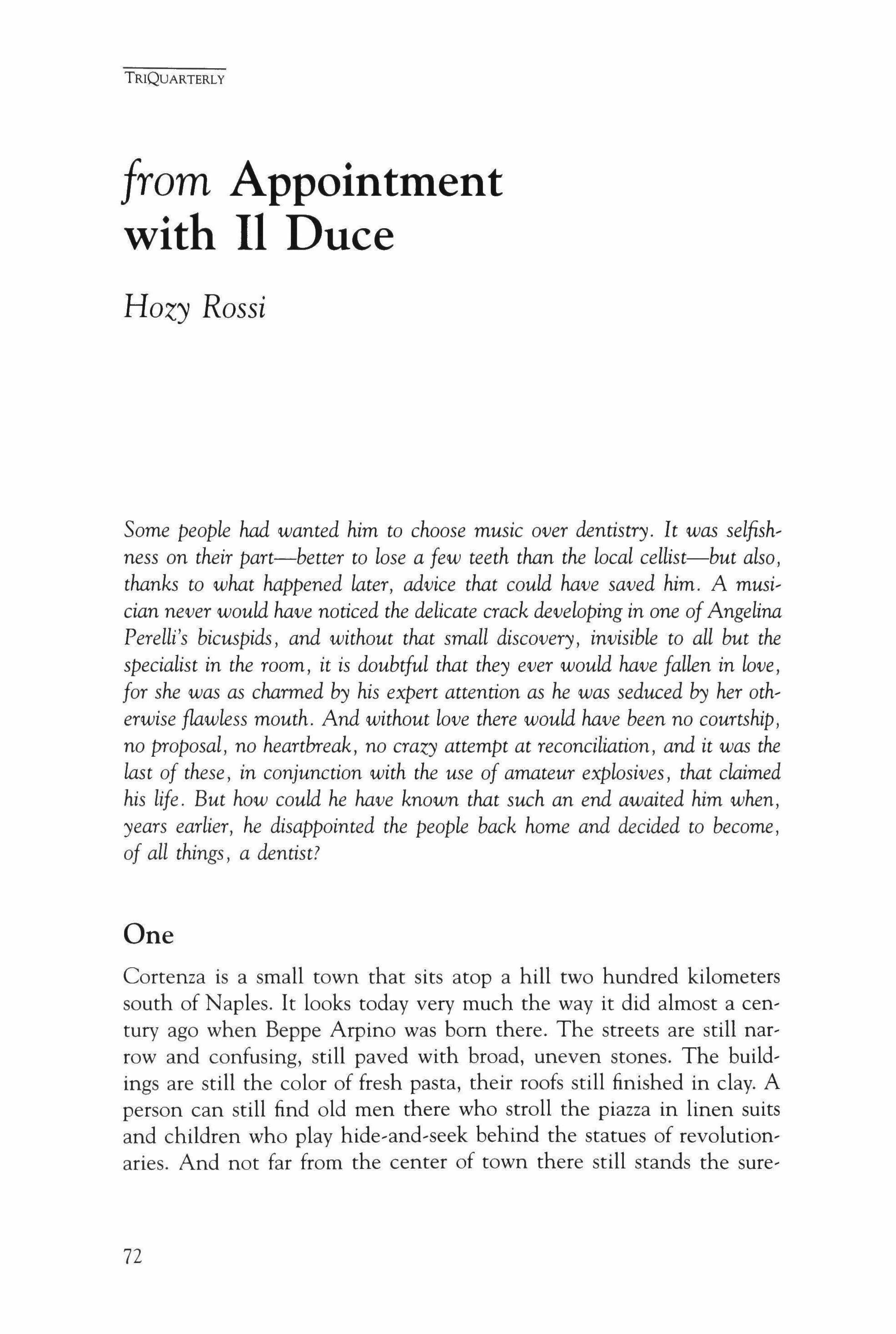
Some people had wanted him to choose music over dentistry. It was selfish� ness on their part-better to lose a few teeth than the local cellist-but also, thanks to what happened later, advice that could have saved him. A musi� cian never would have noticed the delicate crack developing in one ofAngelina Perelli's bicuspids, and without that small discovery, invisible to all but the specialist in the room, it is doubtful that they ever would have fallen in love, for she was as charmed by his expert attention as he was seduced by her oth� erwise flawless mouth. And without love there would have been no courtship, no proposal, no heartbreak, no crazy attempt at reconciliation, and it was the last of these, in conjunction with the use of amateur explosives, that claimed his life. But how could he have known that such an end awaited him when, years earlier, he disappointed the people back home and decided to become, of all things, a dentist?
Cortenza is a small town that sits atop a hill two hundred kilometers south of Naples. It looks today very much the way it did almost a century ago when Beppe Arpino was born there. The streets are still narrow and confusing, still paved with broad, uneven stones. The buildings are still the color of fresh pasta, their roofs still finished in clay. A person can still find old men there who stroll the piazza in linen suits and children who play hide-and-seek behind the statues of revolutionaries. And not far from the center of town there still stands the sure-

footed Catholic church with its two bells and gray windows, its crude likeness of the Crucifixion, its pews that creak at even the slightest touch.
As a boy Beppe spent his afternoons in the shuttered home next door to the church. Father Vincenzo had suffered a terrible fall in his vineyard one day and thereafter walked with the aid of a cane. The tasks that Beppe performed on the priest's behalf were, for the most part, simple ones-some pruning with the garden shears, a quick errand across town-and with a little effort Father Vincenzo could have accomplished them himself-the effort might have helped his condition-but the parish had a few extra lire and, as all knew, the Arpino family refused handouts.
In addition to Beppe, there was Luisa Arpino, his mother; Margherita, his younger sister; and Paolo, the baby of the family. They lived together on the ground floor of an otherwise abandoned building that in ten years' time would collapse on itself. Perhaps Beppe hastened that collapse. At night, as he lay on a mattress unable to sleep-insomnia would curse him the rest of his life-and listened to the demonic snore of Paolo, the asthmatic, beside him, he would extend a hand and slowly pick at the dry plaster wall, first with one blunt fingernail, then another. In the course of the two or three hours normally required for Beppe to fall asleep he would accumulate a small pile of these pickings, which he would then carefully dispose of the next morning for fear that his mother, always within reach of an olive switch, would discover the damage and take action.
Beppe's father, Giuseppe Arpino, did not live with the family. In fact, he did not live in Italy at all. In fact, word from America was that he had been murdered in the corridor of a resident hotel. According to the cousin of a man who had shared a bunk with Giuseppe on the voyage to New York and subsequently worked alongside him in an Italianowned butcher shop, Beppe's father had been stabbed on his way to the lavatory sometime after midnight by what authorities suspected to be an itinerant bandit. The proprietor of the hotel, however, claimed that the death had been suicide-the clouds of Giuseppe's homesickness still had not lifted after months in America-but the location of the wounds and their abundance made this theory doubtful to both the police and the man in New York who sent word of the incident to the cousin in Cortenza. He had heard Giuseppe mention the town in their cramped, seagoing bunk and in the back room of Bertolucci's Butcher Shop.
Like his father, Beppe-just nine at the time of the knife attack-

had a reputation for overcast emotions. The dark circles that surrounded his eyes, for example, were attributed by most people in Cortenza to the extended grief that he no doubt experienced as a result of his father's death. What these people failed to take into account was the fact that Beppe slept just five or six hours a night and therefore spent a great deal of time each day rubbing his eyes with his small, still-dimpled fists in an effort to stay awake, thereby bruising the delicate tissue around the sockets and leaving two purplish, goggle-like rings.
Beppe's posture also encouraged people to think him sad. From the front his shoulders appeared square and, in the manner of most prepubescent boys, delicate, almost feminine, but when viewed from the side or from behind those same shoulders seemed weighted and curiously curved. It was not quite a slouch, though, thanks to the oversized blades that sprung from his back like two dorsal fins. Had Cortenza been a coastal town and Beppe a swimmer, his presence offshore might have alarmed those unfortunate enough to mistake his partially submerged form for a pair of flesh-colored sharks.
And he was quiet-another reason people assumed that Beppe inherited his father's melancholy. Never much of a talker at home, he had even less to say in unfamiliar company. When any of the washerwomen who crowded the banks of the Crati grabbed hold of his cheeks and asked a playful question-"Yes, and what mischief have you been up to lately?"-he usually slipped away without a word, just a shrug and look of bewilderment. If the grocer whom he sometimes visited on behalf of his mother told him to "Speak up, young man!" Beppe simply pointed more emphatically at the cake of soap or wooden matches he desired. Even at school he managed to avoid the teacher's abuse through a shrewd combination of eye contact and solemn nods. For others not as clever as Beppe a career in music would have been unthinkable: Miss Donati alone shattered the hands of a hundred male students, a generation that forever after flinched at the sight of a raised baton.
But contrary to what most people thought, Beppe enjoyed relative happiness as a child. He never cried himself to sleep at night, never wished he had been born elsewhere to other parents-even after his father's death or one of his mother's fits-and never once contemplated suicide. No, for all the hardships that the first decade of life presented Beppe Arpino, his outlook remained bright. One might even say that he considered himself lucky to have only poverty, a dead parent, insomnia, the occasional whipping, and poor posture to contend with. After all, he had the attention of Father Vincenzo. And if he were quieter
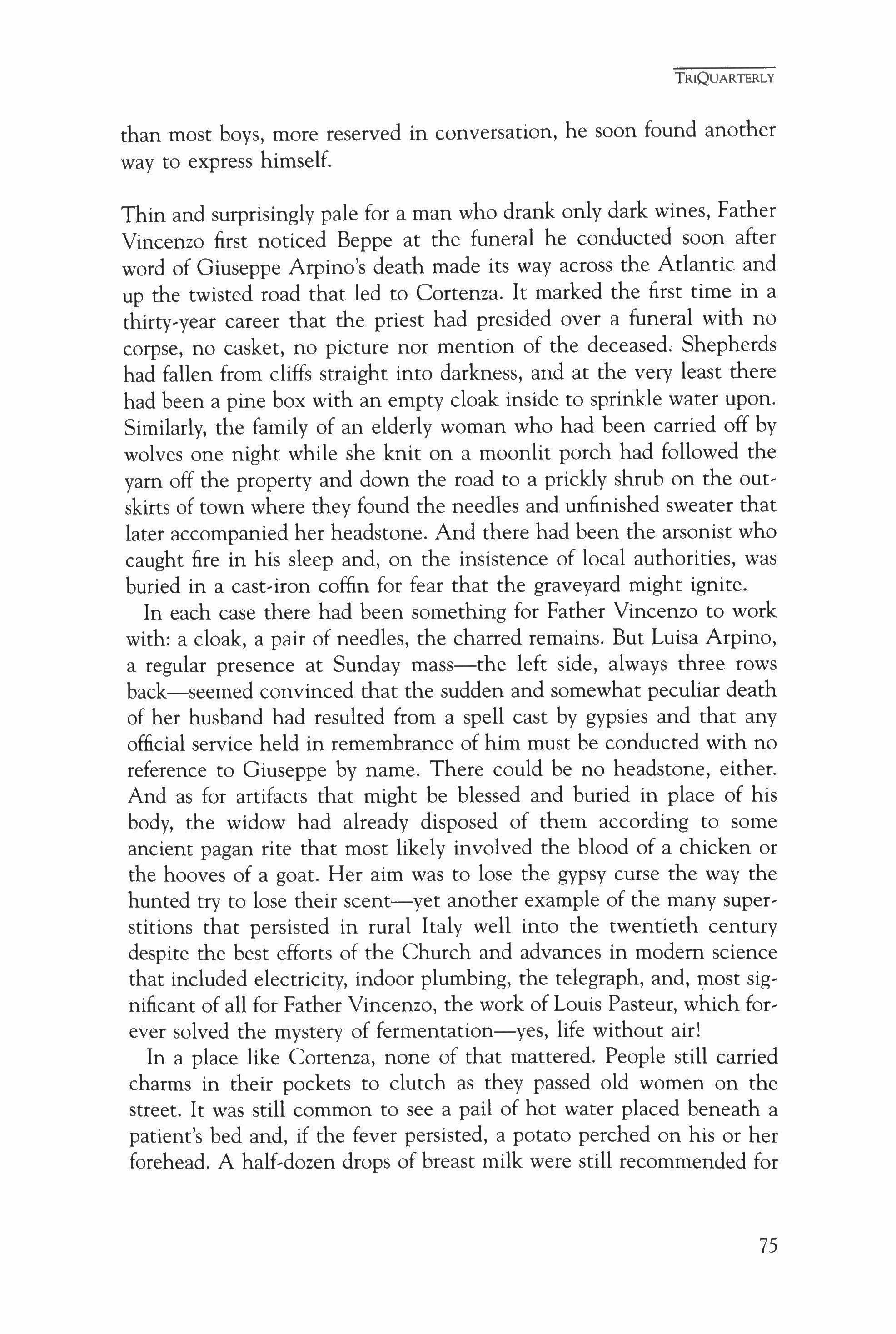
than most boys, more reserved in conversation, he soon found another way to express himself.
Thin and surprisingly pale for a man who drank only dark wines, Father Vincenzo first noticed Beppe at the funeral he conducted soon after word of Giuseppe Arpino's death made its way across the Atlantic and up the twisted road that led to Cortenza. It marked the first time in a thirty-year career that the priest had presided over a funeral with no corpse, no casket, no picture nor mention of the deceased, Shepherds had fallen from cliffs straight into darkness, and at the very least there had been a pine box with an empty cloak inside to sprinkle water upon. Similarly, the family of an elderly woman who had been carried off by wolves one night while she knit on a moonlit porch had followed the yarn off the property and down the road to a prickly shrub on the outskirts of town where they found the needles and unfinished sweater that later accompanied her headstone. And there had been the arsonist who caught fire in his sleep and, on the insistence of local authorities, was buried in a cast-iron coffin for fear that the graveyard might ignite.
In each case there had been something for Father Vincenzo to work with: a cloak, a pair of needles, the charred remains. But Luisa Arpino, a regular presence at Sunday mass-the left side, always three rows back-seemed convinced that the sudden and somewhat peculiar death of her husband had resulted from a spell cast by gypsies and that any official service held in remembrance of him must be conducted with no reference to Giuseppe by name. There could be no headstone, either. And as for artifacts that might be blessed and buried in place of his body, the widow had already disposed of them according to some ancient pagan rite that most likely involved the blood of a chicken or the hooves of a goat. Her aim was to lose the gypsy curse the way the hunted try to lose their scent-yet another example of the many superstitions that persisted in rural Italy well into the twentieth century despite the best efforts of the Church and advances in modem science that included electricity, indoor plumbing, the telegraph, and, most significant of all for Father Vincenzo, the work of Louis Pasteur, which forever solved the mystery of fermentation-yes, life without air!
In a place like Cortenza, none of that mattered. People still carried charms in their pockets to clutch as they passed old women on the street. It was still common to see a pail of hot water placed beneath a patient's bed and, if the fever persisted, a potato perched on his or her forehead. A half-dozen drops of breast milk were still recommended for
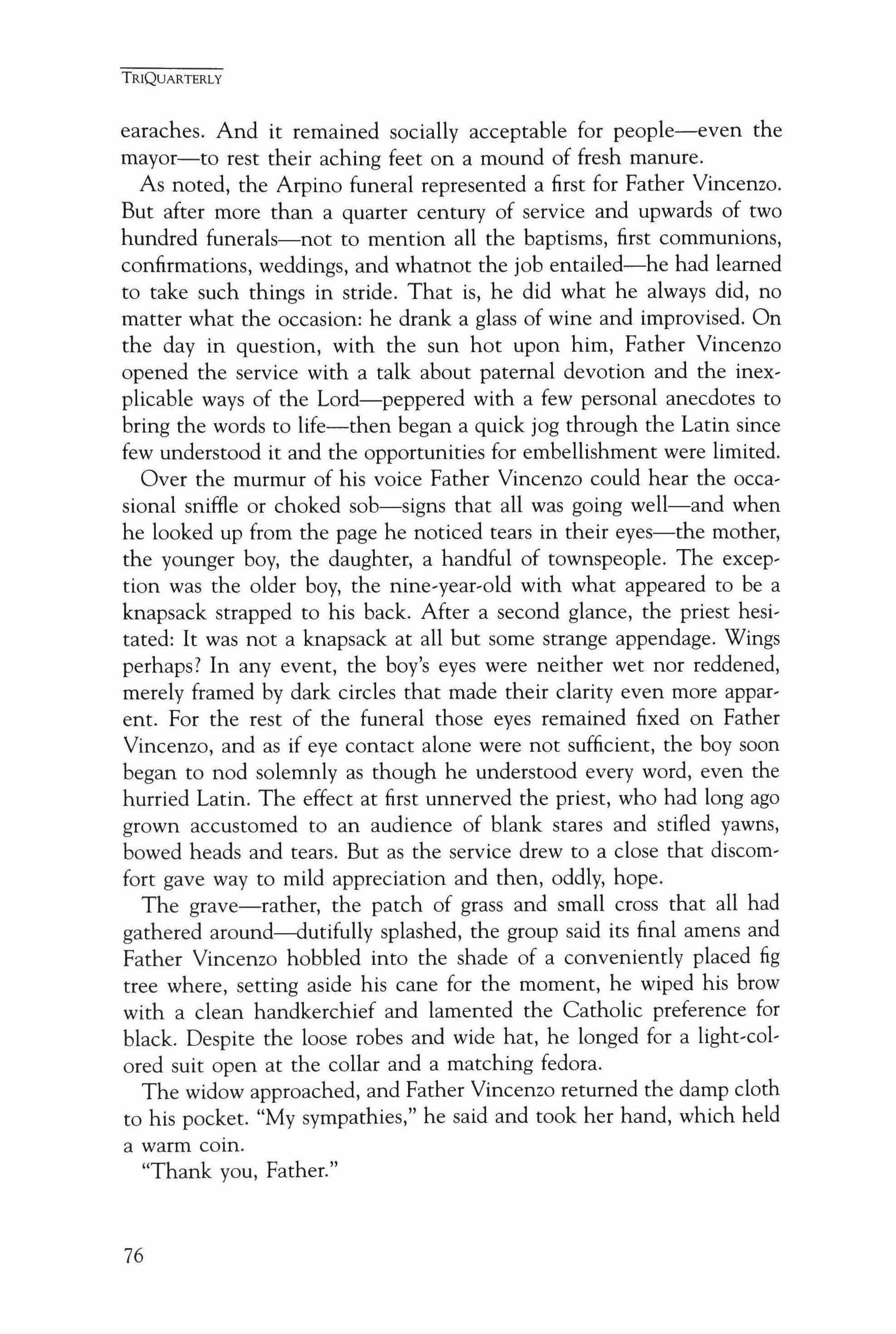
earaches. And it remained socially acceptable for people-even the mayor-to rest their aching feet on a mound of fresh manure.
As noted, the Arpino funeral represented a first for Father Vincenzo. But after more than a quarter century of service and upwards of two hundred funerals-not to mention all the baptisms, first communions, confirmations, weddings, and whatnot the job entailed-he had learned to take such things in stride. That is, he did what he always did, no matter what the occasion: he drank a glass of wine and improvised. On the day in question, with the sun hot upon him, Father Vincenzo opened the service with a talk about paternal devotion and the inexplicable ways of the Lord-peppered with a few personal anecdotes to bring the words to life-then began a quick jog through the Latin since few understood it and the opportunities for embellishment were limited.
Over the murmur of his voice Father Vincenzo could hear the occasional sniffle or choked sob-signs that all was going well-and when he looked up from the page he noticed tears in their eyes-the mother, the younger boy, the daughter, a handful of townspeople. The exception was the older boy, the nine-year-old with what appeared to be a knapsack strapped to his back. After a second glance, the priest hesitated: It was not a knapsack at all but some strange appendage. Wings perhaps? In any event, the boy's eyes were neither wet nor reddened, merely framed by dark circles that made their clarity even more apparent. For the rest of the funeral those eyes remained fixed on Father Vincenzo, and as if eye contact alone were not sufficient, the boy soon began to nod solemnly as though he understood every word, even the hurried Latin. The effect at first unnerved the priest, who had long ago grown accustomed to an audience of blank stares and stifled yawns, bowed heads and tears. But as the service drew to a close that discomfort gave way to mild appreciation and then, oddly, hope.
The grave-rather, the patch of grass and small cross that all had gathered around-dutifully splashed, the group said its final amens and Father Vincenzo hobbled into the shade of a conveniently placed fig tree where, setting aside his cane for the moment, he wiped his brow with a clean handkerchief and lamented the Catholic preference for black. Despite the loose robes and wide hat, he longed for a light-colored suit open at the collar and a matching fedora.
The widow approached, and Father Vincenzo returned the damp cloth to his pocket. "My sympathies," he said and took her hand, which held a warm coin.
"Thank you, Father."
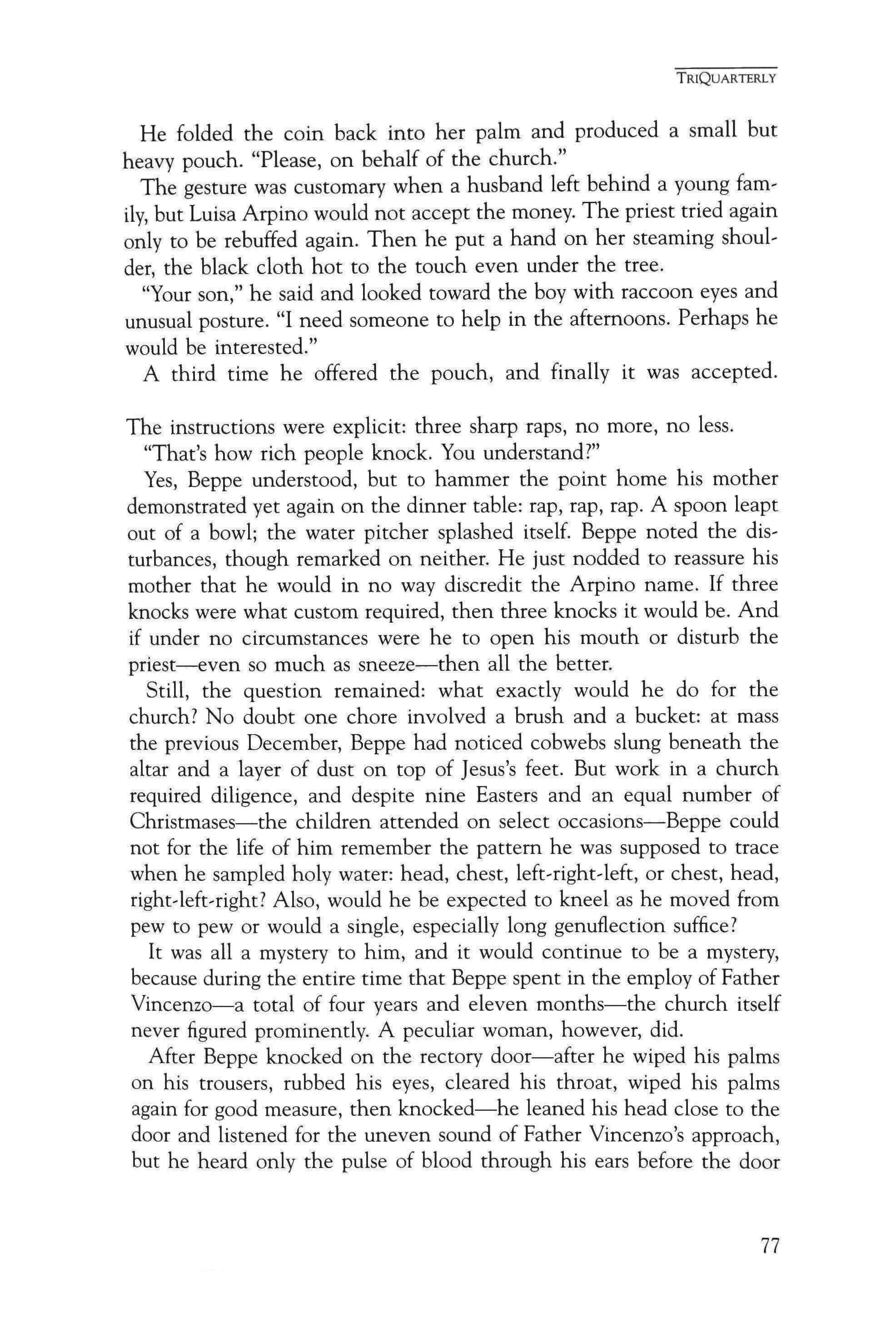
He folded the coin back into her palm and produced a small but heavy pouch. "Please, on behalf of the church."
The gesture was customary when a husband left behind a young family, but Luisa Arpino would not accept the money. The priest tried again only to be rebuffed again. Then he put a hand on her steaming shoulder, the black cloth hot to the touch even under the tree.
"Your son," he said and looked toward the boy with raccoon eyes and unusual posture. "I need someone to help in the afternoons. Perhaps he would be interested."
A third time he offered the pouch, and finally it was accepted.
The instructions were explicit: three sharp raps, no more, no less.
"That's how rich people knock. You understand?"
Yes, Beppe understood, but to hammer the point home his mother demonstrated yet again on the dinner table: rap, rap, rap. A spoon leapt out of a bowl; the water pitcher splashed itself. Beppe noted the dis, turbances, though remarked on neither. He just nodded to reassure his mother that he would in no way discredit the Arpino name. If three knocks were what custom required, then three knocks it would be. And if under no circumstances were he to open his mouth or disturb the priest-even so much as sneeze-then all the better.
Still, the question remained: what exactly would he do for the church? No doubt one chore involved a brush and a bucket: at mass the previous December, Beppe had noticed cobwebs slung beneath the altar and a layer of dust on top of Jesus's feet. But work in a church required diligence, and despite nine Easters and an equal number of Christmases-the children attended on select occasions-Beppe could not for the life of him remember the pattern he was supposed to trace when he sampled holy water: head, chest, left-right-left, or chest, head, right-left-right? Also, would he be expected to kneel as he moved from pew to pew or would a single, especially long genuflection suffice?
It was all a mystery to him, and it would continue to be a mystery, because during the entire time that Beppe spent in the employ of Father Vincenzo-a total of four years and eleven months-the church itself never figured prominently. A peculiar woman, however, did.
After Beppe knocked on the rectory door-after he wiped his palms on his trousers, rubbed his eyes, cleared his throat, wiped his palms again for good measure, then knocked-he leaned his head close to the door and listened for the uneven sound of Father Vincenzo's approach, but he heard only the pulse of blood through his ears before the door
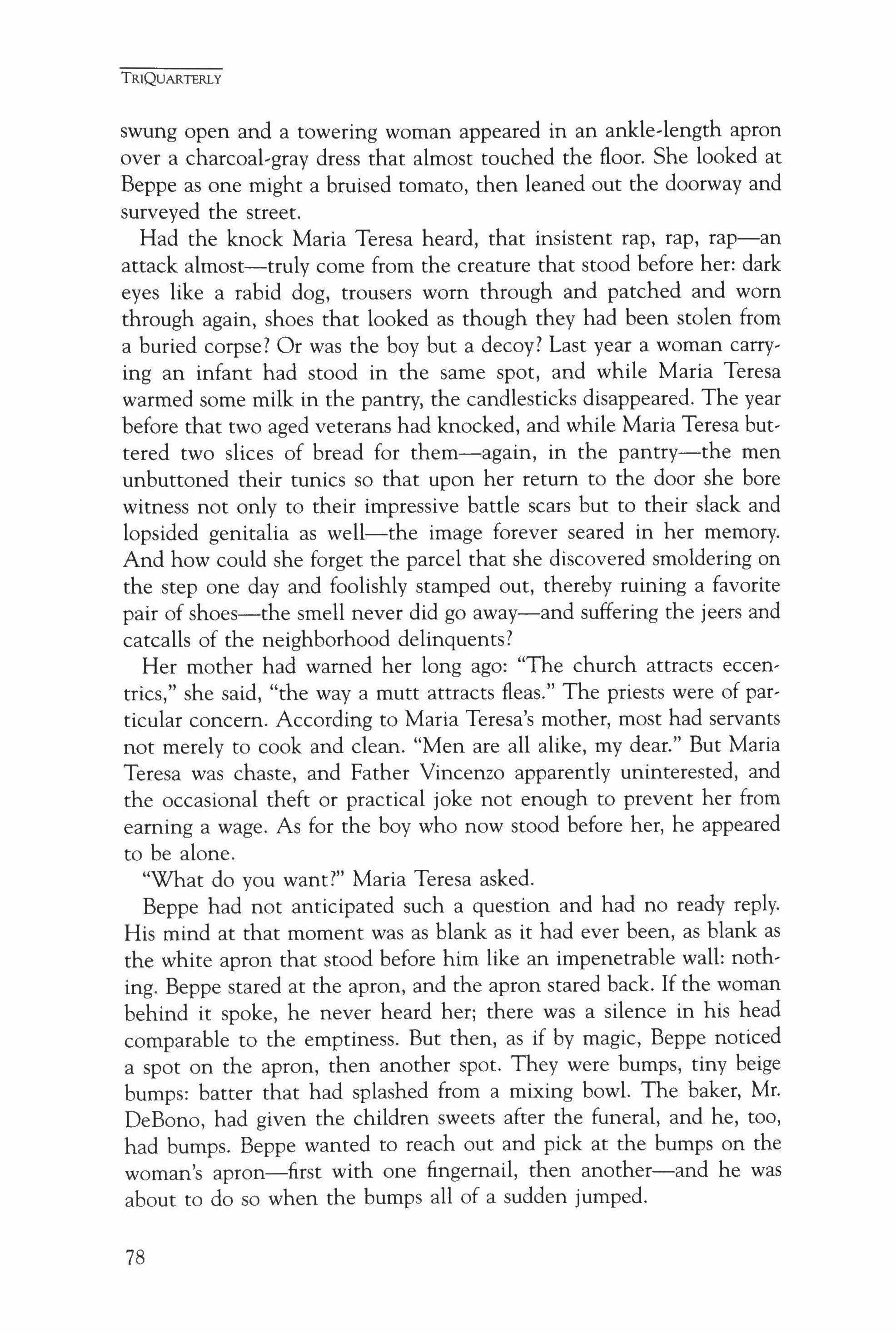
swung open and a towering woman appeared in an ankle-length apron over a charcoal-gray dress that almost touched the floor. She looked at Beppe as one might a bruised tomato, then leaned out the doorway and surveyed the street.
Had the knock Maria Teresa heard, that insistent rap, rap, rap-an attack almost-truly come from the creature that stood before her: dark eyes like a rabid dog, trousers worn through and patched and worn through again, shoes that looked as though they had been stolen from a buried corpse? Or was the boy but a decoy? Last year a woman carrying an infant had stood in the same spot, and while Maria Teresa warmed some milk in the pantry, the candlesticks disappeared. The year before that two aged veterans had knocked, and while Maria Teresa buttered two slices of bread for them-again, in the pantry-the men unbuttoned their tunics so that upon her return to the door she bore witness not only to their impressive battle scars but to their slack and lopsided genitalia as well-the image forever seared in her memory. And how could she forget the parcel that she discovered smoldering on the step one day and foolishly stamped out, thereby ruining a favorite pair of shoes-the smell never did go away-and suffering the jeers and catcalls of the neighborhood delinquents?
Her mother had warned her long ago: "The church attracts eccentrics," she said, "the way a mutt attracts fleas." The priests were of particular concern. According to Maria Teresa's mother, most had servants not merely to cook and clean. "Men are all alike, my dear." But Maria Teresa was chaste, and Father Vincenzo apparently uninterested, and the occasional theft or practical joke not enough to prevent her from earning a wage. As for the boy who now stood before her, he appeared to be alone.
"What do you want?" Maria Teresa asked.
Beppe had not anticipated such a question and had no ready reply. His mind at that moment was as blank as it had ever been, as blank as the white apron that stood before him like an impenetrable wall: nothing. Beppe stared at the apron, and the apron stared back. If the woman behind it spoke, he never heard her; there was a silence in his head comparable to the emptiness. But then, as if by magic, Beppe noticed a spot on the apron, then another spot. They were bumps, tiny beige bumps: batter that had splashed from a mixing bowl. The baker, Mr. Debono, had given the children sweets after the funeral, and he, too, had bumps. Beppe wanted to reach out and pick at the bumps on the woman's apron-first with one fingernail, then another-and he was about to do so when the bumps all of a sudden jumped.

The woman grabbed hold of both his arms and began to speak in an exaggerated manner, as though Beppe were deaf and visiting from a for, eign country. "I said," she all but yelled, "what do you want?"
"Beppe!" he managed to squeak, then added, "Arpino." And no sooner had he uttered those words than he realized the mistake: two words, just two words, and already he had soiled the family name.
"Beppe Arpino?" The woman released his arms and shook her head. ''Never heard of him." She pointed across the street. "You might try "No!" Beppe interrupted, as sweat began to pool in his socks. "That's me. I am Beppe. The Father said he wanted "Oh, the Father." The woman made room in the doorway. "Remember to wipe your feet."
Although the rectory may have been small and plainly furnished by Vatican standards, to Beppe it seemed opulent. There were carpets, for one thing, and electric lights. In the room where the woman told him to wait, two hundred-no, more like three hundred books lined a wall of wooden shelves. A leather chair of a design Beppe had never seen before sat in one comer, graced by a brass lamp with a thin brass chain that ended in a scarlet tassel. In another comer: a globe on a pedestal. Even if Beppe had stretched out his arms as wide as he could and tried to encircle the globe like a long-lost brother, his fingertips would have failed to meet on the other side. By comparison, the globe at school seemed ridiculous.
Beppe leaned over a polished table and examined his reflection in the surface. His face appeared dim and rather distant, as though age had intervened. Beppe wrinkled his nose. He scowled at himself; he grimaced and frowned. He made a face like the face he imagined would be his in, say, fifty years. It looked nothing like his father's, though his father died at half that age. Beppe had accompanied him the morning he left Cortenza. Together they walked to the edge of town, where a stranger and two mules waited. His mother had stayed home, hysterical, with the younger children. A nine-year-old could find his way back alone.
Beppe had carried a tin box wrapped in a checkered handkerchief. The box held the last home-cooked meal his father would ever eat: green beans in tomato sauce, a little beef. It made the tin warm in places, especially the bottom. Beppe's father carried a small valise in one hand, a rope tied around a rolled blanket in the other. On his feet were the only shoes that Beppe had ever seen him wear-black except

at the cracks where the brown showed through. Old shoes, comfortable shoes. And now, carpet: softer than the mattress Beppe shared with his brother, like standing barefoot in damp grass, or perhaps what the mayor felt when his soles kissed manure.
"Excuse me." Father Vincenzo touched the startled shoulder. "Here, sit down for a moment and catch your breath."
The boy complied into Father Vincenzo's prized chair. But no matter; he would have Maria Teresa wipe it down later.
"And how about some milk?"
Father Vincenzo lifted a pewter bell from a low table and shook it. He then pulled a straight-backed chair to a spot opposite Beppe, though in the process his cane slipped to the floor and nearly tripped him.
"How I hate that thing," he said after he finally settled. "And where is Maria Teresa?" He picked up the bell again. "If that cane doesn't kill me, that woman will."
But a moment later Maria Teresa appeared, and within minutes Beppe and the priest were sharing a plate of warm biscotti. The cookies were shaped like half-moons and fragile as china, their taste reminiscent of licorice. Beppe ate several and washed each down with a mouthful of warm milk flavored with what must have been coffee, while Father Vincenzo worked his way through a bottle of wine.
Thus far, Beppe could not complain: cookies and milk and no questions that required a verbal response. The priest rattled on, and Beppe nodded and stared, no brush or bucket in sight. What could be easier?
The woman who answered the door had not even asked to inspect his hands when the snack arrived, a routine Beppe's mother performed before each meal. He would unclench his fists for her one at a time, and no matter how clean the palms, she would tell him to wash. She feared disease and infection, as any mother would, but more than that she feared gypsies. Touch something a gypsy just touched-a doorknob, a counter-then touch your lips, and you developed a stutter. Wipe your eyes, and you would need glasses. Run a hand through your hair, and a gray streak appeared overnight. Worst of all, using the outhouse-so bad, in fact, that Beppe's mother refused to provide details, though he had seen old men urinate in the recesses of the public gardens and from the look of their organs--dark and reptilian, not spongy and pink-he had an idea what the damage might be.
"But enough about me." The priest paused for the first time in ten minutes and set aside his empty glass. "How are your studies, young man?"
Beppe nodded, then smiled, rubbed his eyes out of habit, but the priest persisted.

"You go to school, yes? What do they teach you at school?"
Beppe felt the last traces of moisture abandon his mouth. All of that milk, and suddenly nothing.
"You speak, do you not?"
Beppe braced himself. "Yes, Father."
"Good, very good. You had me worried there for a moment." The priest poured himself another glass and settled back in the chair. "It reminds me of the time--oh, this happened years ago, long before you were born-the time Pope Leo XIII forgot the words-ha, ha, ha-to the 'Hail Mary.' You see, I was a novitiate then, visiting Rome for only the second or third time. Perhaps it was the third time, because it was on my second trip that I met those two nuns from Australia. What were their names? Margaret and Joan? Now, there's a story. But you're too young for that. Suffice it to say that I was in Rome-we'll call it my third trip, shall we?-and I had just lunched at a lovely trattoria but a stone's throw from St. Peter's. Now, contrary to what the Neapolitans say, Rome does have the better restaurants. The food may be cornparable-I will concede as much-but the Romans truly know how to match their wines. If you order veal, for example-a breaded cutlet is always nice-you can rest assured that
And the story went on until a few minutes later when the priest promptly fell asleep.
Father Vincenzo's fondness for long, digressive monologues perhaps explained his continued presence in a remote and somewhat primitive outpost like Cortenza. Granted, the town had its charms-an unhurried pace and unspoiled vistas-but the night air carried venomous fevers-one reason the streets emptied at dusk-and the only physician, the druggist contended, still wrote prescriptions for leeches. There were no intellectuals to speak of and seldom outsiders: the nearest train station was a squalid affair that spooked all but the hardiest travelers, though a frail English poet did spend one night at the local inn-a visit he later commemorated in an otherwise forgettable sonnet.
But if a mere tendency to digress were enough to warrant exile to an isolated southern town, then Cortenza and its neighbors would have been crowded with clerics. The fact was that only the youngest or most abusive priests were banished to the far reaches of countryside: the enthusiastic beginners, the polygamists and blasphemers. What, then, had been Father Vincenzo's crime? In a word, wine. As Beppe soon discovered, the history, production, and consumption of that beverage were foremost among the priest's obsessions. Or as the bishop rather
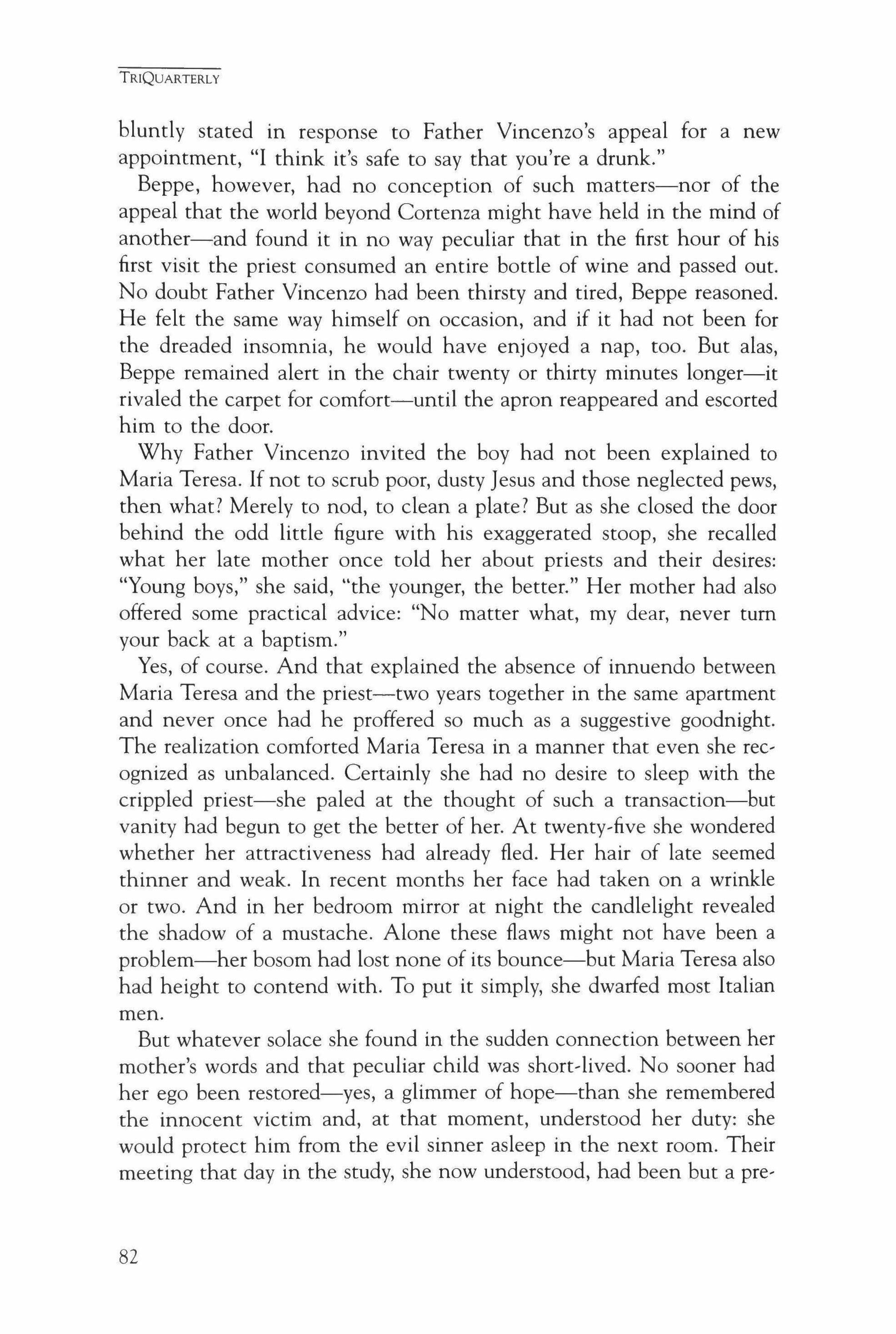
bluntly stated in response to Father Vincenzo's appeal for a new appointment, "I think it's safe to say that you're a drunk."
Beppe, however, had no conception of such matters-nor of the appeal that the world beyond Cortenza might have held in the mind of another-and found it in no way peculiar that in the first hour of his first visit the priest consumed an entire bottle of wine and passed out. No doubt Father Vincenzo had been thirsty and tired, Beppe reasoned. He felt the same way himself on occasion, and if it had not been for the dreaded insomnia, he would have enjoyed a nap, too. But alas, Beppe remained alert in the chair twenty or thirty minutes longer-it rivaled the carpet for comfort-until the apron reappeared and escorted him to the door.
Why Father Vincenzo invited the boy had not been explained to Maria Teresa. If not to scrub poor, dusty Jesus and those neglected pews, then what? Merely to nod, to clean a plate? But as she closed the door behind the odd little figure with his exaggerated stoop, she recalled what her late mother once told her about priests and their desires: "Young boys," she said, "the younger, the better." Her mother had also offered some practical advice: "No matter what, my dear, never tum your back at a baptism."
Yes, of course. And that explained the absence of innuendo between Maria Teresa and the priest-two years together in the same apartment and never once had he proffered so much as a suggestive goodnight. The realization comforted Maria Teresa in a manner that even she recognized as unbalanced. Certainly she had no desire to sleep with the crippled priest-she paled at the thought of such a transaction-but vanity had begun to get the better of her. At twenty-five she wondered whether her attractiveness had already fled. Her hair of late seemed thinner and weak. In recent months her face had taken on a wrinkle or two. And in her bedroom mirror at night the candlelight revealed the shadow of a mustache. Alone these flaws might not have been a problem-her bosom had lost none of its bounce-but Maria Teresa also had height to contend with. To put it simply, she dwarfed most Italian men.
But whatever solace she found in the sudden connection between her mother's words and that peculiar child was short-lived. No sooner had her ego been restored-yes, a glimmer of hope-than she remembered the innocent victim and, at that moment, understood her duty: she would protect him from the evil sinner asleep in the next room. Their meeting that day in the study, she now understood, had been but a pre-
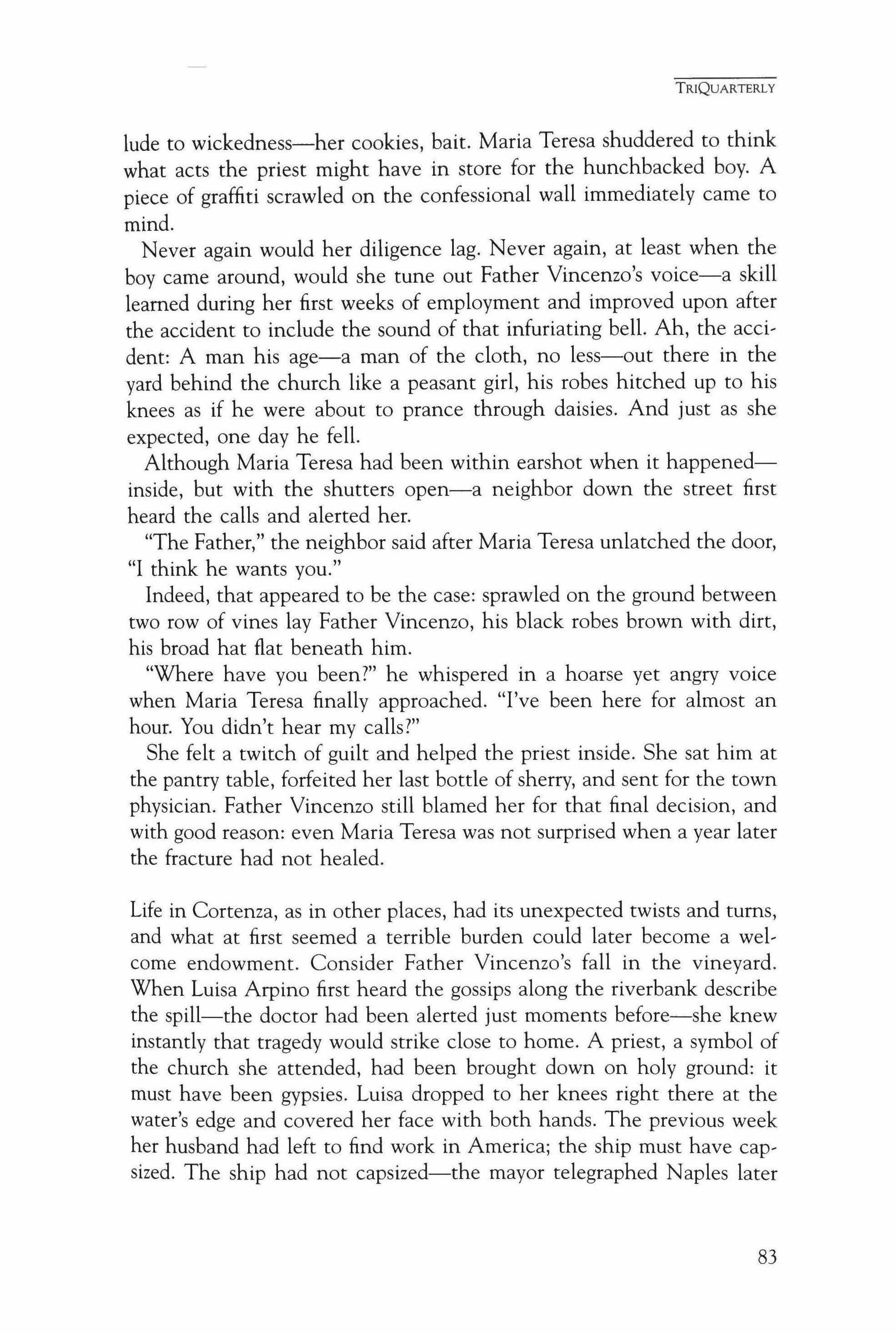
lude to wickedness-her cookies, bait. Maria Teresa shuddered to think what acts the priest might have in store for the hunchbacked boy. A piece of graffiti scrawled on the confessional wall immediately came to mind.
Never again would her diligence lag. Never again, at least when the boy came around, would she tune out Father Vincenzo's voice-a skill learned during her first weeks of employment and improved upon after the accident to include the sound of that infuriating bell. Ah, the accident: A man his age-a man of the cloth, no less-out there in the yard behind the church like a peasant girl, his robes hitched up to his knees as if he were about to prance through daisies. And just as she expected, one day he fell.
Although Maria Teresa had been within earshot when it happenedinside, but with the shutters open-a neighbor down the street first heard the calls and alerted her.
"The Father," the neighbor said after Maria Teresa unlatched the door, "I think he wants you."
Indeed, that appeared to be the case: sprawled on the ground between two row of vines lay Father Vincenzo, his black robes brown with dirt, his broad hat flat beneath him.
"Where have you been?" he whispered in a hoarse yet angry voice when Maria Teresa finally approached. "I've been here for almost an hour. You didn't hear my calls?"
She felt a twitch of guilt and helped the priest inside. She sat him at the pantry table, forfeited her last bottle of sherry, and sent for the town physician. Father Vincenzo still blamed her for that final decision, and with good reason: even Maria Teresa was not surprised when a year later the fracture had not healed.
Life in Cortenza, as in other places, had its unexpected twists and turns, and what at first seemed a terrible burden could later become a welcome endowment. Consider Father Vincenzo's fall in the vineyard. When Luisa Arpino first heard the gossips along the riverbank describe the spill-the doctor had been alerted just moments before-she knew instantly that tragedy would strike close to home. A priest, a symbol of the church she attended, had been brought down on holy ground: it must have been gypsies. Luisa dropped to her knees right there at the water's edge and covered her face with both hands. The previous week her husband had left to find work in America; the ship must have capsized. The ship had not capsized-the mayor telegraphed Naples later
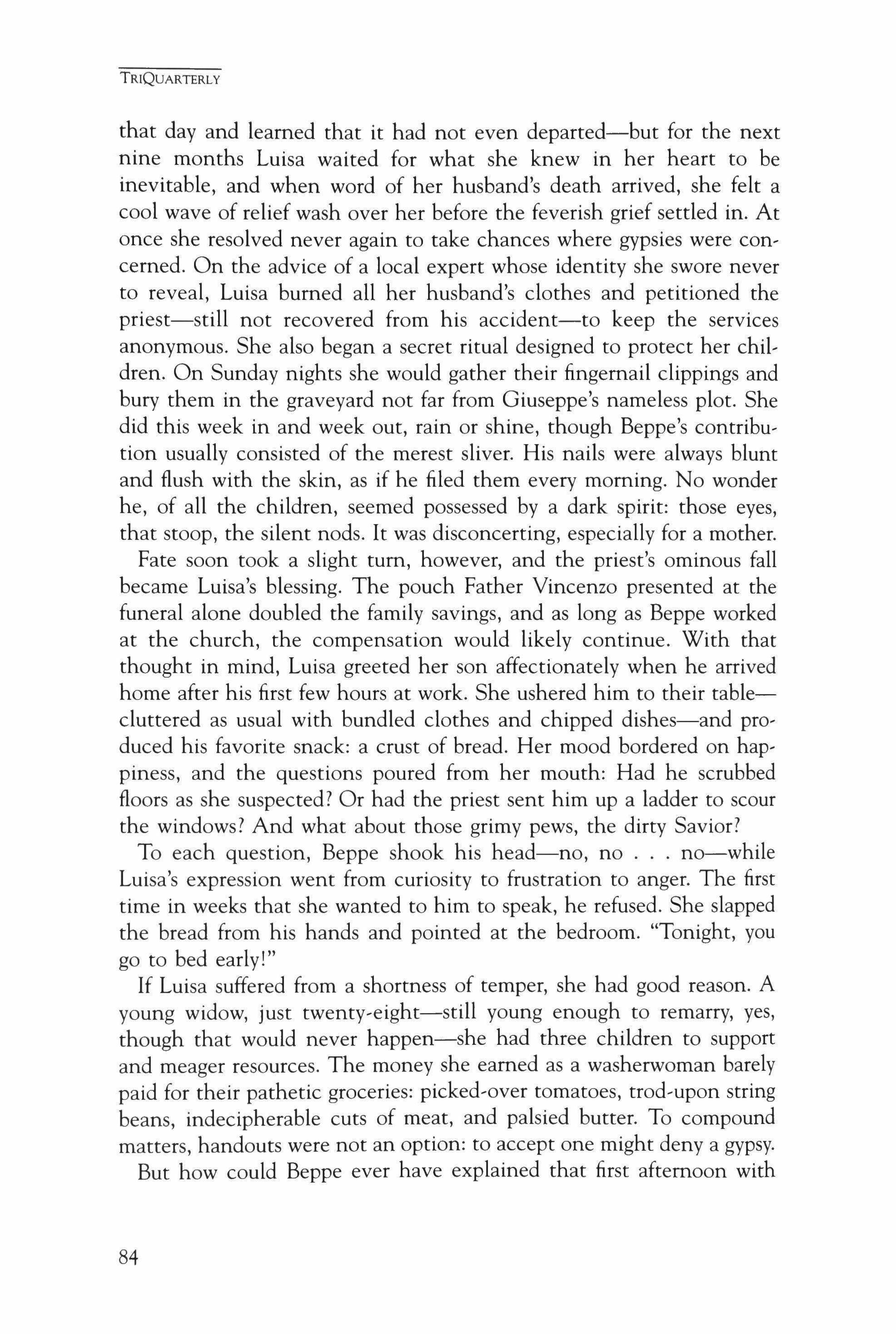
that day and learned that it had not even departed-but for the next nine months Luisa waited for what she knew in her heart to be inevitable, and when word of her husband's death arrived, she felt a cool wave of relief wash over her before the feverish grief settled in. At once she resolved never again to take chances where gypsies were concerned. On the advice of a local expert whose identity she swore never to reveal, Luisa burned all her husband's clothes and petitioned the priest-still not recovered from his accident-to keep the services anonymous. She also began a secret ritual designed to protect her children. On Sunday nights she would gather their fingernail clippings and bury them in the graveyard not far from Giuseppe's nameless plot. She did this week in and week out, rain or shine, though Beppe's contribution usually consisted of the merest sliver. His nails were always blunt and flush with the skin, as if he filed them every morning. No wonder he, of all the children, seemed possessed by a dark spirit: those eyes, that stoop, the silent nods. It was disconcerting, especially for a mother.
Fate soon took a slight tum, however, and the priest's ominous fall became Luisa's blessing. The pouch Father Vincenzo presented at the funeral alone doubled the family savings, and as long as Beppe worked at the church, the compensation would likely continue. With that thought in mind, Luisa greeted her son affectionately when he arrived home after his first few hours at work. She ushered him to their tablecluttered as usual with bundled clothes and chipped dishes-and produced his favorite snack: a crust of bread. Her mood bordered on happiness, and the questions poured from her mouth: Had he scrubbed floors as she suspected? Or had the priest sent him up a ladder to scour the windows? And what about those grimy pews, the dirty Savior?
To each question, Beppe shook his head-no, no no-while Luisa's expression went from curiosity to frustration to anger. The first time in weeks that she wanted to him to speak, he refused. She slapped the bread from his hands and pointed at the bedroom. "Tonight, you go to bed early!"
If Luisa suffered from a shortness of temper, she had good reason. A young widow, just twenty-eight-still young enough to remarry, yes, though that would never happen-she had three children to support and meager resources. The money she earned as a washerwoman barely paid for their pathetic groceries: picked-over tomatoes, trod-upon string beans, indecipherable cuts of meat, and palsied butter. To compound matters, handouts were not an option: to accept one might deny a gypsy.
But how could Beppe ever have explained that first afternoon with

Father Vincenzo? "Mama, I sat in an elaborate chair in an elegant room and ate delicate cookies while the priest napped before me." He would suffer more than a slap on the wrist with that response. Fortunately, he understood that his mother's outbursts had little to do with him directly. Her moods, though never altogether predictable, had become downright erratic after his father left. When her arm swung around and the crust went flying, the element of surprise was all but negligible, and Beppe left the room as impassive as he had entered it.
The bedroom: three cheap mattresses on a bare stone floor, one rick, ety chest of drawers. Beppe parked himself on the mattress he shared with his brother. It sank less than an inch beneath him. He stood up, then stepped on the mattress, walked around a bit. Without a doubt, the carpet had been softer. He sat down again and began to untie his shoes. His brother and sister, huddled in a corner over Old Icardi, glanced up and smiled. The doll appeared even more tattered than when Beppe first found it waist deep in a pile of rubbish on the walk home from school. He had cleaned it up and given it to his sister, who named it after the man next door: Old Icardi, an ancient widower whose efforts every morning to dislodge phlegm unnerved the neighborhood.
As Beppe watched, Paolo held the doll in place while Margherita sub, jected it to various treatments. First she tried to force a stick down its throat, and when that failed she began to beat Old Icardi across the back. The children's giggles brightened the room, though not Beppe. He watched but did not smile. Had Margherita and Paolo glanced again, perhaps they would have noticed the furrow that creased their brother's brow and how the intricacies of shoelaces now escaped him. And with a dose of intuition, the children might have guessed the cause of his anxiety: Father Vincenzo. The priest had fallen asleep with no mention of any chores. Did that mean Beppe had no job? If so, he could well anticipate his mother's reaction. He had no choice but to return in twenty-odd hours prepared to scrub, scour, polish, and wipe.
The vines had been planted years ago by priests now dead and buried. The church needed wine for sacramental purposes, and local supplies at that time were unreliable. Although the half-acre behind the church lacked the gentle slope recommended and broad shadows settled in at mid,afternoon, the vines nonetheless took hold and the priests never once had to dilute their precious beverage. But now that a railroad con, neeted Cortenza to wineries all over Europe, the church plants, at least in the mayor's opinion, had outlived their usefulness.
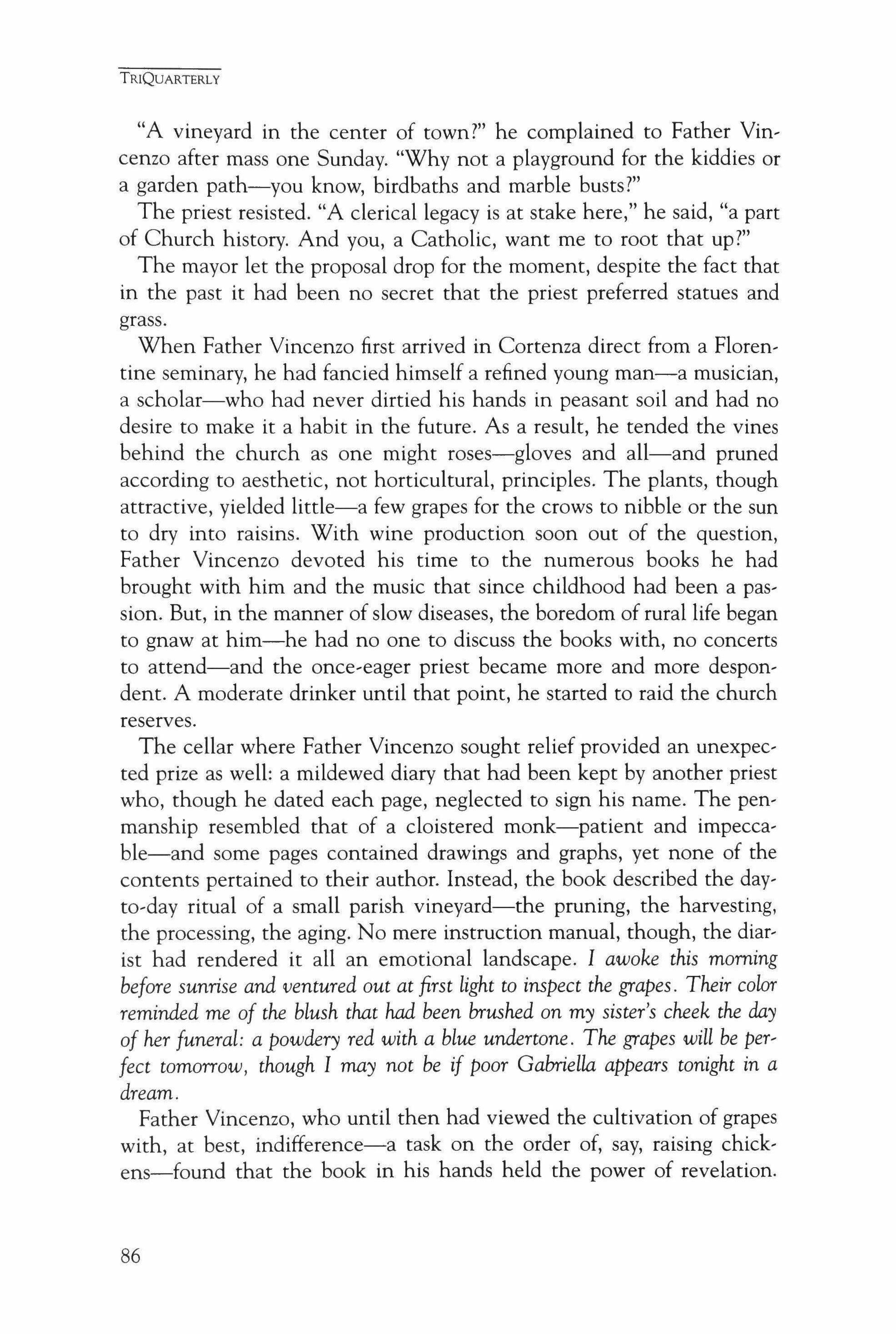
"A vineyard in the center of town?" he complained to Father Yin, cenzo after mass one Sunday. "Why not a playground for the kiddies or a garden path-you know, birdbaths and marble busts?"
The priest resisted. "A clerical legacy is at stake here," he said, "a part of Church history. And you, a Catholic, want me to root that up?"
The mayor let the proposal drop for the moment, despite the fact that in the past it had been no secret that the priest preferred statues and grass.
When Father Vincenzo first arrived in Cortenza direct from a Floren, tine seminary, he had fancied himself a refined young man-a musician, a scholar-who had never dirtied his hands in peasant soil and had no desire to make it a habit in the future. As a result, he tended the vines behind the church as one might roses-gloves and all-and pruned according to aesthetic, not horticultural, principles. The plants, though attractive, yielded little-a few grapes for the crows to nibble or the sun to dry into raisins. With wine production soon out of the question, Father Vincenzo devoted his time to the numerous books he had brought with him and the music that since childhood had been a pas' sion. But, in the manner of slow diseases, the boredom of rural life began to gnaw at him-he had no one to discuss the books with, no concerts to attend-and the once'eager priest became more and more despondent. A moderate drinker until that point, he started to raid the church reserves.
The cellar where Father Vincenzo sought relief provided an unexpected prize as well: a mildewed diary that had been kept by another priest who, though he dated each page, neglected to sign his name. The pen' manship resembled that of a cloistered monk-patient and impeccable-and some pages contained drawings and graphs, yet none of the contents pertained to their author. Instead, the book described the day, to-day ritual of a small parish vineyard-the pruning, the harvesting, the processing, the aging. No mere instruction manual, though, the diarist had rendered it all an emotional landscape. I awoke this morning before sunrise and ventured out at first light to inspect the grapes. Their color reminded me of the blush that had been brushed on my sister's cheek the day of her funeral: a powdery red with a blue undertone. The grapes will be per' fect tomorrow, though I may not be if poor Gabriella appears tonight in a dream.
Father Vincenzo, who until then had viewed the cultivation of grapes with, at best, indifference-a task on the order of, say, raising chick, ens-found that the book in his hands held the power of revelation.
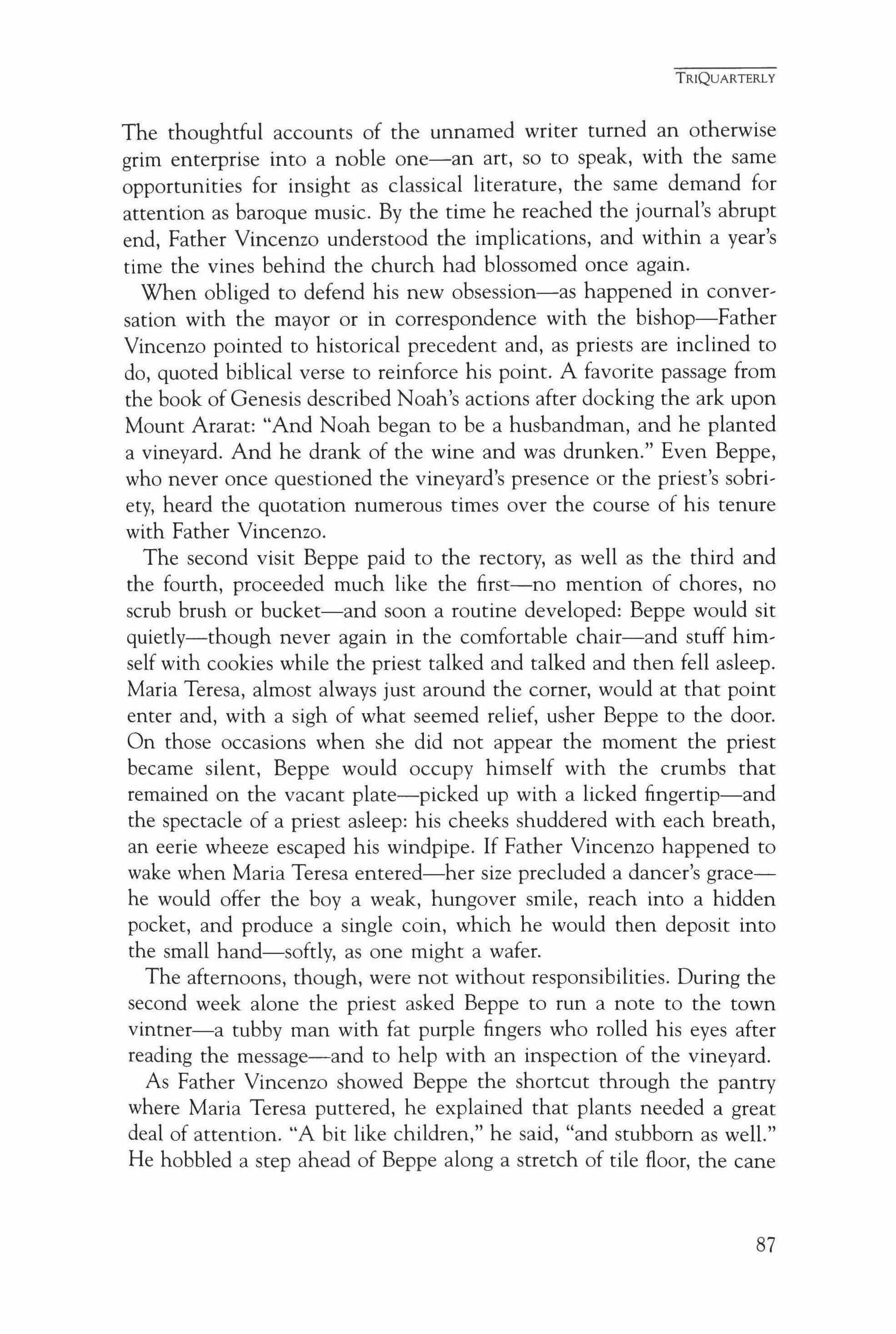
The thoughtful accounts of the unnamed writer turned an otherwise grim enterprise into a noble one-an art, so to speak, with the same opportunities for insight as classical literature, the same demand for attention as baroque music. By the time he reached the journal's abrupt end, Father Vincenzo understood the implications, and within a year's time the vines behind the church had blossomed once again.
When obliged to defend his new obsession-as happened in conversation with the mayor or in correspondence with the bishop-Father Vincenzo pointed to historical precedent and, as priests are inclined to do, quoted biblical verse to reinforce his point. A favorite passage from the book of Genesis described Noah's actions after docking the ark upon Mount Ararat: "And Noah began to be a husbandman, and he planted a vineyard. And he drank of the wine and was drunken." Even Beppe, who never once questioned the vineyard's presence or the priest's sobriety, heard the quotation numerous times over the course of his tenure with Father Vincenzo.
The second visit Beppe paid to the rectory, as well as the third and the fourth, proceeded much like the first-no mention of chores, no scrub brush or bucket-and soon a routine developed: Beppe would sit quietly-though never again in the comfortable chair-and stuff himself with cookies while the priest talked and talked and then fell asleep. Maria Teresa, almost always just around the corner, would at that point enter and, with a sigh of what seemed relief, usher Beppe to the door. On those occasions when she did not appear the moment the priest became silent, Beppe would occupy himself with the crumbs that remained on the vacant plate-picked up with a licked fingertip-and the spectacle of a priest asleep: his cheeks shuddered with each breath, an eerie wheeze escaped his windpipe. If Father Vincenzo happened to wake when Maria Teresa entered-her size precluded a dancer's gracehe would offer the boy a weak, hungover smile, reach into a hidden pocket, and produce a single coin, which he would then deposit into the small hand-softly, as one might a wafer.
The afternoons, though, were not without responsibilities. During the second week alone the priest asked Beppe to run a note to the town vintner-a tubby man with fat purple fingers who rolled his eyes after reading the message-and to help with an inspection of the vineyard.
As Father Vincenzo showed Beppe the shortcut through the pantry where Maria Teresa puttered, he explained that plants needed a great deal of attention. "A bit like children," he said, "and stubborn as well." He hobbled a step ahead of Beppe along a stretch of tile floor, the cane

in one hand, apprehension in the other. At the end of the room he leaned against a thick wooden door that, as Beppe soon discovered, opened onto the vineyard.
"Hello! Hello!" the priest called out. "And how are my babies?" He moved toward a knotted vine and, with the support of his cane, cupped a handful of berries. He held it for a moment, perhaps to gauge its weight. "The size and shape of a human heart."
Beppe followed the example, then let his fingers bump along the plump clusters.
At first he had not noticed the cello, almost hidden behind the massive globe, but after several afternoons of watching the priest sleep, the novelty wore off and Beppe's eyes began to wander. He started to count the books that lined the wooden shelves-one, two, three tenbut lost track somewhere near thirty. He picked up the crumbless plate and, turning it over, discovered that it came from China. He looked at the globe across the room and searched for a place with that nameimpossible at that distance. Then he caught sight of the instrument.
Beppe thought it large for violin and could not imagine how a person might play it: Seated? Standing? At the shoulder? The elbow? In a room full of neglected objects-books that he had never seen opened, a globe that never spun-it alone seemed most forgotten. The awkward child: a thin stump of a leg, a pear-shaped body, a stretched-out neck, and a slender head topped with effeminate curls. It all but cowered in the comer-until the rain one day dripped a thought into Father Vincenzo's consciousness.
The summer had been wet-the first time in recent memory-and though the Arpino family owned a decent umbrella, Luisa needed it most days to protect the laundry. Beppe, therefore, traveled between cloudbursts whenever possible. But the forecasts he made were by no means scientific, and on occasion he found himself a distance from home and unprotected. Not that rain bothered him-it felt rather nice, in fact-but adults disapproved. His mother, for example, feared the worst-malarial fevers and assorted plagues, not to mention electrocution-and kept him at home when a large storm threatened-a fact that, thanks to Beppe's silence at school, went undetected by the vigilant Miss Donati. Even Maria Teresa acted peculiar the time he arrived wet with rain.
"Are you crazy?" she asked as he dripped outside the just-opened door. Again, a question he felt unprepared to answer. Two months had
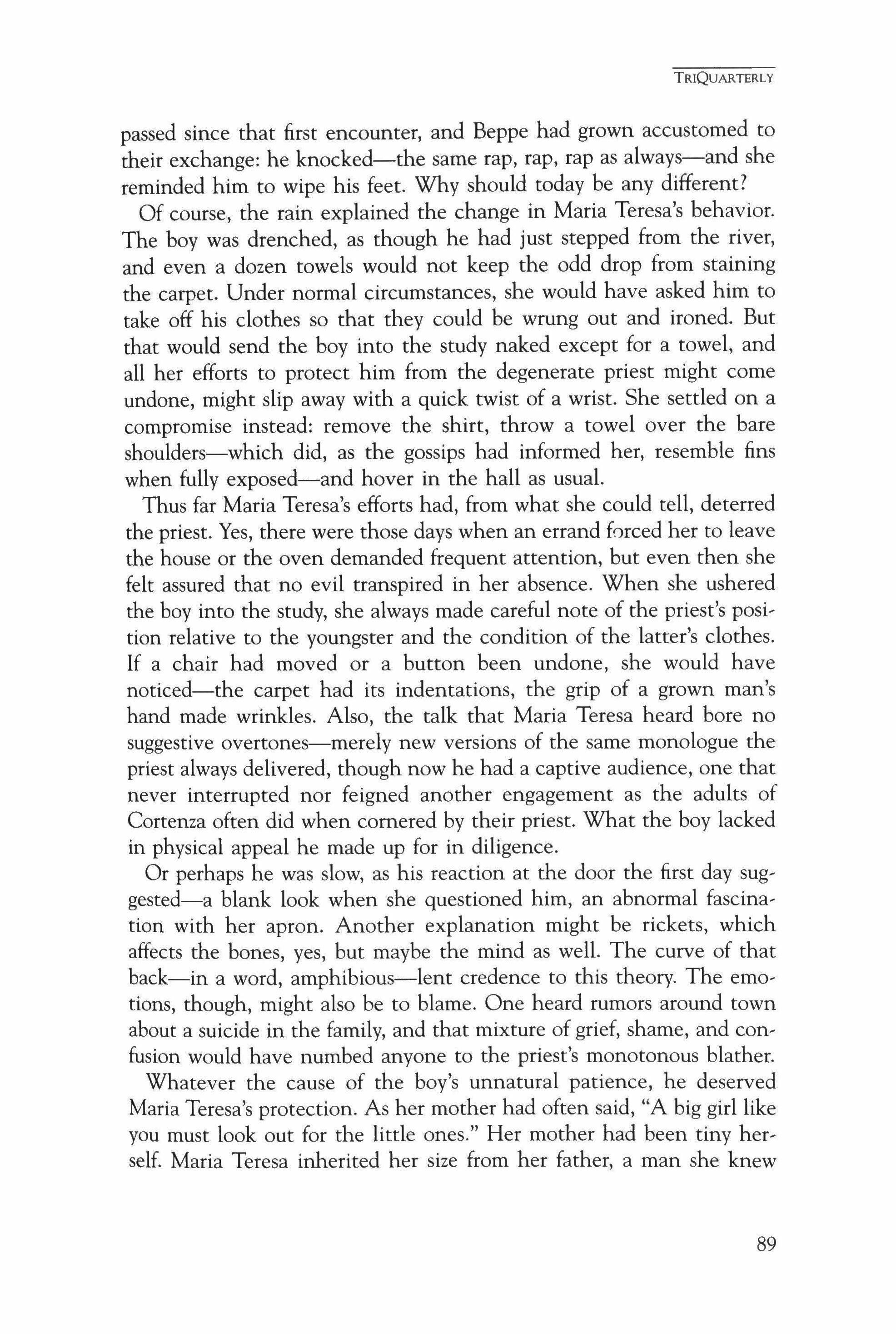
passed since that first encounter, and Beppe had grown accustomed to their exchange: he knocked-the same rap, rap, rap as always-and she reminded him to wipe his feet. Why should today be any different?
Of course, the rain explained the change in Maria Teresa's behavior. The boy was drenched, as though he had just stepped from the river, and even a dozen towels would not keep the odd drop from staining the carpet. Under normal circumstances, she would have asked him to take off his clothes so that they could be wrung out and ironed. But that would send the boy into the study naked except for a towel, and all her efforts to protect him from the degenerate priest might come undone, might slip away with a quick twist of a wrist. She settled on a compromise instead: remove the shirt, throw a towel over the bare shoulders-which did, as the gossips had informed her, resemble fins when fully exposed-and hover in the hall as usual.
Thus far Maria Teresa's efforts had, from what she could tell, deterred the priest. Yes, there were those days when an errand forced her to leave the house or the oven demanded frequent attention, but even then she felt assured that no evil transpired in her absence. When she ushered the boy into the study, she always made careful note of the priest's position relative to the youngster and the condition of the latter's clothes. If a chair had moved or a button been undone, she would have noticed-the carpet had its indentations, the grip of a grown man's hand made wrinkles. Also, the talk that Maria Teresa heard bore no suggestive overtones-merely new versions of the same monologue the priest always delivered, though now he had a captive audience, one that never interrupted nor feigned another engagement as the adults of Cortenza often did when cornered by their priest. What the boy lacked in physical appeal he made up for in diligence.
Or perhaps he was slow, as his reaction at the door the first day suggested-a blank look when she questioned him, an abnormal fascination with her apron. Another explanation might be rickets, which affects the bones, yes, but maybe the mind as well. The curve of that back-in a word, amphibious-lent credence to this theory. The ernotions, though, might also be to blame. One heard rumors around town about a suicide in the family, and that mixture of grief, shame, and confusion would have numbed anyone to the priest's monotonous blather.
Whatever the cause of the boy's unnatural patience, he deserved Maria Teresa's protection. As her mother had often said, "A big girl like you must look out for the little ones." Her mother had been tiny herself. Maria Teresa inherited her size from her father, a man she knew
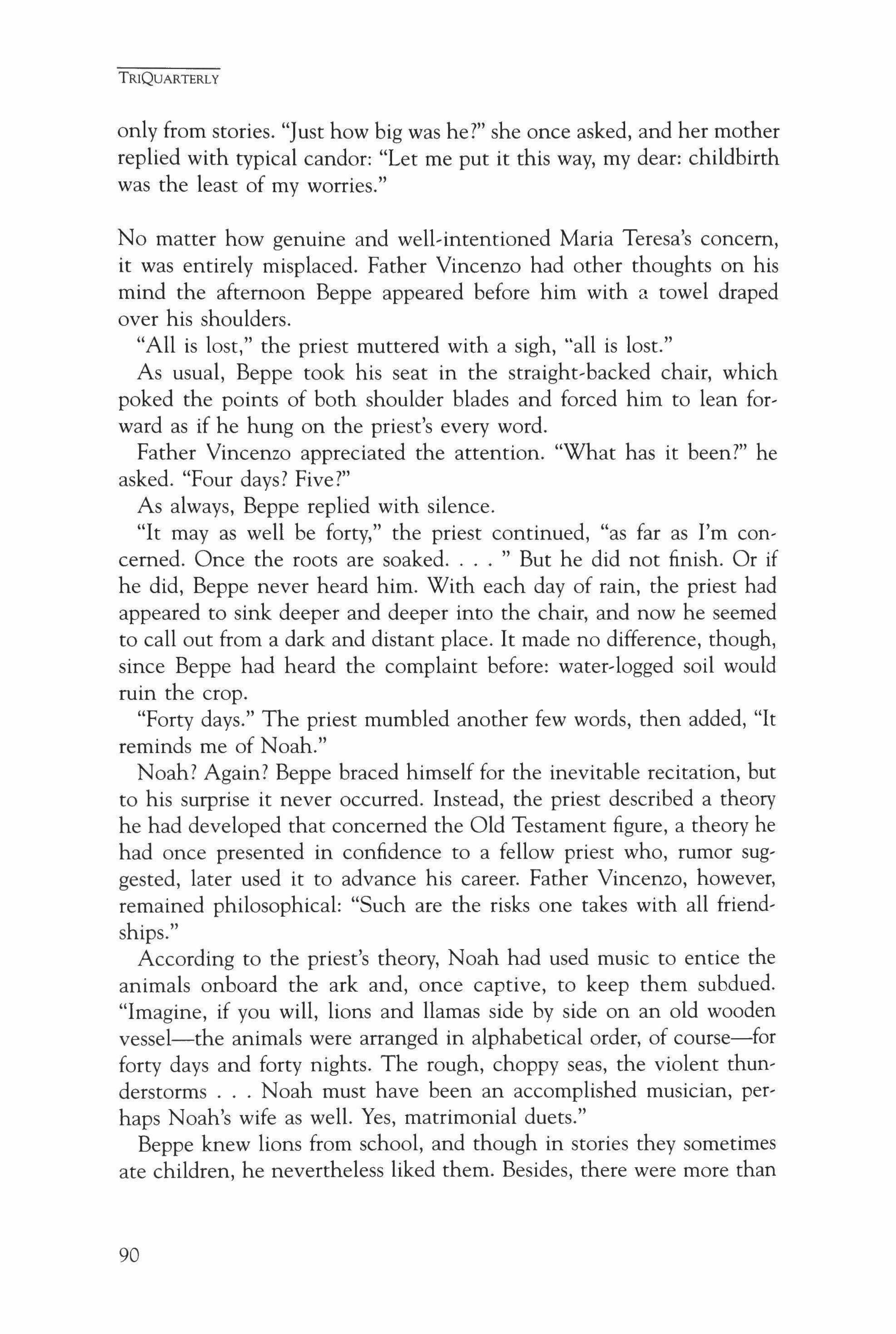
only from stories. "Just how big was he?" she once asked, and her mother replied with typical candor: "Let me put it this way, my dear: childbirth was the least of my worries."
No matter how genuine and well,intentioned Maria Teresa's concern, it was entirely misplaced. Father Vincenzo had other thoughts on his mind the afternoon Beppe appeared before him with a towel draped over his shoulders.
"All is lost," the priest muttered with a sigh, "all is lost."
As usual, Beppe took his seat in the straight-backed chair, which poked the points of both shoulder blades and forced him to lean for' ward as if he hung on the priest's every word.
Father Vincenzo appreciated the attention. "What has it been?" he asked. "Four days? Five?"
As always, Beppe replied with silence.
"It may as well be forty," the priest continued, "as far as I'm concerned. Once the roots are soaked. But he did not finish. Or if he did, Beppe never heard him. With each day of rain, the priest had appeared to sink deeper and deeper into the chair, and now he seemed to call out from a dark and distant place. It made no difference, though, since Beppe had heard the complaint before: water,logged soil would ruin the crop.
"Forty days." The priest mumbled another few words, then added, "It reminds me of Noah."
Noah? Again? Beppe braced himself for the inevitable recitation, but to his surprise it never occurred. Instead, the priest described a theory he had developed that concerned the Old Testament figure, a theory he had once presented in confidence to a fellow priest who, rumor suggested, later used it to advance his career. Father Vincenzo, however, remained philosophical: "Such are the risks one takes with all friendships."
According to the priest's theory, Noah had used music to entice the animals onboard the ark and, once captive, to keep them subdued.
"Imagine, if you will, lions and llamas side by side on an old wooden vessel-the animals were arranged in alphabetical order, of course-for forty days and forty nights. The rough, choppy seas, the violent thunderstorms Noah must have been an accomplished musician, perhaps Noah's wife as well. Yes, matrimonial duets."
Beppe knew lions from school, and though in stories they sometimes ate children, he nevertheless liked them. Besides, there were more than
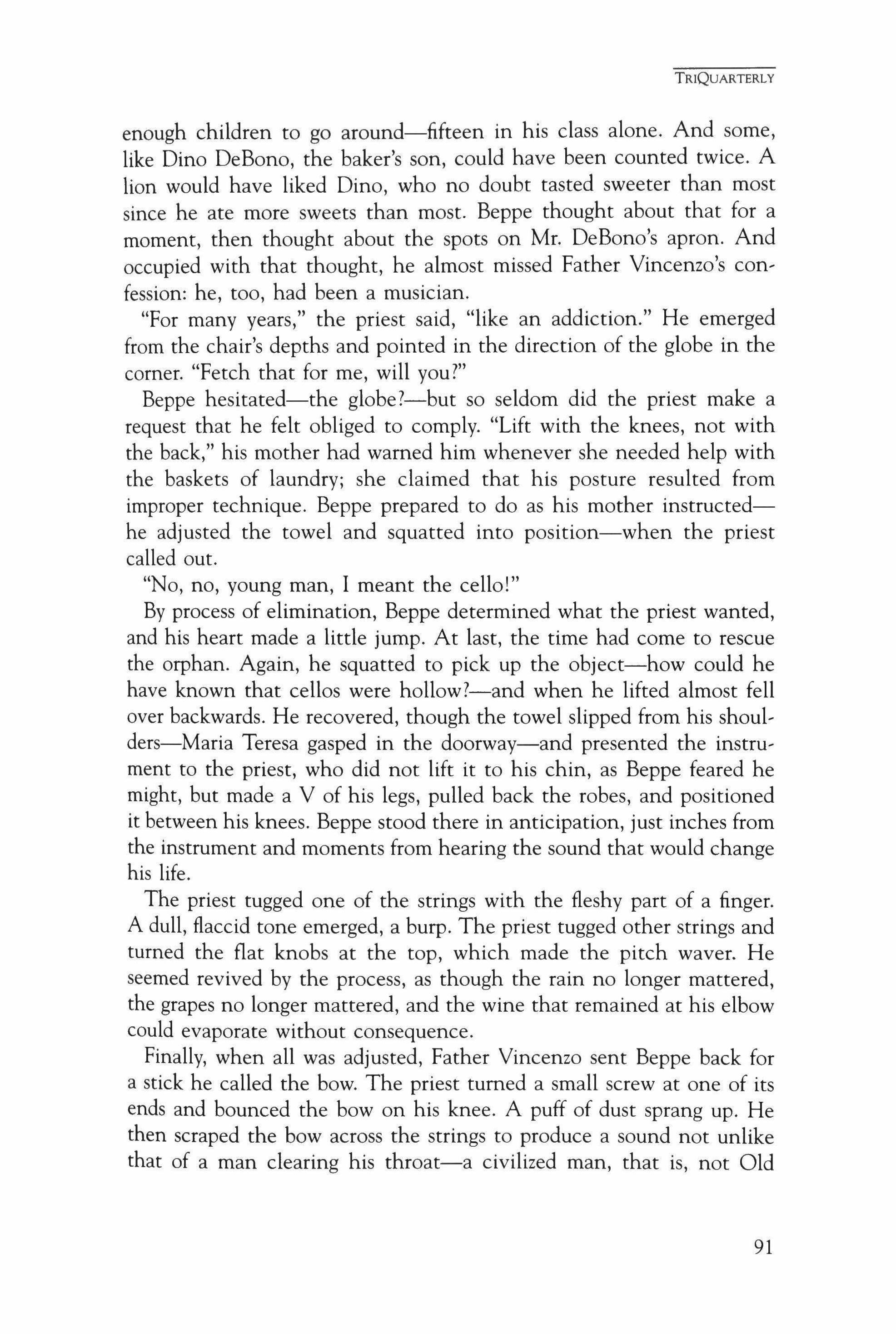
enough children to go around-fifteen in his class alone. And some, like Dino DeBono, the baker's son, could have been counted twice. A lion would have liked Dino, who no doubt tasted sweeter than most since he ate more sweets than most. Beppe thought about that for a moment, then thought about the spots on Mr. DeBono's apron. And occupied with that thought, he almost missed Father Vincenzo's confession: he, too, had been a musician.
"For many years," the priest said, "like an addiction." He emerged from the chair's depths and pointed in the direction of the globe in the corner. "Fetch that for me, will you?"
Beppe hesitated-the globe?-but so seldom did the priest make a request that he felt obliged to comply. "Lift with the knees, not with the back," his mother had warned him whenever she needed help with the baskets of laundry; she claimed that his posture resulted from improper technique. Beppe prepared to do as his mother instructedhe adjusted the towel and squatted into position-when the priest called out.
"No, no, young man, I meant the cello!"
By process of elimination, Beppe determined what the priest wanted, and his heart made a little jump. At last, the time had come to rescue the orphan. Again, he squatted to pick up the object-how could he have known that cellos were hollow?-and when he lifted almost fell over backwards. He recovered, though the towel slipped from his shoulders-Maria Teresa gasped in the doorway-and presented the instrument to the priest, who did not lift it to his chin, as Beppe feared he might, but made a V of his legs, pulled back the robes, and positioned it between his knees. Beppe stood there in anticipation, just inches from the instrument and moments from hearing the sound that would change his life.
The priest tugged one of the strings with the fleshy part of a finger. A dull, flaccid tone emerged, a burp. The priest tugged other strings and turned the flat knobs at the top, which made the pitch waver. He seemed revived by the process, as though the rain no longer mattered, the grapes no longer mattered, and the wine that remained at his elbow could evaporate without consequence.
Finally, when all was adjusted, Father Vincenzo sent Beppe back for a stick he called the bow. The priest turned a small screw at one of its ends and bounced the bow on his knee. A puff of dust sprang up. He then scraped the bow across the strings to produce a sound not unlike that of a man clearing his throat-a civilized man, that is, not Old

Icardi. What happened next would remain clear in Beppe's mind for the rest of his life, until those final tragic moments when the explosives detonated. He would remember it with the clarity of an afterimage, the effect that occurs when you stare at something-a tooth, for examplethen close your eyes and still see the object in darkness: a tooth, perhaps even the crack.
The music went straight to Beppe's knees, which wobbled and weakened and forced him back into the uncomfortable chair. His shoulder blades, however, did not protest. The music had a sedative effect, as though he had fallen under the spell of a kind-hearted gypsy. Whether the priest was accomplished or not, Beppe could not say. The only music he had heard until that moment came from the local accordionist and a teacher at school who tortured violins. What the priest played sounded different. It rose and fell much like laughter, yet at times had a melancholy edge. Some notes were long as the walk home that day Beppe's father left, others quick as blinks. The tone itself was warm, like a blanket, and reminded Beppe of the bells on top of the church that he would never clean and of his mother years back when she would wash young Paolo and hum to herself and fill their home with the sounds of a woman, a baby, and water. Beppe stood there, stunned, and watched the priest work the instrument, watched the bow glide over the strings like a gondola, the left hand contort itself like an old spider, the face twist in a painful grimace.
When the priest finished-it may have been the whole piece or just the beginning, Beppe had no idea-he propped the bow against the cello and the cello against the chair and complained of his shoulder, the fall in the vineyard, his need for refreshment. He reached for the glass, and Beppe reached for the bow.

Cross-hatched, checkered, and blithering-swarms and swarms of patterns displayed.
I'll take a two mile ride over the white foam.
I love the undoing, secret agenda of the weave. That's when we see the new frontier. Skather and dreck, Skather and dreck.
So can't I lift the pleasure from there and put it here now, or adjust it, how?
People wear a tolerant moment, get advice, move on. Pleasure's outline
dances a frilly waltz near the cove.
Come on, airy spectators, keep close, the lights aren't down yet, the trailers haven't started.

Time to summon those metal fasteners. Time to watch the moon-eggs
roll and fix themselves.
Can't you tell I've been celibate for-what's it been?washes and leaves of days, except for the occasional sharpness with a pelican friend. In horizontal mist I tell him show off your slips and stays. Like once she loved that bull, all its wiry hair.
Time to weave the diving fins a silver stitch pull shore up then shallow over shimmer leap and pour
I'm pulled into petals and I'm surprised
I welcome it so.

I climbed to the platform of static, checked out fringes and moss.
Now, I could decide to view this sunroom as a luxury, find the right architect who'd see its flesh and admire my shape alongside. Sometimes I'll just move in slow motion to see how the glow reacts, what the grass withholds.
That's the plum of loneliness. And deep in my lungs fruits ripen, a low murmur begins.
Nothing compares to the thistles' hair, its deadliness, its lure.
I thought I'd use the urchin as a dial, make it click.
I should be more delicate, but who's watching? I scissored the glass surface, the edges curled up in reaction, arousal.
Bubbles cluster in a lather of air-rooms and blossoms.
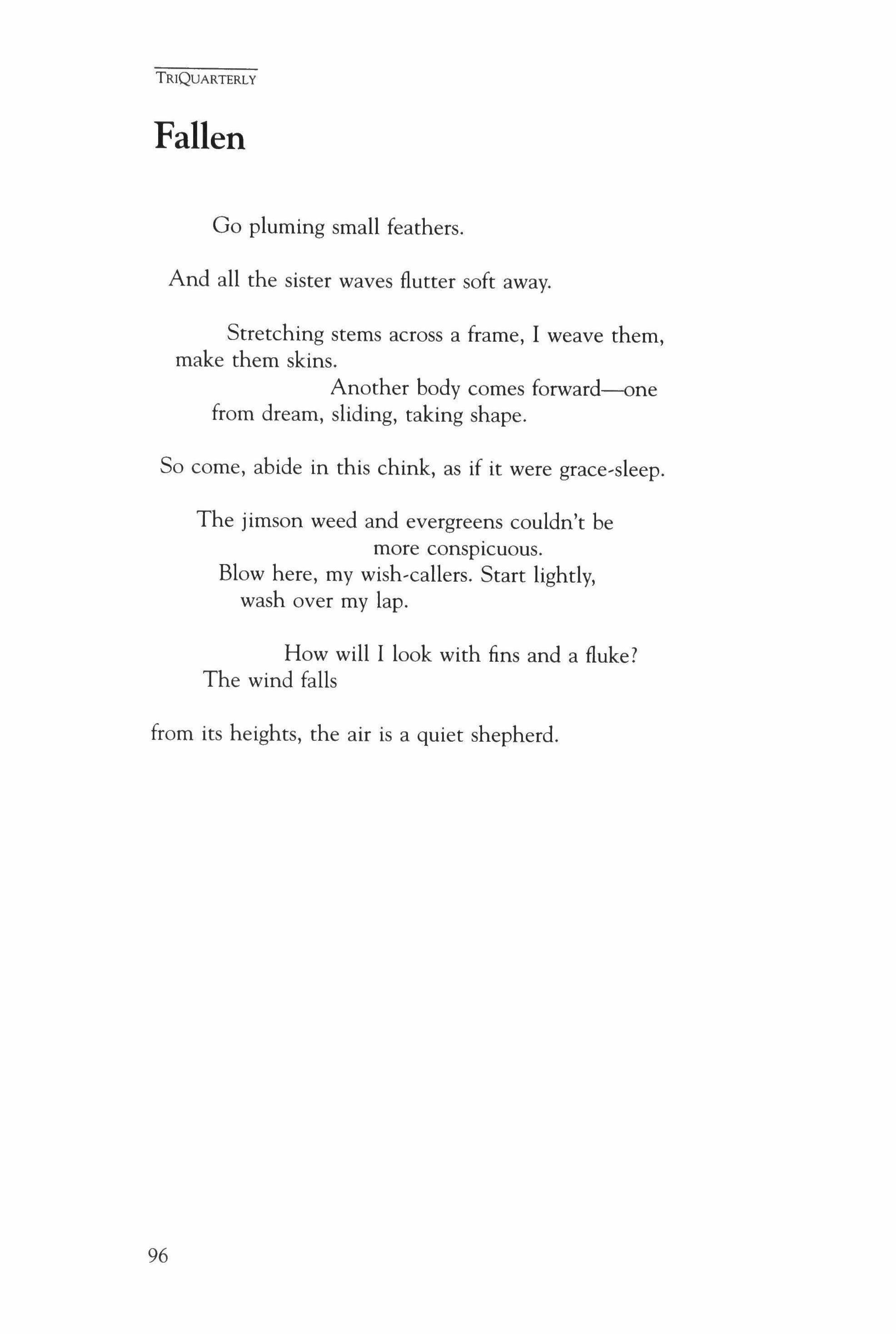
Go pluming small feathers.
And all the sister waves flutter soft away.
Stretching stems across a frame, I weave them, make them skins.
Another body comes forward--one from dream, sliding, taking shape.
So come, abide in this chink, as if it were grace-sleep.
The j imson weed and evergreens couldn't be more conspicuous. Blow here, my wish-callers. Start lightly, wash over my lap.
How will I look with fins and a fluke? The wind falls from its heights, the air is a quiet shepherd.
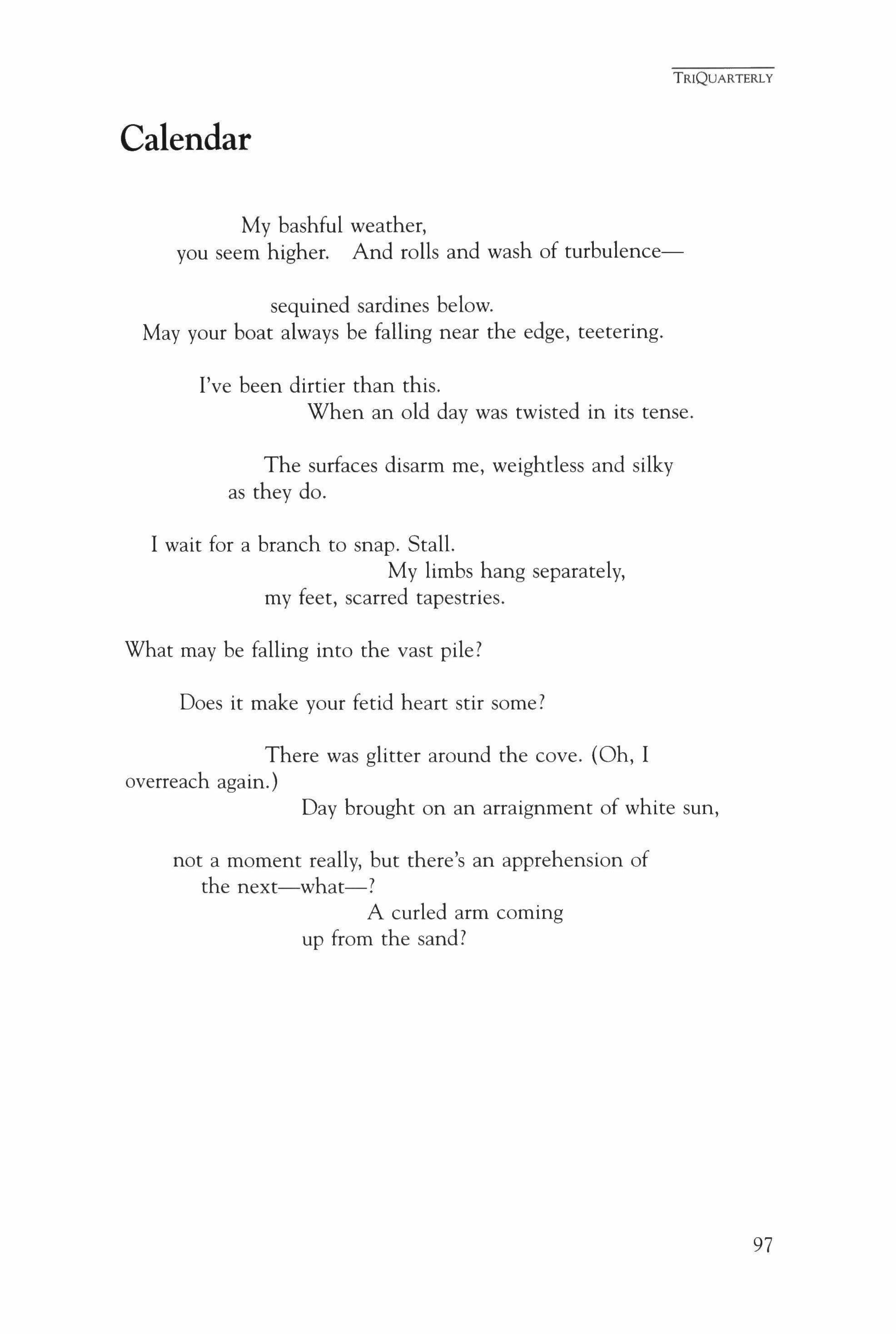
My bashful weather, you seem higher. And rolls and wash of turbulencesequined sardines below. May your boat always be falling near the edge, teetering.
I've been dirtier than this. When an old day was twisted in its tense.
The surfaces disarm me, weightless and silky as they do.
I wait for a branch to snap. Stall. My limbs hang separately, my feet, scarred tapestries.
What may be falling into the vast pile?
Does it make your fetid heart stir some?
There was glitter around the cove. (Oh, I overreach again.)
Day brought on an arraignment of white sun, not a moment really, but there's an apprehension of the next-what-?
A curled arm coming up from the sand?

She can walk
We're in a grimy park in Guanzhou by the White Swan Hotel
She's practicing tai chi her indigo pajamas and black slippers just like the other miniature
old women their smooth gestures their flexibility and serenity their healed feet tiny as kindergarteners and how fluid she is my smart mother turning aside now to remind me
Gail stand up straight the spine is the Pillar of Heaven
But I'm worried and whiney flailing in the shadow of a tree, incapacitated as in life
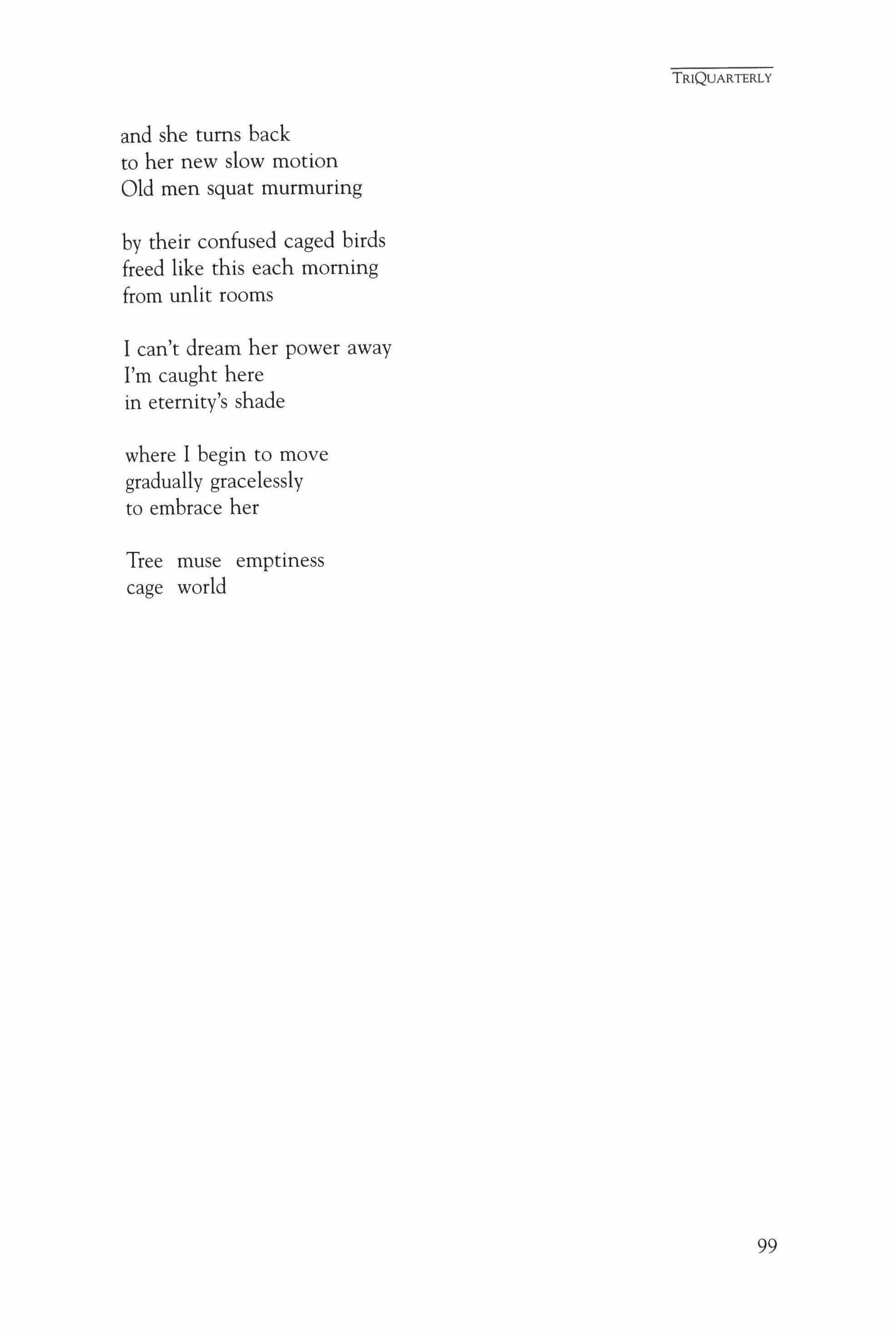
and she turns back to her new slow motion Old men squat murmuring by their confused caged birds freed like this each morning from unlit rooms
I can't dream her power away I'm caught here in eternity's shade where I begin to move gradually gracelessly to embrace her
Tree muse emptiness cage world
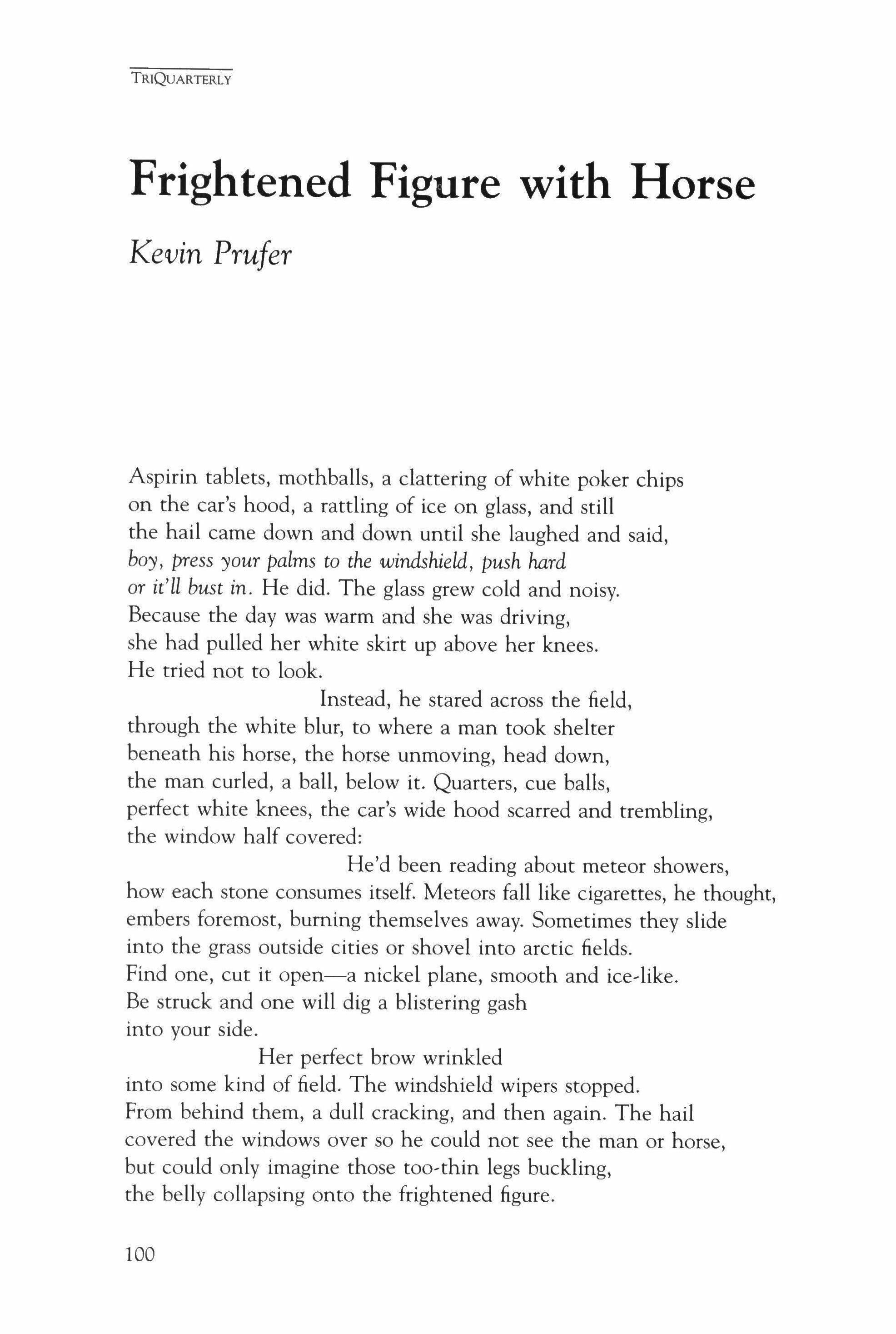
Aspirin tablets, mothballs, a clattering of white poker chips on the car's hood, a rattling of ice on glass, and still the hail came down and down until she laughed and said, boy, press your palms to the windshield, push hard or it'll bust in. He did. The glass grew cold and noisy. Because the day was warm and she was driving, she had pulled her white skirt up above her knees. He tried not to look.
Instead, he stared across the field, through the white blur, to where a man took shelter beneath his horse, the horse unmoving, head down, the man curled, a ball, below it. Quarters, cue balls, perfect white knees, the car's wide hood scarred and trembling, the window half covered:
He'd been reading about meteor showers, how each stone consumes itself. Meteors fall like cigarettes, he thought, embers foremost, burning themselves away. Sometimes they slide into the grass outside cities or shovel into arctic fields. Find one, cut it open-a nickel plane, smooth and ice-like. Be struck and one will dig a blistering gash into your side.
Her perfect brow wrinkled into some kind of field. The windshield wipers stopped. From behind them, a dull cracking, and then again. The hail covered the windows over so he could not see the man or horse, but could only imagine those too-thin legs buckling, the belly collapsing onto the frightened figure.

Bruce's idea. He found the place near Marine, north of St. Paul, and then astonished Elaine by taking it for the entire summer when they decided, after all, to get back together. You'll love it, he said. One of those great old cottages from the twenties, right on the river. He wanted to throw some money around, he said, celebrate. Find a get-away, just the two of us.
A dodgy thought darted through Elaine's mind: just where did this get-away talk come from? Did he and Janice have get-aways? Was flight now always to be part of the poetry of love?
But she let it go. She was aware of her powers. The chastened husband returned. She was past the pinpricks of pleasure she had experienced during the months when Bruce had been so uncharacteristically worried, fear in his eyes, waiting to see if she would cave. It had been a winter of record storms, and she watched the snow pile up, in no rush to bring things to a conclusion.
The divorce had been terrible, unreal, although strangely amicable. The house is yours, no question, Bruce said. Still, a nightmare. Her heart was sore pained within her, and yea, the terrors of death had fallen upon her. Old Testament language assailed her, she suffered like a prophet. Out of the depths her soul cried out all the night long. She was a woman flayed in the public marketplace, a wife put away. She found a Bible on the shelf and read the Psalms like a believer, the only language that consoled her, vengeance bubbling up furious and dirty for those who had wronged her. Break the bones of my enemies, Lord, crush them with your rod and your staff.
The humiliation had been worse than the loss-this too mortified her, that she cared what people thought. Janice was the predictable office passion, younger, though somehow not better-looking. "A darling little
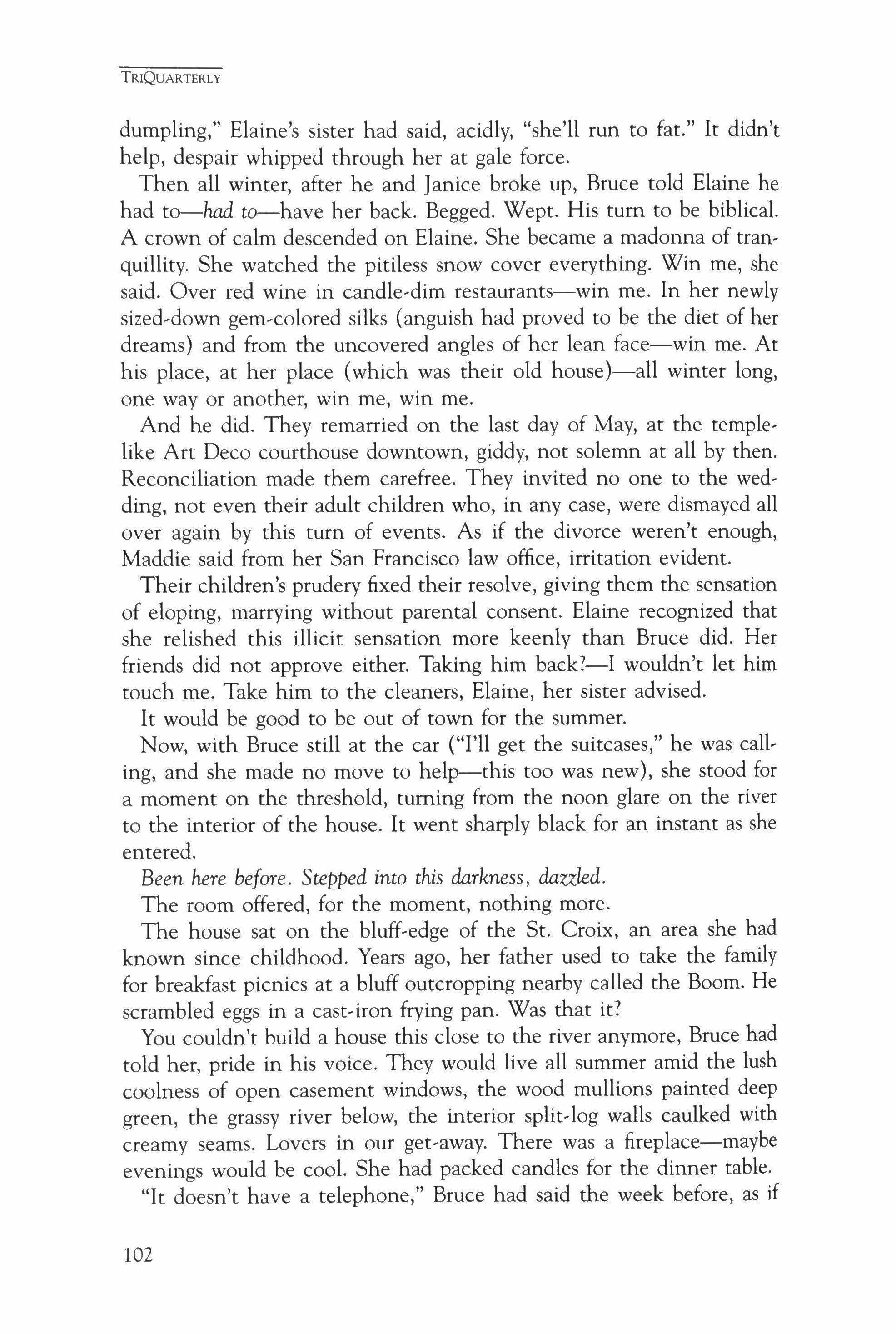
dumpling," Elaine's sister had said, acidly, "she'll run to fat." It didn't help, despair whipped through her at gale force.
Then all winter, after he and Janice broke up, Bruce told Elaine he had to-had to-have her back. Begged. Wept. His tum to be biblical. A crown of calm descended on Elaine. She became a madonna of tranquillity. She watched the pitiless snow cover everything. Win me, she said. Over red wine in candle-dim restaurants-win me. In her newly sized-down gem-colored silks (anguish had proved to be the diet of her dreams) and from the uncovered angles of her lean face-win me. At his place, at her place (which was their old house)-all winter long, one way or another, win me, win me.
And he did. They remarried on the last day of May, at the templelike Art Deco courthouse downtown, giddy, not solemn at all by then. Reconciliation made them carefree. They invited no one to the wedding, not even their adult children who, in any case, were dismayed all over again by this tum of events. As if the divorce weren't enough, Maddie said from her San Francisco law office, irritation evident.
Their children's prudery fixed their resolve, giving them the sensation of eloping, marrying without parental consent. Elaine recognized that she relished this illicit sensation more keenly than Bruce did. Her friends did not approve either. Taking him back?-I wouldn't let him touch me. Take him to the cleaners, Elaine, her sister advised.
It would be good to be out of town for the summer.
Now, with Bruce still at the car ("I'll get the suitcases," he was calling, and she made no move to help-this too was new), she stood for a moment on the threshold, turning from the noon glare on the river to the interior of the house. It went sharply black for an instant as she entered.
Been here before. Stepped into this darkness, dazzled. The room offered, for the moment, nothing more.
The house sat on the bluff-edge of the St. Croix, an area she had known since childhood. Years ago, her father used to take the family for breakfast picnics at a bluff outcropping nearby called the Boom. He scrambled eggs in a cast-iron frying pan. Was that it?
You couldn't build a house this close to the river anymore, Bruce had told her, pride in his voice. They would live all summer amid the lush coolness of open casement windows, the wood mullions painted deep green, the grassy river below, the interior split-log walls caulked with creamy seams. Lovers in our get-away. There was a fireplace-maybe evenings would be cool. She had packed candles for the dinner table.
"It doesn't have a telephone," Bruce had said the week before, as if
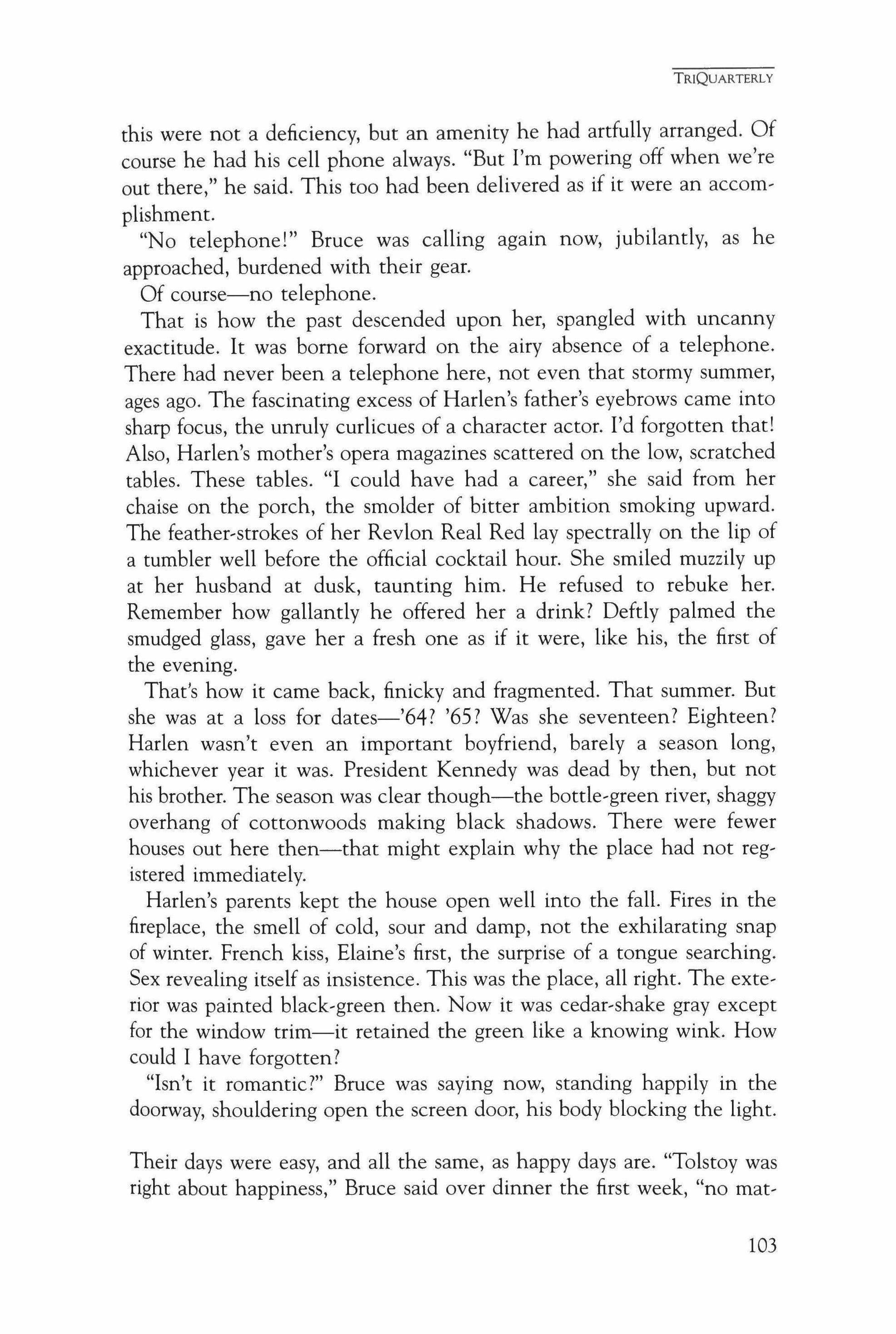
this were not a deficiency, but an amenity he had artfully arranged. Of course he had his cell phone always. "But I'm powering off when we're out there," he said. This too had been delivered as if it were an accomplishment.
"No telephone!" Bruce was calling again now, jubilantly, as he approached, burdened with their gear.
Of course-no telephone.
That is how the past descended upon her, spangled with uncanny exactitude. It was borne forward on the airy absence of a telephone. There had never been a telephone here, not even that stormy summer, ages ago. The fascinating excess of Harlen's father's eyebrows came into sharp focus, the unruly curlicues of a character actor. I'd forgotten that! Also, Harlen's mother's opera magazines scattered on the low, scratched tables. These tables. "I could have had a career," she said from her chaise on the porch, the smolder of bitter ambition smoking upward. The feather-strokes of her Revlon Real Red lay spectrally on the lip of a tumbler well before the official cocktail hour. She smiled muzzily up at her husband at dusk, taunting him. He refused to rebuke her. Remember how gallantly he offered her a drink? Deftly palmed the smudged glass, gave her a fresh one as if it were, like his, the first of the evening.
That's how it came back, finicky and fragmented. That summer. But she was at a loss for dates-'64? '65? Was she seventeen? Eighteen? Harlen wasn't even an important boyfriend, barely a season long, whichever year it was. President Kennedy was dead by then, but not his brother. The season was clear though-the bottle-green river, shaggy overhang of cottonwoods making black shadows. There were fewer houses out here then-that might explain why the place had not registered immediately.
Harlen's parents kept the house open well into the fall. Fires in the fireplace, the smell of cold, sour and damp, not the exhilarating snap of winter. French kiss, Elaine's first, the surprise of a tongue searching. Sex revealing itself as insistence. This was the place, all right. The exterior was painted black-green then. Now it was cedar-shake gray except for the window trim-it retained the green like a knowing wink. How could I have forgotten?
"Isn't it romantic?" Bruce was saying now, standing happily in the doorway, shouldering open the screen door, his body blocking the light.
Their days were easy, and all the same, as happy days are. "Tolstoy was right about happiness," Bruce said over dinner the first week, "no mat-
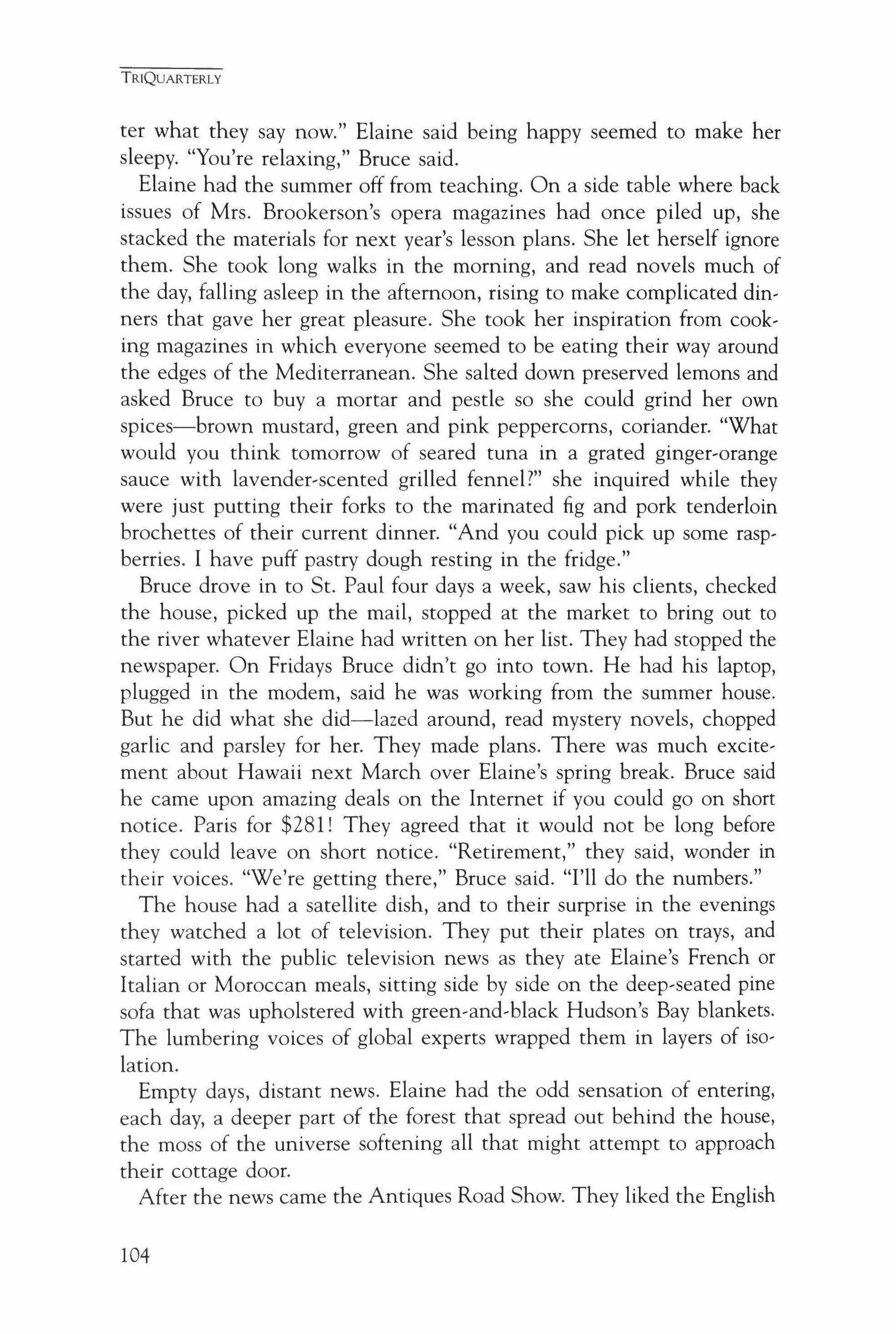
ter what they say now." Elaine said being happy seemed to make her sleepy. "You're relaxing," Bruce said.
Elaine had the summer off from teaching. On a side table where back issues of Mrs. Brookerson's opera magazines had once piled up, she stacked the materials for next year's lesson plans. She let herself ignore them. She took long walks in the morning, and read novels much of the day, falling asleep in the afternoon, rising to make complicated dinners that gave her great pleasure. She took her inspiration from cooking magazines in which everyone seemed to be eating their way around the edges of the Mediterranean. She salted down preserved lemons and asked Bruce to buy a mortar and pestle so she could grind her own spices-brown mustard, green and pink peppercorns, coriander. "What would you think tomorrow of seared tuna in a grated ginger-orange sauce with lavender-scented grilled fennel?" she inquired while they were just putting their forks to the marinated fig and pork tenderloin brochettes of their current dinner. "And you could pick up some raspberries. I have puff pastry dough resting in the fridge."
Bruce drove in to St. Paul four days a week, saw his clients, checked the house, picked up the mail, stopped at the market to bring out to the river whatever Elaine had written on her list. They had stopped the newspaper. On Fridays Bruce didn't go into town. He had his laptop, plugged in the modern, said he was working from the summer house. But he did what she did-lazed around, read mystery novels, chopped garlic and parsley for her. They made plans. There was much excitement about Hawaii next March over Elaine's spring break. Bruce said he carne upon amazing deals on the Internet if you could go on short notice. Paris for $28l! They agreed that it would not be long before they could leave on short notice. "Retirement," they said, wonder in their voices. "We're getting there," Bruce said. "I'll do the numbers."
The house had a satellite dish, and to their surprise in the evenings they watched a lot of television. They put their plates on trays, and started with the public television news as they ate Elaine's French or Italian or Moroccan meals, sitting side by side on the deep-seated pine sofa that was upholstered with green-and-black Hudson's Bay blankets. The lumbering voices of global experts wrapped them in layers of isolation.
Empty days, distant news. Elaine had the odd sensation of entering, each day, a deeper part of the forest that spread out behind the house, the moss of the universe softening all that might attempt to approach their cottage door.
After the news carne the Antiques Road Show. They liked the English
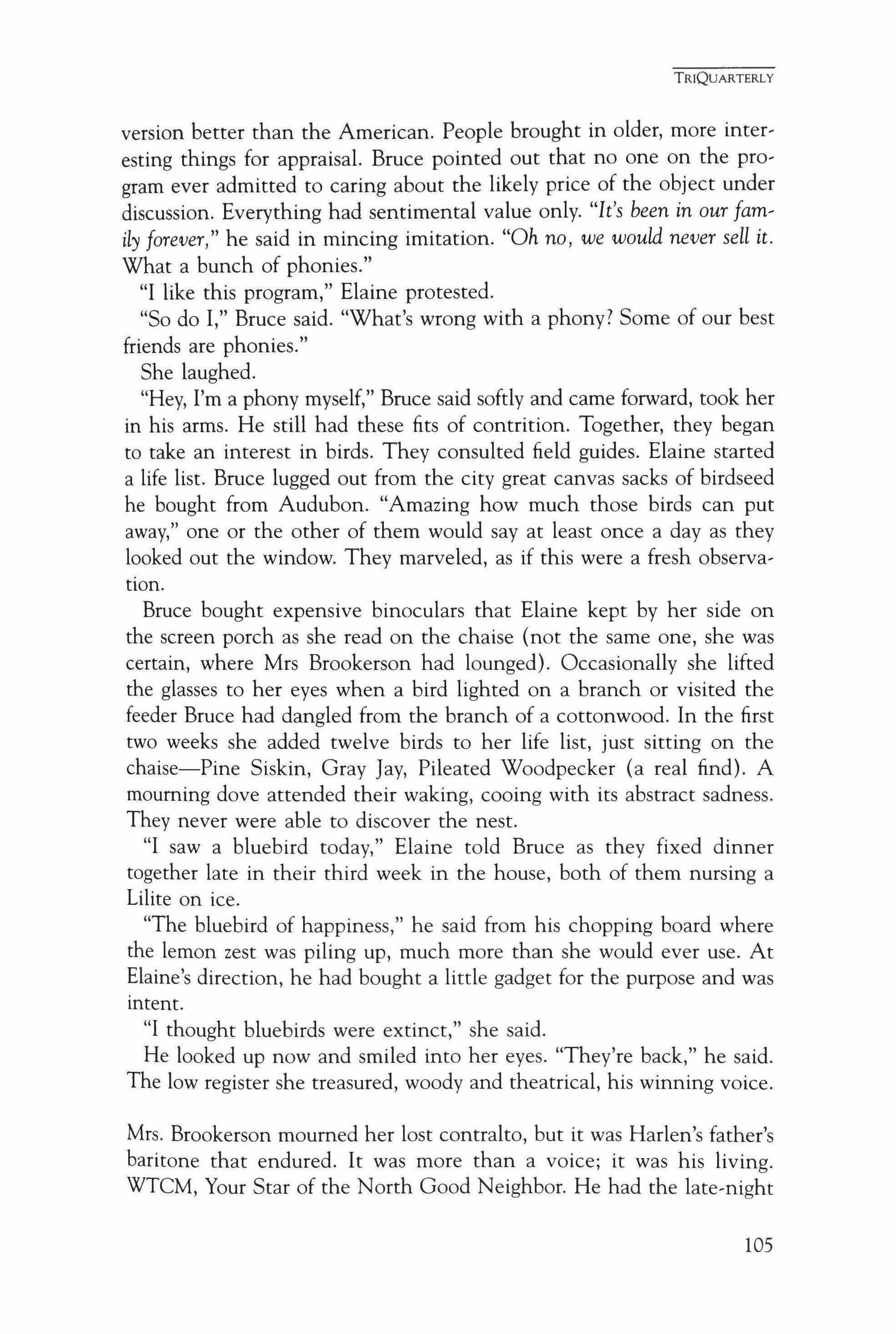
version better than the American. People brought in older, more interesting things for appraisal. Bruce pointed out that no one on the program ever admitted to caring about the likely price of the object under discussion. Everything had sentimental value only. "It's been in our family forever," he said in mincing imitation. "Oh no, we would never sell it. What a bunch of phonies."
"I like this program," Elaine protested.
"So do I," Bruce said. "What's wrong with a phony? Some of our best friends are phonies."
She laughed.
"Hey, I'm a phony myself," Bruce said softly and came forward, took her in his arms. He still had these fits of contrition. Together, they began to take an interest in birds. They consulted field guides. Elaine started a life list. Bruce lugged out from the city great canvas sacks of birdseed he bought from Audubon. "Amazing how much those birds can put away," one or the other of them would say at least once a day as they looked out the window. They marveled, as if this were a fresh observation.
Bruce bought expensive binoculars that Elaine kept by her side on the screen porch as she read on the chaise (not the same one, she was certain, where Mrs Brookerson had lounged). Occasionally she lifted the glasses to her eyes when a bird lighted on a branch or visited the feeder Bruce had dangled from the branch of a cottonwood. In the first two weeks she added twelve birds to her life list, just sitting on the chaise-Pine Siskin, Gray Jay, Pileated Woodpecker (a real find). A mourning dove attended their waking, cooing with its abstract sadness. They never were able to discover the nest.
"I saw a bluebird today," Elaine told Bruce as they fixed dinner together late in their third week in the house, both of them nursing a Lilite on ice.
"The bluebird of happiness," he said from his chopping board where the lemon zest was piling up, much more than she would ever use. At Elaine's direction, he had bought a little gadget for the purpose and was intent.
"I thought bluebirds were extinct," she said. He looked up now and smiled into her eyes. "They're back," he said. The low register she treasured, woody and theatrical, his winning voice.
Mrs. Brookerson mourned her lost contralto, but it was Haden's father's baritone that endured. It was more than a voice; it was his living. WTCM, Your Star of the North Good Neighbor. He had the late-night
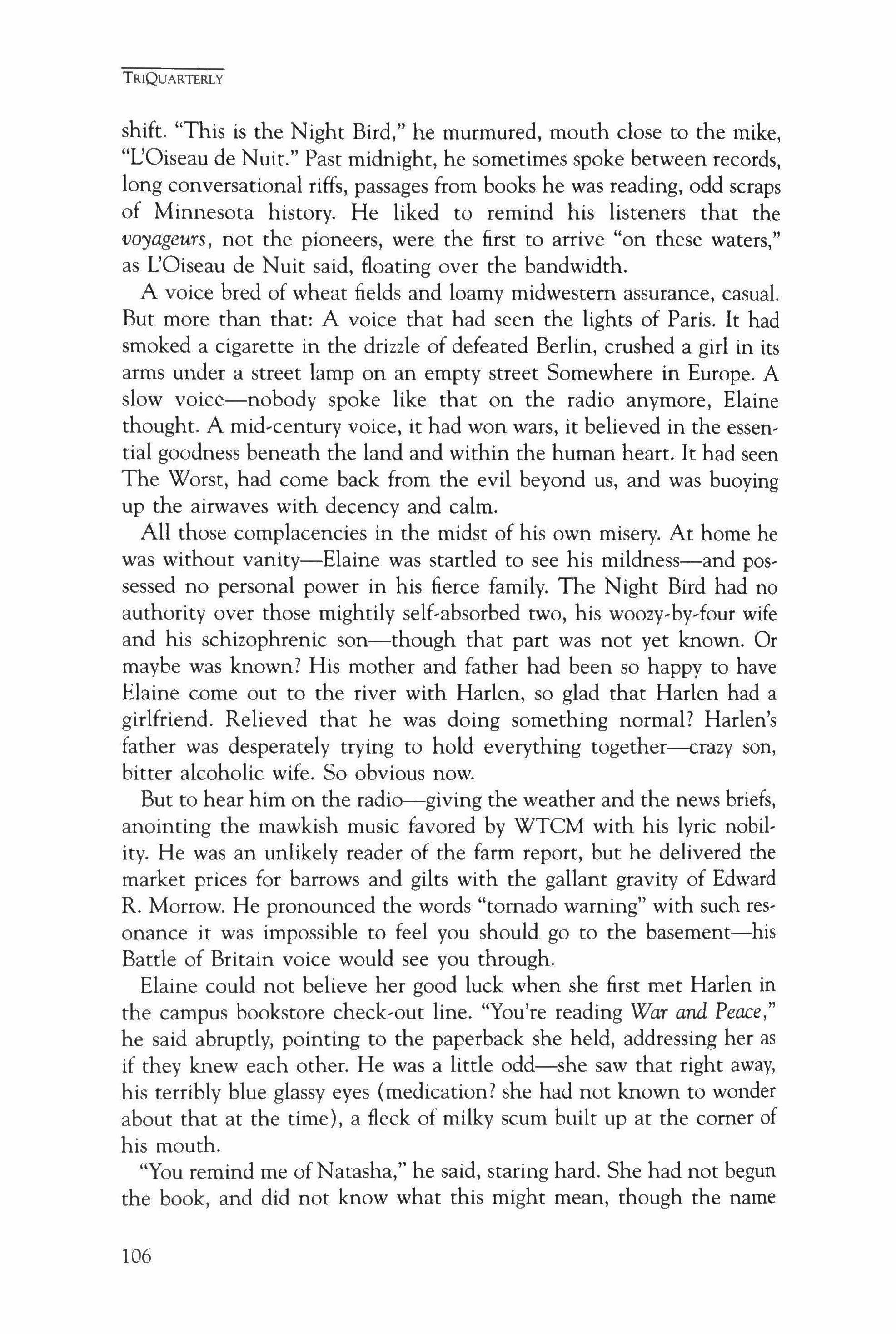
shift. "This is the Night Bird," he murmured, mouth close to the mike, "LOiseau de Nuit." Past midnight, he sometimes spoke between records, long conversational riffs, passages from books he was reading, odd scraps of Minnesota history. He liked to remind his listeners that the voyageurs, not the pioneers, were the first to arrive "on these waters," as L'Oiseau de Nuit said, floating over the bandwidth.
A voice bred of wheat fields and loamy midwestern assurance, casual. But more than that: A voice that had seen the lights of Paris. It had smoked a cigarette in the drizzle of defeated Berlin, crushed a girl in its arms under a street lamp on an empty street Somewhere in Europe. A slow voice-nobody spoke like that on the radio anymore, Elaine thought. A mid-century voice, it had won wars, it believed in the essential goodness beneath the land and within the human heart. It had seen The Worst, had come back from the evil beyond us, and was buoying up the airwaves with decency and calm.
All those complacencies in the midst of his own misery. At home he was without vanity-Elaine was startled to see his mildness-and possessed no personal power in his fierce family. The Night Bird had no authority over those mightily self-absorbed two, his woozy-by-four wife and his schizophrenic son-though that part was not yet known. Or maybe was known? His mother and father had been so happy to have Elaine come out to the river with Harlen, so glad that Harlen had a girlfriend. Relieved that he was doing something normal? Harlen's father was desperately trying to hold everything together---crazy son, bitter alcoholic wife. So obvious now.
But to hear him on the radio-giving the weather and the news briefs, anointing the mawkish music favored by WTCM with his lyric nobility. He was an unlikely reader of the farm report, but he delivered the market prices for barrows and gilts with the gallant gravity of Edward R. Morrow. He pronounced the words "tornado warning" with such resonance it was impossible to feel you should go to the basement-his Battle of Britain voice would see you through.
Elaine could not believe her good luck when she first met Harlen in the campus bookstore check-out line. "You're reading War and Peace," he said abruptly, pointing to the paperback she held, addressing her as if they knew each other. He was a little odd-she saw that right away, his terribly blue glassy eyes (medication? she had not known to wonder about that at the time), a fleck of milky scum built up at the comer of his mouth.
"You remind me of Natasha," he said, staring hard. She had not begun the book, and did not know what this might mean, though the name

itself-Natasha-spoke of worlds away and therefore boded well. They exchanged names, and she was further intrigued: Harlen Brookerson, Jr. He confirmed that he was indeed the son of the lavish voice she tuned in late at night, alone in her bedroom, away from her family who did not understand her at all. She had stumbled upon celebrity. She held on to it an entire season, until he became too strange, and she told him she really couldn't see him anymore.
The first weeks of June were cold. Rain, rain, rain. The green deepened around them. Elaine drank smoky Japanese tea in the mornings and stared at the mist rising from the river, blank and contented. Bruce became expert at getting a fire going in the fireplace. Nights they lay twined on the Hudson Bay blankets of the pine sofa, firelight playing on their faces. Bruce cried once when she was tracing her finger over his face, deeply intent. She licked a tear from his lashes. They were fierce together. That was June.
July burst upon them, the long sunny stretch of eternal July, days opening prodigally. Very little rain all month. The leaves seemed ex, hausted and the bright impatiens planted in the shade drooped in the noonday heat. You could almost hear the petals panting, Elaine said. The dust that billowed up from the gravel road when Bruce drove in seemed to partake of the sun, glinting and golden. They slept under a single sheet, kicking even that away in the hot night.
And now, so quickly, the depths of August. They couldn't believe how the season had fled. This has been good for us, they told each other. The effortless unfurling of days, the long evenings of intricate meals seemed now their real life, and their real life did not exist at all. Elaine had extended her life list to sixty-three. Imagine-just from her mom' ing walks and the long afternoons on the chaise, as she remarked to Bruce. Cerulean Warbler, Ovenbird, Lincoln Sparrow, a furious Ruby, Crowned Kinglet she surprised in a ditch. Just from keeping her eyes open.
They daydreamed feverishly for much of hot July, plotted: maybe the place was for sale, maybe they could afford it. But the Friday before they were to pack up and return home, Bruce said, "We're probably better off renting." They were having their morning coffee on the porch. "That way," he said, "we can go anywhere, try new places. Let some' body else pay the taxes and worry about the roof."
"Or we could at least reserve it again for next summer," Elaine offered. She had been thinking of re-sanding the floors, maybe enclosing the

porch. Make it a year-round place. "Let the agency know right away?" she suggested. The sumac was showing the first red.
"We could," Bruce said, and drifted into the house for more coffee. He had begun talking about a house in the Dordogne for two weeks next summer. There was so much available on the Internet-anywhere you could imagine wanting to go.
When he came back out on the porch with his coffee, he didn't pick up the subject. There was a place nearby in Marine, he said, where you could rent a canoe. A shame to waste this gorgeous day. They should spend the whole day on the river, their final Friday.
Elaine hated to lose the day. That was how she saw it, she realized. Lost, the long morning walk, another line filled in on her life list. Gone the floaty afternoon on the porch chaise, the novel spread face down on the floor, rising at four to concentrate on dinner in the lengthening shadows. She clung to the pearly sameness of days, another graduated bead on the string of summer.
But why not? The lazy pattern she hated to relinquish turned without struggle into pure passivity, and she smiled up at her husband. "What a good idea," she said.
They paddled along the shore most of the hot morning, hugging the shady overhang of ancient cottonwoods, dusty as old elephants in the late August heat. Elaine took the front position; Bruce at the rear did the steering. They hardly spoke. She almost forgot he was there behind her, directing them expertly. An egret stood like a Brancusi on an outcropping of driftwood. Beautiful, but she already had an egret.
Around noon Bruce angled the canoe into a back channel, looking for a green island he knew, while she kept her unvarying rhythm, dip, dip, the water falling from her paddle in strands.
She had packed a lunch-a bumpy loaf of sourdough with a crust rough as tree bark, a plastic container of ratatouille from the night before, a thermos of black coffee, Fig Newtons because Bruce liked them. After lunch they lay side by side on the field of timothy, the wind making a thin whipping sound in the tall grass. Clouds billowed by like white herds of buffalo against the blue. She gazed up blankly, floated there, solo in the sky and blissful.
She almost refused when Bruce began. His sudden grip. He wanted, wanted. "Don't be afraid," he was saying softly, imperatively, moving hard against her. He already had his shorts off.
He caught her by surprise. Outrage spiked her heart. Also terror, a panicked fright of discovery, right out here in the open. Anyone might
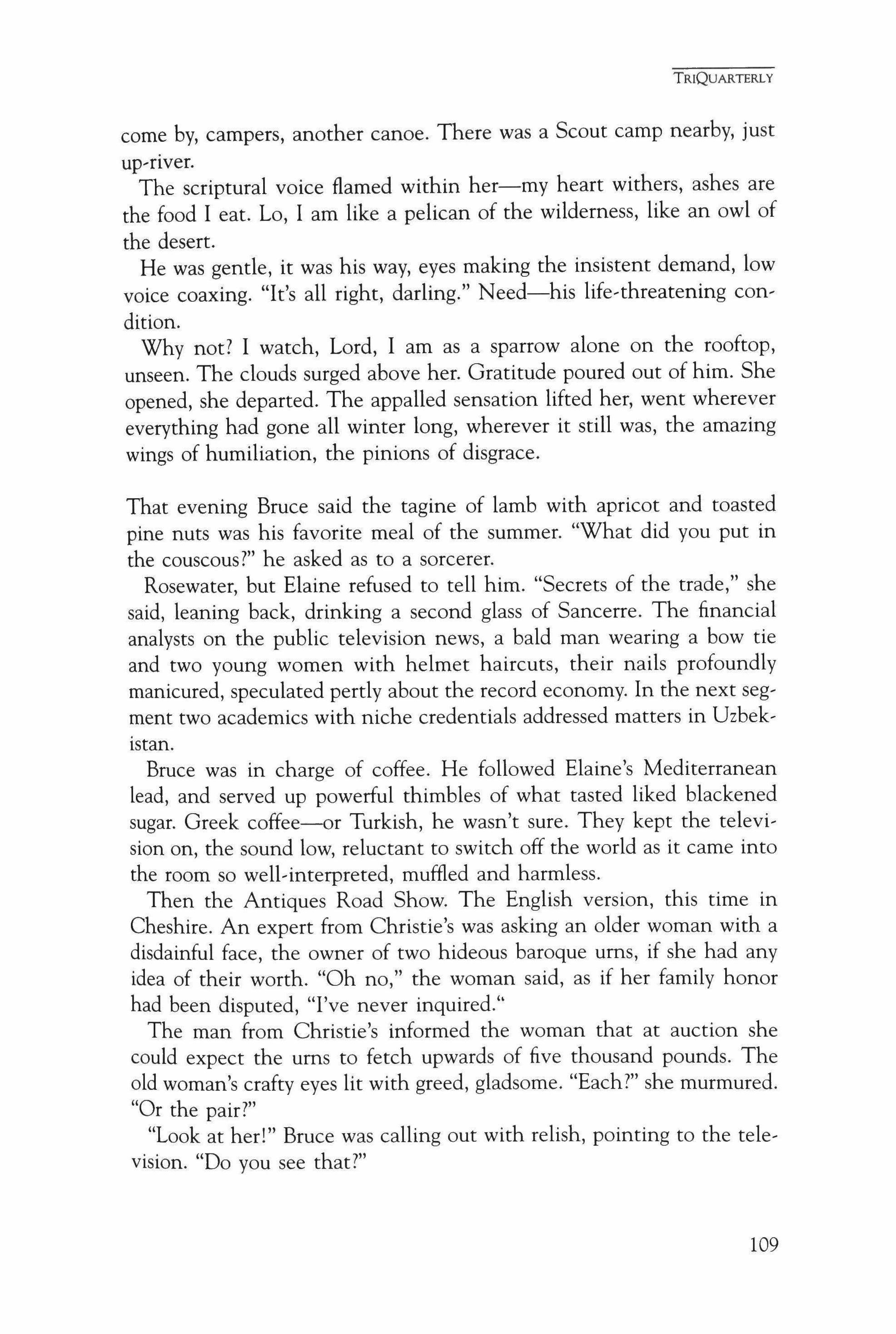
come by, campers, another canoe. There was a Scout camp nearby, just up-river,
The scriptural voice flamed within her-my heart withers, ashes are the food I eat. Lo, I am like a pelican of the wilderness, like an owl of the desert.
He was gentle, it was his way, eyes making the insistent demand, low voice coaxing. "It's all right, darling." Need-his life-threatening condition.
Why not? I watch, Lord, I am as a sparrow alone on the rooftop, unseen. The clouds surged above her. Gratitude poured out of him. She opened, she departed. The appalled sensation lifted her, went wherever everything had gone all winter long, wherever it still was, the amazing wings of humiliation, the pinions of disgrace.
That evening Bruce said the tagine of lamb with apricot and toasted pine nuts was his favorite meal of the summer. "What did you put in the couscous?" he asked as to a sorcerer.
Rosewater, but Elaine refused to tell him. "Secrets of the trade," she said, leaning back, drinking a second glass of Sancerre. The financial analysts on the public television news, a bald man wearing a bow tie and two young women with helmet haircuts, their nails profoundly manicured, speculated pertly about the record economy. In the next segment two academics with niche credentials addressed matters in Uzbekistan.
Bruce was in charge of coffee. He followed Elaine's Mediterranean lead, and served up powerful thimbles of what tasted liked blackened sugar. Greek coffee-or Turkish, he wasn't sure. They kept the television on, the sound low, reluctant to switch off the world as it came into the room so well-interpreted, muffled and harmless.
Then the Antiques Road Show. The English version, this time in Cheshire. An expert from Christie's was asking an older woman with a disdainful face, the owner of two hideous baroque urns, if she had any idea of their worth. "Oh no," the woman said, as if her family honor had been disputed, "I've never inquired."
The man from Christie's informed the woman that at auction she could expect the urns to fetch upwards of five thousand pounds. The old woman's crafty eyes lit with greed, gladsome. "Each?" she murmured. "Or the pair?"
"Look at her!" Bruce was calling out with relish, pointing to the television. "Do you see that?"
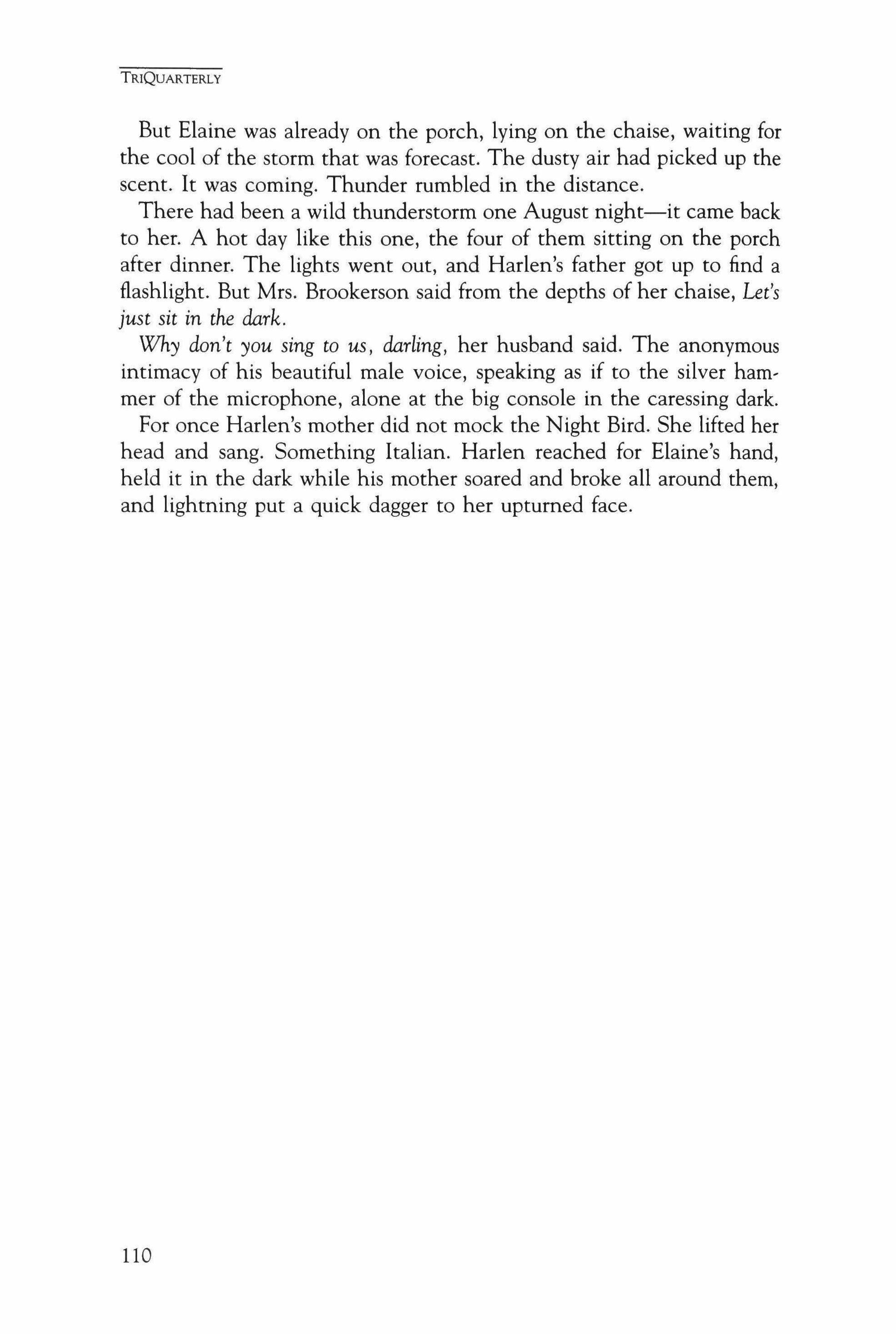
But Elaine was already on the porch, lying on the chaise, waiting for the cool of the storm that was forecast. The dusty air had picked up the scent. It was coming. Thunder rumbled in the distance.
There had been a wild thunderstorm one August night-it came back to her. A hot day like this one, the four of them sitting on the porch after dinner. The lights went out, and Harlen's father got up to find a flashlight. But Mrs. Brookerson said from the depths of her chaise, Let's just sit in the dark.
Why don't you sing to us, darling, her husband said. The anonymous intimacy of his beautiful male voice, speaking as if to the silver hammer of the microphone, alone at the big console in the caressing dark.
For once Harlen's mother did not mock the Night Bird. She lifted her head and sang. Something Italian. Harlen reached for Elaine's hand, held it in the dark while his mother soared and broke all around them, and lightning put a quick dagger to her upturned face.
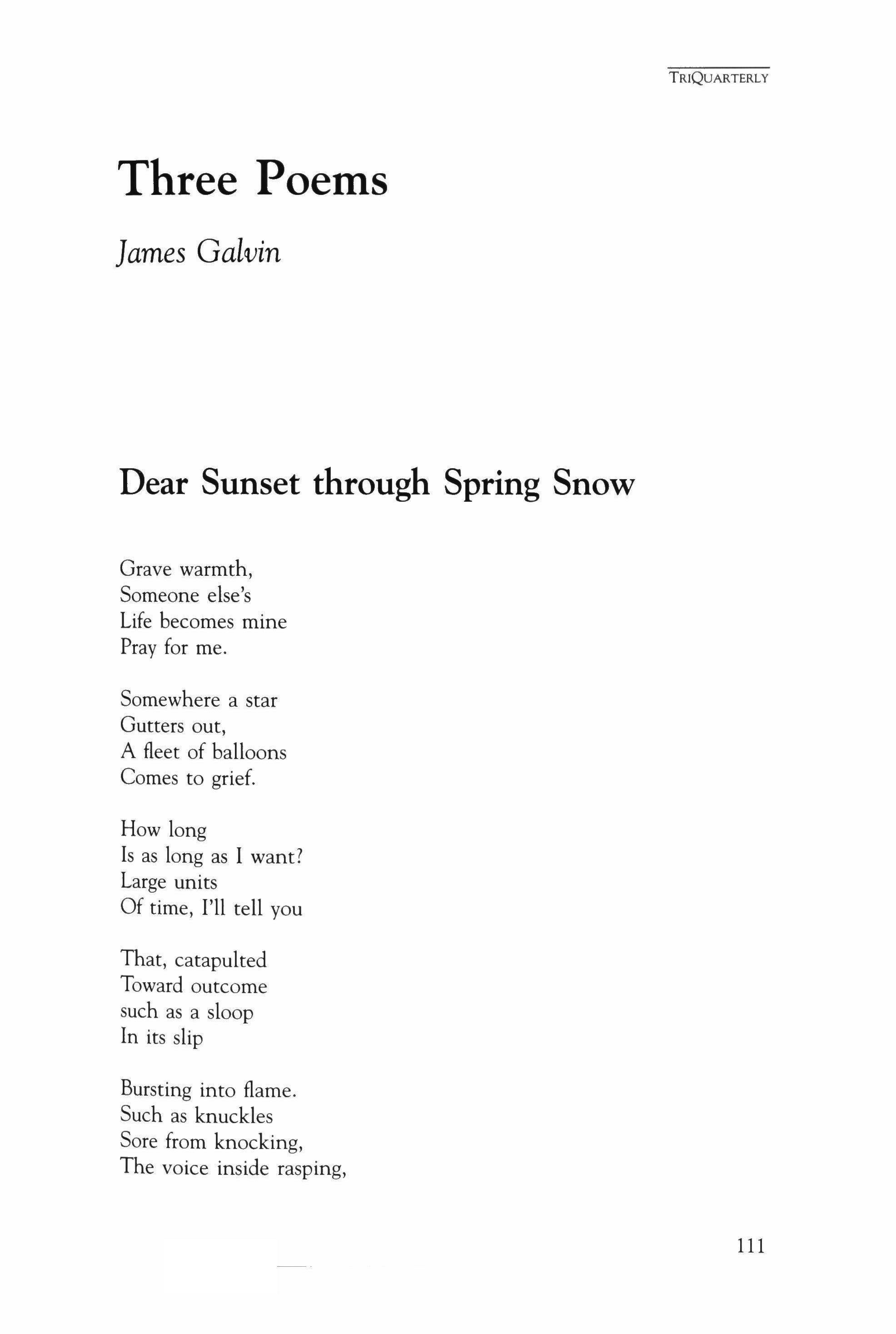
Grave warmth, Someone else's Life becomes mine Pray for me.
Somewhere a star
Gutters out, A fleet of balloons Comes to grief.
How long Is as long as I want?
Large units Of time, I'll tell you
That, catapulted Toward outcome such as a sloop In its slip
Bursting into flame. Such as knuckles
Sore from knocking, The voice inside rasping,
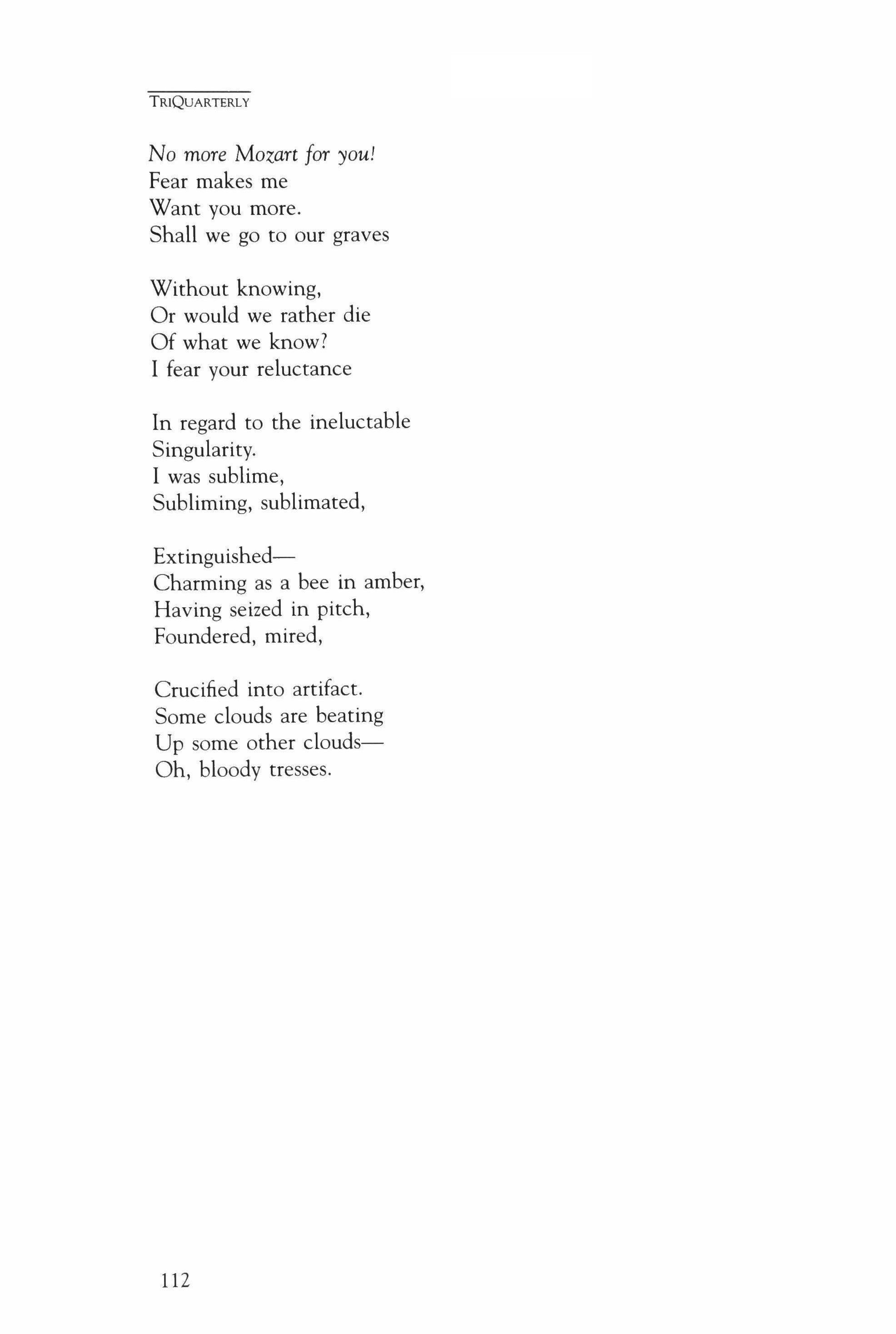
No more Mozart for you! Fear makes me
Want you more. Shall we go to our graves
Without knowing, Or would we rather die Of what we know? I fear your reluctance
In regard to the ineluctable Singularity. I was sublime, Subliming, sublimated, ExtinguishedCharming as a bee in amber, Having seized in pitch, Foundered, mired,
Crucified into artifact. Some clouds are beating Up some other cloudsOh, bloody tresses.
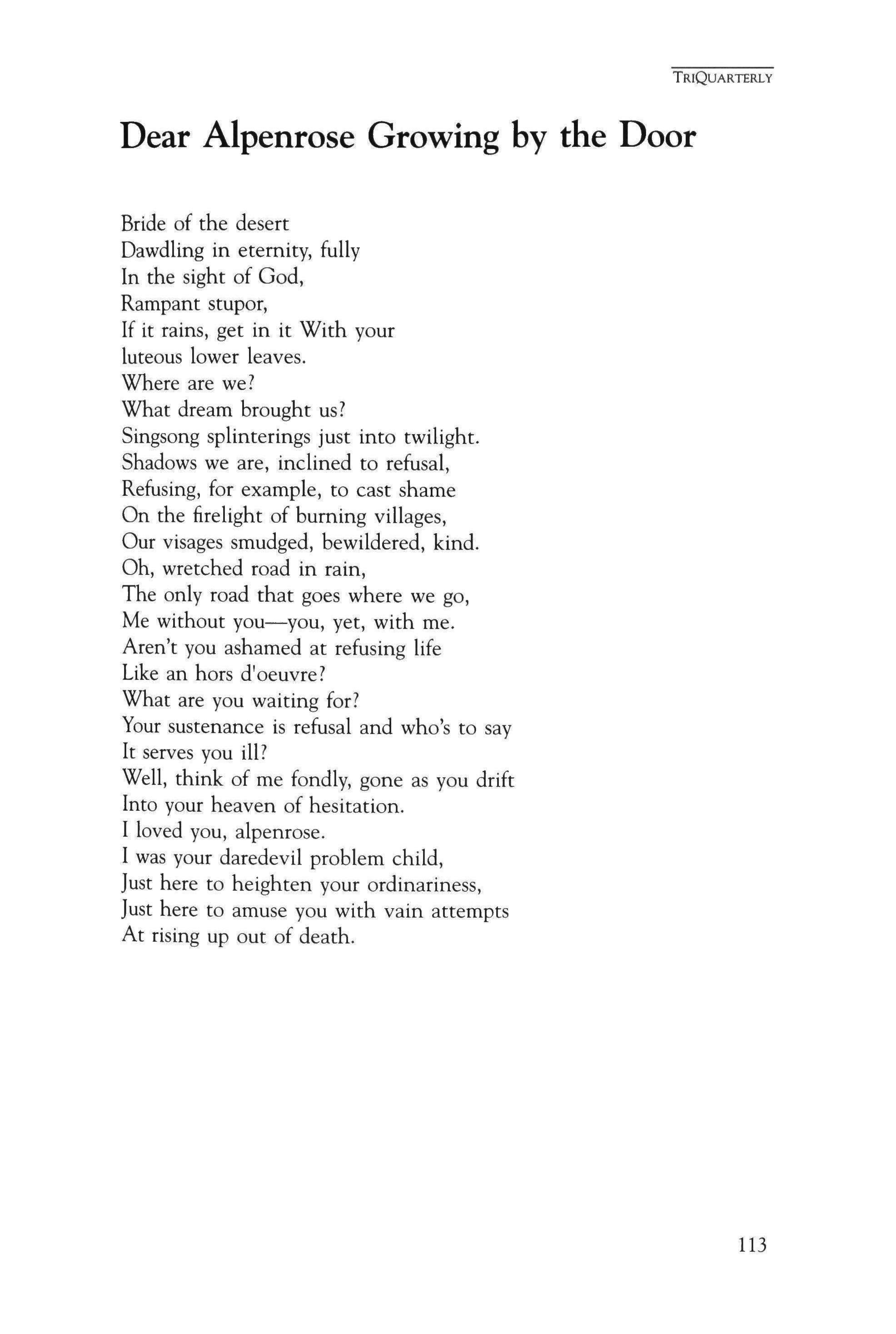
Bride of the desert
Dawdling in eternity, fully
In the sight of God, Rampant stupor, If it rains, get in it With your luteous lower leaves.
Where are we?
What dream brought us?
Singsong splinterings just into twilight. Shadows we are, inclined to refusal,
Refusing, for example, to cast shame
On the firelight of burning villages, Our visages smudged, bewildered, kind.
Oh, wretched road in rain,
The only road that goes where we go, Me without you-you, yet, with me.
Aren't you ashamed at refusing life
Like an hors d'oeuvre?
What are you waiting for?
Your sustenance is refusal and who's to say It serves you ill?
Well, think of me fondly, gone as you drift Into your heaven of hesitation.
I loved you, alpenrose. I was your daredevil problem child, Just here to heighten your ordinariness, Just here to amuse you with vain attempts At rising up out of death.
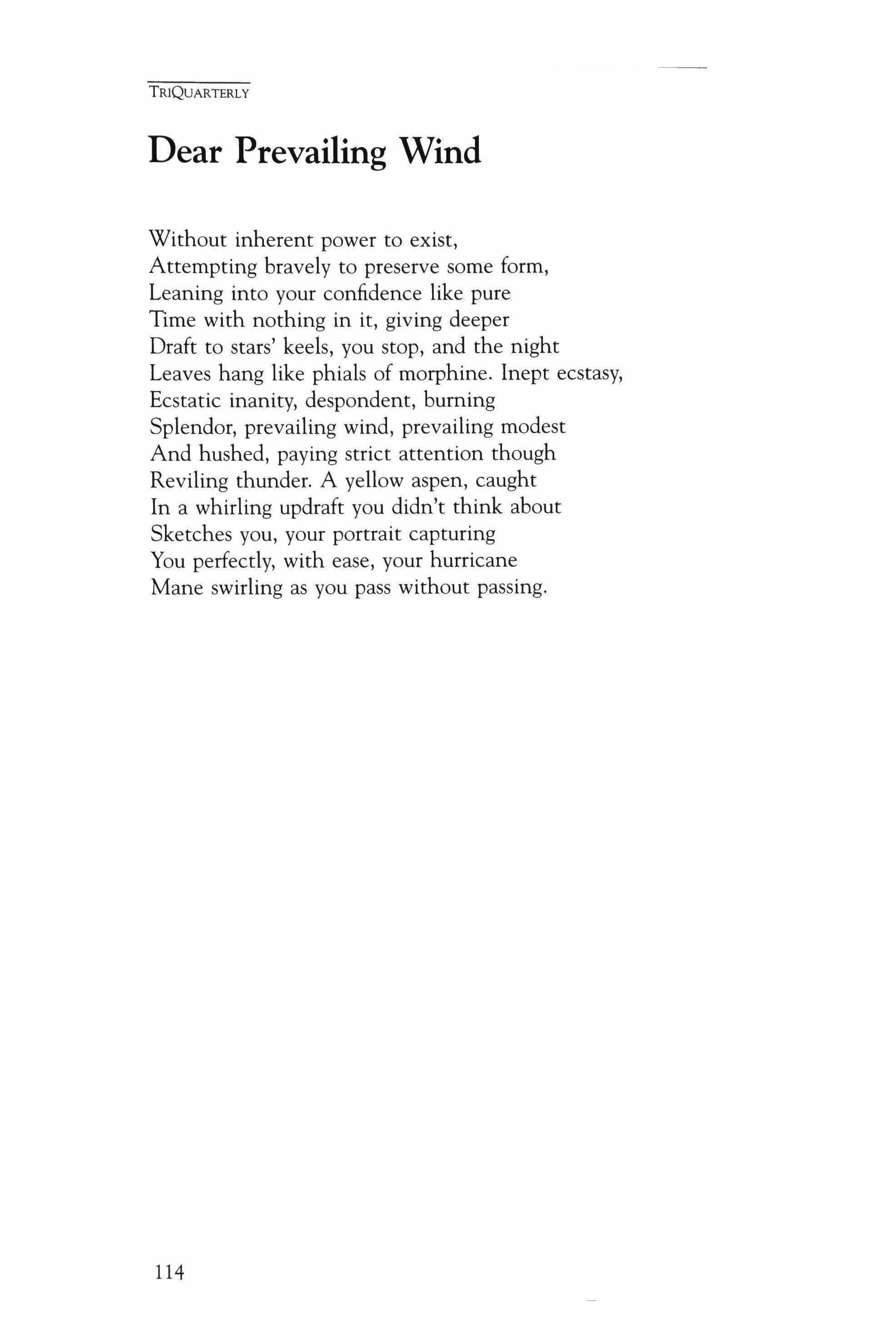
Without inherent power to exist, Attempting bravely to preserve some form, Leaning into your confidence like pure Time with nothing in it, giving deeper Draft to stars' keels, you stop, and the night Leaves hang like phials of morphine. Inept ecstasy, Ecstatic inanity, despondent, burning Splendor, prevailing wind, prevailing modest And hushed, paying strict attention though Reviling thunder. A yellow aspen, caught In a whirling updraft you didn't think about Sketches you, your portrait capturing You perfectly, with ease, your hurricane Mane swirling as you pass without passing.
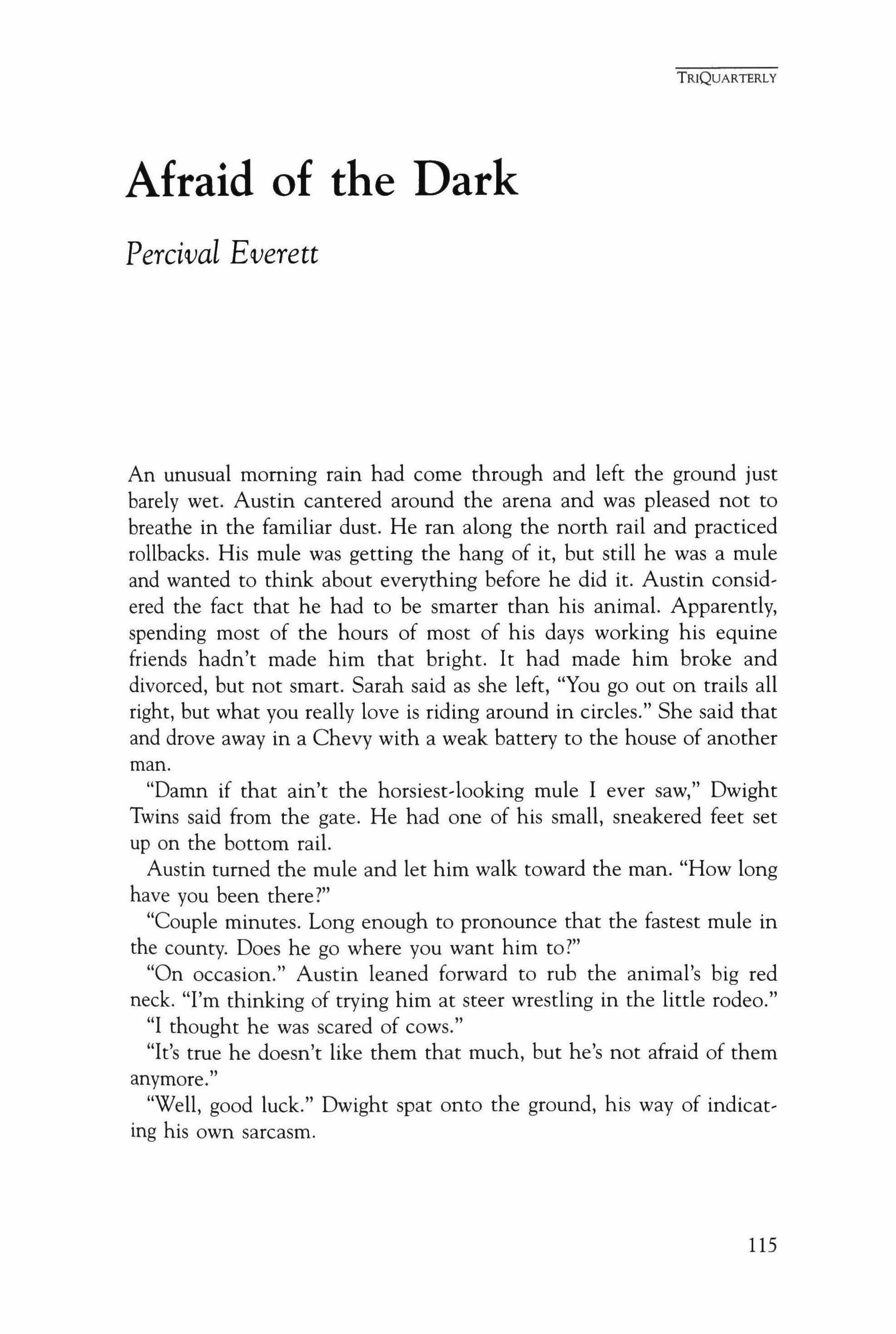
An unusual morning rain had come through and left the ground just barely wet. Austin cantered around the arena and was pleased not to breathe in the familiar dust. He ran along the north rail and practiced rollbacks. His mule was getting the hang of it, but still he was a mule and wanted to think about everything before he did it. Austin considered the fact that he had to be smarter than his animal. Apparently, spending most of the hours of most of his days working his equine friends hadn't made him that bright. It had made him broke and divorced, but not smart. Sarah said as she left, "You go out on trails all right, but what you really love is riding around in circles." She said that and drove away in a Chevy with a weak battery to the house of another man.
"Damn if that ain't the horsiest-looking mule I ever saw," Dwight Twins said from the gate. He had one of his small, sneakered feet set up on the bottom rail.
Austin turned the mule and let him walk toward the man. "How long have you been there?"
"Couple minutes. Long enough to pronounce that the fastest mule in the county. Does he go where you want him to?"
"On occasion." Austin leaned forward to rub the animal's big red neck. "I'm thinking of trying him at steer wrestling in the little rodeo."
"I thought he was scared of cows."
"It's true he doesn't like them that much, but he's not afraid of them anymore."
"Well, good luck." Dwight spat onto the ground, his way of indicating his own sarcasm.
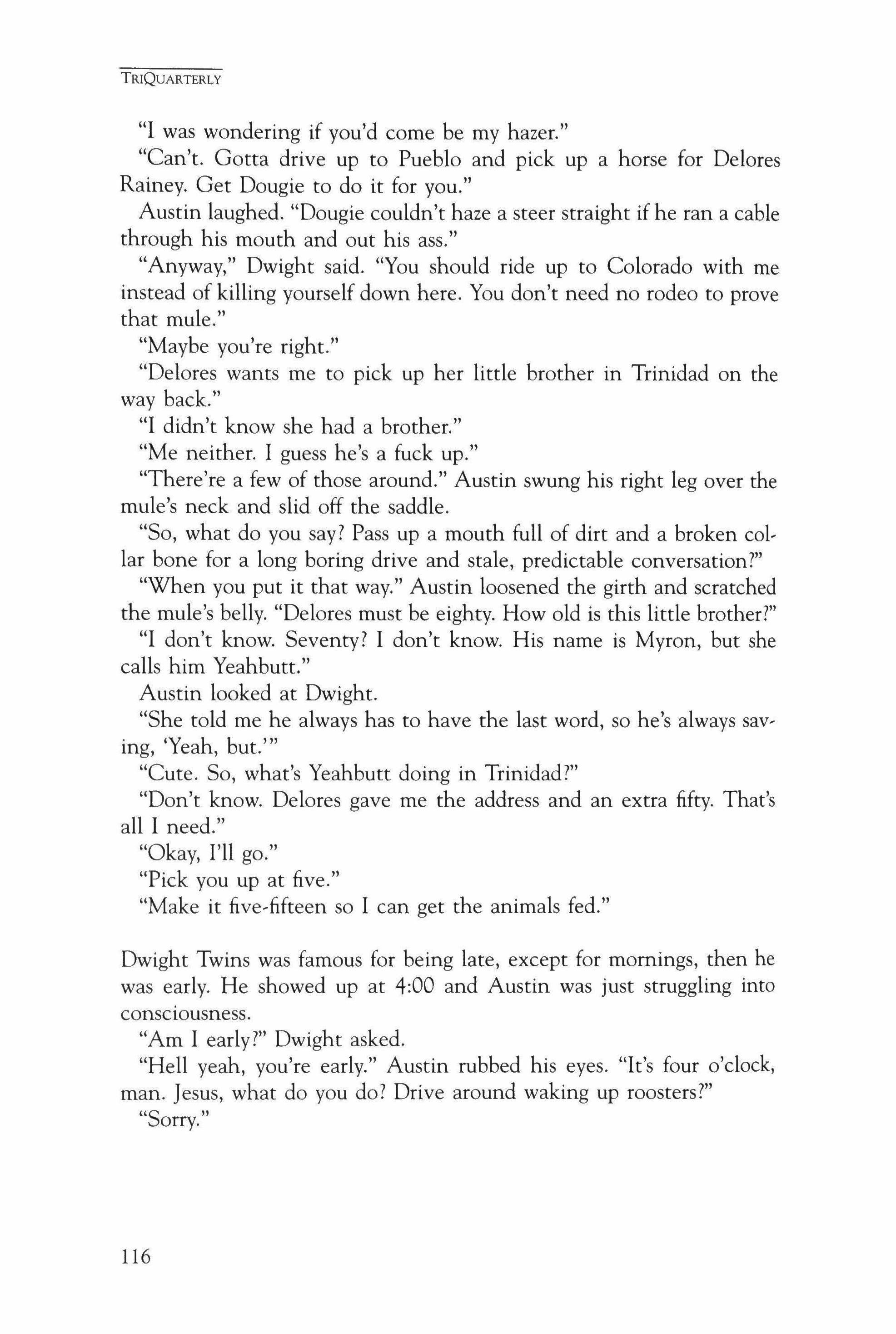
"I was wondering if you'd come be my hazer."
"Can't. Gotta drive up to Pueblo and pick up a horse for Delores Rainey. Get Dougie to do it for you."
Austin laughed. "Dougie couldn't haze a steer straight if he ran a cable through his mouth and out his ass."
"Anyway," Dwight said. "You should ride up to Colorado with me instead of killing yourself down here. You don't need no rodeo to prove that mule."
"Maybe you're right."
"Delores wants me to pick up her little brother in Trinidad on the way back."
"I didn't know she had a brother."
"Me neither. I guess he's a fuck up."
"There're a few of those around." Austin swung his right leg over the mule's neck and slid off the saddle.
"So, what do you say? Pass up a mouth full of dirt and a broken collar bone for a long boring drive and stale, predictable conversation?"
"When you put it that way." Austin loosened the girth and scratched the mule's belly. "Delores must be eighty. How old is this little brother?"
"I don't know. Seventy? I don't know. His name is Myron, but she calls him Yeahbutt."
Austin looked at Dwight.
"She told me he always has to have the last word, so he's always saving, 'Yeah, but.'"
"Cute. So, what's Yeahbutt doing in Trinidad?"
"Don't know. Delores gave me the address and an extra fifty. That's all I need."
"Okay, I'll go."
"Pick you up at five."
"Make it five-fifteen so I can get the animals fed."
Dwight Twins was famous for being late, except for mornings, then he was early. He showed up at 4:00 and Austin was just struggling into consciousness.
"Am I early?" Dwight asked.
"Hell yeah, you're early." Austin rubbed his eyes. "It's four o'clock, man. Jesus, what do you do? Drive around waking up roosters?" "Sorry."
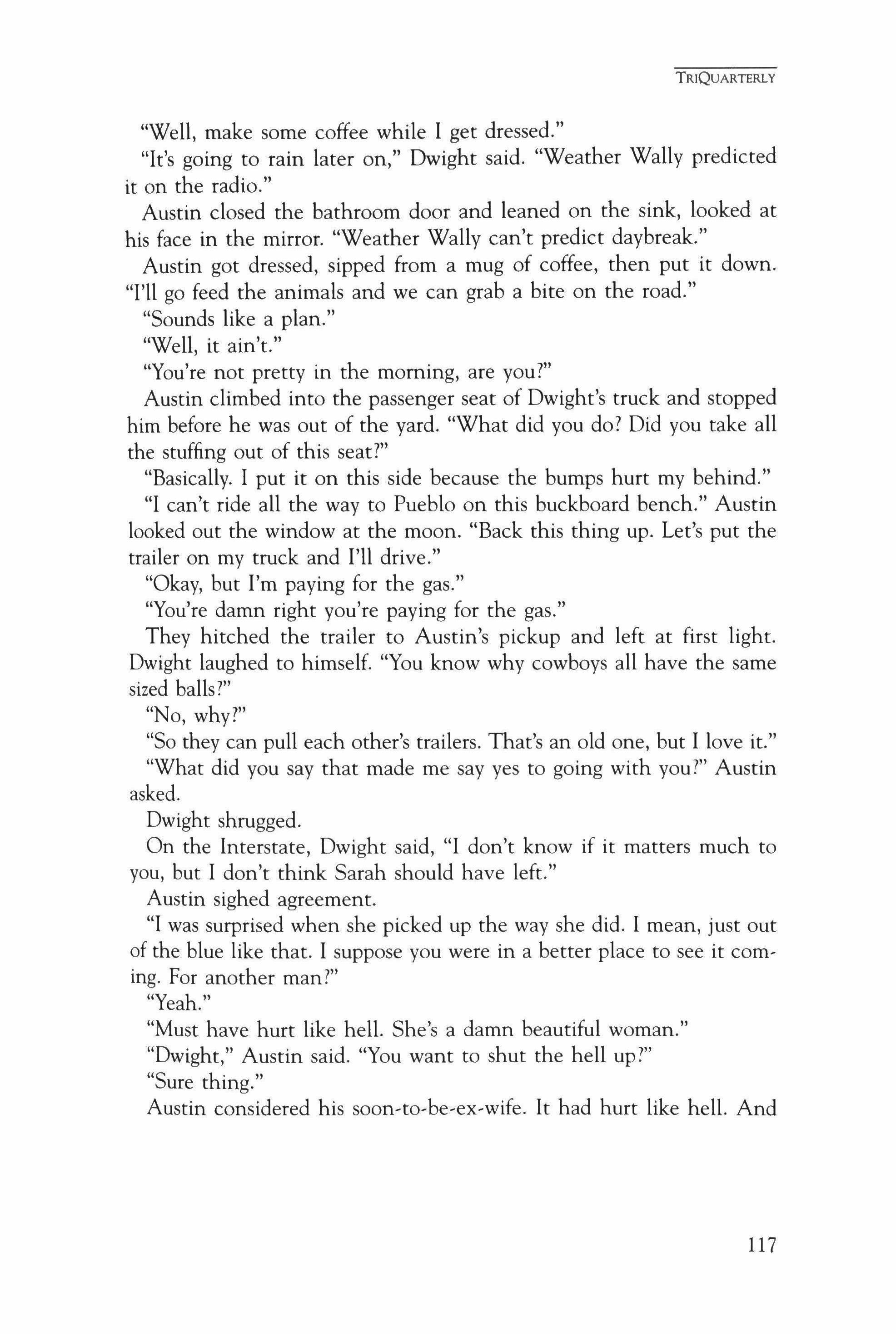
"Well, make some coffee while I get dressed."
"It's going to rain later on," Dwight said. "Weather Wally predicted it on the radio."
Austin closed the bathroom door and leaned on the sink, looked at his face in the mirror. "Weather Wally can't predict daybreak."
Austin got dressed, sipped from a mug of coffee, then put it down. "I'll go feed the animals and we can grab a bite on the road."
"Sounds like a plan."
"Well, it ain't."
"You're not pretty in the morning, are you?"
Austin climbed into the passenger seat of Dwight's truck and stopped him before he was out of the yard. "What did you do? Did you take all the stuffing out of this seat?"
"Basically. I put it on this side because the bumps hurt my behind."
"I can't ride all the way to Pueblo on this buckboard bench." Austin looked out the window at the moon. "Back this thing up. Let's put the trailer on my truck and I'll drive."
"Okay, but I'm paying for the gas."
"You're damn right you're paying for the gas."
They hitched the trailer to Austin's pickup and left at first light. Dwight laughed to himself. "You know why cowboys all have the same sized balls?"
"No, why?"
"So they can pull each other's trailers. That's an old one, but I love it."
"What did you say that made me say yes to going with you?" Austin asked.
Dwight shrugged.
On the Interstate, Dwight said, "I don't know if it matters much to you, but I don't think Sarah should have left."
Austin sighed agreement.
"I was surprised when she picked up the way she did. I mean, just out of the blue like that. I suppose you were in a better place to see it coming. For another man?"
"Yeah."
"Must have hurt like hell. She's a damn beautiful woman."
"Dwight," Austin said. "You want to shut the hell up?"
"Sure thing."
Austin considered his soon-to-be-ex-wife. It had hurt like hell. And
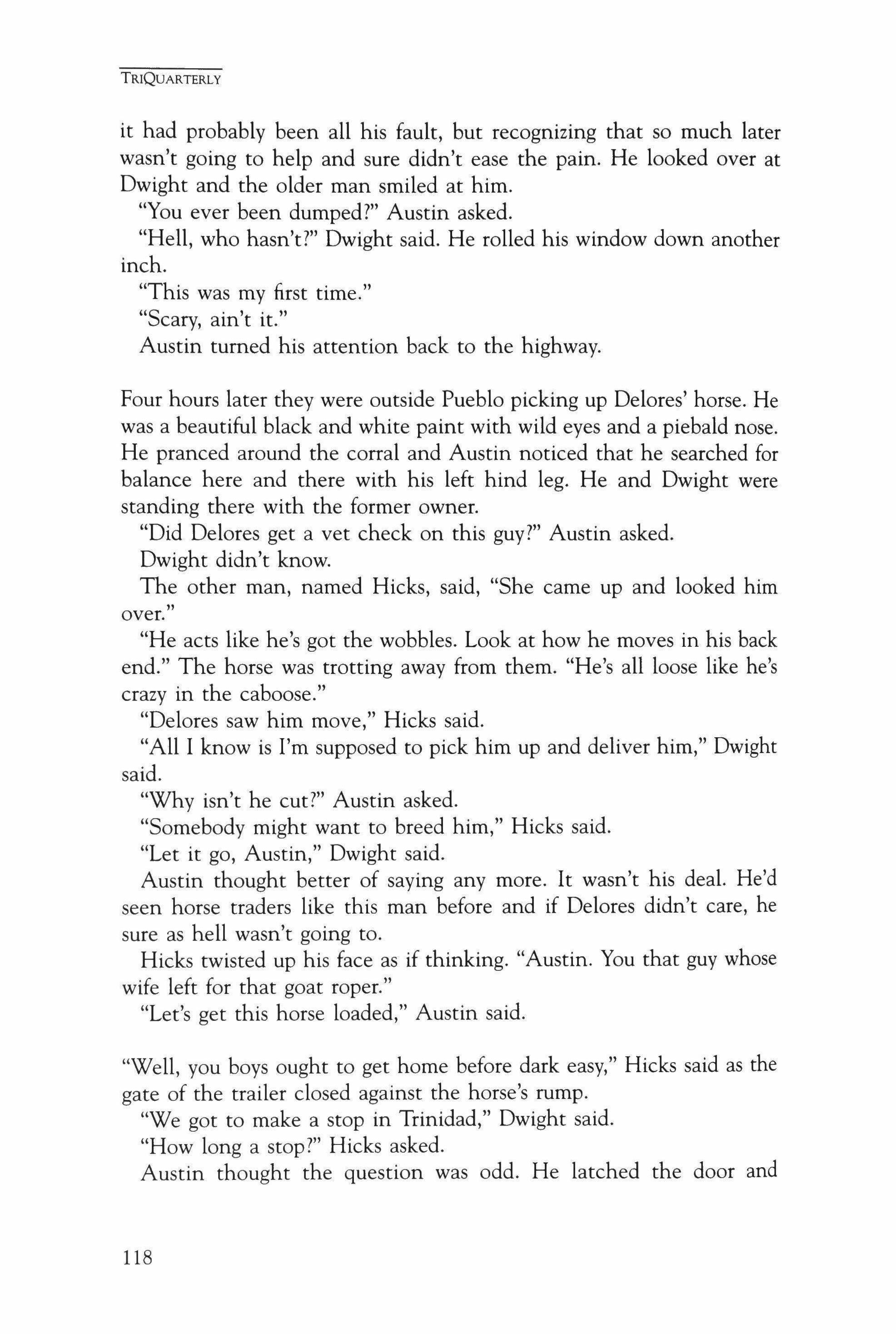
it had probably been all his fault, but recognizing that so much later wasn't going to help and sure didn't ease the pain. He looked over at Dwight and the older man smiled at him.
"You ever been dumped?" Austin asked.
"Hell, who hasn't?" Dwight said. He rolled his window down another inch.
"This was my first time."
"Scary, ain't it."
Austin turned his attention back to the highway.
Four hours later they were outside Pueblo picking up Delores' horse. He was a beautiful black and white paint with wild eyes and a piebald nose. He pranced around the corral and Austin noticed that he searched for balance here and there with his left hind leg. He and Dwight were standing there with the former owner.
"Did Delores get a vet check on this guy?" Austin asked.
Dwight didn't know.
The other man, named Hicks, said, "She came up and looked him over."
"He acts like he's got the wobbles. Look at how he moves in his back end." The horse was trotting away from them. "He's all loose like he's crazy in the caboose."
"Delores saw him move," Hicks said.
"All I know is I'm supposed to pick him up and deliver him," Dwight said.
"Why isn't he cut?" Austin asked.
"Somebody might want to breed him," Hicks said.
"Let it go, Austin," Dwight said.
Austin thought better of saying any more. It wasn't his deal. He'd seen horse traders like this man before and if Delores didn't care, he sure as hell wasn't going to.
Hicks twisted up his face as if thinking. "Austin. You that guy whose wife left for that goat roper."
"Let's get this horse loaded," Austin said.
"Well, you boys ought to get home before dark easy," Hicks said as the gate of the trailer closed against the horse's rump.
"We got to make a stop in Trinidad," Dwight said.
"How long a stop?" Hicks asked.
Austin thought the question was odd. He latched the door and
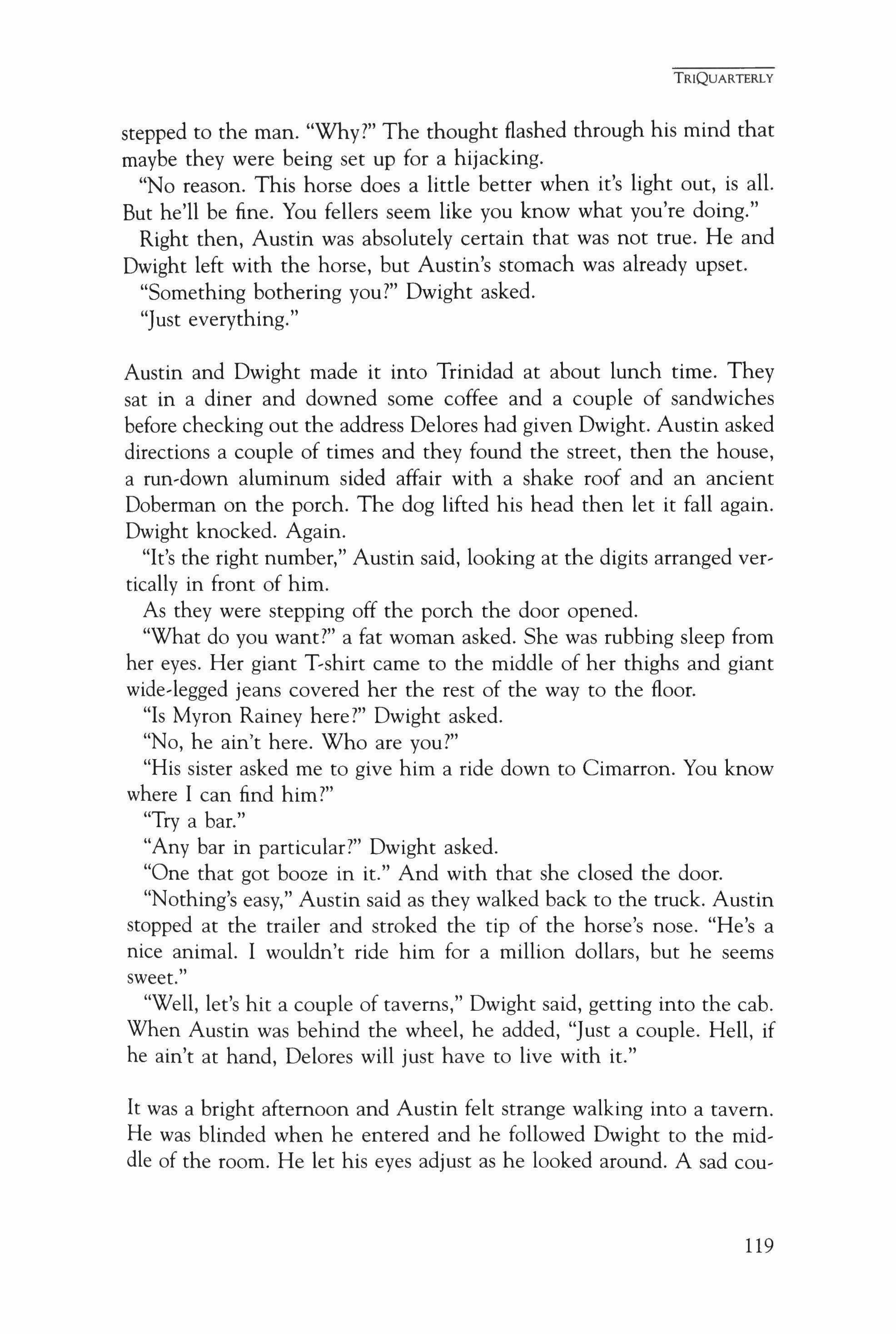
stepped to the man. "Why?" The thought flashed through his mind that maybe they were being set up for a hijacking.
"No reason. This horse does a little better when it's light out, is all. But he'll be fine. You fellers seem like you know what you're doing."
Right then, Austin was absolutely certain that was not true. He and Dwight left with the horse, but Austin's stomach was already upset.
"Something bothering you?" Dwight asked.
"Just everything."
Austin and Dwight made it into Trinidad at about lunch time. They sat in a diner and downed some coffee and a couple of sandwiches before checking out the address Delores had given Dwight. Austin asked directions a couple of times and they found the street, then the house, a run-down aluminum sided affair with a shake roof and an ancient Doberman on the porch. The dog lifted his head then let it fall again. Dwight knocked. Again.
"It's the right number," Austin said, looking at the digits arranged vertically in front of him.
As they were stepping off the porch the door opened.
"What do you want?" a fat woman asked. She was rubbing sleep from her eyes. Her giant 'Tshirt carne to the middle of her thighs and giant wide-legged jeans covered her the rest of the way to the floor.
"Is Myron Rainey here?" Dwight asked.
"No, he ain't here. Who are you?"
"His sister asked me to give him a ride down to Cimarron. You know where I can find him?"
"Try a bar."
"Any bar in particular?" Dwight asked.
"One that got booze in it." And with that she closed the door.
"Nothing's easy," Austin said as they walked back to the truck. Austin stopped at the trailer and stroked the tip of the horse's nose. "He's a nice animal. I wouldn't ride him for a million dollars, but he seems sweet."
"Well, let's hit a couple of taverns," Dwight said, getting into the cab. When Austin was behind the wheel, he added, "Just a couple. Hell, if he ain't at hand, Delores will just have to live with it."
It was a bright afternoon and Austin felt strange walking into a tavern. He was blinded when he entered and he followed Dwight to the middle of the room. He let his eyes adjust as he looked around. A sad cou-
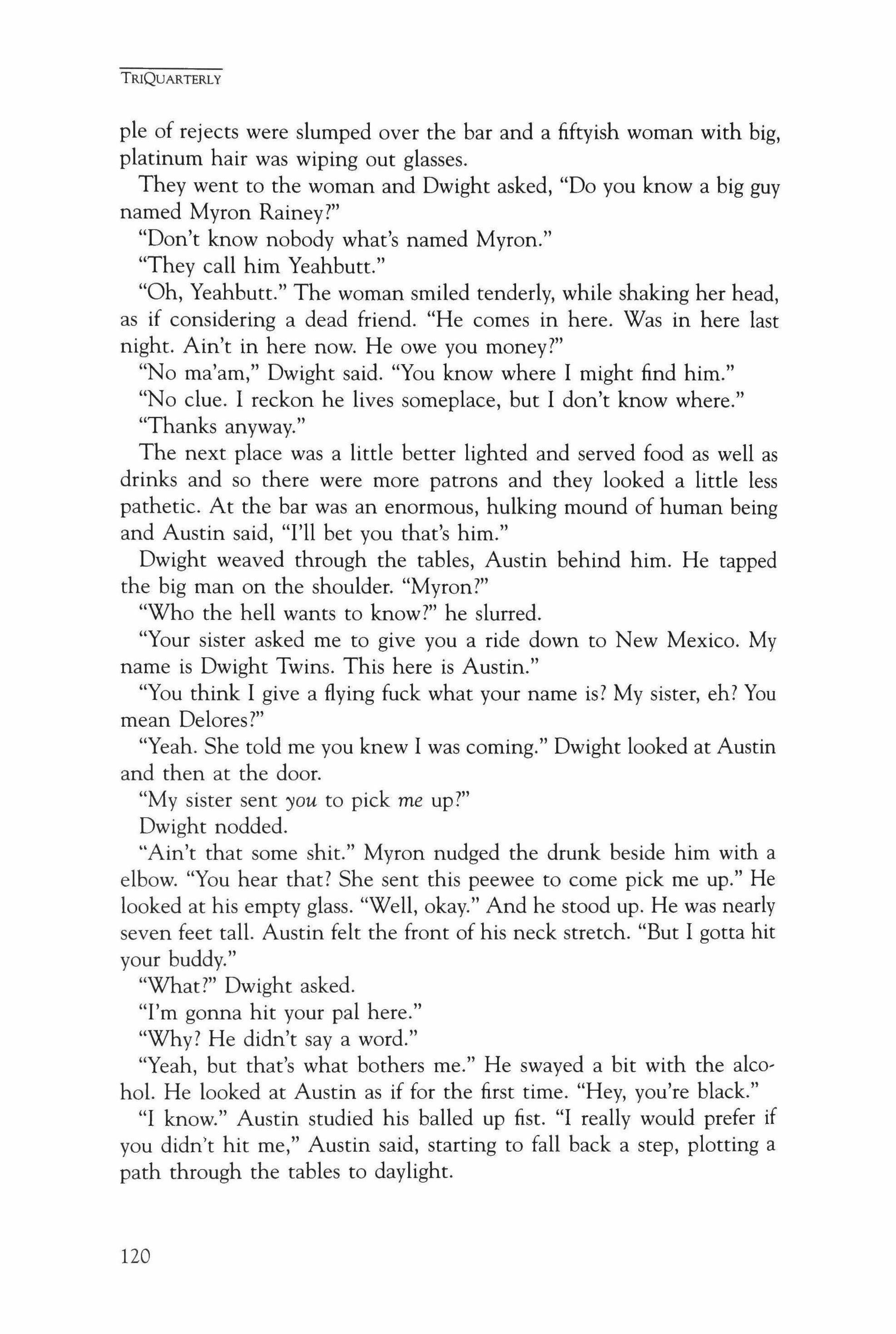
ple of rejects were slumped over the bar and a fiftyish woman with big, platinum hair was wiping out glasses.
They went to the woman and Dwight asked, "Do you know a big guy named Myron Rainey?"
"Don't know nobody what's named Myron."
"They call him Yeahbutt."
"Oh, Yeahbutt." The woman smiled tenderly, while shaking her head, as if considering a dead friend. "He comes in here. Was in here last night. Ain't in here now. He owe you money?"
"No ma'am," Dwight said. "You know where I might find him."
"No clue. I reckon he lives someplace, but I don't know where."
"Thanks anyway."
The next place was a little better lighted and served food as well as drinks and so there were more patrons and they looked a little less pathetic. At the bar was an enormous, hulking mound of human being and Austin said, "I'll bet you that's him."
Dwight weaved through the tables, Austin behind him. He tapped the big man on the shoulder. "Myron?"
"Who the hell wants to know?" he slurred.
"Your sister asked me to give you a ride down to New Mexico. My name is Dwight Twins. This here is Austin."
"You think I give a flying fuck what your name is? My sister, eh? You mean Delores?"
"Yeah. She told me you knew I was coming." Dwight looked at Austin and then at the door.
"My sister sent you to pick me up?"
Dwight nodded.
"Ain't that some shit." Myron nudged the drunk beside him with a elbow. "You hear that? She sent this peewee to come pick me up." He looked at his empty glass. "Well, okay." And he stood up. He was nearly seven feet tall. Austin felt the front of his neck stretch. "But I gotta hit your buddy."
"What?" Dwight asked.
"I'm gonna hit your pal here."
"Why? He didn't say a word."
"Yeah, but that's what bothers me." He swayed a bit with the alcohol. He looked at Austin as if for the first time. "Hey, you're black."
"I know." Austin studied his balled up fist. "I really would prefer if you didn't hit me," Austin said, starting to fall back a step, plotting a path through the tables to daylight.
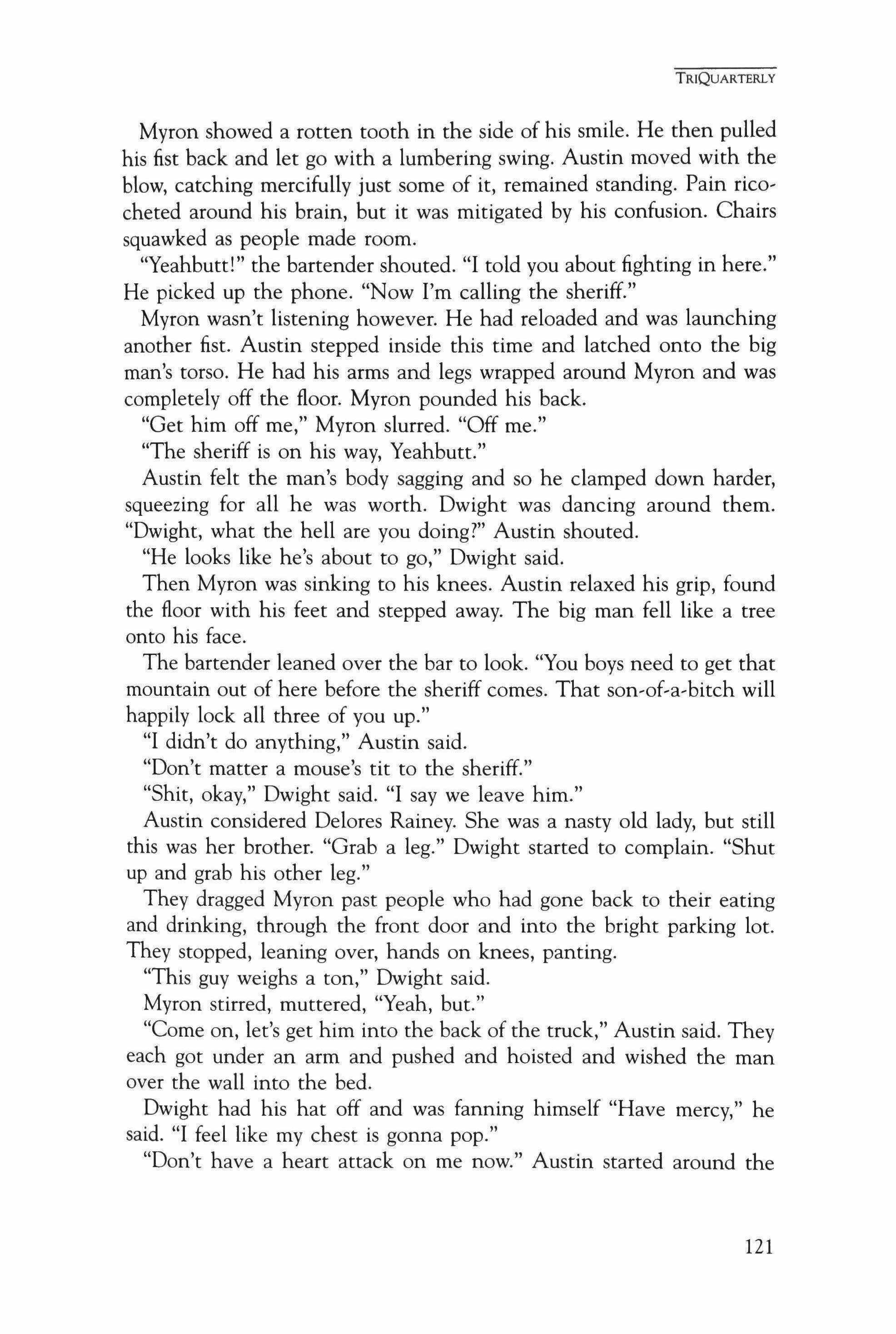
Myron showed a rotten tooth in the side of his smile. He then pulled his fist back and let go with a lumbering swing. Austin moved with the blow, catching mercifully just some of it, remained standing. Pain rico, cheted around his brain, but it was mitigated by his confusion. Chairs squawked as people made room.
"Yeahbutt!" the bartender shouted. "I told you about fighting in here." He picked up the phone. "Now I'm calling the sheriff."
Myron wasn't listening however. He had reloaded and was launching another fist. Austin stepped inside this time and latched onto the big man's torso. He had his arms and legs wrapped around Myron and was completely off the floor. Myron pounded his back.
"Get him off me," Myron slurred. "Off me."
"The sheriff is on his way, Yeahbutt."
Austin felt the man's body sagging and so he clamped down harder, squeezing for all he was worth. Dwight was dancing around them. "Dwight, what the hell are you doing?" Austin shouted.
"He looks like he's about to go," Dwight said.
Then Myron was sinking to his knees. Austin relaxed his grip, found the floor with his feet and stepped away. The big man fell like a tree onto his face.
The bartender leaned over the bar to look. "You boys need to get that mountain out of here before the sheriff comes. That son-of-a-bitch will happily lock all three of you up."
"I didn't do anything," Austin said.
"Don't matter a mouse's tit to the sheriff."
"Shit, okay," Dwight said. "I say we leave him."
Austin considered Delores Rainey. She was a nasty old lady, but still this was her brother. "Grab a leg." Dwight started to complain. "Shut up and grab his other leg."
They dragged Myron past people who had gone back to their eating and drinking, through the front door and into the bright parking lot. They stopped, leaning over, hands on knees, panting.
"This guy weighs a ton," Dwight said.
Myron stirred, muttered, "Yeah, but."
"Come on, let's get him into the back of the truck," Austin said. They each got under an arm and pushed and hoisted and wished the man over the wall into the bed.
Dwight had his hat off and was fanning himself "Have mercy," he said. "I feel like my chest is gonna pop."
"Don't have a heart attack on me now." Austin started around the

truck. "Get in. We'll stop down the road a piece and give the horse some more hay."
In the truck, Dwight said, "You know, he's right. You are black."
"Funny man."
As they rolled away from the tavern, the sheriff's rig pulled in.
A couple of miles out of Trinidad Austin pulled off the freeway into a rest area with, notably, "no facilities." They got out and looked down at Myron from either side of the bed. He was still out, though he had managed to shift his body into a more comfortable looking position. He snorted and twitched.
"At least he ain't dead," Dwight said.
"I reckon," Austin said. He walked back to the trailer and pulled the pin out of the back door. "I'll walk this boy around a bit while you muck out."
"Fair enough," Dwight said.
Austin backed the horse out of the trailer and led him off the gravel and down a short dirt path, let him nibble at what little grass there was. He looked at his watch and saw that it was nearly five. With any luck they might still make Cimarron by nightfall. He walked the horse back to Dwight who was putting away the silage fork. They loaded the horse and stepped toward the cab. They stopped at their doors and backed up to look into the bed. Myron was not there.
"Did you see him move?" Austin asked. "Nope." "Shit."
"I say leave him," Dwight said.
"We can't leave him out here. Something bad will happen. A bear will find him or something."
"That's the bear's problem," Dwight said. "Listen, you're the one he wants to hit."
Austin looked toward the highway, then over at the steep downward slope. "He can't have gone far."
"He won't be hard to spot anyway."
"You go that way." Austin pointed south to a thicket. "Maybe he had to pee." While Dwight walked off toward the trees, Austin moved to the slope and looked down at the trickle of a creek. He let his eyes follow the stream south a ways, then spotted Myron trying to pull himself up the opposite side of the arroyo. "Good God." Myron would franti-
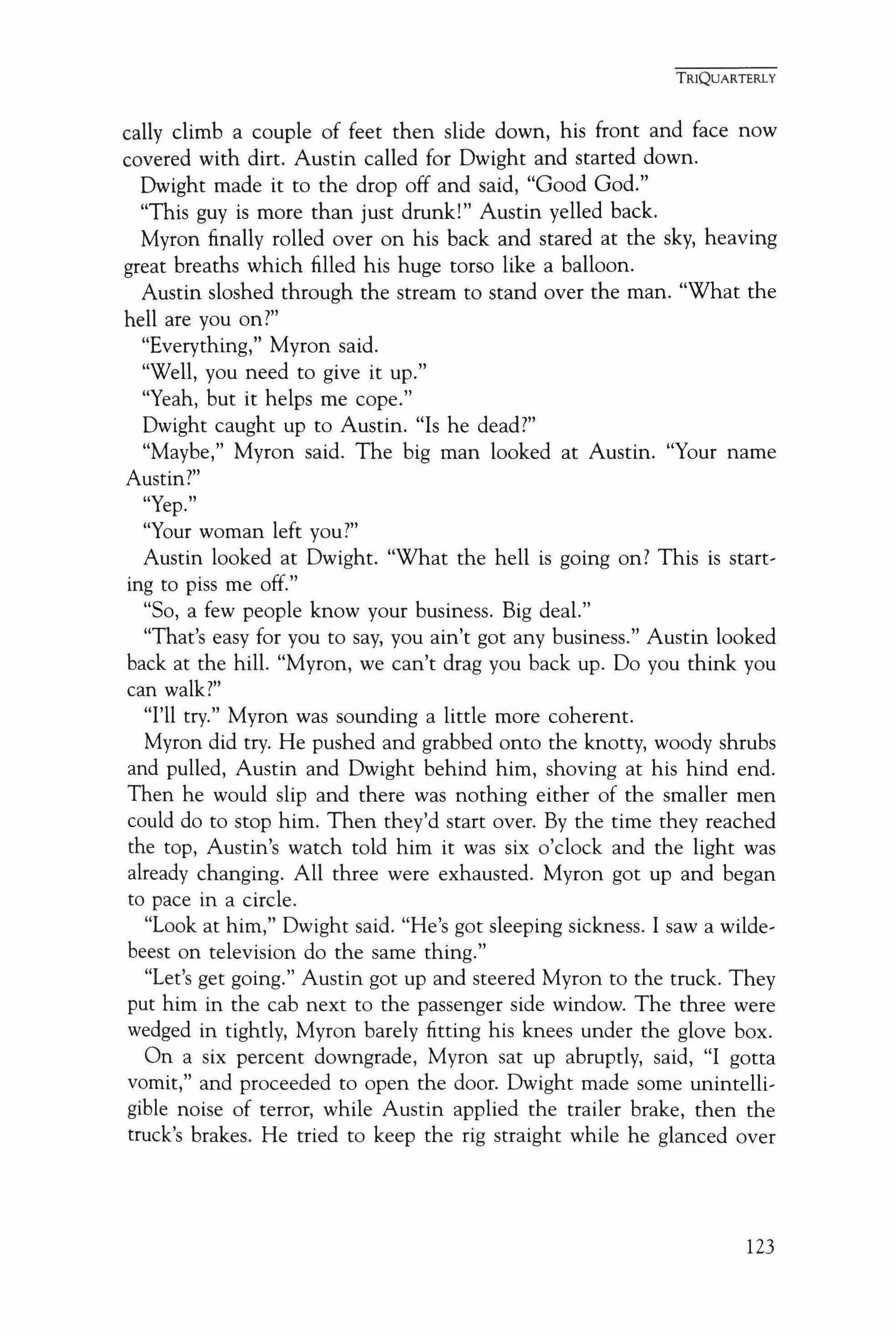
cally climb a couple of feet then slide down, his front and face now covered with dirt. Austin called for Dwight and started down.
Dwight made it to the drop off and said, "Good God."
"This guy is more than just drunk!" Austin yelled back. Myron finally rolled over on his back and stared at the sky, heaving great breaths which filled his huge torso like a balloon.
Austin sloshed through the stream to stand over the man. "What the hell are you on?"
"Everything," Myron said.
"Well, you need to give it up."
"Yeah, but it helps me cope."
Dwight caught up to Austin. "Is he dead?"
"Maybe," Myron said. The big man looked at Austin. "Your name Austin?"
"Yep."
"Your woman left you?"
Austin looked at Dwight. "What the hell is going on? This is starting to piss me off."
"So, a few people know your business. Big deal."
"That's easy for you to say, you ain't got any business." Austin looked back at the hill. "Myron, we can't drag you back up. Do you think you can walk?"
"I'll try." Myron was sounding a little more coherent. Myron did try. He pushed and grabbed onto the knotty, woody shrubs and pulled, Austin and Dwight behind him, shoving at his hind end. Then he would slip and there was nothing either of the smaller men could do to stop him. Then they'd start over. By the time they reached the top, Austin's watch told him it was six o'clock and the light was already changing. All three were exhausted. Myron got up and began to pace in a circle.
"Look at him," Dwight said. "He's got sleeping sickness. I saw a wildebeest on television do the same thing."
"Let's get going." Austin got up and steered Myron to the truck. They put him in the cab next to the passenger side window. The three were wedged in tightly, Myron barely fitting his knees under the glove box.
On a six percent downgrade, Myron sat up abruptly, said, "I gotta vomit," and proceeded to open the door. Dwight made some unintelligible noise of terror, while Austin applied the trailer brake, then the truck's brakes. He tried to keep the rig straight while he glanced over
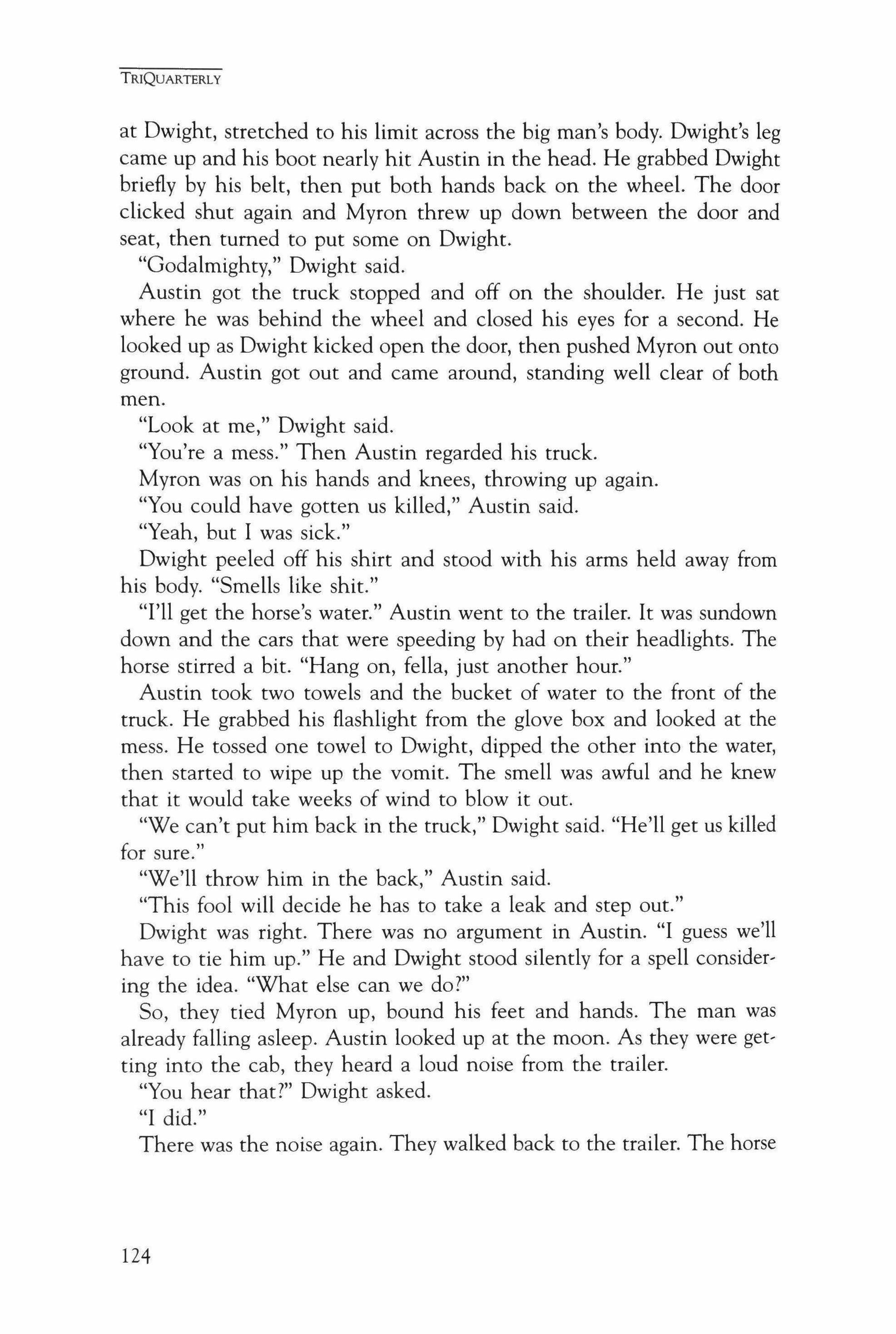
at Dwight, stretched to his limit across the big man's body. Dwight's leg came up and his boot nearly hit Austin in the head. He grabbed Dwight briefly by his belt, then put both hands back on the wheel. The door clicked shut again and Myron threw up down between the door and seat, then turned to put some on Dwight.
"Godalmighty," Dwight said.
Austin got the truck stopped and off on the shoulder. He just sat where he was behind the wheel and closed his eyes for a second. He looked up as Dwight kicked open the door, then pushed Myron out onto ground. Austin got out and came around, standing well clear of both men.
"Look at me," Dwight said.
"You're a mess." Then Austin regarded his truck.
Myron was on his hands and knees, throwing up again.
"You could have gotten us killed," Austin said.
"Yeah, but I was sick."
Dwight peeled off his shirt and stood with his arms held away from his body. "Smells like shit."
"I'll get the horse's water." Austin went to the trailer. It was sundown down and the cars that were speeding by had on their headlights. The horse stirred a bit. "Hang on, fella, just another hour."
Austin took two towels and the bucket of water to the front of the truck. He grabbed his flashlight from the glove box and looked at the mess. He tossed one towel to Dwight, dipped the other into the water, then started to wipe up the vomit. The smell was awful and he knew that it would take weeks of wind to blow it out.
"We can't put him back in the truck," Dwight said. "He'll get us killed for sure."
"We'll throw him in the back," Austin said.
"This fool will decide he has to take a leak and step out."
Dwight was right. There was no argument in Austin. "I guess we'll have to tie him up." He and Dwight stood silently for a spell considering the idea. "What else can we do?"
So, they tied Myron up, bound his feet and hands. The man was already falling asleep. Austin looked up at the moon. As they were getting into the cab, they heard a loud noise from the trailer.
"You hear that?" Dwight asked.
"I did."
There was the noise again. They walked back to the trailer. The horse
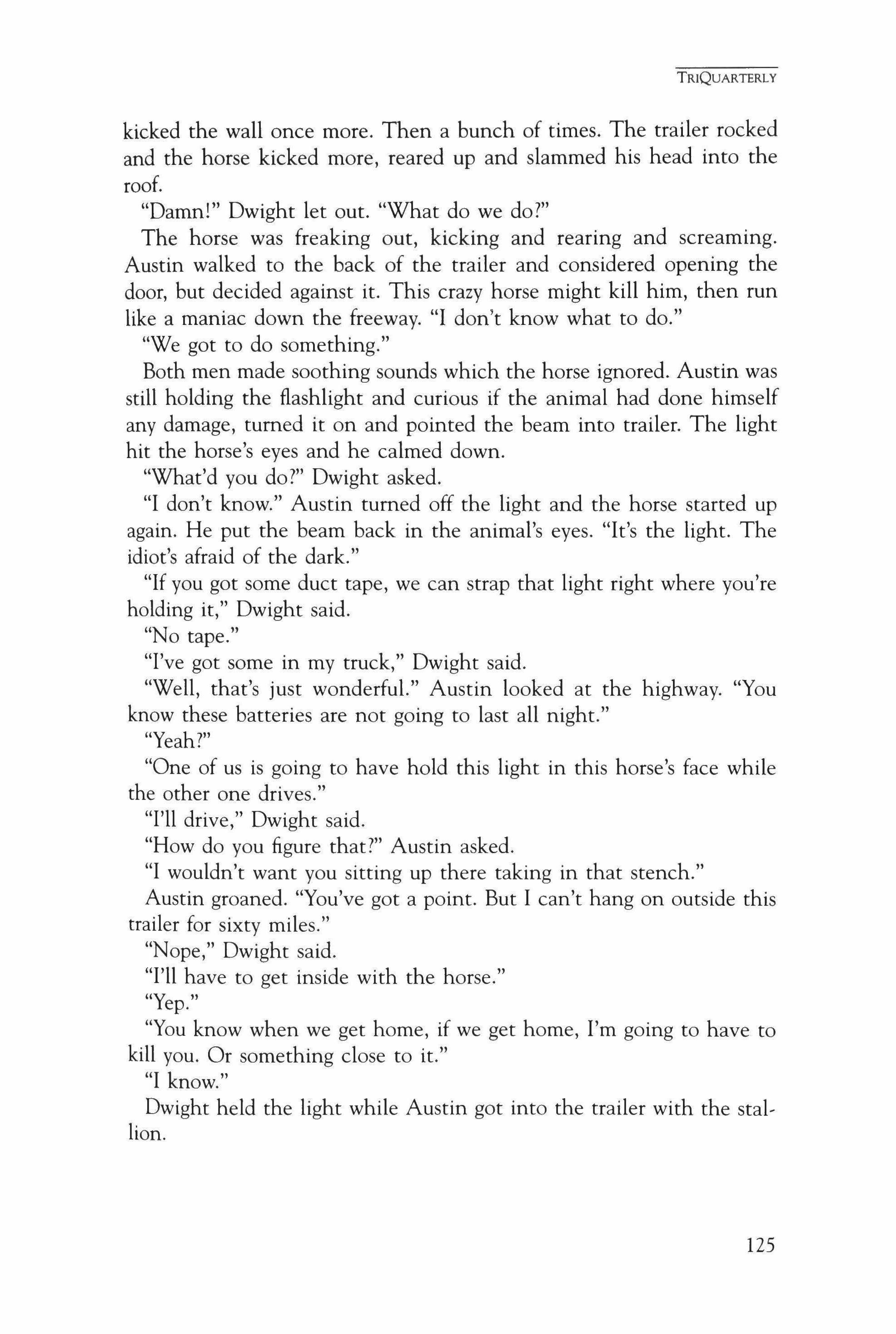
kicked the wall once more. Then a bunch of times. The trailer rocked and the horse kicked more, reared up and slammed his head into the roof.
"Damn!" Dwight let out. "What do we do?"
The horse was freaking out, kicking and rearing and screaming. Austin walked to the back of the trailer and considered opening the door, but decided against it. This crazy horse might kill him, then run like a maniac down the freeway. "I don't know what to do."
"We got to do something."
Both men made soothing sounds which the horse ignored. Austin was still holding the flashlight and curious if the animal had done himself any damage, turned it on and pointed the beam into trailer. The light hit the horse's eyes and he calmed down.
"What'd you do?" Dwight asked.
"I don't know." Austin turned off the light and the horse started up again. He put the beam back in the animal's eyes. "It's the light. The idiot's afraid of the dark."
"If you got some duct tape, we can strap that light right where you're holding it," Dwight said.
"No tape."
"I've got some in my truck," Dwight said.
"Well, that's just wonderful." Austin looked at the highway. "You know these batteries are not going to last all night."
"Yeah?"
"One of us is going to have hold this light in this horse's face while the other one drives."
"I'll drive," Dwight said.
"How do you figure that?" Austin asked.
"I wouldn't want you sitting up there taking in that stench."
Austin groaned. "You've got a point. But I can't hang on outside this trailer for sixty miles."
"Nope," Dwight said.
"I'll have to get inside with the horse."
"Yep."
"You know when we get home, if we get home, I'm going to have to kill you. Or something close to it."
"I know."
Dwight held the light while Austin got into the trailer with the stallion.
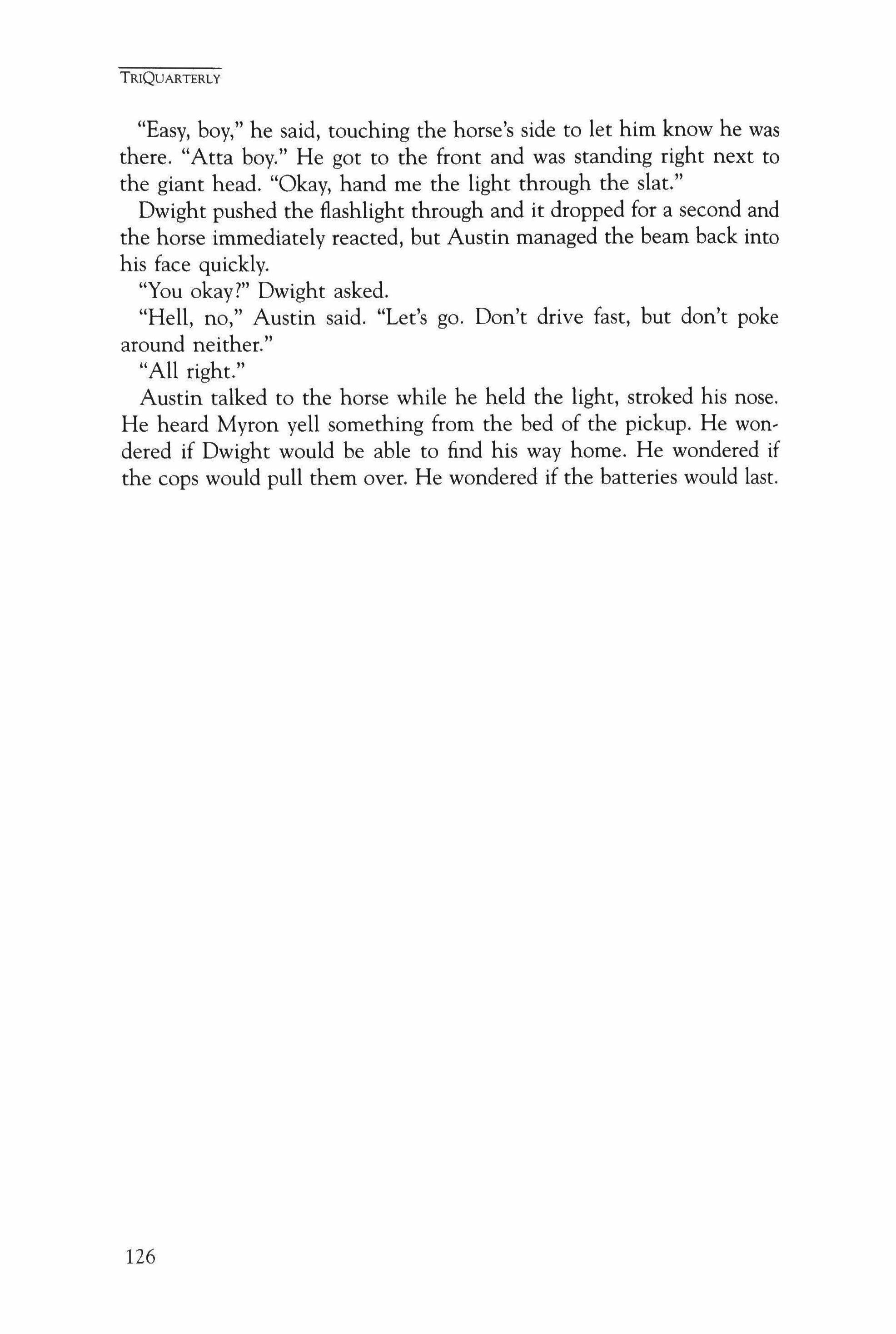
"Easy, boy," he said, touching the horse's side to let him know he was there. "Atta boy." He got to the front and was standing right next to the giant head. "Okay, hand me the light through the slat."
Dwight pushed the flashlight through and it dropped for a second and the horse immediately reacted, but Austin managed the beam back into his face quickly.
"You okay?" Dwight asked.
"Hell, no," Austin said. "Let's go. Don't drive fast, but don't poke around neither."
"All right."
Austin talked to the horse while he held the light, stroked his nose. He heard Myron yell something from the bed of the pickup. He wondered if Dwight would be able to find his way home. He wondered if the cops would pull them over. He wondered if the batteries would last.
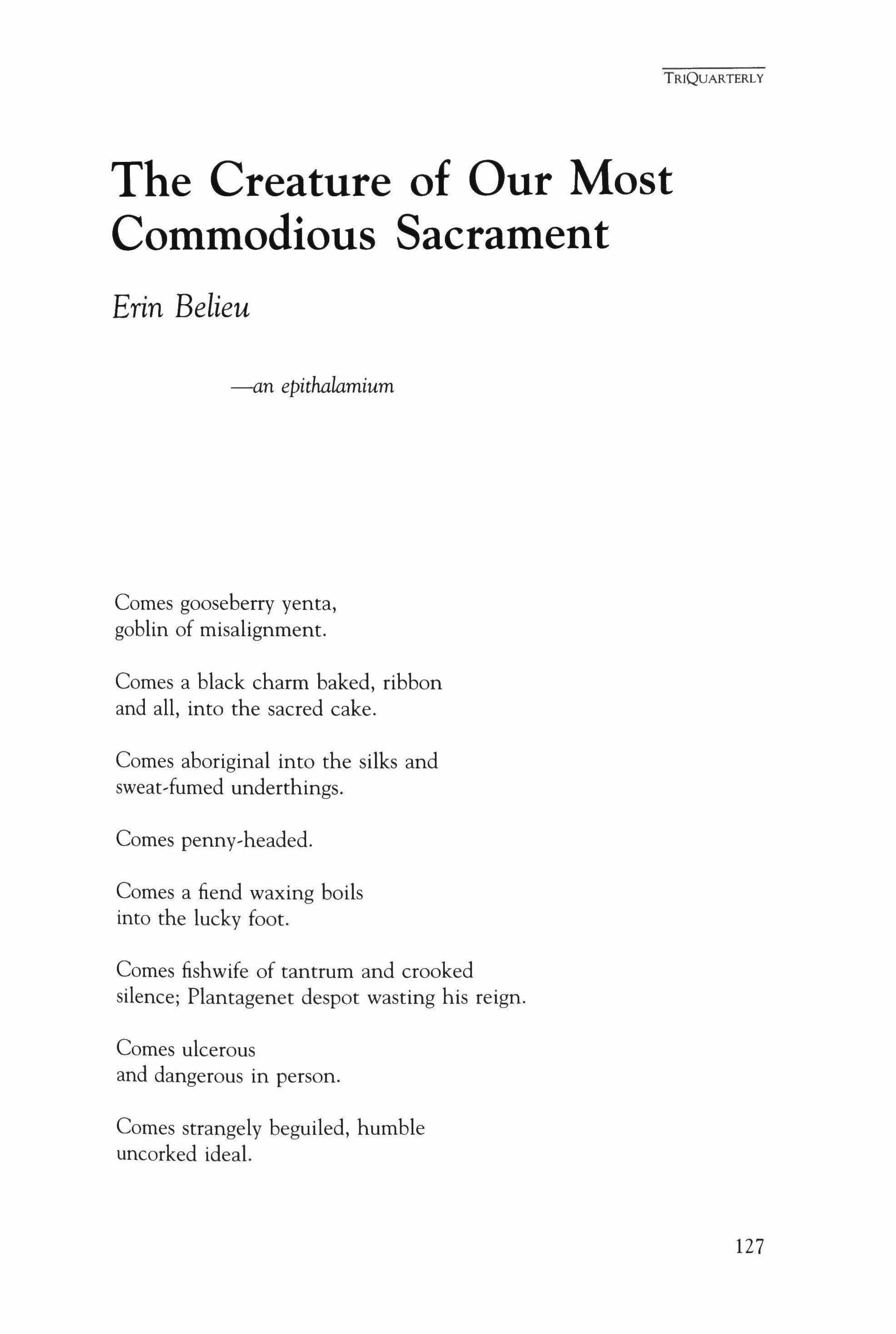
Comes gooseberry yenta, goblin of misalignment.
Comes a black charm baked, ribbon and all, into the sacred cake.
Comes aboriginal into the silks and sweat-fumed underthings.
Comes penny-headed.
Comes a fiend waxing boils into the lucky foot.
Comes fishwife of tantrum and crooked silence; Plantagenet despot wasting his reign.
Comes ulcerous and dangerous in person.
Comes strangely beguiled, humble uncorked ideal.
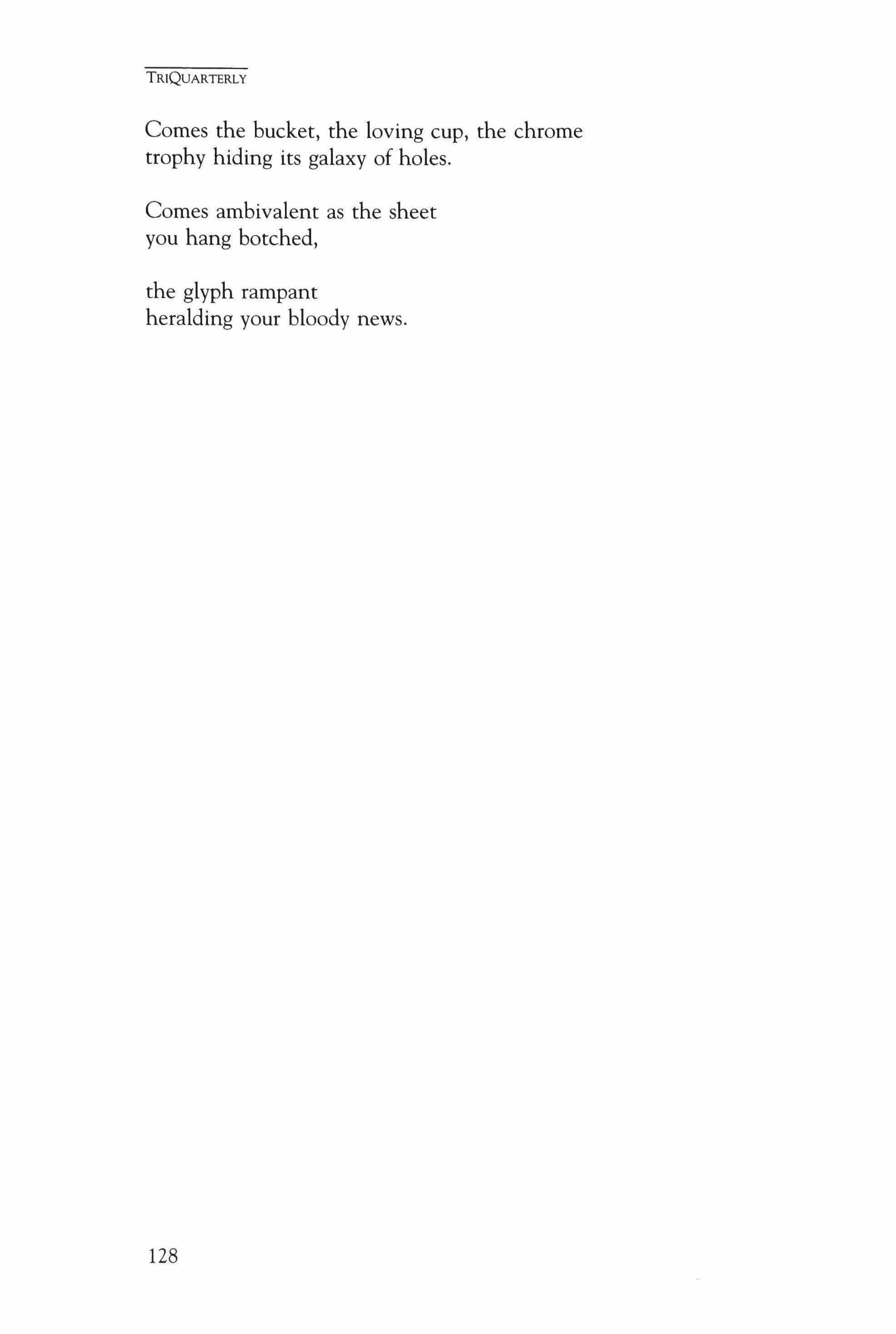
Comes the bucket, the loving cup, the chrome trophy hiding its galaxy of holes.
Comes ambivalent as the sheet you hang botched, the glyph rampant heralding your bloody news.
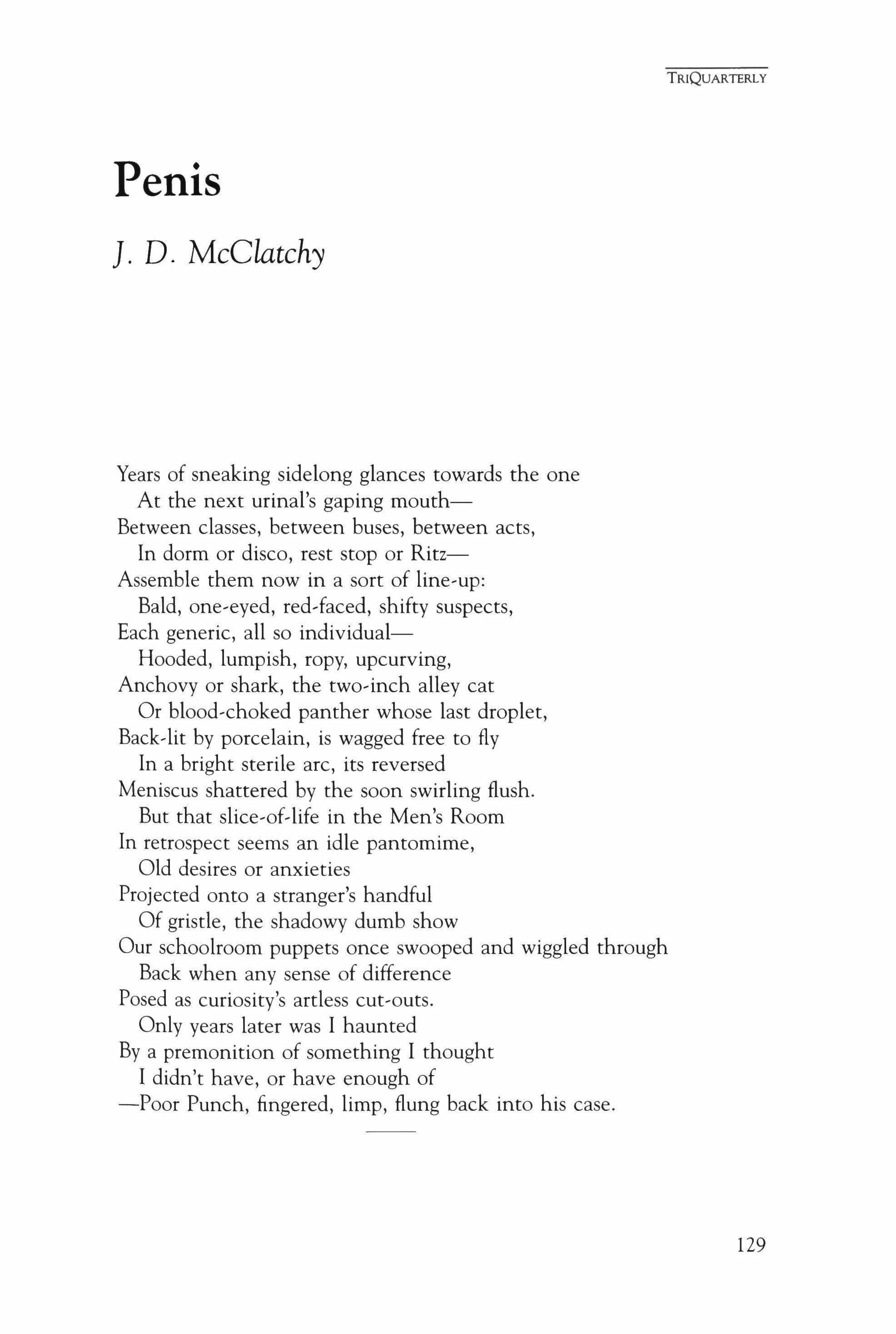
Years of sneaking sidelong glances towards the one
At the next urinal's gaping mouthBetween classes, between buses, between acts,
In dorm or disco, rest stop or Ritz-
Assemble them now in a sort of line-up: Bald, one-eyed, red-faced, shifty suspects, Each generic, all so individual-
Hooded, lumpish, ropy, upcurving, Anchovy or shark, the two-inch alley cat
Or blood-choked panther whose last droplet, Back-lit by porcelain, is wagged free to fly
In a bright sterile are, its reversed Meniscus shattered by the soon swirling flush.
But that slice-of-life in the Men's Room
In retrospect seems an idle pantomime, Old desires or anxieties
Projected onto a stranger's handful
Of gristle, the shadowy dumb show
Our schoolroom puppets once swooped and wiggled through Back when any sense of difference
Posed as curiosity's artless cut-outs.
Only years later was I haunted
By a premonition of something I thought I didn't have, or have enough of -Poor Punch, fingered, limp, flung back into his case.

Who knows what early memories are redeemed, What primitive rites reenacted, By our masculine version of mother-love? What daily unconscious tenderness
Is lavished here, such fastidious grooming Rituals for the wrinkled baby
Capuchin. Each man's member every morning May be gingerly held and juggled
Inside his Jockey shorts or lazily scratched
Through silk pajamas-in any case, Fondled, its puckered, sweat-sticky, fetid skin Lifted off the scrotal water-bed And hand-dried as if in a tumbler of air.
Later, tucked behind the clerk's apron
Or the financier's pinstripes or the rapper's Baggy jeans, our meek little Clark Kent Daydreams at his desk of last night's heroics, Hounded by a double life black-mailed By grainy color shots of summer-cabin Or back-seat exploits that had won praise From their pliant, cooing co-conspirators. But now, absently readjusted, As if fresh from cold surf, his ideal is just The bud of classic statuary. The marble is hard, the soulful cub withdrawn.
So, the old questions linger on unanswered. Why in the fables on Greek kraters
Do those of the ephebes always stick straight out?
Why is it the last part of a man's Body to age? Though function may no longer Follow form, its chthonic shaft and crown
Retain maturity's rugged majesty. What Ovid might once have figured out As a shepherd who'd struck a king in disguise, Or Plato have thought in an aside
The haphazard tail of white in the pot where
His abstract egg was hard-boiling into halves Soon in search of some way to resume the shell
Of an identical privacy,
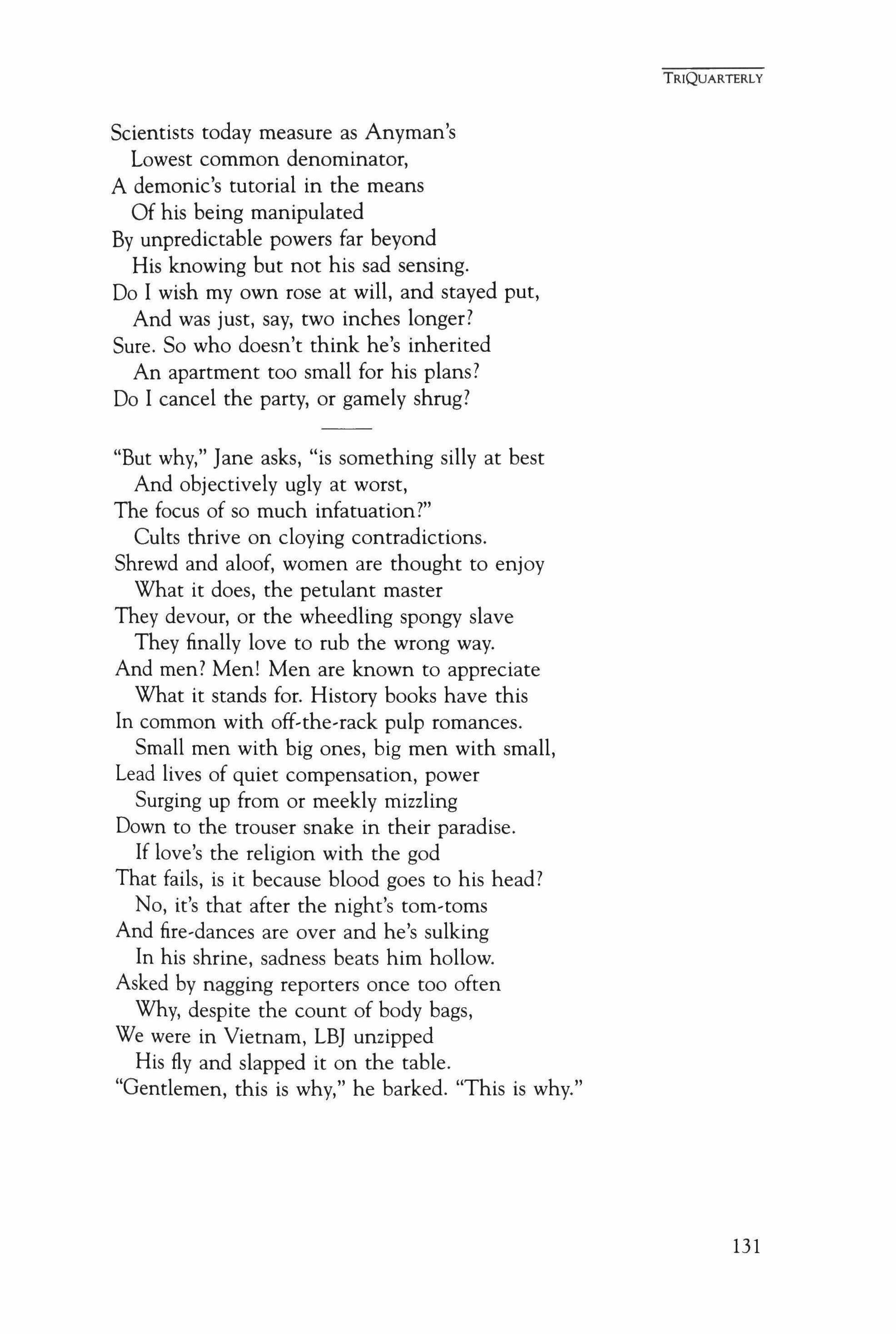
Scientists today measure as Anyman's Lowest common denominator, A demonic's tutorial in the means
Of his being manipulated By unpredictable powers far beyond His knowing but not his sad sensing.
Do I wish my own rose at will, and stayed put, And was just, say, two inches longer?
Sure. So who doesn't think he's inherited
An apartment too small for his plans?
Do I cancel the party, or gamely shrug?
"But why," Jane asks, "is something silly at best And objectively ugly at worst, The focus of so much infatuation?"
Cults thrive on cloying contradictions.
Shrewd and aloof, women are thought to enjoy What it does, the petulant master They devour, or the wheedling spongy slave They finally love to rub the wrong way. And men? Men! Men are known to appreciate What it stands for. History books have this In common with off-the-rack pulp romances.
Small men with big ones, big men with small, Lead lives of quiet compensation, power Surging up from or meekly mizzling
Down to the trouser snake in their paradise. If love's the religion with the god That fails, is it because blood goes to his head?
No, it's that after the night's tom-toms And fire-dances are over and he's sulking
In his shrine, sadness beats him hollow. Asked by nagging reporters once too often
Why, despite the count of body bags, We were in Vietnam, LBJ unzipped
His fly and slapped it on the table.
"Gentlemen, this is why," he barked. "This is why."
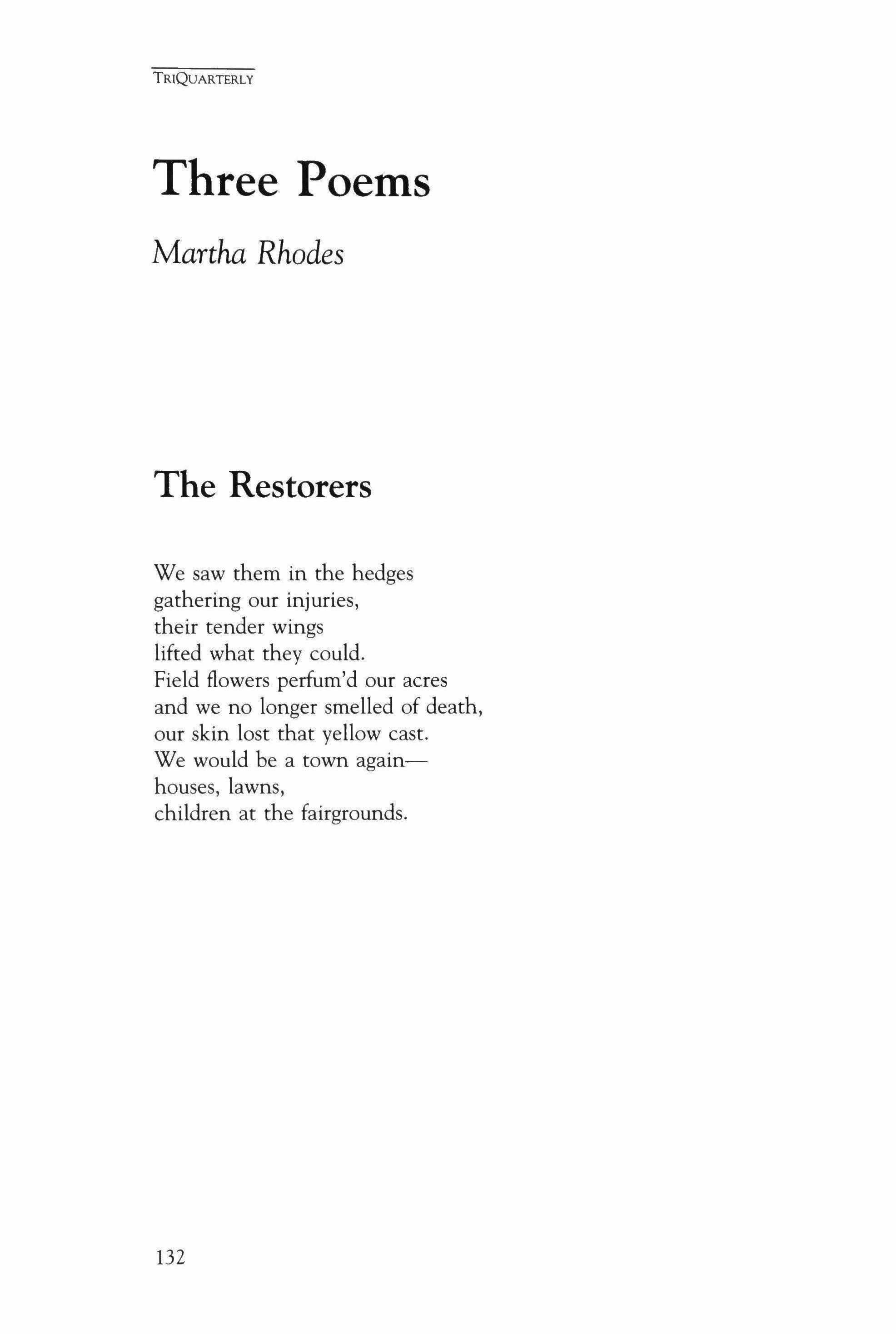
We saw them in the hedges gathering our injuries, their tender wings lifted what they could. Field flowers perfum'd our acres and we no longer smelled of death, our skin lost that yellow cast. We would be a town againhouses, lawns, children at the fairgrounds.
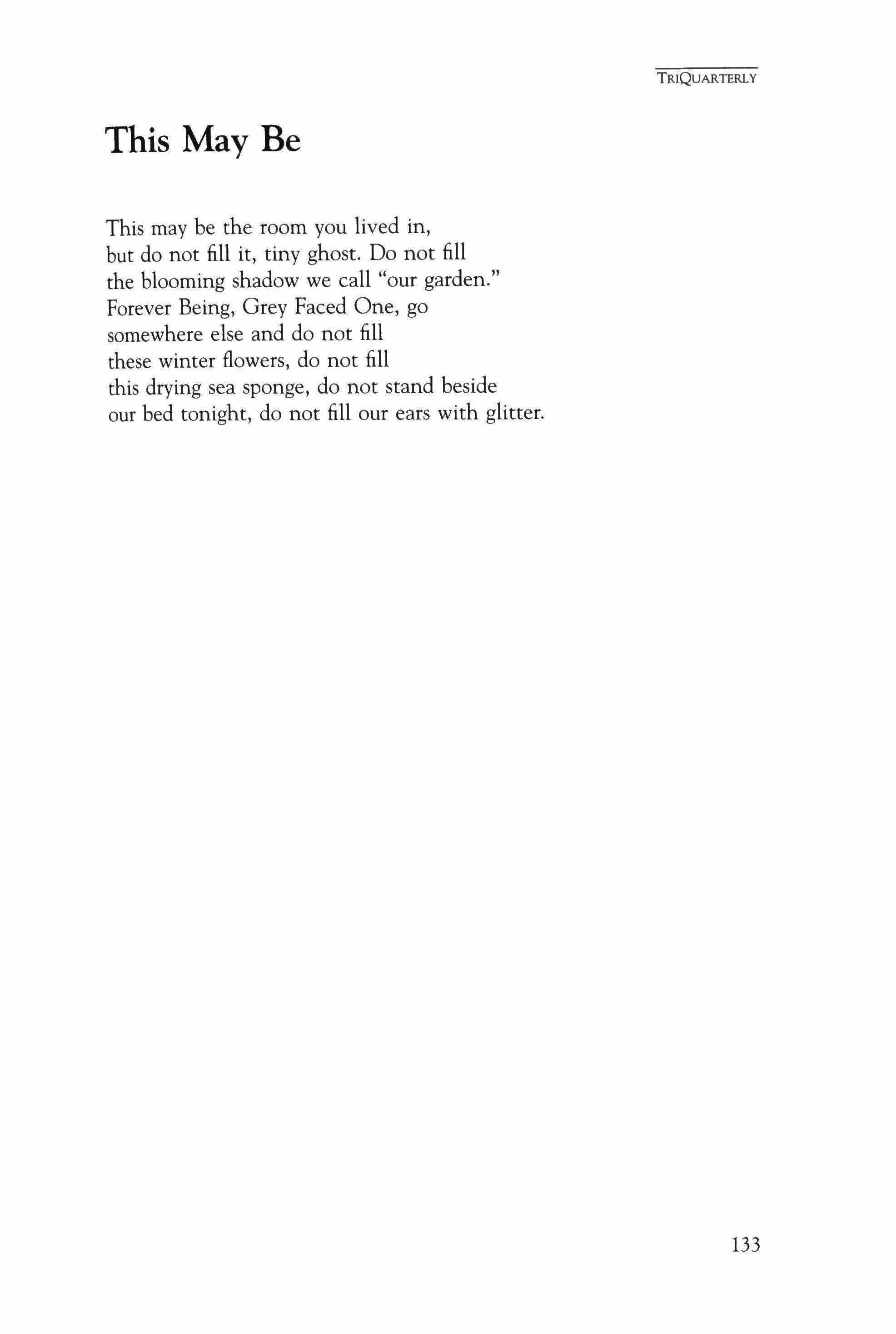
This may be the room you lived in, but do not fill it, tiny ghost. Do not fill the blooming shadow we call "our garden." Forever Being, Grey Faced One, go somewhere else and do not fill these winter flowers, do not fill this drying sea sponge, do not stand beside our bed tonight, do not fill our ears with glitter.

He is the one man I've met (80 nowl ) I've ever wanted to grab by the belt buckle and ride so fast the bed would take off. But I'd just sit there, my thigh grazing his, all those interminable evenings at the Center for the Artsthrough high school, Lucy and I drove to Cambridge in my mother's car, hid a few houses from his, and followed him to the clinic where he worked, to the gas station, Tommy's Lunch, through all his Saturday chores. We'd haunt Cafe Algiers. When Lucy died, he called me. When I met my husband, I called him. I can tell he has come to New York. I can feel him walking in New York, I can feel him walking up my block and stopping to buy water and looking up the 40 floors of my building up through my floor up between my legs up through my head
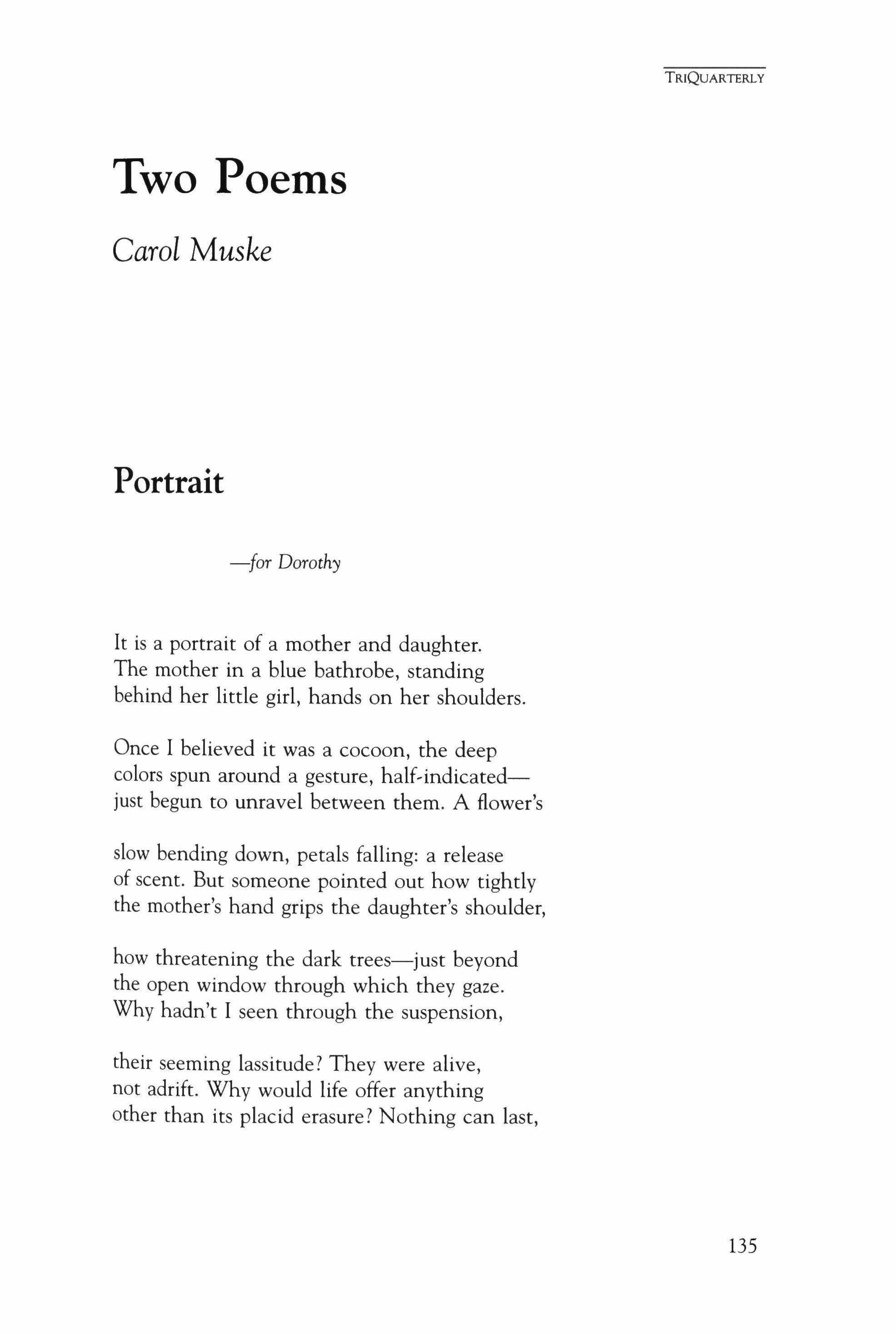
-for Dorothy
It is a portrait of a mother and daughter. The mother in a blue bathrobe, standing behind her little girl, hands on her shoulders.
Once I believed it was a cocoon, the deep colors spun around a gesture, half-indicatedjust begun to unravel between them. A flower's
slow bending down, petals falling: a release of scent. But someone pointed out how tightly the mother's hand grips the daughter's shoulder, how threatening the dark trees-just beyond the open window through which they gaze. Why hadn't I seen through the suspension, their seeming lassitude? They were alive, not adrift. Why would life offer anything other than its placid erasure? Nothing can last,
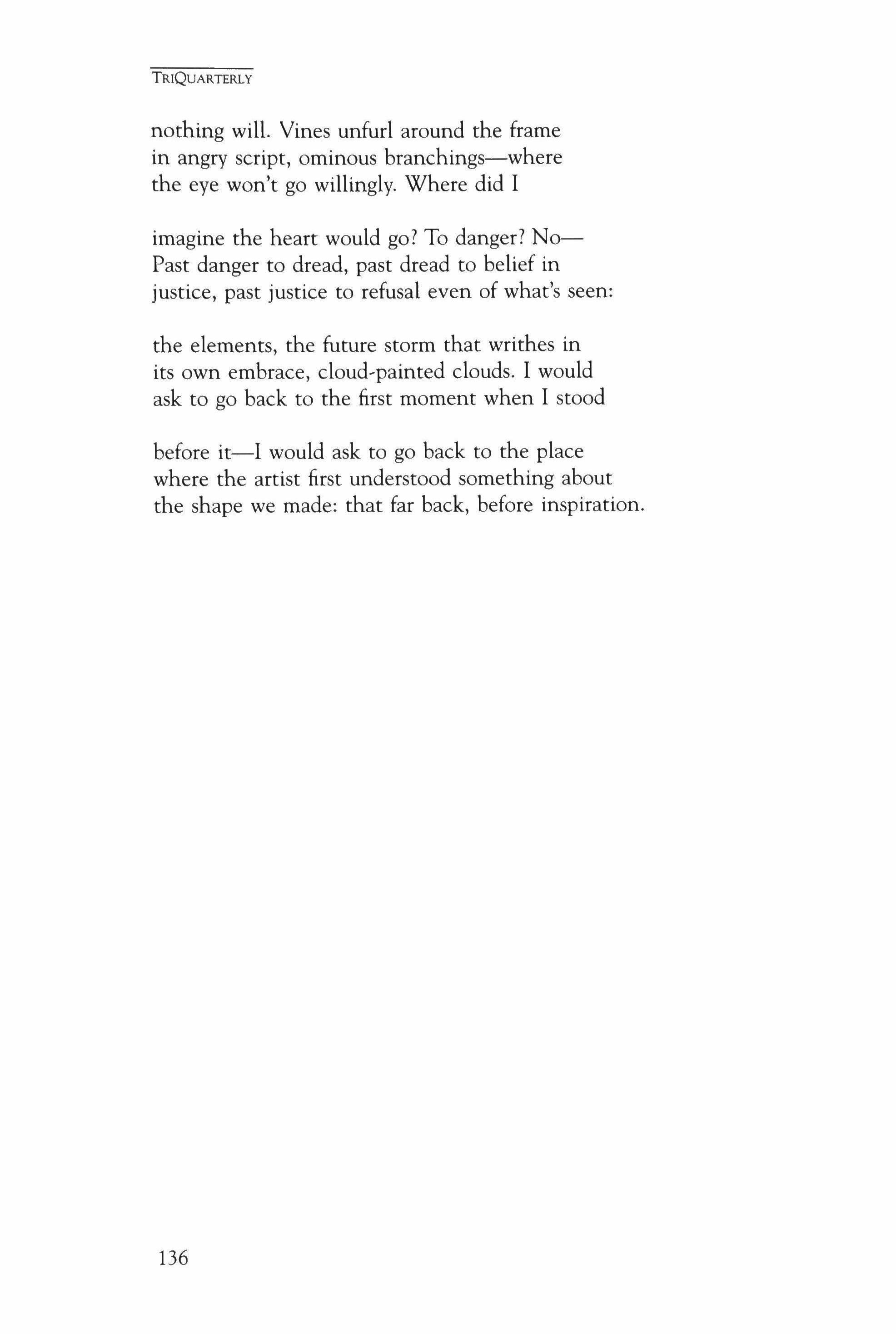
nothing will. Vines unfurl around the frame in angry script, ominous branchings-where the eye won't go willingly. Where did I
imagine the heart would go? To danger? NoPast danger to dread, past dread to belief in justice, past justice to refusal even of what's seen: the elements, the future storm that writhes in its own embrace, cloud-painted clouds. I would ask to go back to the first moment when I stood before it-I would ask to go back to the place where the artist first understood something about the shape we made: that far back, before inspiration.
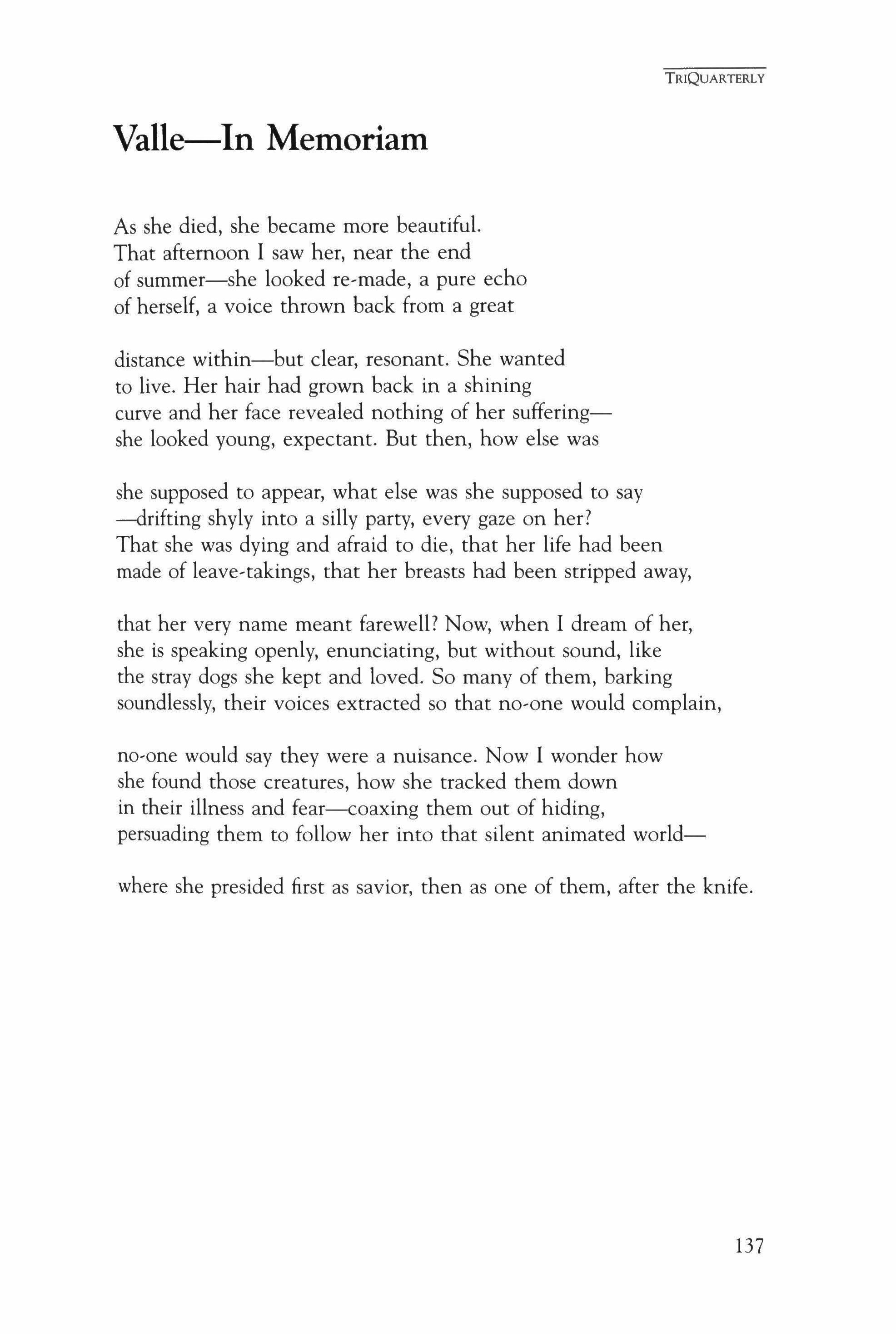
As she died, she became more beautiful. That afternoon I saw her, near the end of summer-she looked re-made, a pure echo of herself, a voice thrown back from a great distance within-but clear, resonant. She wanted to live. Her hair had grown back in a shining curve and her face revealed nothing of her sufferingshe looked young, expectant. But then, how else was she supposed to appear, what else was she supposed to say -drifting shyly into a silly party, every gaze on her? That she was dying and afraid to die, that her life had been made of leave,takings, that her breasts had been stripped away, that her very name meant farewell? Now, when I dream of her, she is speaking openly, enunciating, but without sound, like the stray dogs she kept and loved. So many of them, barking soundlessly, their voices extracted so that no-one would complain, no-one would say they were a nuisance. Now I wonder how she found those creatures, how she tracked them down in their illness and fear-coaxing them out of hiding, persuading them to follow her into that silent animated worldwhere she presided first as savior, then as one of them, after the knife.
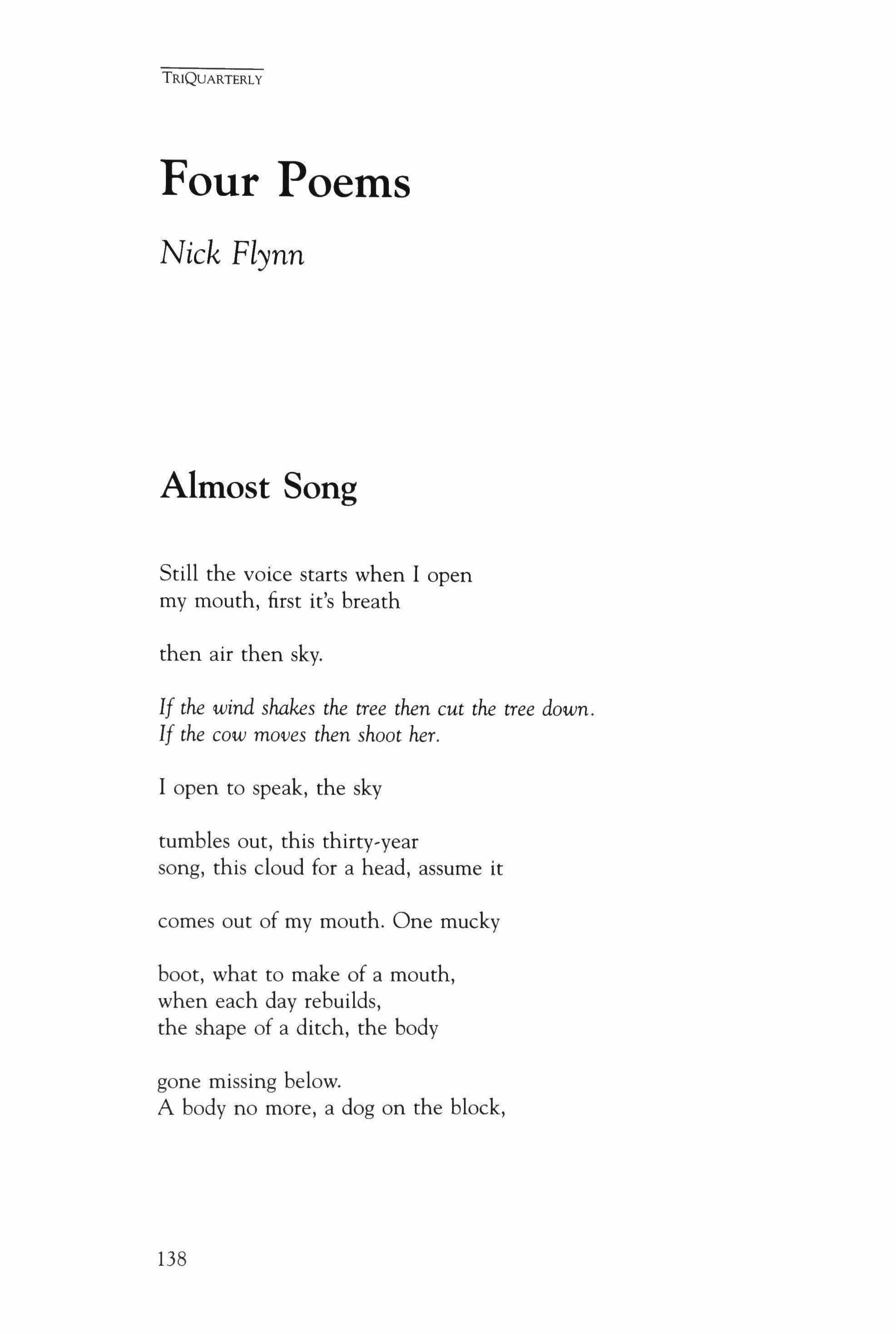
Still the voice starts when I open my mouth, first it's breath then air then sky. If the wind shakes the tree then cut the tree down. If the cow moves then shoot her.
I open to speak, the sky tumbles out, this thirty-year song, this cloud for a head, assume it comes out of my mouth. One mucky boot, what to make of a mouth, when each day rebuilds, the shape of a ditch, the body gone missing below. A body no more, a dog on the block,
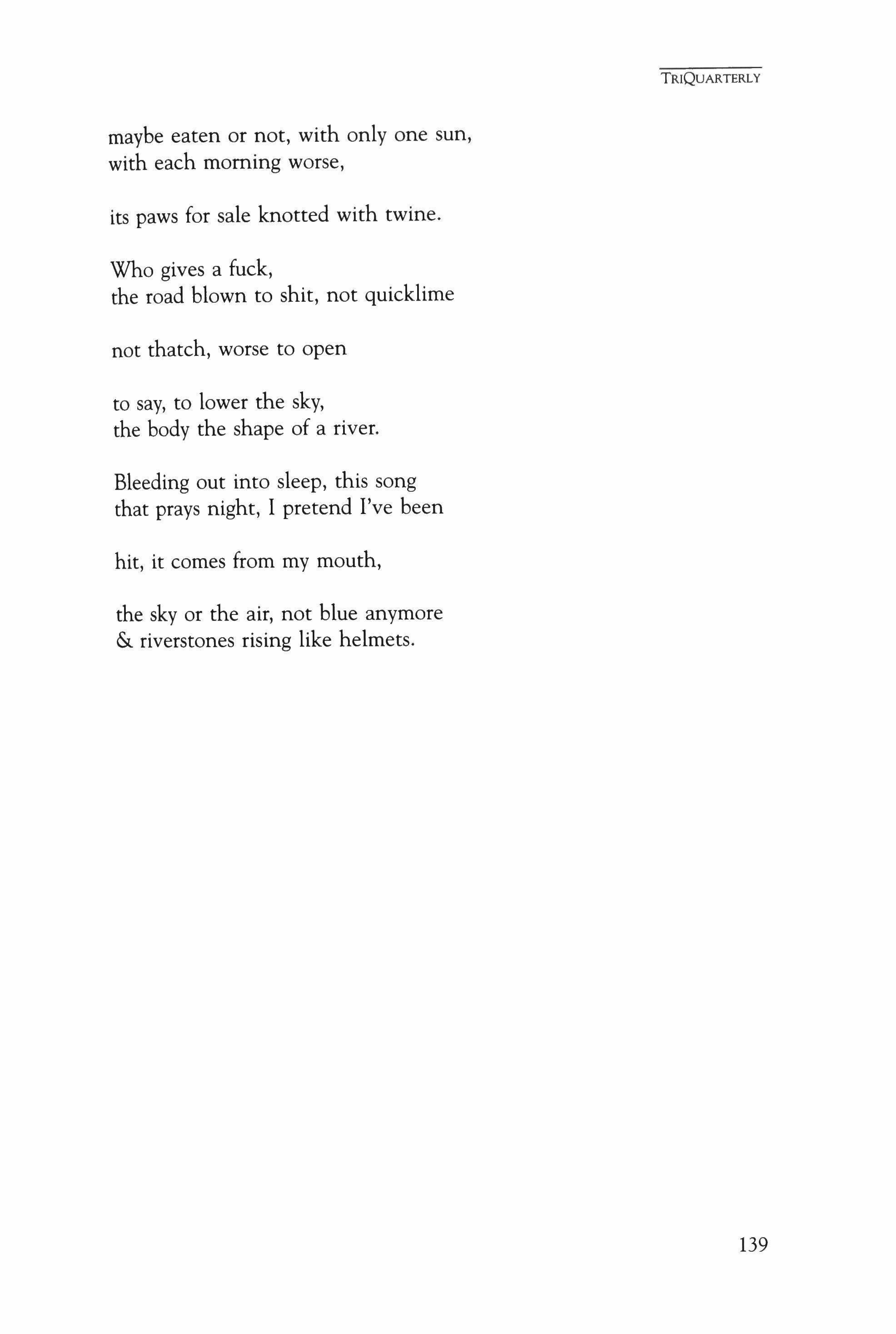
maybe eaten or not, with only one sun, with each morning worse, its paws for sale knotted with twine.
Who gives a fuck, the road blown to shit, not quicklime
not thatch, worse to open to say, to lower the sky, the body the shape of a river.
Bleeding out into sleep, this song that prays night, I pretend I've been hit, it comes from my mouth, the sky or the air, not blue anymore & riverstones rising like helmets.
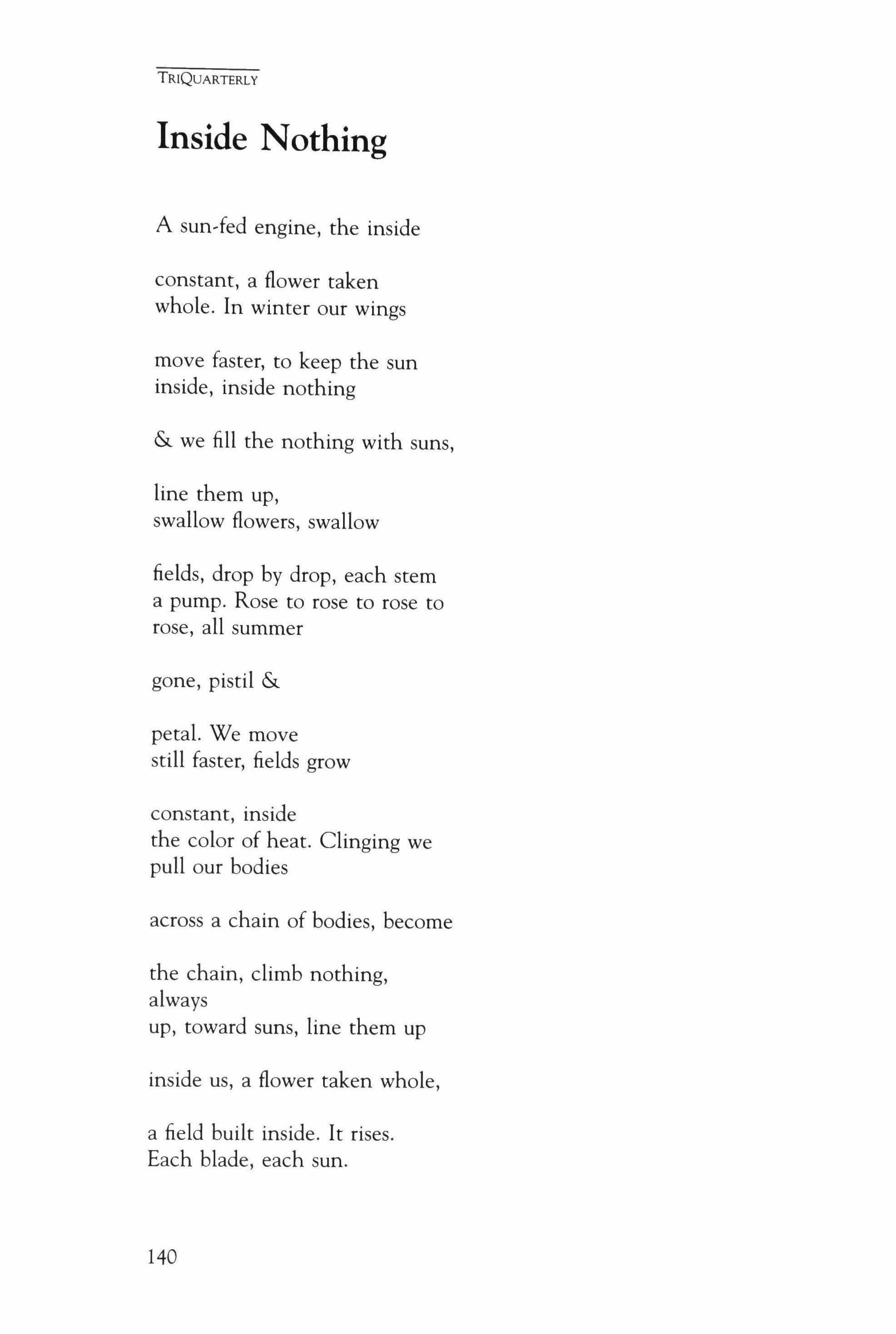
A sun-fed engine, the inside
constant, a flower taken whole. In winter our wings
move faster, to keep the sun inside, inside nothing & we fill the nothing with suns, line them up, swallow flowers, swallow
fields, drop by drop, each stem a pump. Rose to rose to rose to rose, all summer
gone, pistil & petal. We move still faster, fields grow
constant, inside the color of heat. Clinging we pull our bodies
across a chain of bodies, become the chain, climb nothing, always up, toward suns, line them up inside us, a flower taken whole, a field built inside. It rises. Each blade, each sun.
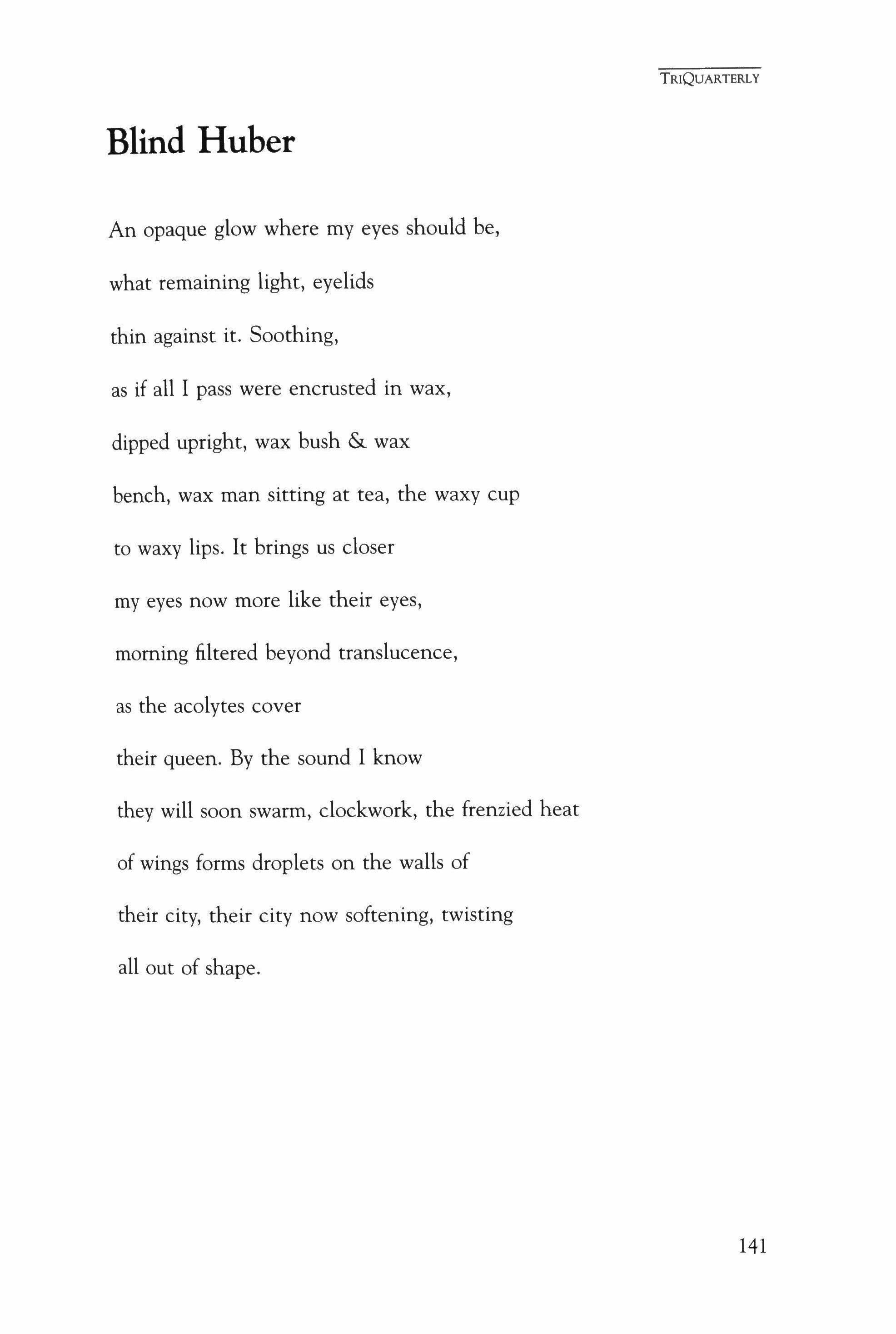
An opaque glow where my eyes should be, what remaining light, eyelids thin against it. Soothing, as if all I pass were encrusted in wax, dipped upright, wax bush & wax bench, wax man sitting at tea, the waxy cup to waxy lips. It brings us closer my eyes now more like their eyes, morning filtered beyond translucence, as the acolytes cover their queen. By the sound I know they will soon swarm, clockwork, the frenzied heat of wings forms droplets on the walls of their city, their city now softening, twisting all out of shape.
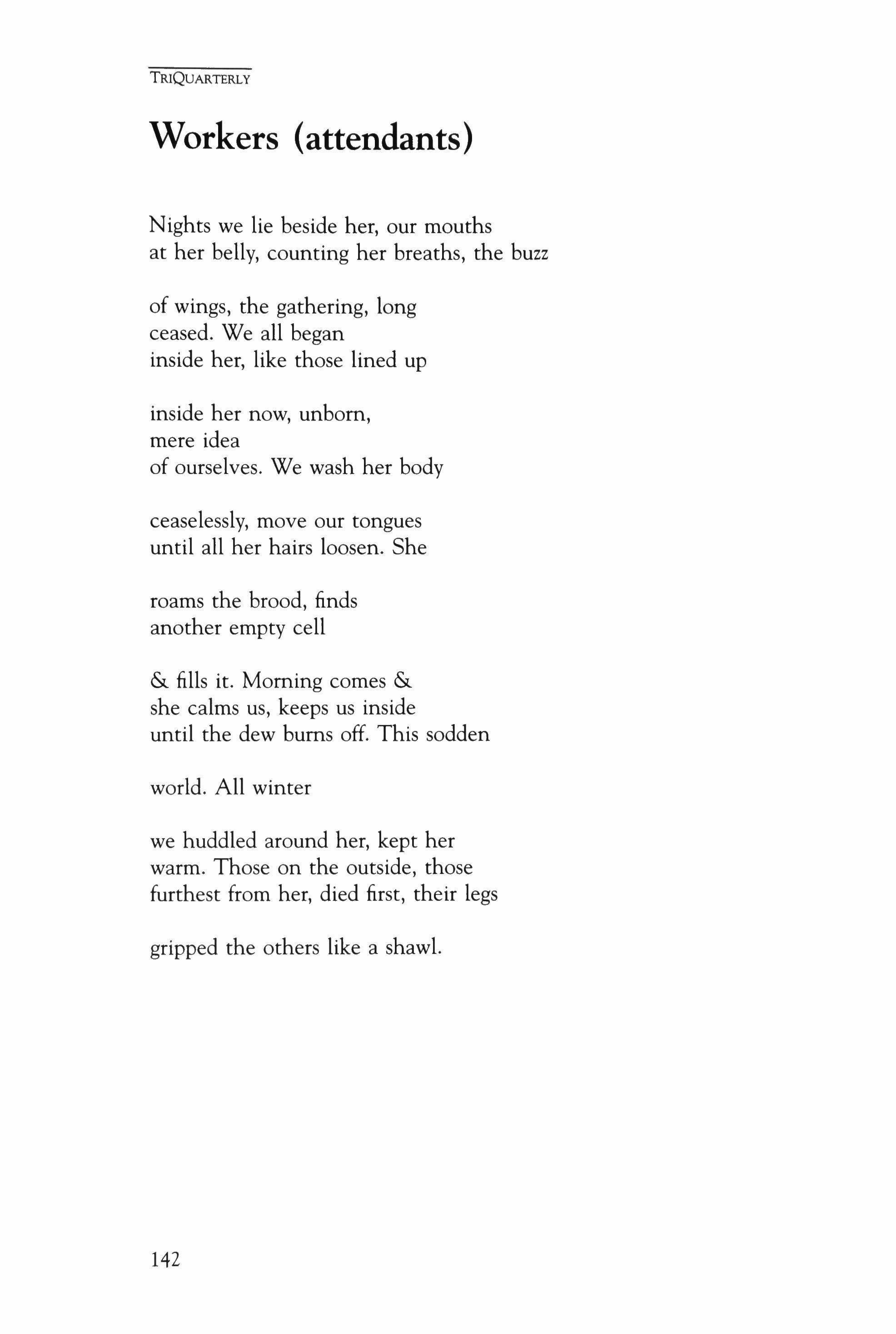
Nights we lie beside her, our mouths at her belly, counting her breaths, the buzz of wings, the gathering, long ceased. We all began inside her, like those lined up inside her now, unborn, mere idea of ourselves. We wash her body ceaselessly, move our tongues until all her hairs loosen. She roams the brood, finds another empty cell & fills it. Morning comes & she calms us, keeps us inside until the dew burns off. This sodden world. All winter we huddled around her, kept her warm. Those on the outside, those furthest from her, died first, their legs
gripped the others like a shawl.

It's odd because, beyond that day, there's not much else he remembers about the summer he spent near Bridal Falls while she went home to California to visit with some friends. They'd been married four or five years by then, and this, they realized, was the longest they'd ever been separated, a fact that shadowed their conversation in the days before they left. "Do we love each other less?" she'd asked, one morning over coffee, and by way of illustration she had summoned that squat, misshapen form the ancients believed Eros degraded into as we age. "Does this mean that we are turning into that?"
At first he thought this is one of those things that lovers talk about in order to have them talked away, the words themselves a kind of talisman against the very thing they named; but then she started to reach across the breakfast table to take his hand, and he could see in the way some unchecked reflex drew it back that this
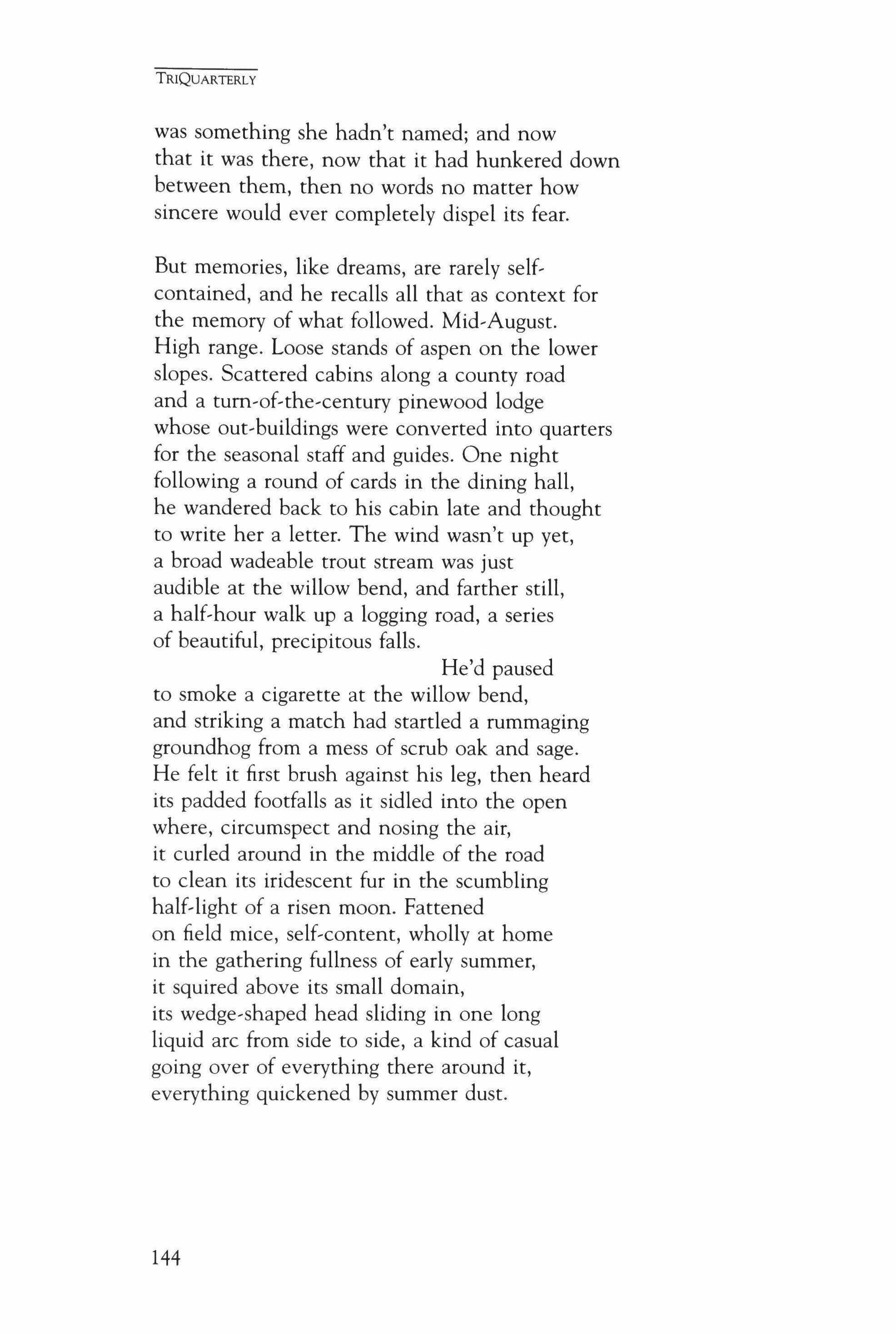
was something she hadn't named; and now that it was there, now that it had hunkered down between them, then no words no matter how sincere would ever completely dispel its fear.
But memories, like dreams, are rarely selfcontained, and he recalls all that as context for the memory of what followed. Mid-August. High range. Loose stands of aspen on the lower slopes. Scattered cabins along a county road and a tum-of-the-century pinewood lodge whose out-buildings were converted into quarters for the seasonal staff and guides. One night following a round of cards in the dining hall, he wandered back to his cabin late and thought to write her a letter. The wind wasn't up yet, a broad wadeable trout stream was just audible at the willow bend, and farther still, a half-hour walk up a logging road, a series of beautiful, precipitous falls.
He'd paused to smoke a cigarette at the willow bend, and striking a match had startled a rummaging groundhog from a mess of scrub oak and sage. He felt it first brush against his leg, then heard its padded footfalls as it sidled into the open where, circumspect and nosing the air, it curled around in the middle of the road to clean its iridescent fur in the scumbling half-light of a risen moon. Fattened on field mice, self-content, wholly at home in the gathering fullness of early summer, it squired above its small domain, its wedge-shaped head sliding in one long liquid arc from side to side, a kind of casual going over of everything there around it, everything quickened by summer dust.

And then he thought it settled its leveling gaze on him. He tried to imagine what it was it saw. Some vague nocturnal shape? An appalling otherness intruding on the marked-out limits of its ground? Whatever it was, what he saw looking back at him was a figure of that thing she'd feared, the unwinged creature of their desire annealed and toughened over, glutted somehow, the dull, lumpish animal of it slaked, complacent, overfilled, and for all of that imperious in the dry-eyed prospect of its nature.
The trout stream ran, or seems to run, somewhere under that memory, the rhythm of it emptying into the confusion of the days to come: the maddened flurry of telephone calls, the tears, reproaches, their trips cut short, a flood of apologies and regrets until they couldn't really say what happened to them. Like all such fears, throughout the intervening years this one rose and disappeared so often that they'd come to feel that it was a kind of longing too, a part of them that wants as well, that makes their separate presence felt in ways that cause the heart to fly up into the chest, as his does now, twenty years later, lying there beside her while she falls asleep, her hair, like his, declining into gray, her body, like his, heavier and more familiar, her face, like his, overlaid with the spider trace of middle age. But struggle as he will to understand, he cannot connect his own death to the purblind terror that's come over him.

Tumbled from the backwash of a fishing boat, laved in salt and damascened with wormloops scrolling the long arm's length of it, it rehearsed in our son's storied hands a history of fells and sail-roads, of flare-ups, strongholds, the terror-monger at last laid low and the gold hoard hauled from its barrow.
Stripped from the tree of reckoning, arrayed against the world's unpunished harms, may it still serve in the coming years to bolster the peacemaker's heart in him, to steer him around whatever new perils must now precede that homecoming folktales tell us is the end-all meaning of our journeying.
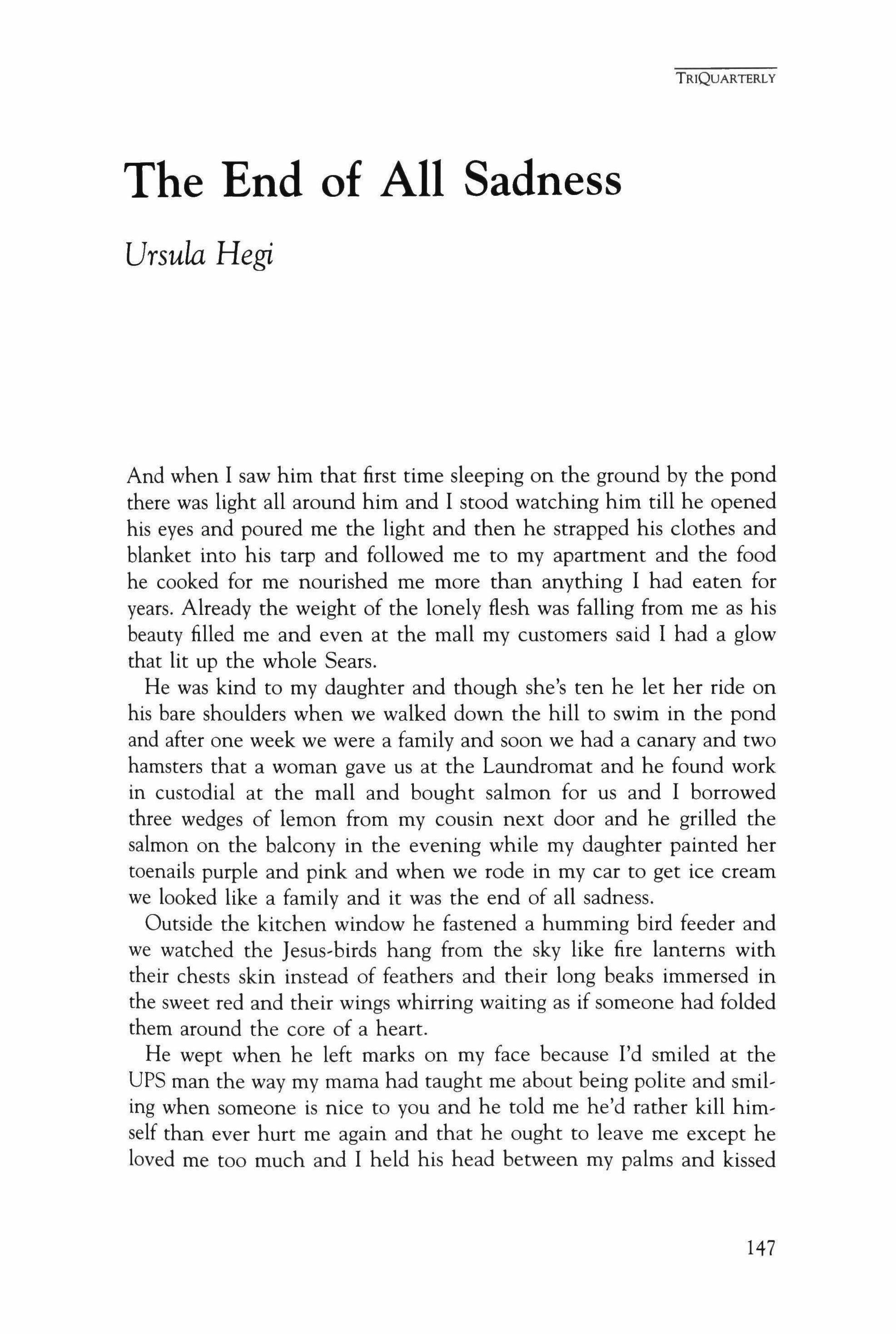
And when I saw him that first time sleeping on the ground by the pond there was light all around him and I stood watching him till he opened his eyes and poured me the light and then he strapped his clothes and blanket into his tarp and followed me to my apartment and the food he cooked for me nourished me more than anything I had eaten for years. Already the weight of the lonely flesh was falling from me as his beauty filled me and even at the mall my customers said I had a glow that lit up the whole Sears.
He was kind to my daughter and though she's ten he let her ride on his bare shoulders when we walked down the hill to swim in the pond and after one week we were a family and soon we had a canary and two hamsters that a woman gave us at the Laundromat and he found work in custodial at the mall and bought salmon for us and I borrowed three wedges of lemon from my cousin next door and he grilled the salmon on the balcony in the evening while my daughter painted her toenails purple and pink and when we rode in my car to get ice cream we looked like a family and it was the end of all sadness.
Outside the kitchen window he fastened a humming bird feeder and we watched the jesus-birds hang from the sky like fire lanterns with their chests skin instead of feathers and their long beaks immersed in the sweet red and their wings whirring waiting as if someone had folded them around the core of a heart.
He wept when he left marks on my face because I'd smiled at the UPS man the way my mama had taught me about being polite and smiling when someone is nice to you and he told me he'd rather kill himself than ever hurt me again and that he ought to leave me except he loved me too much and I held his head between my palms and kissed
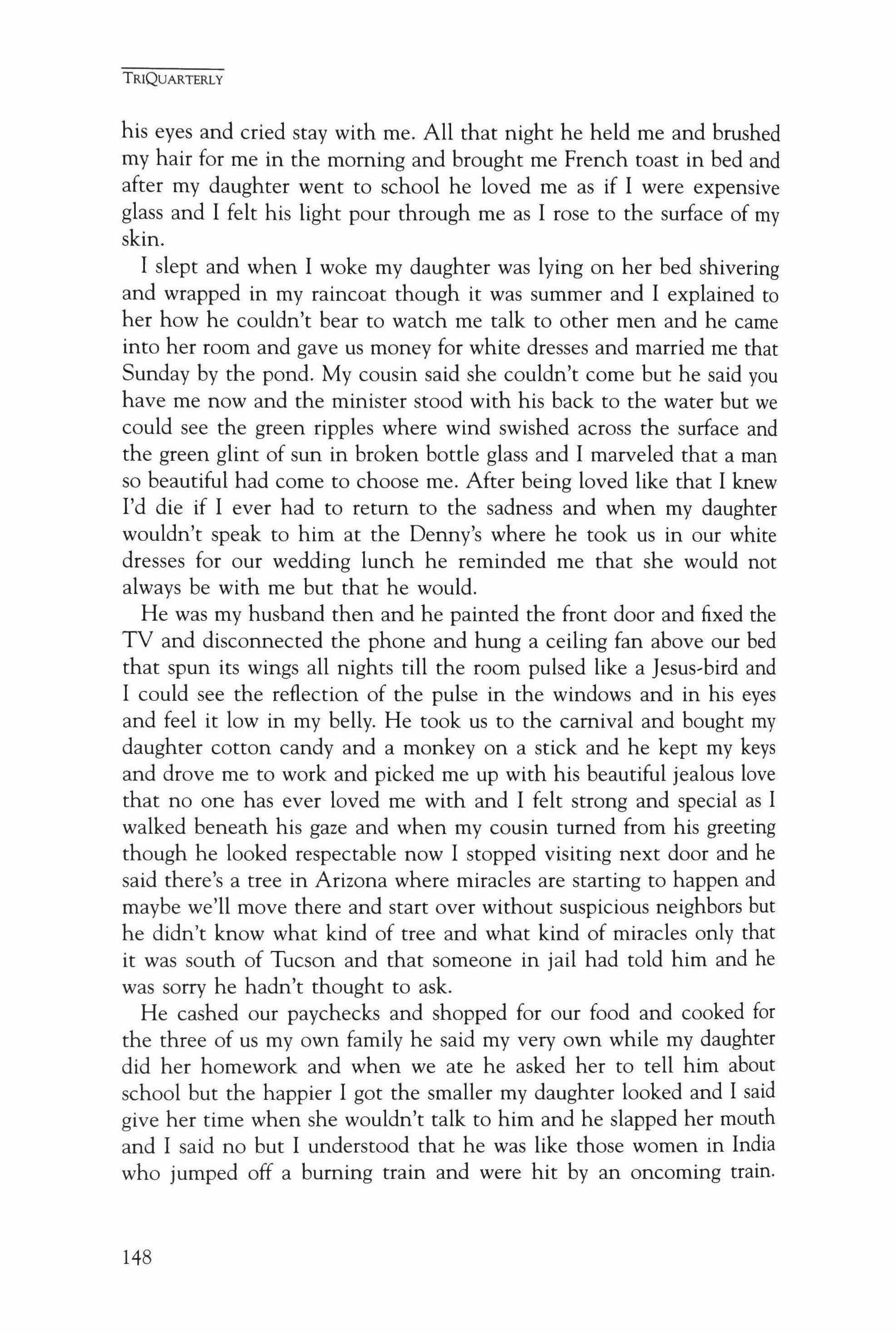
his eyes and cried stay with me. All that night he held me and brushed my hair for me in the morning and brought me French toast in bed and after my daughter went to school he loved me as if I were expensive glass and I felt his light pour through me as I rose to the surface of my skin.
I slept and when I woke my daughter was lying on her bed shivering and wrapped in my raincoat though it was summer and I explained to her how he couldn't bear to watch me talk to other men and he came into her room and gave us money for white dresses and married me that Sunday by the pond. My cousin said she couldn't come but he said you have me now and the minister stood with his back to the water but we could see the green ripples where wind swished across the surface and the green glint of sun in broken bottle glass and I marveled that a man so beautiful had come to choose me. After being loved like that I knew I'd die if I ever had to return to the sadness and when my daughter wouldn't speak to him at the Denny's where he took us in our white dresses for our wedding lunch he reminded me that she would not always be with me but that he would.
He was my husband then and he painted the front door and fixed the TV and disconnected the phone and hung a ceiling fan above our bed that spun its wings all nights till the room pulsed like a jesus-bird and I could see the reflection of the pulse in the windows and in his eyes and feel it low in my belly. He took us to the carnival and bought my daughter cotton candy and a monkey on a stick and he kept my keys and drove me to work and picked me up with his beautiful jealous love that no one has ever loved me with and I felt strong and special as I walked beneath his gaze and when my cousin turned from his greeting though he looked respectable now I stopped visiting next door and he said there's a tree in Arizona where miracles are starting to happen and maybe we'll move there and start over without suspicious neighbors but he didn't know what kind of tree and what kind of miracles only that it was south of Tucson and that someone in jail had told him and he was sorry he hadn't thought to ask.
He cashed our paychecks and shopped for our food and cooked for the three of us my own family he said my very own while my daughter did her homework and when we ate he asked her to tell him about school but the happier I got the smaller my daughter looked and I said give her time when she wouldn't talk to him and he slapped her mouth and I said no but I understood that he was like those women in India who jumped off a burning train and were hit by an oncoming train.

I read about them in the paper a long time ago but I think of them often and when I told him about them and I said that's just like you getting away from one misfortune only to fall right in the path of the next he said but it's different now because you've come along. I don't tell him that sometimes I'm grateful he had his hard-luck life that kept him away from the world even though it's unjust because it began when his fiancee cheated on him and he shook her wanting to hear the truth and then she was dead but it means he has come to me new and that I'm his only wife ever because if he hadn't been in jail all these years another woman would have found him long before me and married him.
And even now when I see the rage climb into his eyes it's never for long and most of the time I know how to ease him out of it by taking his hands and bringing them around my breasts and motioning my daughter out of the living room as I pull him into me because then his rage spins into light and fills me and makes me powerful and even when I can't harness his rage and it crushes both of us I always remind myself that he'll only love me so much more the next day. What I've come to recognize is that moment when the power can shift and when he'll either move into me or shatter me with his rage and it's that moment that has become the most exciting thing in my life because if I can tum that rage into light I own him and each time I own him adds to the sum of holding him.
And whenever he talks of leaving because he is afraid of hurting me worse I smile and pull him toward me and sometimes I forget my daughter is in the room because there's no air for anyone but me and him but then his hands are on me and I feel her shrinking away a silent shadow in my raincoat. Some nights she walks in her sleep and I find her on the sidewalk with her hamsters and I hold her and tilt her face to the night and show her how to watch for a shooting star so she can make her secret wish for a miracle of her own.
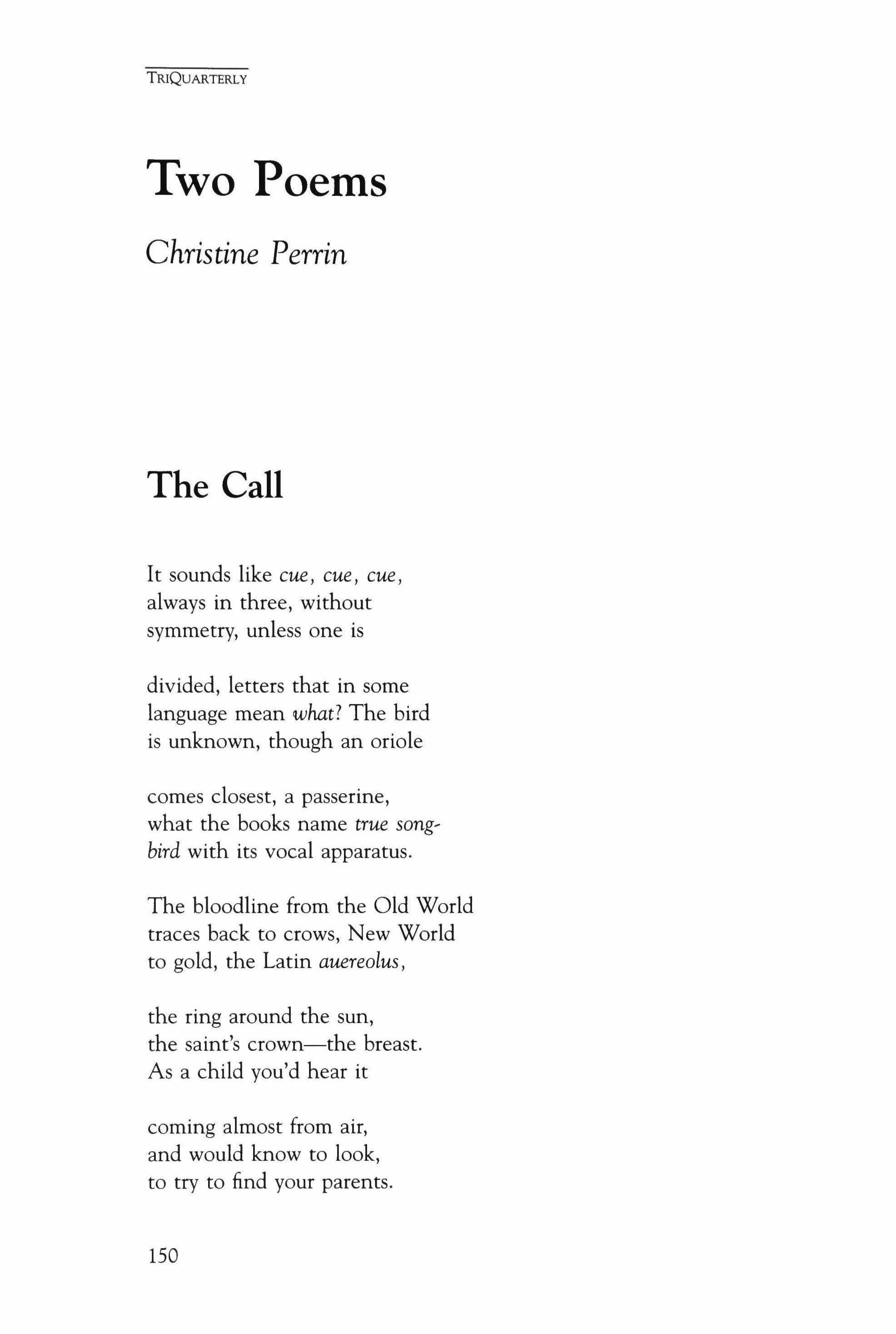
It sounds like cue, cue, cue, always in three, without symmetry, unless one is divided, letters that in some language mean what? The bird is unknown, though an oriole comes closest, a passerine, what the books name true songbird with its vocal apparatus.
The bloodline from the Old World traces back to crows, New World to gold, the Latin auereolus, the ring around the sun, the saint's crown-the breast. As a child you'd hear it coming almost from air, and would know to look, to try to find your parents.
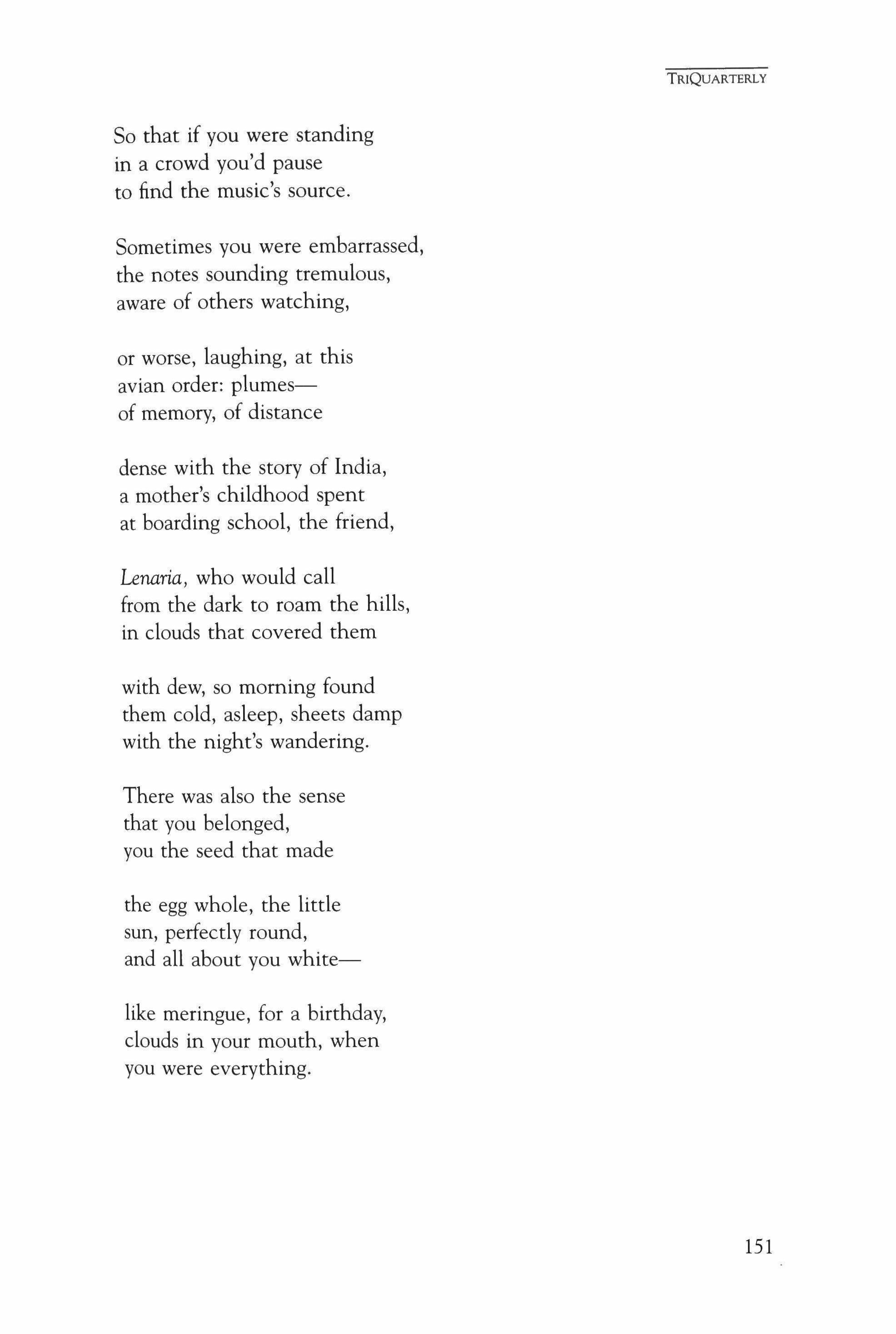
So that if you were standing in a crowd you'd pause to find the music's source.
Sometimes you were embarrassed, the notes sounding tremulous, aware of others watching, or worse, laughing, at this avian order: plumesof memory, of distance
dense with the story of India, a mother's childhood spent at boarding school, the friend,
Lenaria, who would call from the dark to roam the hills, in clouds that covered them with dew, so morning found them cold, asleep, sheets damp with the night's wandering.
There was also the sense that you belonged, you the seed that made the egg whole, the little sun, perfectly round, and all about you whitelike meringue, for a birthday, clouds in your mouth, when you were everything.

It's about balance I tell her, running alongside, steadying the tilt, as if instructions could help, neighbors calmly stepping out of the way of our careening, eyeing their delphinium, sweet william, evening coming on. For weeks, under the spring moon, she's fallen farther each time, thinks she should know this by now. When we bathe together she gathers the skin around her nipplesnipple-flowers. She's eight. There are those that bloom on water like stars. A morning glory grew out of the gravel
at the house that broke the china doll. From the roof, four stories high, it was barely there, the color of mist on the river, opening, closing so much the same,
bud-shaped at last. In utero, breast tissue forms at four weeks, little comets waiting inside the dark sleeper like the wooden dolls my grandmother brought back from Russia, each shut inside the other, giving way to smaller replicas. Beneath the bones that branch, a silhouette, a baby could climb, orchid-pelvis to sternum,
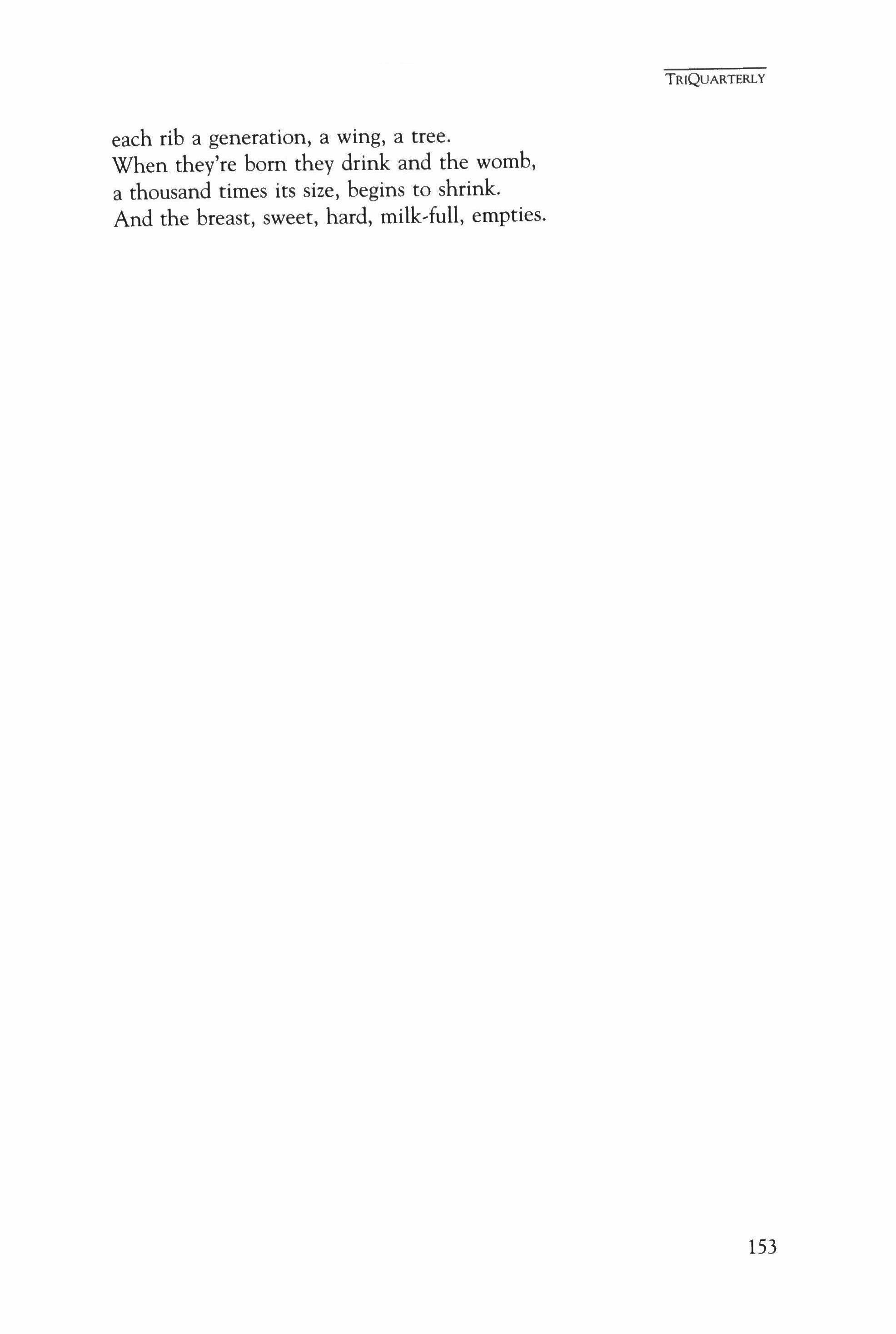
each rib a generation, a wing, a tree.
When they're born they drink and the womb, a thousand times its size, begins to shrink. And the breast, sweet, hard, milk-full, empties.
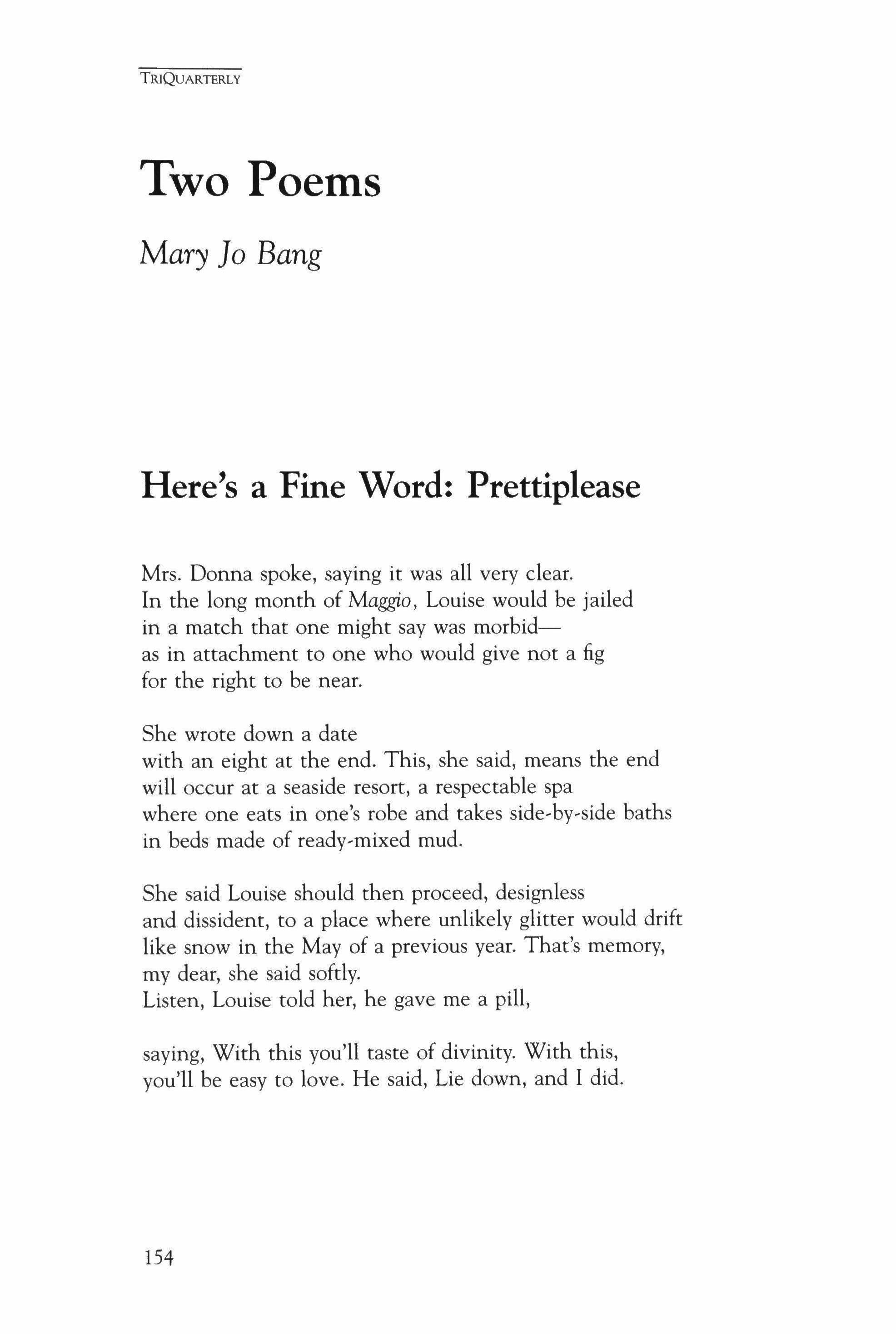
Mrs. Donna spoke, saying it was all very clear. In the long month of Maggio, Louise would be jailed in a match that one might say was morbidas in attachment to one who would give not a fig for the right to be near.
She wrote down a date with an eight at the end. This, she said, means the end will occur at a seaside resort, a respectable spa where one eats in one's robe and takes side-by-side baths in beds made of ready-mixed mud.
She said Louise should then proceed, designless and dissident, to a place where unlikely glitter would drift like snow in the May of a previous year. That's memory, my dear, she said softly. Listen, Louise told her, he gave me a pill, saying, With this you'll taste of divinity. With this, you'll be easy to love. He said, Lie down, and I did.

Seeded yeast in her beak and bending down mouth to his mouth. Kisses mismeant, reversal just lurking. Abrupt and walks off. An abyss sunders them. She with a love of the beautiful bordering on excessive frivolity. He with his science and thievish propensities. An unnatural bonhomie. He kissed her wing and folded it over faux fingers fretted feathers and false all false and falling.
Mouth to her ticking. Time stopped in a tea shop. My, doesn't this taste? The repertoire ending in a dance dress, black and sleek (Wouldn't Lydia like to see her now, all sisterenvy). In the morning, left to her lovedream, her rapt regard retrained
onto the window. Is someone rapping? No, the wet wind rain-veined and soaking the roses. Tomorrow tariffed but still the labyrinth door swings two ways every peril paired with it's opposite until.

"Tum back!" was all she snapped out as she passed in a red dress that caught sunrays through mist. I saw her lurch upwind, kick off spiked heels, climb out to the edge of a knife-sharp rockpile,
and, arms outstretched, lead the sea's timpani, lure the din, guiding the steamy waves to shore. Will the Almighty answer me? she sang out to the ocean's rising octaves,
as blown palms pointed scarflike fronds to land. Earlier that Sunday, she had prayed to a black Christ in a church on the island, droned verses for a safe calm, then trekked homeward
to board papery windows for the storm. She had declined the chapel's sanctuary to ask the ocean why the wind ripped homes and would again. Her anger captured me, and stayed when I saw rain gleam on red ginger, drench trumpets islanders call yellow,bells, and soak ixora. Bonelike bits of shells and conches lay on the beach as on an altar.
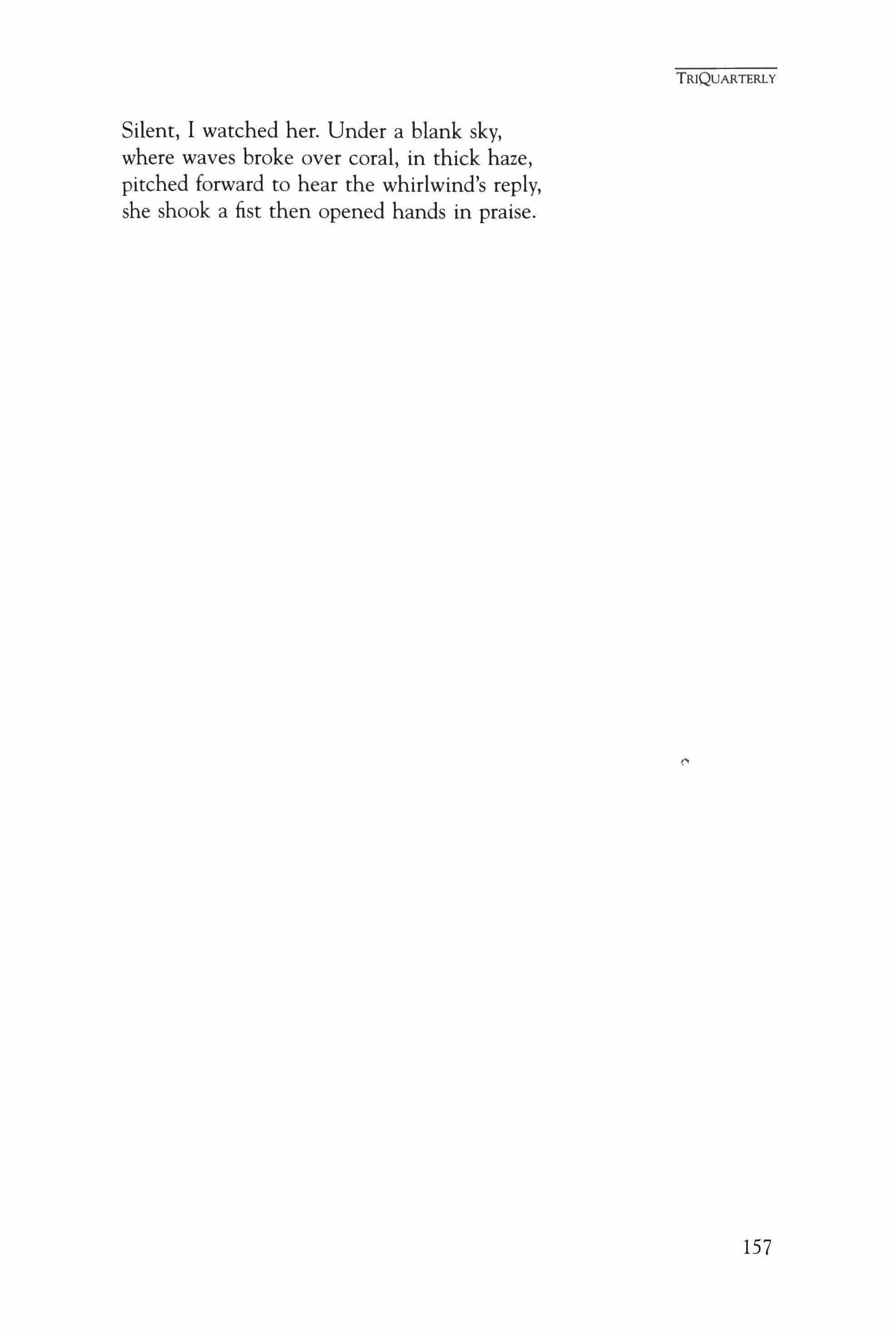
Silent, I watched her. Under a blank sky, where waves broke over coral, in thick haze, pitched forward to hear the whirlwind's reply, she shook a fist then opened hands in praise.
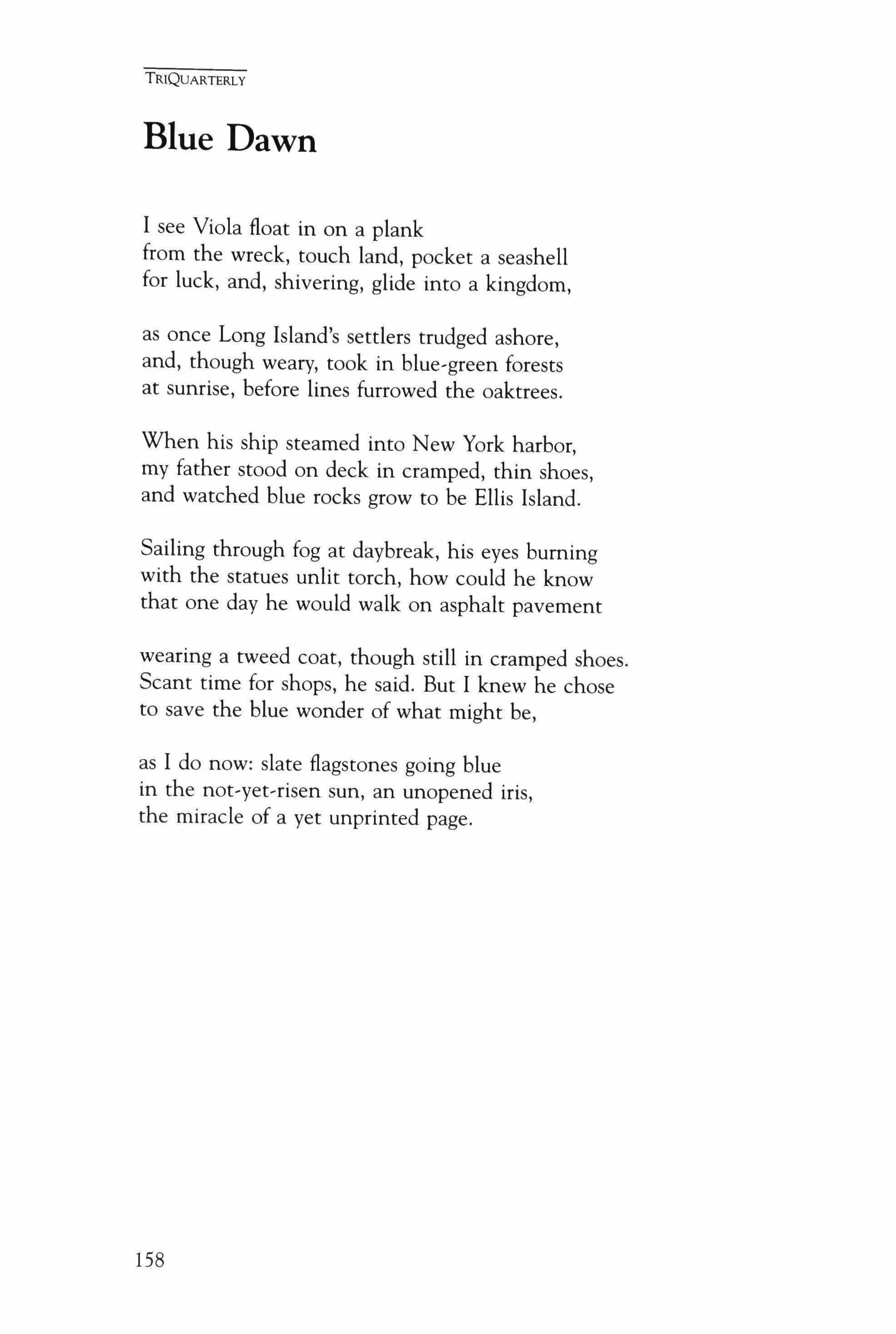
I see Viola float in on a plank from the wreck, touch land, pocket a seashell for luck, and, shivering, glide into a kingdom,
as once Long Island's settlers trudged ashore, and, though weary, took in blue-green forests at sunrise, before lines furrowed the oaktrees.
When his ship steamed into New York harbor, my father stood on deck in cramped, thin shoes, and watched blue rocks grow to be Ellis Island.
Sailing through fog at daybreak, his eyes burning with the statues unlit torch, how could he know that one day he would walk on asphalt pavement
wearing a tweed coat, though still in cramped shoes. Scant time for shops, he said. But I knew he chose to save the blue wonder of what might be,
as I do now: slate flagstones going blue in the not-yet-risen sun, an unopened iris, the miracle of a yet unprinted page.
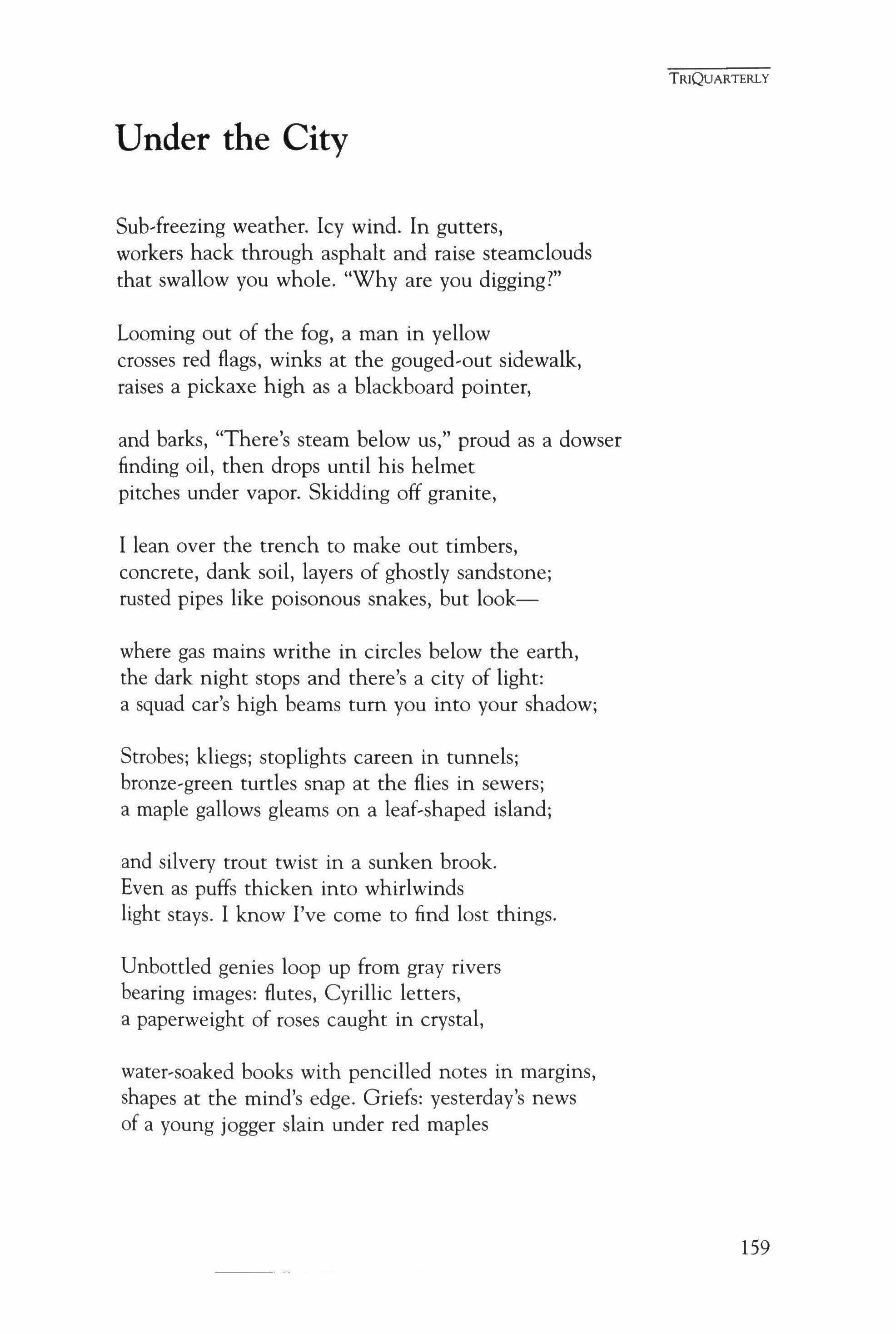
Sub-freezing weather. Icy wind. In gutters, workers hack through asphalt and raise steamclouds that swallow you whole. "Why are you digging?"
Looming out of the fog, a man in yellow crosses red flags, winks at the gouged-out sidewalk, raises a pickaxe high as a blackboard pointer, and barks, "There's steam below us," proud as a dowser finding oil, then drops until his helmet pitches under vapor. Skidding off granite, I lean over the trench to make out timbers, concrete, dank soil, layers of ghostly sandstone; rusted pipes like poisonous snakes, but lookwhere gas mains writhe in circles below the earth, the dark night stops and there's a city of light: a squad car's high beams tum you into your shadow;
Strobes; kliegs; stoplights careen in tunnels; bronze-green turtles snap at the flies in sewers; a maple gallows gleams on a leaf-shaped island; and silvery trout twist in a sunken brook. Even as puffs thicken into whirlwinds light stays. I know I've come to find lost things.
Unbottled genies loop up from gray rivers bearing images: flutes, Cyrillic letters, a paperweight of roses caught in crystal, water-soaked books with pencilled notes in margins, shapes at the mind's edge. Griefs: yesterday's news of a young jogger slain under red maples
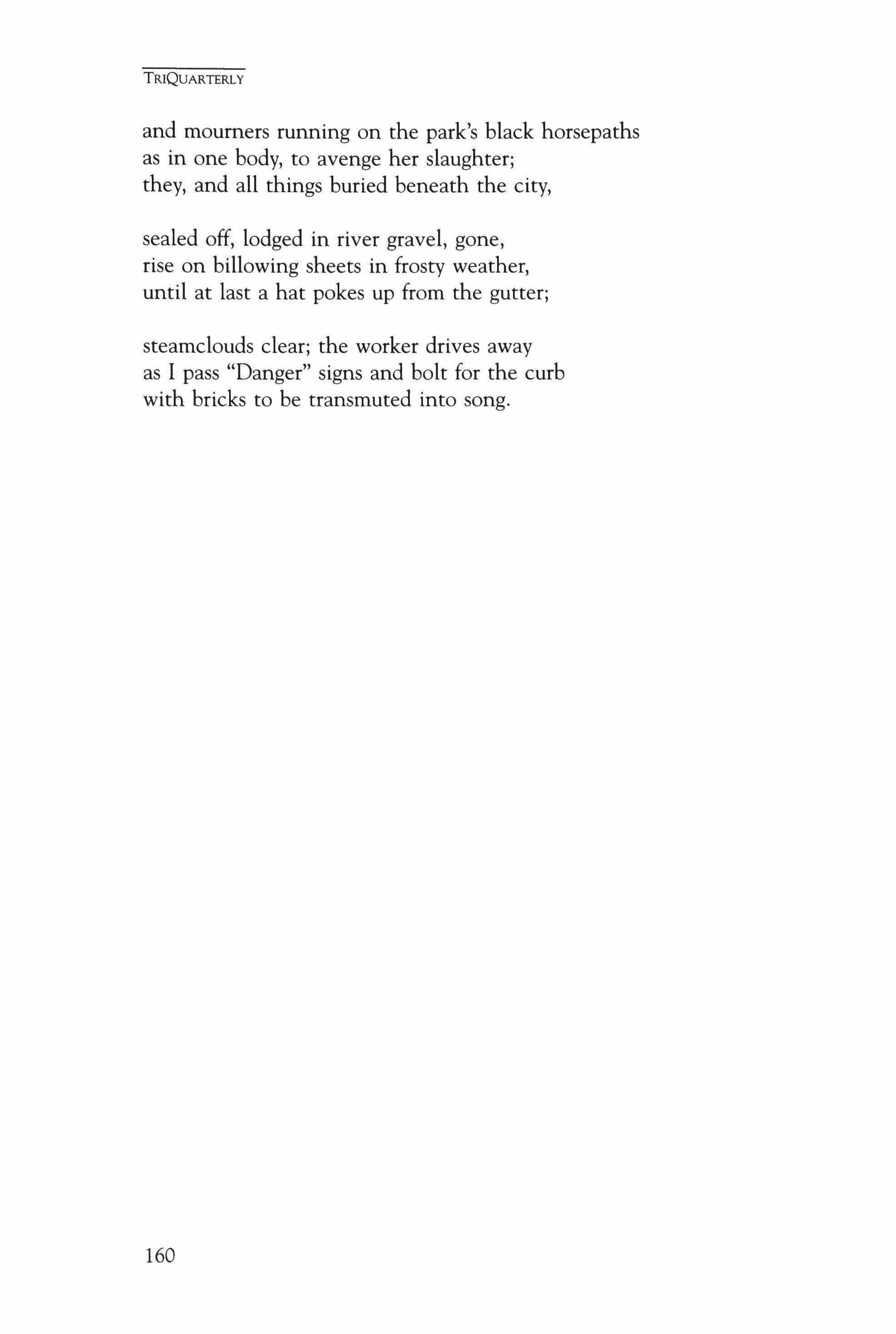
and mourners running on the park's black horsepaths as in one body, to avenge her slaughter; they, and all things buried beneath the city, sealed off, lodged in river gravel, gone, rise on billowing sheets in frosty weather, until at last a hat pokes up from the gutter; steamclouds clear; the worker drives away as I pass "Danger" signs and bolt for the curb with bricks to be transmuted into song.
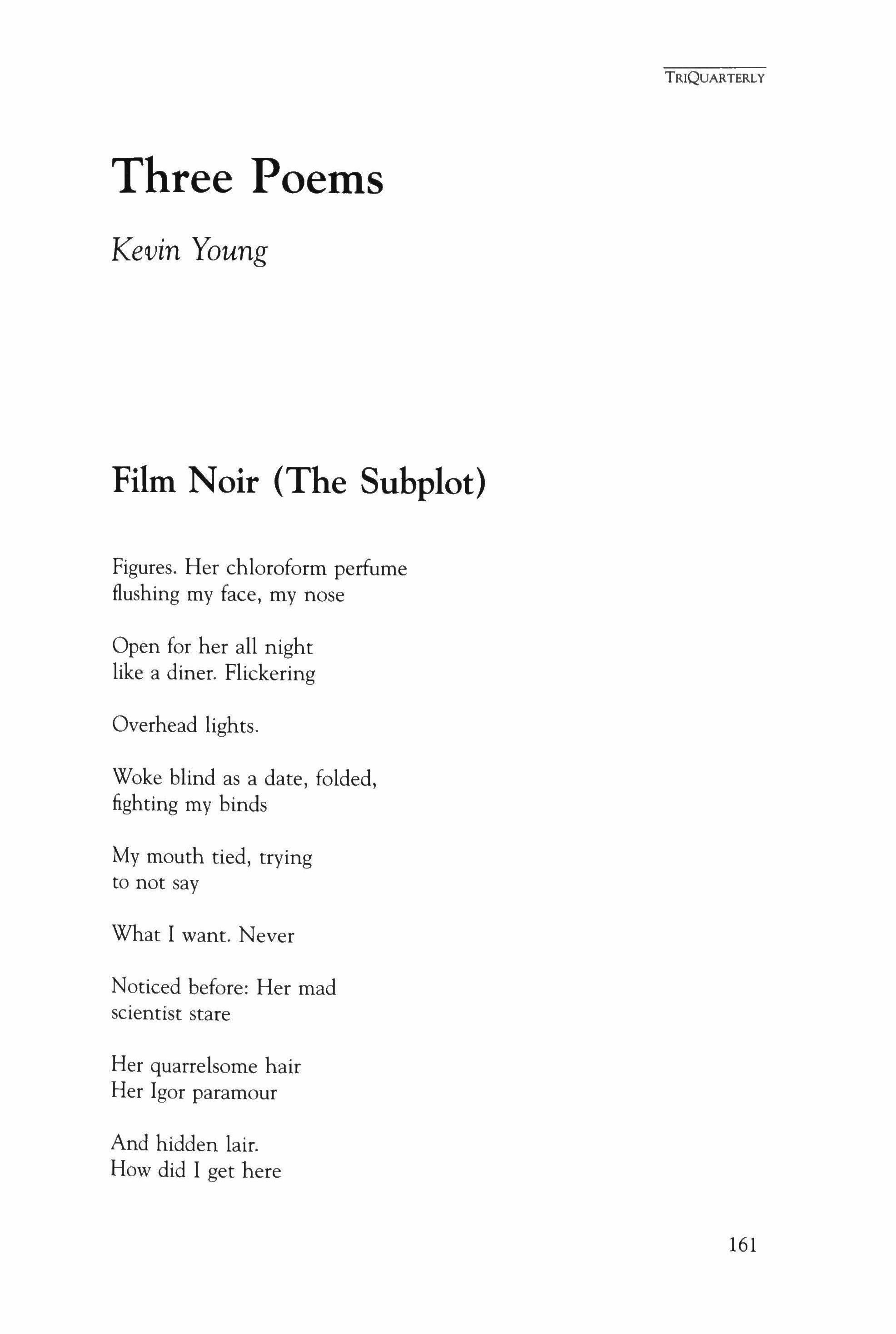
Figures. Her chloroform perfume flushing my face, my nose
Open for her all night like a diner. Flickering
Overhead lights.
Woke blind as a date, folded, fighting my binds
My mouth tied, trying to not say
What I want. Never
Noticed before: Her mad scientist stare
Her quarrelsome hair Her Igor paramour
And hidden lair. How did I get here
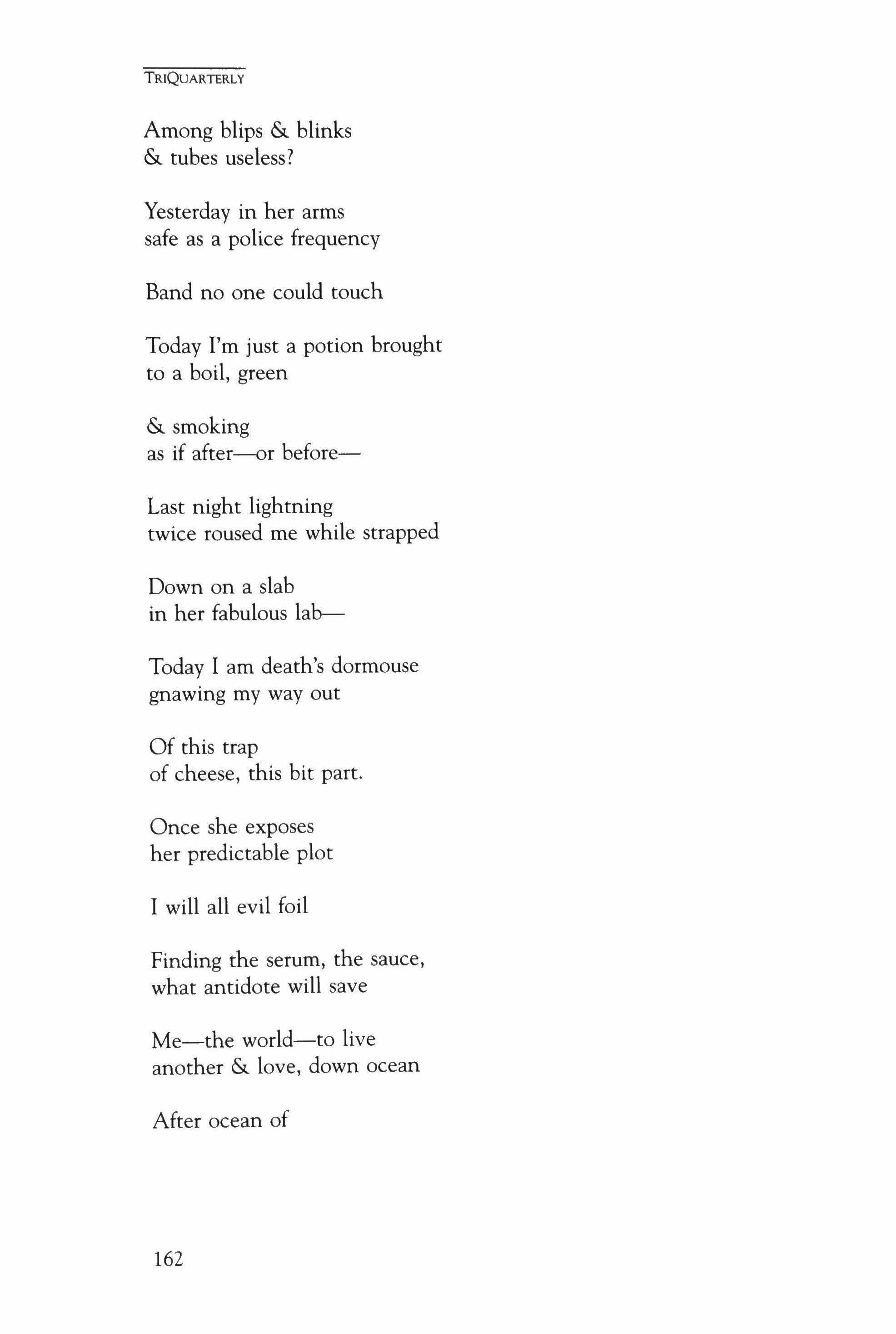
Among blips & blinks & tubes useless?
Yesterday in her arms safe as a police frequency
Band no one could touch
Today I'm just a potion brought to a boil, green & smoking as if after-or before-
Last night lightning twice roused me while strapped
Down on a slab in her fabulous lab-
Today I am death's dormouse gnawing my way out
Of this trap of cheese, this bit part.
Once she exposes her predictable plot
I will all evil foil
Finding the serum, the sauce, what antidote will save
Me-the world-to live another & love, down ocean
After ocean of

Your name is harm. The bar fills & empties eddies like a drink & is not the answer. Ain'tI'm all kinds of lost, watered, down. The shot glass like a microscope strong.
I should be a natn'l day of mourning one week minus mail. Entire month of Sunday-a sabbath swaying
mouthing hymnsWhere, pray
tell, went the words? Rider, you are a whole church-worth of hurt-
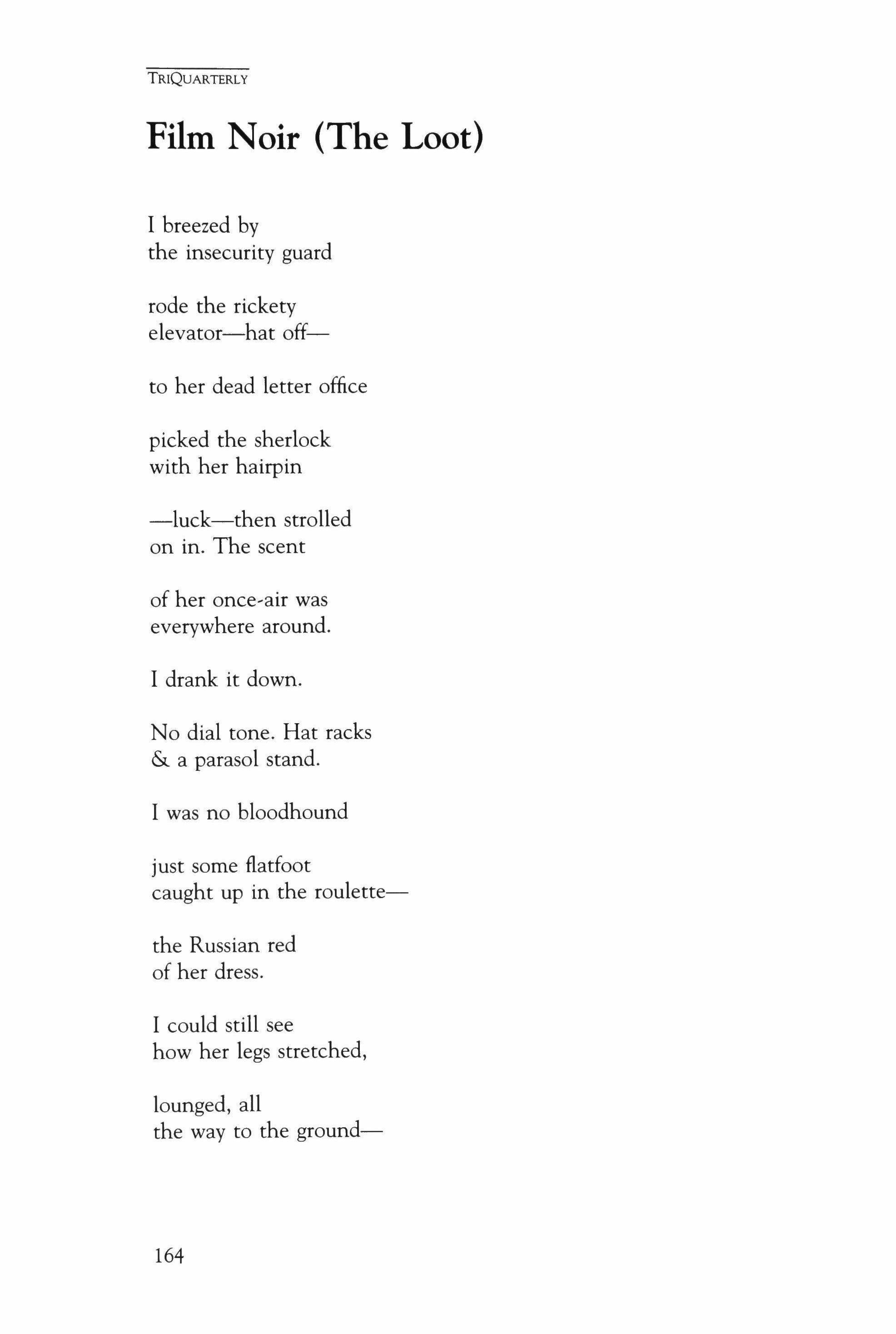
I breezed by the insecurity guard rode the rickety elevator-hat offto her dead letter office picked the sherlock with her hairpin -luck-then strolled on in. The scent of her once-air was everywhere around. I drank it down.
No dial tone. Hat racks & a parasol stand.
I was no bloodhound just some flatfoot caught up in the roulettethe Russian red of her dress.
I could still see how her legs stretched, lounged, all the way to the ground-

her fingernails forever filed like the cabinets
once kept in the corner, scrapes in the wood floor where any records of us were. Her jet fuel hair.
Preponderance evidence-the echoing room emptiness, her scented wristthat muchness I miss.
No one-not even my sloppy, nicknamed, overweight sidekickhad I trusted till she silhouetted my doorway, drawled her slender cigarette. Smoke rings & underthings. This morning I woke in the blackby noon my books were blank, figures red as sunset, as hersan hourglass all sand.
Unwound, my pocket watch stays half-past, or till,
TRIQUARTERLY
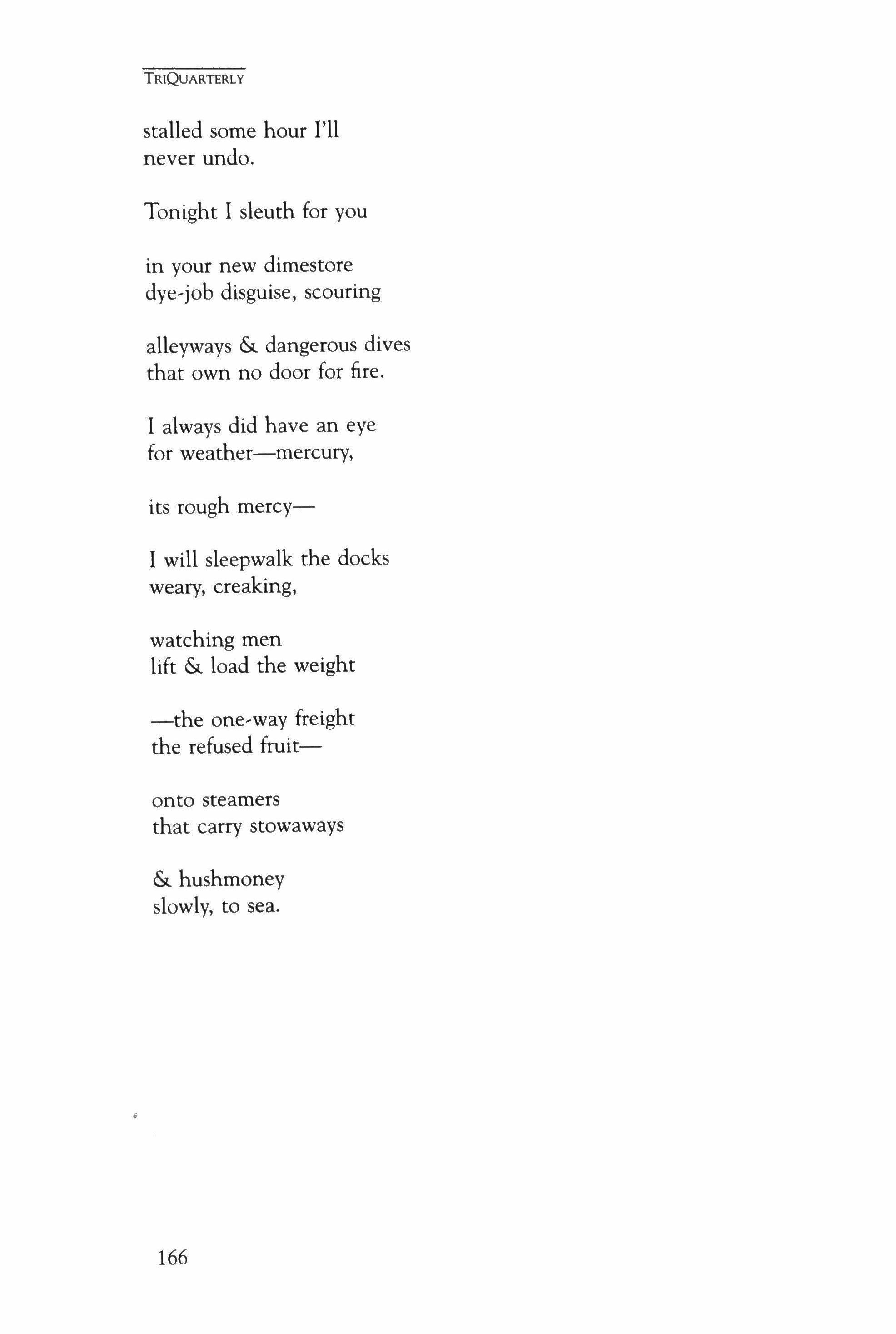
stalled some hour I'll never undo.
Tonight I sleuth for you in your new dimestore dye-job disguise, scouring alleyways & dangerous dives that own no door for fire.
I always did have an eye for weather-mercury, its rough mercy-
I will sleepwalk the docks weary, creaking, watching men lift & load the weight -the one-way freight the refused fruitonto steamers that carry stowaways & hushmoney slowly, to sea.
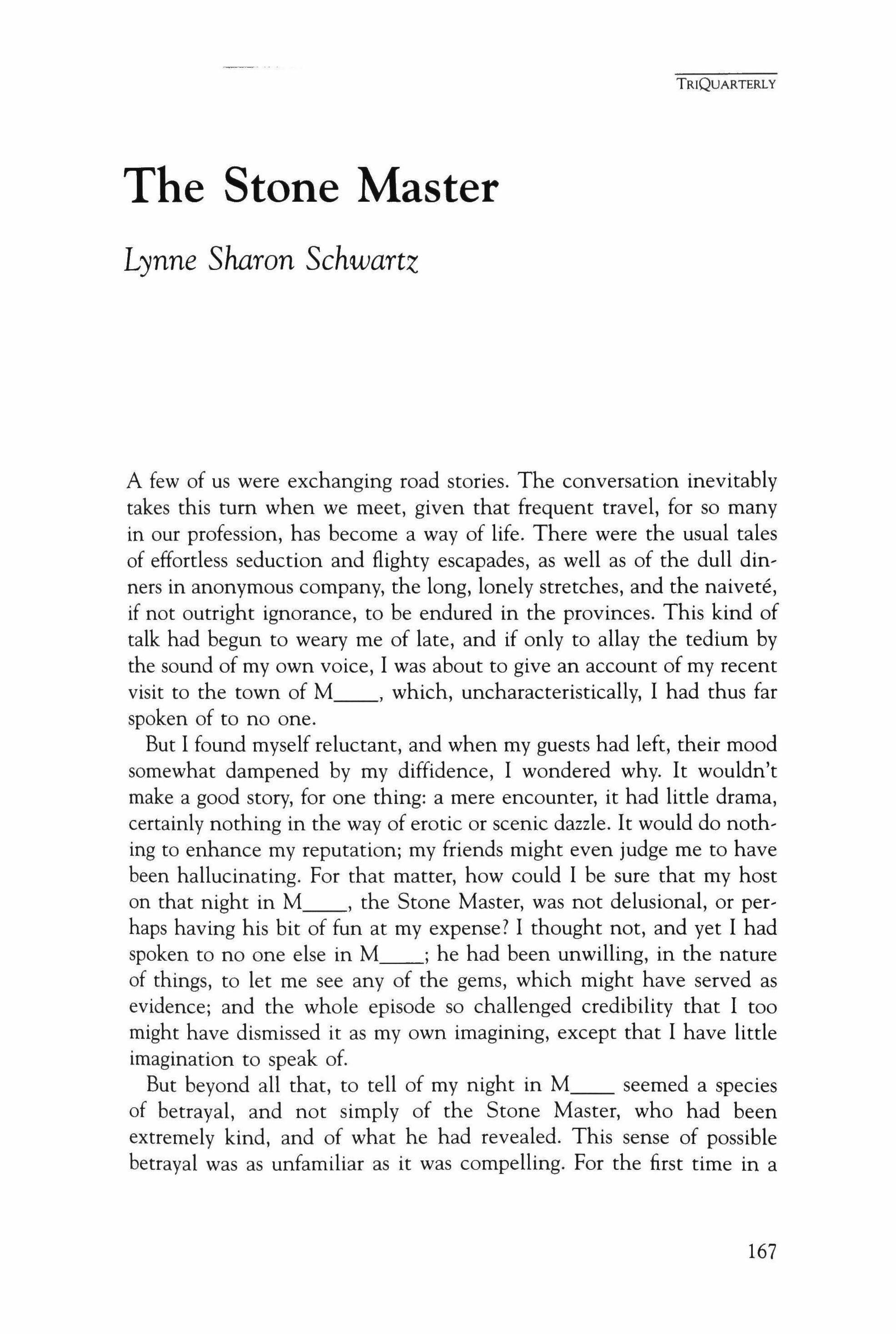
A few of us were exchanging road stories. The conversation inevitably takes this turn when we meet, given that frequent travel, for so many in our profession, has become a way of life. There were the usual tales of effortless seduction and flighty escapades, as well as of the dull din, ners in anonymous company, the long, lonely stretches, and the naivete, if not outright ignorance, to be endured in the provinces. This kind of talk had begun to weary me of late, and if only to allay the tedium by the sound of my own voice, I was about to give an account of my recent visit to the town of M which, uncharacteristically, I had thus far spoken of to no one.
But I found myself reluctant, and when my guests had left, their mood somewhat dampened by my diffidence, I wondered why. It wouldn't make a good story, for one thing: a mere encounter, it had little drama, certainly nothing in the way of erotic or scenic dazzle. It would do nothing to enhance my reputation; my friends might even judge me to have been hallucinating. For that matter, how could I be sure that my host on that night in M , the Stone Master, was not delusional, or per' haps having his bit of fun at my expense? I thought not, and yet I had spoken to no one else in M ; he had been unwilling, in the nature of things, to let me see any of the gems, which might have served as evidence; and the whole episode so challenged credibility that I too might have dismissed it as my own imagining, except that I have little imagination to speak of.
But beyond all that, to tell of my night in M seemed a species of betrayal, and not simply of the Stone Master, who had been extremely kind, and of what he had revealed. This sense of possible betrayal was as unfamiliar as it was compelling. For the first time in a
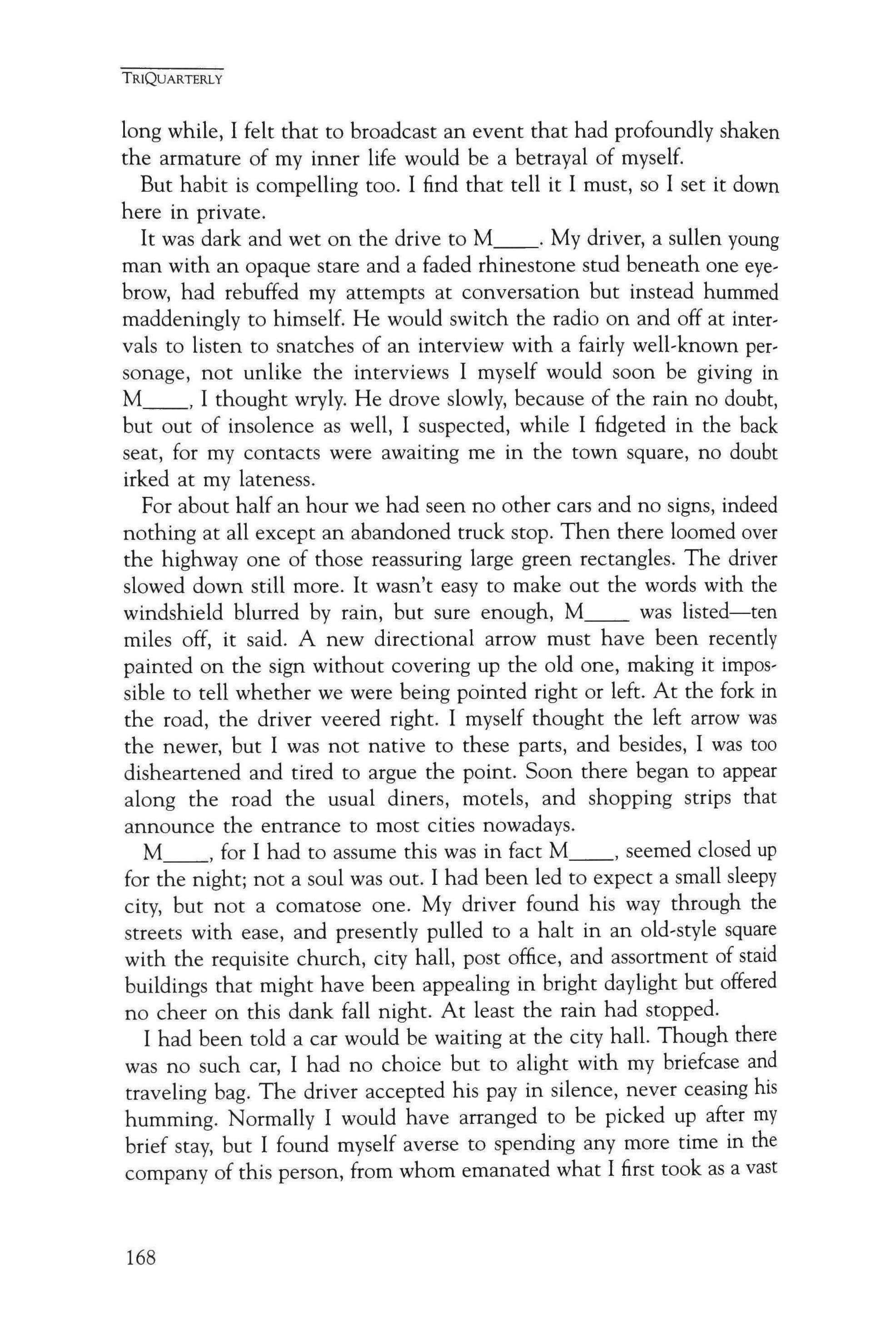
long while, I felt that to broadcast an event that had profoundly shaken the armature of my inner life would be a betrayal of myself.
But habit is compelling too. I find that tell it I must, so I set it down here in private.
It was dark and wet on the drive to M My driver, a sullen young man with an opaque stare and a faded rhinestone stud beneath one eyebrow, had rebuffed my attempts at conversation but instead hummed maddeningly to himself. He would switch the radio on and off at intervals to listen to snatches of an interview with a fairly well-known personage, not unlike the interviews I myself would soon be giving in M I thought wryly. He drove slowly, because of the rain no doubt, but out of insolence as well, I suspected, while I fidgeted in the back seat, for my contacts were awaiting me in the town square, no doubt irked at my lateness.
For about half an hour we had seen no other cars and no signs, indeed nothing at all except an abandoned truck stop. Then there loomed over the highway one of those reassuring large green rectangles. The driver slowed down still more. It wasn't easy to make out the words with the windshield blurred by rain, but sure enough, M was listed-ten miles off, it said. A new directional arrow must have been recently painted on the sign without covering up the old one, making it impossible to tell whether we were being pointed right or left. At the fork in the road, the driver veered right. I myself thought the left arrow was the newer, but I was not native to these parts, and besides, I was too disheartened and tired to argue the point. Soon there began to appear along the road the usual diners, motels, and shopping strips that announce the entrance to most cities nowadays.
M for I had to assume this was in fact M seemed closed up for the night; not a soul was out. I had been led to expect a small sleepy city, but not a comatose one. My driver found his way through the streets with ease, and presently pulled to a halt in an old-style square with the requisite church, city hall, post office, and assortment of staid buildings that might have been appealing in bright daylight but offered no cheer on this dank fall night. At least the rain had stopped.
I had been told a car would be waiting at the city hall. Though there was no such car, I had no choice but to alight with my briefcase and traveling bag. The driver accepted his pay in silence, never ceasing his humming. Normally I would have arranged to be picked up after my brief stay, but I found myself averse to spending any more time in the company of this person, from whom emanated what I first took as a vast
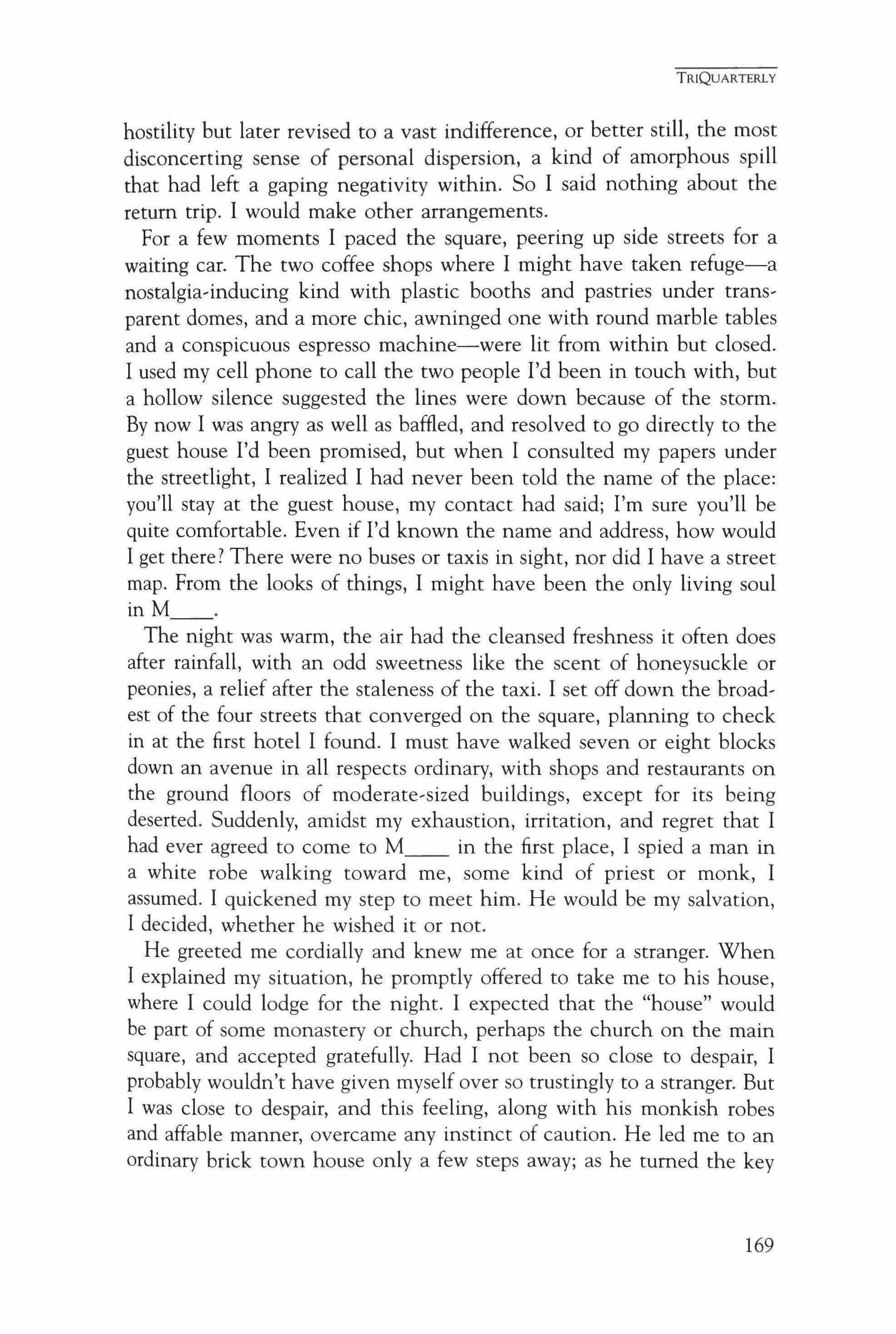
hostility but later revised to a vast indifference, or better still, the most disconcerting sense of personal dispersion, a kind of amorphous spill that had left a gaping negativity within. So I said nothing about the return trip. I would make other arrangements.
For a few moments I paced the square, peering up side streets for a waiting car. The two coffee shops where I might have taken refuge-a nostalgia,inducing kind with plastic booths and pastries under trans, parent domes, and a more chic, awninged one with round marble tables and a conspicuous espresso machine-were lit from within but closed. I used my cell phone to call the two people I'd been in touch with, but a hollow silence suggested the lines were down because of the storm. By now I was angry as well as baffled, and resolved to go directly to the guest house I'd been promised, but when I consulted my papers under the streetlight, I realized I had never been told the name of the place: you'll stay at the guest house, my contact had said; I'm sure you'll be quite comfortable. Even if I'd known the name and address, how would I get there? There were no buses or taxis in sight, nor did I have a street map. From the looks of things, I might have been the only living soul in M
The night was warm, the air had the cleansed freshness it often does after rainfall, with an odd sweetness like the scent of honeysuckle or peonies, a relief after the staleness of the taxi. I set off down the broad, est of the four streets that converged on the square, planning to check in at the first hotel I found. I must have walked seven or eight blocks down an avenue in all respects ordinary, with shops and restaurants on the ground floors of moderate-sized buildings, except for its being deserted. Suddenly, amidst my exhaustion, irritation, and regret that I had ever agreed to come to M in the first place, I spied a man in a white robe walking toward me, some kind of priest or monk, I assumed. I quickened my step to meet him. He would be my salvation, I decided, whether he wished it or not.
He greeted me cordially and knew me at once for a stranger. When I explained my situation, he promptly offered to take me to his house, where I could lodge for the night. I expected that the "house" would be part of some monastery or church, perhaps the church on the main square, and accepted gratefully. Had I not been so close to despair, I probably wouldn't have given myself over so trustingly to a stranger. But I was close to despair, and this feeling, along with his monkish robes and affable manner, overcame any instinct of caution. He led me to an ordinary brick town house only a few steps away; as he turned the key
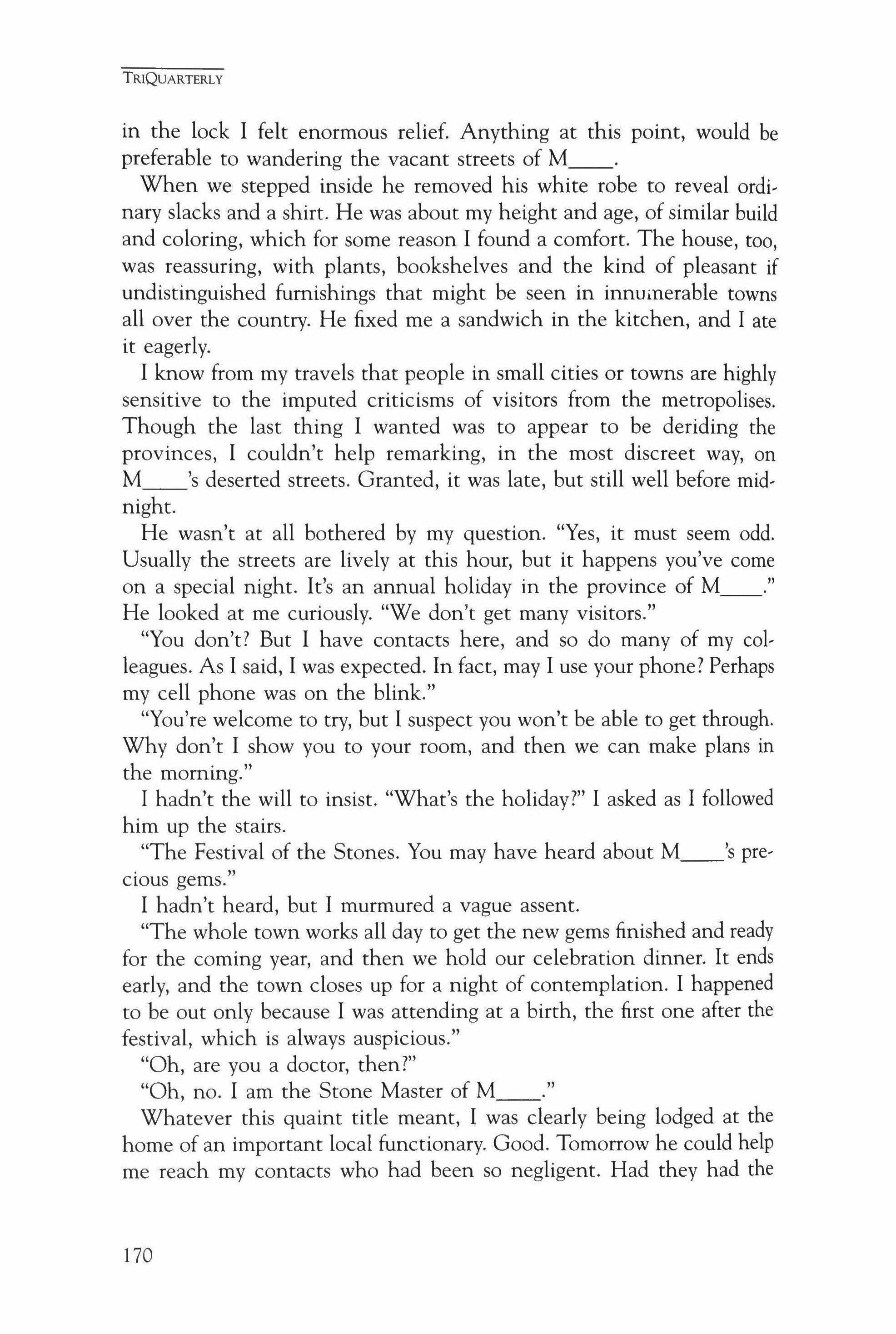
in the lock I felt enormous relief. Anything at this point, would be preferable to wandering the vacant streets of M
When we stepped inside he removed his white robe to reveal ordinary slacks and a shirt. He was about my height and age, of similar build and coloring, which for some reason I found a comfort. The house, too, was reassuring, with plants, bookshelves and the kind of pleasant if undistinguished furnishings that might be seen in innumerable towns all over the country. He fixed me a sandwich in the kitchen, and I ate it eagerly.
I know from my travels that people in small cities or towns are highly sensitive to the imputed criticisms of visitors from the metropolises. Though the last thing I wanted was to appear to be deriding the provinces, I couldn't help remarking, in the most discreet way, on M 's deserted streets. Granted, it was late, but still well before midnight.
He wasn't at all bothered by my question. "Yes, it must seem odd. Usually the streets are lively at this hour, but it happens you've come on a special night. It's an annual holiday in the province of M ." He looked at me curiously. "We don't get many visitors."
"You don't? But I have contacts here, and so do many of my colleagues. As I said, I was expected. In fact, may I use your phone? Perhaps my cell phone was on the blink."
"You're welcome to try, but I suspect you won't be able to get through. Why don't I show you to your room, and then we can make plans in the morning."
I hadn't the will to insist. "What's the holiday?" I asked as I followed him up the stairs.
"The Festival of the Stones. You may have heard about M 's precious gems."
I hadn't heard, but I murmured a vague assent.
"The whole town works all day to get the new gems finished and ready for the coming year, and then we hold our celebration dinner. It ends early, and the town closes up for a night of contemplation. I happened to be out only because I was attending at a birth, the first one after the festival, which is always auspicious."
"Oh, are you a doctor, then?"
"Oh, no. I am the Stone Master of M ."
Whatever this quaint title meant, I was clearly being lodged at the home of an important local functionary. Good. Tomorrow he could help me reach my contacts who had been so negligent. Had they had the

courtesy to let me know it was their holiday, I could easily have come a day later. But I put all that aside for now. The guest room at the top of the stairs was a welcome sight, with its large four-poster bed; all I wanted was to fall into it and forget the travails of the past few hours. I slept well and went downstairs to the aroma of coffee brewing. From the front windows, I saw cars going by, as well as the occasional pedestrian: so there was ordinary life in M after all. Not that I didn't trust my host the Stone Master-there was something benignly monkish about him even without his white robe-but I couldn't quite shake the eeriness of last night's taxi ride and lonely walk down the dark, glistening streets. Now a few phone calls to rearrange my scheduled appearances, and all would be well.
My host was in the kitchen preparing breakfast. Not wishing to appear in haste to leave, after his kindness, I was ready to chat for a while before turning to my affairs. As a matter of fact I wasn't in haste to leave: the house and the Stone Master exuded a serenity and self-possession, a gathered solidity and denseness that were seductive and of which I felt badly in need, especially after the taxi driver's nervous fragmentation, which, though I hadn't realized it at the time, had had an alarmingly contagious effect.
"Tell me something about these gems," I said, sitting opposite him at the table. "Do you have any around that I might look at?"
He smiled as if I were a guileless child asking the unthinkable. "I'm afraid I couldn't do that. They're not for casual display. Or they shouldn't be, at any rate."
"Didn't you say M was known for its precious gems?"
"For our traditional use of the gems. Not for showing them."
"Ah. I assumed you did a brisk business."
"No. They're not for sale. We sell our products and labor, not ourselves."
I was unprepared for this sort of enigma. Moreover, what were the gems, if not the products of labor? "What do you do with them, if you don't sell them? Wear them?" I had a ludicrous vision of crowds of glittering people studded from head to foot with precious stones, parading through the streets. How different from the bleak scene that had greeted me! What a spectacle I might have missed, arriving on the wrong night.
"I'd gladly tell you, but are you sure you'd rather not be off on your business?"
"My business can wait-if you don't mind, that is. You've made me curious."
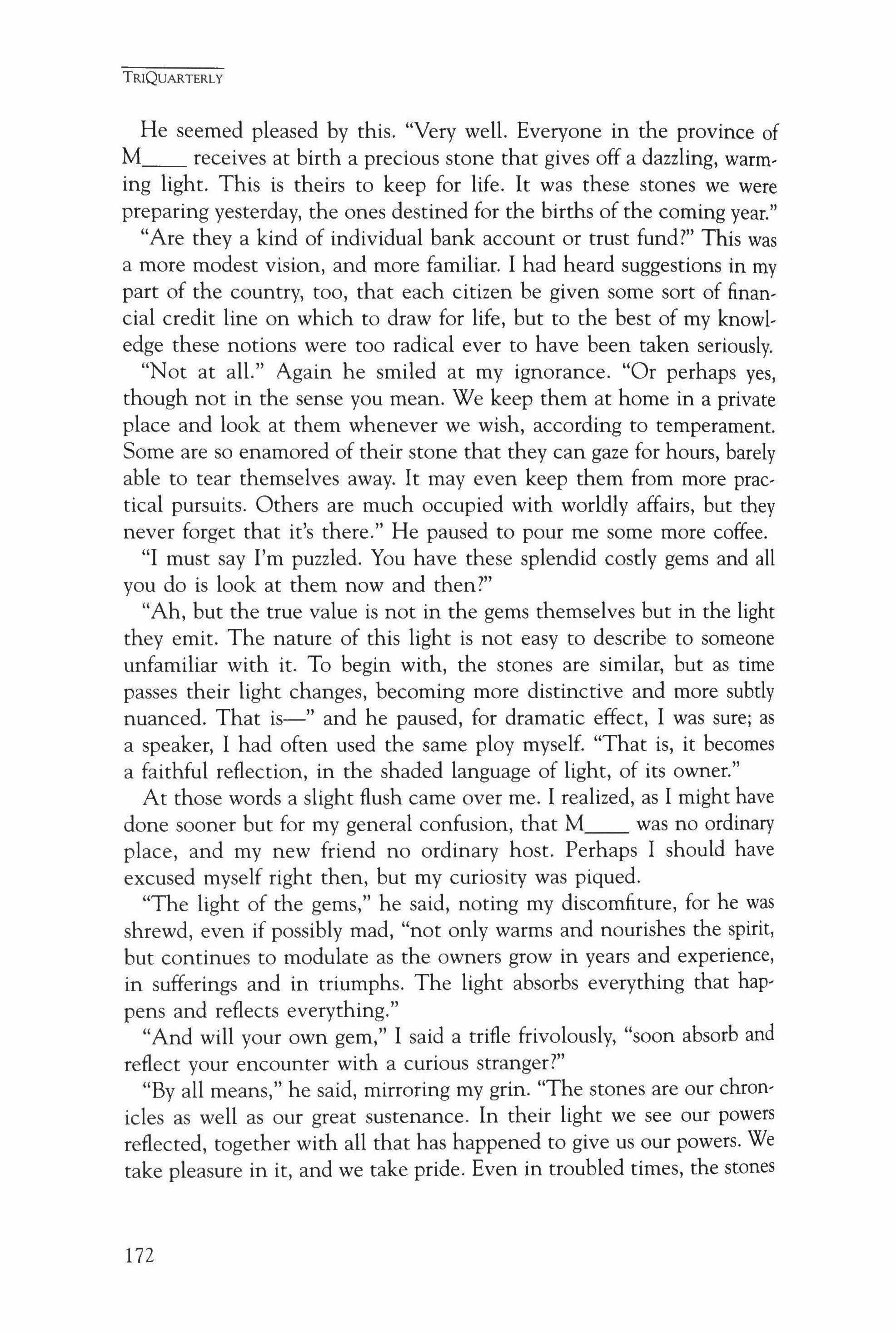
He seemed pleased by this. "Very well. Everyone in the province of M receives at birth a precious stone that gives off a dazzling, warming light. This is theirs to keep for life. It was these stones we were preparing yesterday, the ones destined for the births of the coming year."
"Are they a kind of individual bank account or trust fund?" This was a more modest vision, and more familiar. I had heard suggestions in my part of the country, too, that each citizen be given some sort of financial credit line on which to draw for life, but to the best of my knowledge these notions were too radical ever to have been taken seriously.
"Not at all." Again he smiled at my ignorance. "Or perhaps yes, though not in the sense you mean. We keep them at home in a private place and look at them whenever we wish, according to temperament. Some are so enamored of their stone that they can gaze for hours, barely able to tear themselves away. It may even keep them from more practical pursuits. Others are much occupied with worldly affairs, but they never forget that it's there." He paused to pour me some more coffee.
"I must say I'm puzzled. You have these splendid costly gems and all you do is look at them now and then?"
"Ah, but the true value is not in the gems themselves but in the light they emit. The nature of this light is not easy to describe to someone unfamiliar with it. To begin with, the stones are similar, but as time passes their light changes, becoming more distinctive and more subtly nuanced. That is-" and he paused, for dramatic effect, I was sure; as a speaker, I had often used the same ploy myself. "That is, it becomes a faithful reflection, in the shaded language of light, of its owner."
At those words a slight flush came over me. I realized, as I might have done sooner but for my general confusion, that M was no ordinary place, and my new friend no ordinary host. Perhaps I should have excused myself right then, but my curiosity was piqued.
"The light of the gems," he said, noting my discomfiture, for he was shrewd, even if possibly mad, "not only warms and nourishes the spirit, but continues to modulate as the owners grow in years and experience, in sufferings and in triumphs. The light absorbs everything that happens and reflects everything."
"And will your own gem," I said a trifle frivolously, "soon absorb and reflect your encounter with a curious stranger?"
"By all means," he said, mirroring my grin. "The stones are our chronicles as well as our great sustenance. In their light we see our powers reflected, together with all that has happened to give us our powers. We take pleasure in it, and we take pride. Even in troubled times, the stones
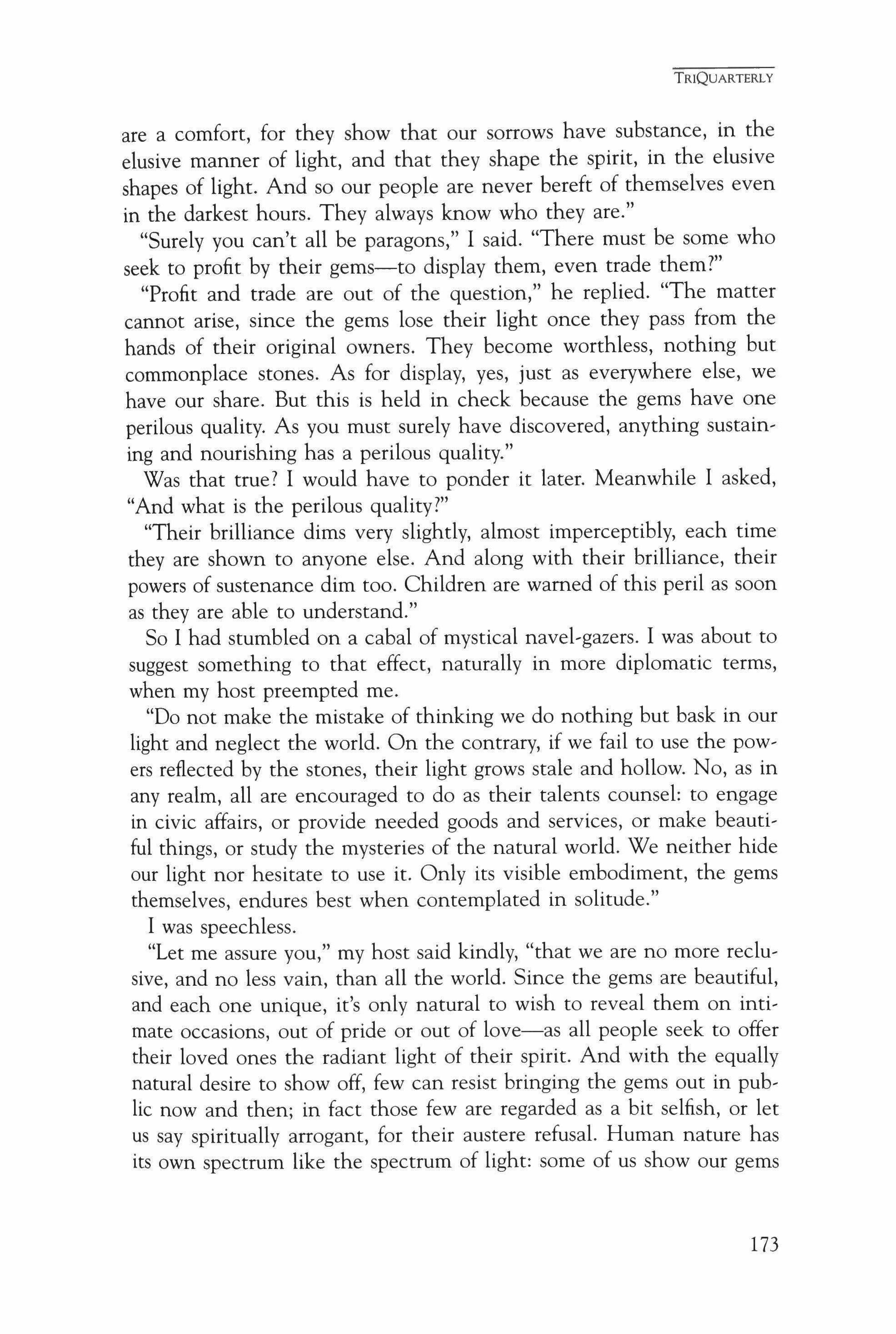
are a comfort, for they show that our sorrows have substance, in the elusive manner of light, and that they shape the spirit, in the elusive shapes of light. And so our people are never bereft of themselves even in the darkest hours. They always know who they are."
"Surely you can't all be paragons," I said. "There must be some who seek to profit by their gems-to display them, even trade them?"
"Profit and trade are out of the question," he replied. "The matter cannot arise, since the gems lose their light once they pass from the hands of their original owners. They become worthless, nothing but commonplace stones. As for display, yes, just as everywhere else, we have our share. But this is held in check because the gems have one perilous quality. As you must surely have discovered, anything sustaining and nourishing has a perilous quality."
Was that true? I would have to ponder it later. Meanwhile I asked, "And what is the perilous quality?"
"Their brilliance dims very slightly, almost imperceptibly, each time they are shown to anyone else. And along with their brilliance, their powers of sustenance dim too. Children are warned of this peril as soon as they are able to understand."
So I had stumbled on a cabal of mystical navel-gazers. I was about to suggest something to that effect, naturally in more diplomatic terms, when my host preempted me.
"Do not make the mistake of thinking we do nothing but bask in our light and neglect the world. On the contrary, if we fail to use the powers reflected by the stones, their light grows stale and hollow. No, as in any realm, all are encouraged to do as their talents counsel: to engage in civic affairs, or provide needed goods and services, or make beautiful things, or study the mysteries of the natural world. We neither hide our light nor hesitate to use it. Only its visible embodiment, the gems themselves, endures best when contemplated in solitude."
I was speechless.
"Let me assure you," my host said kindly, "that we are no more reclusive, and no less vain, than all the world. Since the gems are beautiful, and each one unique, it's only natural to wish to reveal them on intimate occasions, out of pride or out of love-as all people seek to offer their loved ones the radiant light of their spirit. And with the equally natural desire to show off, few can resist bringing the gems out in public now and then; in fact those few are regarded as a bit selfish, or let us say spiritually arrogant, for their austere refusal. Human nature has its own spectrum like the spectrum of light: some of us show our gems
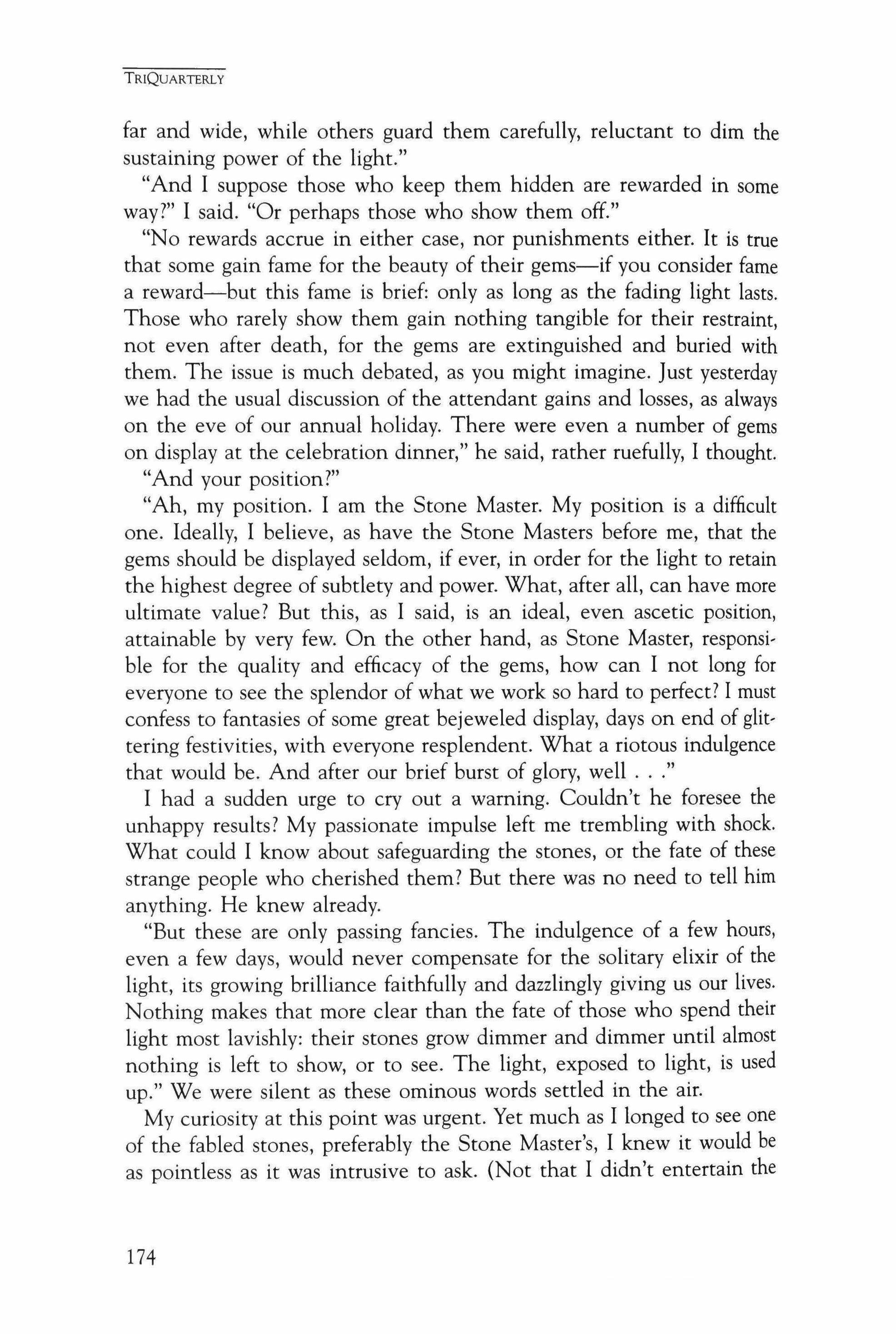
far and wide, while others guard them carefully, reluctant to dim the sustaining power of the light."
"And I suppose those who keep them hidden are rewarded in some way?" I said. "Or perhaps those who show them off."
"No rewards accrue in either case, nor punishments either. It is true that some gain fame for the beauty of their gems-if you consider fame a reward-but this fame is brief: only as long as the fading light lasts. Those who rarely show them gain nothing tangible for their restraint, not even after death, for the gems are extinguished and buried with them. The issue is much debated, as you might imagine. Just yesterday we had the usual discussion of the attendant gains and losses, as always on the eve of our annual holiday. There were even a number of gems on display at the celebration dinner," he said, rather ruefully, I thought.
"And your position?"
"Ah, my position. I am the Stone Master. My position is a difficult one. Ideally, I believe, as have the Stone Masters before me, that the gems should be displayed seldom, if ever, in order for the light to retain the highest degree of subtlety and power. What, after all, can have more ultimate value? But this, as I said, is an ideal, even ascetic position, attainable by very few. On the other hand, as Stone Master, responsible for the quality and efficacy of the gems, how can I not long for everyone to see the splendor of what we work so hard to perfect? I must confess to fantasies of some great bejeweled display, days on end of glittering festivities, with everyone resplendent. What a riotous indulgence that would be. And after our brief burst of glory, well "
I had a sudden urge to cry out a warning. Couldn't he foresee the unhappy results? My passionate impulse left me trembling with shock. What could I know about safeguarding the stones, or the fate of these strange people who cherished them? But there was no need to tell him anything. He knew already.
"But these are only passing fancies. The indulgence of a few hours, even a few days, would never compensate for the solitary elixir of the light, its growing brilliance faithfully and dazzlingly giving us our lives. Nothing makes that more clear than the fate of those who spend their light most lavishly: their stones grow dimmer and dimmer until almost nothing is left to show, or to see. The light, exposed to light, is used up." We were silent as these ominous words settled in the air.
My curiosity at this point was urgent. Yet much as I longed to see one of the fabled stones, preferably the Stone Master's, I knew it would be as pointless as it was intrusive to ask. (Not that I didn't entertain the
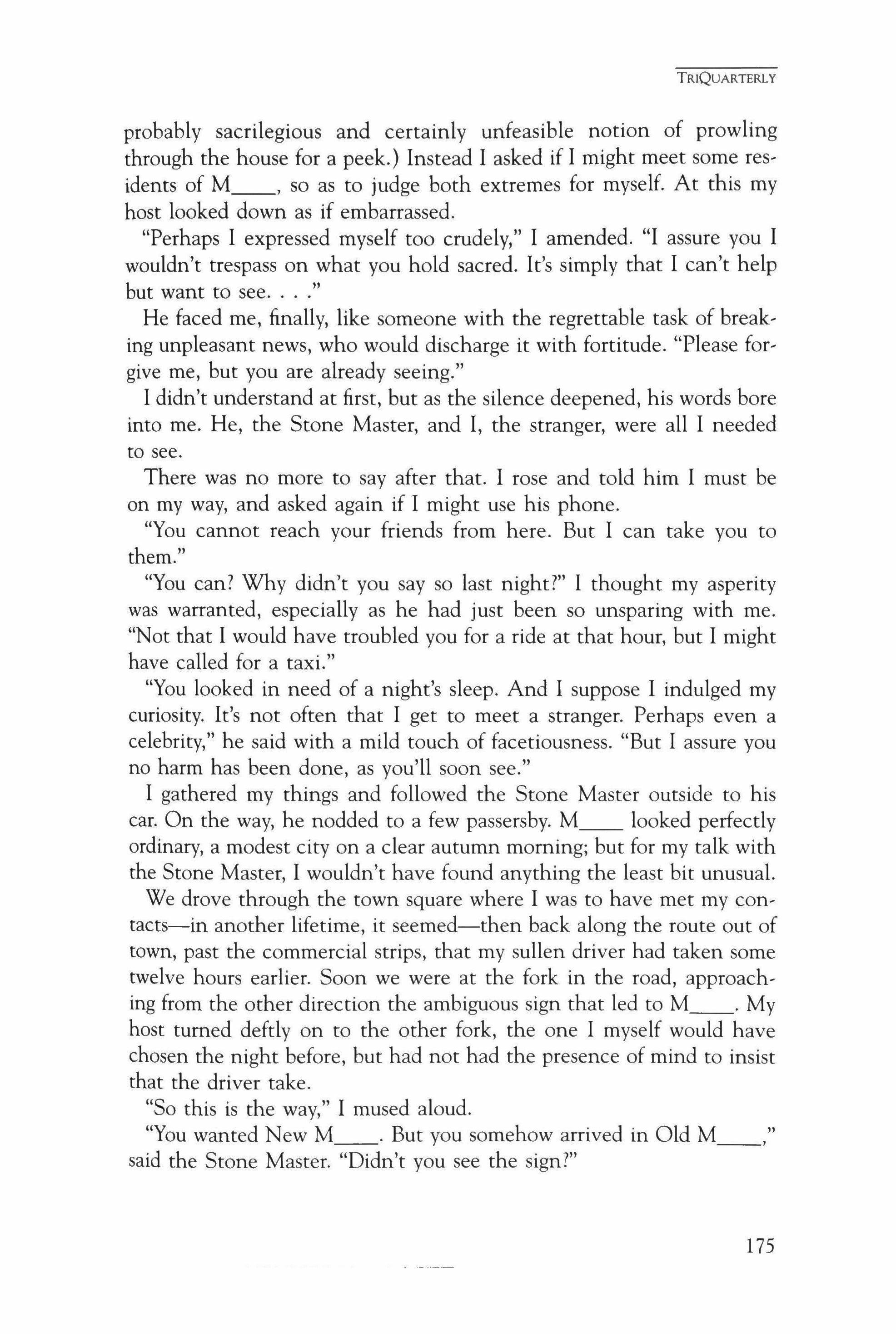
probably sacrilegious and certainly unfeasible notion of prowling through the house for a peek.) Instead I asked if I might meet some res, idents of M so as to judge both extremes for myself. At this my host looked down as if embarrassed.
"Perhaps I expressed myself too crudely," I amended. "I assure you I wouldn't trespass on what you hold sacred. It's simply that I can't help but want to see
He faced me, finally, like someone with the regrettable task of break, ing unpleasant news, who would discharge it with fortitude. "Please for' give me, but you are already seeing."
I didn't understand at first, but as the silence deepened, his words bore into me. He, the Stone Master, and I, the stranger, were all I needed to see.
There was no more to say after that. I rose and told him I must be on my way, and asked again if I might use his phone.
"You cannot reach your friends from here. But I can take you to them."
"You can? Why didn't you say so last night?" I thought my asperity was warranted, especially as he had just been so unsparing with me. "Not that I would have troubled you for a ride at that hour, but I might have called for a taxi."
"You looked in need of a night's sleep. And I suppose I indulged my curiosity. It's not often that I get to meet a stranger. Perhaps even a celebrity," he said with a mild touch of facetiousness. "But I assure you no harm has been done, as you'll soon see."
I gathered my things and followed the Stone Master outside to his car. On the way, he nodded to a few passersby. M looked perfectly ordinary, a modest city on a clear autumn morning; but for my talk with the Stone Master, I wouldn't have found anything the least bit unusual.
We drove through the town square where I was to have met my con, tacts-in another lifetime, it seemed-then back along the route out of town, past the commercial strips, that my sullen driver had taken some twelve hours earlier. Soon we were at the fork in the road, approach, ing from the other direction the ambiguous sign that led to M My host turned deftly on to the other fork, the one I myself would have chosen the night before, but had not had the presence of mind to insist that the driver take.
"So this is the way," I mused aloud.
"You wanted New M But you somehow arrived in Old M ," said the Stone Master. "Didn't you see the sign?"
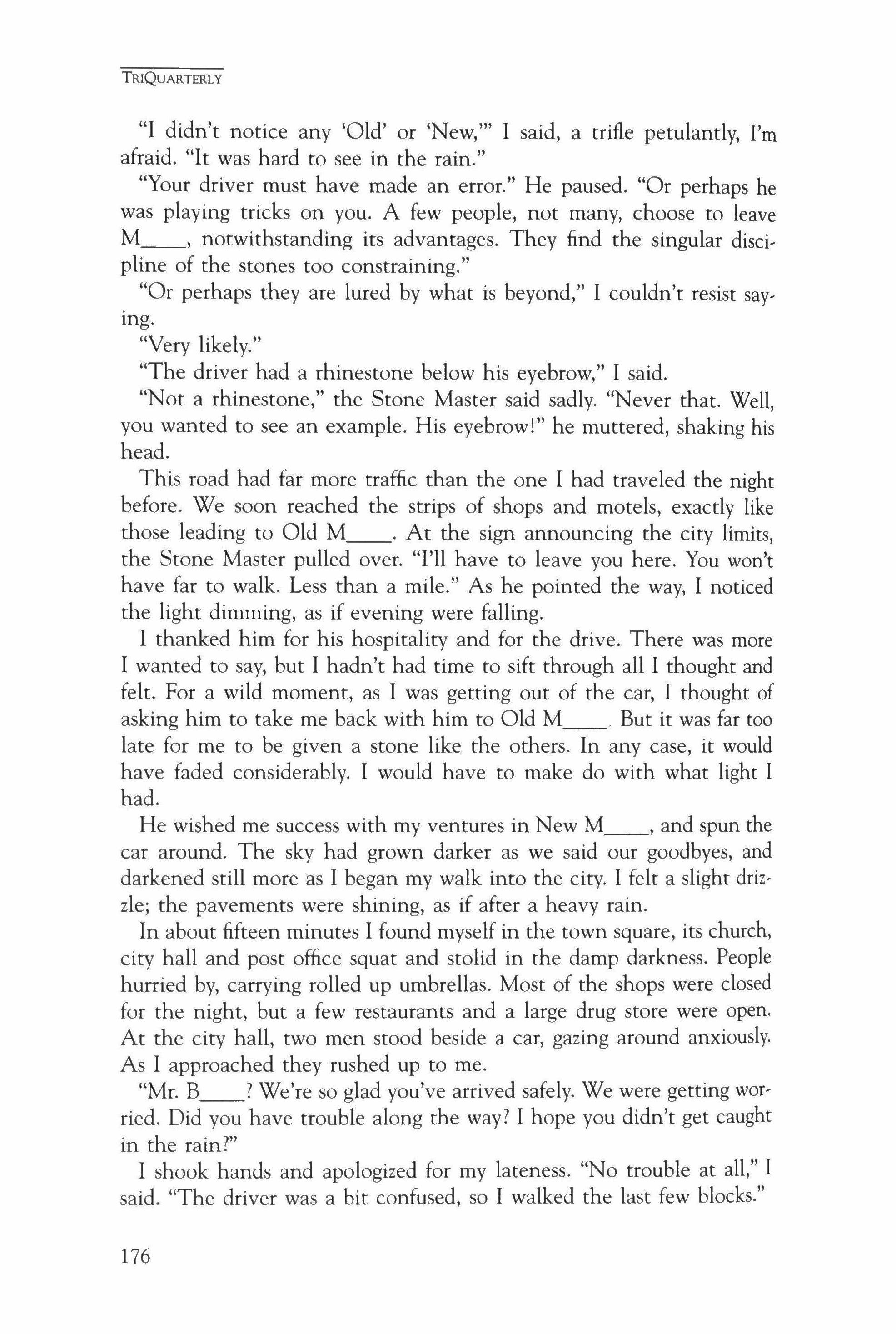
"I didn't notice any 'Old' or 'New,'" I said, a trifle petulantly, I'm afraid. "It was hard to see in the rain."
"Your driver must have made an error." He paused. "Or perhaps he was playing tricks on you. A few people, not many, choose to leave M notwithstanding its advantages. They find the singular discipline of the stones too constraining."
"Or perhaps they are lured by what is beyond," I couldn't resist saying.
"Very likely."
"The driver had a rhinestone below his eyebrow," I said.
"Not a rhinestone," the Stone Master said sadly. "Never that. Well, you wanted to see an example. His eyebrow!" he muttered, shaking his head.
This road had far more traffic than the one I had traveled the night before. We soon reached the strips of shops and motels, exactly like those leading to Old M At the sign announcing the city limits, the Stone Master pulled over. "I'll have to leave you here. You won't have far to walk. Less than a mile." As he pointed the way, I noticed the light dimming, as if evening were falling.
I thanked him for his hospitality and for the drive. There was more I wanted to say, but I hadn't had time to sift through all I thought and felt. For a wild moment, as I was getting out of the car, I thought of asking him to take me back with him to Old M But it was far too late for me to be given a stone like the others. In any case, it would have faded considerably. I would have to make do with what light I had.
He wished me success with my ventures in New M and spun the car around. The sky had grown darker as we said our goodbyes, and darkened still more as I began my walk into the city. I felt a slight drizzle; the pavements were shining, as if after a heavy rain.
In about fifteen minutes I found myself in the town square, its church, city hall and post office squat and stolid in the damp darkness. People hurried by, carrying rolled up umbrellas. Most of the shops were closed for the night, but a few restaurants and a large drug store were open. At the city hall, two men stood beside a car, gazing around anxiously. As I approached they rushed up to me.
"Mr. B ? We're so glad you've arrived safely. We were getting worried. Did you have trouble along the way? I hope you didn't get caught in the rain?"
I shook hands and apologized for my lateness. "No trouble at all," I said. "The driver was a bit confused, so I walked the last few blocks."

"We'll take you right along to the guest house," the other one said. "I'm sure you're tired out from your trip. Unless you'd like to stop for a bite to eat?" He gestured at the two coffee shops, the old-fashioned one with the plastic booths and the more stylish one with the gleaming espresso machine: both open and lively with customers.
My contacts appeared somewhat tense. Behind their genuine eagerness to please, I could see they had been worried lest I not show up (this has been known to happen with similar guests, though I myself have rarely defected), irritated at having had to wait, and were now anxiously scrutinizing me in the hope that I would live up to my reputation and thus reflect well on them for having invited me-all natural enough under the circumstances, all very familiar. It made me long for the calm impromptu reception of the Stone Master of Old M
I declined the offer of refreshment and climbed into the back seat of the car, where we exchanged remarks I had exchanged with dozens of strangers, dozens of times, in this situation-a combination of weather, flattery, name-dropping, and briefings on my scheduled appearances. Besides the allegedly eager audiences awaiting my presence, there would be several media interviews. I took careful note of all they said, as I had done many times on similar trips.
On a street that resembled the Stone Master's, we pulled up at the guest house, a squarish brick building with no special charm, but I knew from experience that it would be comfortable enough. I declined their offer of help with my bags; I carried no heavy suitcase full of samples, only a razor and a change of clothes. I was the product of my own labor, and I was here for the sale.
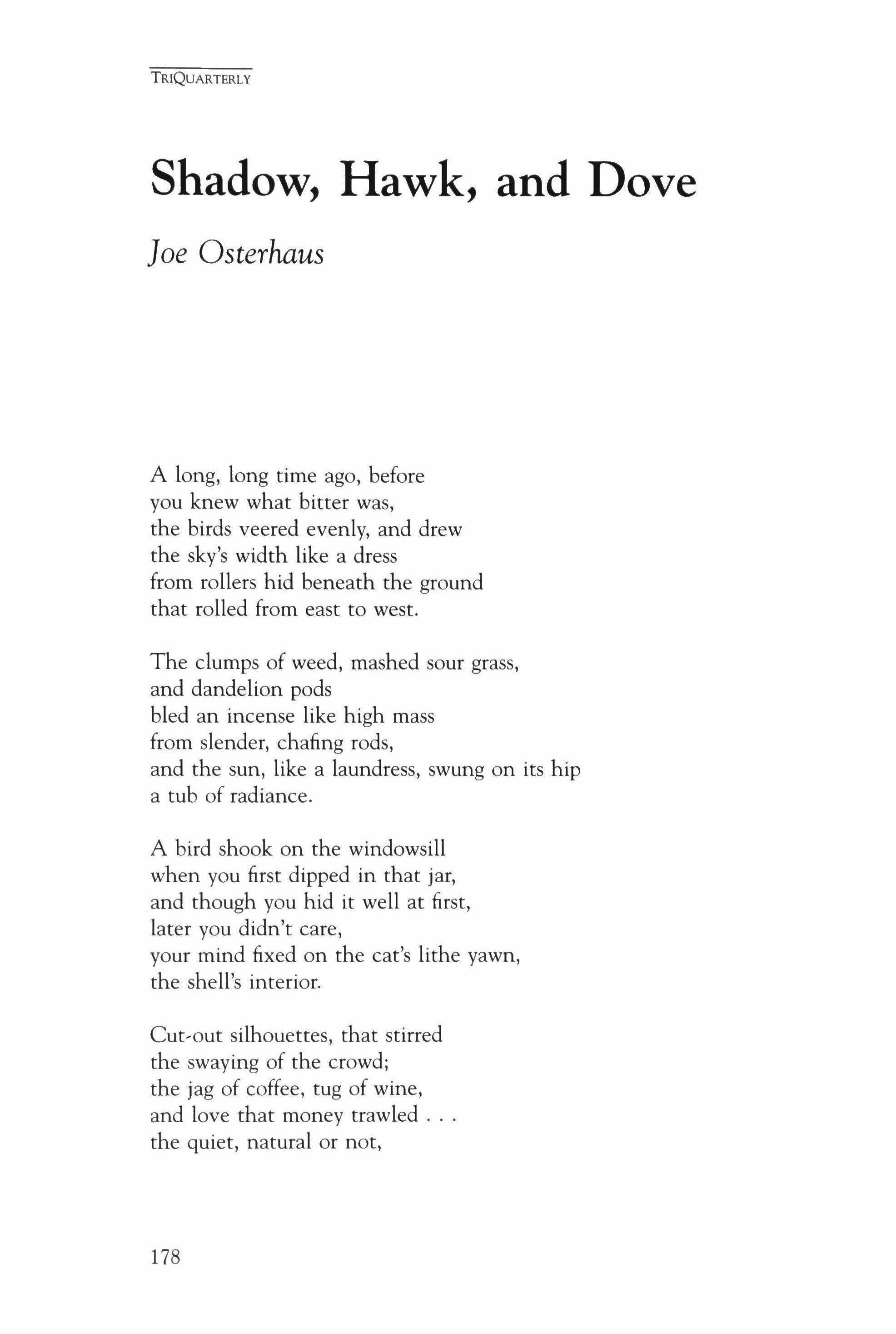
A long, long time ago, before you knew what bitter was, the birds veered evenly, and drew the sky's width like a dress from rollers hid beneath the ground that rolled from east to west.
The clumps of weed, mashed sour grass, and dandelion pods bled an incense like high mass from slender, chafing rods, and the sun, like a laundress, swung on its hip a tub of radiance.
A bird shook on the windowsill when you first dipped in that jar, and though you hid it well at first, later you didn't care, your mind fixed on the eat's lithe yawn, the shell's interior.
Cut-out silhouettes, that stirred the swaying of the crowd; the jag of coffee, tug of wine, and love that money trawled the quiet, natural or not,
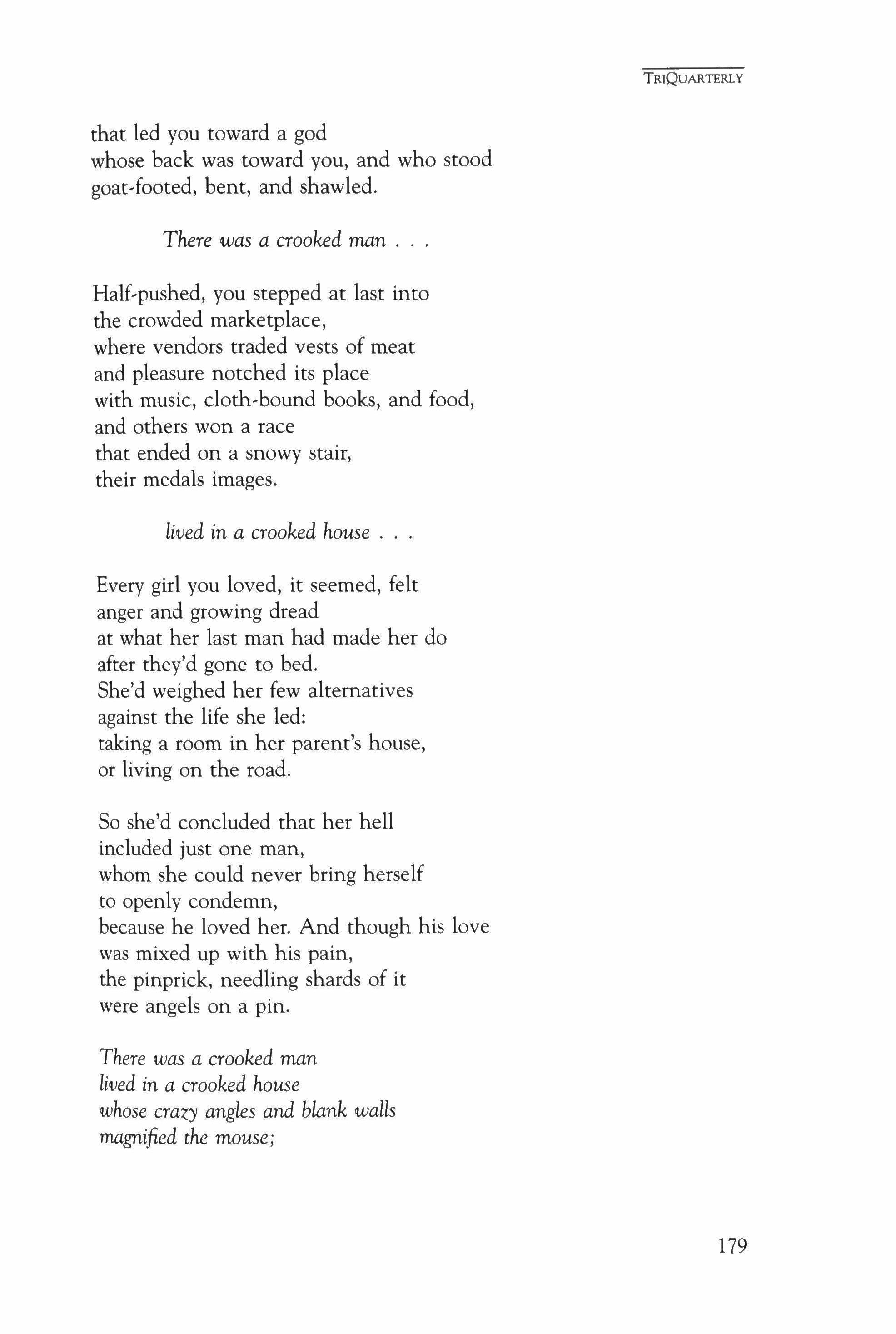
that led you toward a god whose back was toward you, and who stood goat-footed, bent, and shawled.
There was a crooked man
Half-pushed, you stepped at last into the crowded marketplace, where vendors traded vests of meat and pleasure notched its place with music, cloth-bound books, and food, and others won a race that ended on a snowy stair, their medals images.
lived in a crooked house
Every girl you loved, it seemed, felt anger and growing dread at what her last man had made her do after they'd gone to bed. She'd weighed her few alternatives against the life she led: taking a room in her parent's house, or living on the road.
So she'd concluded that her hell included just one man, whom she could never bring herself to openly condemn, because he loved her. And though his love was mixed up with his pain, the pinprick, needling shards of it were angels on a pin.
There was a crooked man lived in a crooked house whose crazy angles and blank walls magnified the mouse;
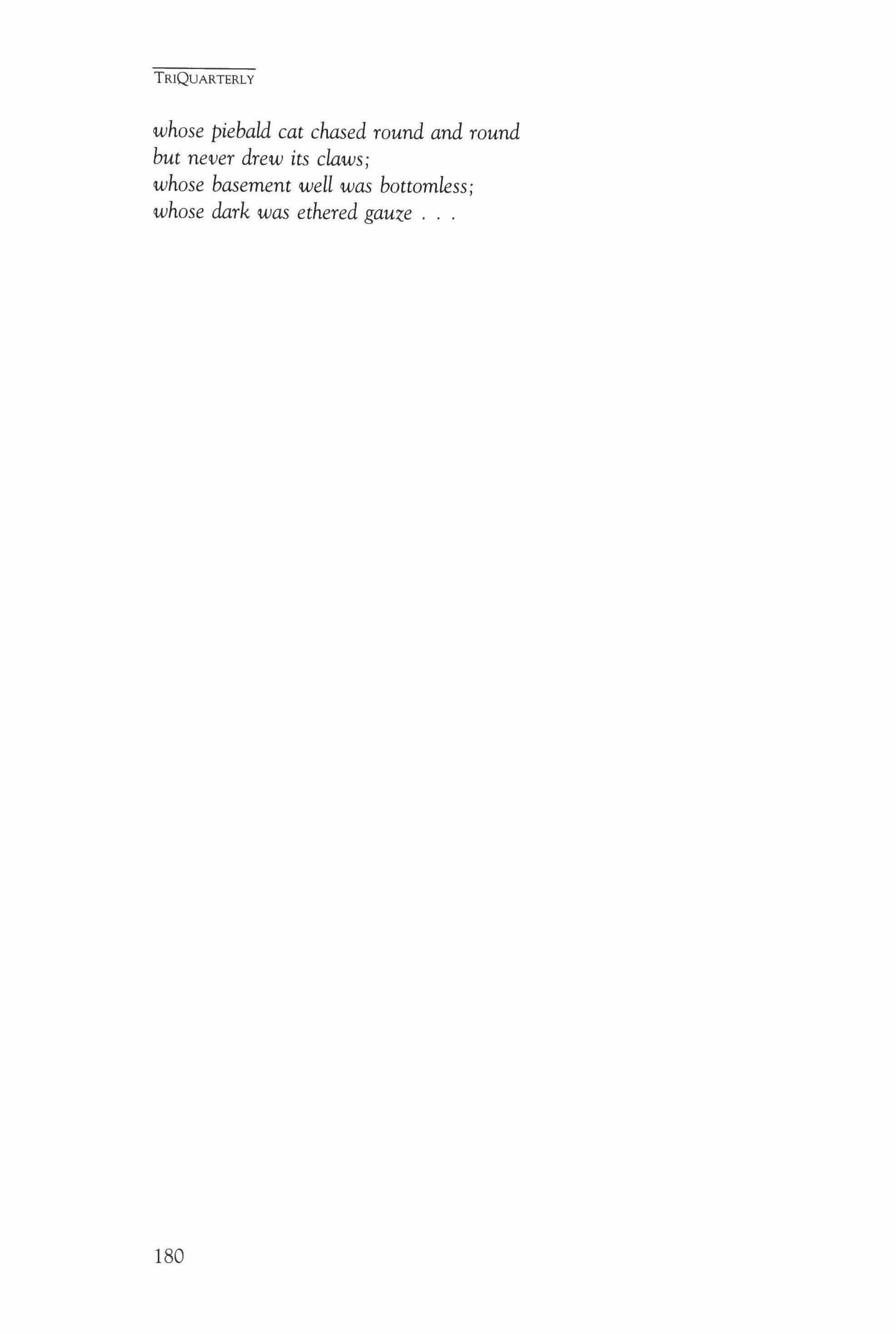
whose piebald cat chased round and round but never drew its claws; whose basement well was bottomless; whose dark was ethered gauze
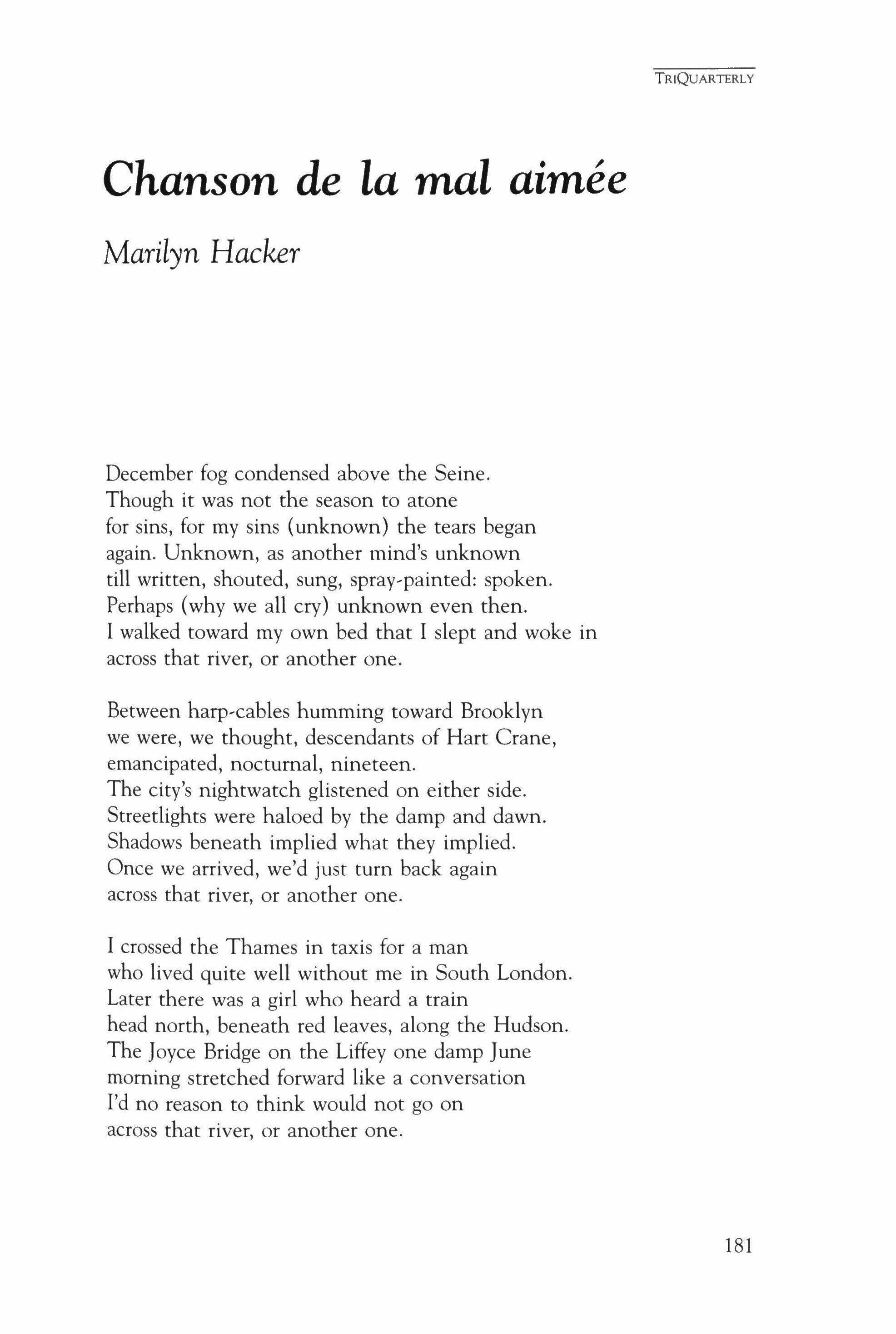
December fog condensed above the Seine.
Though it was not the season to atone for sins, for my sins (unknown) the tears began again. Unknown, as another mind's unknown till written, shouted, sung, spray-painted: spoken. Perhaps (why we all cry) unknown even then. I walked toward my own bed that I slept and woke in across that river, or another one.
Between harp-cables humming toward Brooklyn we were, we thought, descendants of Hart Crane, emancipated, nocturnal, nineteen. The city's nightwatch glistened on either side. Streetlights were haloed by the damp and dawn. Shadows beneath implied what they implied. Once we arrived, we'd just tum back again across that river, or another one.
I crossed the Thames in taxis for a man who lived quite well without me in South London. Later there was a girl who heard a train head north, beneath red leaves, along the Hudson. The Joyce Bridge on the Liffey one damp June morning stretched forward like a conversation 1'd no reason to think would not go on across that river, or another one.

A fresh breeze from the arm of the Malvan fingered across the terrace of the stone house where a card-table sat in the sun at which I wrote, bare-chested, dripping sweat. A Gauloise smouldered out in the Cinzano ashtray. Soft hiss, like the cigarette: a bird rushed up through oak leaves and was gone across that river or another one.
The Seine descends from sources in the Yonne; The children of Vincelles and Vincelottes launched lanterns cradling candles, let them float downriver, to begin the village fete. There would be fireworks, in the misty rain. A couple on the terrace of the inn mourned someone as the fireflies blinked out across that river, or another one.
The Hudson saw my heart break. The Hudson took it, discarded garbage on its swells. I'm leaving you. There is nobody else. She lied she lied she lied she lied she lied. Walk away from the river, shaking, stunned as you once came back to it, glad bride, found child, proud friend. Sewage seeped and spread across that river, or another one.
There is no heaven and it has no Queen (There is no God and Mary is His Mother). I have one life and one is all I get; it will be "same" unless I make it "other". The workings of the wind, so intricate, augmented to a night of devastation. Water bloated the banks, with bridges down across that river or another one.
Betrayal isn't torture, cancer, rape. Authorities don't gas abandoned wives; deplore the ones who put their heads in stoves (still, don't suggest it to the Taliban).
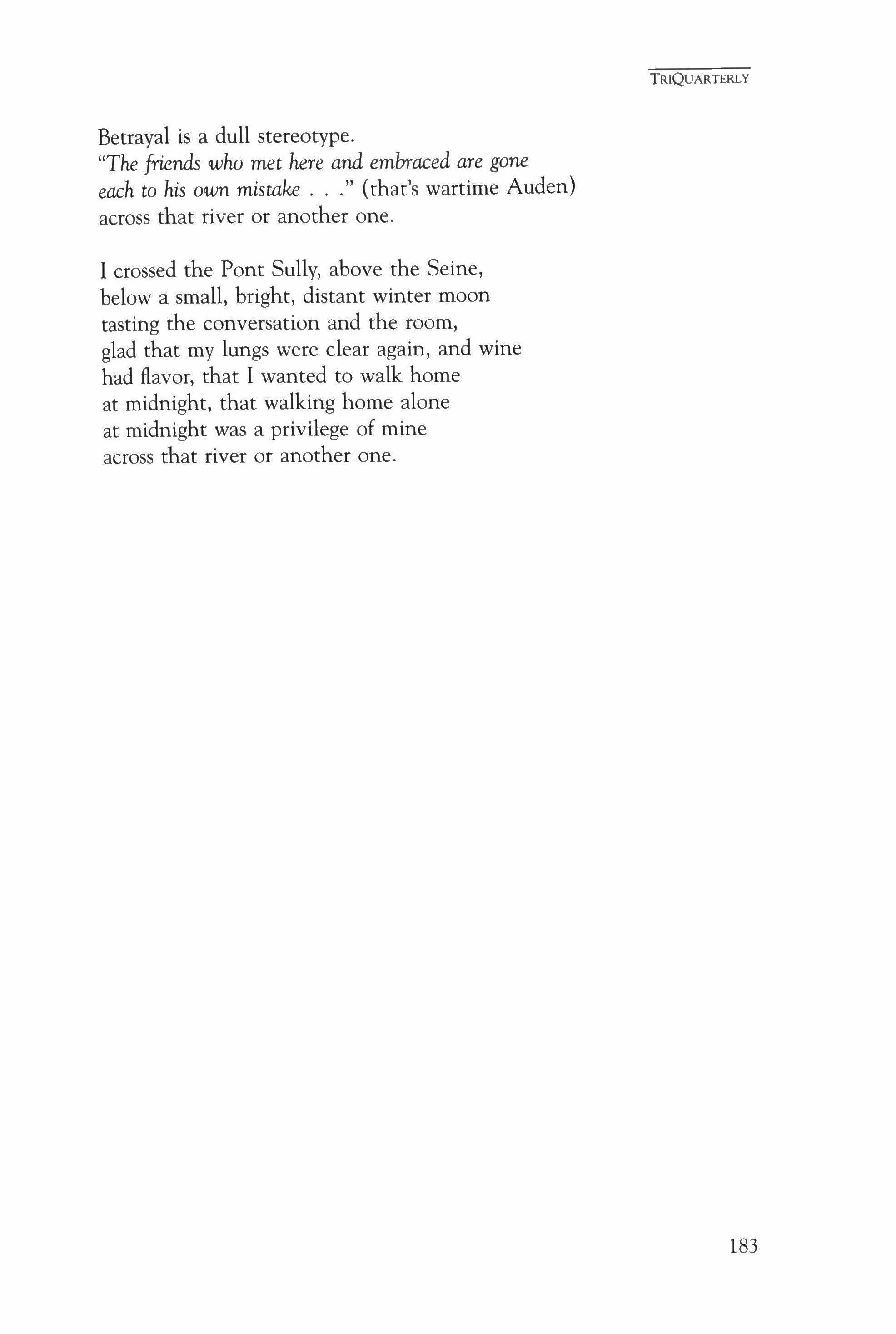
Betrayal is a dull stereotype. "The friends who met here and embraced are gone each to his own mistake ." (that's wartime Auden) across that river or another one.
I crossed the Pont Sully, above the Seine, below a small, bright, distant winter moon tasting the conversation and the room, glad that my lungs were clear again, and wine had flavor, that I wanted to walk home at midnight, that walking home alone at midnight was a privilege of mine across that river or another one.
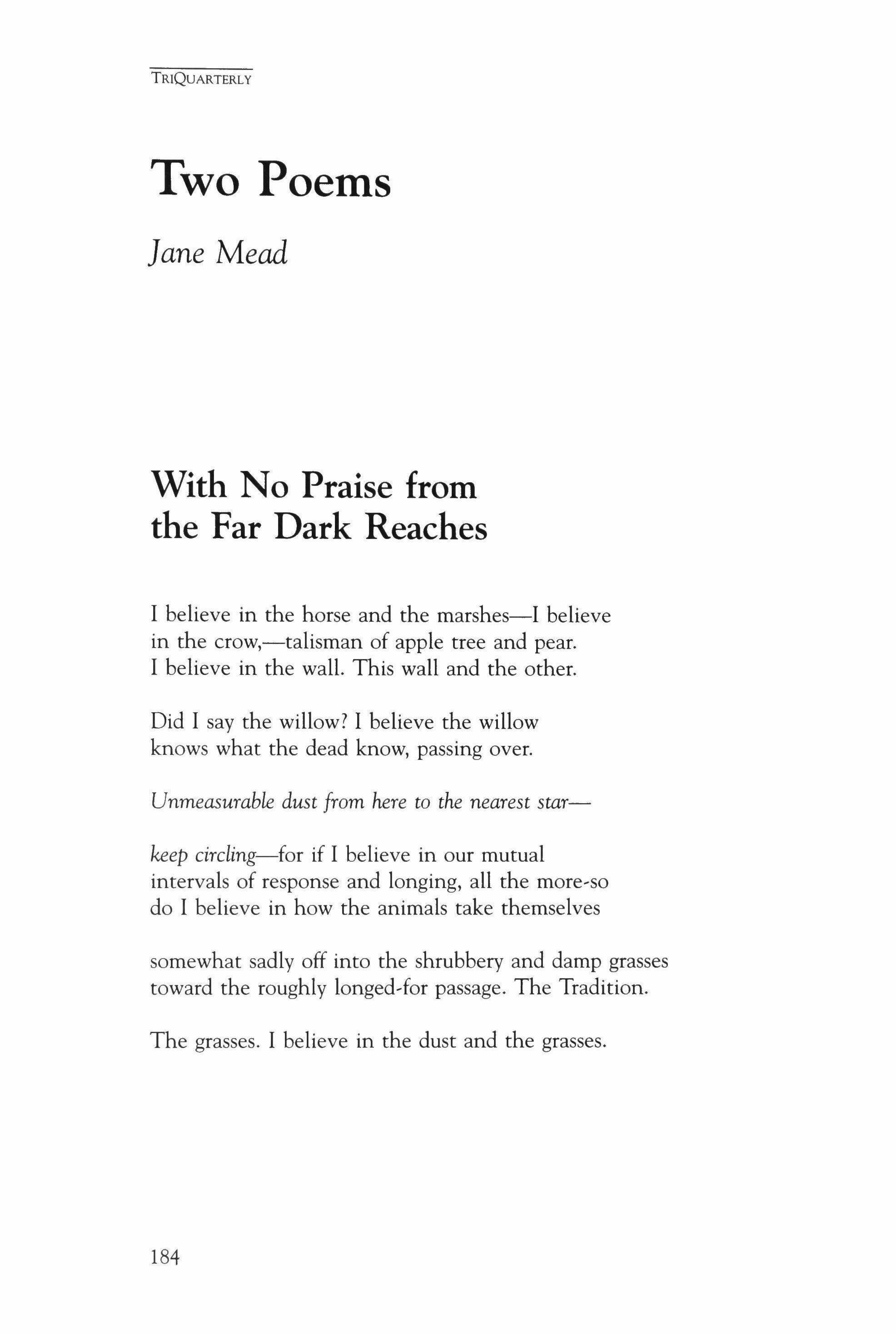
I believe in the horse and the marshes-I believe in the crow,-talisman of apple tree and pear. I believe in the wall. This wall and the other.
Did I say the willow? I believe the willow knows what the dead know, passing over.
Unmeasurable dust from here to the nearest star-
keep circling-for if I believe in our mutual intervals of response and longing, all the more-so do I believe in how the animals take themselves
somewhat sadly off into the shrubbery and damp grasses toward the roughly longed-for passage. The Tradition.
The grasses. I believe in the dust and the grasses.
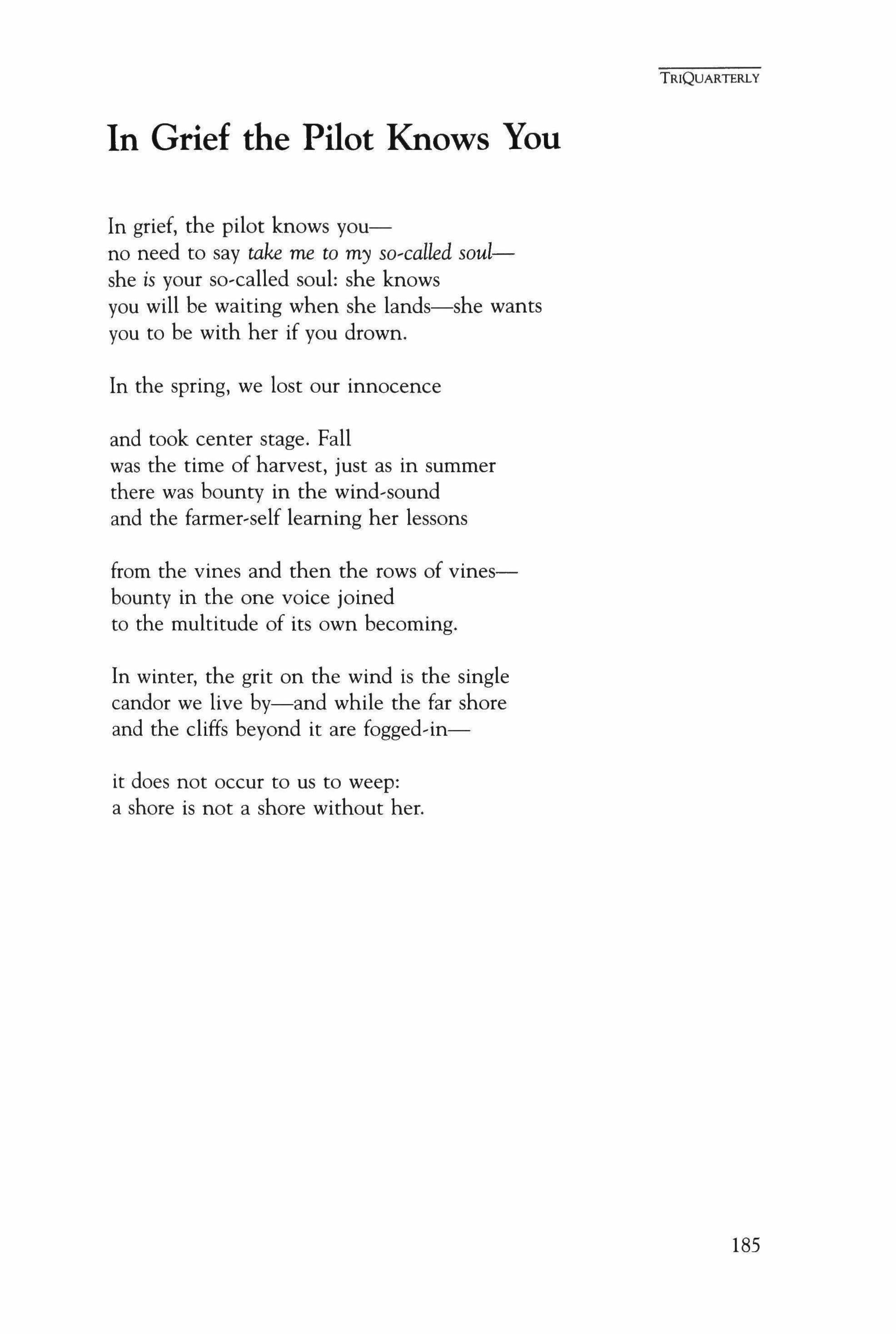
In grief, the pilot knows youno need to say take me to my so�called soulshe is your so-called soul: she knows you will be waiting when she lands-she wants you to be with her if you drown.
In the spring, we lost our innocence and took center stage. Fall was the time of harvest, just as in summer there was bounty in the wind-sound and the farmer-self learning her lessons
from the vines and then the rows of vinesbounty in the one voice joined to the multitude of its own becoming.
In winter, the grit on the wind is the single candor we live by-and while the far shore and the cliffs beyond it are fogged-in-s-
it does not occur to us to weep: a shore is not a shore without her.
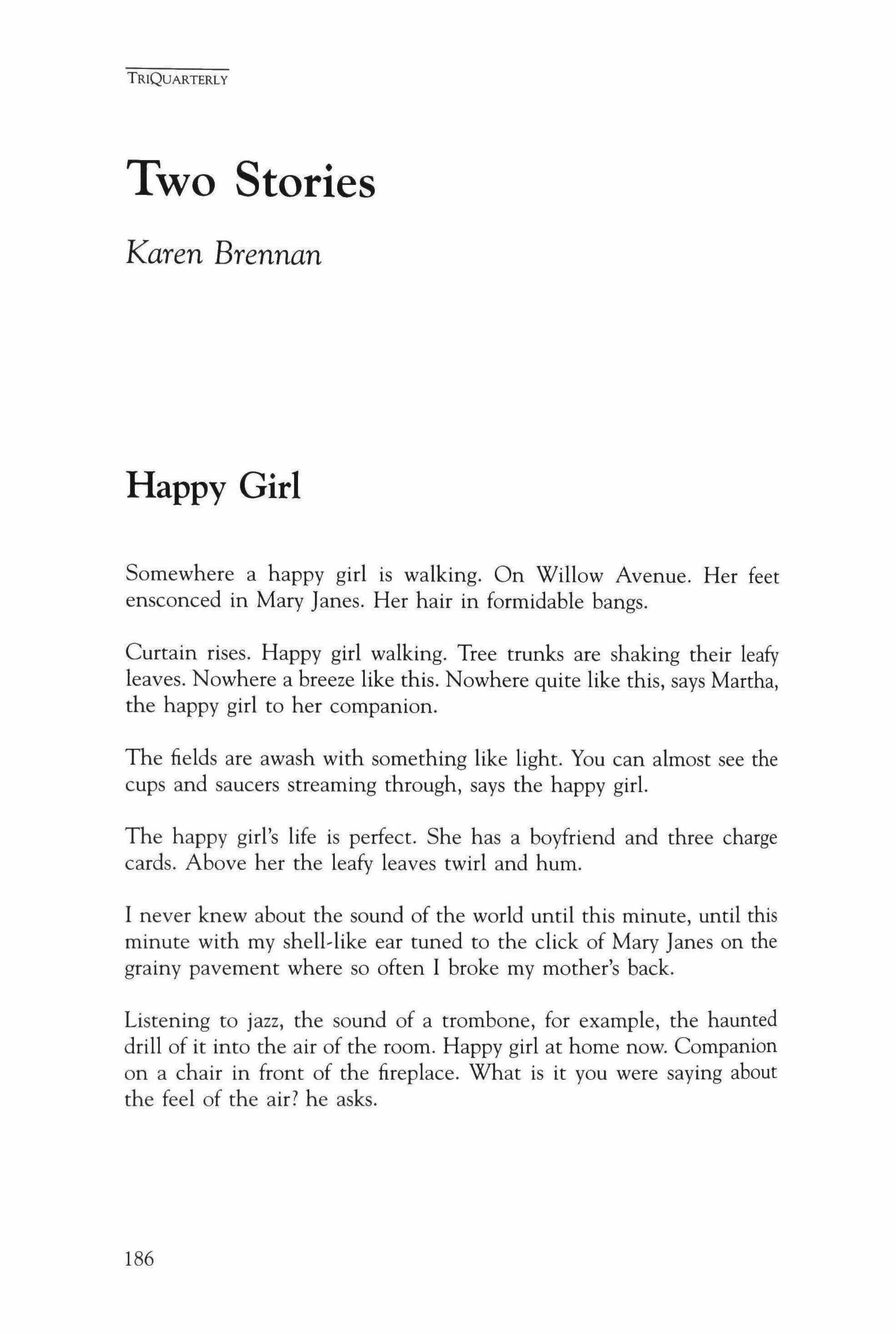
Somewhere a happy girl is walking. On Willow Avenue. Her feet ensconced in Mary Janes. Her hair in formidable bangs.
Curtain rises. Happy girl walking. Tree trunks are shaking their leafy leaves. Nowhere a breeze like this. Nowhere quite like this, says Martha, the happy girl to her companion.
The fields are awash with something like light. You can almost see the cups and saucers streaming through, says the happy girl.
The happy girl's life is perfect. She has a boyfriend and three charge cards. Above her the leafy leaves twirl and hum.
I never knew about the sound of the world until this minute, until this minute with my shell-like ear tuned to the click of Mary Janes on the grainy pavement where so often I broke my mother's back.
Listening to jazz, the sound of a trombone, for example, the haunted drill of it into the air of the room. Happy girl at home now. Companion on a chair in front of the fireplace. What is it you were saying about the feel of the air? he asks.
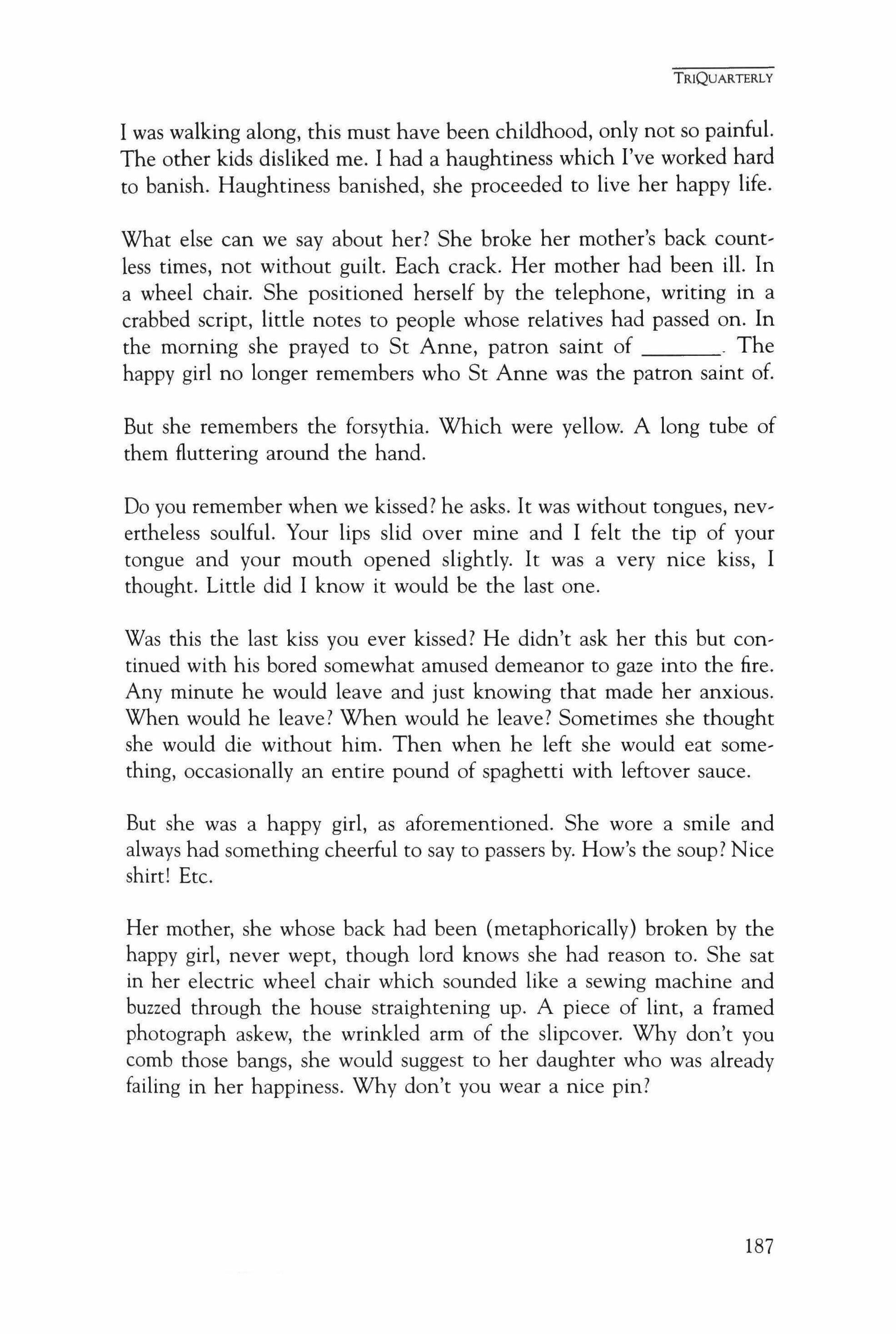
I was walking along, this must have been childhood, only not so painful. The other kids disliked me. I had a haughtiness which I've worked hard to banish. Haughtiness banished, she proceeded to live her happy life.
What else can we say about her? She broke her mother's back countless times, not without guilt. Each crack. Her mother had been ill. In a wheel chair. She positioned herself by the telephone, writing in a crabbed script, little notes to people whose relatives had passed on. In the morning she prayed to St Anne, patron saint of The happy girl no longer remembers who St Anne was the patron saint of.
But she remembers the forsythia. Which were yellow. A long tube of them fluttering around the hand.
Do you remember when we kissed? he asks. It was without tongues, nevertheless soulful. Your lips slid over mine and I felt the tip of your tongue and your mouth opened slightly. It was a very nice kiss, I thought. Little did I know it would be the last one.
Was this the last kiss you ever kissed? He didn't ask her this but continued with his bored somewhat amused demeanor to gaze into the fire. Any minute he would leave and just knowing that made her anxious. When would he leave? When would he leave? Sometimes she thought she would die without him. Then when he left she would eat something, occasionally an entire pound of spaghetti with leftover sauce.
But she was a happy girl, as aforementioned. She wore a smile and always had something cheerful to say to passers by. How's the soup? Nice shirt! Etc.
Her mother, she whose back had been (metaphorically) broken by the happy girl, never wept, though lord knows she had reason to. She sat in her electric wheel chair which sounded like a sewing machine and buzzed through the house straightening up. A piece of lint, a framed photograph askew, the wrinkled arm of the slipcover. Why don't you comb those bangs, she would suggest to her daughter who was already failing in her happiness. Why don't you wear a nice pin?
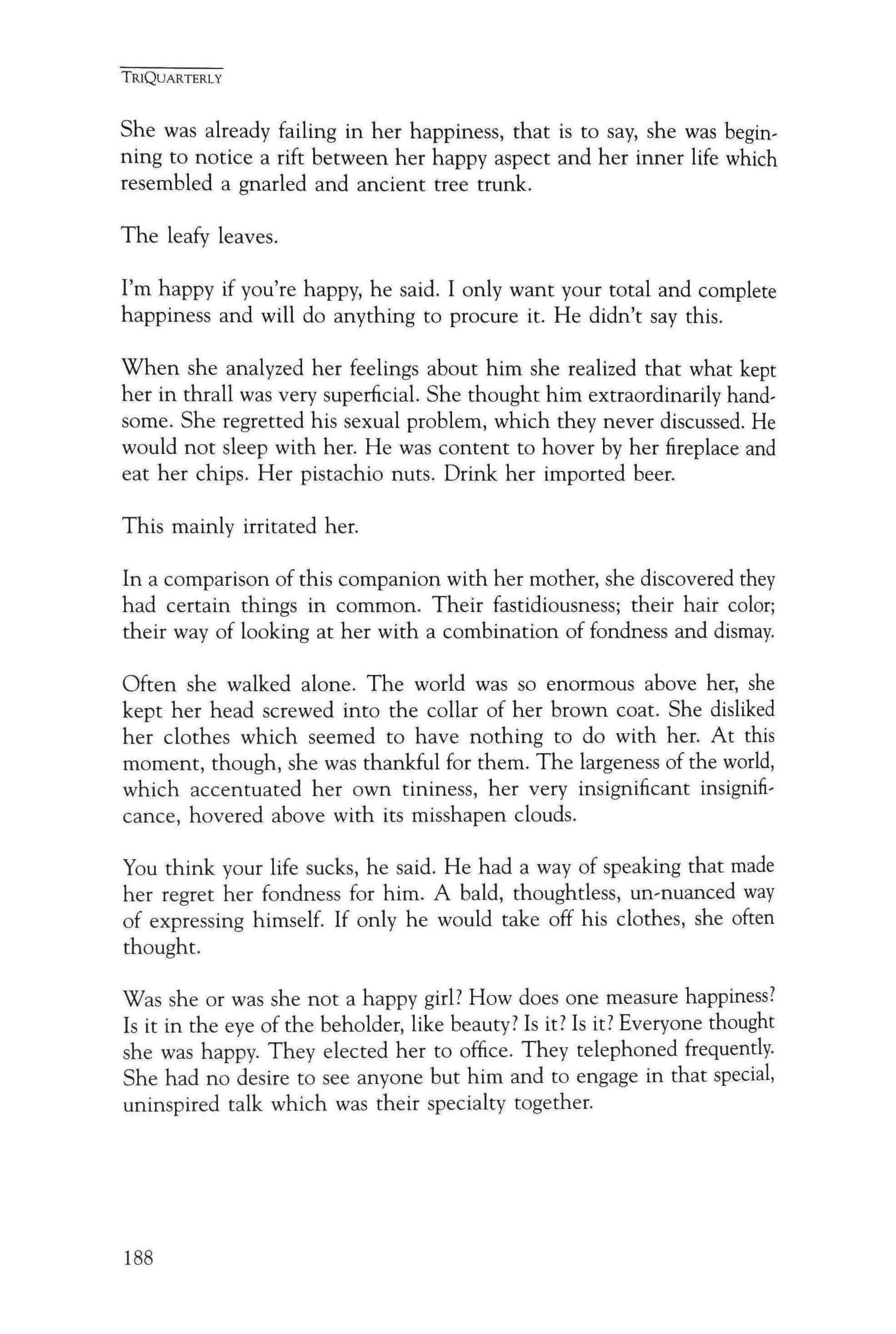
She was already failing in her happiness, that is to say, she was beginning to notice a rift between her happy aspect and her inner life which resembled a gnarled and ancient tree trunk.
The leafy leaves.
I'm happy if you're happy, he said. I only want your total and complete happiness and will do anything to procure it. He didn't say this.
When she analyzed her feelings about him she realized that what kept her in thrall was very superficial. She thought him extraordinarily handsome. She regretted his sexual problem, which they never discussed. He would not sleep with her. He was content to hover by her fireplace and eat her chips. Her pistachio nuts. Drink her imported beer.
This mainly irritated her.
In a comparison of this companion with her mother, she discovered they had certain things in common. Their fastidiousness; their hair color; their way of looking at her with a combination of fondness and dismay.
Often she walked alone. The world was so enormous above her, she kept her head screwed into the collar of her brown coat. She disliked her clothes which seemed to have nothing to do with her. At this moment, though, she was thankful for them. The largeness of the world, which accentuated her own tininess, her very insignificant insignificance, hovered above with its misshapen clouds.
You think your life sucks, he said. He had a way of speaking that made her regret her fondness for him. A bald, thoughtless, uri-nuanced way of expressing himself. If only he would take off his clothes, she often thought.
Was she or was she not a happy girl? How does one measure happiness? Is it in the eye of the beholder, like beauty? Is it? Is it? Everyone thought she was happy. They elected her to office. They telephoned frequently. She had no desire to see anyone but him and to engage in that special, uninspired talk which was their specialty together.
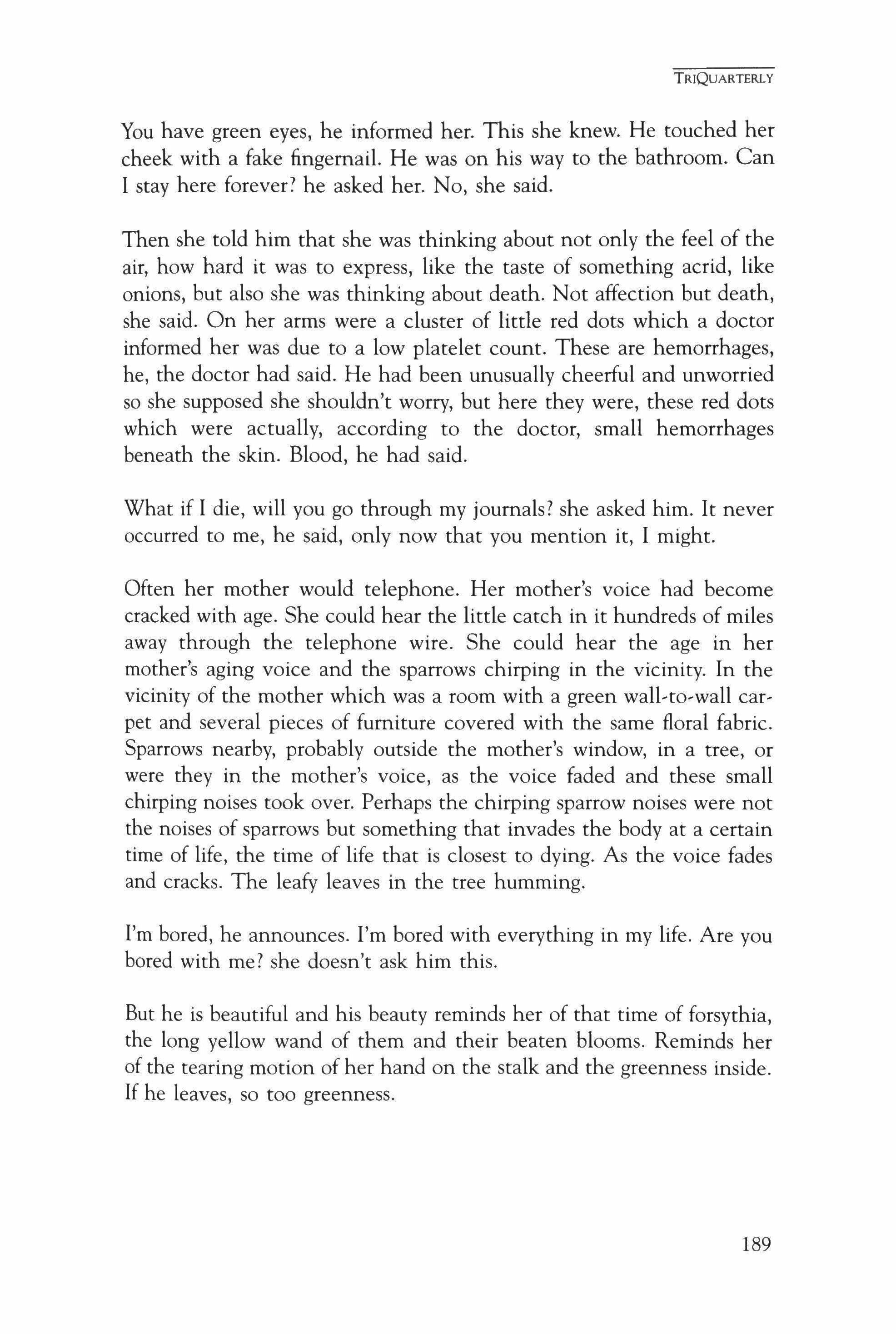
You have green eyes, he informed her. This she knew. He touched her cheek with a fake fingernail. He was on his way to the bathroom. Can I stay here forever? he asked her. No, she said.
Then she told him that she was thinking about not only the feel of the air, how hard it was to express, like the taste of something acrid, like onions, but also she was thinking about death. Not affection but death, she said. On her arms were a cluster of little red dots which a doctor informed her was due to a low platelet count. These are hemorrhages, he, the doctor had said. He had been unusually cheerful and unworried so she supposed she shouldn't worry, but here they were, these red dots which were actually, according to the doctor, small hemorrhages beneath the skin. Blood, he had said.
What if I die, will you go through my journals? she asked him. It never occurred to me, he said, only now that you mention it, I might.
Often her mother would telephone. Her mother's voice had become cracked with age. She could hear the little catch in it hundreds of miles away through the telephone wire. She could hear the age in her mother's aging voice and the sparrows chirping in the vicinity. In the vicinity of the mother which was a room with a green wall-to-wall carpet and several pieces of furniture covered with the same floral fabric. Sparrows nearby, probably outside the mother's window, in a tree, or were they in the mother's voice, as the voice faded and these small chirping noises took over. Perhaps the chirping sparrow noises were not the noises of sparrows but something that invades the body at a certain time of life, the time of life that is closest to dying. As the voice fades and cracks. The leafy leaves in the tree humming.
I'm bored, he announces. I'm bored with everything in my life. Are you bored with me? she doesn't ask him this.
But he is beautiful and his beauty reminds her of that time of forsythia, the long yellow wand of them and their beaten blooms. Reminds her of the tearing motion of her hand on the stalk and the greenness inside. If he leaves, so too greenness.

Happy is as happy does. She cleans her cupboards with him watching. His feet up, trying on her sunglasses, her new velvet hat. She thinks to give him a pot and a wooden spoon to bang with, as if he were an infant. You are an infant, she says. Seeing herself then, her terrible fondness for him playing across her face the way in the desert the wind will blow across and dismantle a few things.
So too her life. Happy and not happy. Existing in a kind of wave, which rolls and diminishes. Dismantled.
Stacking the white cups, cleaning the white shelf, replacing the old paper with the new viney one, seeking solace in the curved, cupped shadows, his perfect nose, bitten fingernails, the marvelous and the non, whatever happens. Which is the way it appears to her, happiness, its arches and ebbs, its miseries and singed winds.
Whatever happens, I will be happy, it is my new resolve, says Martha to her companion, who is frowning steadily at something, an ant or beetle crossing his knee. Did you hear me? I said I will continue to trundle on, I said this too shall pass, I said hand me those scissors. And she sees him, ridiculous and permeated by grief, his round eyes aswirl with guile as he hands her the scissors by their gleamy eyes.
And the light washes in and out and the leaves make a noise that sounds like whoosh whoosh ah! through the screen and the jays are bashing their wings, yak yak yak, like the flutter of her heart in its cage, like the noise of her happiness flying away.
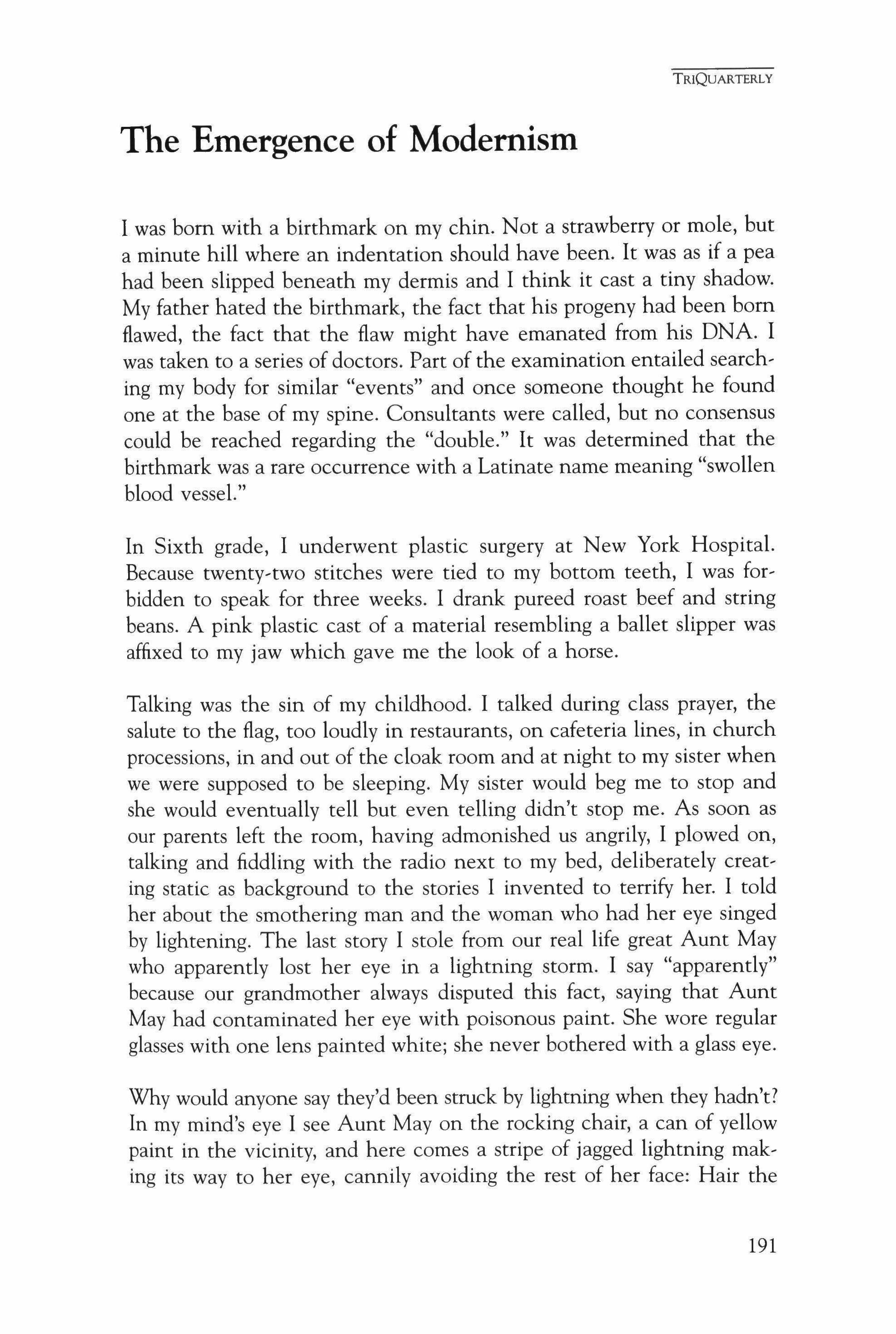
I was born with a birthmark on my chin. Not a strawberry or mole, but a minute hill where an indentation should have been. It was as if a pea had been slipped beneath my dermis and I think it cast a tiny shadow. My father hated the birthmark, the fact that his progeny had been born flawed, the fact that the flaw might have emanated from his DNA. I was taken to a series of doctors. Part of the examination entailed searching my body for similar "events" and once someone thought he found one at the base of my spine. Consultants were called, but no consensus could be reached regarding the "double." It was determined that the birthmark was a rare occurrence with a Latinate name meaning "swollen blood vessel."
In Sixth grade, I underwent plastic surgery at New York Hospital. Because twenty-two stitches were tied to my bottom teeth, I was forbidden to speak for three weeks. I drank pureed roast beef and string beans. A pink plastic cast of a material resembling a ballet slipper was affixed to my jaw which gave me the look of a horse.
Talking was the sin of my childhood. I talked during class prayer, the salute to the flag, too loudly in restaurants, on cafeteria lines, in church processions, in and out of the cloak room and at night to my sister when we were supposed to be sleeping. My sister would beg me to stop and she would eventually tell but even telling didn't stop me. As soon as our parents left the room, having admonished us angrily, I plowed on, talking and fiddling with the radio next to my bed, deliberately creating static as background to the stories I invented to terrify her. I told her about the smothering man and the woman who had her eye singed by lightening. The last story I stole from our real life great Aunt May who apparently lost her eye in a lightning storm. I say "apparently" because our grandmother always disputed this fact, saying that Aunt May had contaminated her eye with poisonous paint. She wore regular glasses with one lens painted white; she never bothered with a glass eye.
Why would anyone say they'd been struck by lightning when they hadn't?
In my mind's eye I see Aunt May on the rocking chair, a can of yellow paint in the vicinity, and here comes a stripe of jagged lightning making its way to her eye, cannily avoiding the rest of her face: Hair the
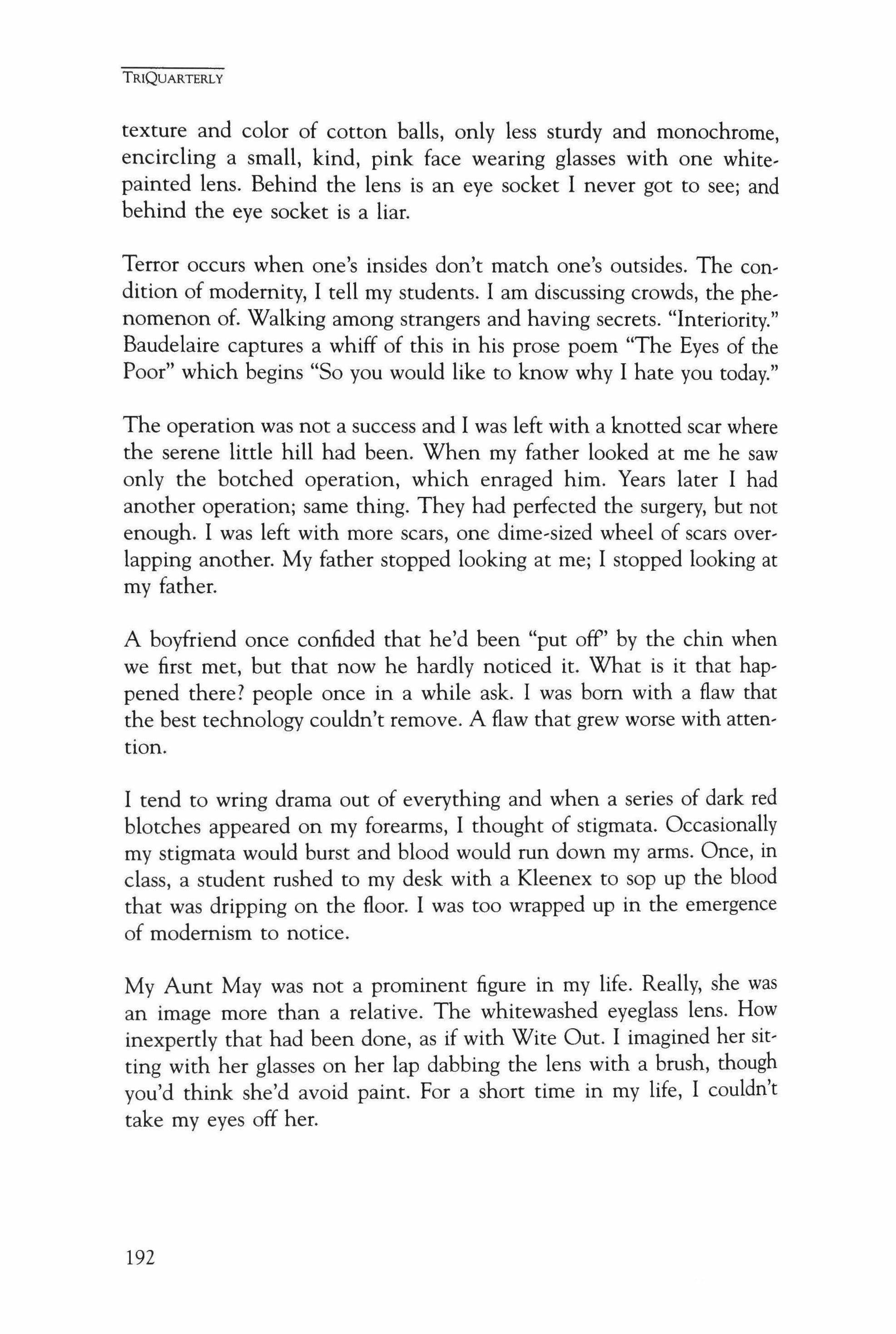
texture and color of cotton balls, only less sturdy and monochrome, encircling a small, kind, pink face wearing glasses with one whitepainted lens. Behind the lens is an eye socket I never got to see; and behind the eye socket is a liar.
Terror occurs when one's insides don't match one's outsides. The condition of modernity, I tell my students. I am discussing crowds, the phenomenon of. Walking among strangers and having secrets. "Interiority." Baudelaire captures a whiff of this in his prose poem "The Eyes of the Poor" which begins "So you would like to know why I hate you today."
The operation was not a success and I was left with a knotted scar where the serene little hill had been. When my father looked at me he saw only the botched operation, which enraged him. Years later I had another operation; same thing. They had perfected the surgery, but not enough. I was left with more scars, one dime-sized wheel of scars overlapping another. My father stopped looking at me; I stopped looking at my father.
A boyfriend once confided that he'd been "put off" by the chin when we first met, but that now he hardly noticed it. What is it that happened there? people once in a while ask. I was born with a flaw that the best technology couldn't remove. A flaw that grew worse with attention.
I tend to wring drama out of everything and when a series of dark red blotches appeared on my forearms, I thought of stigmata. Occasionally my stigmata would burst and blood would run down my arms. Once, in class, a student rushed to my desk with a Kleenex to sop up the blood that was dripping on the floor. I was too wrapped up in the emergence of modernism to notice.
My Aunt May was not a prominent figure in my life. Really, she was an image more than a relative. The whitewashed eyeglass lens. How inexpertly that had been done, as if with Wite Out. I imagined her sitting with her glasses on her lap dabbing the lens with a brush, though you'd think she'd avoid paint. For a short time in my life, I couldn't take my eyes off her.
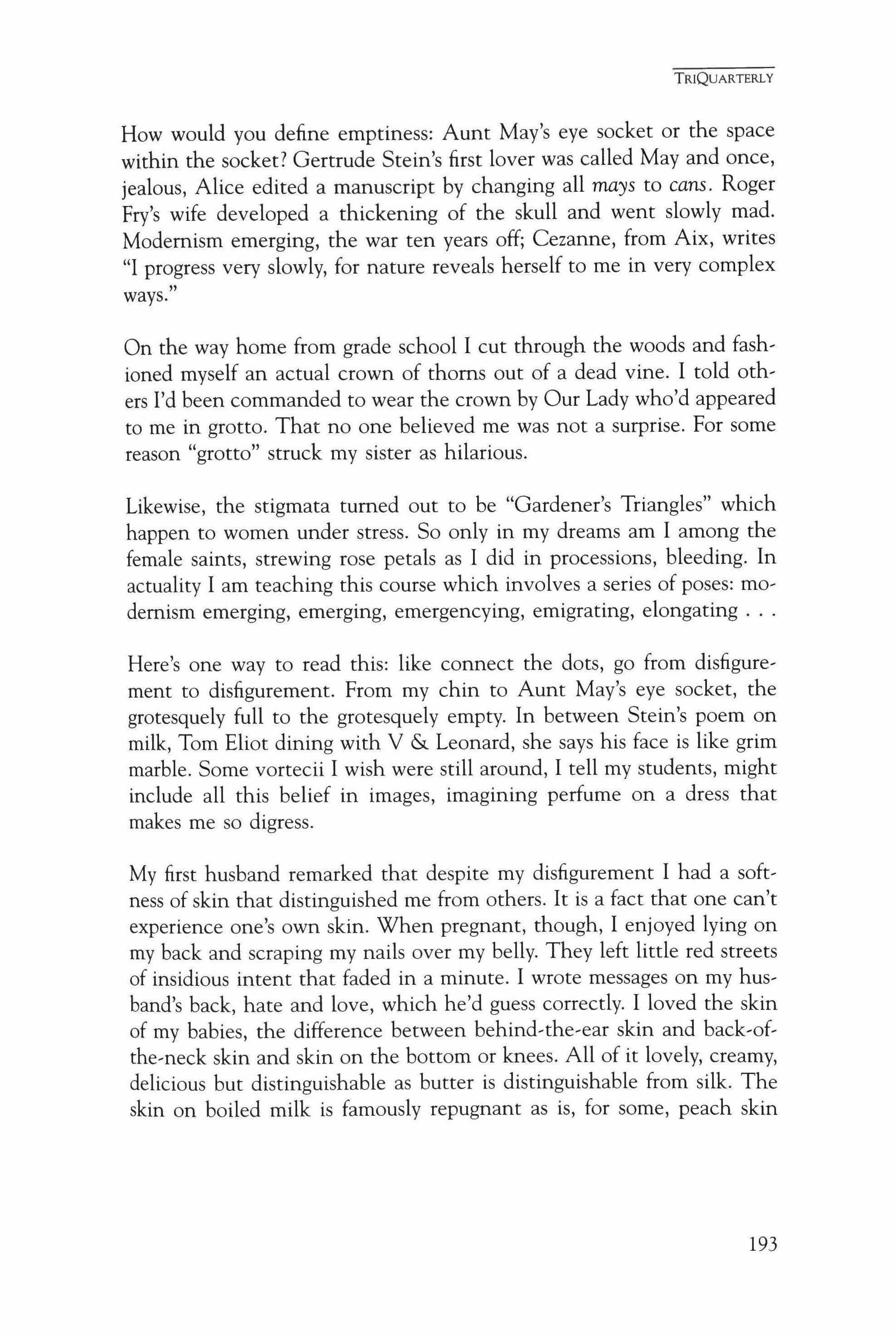
How would you define emptiness: Aunt May's eye socket or the space within the socket? Gertrude Stein's first lover was called May and once, jealous, Alice edited a manuscript by changing all mays to cans. Roger Fry's wife developed a thickening of the skull and went slowly mad. Modernism emerging, the war ten years off; Cezanne, from Aix, writes "1 progress very slowly, for nature reveals herself to me in very complex ways."
On the way home from grade school I cut through the woods and fashioned myself an actual crown of thorns out of a dead vine. I told others I'd been commanded to wear the crown by Our Lady who'd appeared to me in grotto. That no one believed me was not a surprise. For some reason "grotto" struck my sister as hilarious.
Likewise, the stigmata turned out to be "Gardener's Triangles" which happen to women under stress. So only in my dreams am I among the female saints, strewing rose petals as I did in processions, bleeding. In actuality 1 am teaching this course which involves a series of poses: modernism emerging, emerging, emergencying, emigrating, elongating
Here's one way to read this: like connect the dots, go from disfigure, ment to disfigurement. From my chin to Aunt May's eye socket, the grotesquely full to the grotesquely empty. In between Stein's poem on milk, Tom Eliot dining with V & Leonard, she says his face is like grim marble. Some vortecii I wish were still around, I tell my students, might include all this belief in images, imagining perfume on a dress that makes me so digress.
My first husband remarked that despite my disfigurement I had a soft, ness of skin that distinguished me from others. It is a fact that one can't experience one's own skin. When pregnant, though, I enjoyed lying on my back and scraping my nails over my belly. They left little red streets of insidious intent that faded in a minute. I wrote messages on my husband's back, hate and love, which he'd guess correctly. I loved the skin of my babies, the difference between behind-the-ear skin and back-ofthe-neck skin and skin on the bottom or knees. All of it lovely, creamy, delicious but distinguishable as butter is distinguishable from silk. The skin on boiled milk is famously repugnant as is, for some, peach skin

with its fuzz. In my refrigerator are apples whose skin has shriveled, one banana with a black skin, and the slimy skin of mushrooms two weeks old. The skin of dogs is unknown to most as is the skin of most other mammals. It is a fact that one can't experience one's own skin except through the pronouncements of a lover.
"I paint forms as I think them not as I see them," said Picasso and I share this quotation with my students, as I do Pound's poem "At a Station of the Metro." We are halfway through the semester and modernism continues to emerge. Pound composed "Metro" after noting faces in the Paris subway, one more luminous than the next. Picasso beat women, Pound committed acts of high treason. The face in the modem crowd melts into an atmosphere of neon greed or is it yellow angles with noses? My students melt into an atmosphere of clanking heating vents and the world outside the window which is snowing a late spring snow that clings to branches as, in another season, time, country, petals cling to wet black boughs.
I could make much of the fact that my father stopped looking at me. In my face he saw the unrevisable, a poorly constructed sentence decreed by God. Also, I reminded him of his younger brother who died at 18. What is it that draws the eye or repels it might be the question formulated to explore these issues. On my grandmother's front porch in Coventry, Connecticut, my sister and I swung on the green porch swing while nearby our Aunt May stared benignly at a tree. There was the world framing her: the tree with its blossoms, the far away lake with its slither of blue sky. There was Aunt May framing the world.
A few years ago when I consulted a plastic surgeon for a precancerous growth on the side of my nose, she told me she could fix my chin quite easily. A slice and a tuck is how she put it. An office visit. It's hard for me to imagine my face without the flaw of chin scar. What had been empty would now be full. An eye in Aunt May's eye socket staring eerily out. Who would I be? My father, now dead, would swivel his eyes in my direction. In Picasso's famous reworked painting Les Demoiselles d'Avignon, the viewer has been eliminated making "voyeurs of us all."
Therefore, with my scarred chin, as if from birth I'd been cursed with two original sins, one removable, the other indelible, I trudged through the woods on my way home from school. In the sky a cloud seemed to
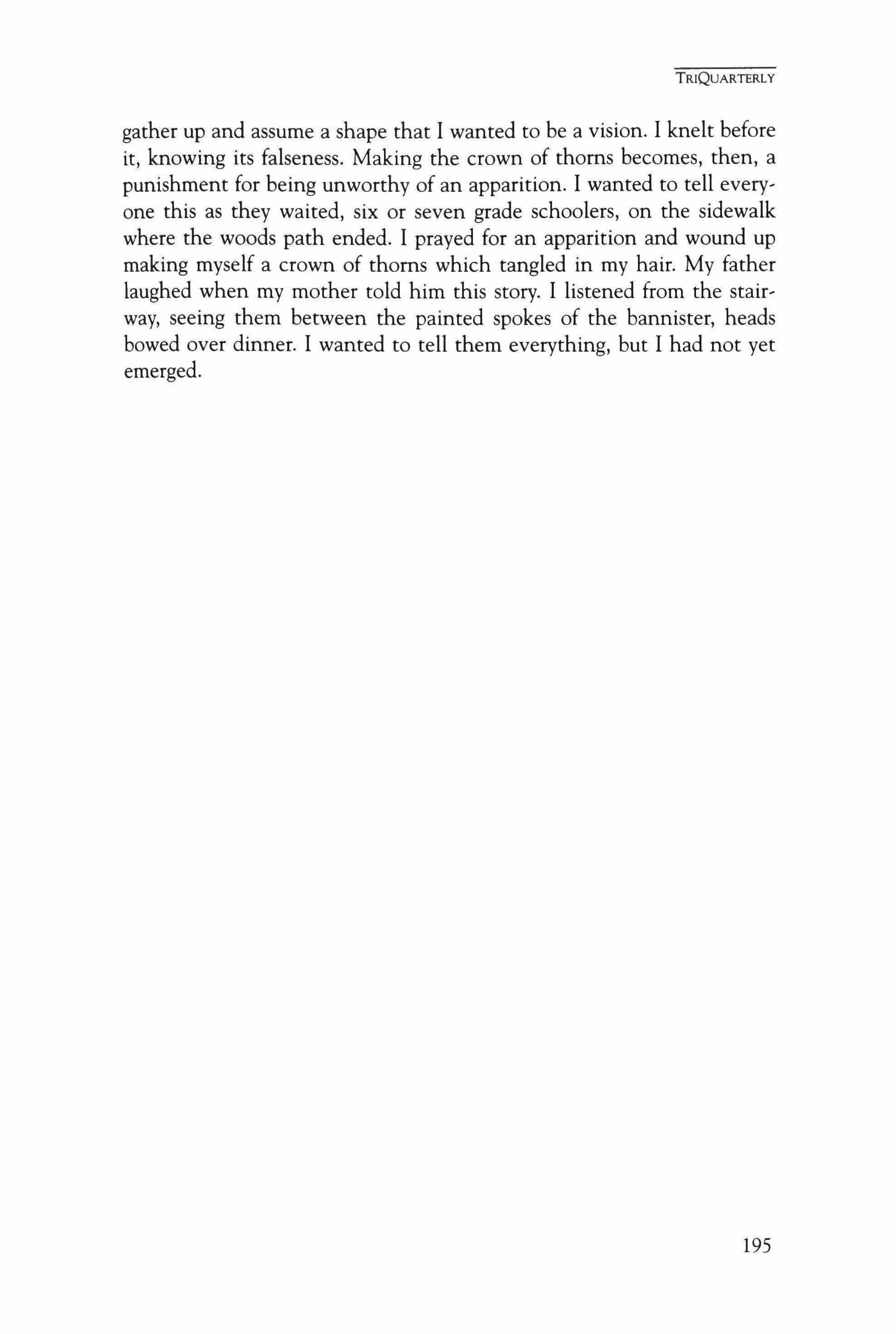
gather up and assume a shape that I wanted to be a vision. I knelt before it, knowing its falseness. Making the crown of thorns becomes, then, a punishment for being unworthy of an apparition. I wanted to tell everyone this as they waited, six or seven grade schoolers, on the sidewalk where the woods path ended. I prayed for an apparition and wound up making myself a crown of thorns which tangled in my hair. My father laughed when my mother told him this story. I listened from the stairway, seeing them between the painted spokes of the bannister, heads bowed over dinner. I wanted to tell them everything, but I had not yet emerged.

The pimps got on the bus at the stop just before the end of the line, at the foot of the causeway that connected Riker's Island with the mainland. They left their Cadillacs gleaming in the lot posted with the sign, "New York City Department of Correctional Services"-next to the Hondas and Pintos of the corrections officers.
They lounged in the entry well of the crowded vehicle, tapping the floorboards with their heavy gilt-tipped walking sticks, their faces grave under their plumed hats, vibrating slightly, then steadily, as the bus crossed under the flight paths of the jets taking off and landing at La Guardia airport. So close a prisoner could see heat waves shuddering on the taxi-tarmac, a prisoner could smell jet fuel.
The pimps traveled together in a pack but separate from each other. When the bus arrived at the reception center, they eased slowly out through the hissing doors, their walking sticks hooked over their shoulders. The rest of the passengers got off hurriedly, pushing a little, obeying the public address system commands to form lines for the Adolescent Remand Shelter, C-76, the men's prison, or the Women's House of Detention. The pimps did not form lines, instead they remained outside the reception center, smoking and talking and when Abby or any other young woman passed them, they would sing out in crooning voices: "Hey mamma hey mamma." Some would call preemptively: "Come here girl. I wanna talk to you. You hear me, bitch, you hear me?"
The pimps were there because they had both vested and new interests on the Island. Their vested interest was the prostitute who'd served her sentence and was ready to go back to work. The new interest was the "ex offender," the woman dropped on the prison side of the causeway bridge by a Corrections van. This woman would wear ill-fitting rumpled clothes with five dollars of good luck money from the City of

New York in her pocket. Nestled in her other pocket: a hot job tip scribbled on a crumpled piece of paper by a social worker-a position at the phone company, a hundred dollars a week.
When Abby walked by the pimps now she ignored them-but one night after she'd been coming out to Riker's for about three months, she'd turned back to talk to one of them, just to prove to she wasn't afraid.
"Yeah?" She approached the tall, hatted stranger who'd called rudely to her. He was lounging against a Reception Center bench, a cigarette in his mouth. He wore tinted aviator glasses and a gold lightning bolt on a chain around his neck. He watched her coming closer, nudging the pimp next to him, indicating her with his stick. They trained identical, malevolent stares on her. She felt like someone walking a tightrope, one foot after the other: she kept her own gaze on those armored eye-slits till she looked directly into them.
"You a social worker?"
"I teach a poetry class at the Women's House."
He looked momentarily confused; he seemed to think she was making fun of him. Then when he saw that she was serious, he laughed uproariously, throwing back his head, fanning himself with his stick. The other pimps moved closer. Abby started to back away but the pimp put out a hand, fast as a knife.
"You got a friend of mine in your po-tree class called Dime-a-Time?
"Old Dime-a-Time, she walk like this."
He pushed back his hat, crooked his stick, waggled his hips and shuffled splay-footed in front of her. The other pimps hooted. Abby watched him strut, unblinking.
"Wow," she said, "if she makes a dime at a time, how much do you make?" She reached into her bag, pulled out her coin purse and flung a dime on the ground near his high-heeled, snakeskin boots. He stopped and looked down at it as it spun, then toppled. She turned and hurried away, blocking out their shouted comments.
That same night, after that encounter with the pimp, as she was pushing through the reception center turnstile, holding up her I.D. cardthe guard had stopped her. She smiled at him nervously. This was a switch. She had not been asked to open her shoulder bag in a while. Most of the guards recognized her now; they'd been nodding and waving her through. Consequently, she'd found it simple to casually smuggle in contraband: On the Barricade, a leftist newspaper (unapproved reading matter), chocolate candy bars and chewing gum (impressions of
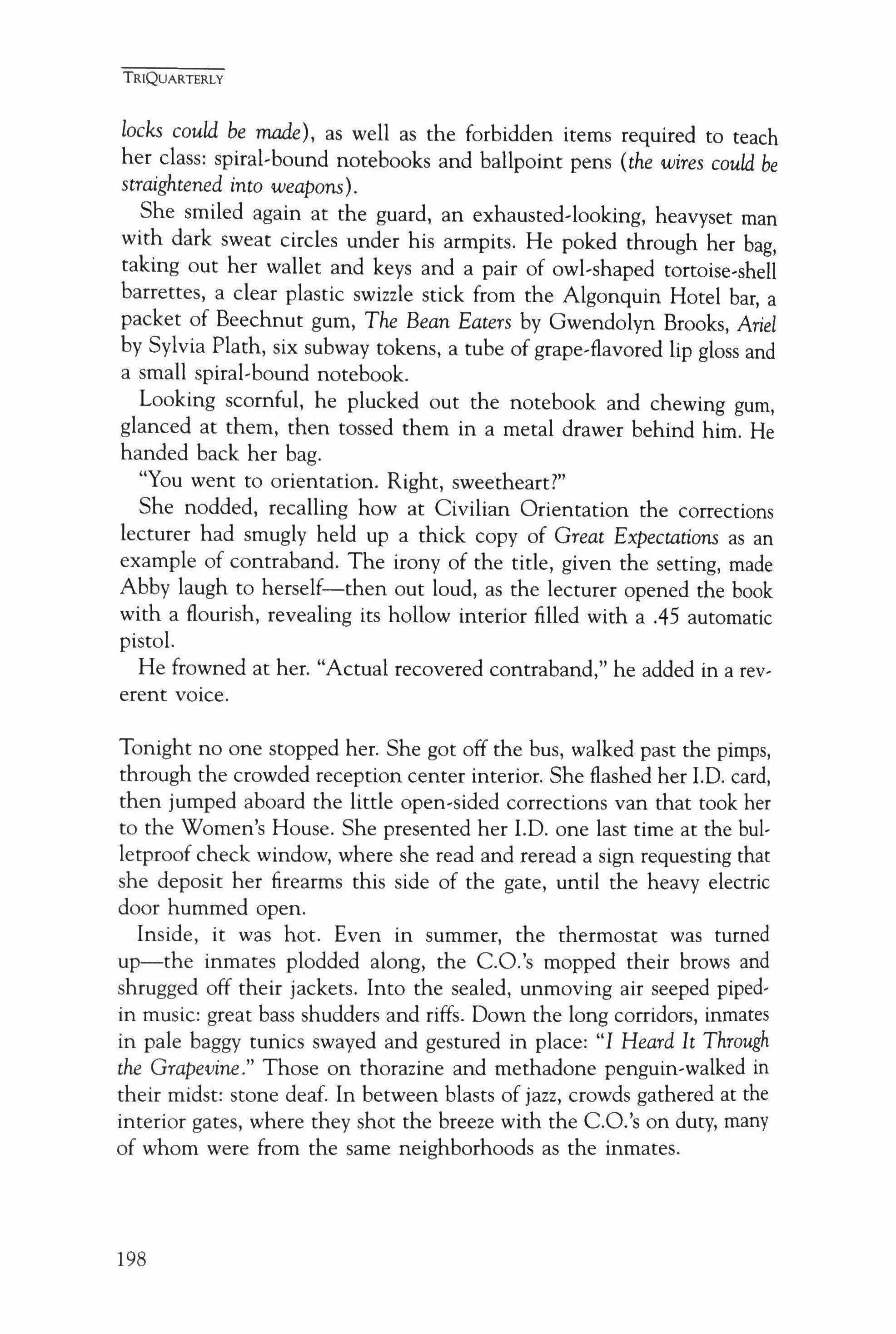
locks could be made), as well as the forbidden items required to teach her class: spiral-bound notebooks and ballpoint pens (the wires could be straightened into weapons).
She smiled again at the guard, an exhausted,looking, heavyset man with dark sweat circles under his armpits. He poked through her bag, taking out her wallet and keys and a pair of owl-shaped tortoise-shell barrettes, a clear plastic swizzle stick from the Algonquin Hotel bar, a packet of Beechnut gum, The Bean Eaters by Gwendolyn Brooks, Ariel by Sylvia Plath, six subway tokens, a tube of grape,flavored lip gloss and a small spiral-bound notebook.
Looking scornful, he plucked out the notebook and chewing gum, glanced at them, then tossed them in a metal drawer behind him. He handed back her bag.
"You went to orientation. Right, sweetheart?"
She nodded, recalling how at Civilian Orientation the corrections lecturer had smugly held up a thick copy of Great Expectations as an example of contraband. The irony of the title, given the setting, made Abby laugh to herself-then out loud, as the lecturer opened the book with a flourish, revealing its hollow interior filled with a .45 automatic pistol.
He frowned at her. "Actual recovered contraband," he added in a rev, erent voice.
Tonight no one stopped her. She got off the bus, walked past the pimps, through the crowded reception center interior. She flashed her 1.0. card, then jumped aboard the little open-sided corrections van that took her to the Women's House. She presented her I.D. one last time at the bulletproof check window, where she read and reread a sign requesting that she deposit her firearms this side of the gate, until the heavy electric door hummed open.
Inside, it was hot. Even in summer, the thermostat was turned up-the inmates plodded along, the C.O.'s mopped their brows and shrugged off their jackets. Into the sealed, unmoving air seeped pipedin music: great bass shudders and riffs. Down the long corridors, inmates in pale baggy tunics swayed and gestured in place: "I Heard It Through the Grapevine." Those on thorazine and methadone penguin-walked in their midst: stone deaf. In between blasts of jazz, crowds gathered at the interior gates, where they shot the breeze with the C.O.'s on duty, many of whom were from the same neighborhoods as the inmates.

Abby phoned the residence floors from the watch commander's office, then walked down a hallway with a taciturn e.O. LaViolette, who unlocked the door of a small, airless classroom. LaViolette stood singing under her breath outside the door for a while, then wandered off. Abby sat down at the metal table in the center of the room. Sallie Chester was the first to arrive. She took what she considered to be the best seat, directly across from Abby. Sallie had once been pretty, but her face was split across the bridge of her nose like an overcooked hot dog. Sallie had told Abby, (when Abby asked,) how one night she'd walked out on her pimp, intending to leave forever, but he'd tracked her down. He brought her back and tied her up, unbent a coat hanger, heated it over a stove burner, then drew it again and again across her face.
"He made damn sure I was no good to no man," Sallie said. "That's why I had to deal with him."
Sergeant Pike had told Abby that "dealing with him" meant she'd killed him. Neither the sergeant or Sallie would say how she'd done it. But Pike had laughed over her shoulder grimly, "Honey, she took care of him! And let me tell you, for a whore to off her pimp? Uh-ah. His homies'll be waitin' for her outside."
"He deserved something," Abby had remarked to Sallie, her voice shaking, "worse than death." Sallie made her nervous. Abby found it hard to look straight into that eager, ravaged face.
Sallie stared at her. "You mean prison?"
Another jet came over low. Sallie's slashed face shook, divided into two expressions. The bottom half smiled, but the upper half above the scar looked cynical.
"I evened that score," she said.
Tonight Sallie sat down carefully, adjusted her skirt, licked her index finger and opened her Rainbow tablet.
"I got an excellent image," she said. "I worked on it a long time."
For two weeks, they'd been translating ideas into images. Abby would scrawl abstract words like love, death, justice or friendship across the shiny blackboard with a pebble of bluish chalk and the women would shout out the first picture that came into their heads. Sallie always came up with the most startling ones. When Abby wrote "Death" and the others yelled out "Coffin" or "Gravestone"-Sallie would say something like "Yvette's beehive hairdo" or "The warden's fake finger."
"Here's my image of 'Self'-the one you said was so hard? Once I was

looking at my own reflection. I saw my eye and I looked into it. I look in, eye to eye, and then I suddenly seen a baby bird with an open beak." She paused. "Me."
She waited, her strange gaze tight on Abby's face.
"That was me, my image."
Carmen Estevez walked in and Aisha Mahmud and Janella Reedy. They sat down and began to chatter.
"This guy? Lorca?" Aisha called to Abby, throwing a book on the table. "He's fucked."
"Listen up," said Fanny Jackson, who'd just walked in with a small, pale, timid girl, Rabbit Sherman. She put one foot forward and recited her poem, which was called "Another Zip Code."
I am the darker sister. I live faraway In another Zip Code.
You don't know my number. One to ten million. My mamma counted backwards In the kitchen when I was born. She saw my number like a shooting star.
"That's an image," she explained, "there at the end."
"Wait a minute." A tall, graceful woman, Sugar Porter, stood in the doorway. "That one line, 'I am the darker sister'-you stole that from Langston Hughes. Didn't she?" She threw the question in Abby's direction, without looking at her.
"'I am the darker brother,'" said Abby. "That's it."
Fanny snorted. "Man said it a whole hell of a lot better than I ever could-why shouldn't I take it?" She slapped palms with Janella Reedy.
"I think it's a terrific poem," said Rabbit timidly and put her head down on her arms.
"An image Abby began.
"An image," recited Gene-Jean, who'd just come in, "is a picture in your mind." Gene-Jean was half man and half woman and her voice was deep and she had facial hair. She sat down, as Sallie Chester had, pulling her skirt down primly over her knees. Then she patted her beard and waved two fingers at everyone.
"Listen here," said Sallie Chester. She looked at Abby. "I got pictures
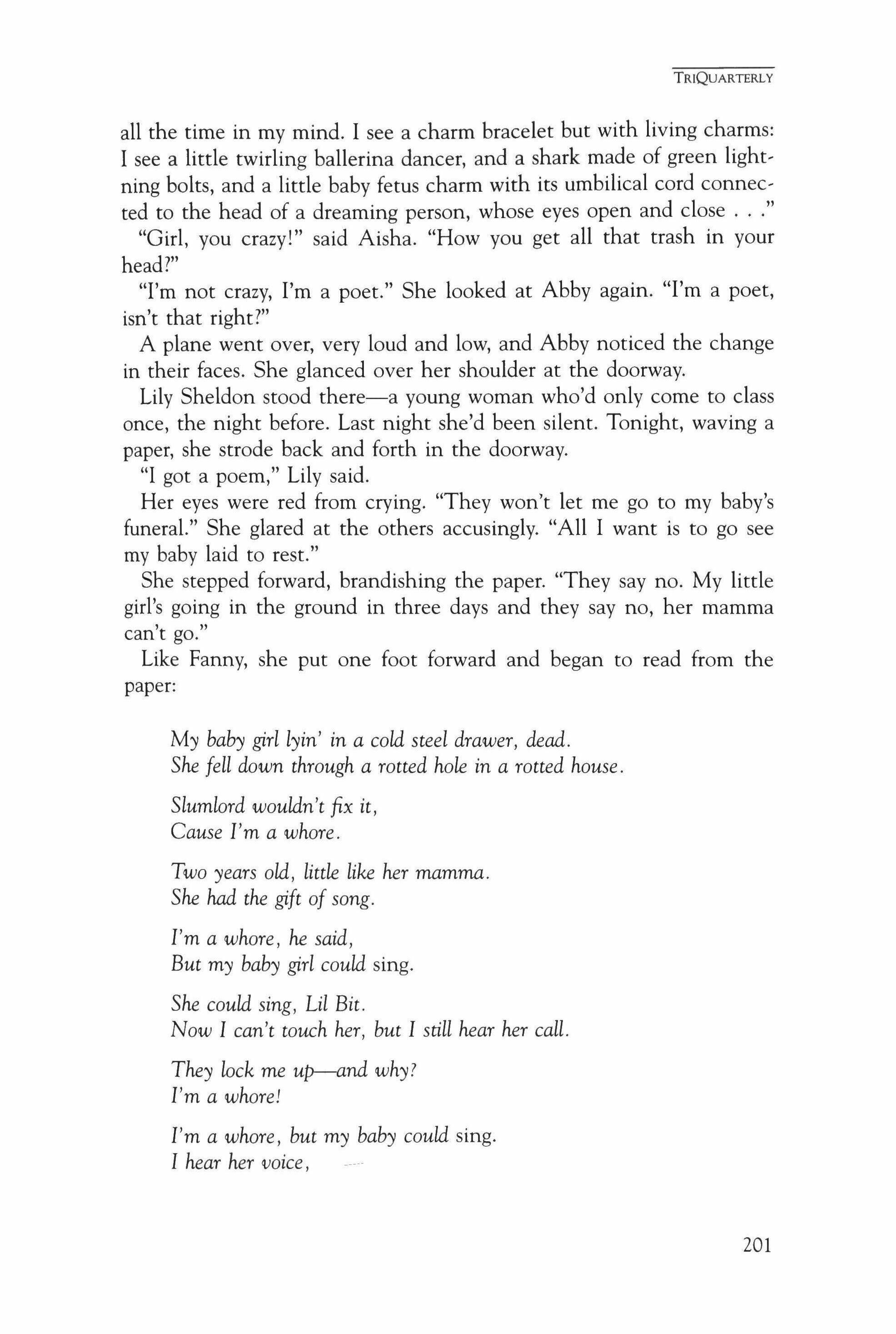
all the time in my mind. I see a charm bracelet but with living charms: I see a little twirling ballerina dancer, and a shark made of green lightning bolts, and a little baby fetus charm with its umbilical cord connected to the head of a dreaming person, whose eyes open and close "Girl, you crazy!" said Aisha. "How you get all that trash in your head?"
"I'm not crazy, I'm a poet." She looked at Abby again. "I'm a poet, isn't that right?"
A plane went over, very loud and low, and Abby noticed the change in their faces. She glanced over her shoulder at the doorway.
Lily Sheldon stood there-a young woman who'd only come to class once, the night before. Last night she'd been silent. Tonight, waving a paper, she strode back and forth in the doorway.
"I got a poem," Lily said.
Her eyes were red from crying. "They won't let me go to my baby's funeral." She glared at the others accusingly. "All I want is to go see my baby laid to rest."
She stepped forward, brandishing the paper. "They say no. My little girl's going in the ground in three days and they say no, her mamma can't go."
Like Fanny, she put one foot forward and began to read from the paper:
My baby girllyin' in a cold steel drawer, dead. She fell down through a rotted hole in a rotted house.
Slumlord wouldn't fix it, Cause I'm a whore.
Two years old, little like her mamma. She had the gift of song.
I'm a whore, he said, But my baby girl could sing.
She could sing, Lil Bit.
Now I can't touch her, but I still hear her call.
They lock me up-and why?
I'm a whore!
I'm a whore, but my baby could sing. I hear her voice,
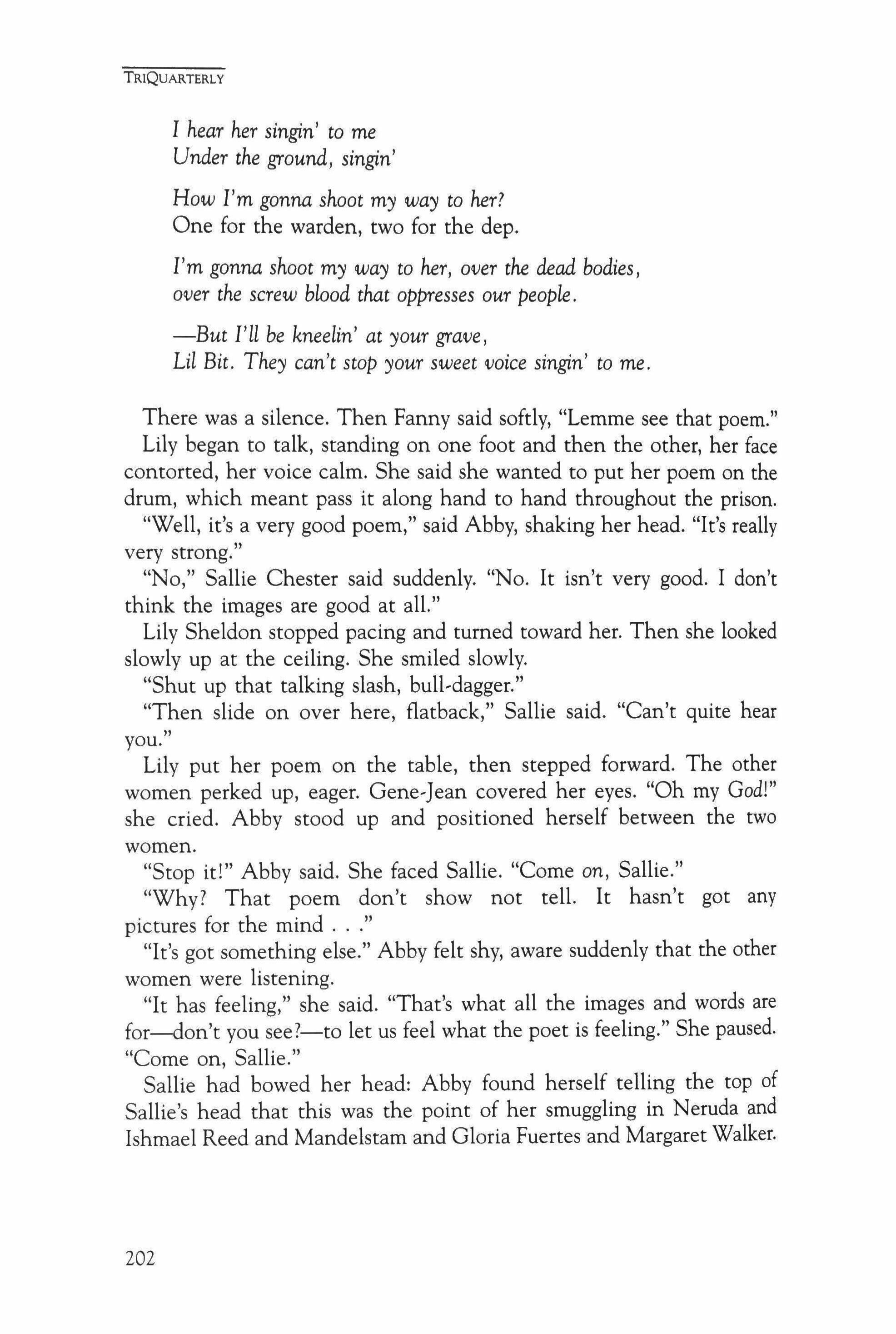
I hear her singin' to me Under the ground, singin'
How I'm gonna shoot my way to her? One for the warden, two for the dep.
I'm gonna shoot my way to her, over the dead bodies, over the screw blood that oppresses our people.
-But I'll be kneelin' at your grave, Lil Bit. They can't stop your sweet voice singin' to me.
There was a silence. Then Fanny said softly, "Lemme see that poem."
Lily began to talk, standing on one foot and then the other, her face contorted, her voice calm. She said she wanted to put her poem on the drum, which meant pass it along hand to hand throughout the prison.
"Well, it's a very good poem," said Abby, shaking her head. "It's really very strong."
"No," Sallie Chester said suddenly. "No. It isn't very good. I don't think the images are good at all."
Lily Sheldon stopped pacing and turned toward her. Then she looked slowly up at the ceiling. She smiled slowly.
"Shut up that talking slash, bull-dagger."
"Then slide on over here, flatback," Sallie said. "Can't quite hear you."
Lily put her poem on the table, then stepped forward. The other women perked up, eager. Gene-Jean covered her eyes. "Oh my God!" she cried. Abby stood up and positioned herself between the two women.
"Stop it!" Abby said. She faced Sallie. "Come on, Sallie."
"Why? That poem don't show not tell. It hasn't got any pictures for the mind "
"It's got something else." Abby felt shy, aware suddenly that the other women were listening.
"It has feeling," she said. "That's what all the images and words are for-don't you see?-to let us feel what the poet is feeling." She paused. "Come on, Sallie."
Sallie had bowed her head: Abby found herself telling the top of Sallie's head that this was the point of her smuggling in Neruda and Ishmael Reed and Mandelstam and Gloria Fuertes and Margaret Walker.

So that Sallie, all of them, could write as these poets had written: their feelings, the truth of their lives.
"Sallie gettin' a little bald," Janella murmured behind her.
When she had first started teaching the class, Abby found that despite her efforts to block these images-she'd seen the women's convictions printed out, superimposed over their faces like a list of rolling movie credits. Janella Reedy was a "mule" who carried drugs back and forth between Kennedy and Bogota; Sallie Chester had killed her pimp; Fanny Jackson was a prostitute who picked pockets; Rabbit Sherman, was a strange, wan girl who'd held her baby out a seventeenth floor win, dow in the projects-then let her go, convinced the baby would fly; Carmen Estevez forged welfare checks; Gene-jean Bondy was halfway through a sex-change operation when she'd propositioned a cop; Sugar Porter shot up; Aisha jostled.
As she talked, legal descriptions and numbers unscrolled again in front of their listening faces. She knew what she knew about their records only because the C.O.'s had filled her in-c-Gene-jean or Aisha or Rabbit would never talk about what was written under their mug shots in criminal court. Pictures in the mind. Here they were not supposed to be jostlers or forgers-she had told them that the first day: here they were poets.
She saw Sallie before her again, glanced down at the wrinkled Rainbow tablet clutched in her hand: a lined page covered with elaborate cursive handwriting in neon purple ink. At the top of the page in huge purple capital letters were printed the words: SALLIE CHESTER, A.K.A. THE GREAT POET!!!
At last Sallie raised her head. There was an unreadable expression on her split face.
"You said there was supposed to be images." She stepped back, flick, ing her tablet closed, holding Abby in her gaze. Then she shrugged, shot Lily Sheldon a long fathomless look, pocketed her tablet and walked out.
Abby started after her, but Lily put a hand on her arm. Her eyes were huge. She was tiny, barely up to Abby's shoulder, like a child herself in her ribboned cornrows.
Without introduction, she broke the taboo: she began to talk about the crime she was accused of committing. At first, her account followed a sad, patented kind of girlfriend/moll plot, the inevitable
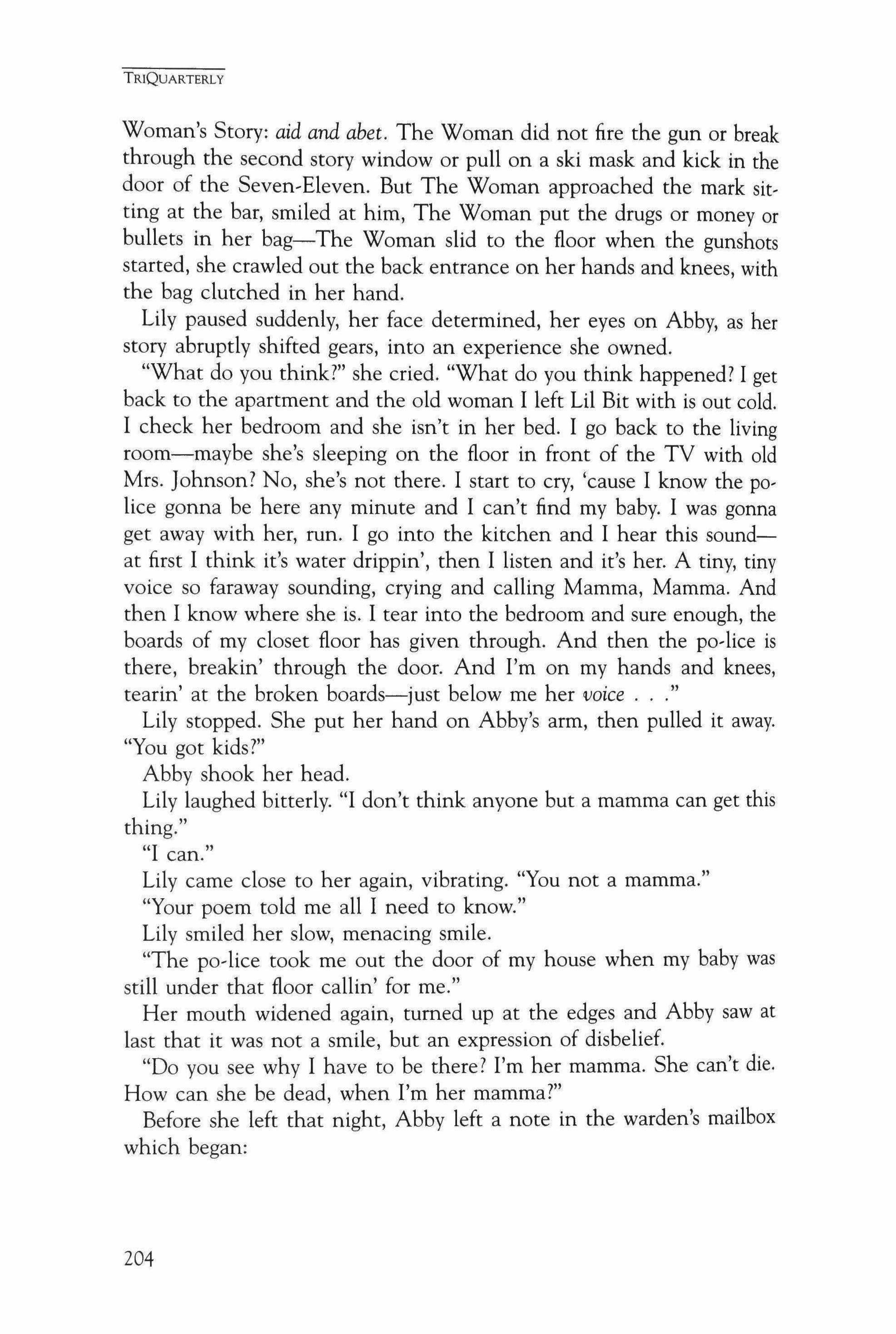
Woman's Story: aid and abet. The Woman did not fire the gun or break through the second story window or pull on a ski mask and kick in the door of the Seven-Eleven. But The Woman approached the mark sitting at the bar, smiled at him, The Woman put the drugs or money or bullets in her bag-The Woman slid to the floor when the gunshots started, she crawled out the back entrance on her hands and knees, with the bag clutched in her hand.
Lily paused suddenly, her face determined, her eyes on Abby, as her story abruptly shifted gears, into an experience she owned.
"What do you think?" she cried. "What do you think happened? I get back to the apartment and the old woman I left Lil Bit with is out cold. I check her bedroom and she isn't in her bed. I go back to the living room-maybe she's sleeping on the floor in front of the TV with old Mrs. Johnson? No, she's not there. I start to cry, 'cause I know the police gonna be here any minute and I can't find my baby. I was gonna get away with her, run. I go into the kitchen and I hear this soundat first I think it's water drippin', then I listen and it's her. A tiny, tiny voice so faraway sounding, crying and calling Mamma, Mamma. And then I know where she is. I tear into the bedroom and sure enough, the boards of my closet floor has given through. And then the po-lice is there, breakin' through the door. And I'm on my hands and knees, tearin' at the broken boards-just below me her voice ."
Lily stopped. She put her hand on Abby's arm, then pulled it away. "You got kids?"
Abby shook her head.
Lily laughed bitterly. "I don't think anyone but a mamma can get this thing."
"I can."
Lily came close to her again, vibrating. "You not a mamma."
"Your poem told me all I need to know."
Lily smiled her slow, menacing smile.
"The po-lice took me out the door of my house when my baby was still under that floor callin' for me."
Her mouth widened again, turned up at the edges and Abby saw at last that it was not a smile, but an expression of disbelief.
"Do you see why I have to be there? I'm her mamma. She can't die. How can she be dead, when I'm her mamma?"
Before she left that night, Abby left a note in the warden's mailbox which began:
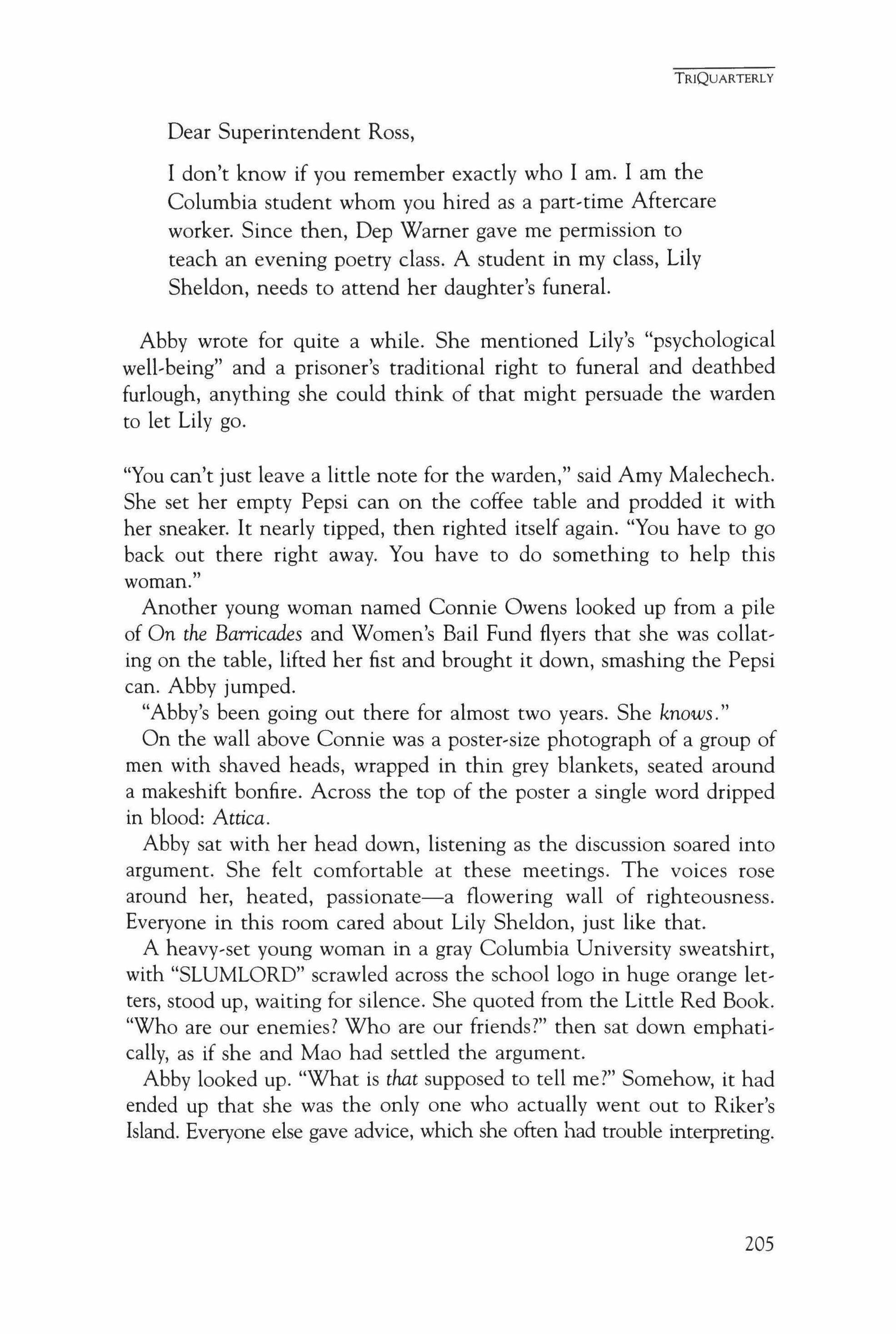
Dear Superintendent Ross,
I don't know if you remember exactly who I am. I am the Columbia student whom you hired as a part-time Aftercare worker. Since then, Dep Warner gave me permission to teach an evening poetry class. A student in my class, Lily Sheldon, needs to attend her daughter's funeral.
Abby wrote for quite a while. She mentioned Lily's "psychological well-being" and a prisoner's traditional right to funeral and deathbed furlough, anything she could think of that might persuade the warden to let Lily go.
"You can't just leave a little note for the warden," said Amy Malechech. She set her empty Pepsi can on the coffee table and prodded it with her sneaker. It nearly tipped, then righted itself again. "You have to go back out there right away. You have to do something to help this woman."
Another young woman named Connie Owens looked up from a pile of On the Barricades and Women's Bail Fund flyers that she was collating on the table, lifted her fist and brought it down, smashing the Pepsi can. Abby jumped.
"Abby's been going out there for almost two years. She knows."
On the wall above Connie was a poster-size photograph of a group of men with shaved heads, wrapped in thin grey blankets, seated around a makeshift bonfire. Across the top of the poster a single word dripped in blood: Attica.
Abby sat with her head down, listening as the discussion soared into argument. She felt comfortable at these meetings. The voices rose around her, heated, passionate-a flowering wall of righteousness. Everyone in this room cared about Lily Sheldon, just like that.
A heavy-set young woman in a gray Columbia University sweatshirt, with "SLUMLORD" scrawled across the school logo in huge orange letters, stood up, waiting for silence. She quoted from the Little Red Book. "Who are our enemies? Who are our friends?" then sat down emphatically, as if she and Mao had settled the argument.
Abby looked up. "What is that supposed to tell me?" Somehow, it had ended up that she was the only one who actually went out to Riker's Island. Everyone else gave advice, which she often had trouble interpreting.
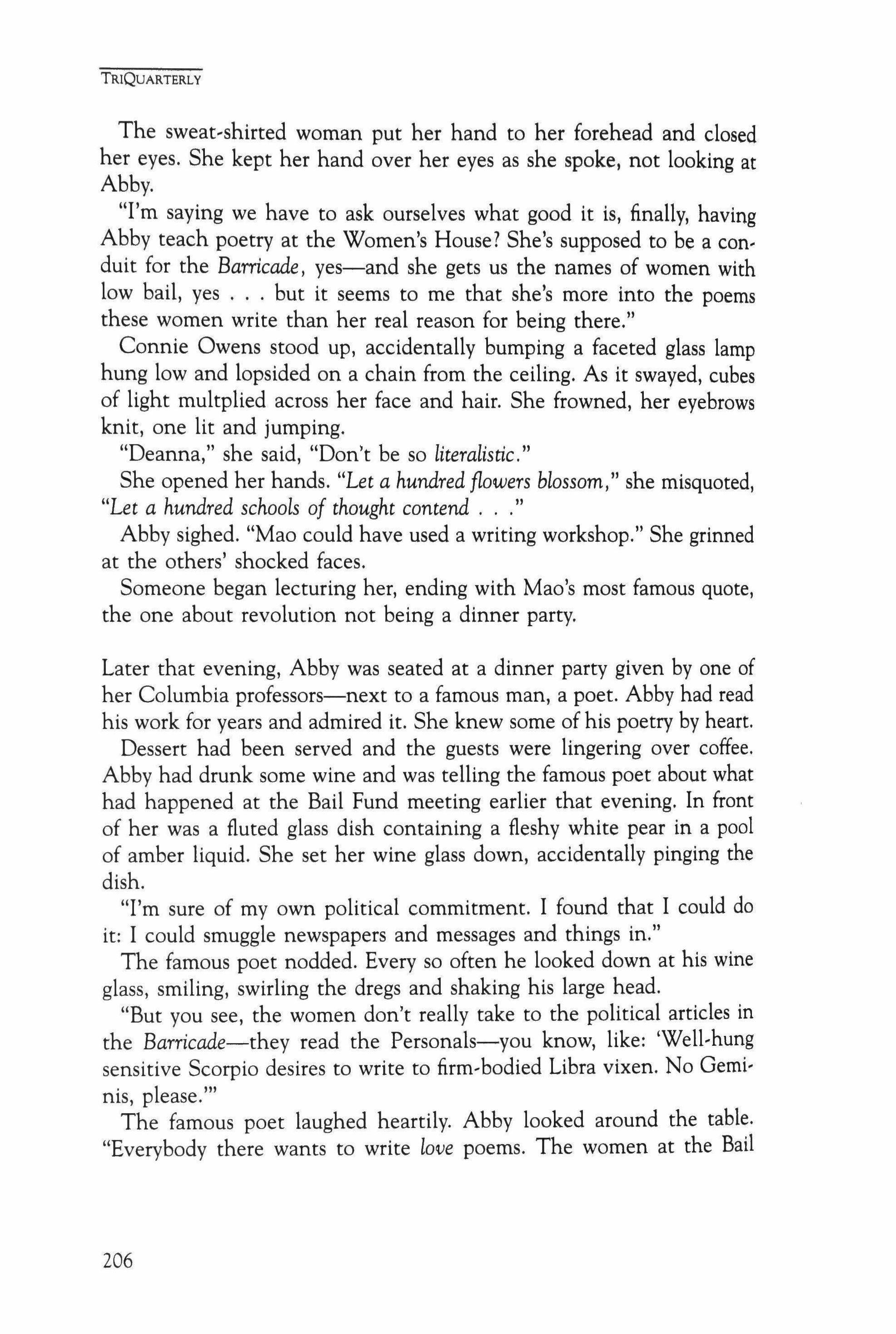
The sweat-shirred woman put her hand to her forehead and closed her eyes. She kept her hand over her eyes as she spoke, not looking at Abby.
"I'm saying we have to ask ourselves what good it is, finally, having Abby teach poetry at the Women's House? She's supposed to be a conduit for the Barricade, yes-and she gets us the names of women with low bail, yes but it seems to me that she's more into the poems these women write than her real reason for being there."
Connie Owens stood up, accidentally bumping a faceted glass lamp hung low and lopsided on a chain from the ceiling. As it swayed, cubes of light multplied across her face and hair. She frowned, her eyebrows knit, one lit and jumping.
"Deanna," she said, "Don't be so literalistic."
She opened her hands. "Let a hundred flowers blossom," she misquoted, "Let a hundred schools of thought contend ."
Abby Sighed. "Mao could have used a writing workshop." She grinned at the others' shocked faces.
Someone began lecturing her, ending with Mao's most famous quote, the one about revolution not being a dinner party.
Later that evening, Abby was seated at a dinner party given by one of her Columbia professors-next to a famous man, a poet. Abby had read his work for years and admired it. She knew some of his poetry by heart.
Dessert had been served and the guests were lingering over coffee. Abby had drunk some wine and was telling the famous poet about what had happened at the Bail Fund meeting earlier that evening. In front of her was a fluted glass dish containing a fleshy white pear in a pool of amber liquid. She set her wine glass down, accidentally pinging the dish.
"I'm sure of my own political commitment. I found that I could do it: I could smuggle newspapers and messages and things in."
The famous poet nodded. Every so often he looked down at his wine glass, smiling, swirling the dregs and shaking his large head.
"But you see, the women don't really take to the political articles in the Barricade-they read the Personals-you know, like: 'Well�hung sensitive Scorpio desires to write to firm-bodied Libra vixen. No Geminis, please.'"
The famous poet laughed heartily. Abby looked around the table. "Everybody there wants to write love poems. The women at the Bail
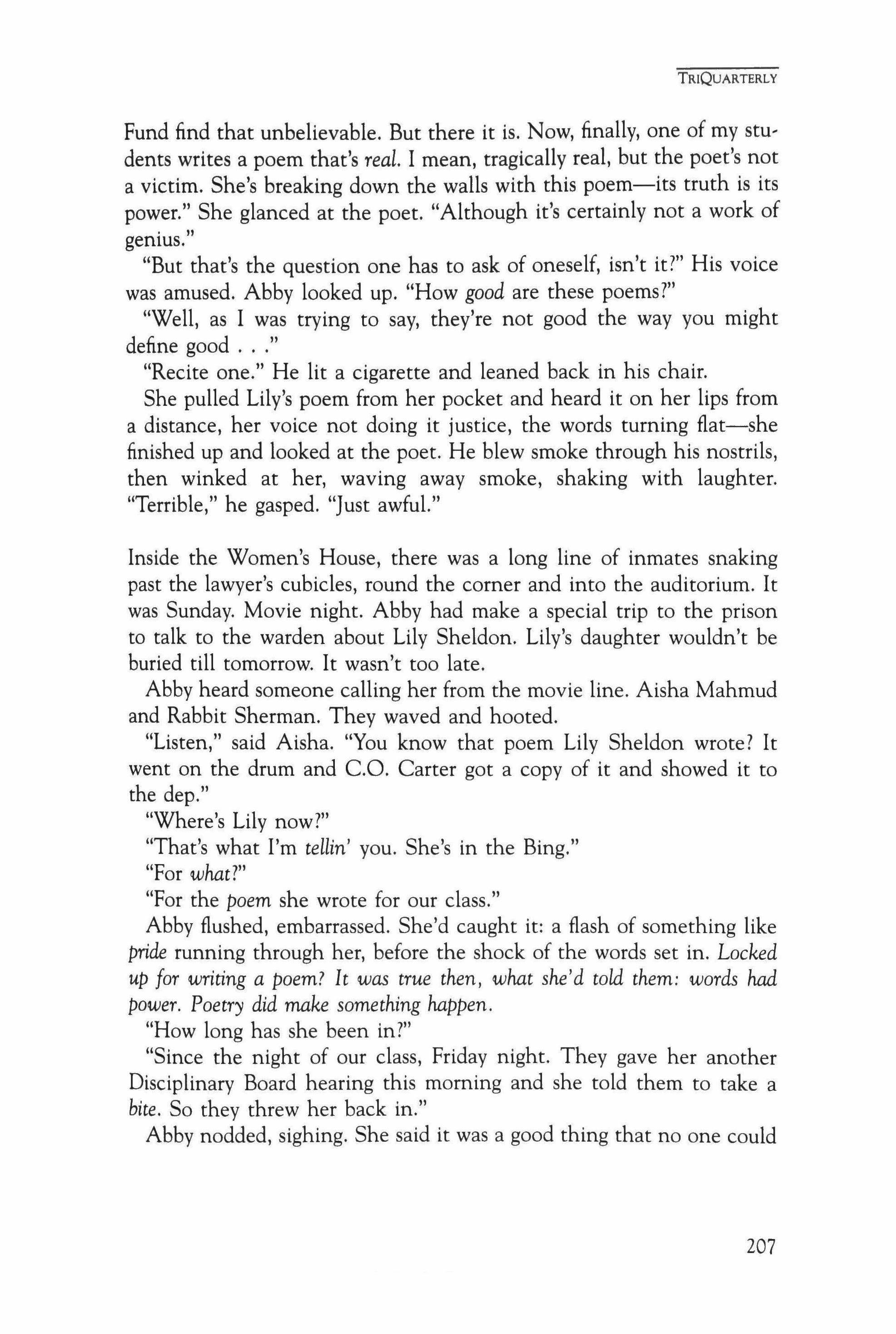
Fund find that unbelievable. But there it is. Now, finally, one of my students writes a poem that's real. I mean, tragically real, but the poet's not a victim. She's breaking down the walls with this poem-its truth is its power." She glanced at the poet. "Although it's certainly not a work of genius."
"But that's the question one has to ask of oneself, isn't it?" His voice was amused. Abby looked up. "How good are these poems?"
"Well, as I was trying to say, they're not good the way you might define good ."
"Recite one." He lit a cigarette and leaned back in his chair.
She pulled Lily's poem from her pocket and heard it on her lips from a distance, her voice not doing it justice, the words turning flat-she finished up and looked at the poet. He blew smoke through his nostrils, then winked at her, waving away smoke, shaking with laughter. "Terrible," he gasped. "Just awful."
Inside the Women's House, there was a long line of inmates snaking past the lawyer's cubicles, round the corner and into the auditorium. It was Sunday. Movie night. Abby had make a special trip to the prison to talk to the warden about Lily Sheldon. Lily's daughter wouldn't be buried till tomorrow. It wasn't too late.
Abby heard someone calling her from the movie line. Aisha Mahmud and Rabbit Sherman. They waved and hooted.
"Listen," said Aisha. "You know that poem Lily Sheldon wrote? It went on the drum and C.O. Carter got a copy of it and showed it to the dep."
"Where's Lily now?"
"That's what I'm tellin' you. She's in the Bing."
"For what?"
"For the poem she wrote for our class."
Abby flushed, embarrassed. She'd caught it: a flash of something like pride running through her, before the shock of the words set in. Locked up for writing a poem? It was true then, what she'd told them: words had power. Poetry did make something happen.
"How long has she been in?"
"Since the night of our class, Friday night. They gave her another Disciplinary Board hearing this morning and she told them to take a bite. So they threw her back in."
Abby nodded, sighing. She said it was a good thing that no one could
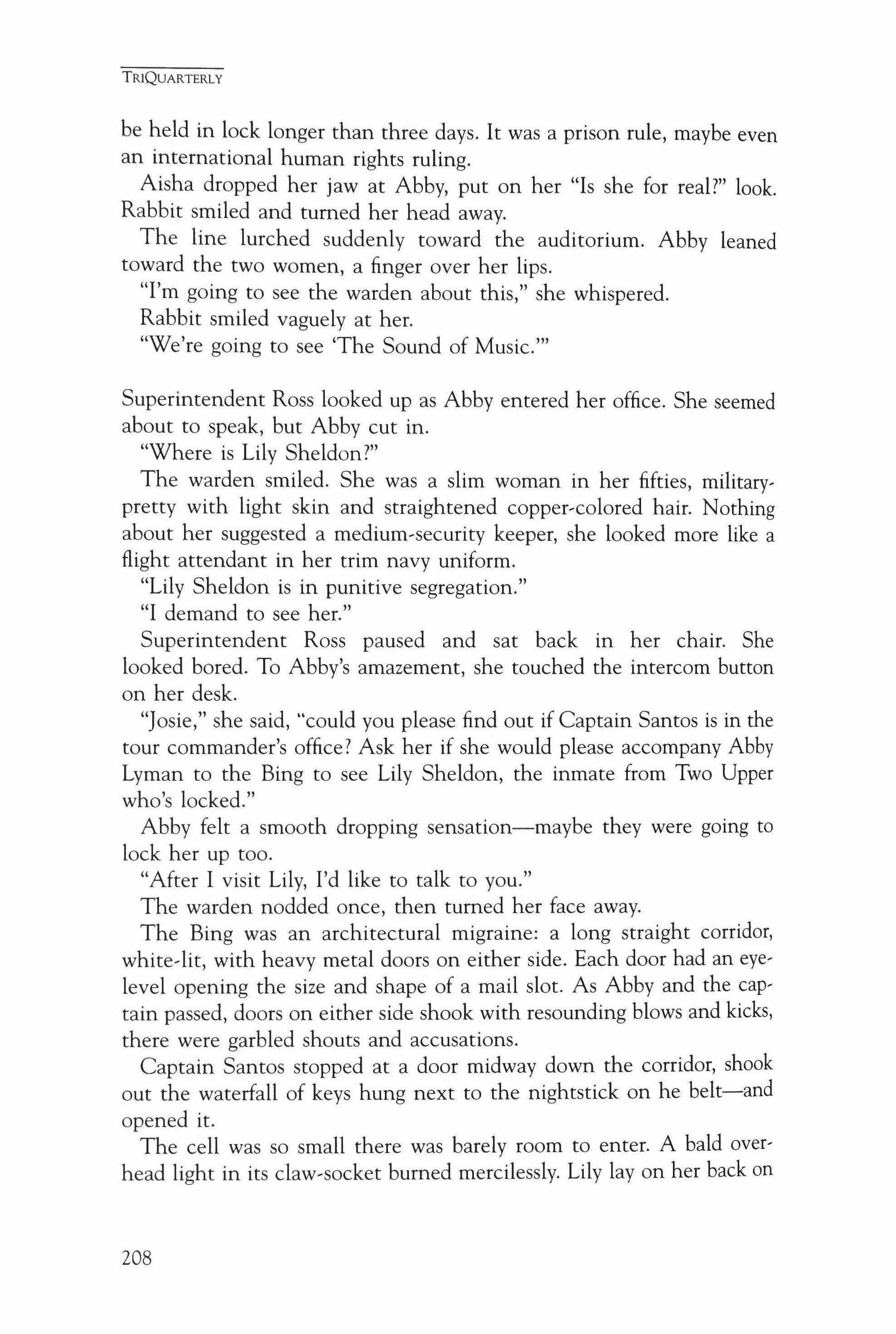
be held in lock longer than three days. It was a prison rule, maybe even an international human rights ruling.
Aisha dropped her jaw at Abby, put on her "Is she for real?" look. Rabbit smiled and turned her head away.
The line lurched suddenly toward the auditorium. Abby leaned toward the two women, a finger over her lips.
"I'm going to see the warden about this," she whispered.
Rabbit smiled vaguely at her.
"We're going to see 'The Sound of Music.'"
Superintendent Ross looked up as Abby entered her office. She seemed about to speak, but Abby cut in.
"Where is Lily Sheldon?"
The warden smiled. She was a slim woman in her fifties, militarypretty with light skin and straightened copper-colored hair. Nothing about her suggested a medium-security keeper, she looked more like a flight attendant in her trim navy uniform.
"Lily Sheldon is in punitive segregation."
"I demand to see her."
Superintendent Ross paused and sat back in her chair. She looked bored. To Abby's amazement, she touched the intercom button on her desk.
"Josie," she said, "could you please find out if Captain Santos is in the tour commander's office? Ask her if she would please accompany Abby Lyman to the Bing to see Lily Sheldon, the inmate from Two Upper who's locked."
Abby felt a smooth dropping sensation-maybe they were going to lock her up too.
"After I visit Lily, I'd like to talk to you."
The warden nodded once, then turned her face away.
The Bing was an architectural migraine: a long straight corridor, white-lit, with heavy metal doors on either side. Each door had an eyelevel opening the size and shape of a mail slot. As Abby and the captain passed, doors on either side shook with resounding blows and kicks, there were garbled shouts and accusations.
Captain Santos stopped at a door midway down the corridor, shook out the waterfall of keys hung next to the nightstick on he belt-and opened it.
The cell was so small there was barely room to enter. A bald overhead light in its claw-socket burned mercilessly. Lily lay on her back on

a thin mattress, her arms and legs thrown out casually, her face lifted to the light like a tanning salon patron. She pulled herself up to a sit, ting position. Her hair was wild, the cornrows half-unraveled and stick, ing straight up. She did not appear to recognize Abby.
"Sheldon," said Captain Santos, "your teacher is here to see you."
Lily looked idly at the guard and spit. Captain Santos looked down at the saliva which hung on her skirt, then fell. Abby watched the Captain's face grow very calm. She moved to the door and stood there.
"I got my eye on you, Sheldon."
Abby sat down tentatively on the edge of the mattress and touched Lily's hand.
"What the hell was the matter with that poem you wrote?"
"No images!" Lily croaked and they collapsed against each other.
"Are you sick?"
Lily rubbed her forehead and laughed sadly. "My body's okay, but my head's dyin'."
"What do you need?"
"I need a furlough by tomorrow to hold my baby one last time. I ain't gonna get it! Am I?" She slumped into Abby. "Look what's happened to me!" She lifted her head and put it on Abby's shoulder, like an ill, exhausted child.
Abby followed Lily's gaze to the wall. There was graffiti scratched on the cement-how? Hairpins, a bent spoon, bones? There were names of former residents: Sweet Duchess and Cola, Death Mamba, La Reina de Dolorosa, Cruise Top, Shudder Honey: a cobweb of names. Fresh scratches beneath: Lil Bit, Lil Bit.
Lily drew an audible breath. "I need something to write with. I need a pen. I need paper. I'm bleedin' poems."
"Captain Santos." Abby cleared her throat. "Could you please see that Lily has some pens and paper?"
"You just go on ahead and bring that matter up with Superintendent Ross, Miss Lyman."
"Come on, Captain, what are you afraid of?"
"Time's way up."
"The truth?" said Abby. She pulled gently away from Lily and faced the woman. Captain Santos gave her the same "Are you for real?" look Aisha used. She moved a fraction of an inch closer to Abby.
"I'm not afraid of anything in this room," she said. She cocked one hip and waited.

Abby turned back to Lily. "I'm on my way to Ross. I'm going to make them let you go."
Lily's smile pulled apart into a grimace. She grasped Abby's hand as she stood up and Abby bowed awkwardly to her, her arm pulled out in a kind of downward salute.
"I'm gonna write a book, Abby. I'm gonna write this down for the whole world to know."
Superintendent Ross looked up as Abby walked boldly in and sat down.
"I just want to ask you what the reason is for Lily Sheldon's confinement in the Bing and then I want to know what I have to do to get her released. In the meantime, I'm requesting that she be given writing materials."
"For more 'poems' perhaps?" "Perhaps."
The warden laughed. "You must be kidding."
Abby stood up, then sat back down again. She took a breath to steady herself.
"What was wrong with that poem? Why did you lock her up for writing it?"
"You know," said the warden, smiling, "you really are an idea girl. When you first came up with this notion of a poetry workshop, I wasn't inclined to approve." She leaned toward Abby, emphasizing each word. "A crea-uoe wri,ting class?"
She winked at Abby, then leaned her hand protectively on a framed desktop photograph as a jet roared over. Abby started to speak, but the warden continued.
"Then they brought to class all those things they'd written, whatever you want to call them: poems, little sob stories, diaries. And here's this do-gooder college girl sorting them all out She chuckled to herself.
Abby opened her mouth again, but Ross held up her hand.
"I'm aware how you think poetry's so important. I also know you think the ladies are victims of an unfair system. Isn't that how you might put it? 'Victims of an unfair system'?"
Abby straightened up in her chair. There were a series of muffled announcements over the public address system.
"I know for example, that you bring in that newsletter, On the Barricade, and Hershey bars, cookies and you bring in other con-

traband: spiral notebooks, pens. Unauthorized books. You seem to think our security regulations don't apply to you."
Abby sat very still.
"I suppose, on one level, you're right. A little bit of irregularity, a lit, tle sugar allowed now and then, and they think they're getting away with something. It amounts to nothing. But you see Another smile. "That's not the way it is."
She lifted a little glass bell shaped like an angel from her desktop and rattled it twice. There was a barely audible clink. She set it down, smiling to herself. "Christmas here at the Women's House-can you imagine what that's like? Ladies ready to break out, ladies ready to stick their heads in the toilet after one visit from their children who can't rernember them anymore-it's a free-for-all. Plus all the big companies send us holiday guilt donations: clothes, teddy bears, fruit, candies, games. One year some cosmetic company decided to send a little care package: a black satin pouch stuffed with cologne and powder and lipstick and deodorant. We checked for possible contraband uses: took out all the metal nail files and the non-shatter-proof bottles and the plastic bags. We worked overtime on Christmas Eve and then, finally, Santa Claus was sent off to all the floors to deliver the gifts. We waited: all was calm and then She shook the glass bell again. "Clink, crack, clink! All over the institution we heard the sound of glass breaking." Abby cocked her head, interested in spite of herself.
"The cosmetic company had tucked a deodorant with a little glass roller ball into the lip of the pouch and we hadn't caught it. Within five minutes of distribution, they were armed with glass, had cut their wrists with glass or swallowed glass." She snapped her fingers. "That fast."
She shook her head at Abby and laughed. "Still, your contraband's a little different. Nobody in their right mind would ever take On the Barricade seriously. We pick it up all the time on raids. The inmates throw it away-we read it at coffee breaks for laughs."
She laughed again, as if to capture the mood of these high-spirited coffee breaks. Another plane shook the building. "Do you think," she asked, "that I don't know what's going on? I found out finally that you were teaching them something about the subject. About how to write. I have my eyes and ears in that class-or didn't you know?"
Abby, stung, was already unrolling the list in her mind: Fanny, Gene, Jean, Sugar, Janella, Rabbit, Carmen

The warden smiled at her expression. A C.O. knocked softly and entered carrying a stainless-steel coffeepot and a white china mug on a tray. She set the tray down in front of the warden and exited, with a quick sidewise look at Abby.
"Coffee?" The warden poured and drank.
"No," said Abby. "No thanks." She was still running through names and faces.
"When things get confused, I step in. Some things went wrong in your class. Let's say you betrayed a certain trust." She looked up mildly from her coffee, blotting her lips on a paper napkin.
"Excuse me. Did you think we had some sort of unspoken agreement about subject matter?"
Another laugh. "Miss Lyman, here we have an inmate who writes down on paper that she intends to murder the superintendent and the deputy warden, in order to break out of prison. She received praise for this from a teacher in an institution classroom. The teacher further encouraged class members to copy these threats of violence and spread them throughout the facility "
"I didn't do that. I simply said "What you've done is tantamount to inciting a riot. In many ways you're guiltier than she is, since you were in the position of responsibility."
Abby started to say, "No I wasn't," but stopped herself.
"They were dancing in the halls to it. Finger-popping, 'One for the warden, two for the dep,' like that."
Abby pictured the inmates, jiving up and down the Lshaped corridors, snapping their fingers. She coughed into her hand.
The warden sat back in her chair and pulled open a desk drawer, fished something out, then slammed it shut.
"You feel sorry for Lily, don't you? I mean, seeing her up there in the Bing crying?"
She slid a manila folder across the desk to Abby and flipped it open. Abby glimpsed her second finger, left hand: a stiff, too-tan prosthetic digit and bright-painted nail. There was a story that circulated about this finger-that years earlier a very young e.O. Ross, on duty in the kitchen, had tried to show an inmate how to chop marrow bones for stew-she'd gone so far as to graciously offer her own finger as an example. Seeing the finger made Abby think of Sallie Chester: her image for death.
Then she looked at the contents of the folder: an 8xlO black-and-

white photograph of a dead two-year-old girl. The tiny, naked body was a storm of bruises and welts, from the great blood rip of scalp sheared away from her small, com-rowed skull to her battered legs, bird-thin. At the top of the photo was stamped in red indelible ink "Manhattan County Coroner's Office." Abby located the child's expression, a miniature of Lily's, the lips upturned in a smile that was really a grimace of disbelief. Abby turned her head away.
"Why are you showing me this? I know how Lily's daughter died."
"Like you, I'm aware of Sheldon's testimony. Look at this."
She pulled a second photograph from beneath the first, this one taken of the child's body on its face. Tiny bruised buttocks and spine, the arms and legs, like Lily's in the Bing, thrown out to the sides.
"See this large discolored area? The coroner told the D.A. who tells me that this is a contusion caused by a blow, or a series of blows, to the head and neck. I asked for these at the time of Lily's request for a furlough. The coroner, you see, examined this discoloration and the others here at the child's autopsy. He maintains that they could not have been caused by a fall, even through a floor-he thinks that they are the result of blows from a blunt instrument, a heavy boot heel, or a walking stick." She made her hand into a battering wedge and struck a rounded glass paper weight. "Crunch," she said. "Crunch-crunch!" Abby looked up, shocked, but the warden was not laughing.
"Are you telling me that the old woman Lily left her baby with did this?"
The warden shook her head. "The D.A. feels this evidence indicates the child received this treatment from an adult-an adult with some strength."
Abby placed the photos on top of the folder.
"Look." A magnifying glass blazed in the warden's hand. It slid across the first photograph and the frail arms and legs leaped wildly at the lens' touch, then a patch of skin stood proffered, like the enlarged surface of a jewel. Abby could see the faintest brushing of hairs on the forearm, then three circular puckered wounds.
"Blisters? Or cigarette bums? What do you think?"
Abby pushed the lens violently aside-it slid upward, magnifying the child's open left eye, which stared back at them, huge and expectant.
After a moment she spoke. "Someone 'else' who lived in the house. You mean Lily's husband?"
The warden put her head down then looked up and shook it to and fro. "Pimp," she said. "Lily's pimp. He went out the back door that night.
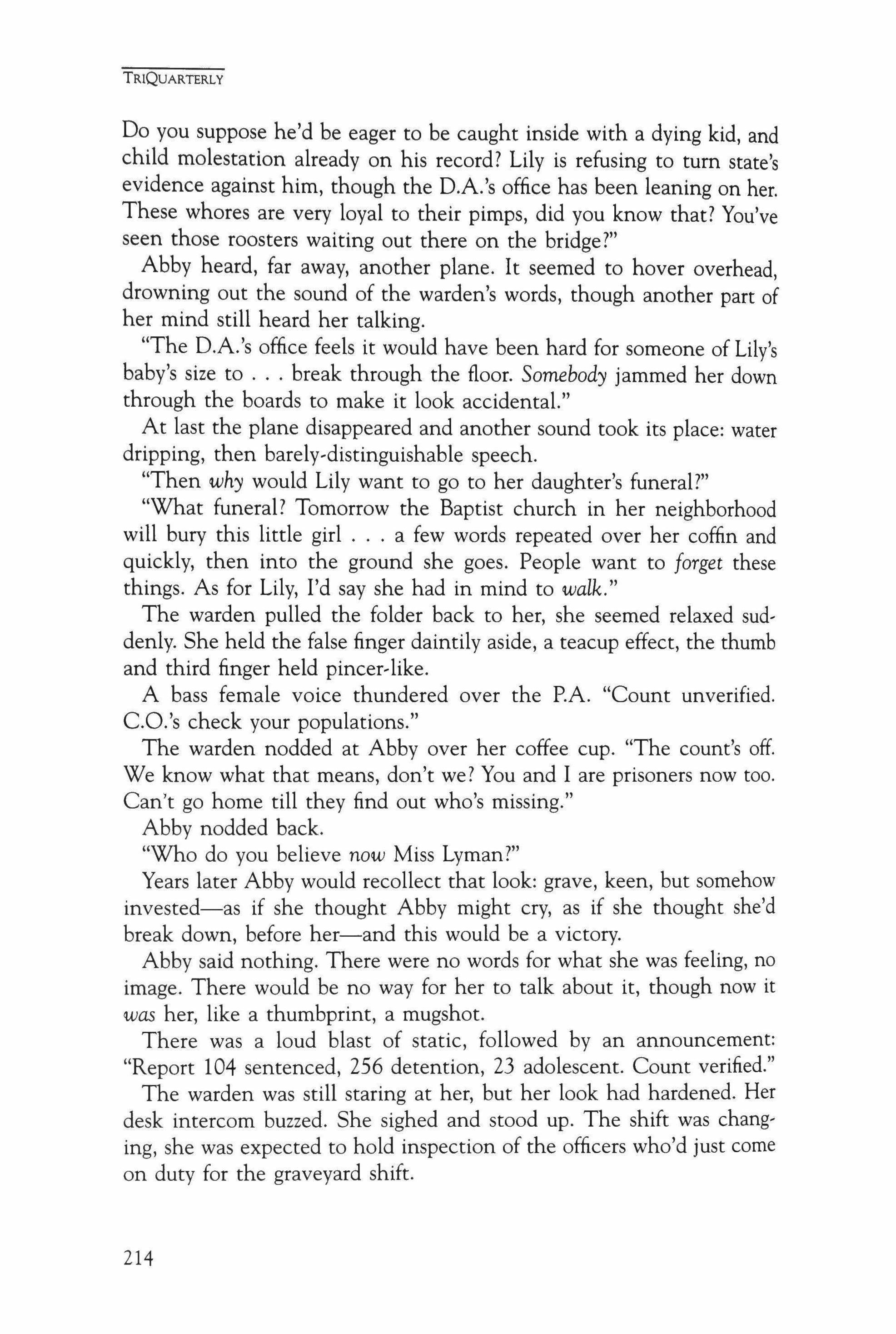
Do you suppose he'd be eager to be caught inside with a dying kid, and child molestation already on his record? Lily is refusing to turn state's evidence against him, though the D.A.'s office has been leaning on her. These whores are very loyal to their pimps, did you know that? You've seen those roosters waiting out there on the bridge?"
Abby heard, far away, another plane. It seemed to hover overhead, drowning out the sound of the warden's words, though another part of her mind still heard her talking.
"The D.A.'s office feels it would have been hard for someone of Lily's baby's size to break through the floor. Somebody jammed her down through the boards to make it look accidental."
At last the plane disappeared and another sound took its place: water dripping, then barely-distinguishable speech.
"Then why would Lily want to go to her daughter's funeral?"
"What funeral? Tomorrow the Baptist church in her neighborhood will bury this little girl a few words repeated over her coffin and quickly, then into the ground she goes. People want to forget these things. As for Lily, I'd say she had in mind to walk."
The warden pulled the folder back to her, she seemed relaxed suddenly. She held the false finger daintily aside, a teacup effect, the thumb and third finger held pincer-like.
A bass female voice thundered over the P.A. "Count unverified. C.O.'s check your populations."
The warden nodded at Abby over her coffee cup. "The count's off. We know what that means, don't we? You and I are prisoners now too. Can't go home till they find out who's missing."
Abby nodded back.
"Who do you believe now Miss Lyman?"
Years later Abby would recollect that look: grave, keen, but somehow invested-as if she thought Abby might cry, as if she thought she'd break down, before her-and this would be a victory.
Abby said nothing. There were no words for what she was feeling, no image. There would be no way for her to talk about it, though now it was her, like a thumbprint, a mugshot.
There was a loud blast of static, followed by an announcement: "Report 104 sentenced, 256 detention, 23 adolescent. Count verified."
The warden was still staring at her, but her look had hardened. Her desk intercom buzzed. She sighed and stood up. The shift was changing, she was expected to hold inspection of the officers who'd just corne on duty for the graveyard shift.
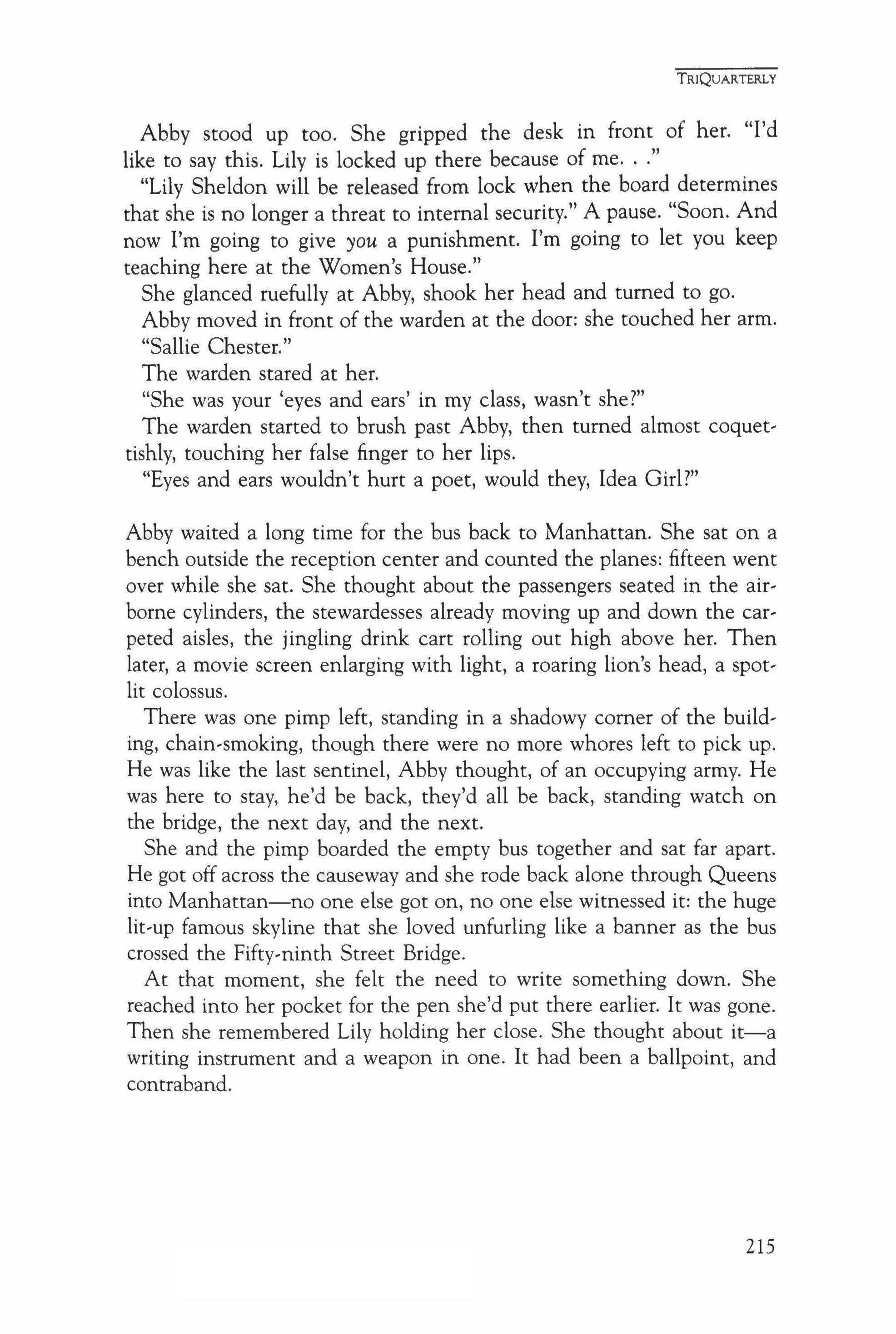
Abby stood up too. She gripped the desk in front of her. "I'd like to say this. Lily is locked up there because of me "
"Lily Sheldon will be released from lock when the board determines that she is no longer a threat to internal security." A pause. "Soon. And now I'm going to give you a punishment. I'm going to let you keep teaching here at the Women's House."
She glanced ruefully at Abby, shook her head and turned to go.
Abby moved in front of the warden at the door: she touched her arm.
"Sallie Chester."
The warden stared at her.
"She was your 'eyes and ears' in my class, wasn't she?"
The warden started to brush past Abby, then turned almost coquettishly, touching her false finger to her lips.
"Eyes and ears wouldn't hurt a poet, would they, Idea Girl?"
Abby waited a long time for the bus back to Manhattan. She sat on a bench outside the reception center and counted the planes: fifteen went over while she sat. She thought about the passengers seated in the airborne cylinders, the stewardesses already moving up and down the carpeted aisles, the jingling drink cart rolling out high above her. Then later, a movie screen enlarging with light, a roaring lion's head, a spotlit colossus.
There was one pimp left, standing in a shadowy comer of the building, chain-smoking, though there were no more whores left to pick up. He was like the last sentinel, Abby thought, of an occupying army. He was here to stay, he'd be back, they'd all be back, standing watch on the bridge, the next day, and the next.
She and the pimp boarded the empty bus together and sat far apart. He got off across the causeway and she rode back alone through Queens into Manhattan-no one else got on, no one else witnessed it: the huge lit-up famous skyline that she loved unfurling like a banner as the bus crossed the Fifty-ninth Street Bridge.
At that moment, she felt the need to write something down. She reached into her pocket for the pen she'd put there earlier. It was gone. Then she remembered Lily holding her close. She thought about it-a writing instrument and a weapon in one. It had been a ballpoint, and contraband.

The way we can love the concept, afterall-warming noon's reprieve. Deer flirt with clearings, then withdraw. They follow, just inside the wood, as we walk, just inside the road. If hand in hand. If the wind blew, a motor cranking brittle leaves, would we, too, start? Prattle inept?
We suppose "yam-bake" or "dough-pound," when kitchens of farm houses light. These few thoughts-for the will to tum, afterall. Some salve for a bum.
The way the wind. The way talk skirts, does it have, will it ever, sound?

Without Rain batters the glass. It wants at what's behind and I drip with the window's anguish. Not where you don't stand but where I do, without the day.
I am a version of stillness, or maybe stillness moves around me. The tincture of sorrow or maybe sorrow without, or maybe sorrow without its black room.
One cloud ran through the day, a scared mendicant. It was cloud, then man, then rain.

Can't stop my right moving same as my left nothing much happens to one side anyway
-I'd have to pause and think which way I'd like to go and then only glimpses of what might be there having to shake on my word or press my heart to cornerstone
-Thought I lost someone I cared for if I counted five names I counted ten didn't stop long enough to look over,shoulder (if that's where you lose someone)
-Can't say why I'm not facing a person who's folding arms to prevent an embrace my walker's leg and my brooding thumb my good eye and my dumb ear at odds with the narrows of a city sidewalk
-Thought I lost someone I cared for the sun was a stem brass pupil the moon a cracked white plate the young morning a world of light and absence come to me I said where are you where are you a thrash of long black hair across my lips
-Can't stop my right moving same as my left wish I could see you (bright red lips and spinning away) wish I could hear the sweet word of my name
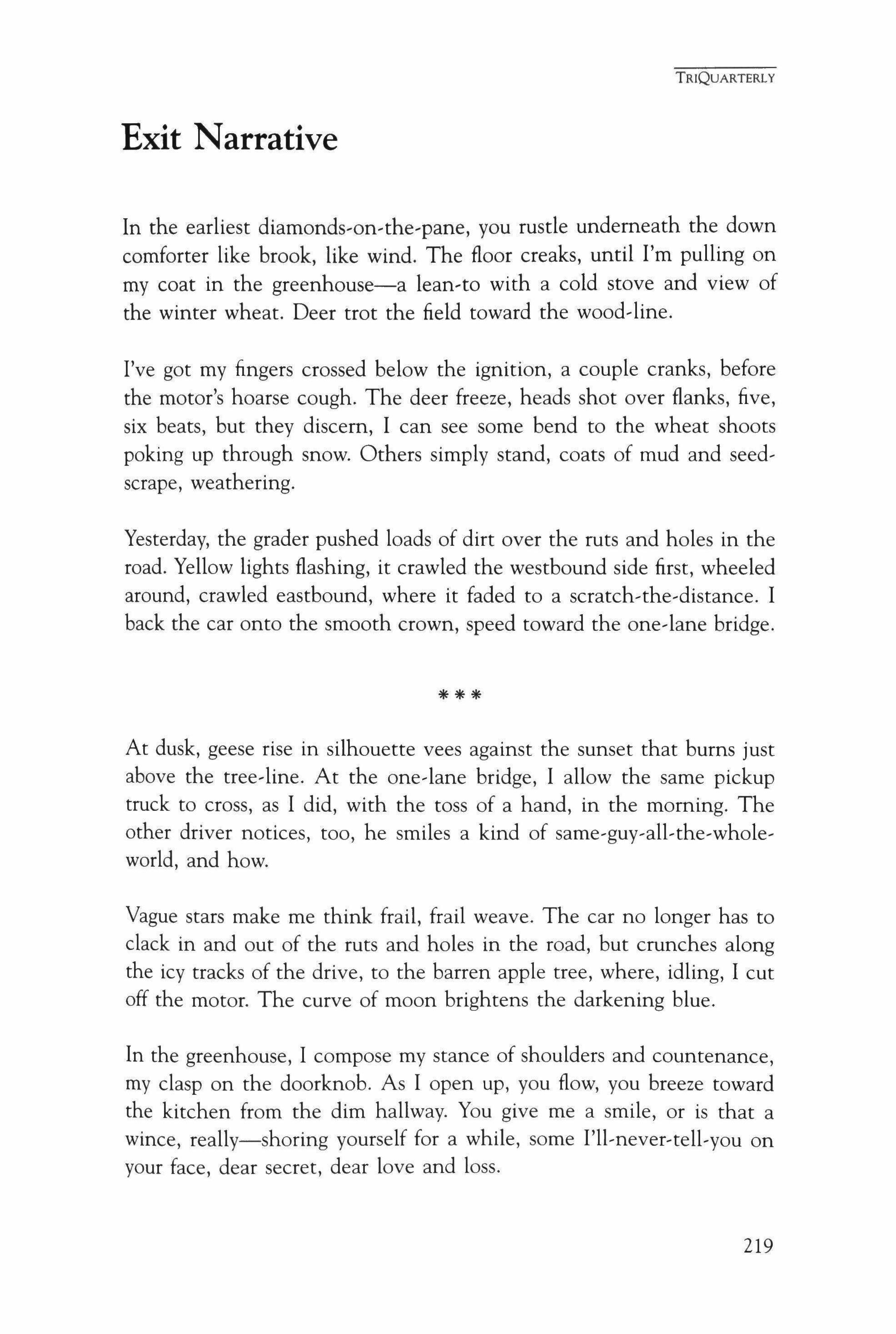
In the earliest diamonds-on-the-pane, you rustle underneath the down comforter like brook, like wind. The floor creaks, until I'm pulling on my coat in the greenhouse-a lean-to with a cold stove and view of the winter wheat. Deer trot the field toward the wood,line.
I've got my fingers crossed below the ignition, a couple cranks, before the motor's hoarse cough. The deer freeze, heads shot over flanks, five, six beats, but they discern, I can see some bend to the wheat shoots poking up through snow. Others simply stand, coats of mud and seed, scrape, weathering.
Yesterday, the grader pushed loads of dirt over the ruts and holes in the road. Yellow lights flashing, it crawled the westbound side first, wheeled around, crawled eastbound, where it faded to a scratch-the-distance. I back the car onto the smooth crown, speed toward the one, lane bridge.
At dusk, geese rise in silhouette vees against the sunset that bums just above the tree-line. At the one-lane bridge, I allow the same pickup truck to cross, as I did, with the toss of a hand, in the morning. The other driver notices, too, he smiles a kind of same-guy-all-the-wholeworld, and how.
Vague stars make me think frail, frail weave. The car no longer has to clack in and out of the ruts and holes in the road, but crunches along the icy tracks of the drive, to the barren apple tree, where, idling, I cut off the motor. The curve of moon brightens the darkening blue.
In the greenhouse, I compose my stance of shoulders and countenance, my clasp on the doorknob. As I open up, you flow, you breeze toward the kitchen from the dim hallway. You give me a smile, or is that a wince, really-shoring yourself for a while, some I'll-never-tell-you on your face, dear secret, dear love and loss.
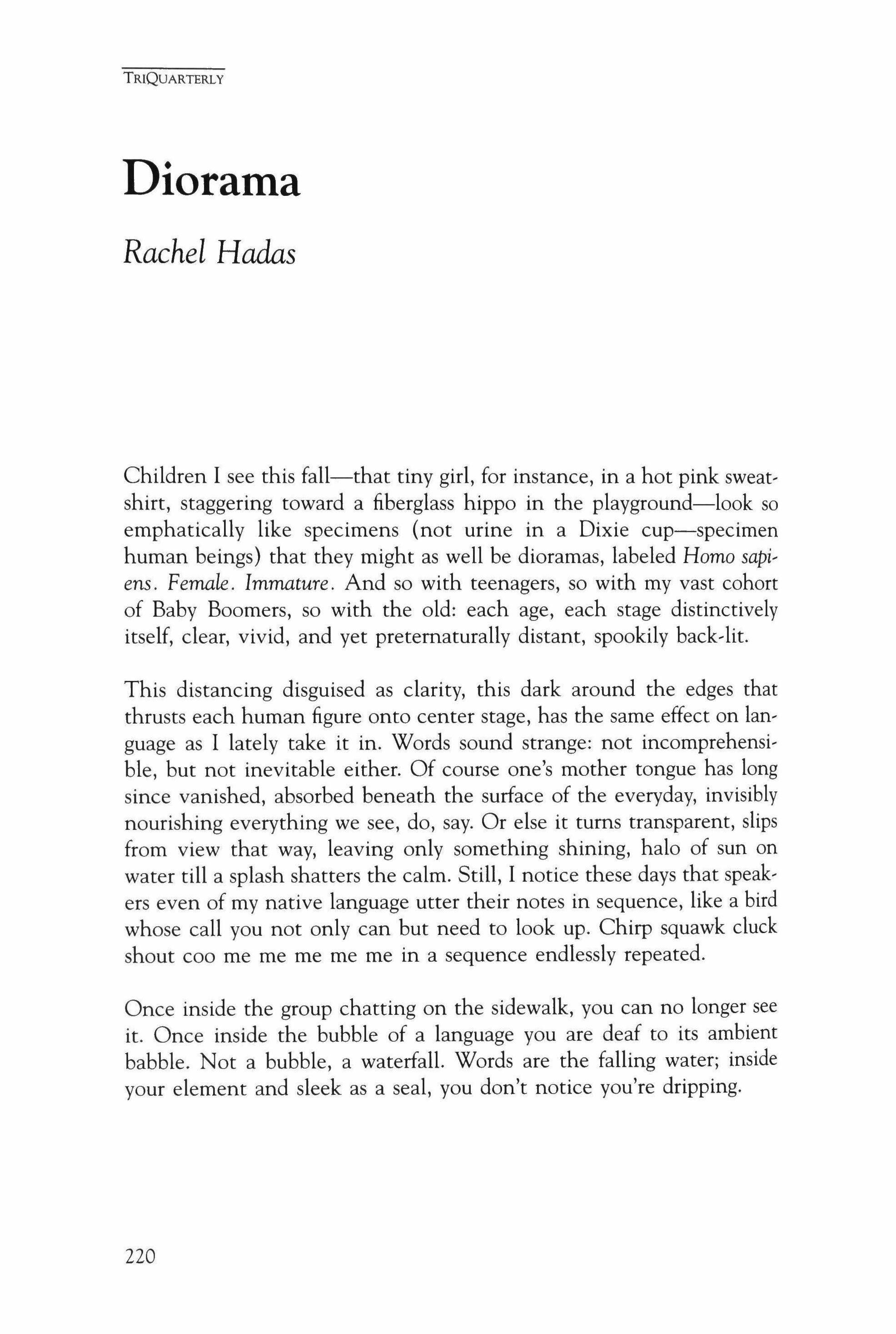
Children I see this fall-that tiny girl, for instance, in a hot pink sweatshirt, staggering toward a fiberglass hippo in the playground-look so emphatically like specimens (not urine in a Dixie cup-specimen human beings) that they might as well be dioramas, labeled Homo sapiens. Female. Immature. And so with teenagers, so with my vast cohort of Baby Boomers, so with the old: each age, each stage distinctively itself, clear, vivid, and yet preternaturally distant, spookily back-lit.
This distancing disguised as clarity, this dark around the edges that thrusts each human figure onto center stage, has the same effect on language as I lately take it in. Words sound strange: not incomprehensible, but not inevitable either. Of course one's mother tongue has long since vanished, absorbed beneath the surface of the everyday, invisibly nourishing everything we see, do, say. Or else it turns transparent, slips from view that way, leaving only something shining, halo of sun on water till a splash shatters the calm. Still, I notice these days that speakers even of my native language utter their notes in sequence, like a bird whose call you not only can but need to look up. Chirp squawk cluck shout coo me me me me me in a sequence endlessly repeated.
Once inside the group chatting on the sidewalk, you can no longer see it. Once inside the bubble of a language you are deaf to its ambient babble. Not a bubble, a waterfall. Words are the falling water; inside your element and sleek as a seal, you don't notice you're dripping.

The glass of the diorama dissolves. Effortlessly you step into the scene: a lake shimmering beyond the trees; pinkish twilit sky; stars coming out. Cross-legged round the fire sit human beings, mending nets, sharpening flints, nursing a baby, talking, talking, talking. Who are they but us? A girl in a sequined sweatshirt dashes past. I bend to read a label, and my breath fogs the glass. Glass? What glass? But yes; as skin grows back over a scar, as life grows back over a loss, the glass has grown back. The glass of age, the glass of separation.
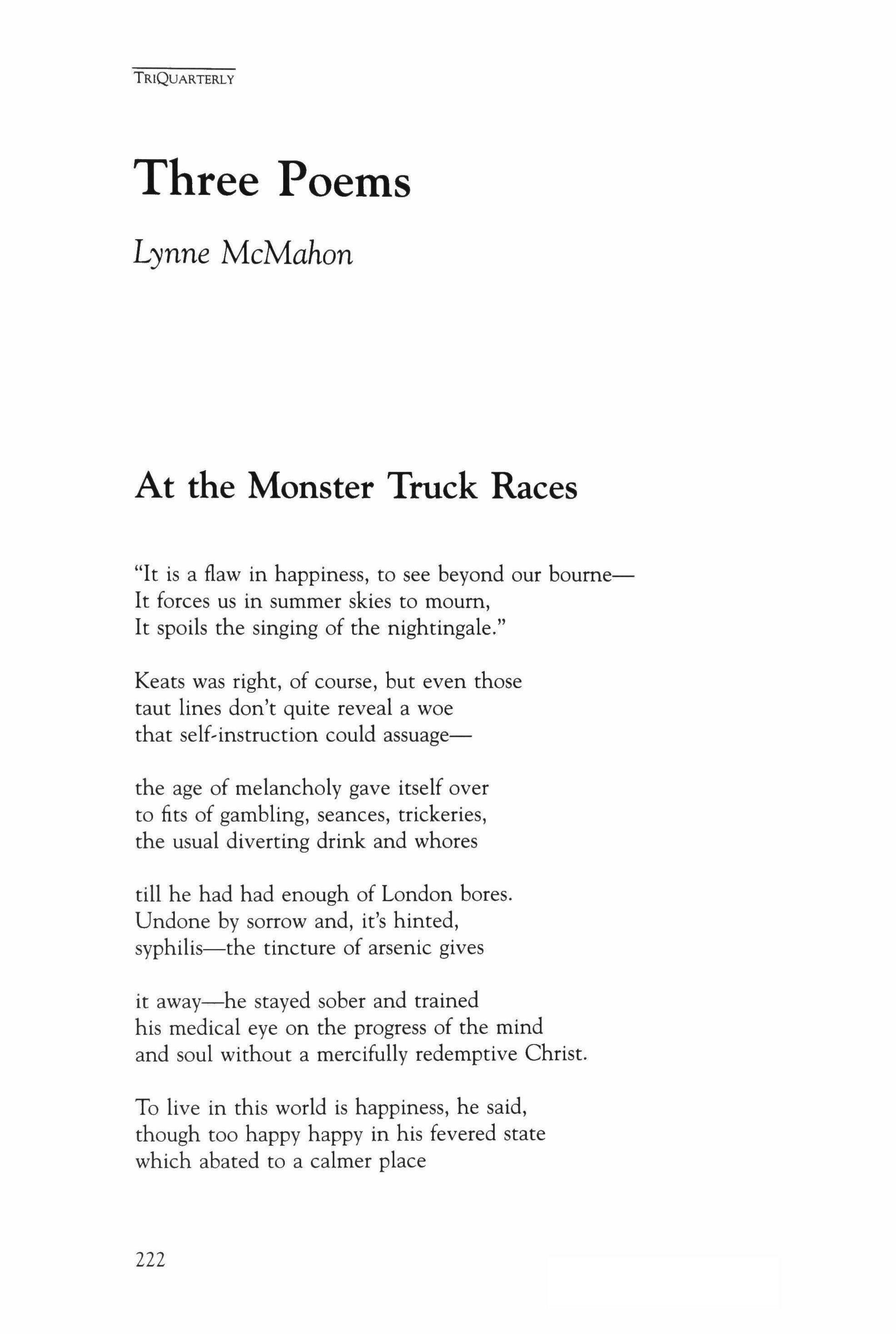
"It is a flaw in happiness, to see beyond our boumeIt forces us in summer skies to mourn, It spoils the singing of the nightingale."
Keats was right, of course, but even those taut lines don't quite reveal a woe that self,instruction could assuage-
the age of melancholy gave itself over to fits of gambling, seances, trickeries, the usual diverting drink and whores
till he had had enough of London bores. Undone by sorrow and, it's hinted, syphilis-the tincture of arsenic gives it away-he stayed sober and trained his medical eye on the progress of the mind and soul without a mercifully redemptive Christ.
To live in this world is happiness, he said, though too happy happy in his fevered state which abated to a calmer place
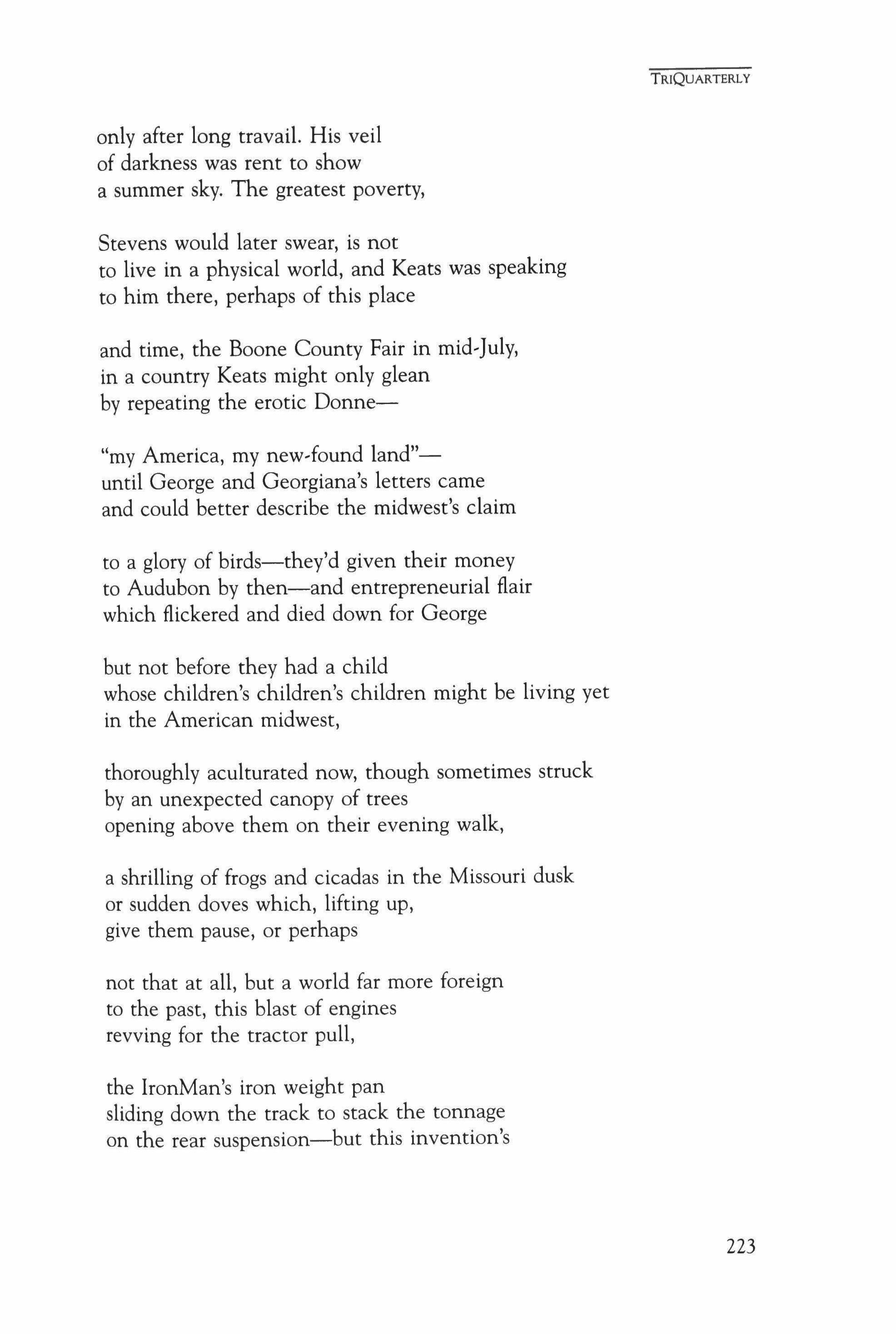
only after long travail. His veil of darkness was rent to show a summer sky. The greatest poverty, Stevens would later swear, is not to live in a physical world, and Keats was speaking to him there, perhaps of this place
and time, the Boone County Fair in mid-July, in a country Keats might only glean by repeating the erotic Donne-
"my America, my new-found land"until George and Georgiana's letters came and could better describe the midwest's claim
to a glory of birds-they'd given their money to Audubon by then-and entrepreneurial flair which flickered and died down for George
but not before they had a child whose children's children's children might be living yet in the American midwest,
thoroughly aculturated now, though sometimes struck by an unexpected canopy of trees opening above them on their evening walk,
a shrilling of frogs and cicadas in the Missouri dusk or sudden doves which, lifting up, give them pause, or perhaps
not that at all, but a world far more foreign to the past, this blast of engines revving for the tractor pull,
the lronMan's iron weight pan sliding down the track to stack the tonnage on the rear suspension-but this invention's
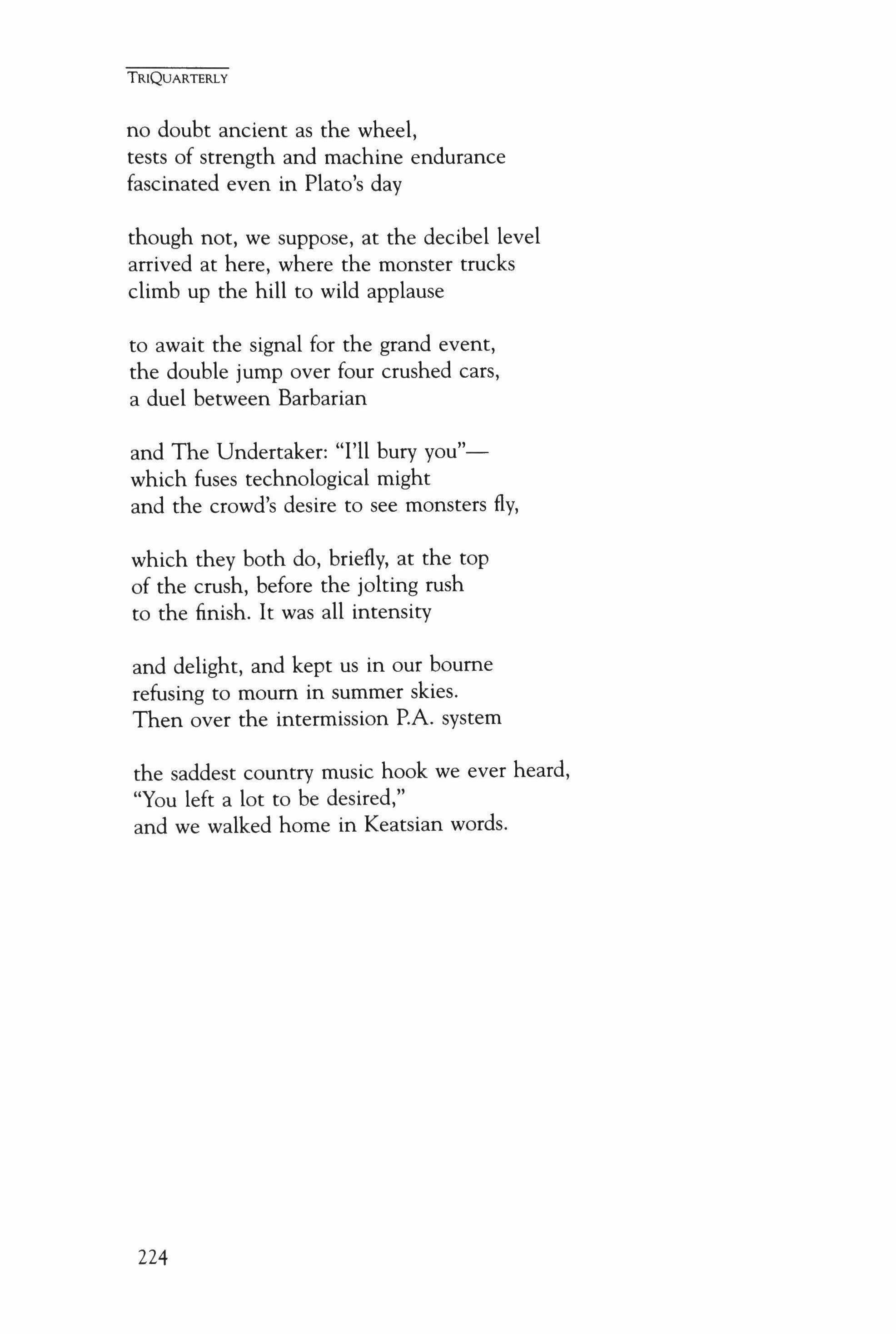
no doubt ancient as the wheel, tests of strength and machine endurance fascinated even in Plato's day
though not, we suppose, at the decibel level arrived at here, where the monster trucks climb up the hill to wild applause
to await the signal for the grand event, the double jump over four crushed cars, a duel between Barbarian and The Undertaker: "I'll bury you"which fuses technological might and the crowd's desire to see monsters fly,
which they both do, briefly, at the top of the crush, before the jolting rush to the finish. It was all intensity
and delight, and kept us in our bourne refusing to mourn in summer skies. Then over the intermission P.A. system
the saddest country music hook we ever heard, "You left a lot to be desired," and we walked home in Keatsian words.
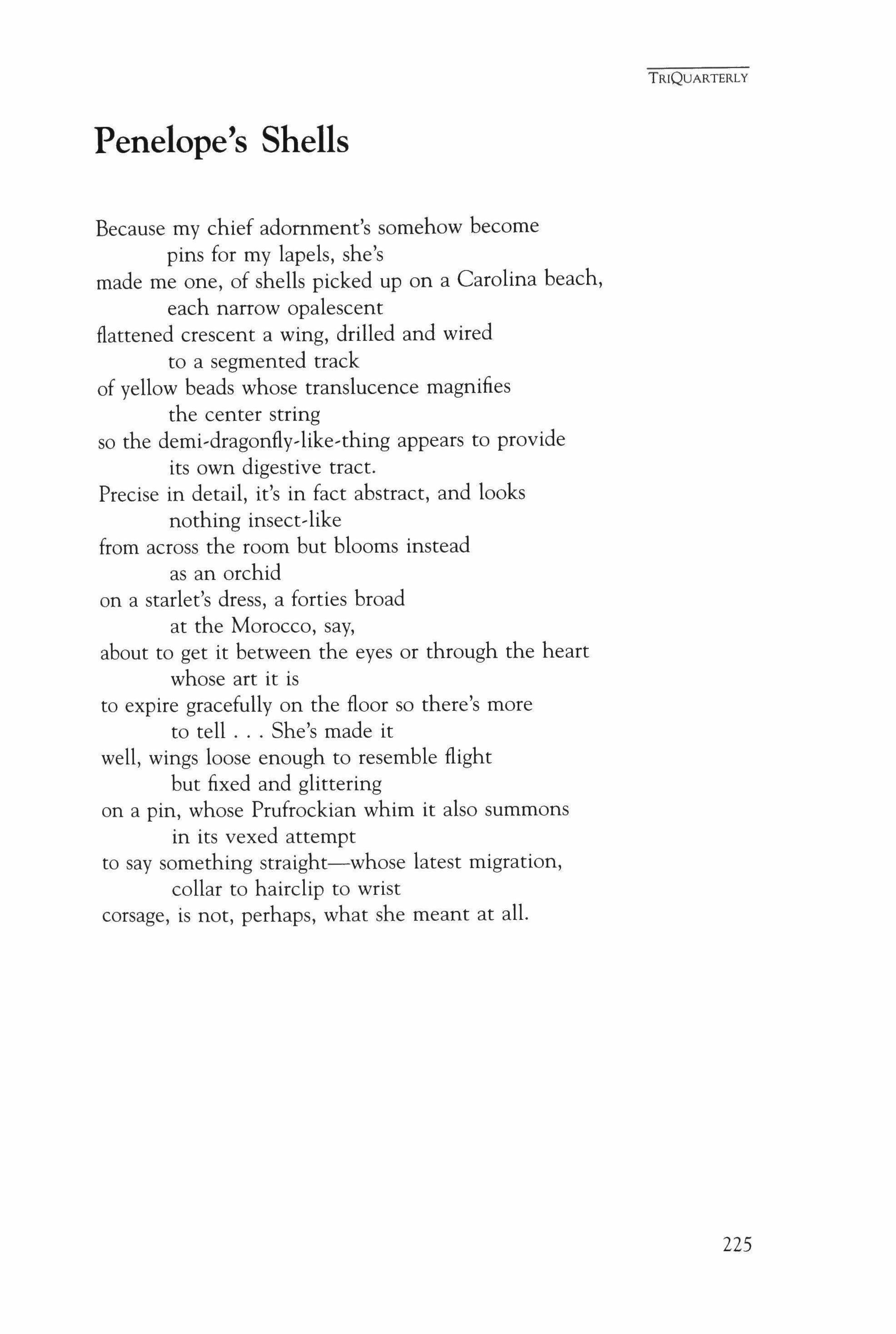
Because my chief adornment's somehow become pins for my lapels, she's made me one, of shells picked up on a Carolina beach, each narrow opalescent flattened crescent a wing, drilled and wired to a segmented track of yellow beads whose translucence magnifies the center string so the demi-dragonflv-Iike-rhing appears to provide its own digestive tract.
Precise in detail, it's in fact abstract, and looks nothing insect-like from across the room but blooms instead as an orchid on a starlet's dress, a forties broad at the Morocco, say, about to get it between the eyes or through the heart whose art it is to expire gracefully on the floor so there's more to tell She's made it well, wings loose enough to resemble flight but fixed and glittering on a pin, whose Prufrockian whim it also summons in its vexed attempt to say something straight-whose latest migration, collar to hairclip to wrist corsage, is not, perhaps, what she meant at all.
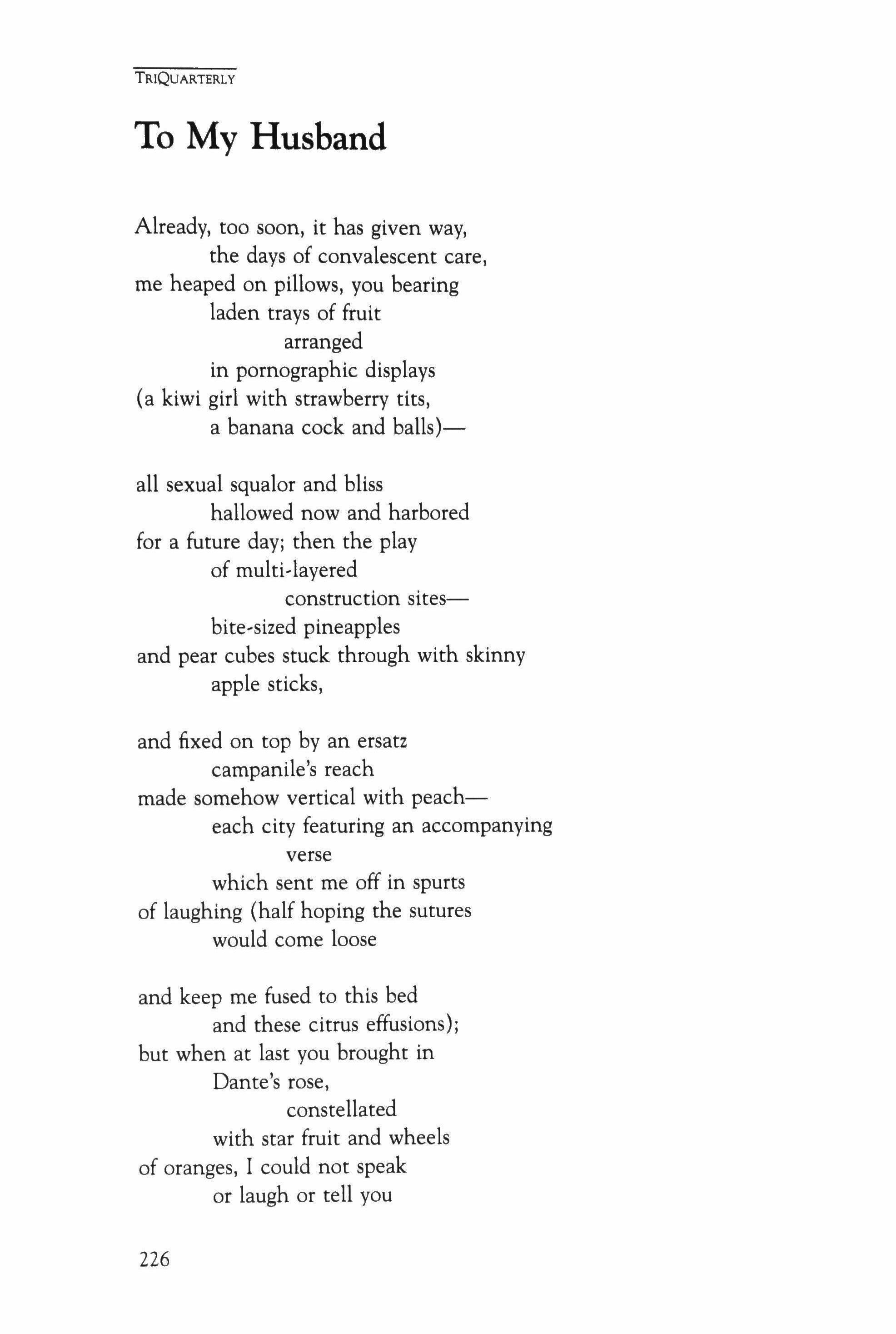
Already, too soon, it has given way, the days of convalescent care, me heaped on pillows, you bearing laden trays of fruit arranged in pornographic displays (a kiwi girl with strawberry tits, a banana cock and balls)all sexual squalor and bliss hallowed now and harbored for a future day; then the play of multi-layered construction sitesbite-sized pineapples and pear cubes stuck through with skinny apple sticks, and fixed on top by an ersatz campanile's reach made somehow vertical with peacheach city featuring an accompanying verse which sent me off in spurts of laughing (half hoping the sutures would come loose and keep me fused to this bed and these citrus effusions); but when at last you brought in Dante's rose, constellated with star fruit and wheels of oranges, I could not speak or laugh or tell you
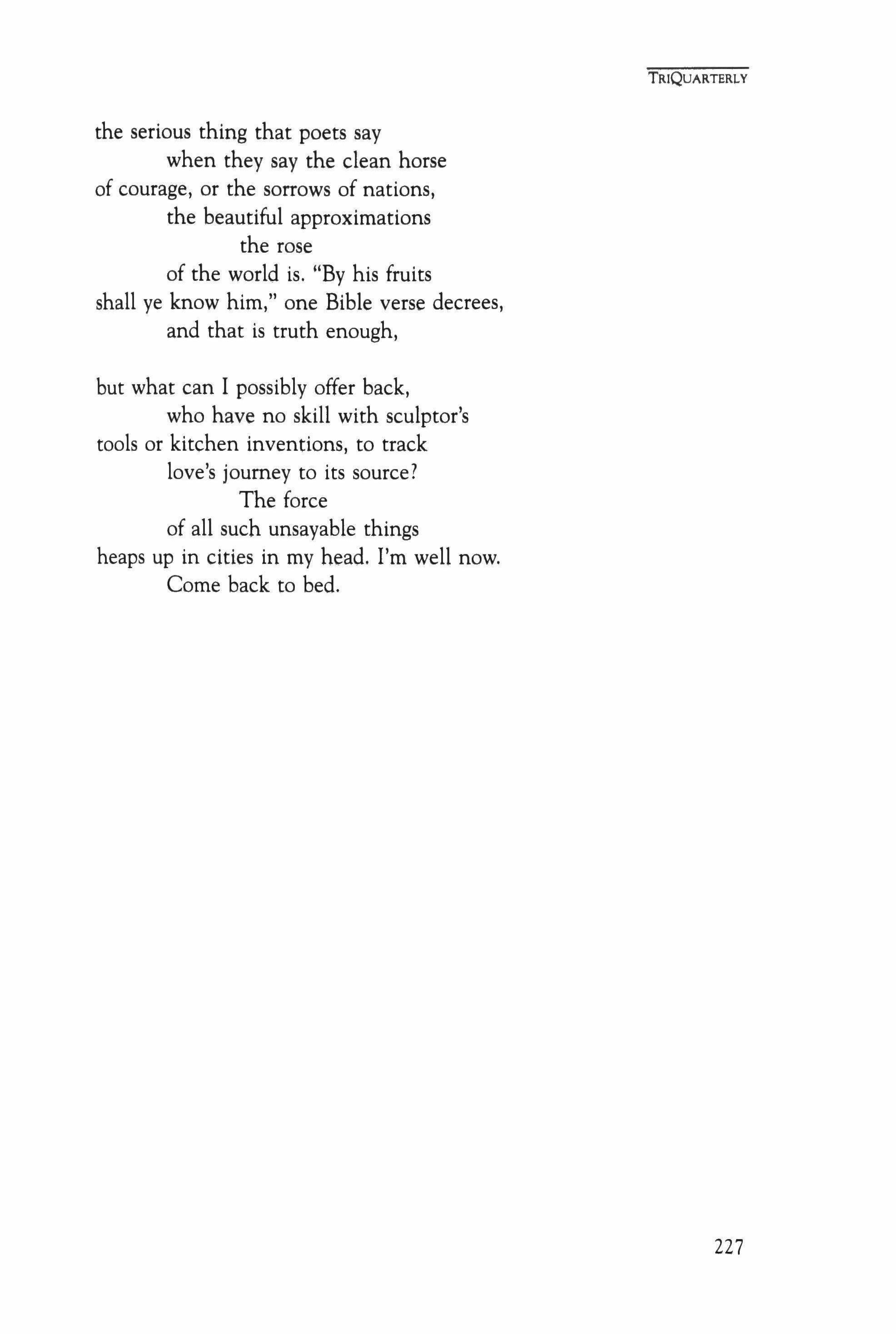
the serious thing that poets say when they say the clean horse of courage, or the sorrows of nations, the beautiful approximations the rose of the world is. "By his fruits shall ye know him," one Bible verse decrees, and that is truth enough, but what can I possibly offer back, who have no skill with sculptor's tools or kitchen inventions, to track love's journey to its source? The force of all such unsayable things heaps up in cities in my head. I'm well now. Come back to bed.

It was that that that she feared,
sitting there as her mother in fear,
sitting there as her watching the waste, the worse happen without knowing to call it that.
Sitting there as mother with child, all necessary illusions wadded together,
simultaneously unable to hold off while holding (to separate from the surface, to throw oneself into relief but not to land as shadow, not to emerge subject to intersection, subject to collision
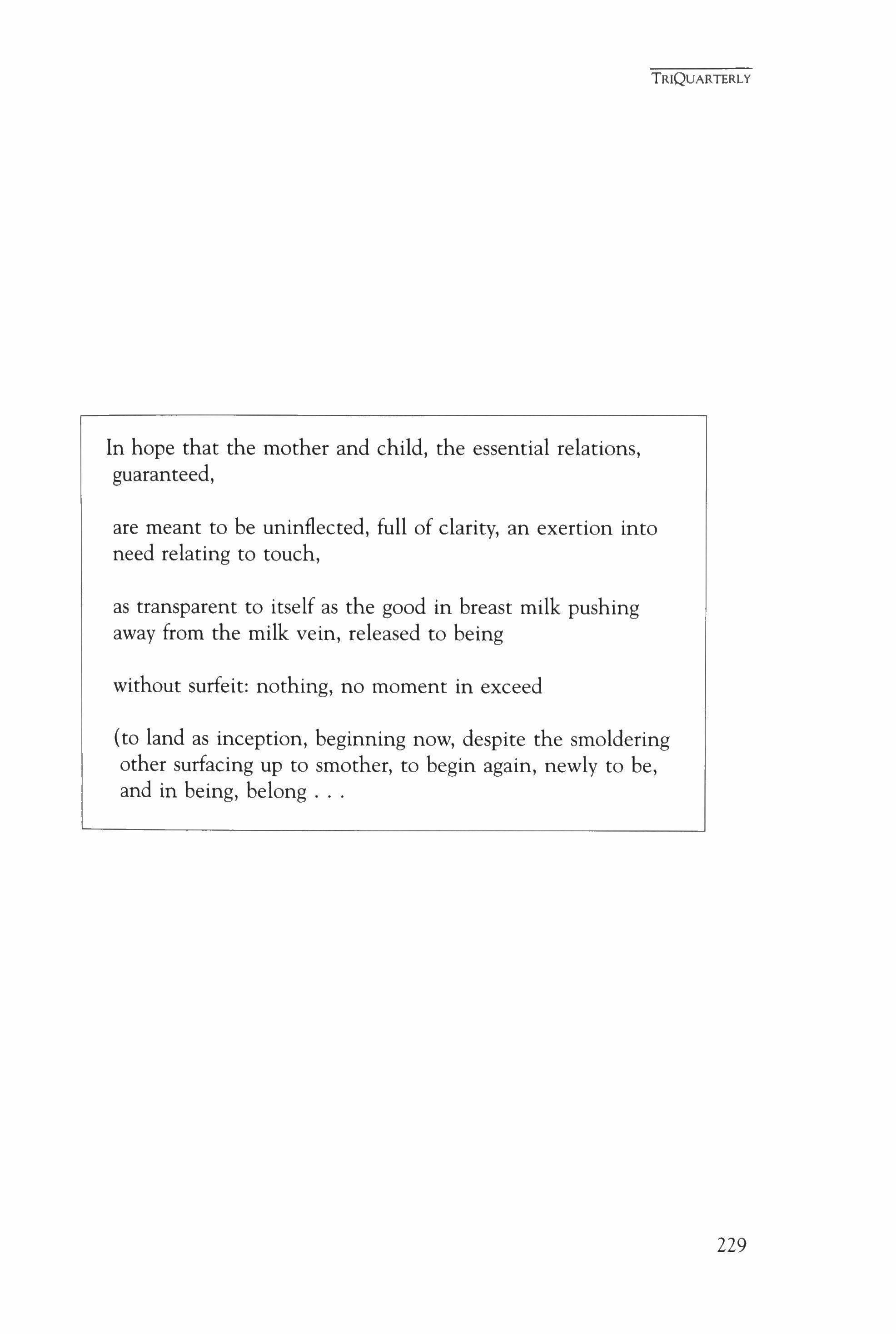
In hope that the mother and child, the essential relations, guaranteed, are meant to be uninflected, full of clarity, an exertion into need relating to touch, as transparent to itself as the good in breast milk pushing away from the milk vein, released to being without surfeit: nothing, no moment in exceed
(to land as inception, beginning now, despite the smoldering other surfacing up to smother, to begin again, newly to be, and in being, belong
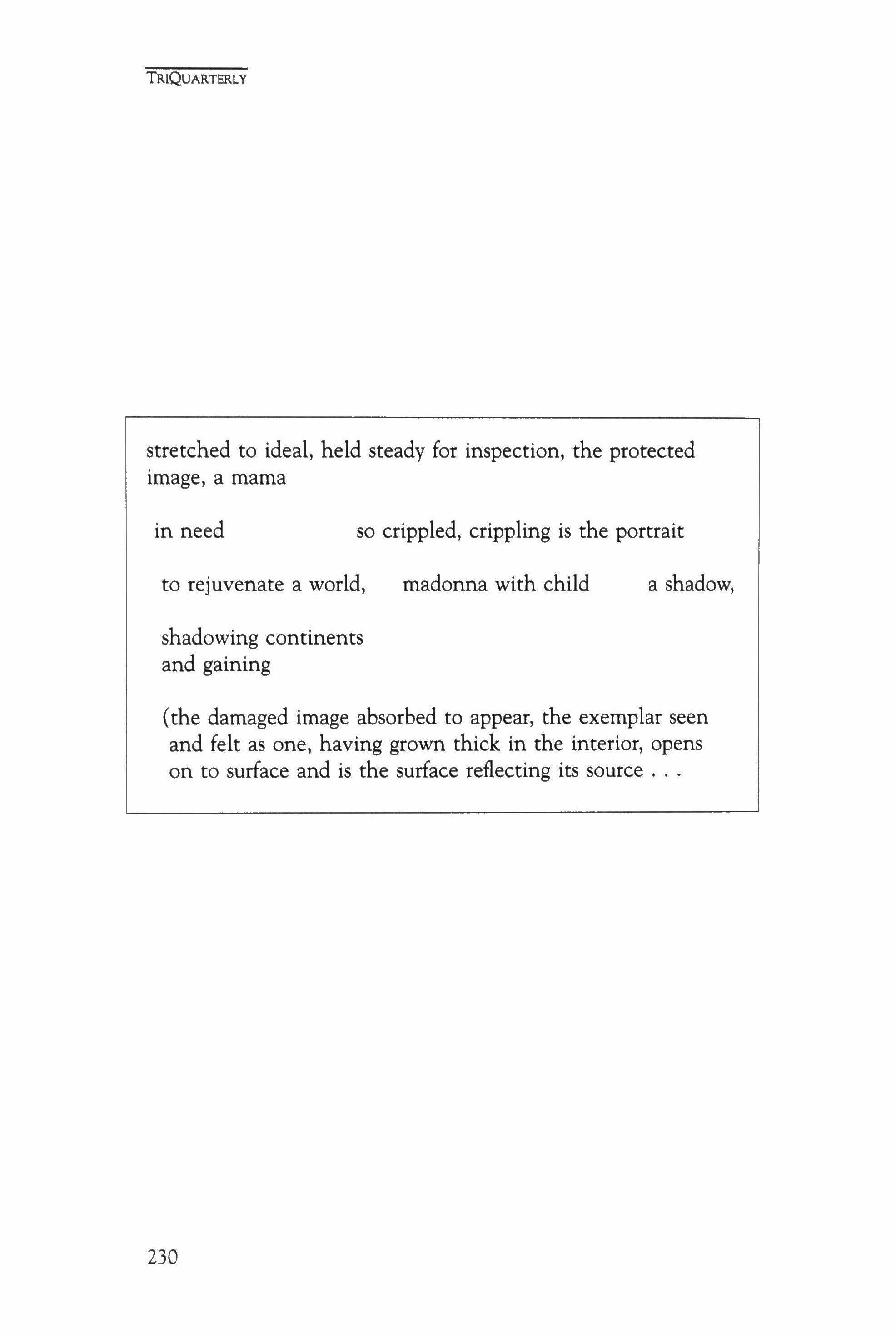
stretched to ideal, held steady for inspection, the protected image, a mama in need so crippled, crippling is the portrait to rejuvenate a world, madonna with child a shadow, shadowing continents and gaining
(the damaged image absorbed to appear, the exemplar seen and felt as one, having grown thick in the interior, opens on to surface and is the surface reflecting its source

The portrait painted is bruised.
The triangular pelvic-shaped portrait is painted a purple darkening so much it is too much.
(Why won't you look at me?)
It is shadow.
(triangulated so that, the obstruction holding shadow is the reflecting surface, surfacing up its source, true

A face silenced by its own resignation to its roots.
A face as mother, a shadowing other, an unyielding surface in waste and worse-purple
from the purpling bruise in falter, unsteadily altering
(in perpetual addition, nearing loss, the absorption blocking the greater prominence, itself blocking itself
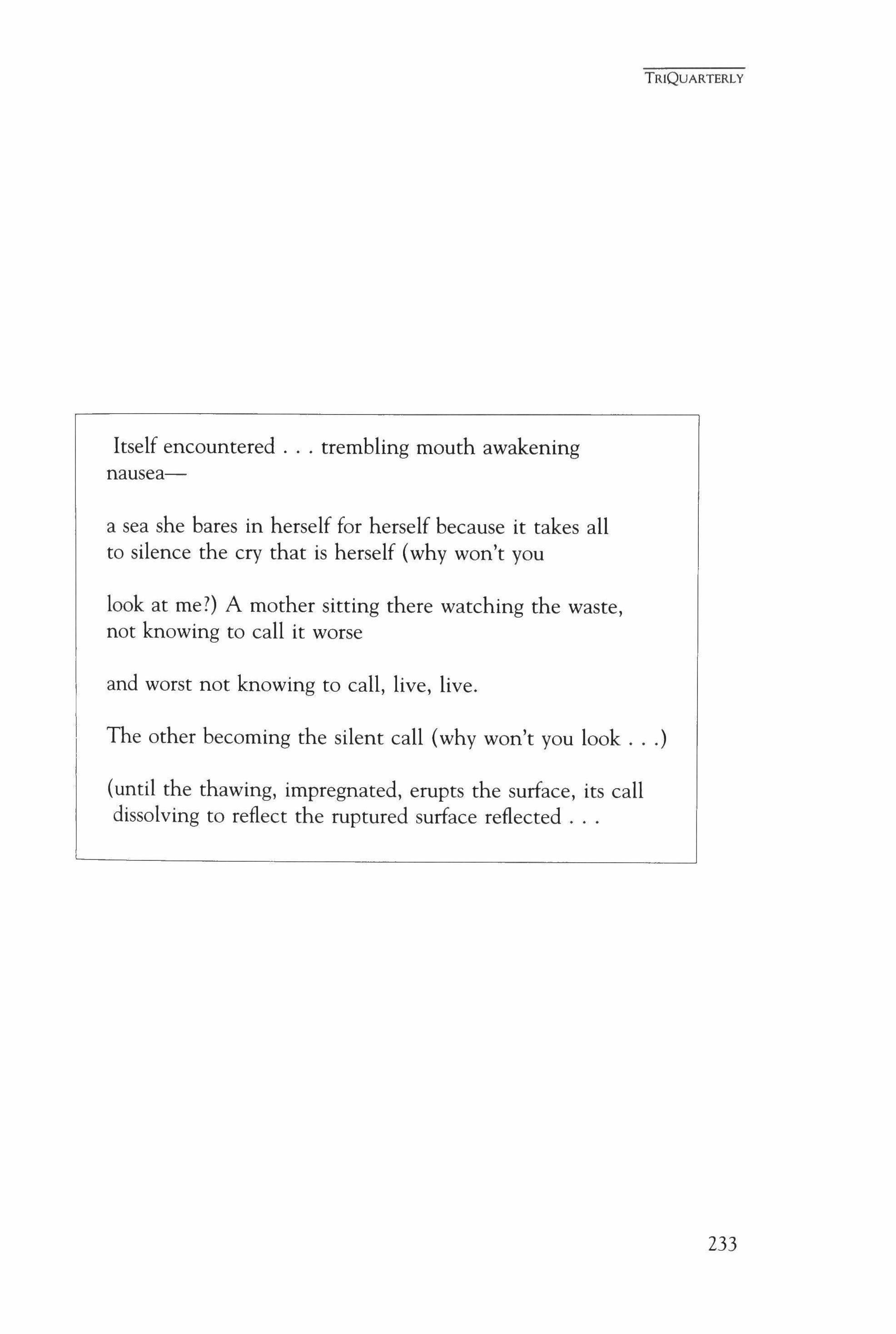
Itself encountered trembling mouth awakening
nausea-
a sea she bares in herself for herself because it takes all to silence the cry that is herself (why won't you look at me?) A mother sitting there watching the waste, not knowing to call it worse and worst not knowing to call, live, live.
The other becoming the silent call (why won't you look ) (until the thawing, impregnated, erupts the surface, its call dissolving to reflect the ruptured surface reflected

Cruel then is the conceived "we." A bruised purple surface erupting into hush she hush shehush shush pushing itself, rushed within.
Silence is the she who fears the call (why won't you look to me?) that will shatter the surface that is herself
(a surface, within itself triangulated, blocking the self until pulled back tautly, until bits of hue and cry thrust
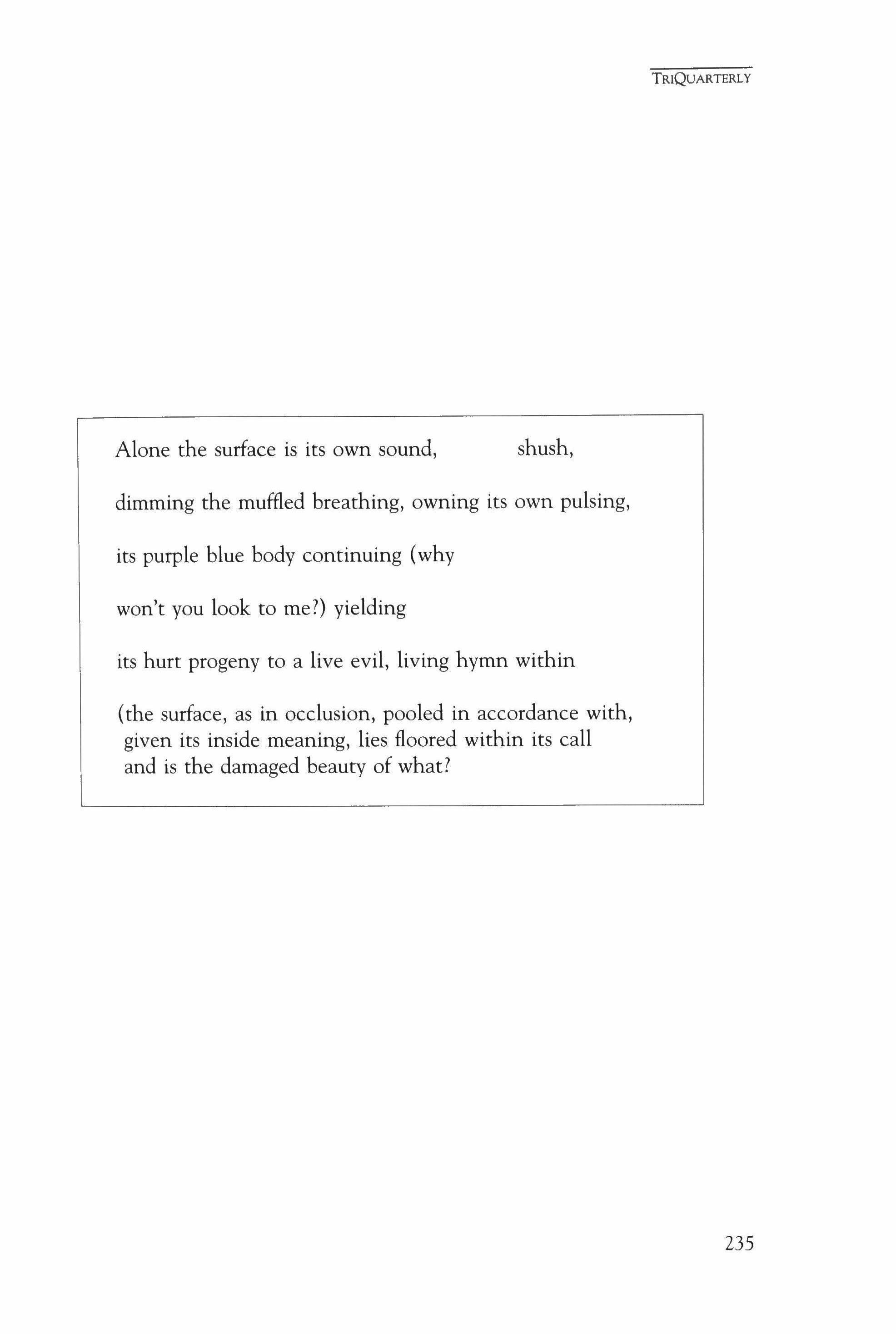
Alone the surface is its own sound, shush, dimming the muffled breathing, owning its own pulsing, its purple blue body continuing (why won't you look to me?) yielding its hurt progeny to a live evil, living hymn within (the surface, as in occlusion, pooled in accordance with, given its inside meaning, lies floored within its call and is the damaged beauty of what?
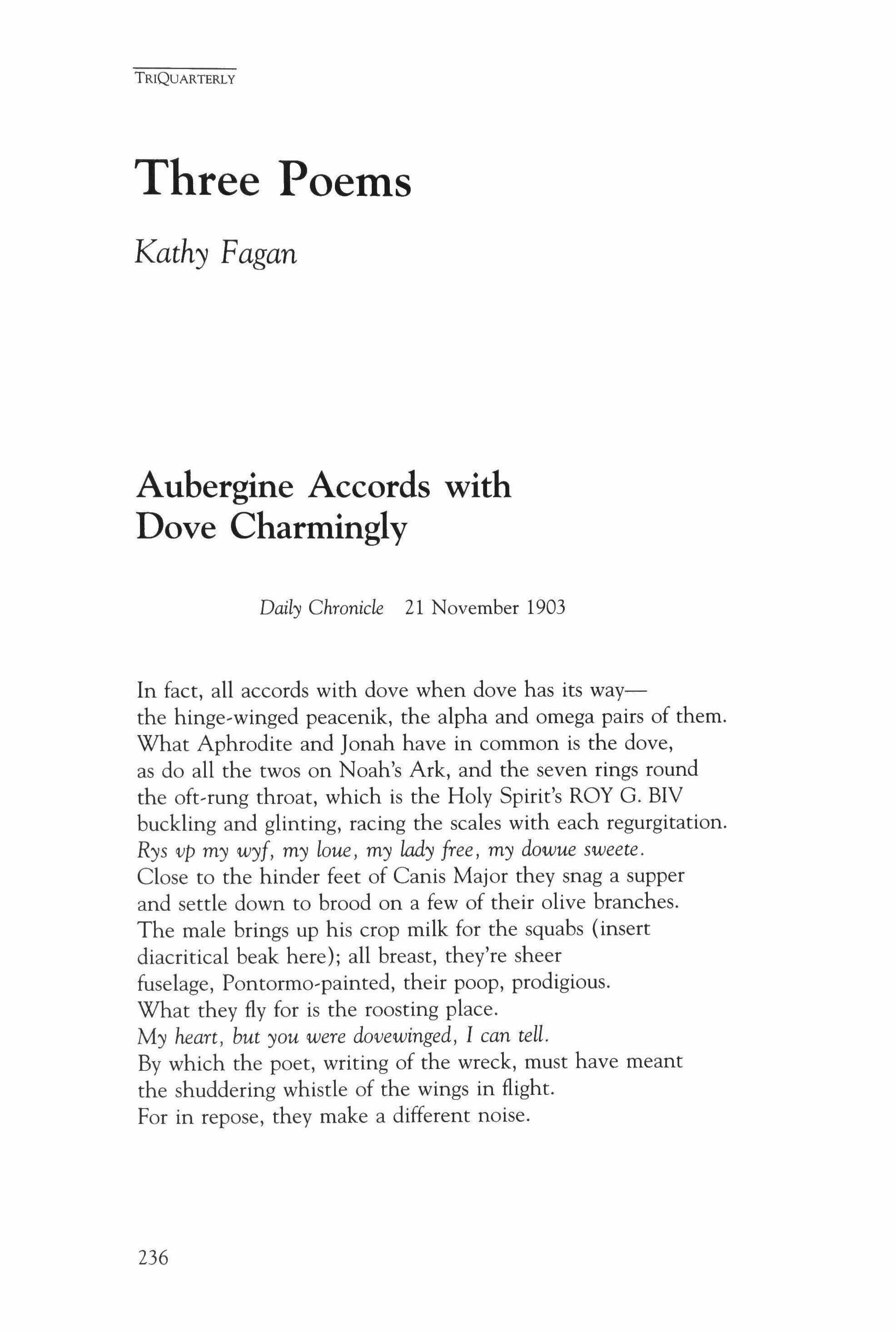
Daily Chronicle 21 November 1903
In fact, all accords with dove when dove has its waythe hinge-winged peacenik, the alpha and omega pairs of them. What Aphrodite and Jonah have in common is the dove, as do all the twos on Noah's Ark, and the seven rings round the oft-rung throat, which is the Holy Spirit's ROY G. BIV buckling and glinting, racing the scales with each regurgitation. Rys vp my wyf, my loue, my lady free, my dowue sweete. Close to the hinder feet of Canis Major they snag a supper and settle down to brood on a few of their olive branches. The male brings up his crop milk for the squabs {insert diacritical beak here}; all breast, they're sheer fuselage, Pontormo-painted, their poop, prodigious. What they fly for is the roosting place. My heart, but you were dovewinged I can tell. By which the poet, writing of the wreck, must have meant the shuddering whistle of the wings in flight. For in repose, they make a different noise.

The point being a line but not a straight line
Motion Fragment Track & Clatter
That train has 4 engines she said This train 2
Never before had I considered the equation
Each car looked too dry & empty
In the desert one sees them set up on blocks the color of old blood or bananas
For chickens maybe the family dog
A child of my century I just kept thinking Death Camps the trains to
Head on they were beautiful in the olden days What wasn't
They're eel-faced now the passenger kind with the names of Vegas casinos
The eel could have come from a nightmare of mine (Nightmare Horsepower)
Or from the magnified photo of a spirochete
My hand recoiling like it was a wet rock I'd turned over & not a page not a simple picture on a simple page

The point being there are other trains of thought assemblies of them assemblages
Spirochete Parakeet Paraclete
Some species are known to mimic human speech
Stout bills both the finch is from another family altogether so never does
They court on electrical wires instead bodies accommodating for the bob their heads stained red for having relieved the savior of his scourge of thorns
Males were rewarded for that with the color of his blood
Females on the other hand a soft brown all over look homed while they're mating from where they're peaked & bitten
There are only so many flying things
Even fewer swim
Train of thought School of fish
When my friend's dead koi came back to life she named them Jesus 111&111
Jesus cubed
The Last Supper
The point being the truth is never simple
Or rarely rarely is it
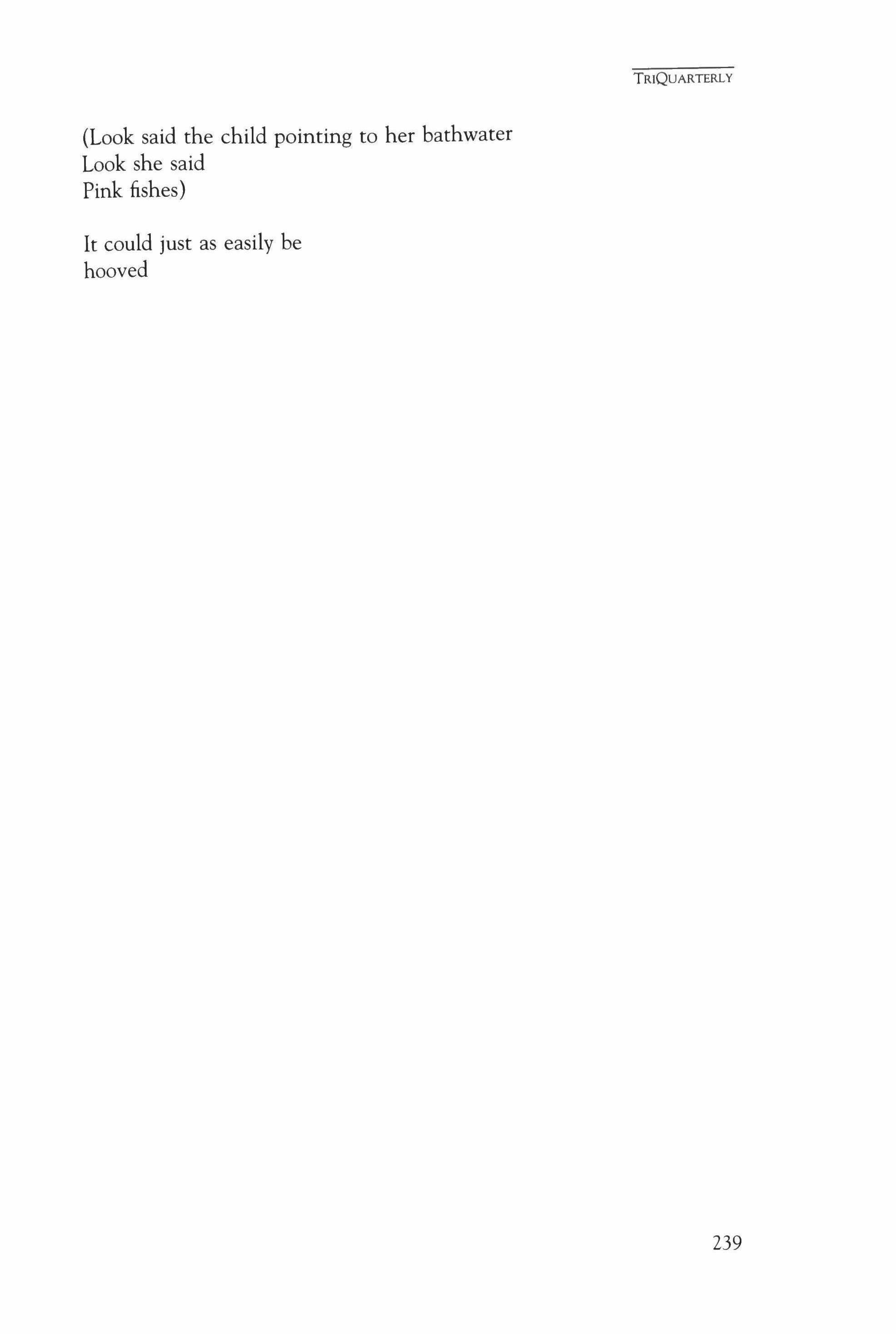
(Look said the child pointing to her bathwater Look she said Pink fishes)
It could just as easily be hooved

Remember. Resurrect. A river
Taken under the rain's Right arm. Enter an R and everything rises, Like cream, to the surface.
It's the ornamental nature of the peacock Letter. From its azure Crest to its emerald Throat to the Roman grandeur of its mirrored
Train-iridescence runneth over! Red rover, red rover. And look! Regarde!
Our laureates rush over-
To write us a rhyme, a romance, or retraction,
To write an Rx for our grieving Hearts: Turn words every morning like a bride In your arms and repeat after me: Resh. Ra. Roar. Rabbi. I am
Wronged. I am wrong. Dark. Sorrow. Rare. Miracle. Adorable. Reaper. Raison D'etre. We are Irreparable. But what of it?
Therefore shall we labor In the service of the R. Therefore shall we practice Such random acts of artifice as
The topiary, curlicue of orange Rind, and other ethereal arrangements of the sort Featured in Martha Stewart's Marathon pre-Christmas broadcast,
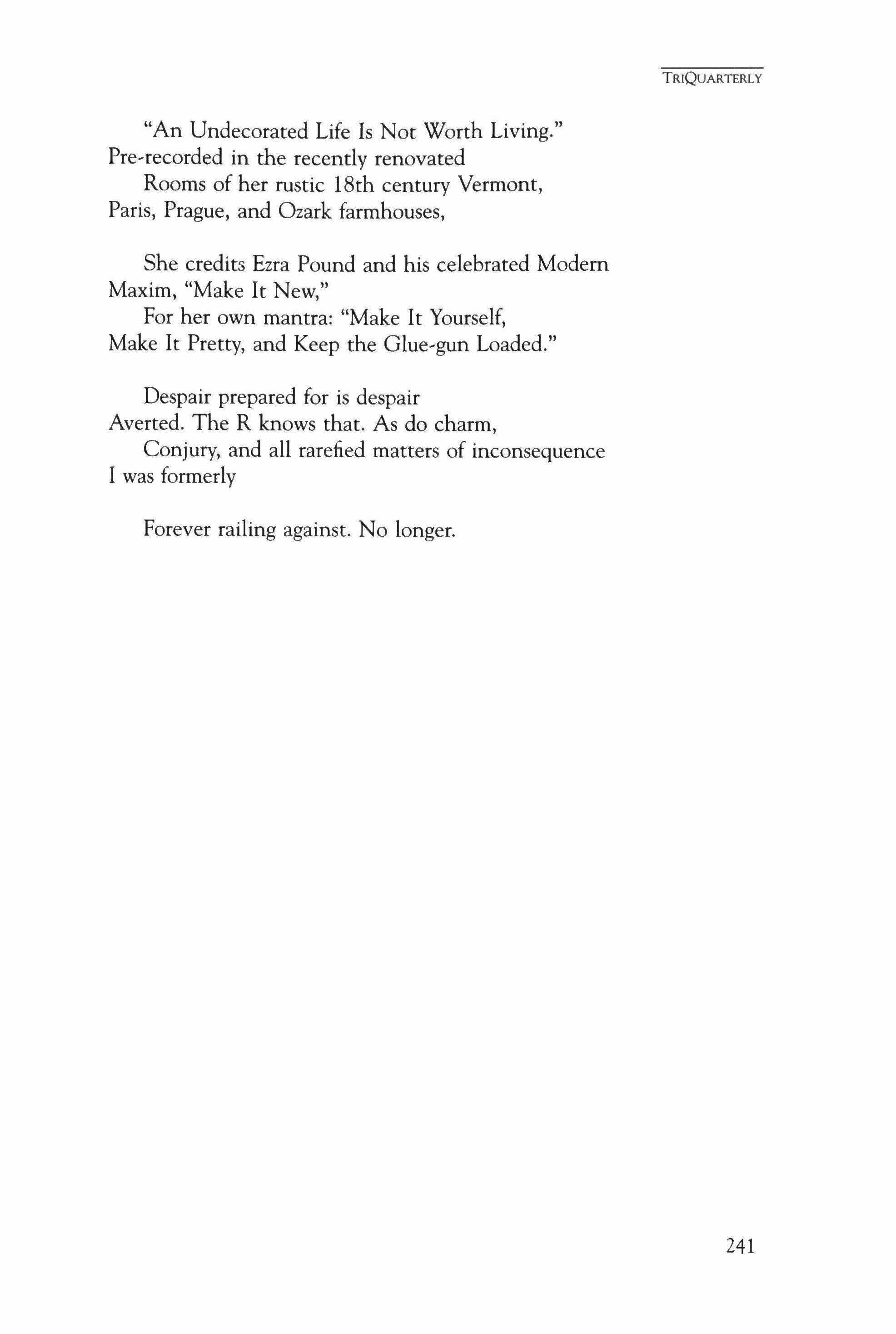
"An Undecorated Life Is Not Worth Living."
Pre-recorded in the recently renovated Rooms of her rustic 18th century Vermont, Paris, Prague, and Ozark farmhouses,
She credits Ezra Pound and his celebrated Modem Maxim, "Make It New,"
For her own mantra: "Make It Yourself, Make It Pretty, and Keep the Glue-gun Loaded."
Despair prepared for is despair Averted. The R knows that. As do charm, Conjury, and all rarefied matters of inconsequence I was formerly
Forever railing against. No longer.
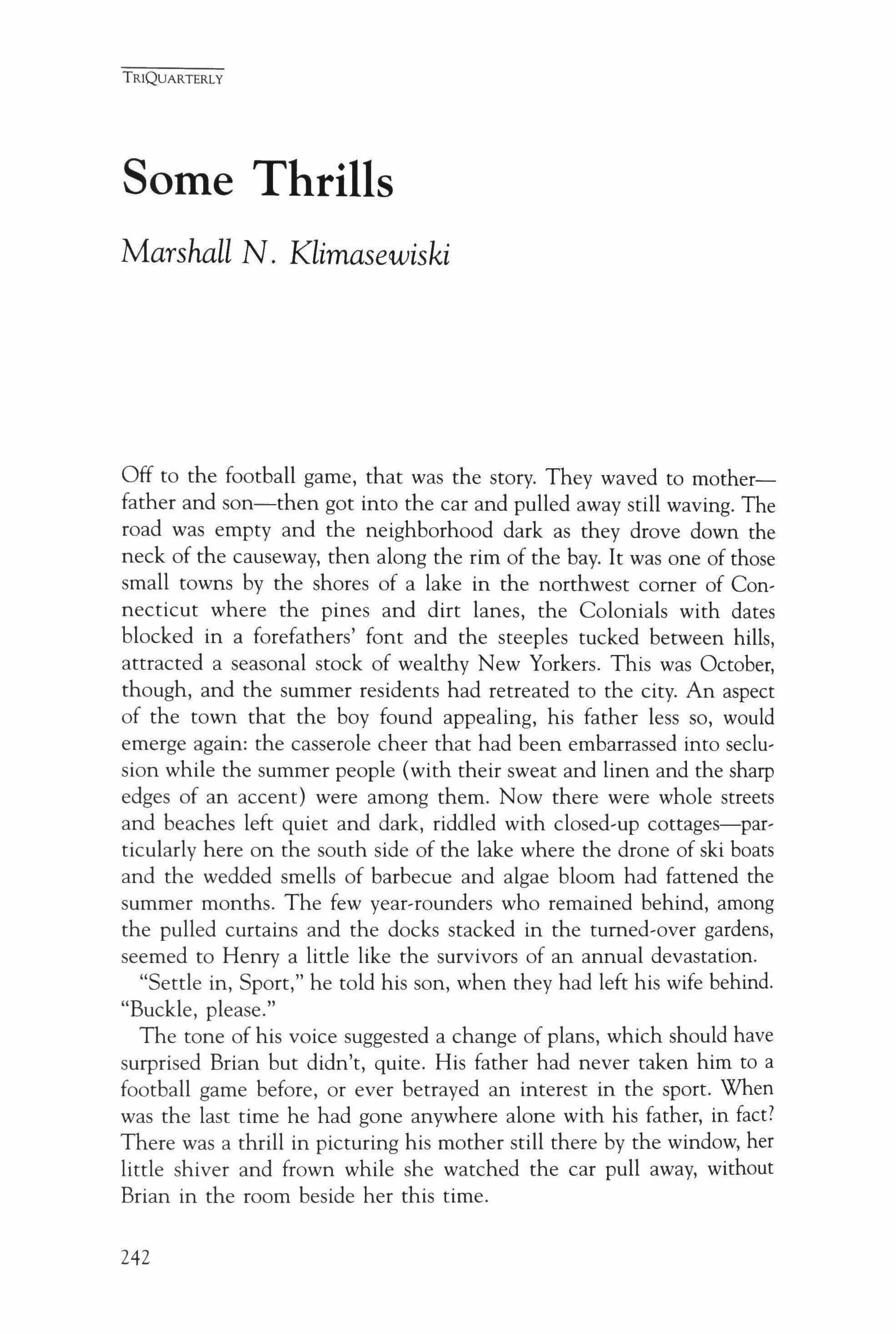
Off to the football game, that was the story. They waved to motherfather and son-then got into the car and pulled away still waving. The road was empty and the neighborhood dark as they drove down the neck of the causeway, then along the rim of the bay. It was one of those small towns by the shores of a lake in the northwest comer of Connecticut where the pines and dirt lanes, the Colonials with dates blocked in a forefathers' font and the steeples tucked between hills, attracted a seasonal stock of wealthy New Yorkers. This was October, though, and the summer residents had retreated to the city. An aspect of the town that the boy found appealing, his father less so, would emerge again: the casserole cheer that had been embarrassed into seclusion while the summer people (with their sweat and linen and the sharp edges of an accent) were among them. Now there were whole streets and beaches left quiet and dark, riddled with closed-up cottages-particularly here on the south side of the lake where the drone of ski boats and the wedded smells of barbecue and algae bloom had fattened the summer months. The few year-rounders who remained behind, among the pulled curtains and the docks stacked in the turned-over gardens, seemed to Henry a little like the survivors of an annual devastation.
"Settle in, Sport," he told his son, when they had left his wife behind. "Buckle, please."
The tone of his voice suggested a change of plans, which should have surprised Brian but didn't, quite. His father had never taken him to a football game before, or ever betrayed an interest in the sport. When was the last time he had gone anywhere alone with his father, in fact? There was a thrill in picturing his mother still there by the window, her little shiver and frown while she watched the car pull away, without Brian in the room beside her this time.
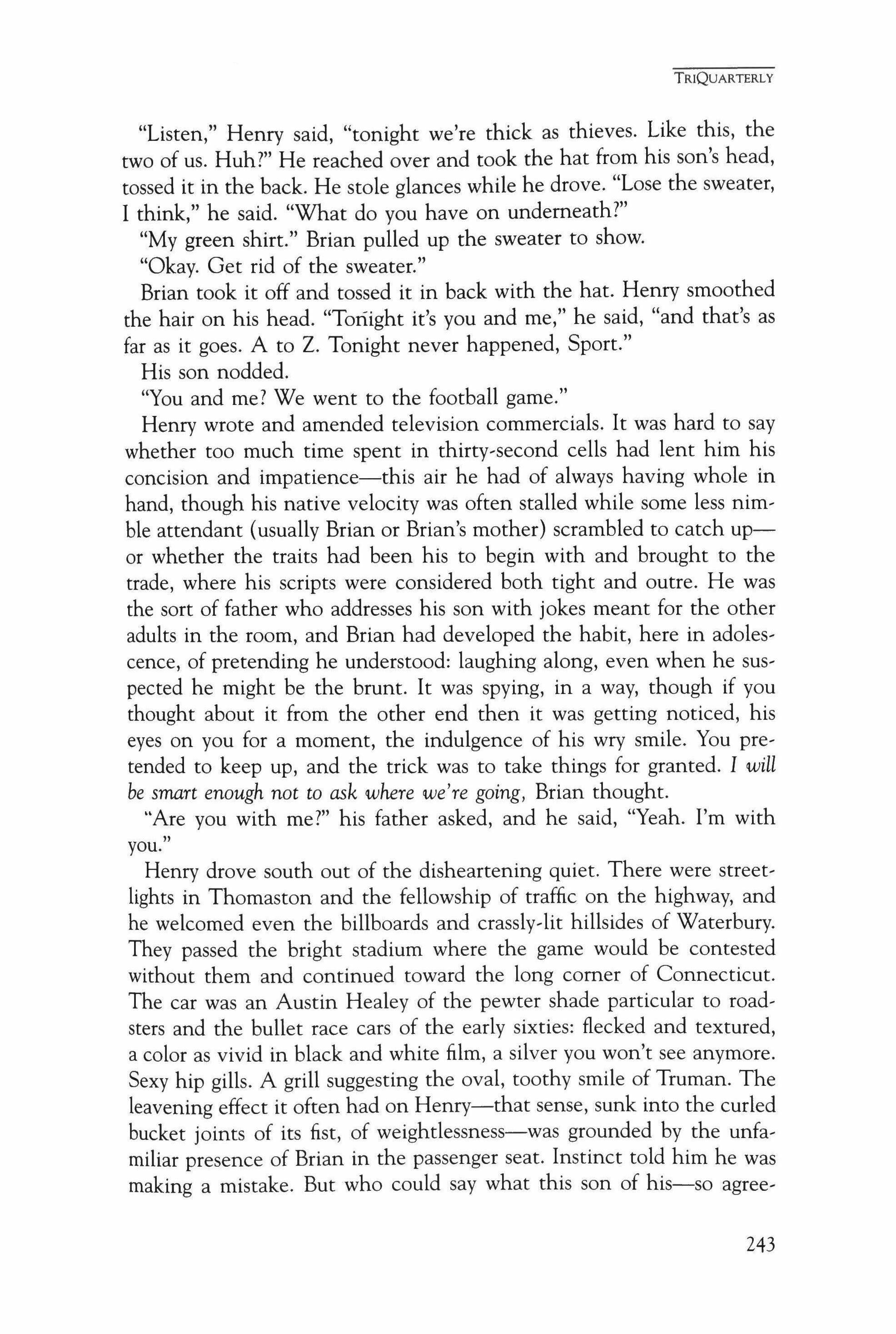
"Listen," Henry said, "tonight we're thick as thieves. Like this, the two of us. Huh?" He reached over and took the hat from his son's head, tossed it in the back. He stole glances while he drove. "Lose the sweater, I think," he said. "What do you have on underneath?"
"My green shirt." Brian pulled up the sweater to show.
"Okay. Get rid of the sweater."
Brian took it off and tossed it in back with the hat. Henry smoothed the hair on his head. "Tonight it's you and me," he said, "and that's as far as it goes. A to Z. Tonight never happened, Sport."
His son nodded.
"You and me? We went to the football game."
Henry wrote and amended television commercials. It was hard to say whether too much time spent in thirty-second cells had lent him his concision and impatience-this air he had of always having whole in hand, though his native velocity was often stalled while some less nimble attendant (usually Brian or Brian's mother) scrambled to catch upor whether the traits had been his to begin with and brought to the trade, where his scripts were considered both tight and outre. He was the sort of father who addresses his son with jokes meant for the other adults in the room, and Brian had developed the habit, here in adolescence, of pretending he understood: laughing along, even when he suspected he might be the brunt. It was spying, in a way, though if you thought about it from the other end then it was getting noticed, his eyes on you for a moment, the indulgence of his wry smile. You pretended to keep up, and the trick was to take things for granted. I will be smart enough not to ask where we're going, Brian thought.
"Are you with me?" his father asked, and he said, "Yeah. I'm with you."
Henry drove south out of the disheartening quiet. There were streetlights in Thomaston and the fellowship of traffic on the highway, and he welcomed even the billboards and crassly-lit hillsides of Waterbury. They passed the bright stadium where the game would be contested without them and continued toward the long comer of Connecticut. The car was an Austin Healey of the pewter shade particular to roadsters and the bullet race cars of the early sixties: flecked and textured, a color as vivid in black and white film, a silver you won't see anymore. Sexy hip gills. A grill suggesting the oval, toothy smile of Truman. The leavening effect it often had on Henry-that sense, sunk into the curled bucket joints of its fist, of weightlessness-was grounded by the unfamiliar presence of Brian in the passenger seat. Instinct told him he was making a mistake. But who could say what this son of his-so agree,
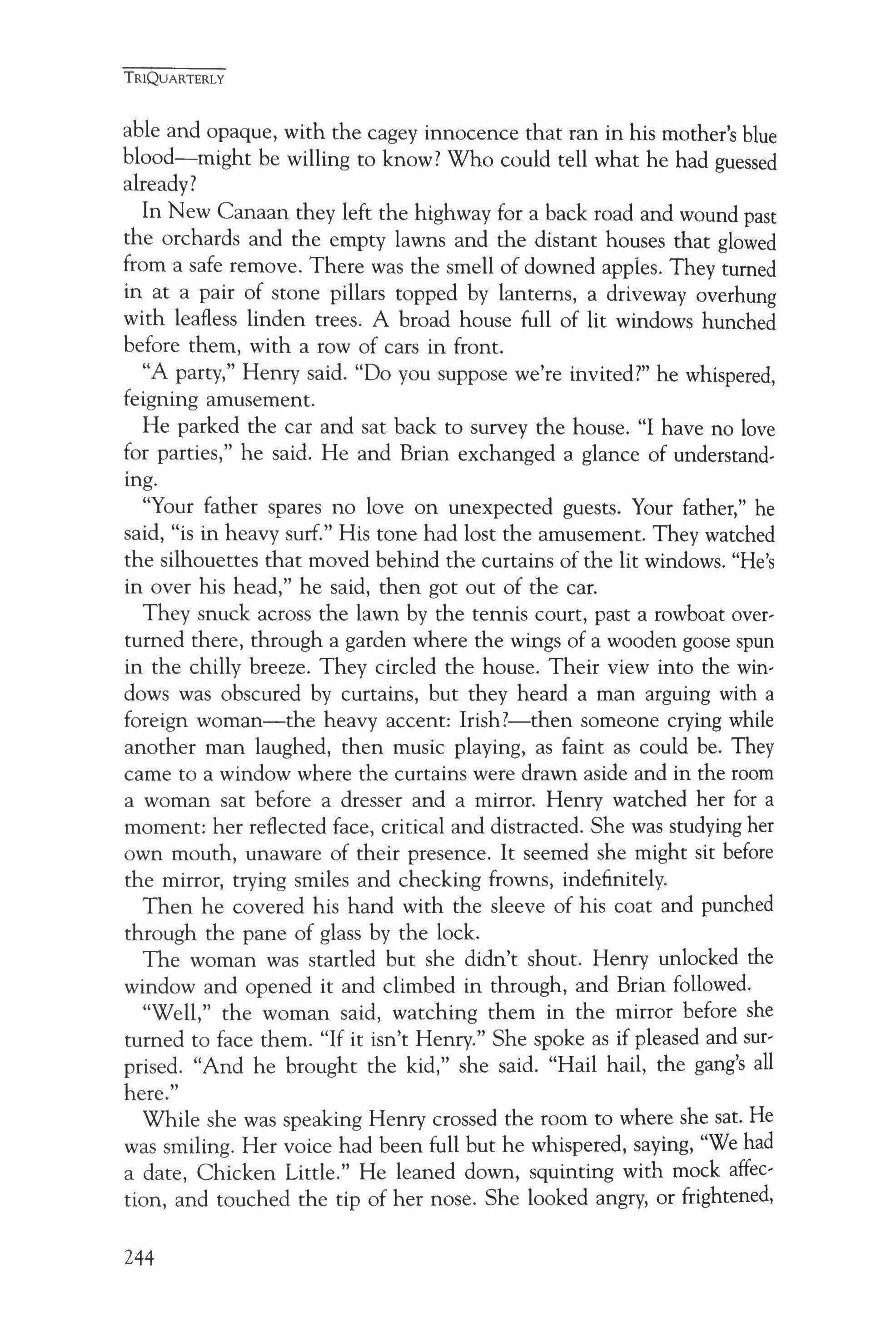
able and opaque, with the cagey innocence that ran in his mother's blue blood-might be willing to know? Who could tell what he had guessed already?
In New Canaan they left the highway for a back road and wound past the orchards and the empty lawns and the distant houses that glowed from a safe remove. There was the smell of downed apples. They turned in at a pair of stone pillars topped by lanterns, a driveway overhung with leafless linden trees. A broad house full of lit windows hunched before them, with a row of cars in front.
"A party," Henry said. "Do you suppose we're invited?" he whispered, feigning amusement.
He parked the car and sat back to survey the house. "I have no love for parties," he said. He and Brian exchanged a glance of understanding.
"Your father spares no love on unexpected guests. Your father," he said, "is in heavy surf." His tone had lost the amusement. They watched the silhouettes that moved behind the curtains of the lit windows. "He's in over his head," he said, then got out of the car.
They snuck across the lawn by the tennis court, past a rowboat overturned there, through a garden where the wings of a wooden goose spun in the chilly breeze. They circled the house. Their view into the windows was obscured by curtains, but they heard a man arguing with a foreign woman-the heavy accent: Irish?-then someone crying while another man laughed, then music playing, as faint as could be. They carne to a window where the curtains were drawn aside and in the room a woman sat before a dresser and a mirror. Henry watched her for a moment: her reflected face, critical and distracted. She was studying her own mouth, unaware of their presence. It seemed she might sit before the mirror, trying smiles and checking frowns, indefinitely.
Then he covered his hand with the sleeve of his coat and punched through the pane of glass by the lock.
The woman was startled but she didn't shout. Henry unlocked the window and opened it and climbed in through, and Brian followed.
"Well," the woman said, watching them in the mirror before she turned to face them. "If it isn't Henry." She spoke as if pleased and surprised. "And he brought the kid," she said. "Hail hail, the gang's all here."
While she was speaking Henry crossed the room to where she sat. He was smiling. Her voice had been full but he whispered, saying, "We had a date, Chicken Little." He leaned down, squinting with mock affection, and touched the tip of her nose. She looked angry, or frightened,
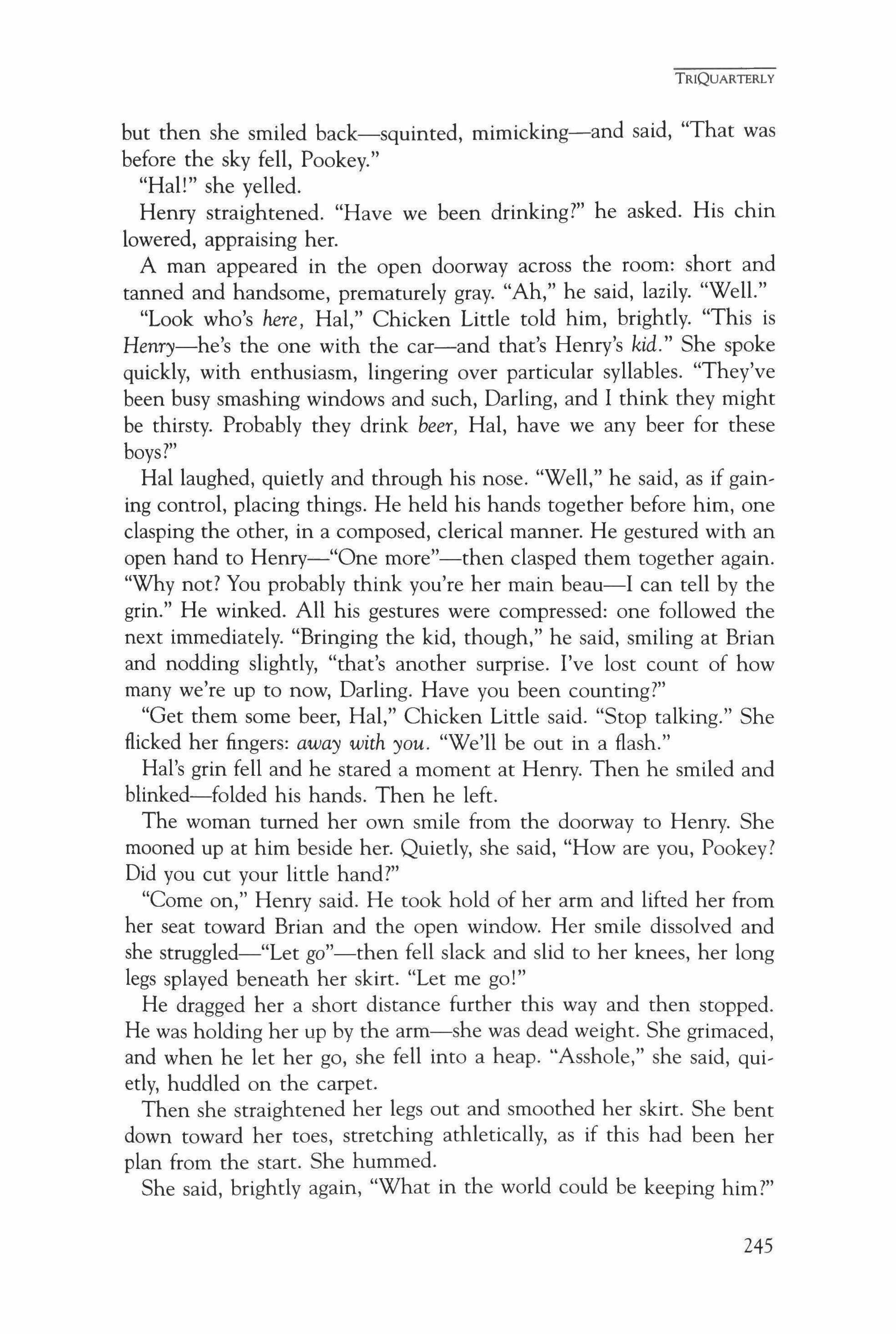
but then she smiled back-squinted, mimicking-and said, "That was before the sky fell, Pookey."
"Hal!" she yelled.
Henry straightened. "Have we been drinking?" he asked. His chin lowered, appraising her.
A man appeared in the open doorway across the room: short and tanned and handsome, prematurely gray. "Ah," he said, lazily. "Well."
"Look who's here, Hal," Chicken Little told him, brightly. "This is Henry-he's the one with the car-and that's Henry's kid." She spoke quickly, with enthusiasm, lingering over particular syllables. "They've been busy smashing windows and such, Darling, and I think they might be thirsty. Probably they drink beer, Hal, have we any beer for these boys?"
Hal laughed, quietly and through his nose. "Well," he said, as if gain, ing control, placing things. He held his hands together before him, one clasping the other, in a composed, clerical manner. He gestured with an open hand to Henry-"One more"-then clasped them together again. "Why not? You probably think you're her main beau-I can tell by the grin." He winked. All his gestures were compressed: one followed the next immediately. "Bringing the kid, though," he said, smiling at Brian and nodding slightly, "that's another surprise. I've lost count of how many we're up to now, Darling. Have you been counting?"
"Get them some beer, Hal," Chicken Little said. "Stop talking." She flicked her fingers: away with you. "We'll be out in a flash."
Hal's grin fell and he stared a moment at Henry. Then he smiled and blinked-folded his hands. Then he left.
The woman turned her own smile from the doorway to Henry. She mooned up at him beside her. Quietly, she said, "How are you, Pookey? Did you cut your little hand?"
"Come on," Henry said. He took hold of her arm and lifted her from her seat toward Brian and the open window. Her smile dissolved and she struggled-"Let go"-then fell slack and slid to her knees, her long legs splayed beneath her skirt. "Let me go!"
He dragged her a short distance further this way and then stopped. He was holding her up by the arm-she was dead weight. She grimaced, and when he let her go, she fell into a heap. "Asshole," she said, qui, etly, huddled on the carpet.
Then she straightened her legs out and smoothed her skirt. She bent down toward her toes, stretching athletically, as if this had been her plan from the start. She hummed.
She said, brightly again, "What in the world could be keeping him?"
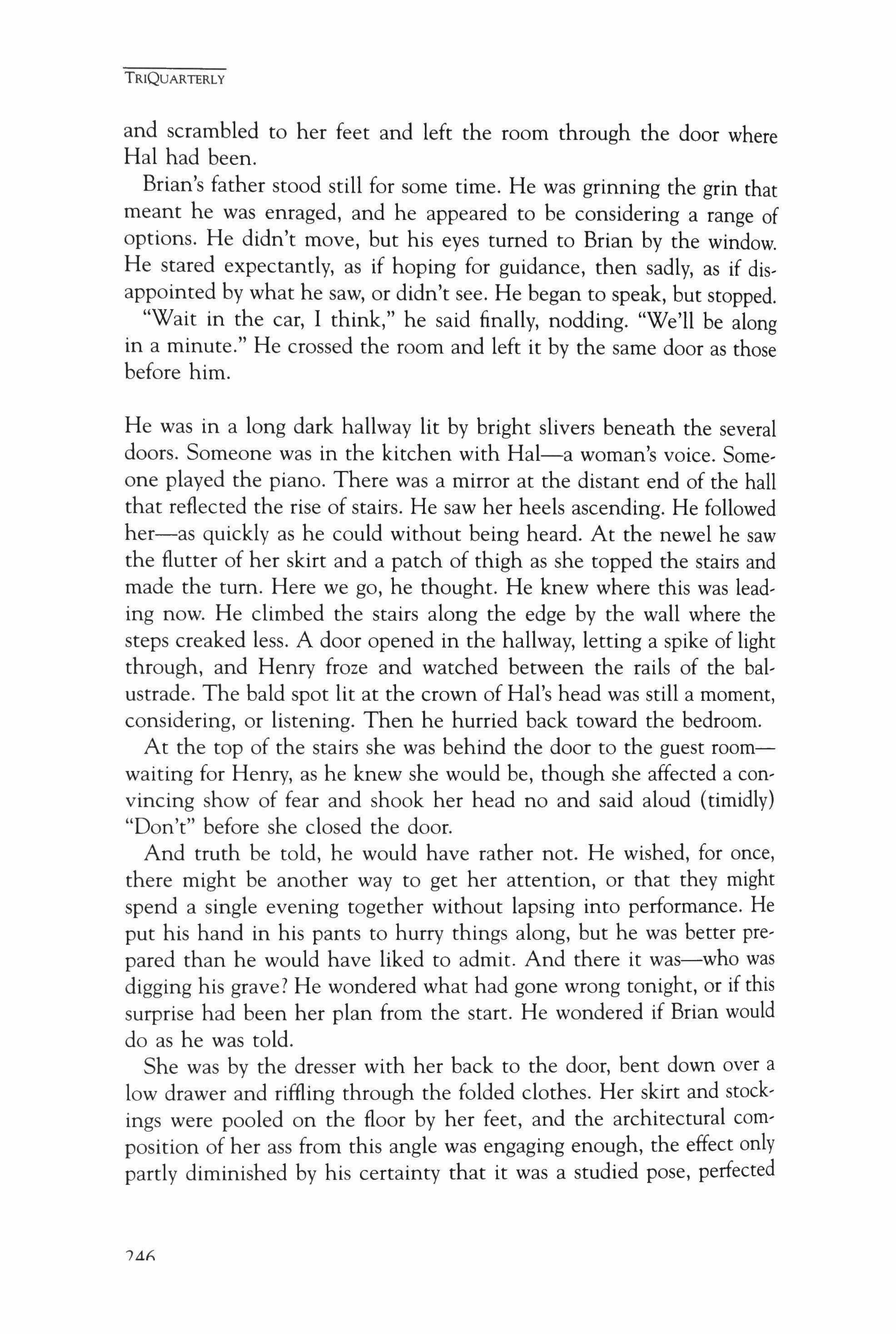
and scrambled to her feet and left the room through the door where Hal had been.
Brian's father stood still for some time. He was grinning the grin that meant he was enraged, and he appeared to be considering a range of options. He didn't move, but his eyes turned to Brian by the window. He stared expectantly, as if hoping for guidance, then sadly, as if disappointed by what he saw, or didn't see. He began to speak, but stopped. "Wait in the car, I think," he said finally, nodding. "We'll be along in a minute." He crossed the room and left it by the same door as those before him.
He was in a long dark hallway lit by bright slivers beneath the several doors. Someone was in the kitchen with Hal-a woman's voice. Someone played the piano. There was a mirror at the distant end of the hall that reflected the rise of stairs. He saw her heels ascending. He followed her-as quickly as he could without being heard. At the newel he saw the flutter of her skirt and a patch of thigh as she topped the stairs and made the tum. Here we go, he thought. He knew where this was leading now. He climbed the stairs along the edge by the wall where the steps creaked less. A door opened in the hallway, letting a spike of light through, and Henry froze and watched between the rails of the balustrade. The bald spot lit at the crown of Hal's head was still a moment, considering, or listening. Then he hurried back toward the bedroom.
At the top of the stairs she was behind the door to the guest roomwaiting for Henry, as he knew she would be, though she affected a convincing show of fear and shook her head no and said aloud (timidly) "Don't" before she closed the door.
And truth be told, he would have rather not. He wished, for once, there might be another way to get her attention, or that they might spend a single evening together without lapsing into performance. He put his hand in his pants to hurry things along, but he was better prepared than he would have liked to admit. And there it was-who was digging his grave? He wondered what had gone wrong tonight, or if this surprise had been her plan from the start. He wondered if Brian would do as he was told.
She was by the dresser with her back to the door, bent down over a low drawer and riffling through the folded clothes. Her skirt and stockings were pooled on the floor by her feet, and the architectural composition of her ass from this angle was engaging enough, the effect only partly diminished by his certainty that it was a studied pose, perfected
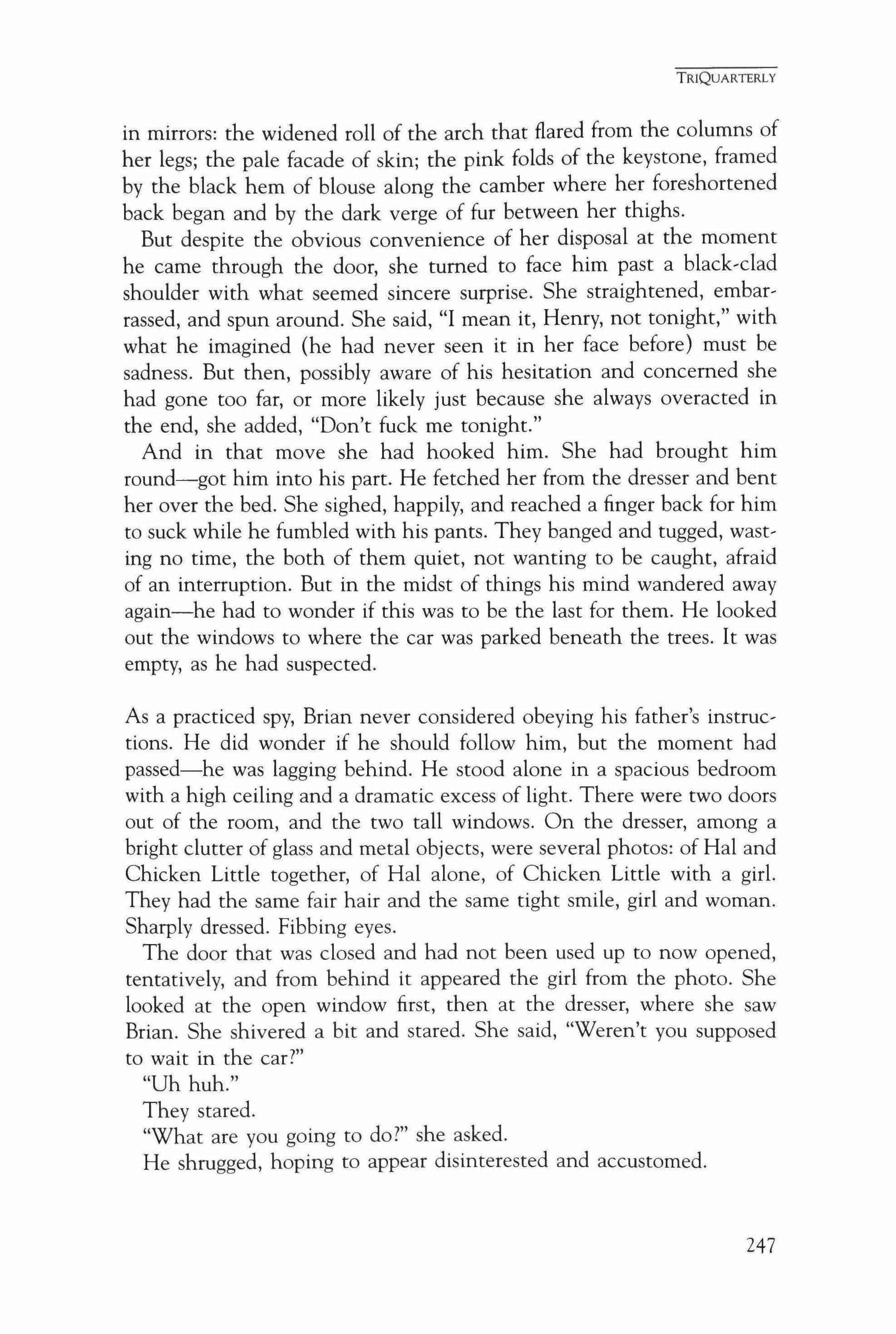
in mirrors: the widened roll of the arch that flared from the columns of her legs; the pale facade of skin; the pink folds of the keystone, framed by the black hem of blouse along the camber where her foreshortened back began and by the dark verge of fur between her thighs.
But despite the obvious convenience of her disposal at the moment he came through the door, she turned to face him past a black-clad shoulder with what seemed sincere surprise. She straightened, embarrassed, and spun around. She said, "I mean it, Henry, not tonight," with what he imagined (he had never seen it in her face before) must be sadness. But then, possibly aware of his hesitation and concerned she had gone too far, or more likely just because she always overacted in the end, she added, "Don't fuck me tonight."
And in that move she had hooked him. She had brought him round-got him into his part. He fetched her from the dresser and bent her over the bed. She sighed, happily, and reached a finger back for him to suck while he fumbled with his pants. They banged and tugged, wasting no time, the both of them quiet, not wanting to be caught, afraid of an interruption. But in the midst of things his mind wandered away again-he had to wonder if this was to be the last for them. He looked out the windows to where the car was parked beneath the trees. It was empty, as he had suspected.
As a practiced spy, Brian never considered obeying his father's instructions. He did wonder if he should follow him, but the moment had passed-he was lagging behind. He stood alone in a spacious bedroom with a high ceiling and a dramatic excess of light. There were two doors out of the room, and the two tall windows. On the dresser, among a bright clutter of glass and metal objects, were several photos: of Hal and Chicken Little together, of Hal alone, of Chicken Little with a girl. They had the same fair hair and the same tight smile, girl and woman.
Sharply dressed. Fibbing eyes.
The door that was closed and had not been used up to now opened, tentatively, and from behind it appeared the girl from the photo. She looked at the open window first, then at the dresser, where she saw Brian. She shivered a bit and stared. She said, "Weren't you supposed to wait in the car?"
"Uh huh."
They stared.
"What are you going to do?" she asked. He shrugged, hoping to appear disinterested and accustomed.
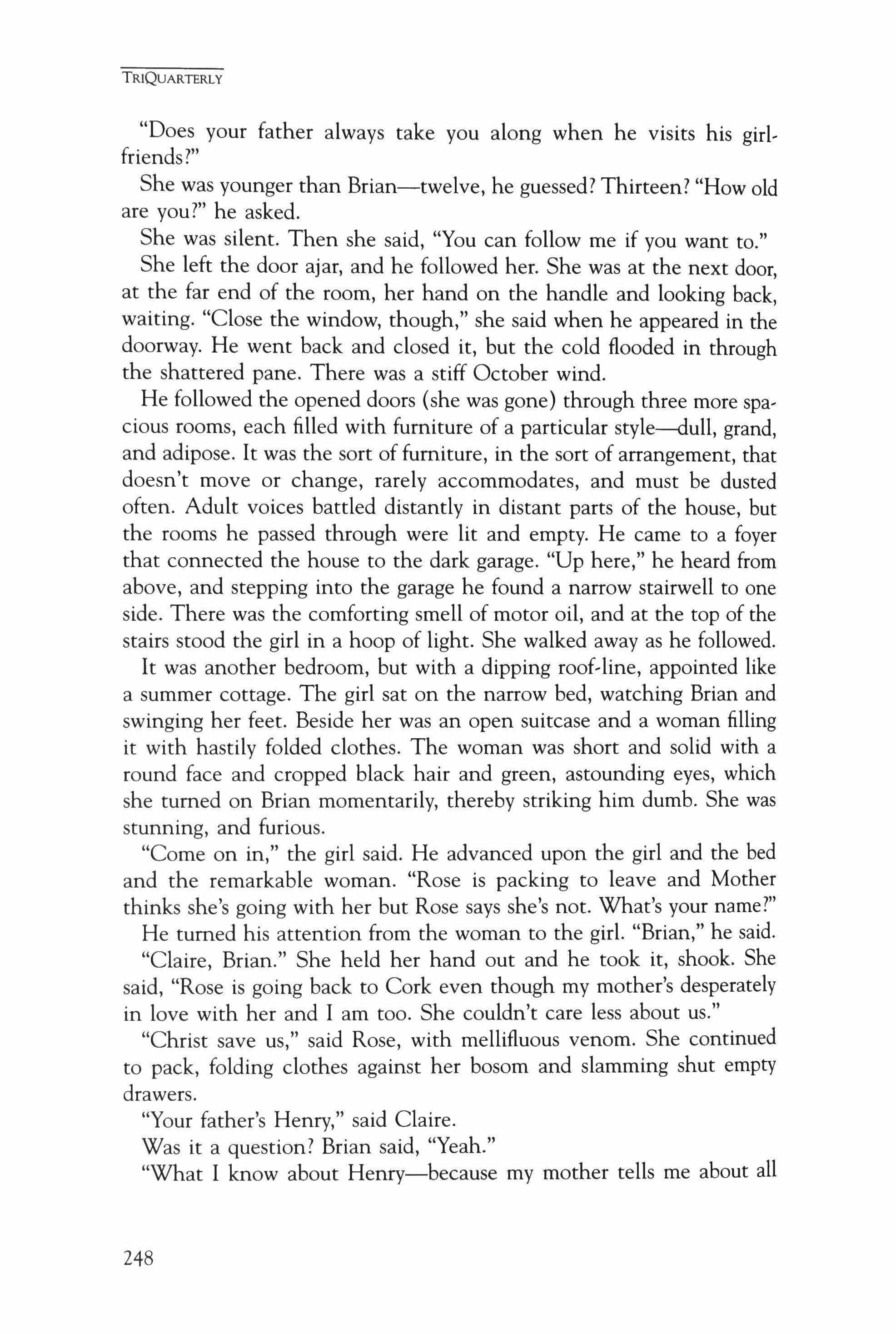
"Does your father always take you along when he visits his girlfriends?"
She was younger than Brian-twelve, he guessed? Thirteen? "How old are yOU?" he asked.
She was silent. Then she said, "You can follow me if you want to."
She left the door ajar, and he followed her. She was at the next door, at the far end of the room, her hand on the handle and looking back, waiting. "Close the window, though," she said when he appeared in the doorway. He went back and closed it, but the cold flooded in through the shattered pane. There was a stiff October wind.
He followed the opened doors {she was gone} through three more spacious rooms, each filled with furniture of a particular style-dull, grand, and adipose. It was the sort of furniture, in the sort of arrangement, that doesn't move or change, rarely accommodates, and must be dusted often. Adult voices battled distantly in distant parts of the house, but the rooms he passed through were lit and empty. He came to a foyer that connected the house to the dark garage. "Up here," he heard from above, and stepping into the garage he found a narrow stairwell to one side. There was the comforting smell of motor oil, and at the top of the stairs stood the girl in a hoop of light. She walked away as he followed.
It was another bedroom, but with a dipping roof-line, appointed like a summer cottage. The girl sat on the narrow bed, watching Brian and swinging her feet. Beside her was an open suitcase and a woman filling it with hastily folded clothes. The woman was short and solid with a round face and cropped black hair and green, astounding eyes, which she turned on Brian momentarily, thereby striking him dumb. She was stunning, and furious.
"Come on in," the girl said. He advanced upon the girl and the bed and the remarkable woman. "Rose is packing to leave and Mother thinks she's going with her but Rose says she's not. What's your name?"
He turned his attention from the woman to the girl. "Brian," he said.
"Claire, Brian." She held her hand out and he took it, shook. She said, "Rose is going back to Cork even though my mother's desperately in love with her and I am too. She couldn't care less about us."
"Christ save us," said Rose, with mellifluous venom. She continued to pack, folding clothes against her bosom and slamming shut empty drawers.
"Your father's Henry," said Claire. Was it a question? Brian said, "Yeah."
"What I know about Henry-because my mother tells me about all
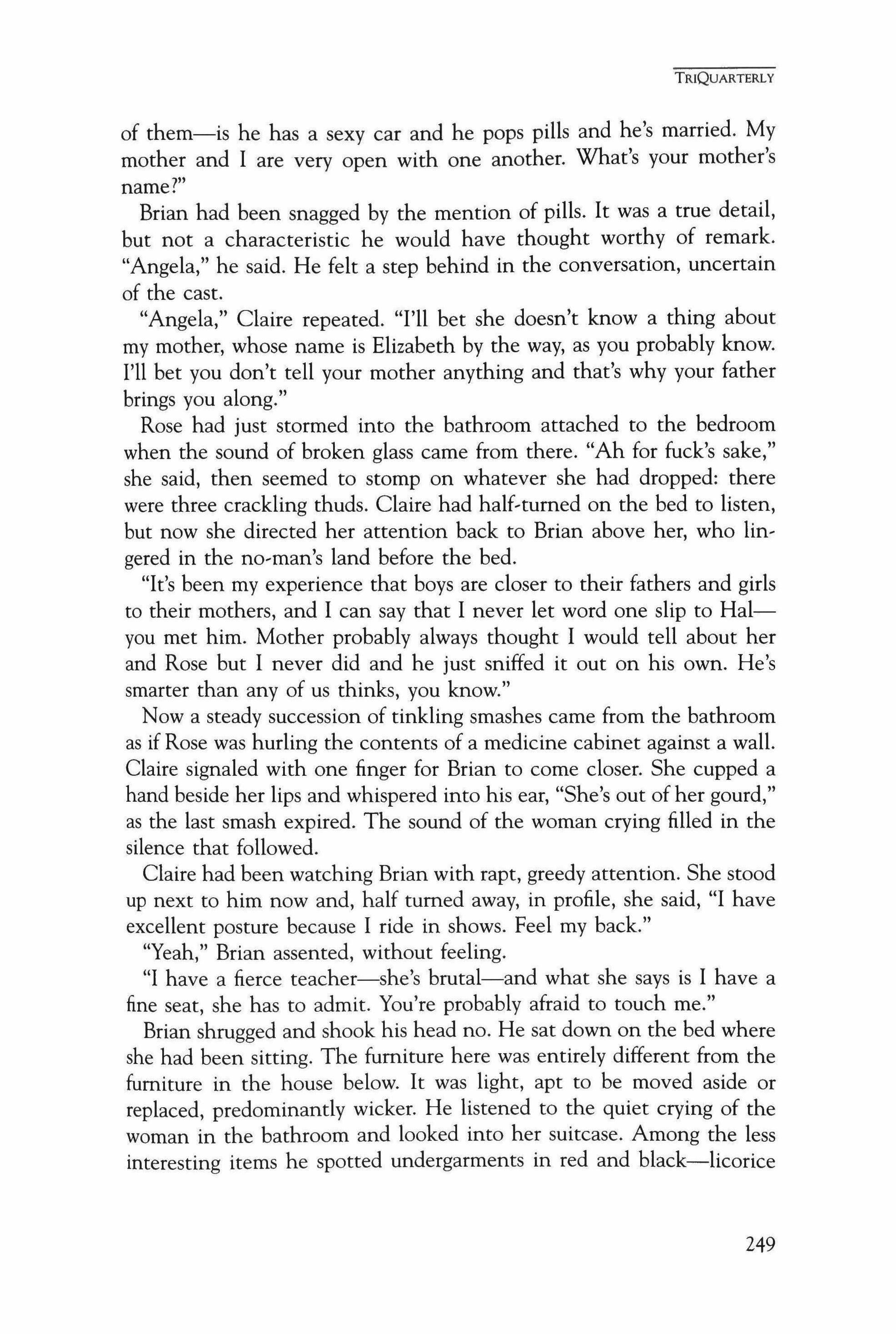
of them-is he has a sexy car and he pops pills and he's married. My mother and I are very open with one another. What's your mother's name?"
Brian had been snagged by the mention of pills. It was a true detail, but not a characteristic he would have thought worthy of remark. "Angela," he said. He felt a step behind in the conversation, uncertain of the cast.
"Angela," Claire repeated. "I'll bet she doesn't know a thing about my mother, whose name is Elizabeth by the way, as you probably know. I'll bet you don't tell your mother anything and that's why your father brings you along."
Rose had just stormed into the bathroom attached to the bedroom when the sound of broken glass came from there. "Ah for fuck's sake," she said, then seemed to stomp on whatever she had dropped: there were three crackling thuds. Claire had half,turned on the bed to listen, but now she directed her attention back to Brian above her, who lin, gered in the no-man's land before the bed.
"It's been my experience that boys are closer to their fathers and girls to their mothers, and I can say that I never let word one slip to Halyou met him. Mother probably always thought I would tell about her and Rose but I never did and he just sniffed it out on his own. He's smarter than any of us thinks, you know."
Now a steady succession of tinkling smashes came from the bathroom as if Rose was hurling the contents of a medicine cabinet against a wall. Claire signaled with one finger for Brian to come closer. She cupped a hand beside her lips and whispered into his ear, "She's out of her gourd," as the last smash expired. The sound of the woman crying filled in the silence that followed.
Claire had been watching Brian with rapt, greedy attention. She stood up next to him now and, half turned away, in profile, she said, "I have excellent posture because I ride in shows. Feel my back."
"Yeah," Brian assented, without feeling.
"I have a fierce teacher-she's brutal-and what she says is I have a fine seat, she has to admit. You're probably afraid to touch me."
Brian shrugged and shook his head no. He sat down on the bed where she had been sitting. The furniture here was entirely different from the furniture in the house below. It was light, apt to be moved aside or replaced, predominantly wicker. He listened to the quiet crying of the woman in the bathroom and looked into her suitcase. Among the less interesting items he spotted undergarments in red and black-licorice
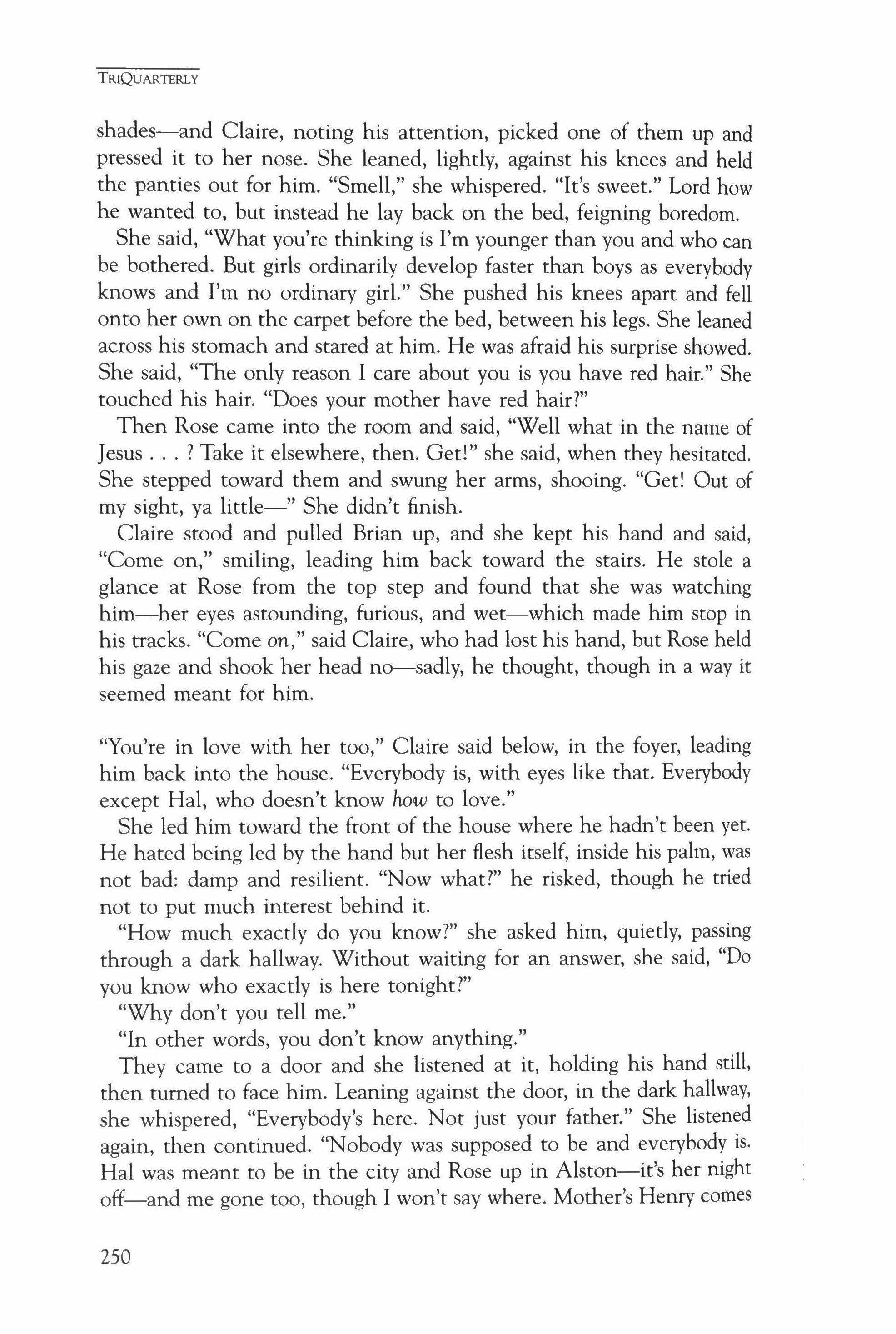
shades-and Claire, noting his attention, picked one of them up and pressed it to her nose. She leaned, lightly, against his knees and held the panties out for him. "Smell," she whispered. "It's sweet." Lord how he wanted to, but instead he lay back on the bed, feigning boredom.
She said, "What you're thinking is I'm younger than you and who can be bothered. But girls ordinarily develop faster than boys as everybody knows and I'm no ordinary girl." She pushed his knees apart and fell onto her own on the carpet before the bed, between his legs. She leaned across his stomach and stared at him. He was afraid his surprise showed. She said, "The only reason I care about you is you have red hair." She touched his hair. "Does your mother have red hair?"
Then Rose came into the room and said, "Well what in the name of Jesus ? Take it elsewhere, then. Get!" she said, when they hesitated. She stepped toward them and swung her arms, shooing. "Get! Out of my sight, ya little-" She didn't finish.
Claire stood and pulled Brian up, and she kept his hand and said, "Come on," smiling, leading him back toward the stairs. He stole a glance at Rose from the top step and found that she was watching him-her eyes astounding, furious, and wet-which made him stop in his tracks. "Come on," said Claire, who had lost his hand, but Rose held his gaze and shook her head no-sadly, he thought, though in a way it seemed meant for him.
"You're in love with her too," Claire said below, in the foyer, leading him back into the house. "Everybody is, with eyes like that. Everybody except Hal, who doesn't know how to love."
She led him toward the front of the house where he hadn't been yet. He hated being led by the hand but her flesh itself, inside his palm, was not bad: damp and resilient. "Now what?" he risked, though he tried not to put much interest behind it.
"How much exactly do you know?" she asked him, quietly, passing through a dark hallway. Without waiting for an answer, she said, "Do you know who exactly is here tonight?"
"Why don't you tell me."
"In other words, you don't know anything."
They came to a door and she listened at it, holding his hand still, then turned to face him. Leaning against the door, in the dark hallway, she whispered, "Everybody's here. Not just your father." She listened again, then continued. "Nobody was supposed to be and everybody is. Hal was meant to be in the city and Rose up in Alston-it's her night off-and me gone too, though I won't say where. Mother's Henry comes
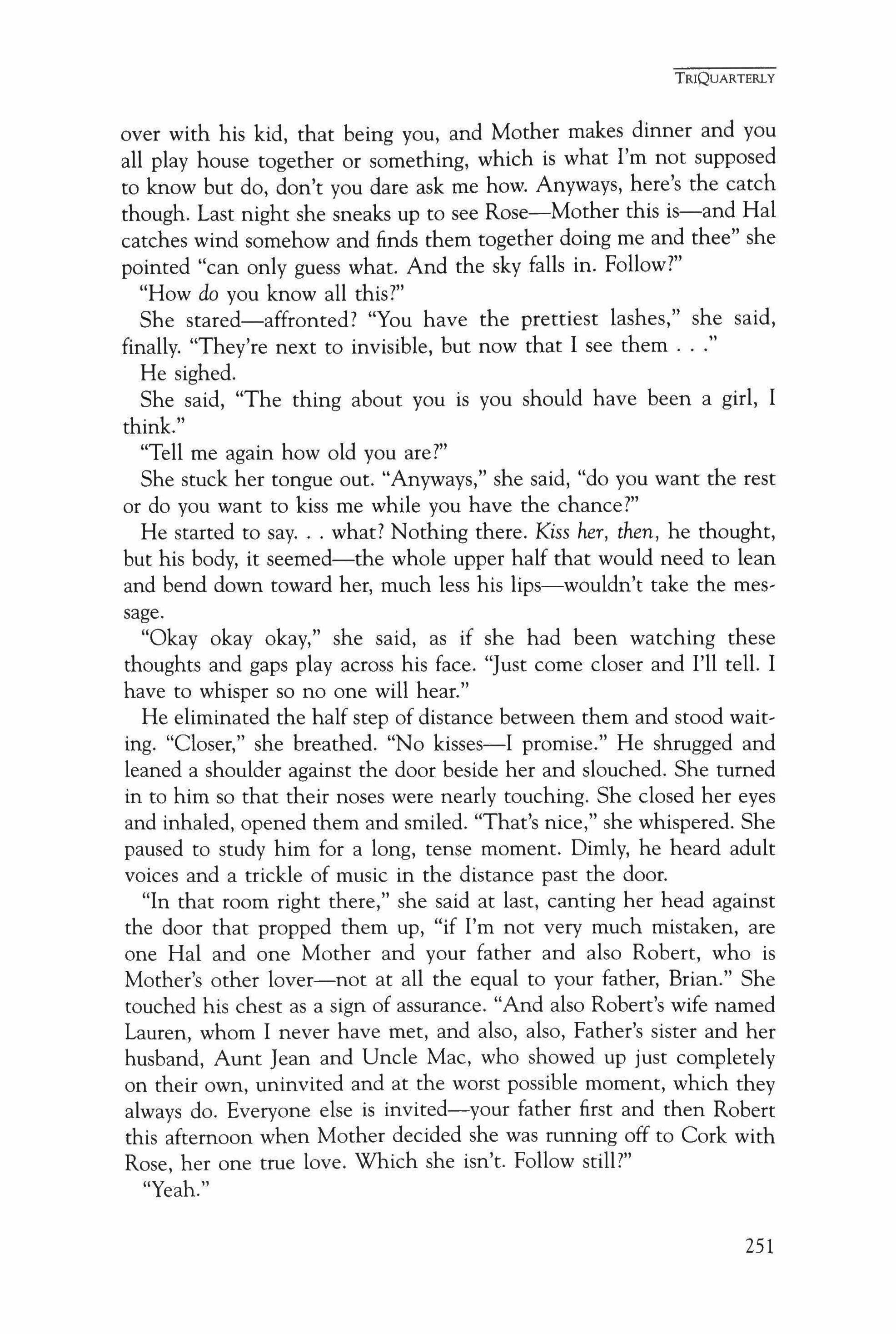
over with his kid, that being you, and Mother makes dinner and you all play house together or something, which is what I'm not supposed to know but do, don't you dare ask me how. Anyways, here's the catch though. Last night she sneaks up to see Rose-Mother this is-and Hal catches wind somehow and finds them together doing me and thee" she pointed "can only guess what. And the sky falls in. Follow?"
"How do you know all this?"
She stared-affronted? "You have the prettiest lashes," she said, finally. "They're next to invisible, but now that I see them
He sighed.
She said, "The thing about you is you should have been a girl, think."
"Tell me again how old you are?"
She stuck her tongue out. "Anvways," she said, "do you want the rest or do you want to kiss me while you have the chance?"
He started to say what? Nothing there. Kiss her, then, he thought, but his body, it seemed-the whole upper half that would need to lean and bend down toward her, much less his lips-wouldn't take the message.
"Okay okay okay," she said, as if she had been watching these thoughts and gaps play across his face. "Just come closer and I'll tell. I have to whisper so no one will hear."
He eliminated the half step of distance between them and stood waiting. "Closer," she breathed. "No kisses-I promise." He shrugged and leaned a shoulder against the door beside her and slouched. She turned in to him so that their noses were nearly touching. She closed her eyes and inhaled, opened them and smiled. "That's nice," she whispered. She paused to study him for a long, tense moment. Dimly, he heard adult voices and a trickle of music in the distance past the door.
"In that room right there," she said at last, canting her head against the door that propped them up, "if I'm not very much mistaken, are one Hal and one Mother and your father and also Robert, who is Mother's other lover-not at all the equal to your father, Brian." She touched his chest as a sign of assurance. "And also Robert's wife named Lauren, whom I never have met, and also, also, Father's sister and her husband, Aunt Jean and Uncle Mac, who showed up just completely on their own, uninvited and at the worst possible moment, which they always do. Everyone else is invited-your father first and then Robert this afternoon when Mother decided she was running off to Cork with Rose, her one true love. Which she isn't. Follow still?"
"Yeah."

"You're bright," she said, sincerely it seemed.
"You're precocious," he replied.
Which made her smile and hunch her shoulders with shy delight and touch his nose with her fingertip. "What a word!" she said. "If I hadn't promised, I would kiss you now, you sweet boy."
So he did kiss her. It was easier than expected. And pleasant too, particularly since she was either unprepared or less precocious than she seemed and her lips were still and parted.
"Well," she said, registering surprise. Then, "Hold that thought. First we should make an unexpected appearance."
She took his hand. With her free hand she flung the door open upon a massive, largely empty, brightly-lit room with upholstered sofas and a grand piano, leaded-glass windows and a fireplace in which a mild fire muttered. A man sat at the piano, playing, but there was no one else in sight. Claire was evidently disappointed. It took the man a remarkably long time to tum his attention toward the commotion she had made of the door, and his playing never faltered while he watched them across the flat rim of his halved glasses. He was roughly as thick as wide, with a back that declined sharply in contrast to a long, sloping front; his gray-bearded head perched atop the crown of his shoulders like a chimney. Past him, at the opposite end of the room, was a paneled door on runners, ajar. From behind it came a bustle of voices in an indeterminate mood. Ignoring the man at the piano, ignoring the music (as all three of them seemed to), Claire advanced upon this second door, dragging Brian behind her. The man watched their approach over one shoulder, their departure over the other. Brian could not help meeting the man's stare. He loosed his hand from Claire's and managed to fall a step behind as she repeated her violent entrance.
"Ah," said Hal, immediately, as if he had anticipated them, "the children! Look everyone, it's the children! Just what we need! Come in, Claire, come in. Bring your little friend."
Though the door still rattled in its casing, Claire said, "Don't mind us, Papa. We don't want to disturb the grown-ups."
"Of course not, Peaches."
This room was as large as the last, and similarly appointed. Another piano-a stand-up-was crowded into a comer as if disciplined. There was no fire in the fireplace, though, and a long table at which no one was seated occupied the center breadth of the room.
Hal seemed to have been on his way out, but his path was blocked by a disheveled woman evidently in the grip of either sadness or hatred.

Her desolate attention turned to Claire and Brian, and she asked, "Whose children are those?"
"Where's Mummy?" Claire asked her father, with bright indifference to the woman.
"These are your children?" the woman said to Hal. "Good Lord, Robert, what are we doing here? Tell me what it is we're doing here."
Brian presumed, though there was no clear indication, that Robert was the very tall man who stood by the fireplace and leaned his head, with poor posture, on an elbow supported by the mantle there. His length was partly bent over an armchair in which an older woman with a grandmotherly grin sat stiff and straight, her legs dangling well above the floor. This man turned his attention to the desperate woman in the doorway. In response to her question he smiled and nodded, as if politely acknowledging a joke he had heard before.
"Claire," Hal answered, with patronizing pride, "you've struck upon the thousand dollar question, you little wonder. Where's Mummy indeed-you've hit the proverbial nail, Sweetums."
Claire smiled at her father. Holding the smile, she turned her attention to the woman beside him. "I'm Claire," she said, crossing the room now, abandoning Brian, negotiating the comer of the enormous table and leading with her outstretched hand. "Elizabeth and Hal's daughter Claire. You must be Lauren."
The woman shrank from her. "Don't shove your hand at me, little girl."
"Well now," said the man by the fireplace-Robert-with conciliatory apology.
"She can be rude," the older woman allowed.
"We're looking for Mummy and Henry," Claire said, her attention returned to her father, her smile intact. "Brian and I are." Her voice had acquired a British curl. "We've been to see Rose just now and we're charged with a secret for Mummy."
"Yes," Hal said. "Of course you are."
"So you see we're very anxious "
"What is the problem with all of you?"
Lauren had backed up a step-she was in the next room more than this one now-and she stamped her foot for emphasis.
"Why is she talking that way? Are all of you completely out of your minds?"
Claire said, "She interrupted me, Papa." "Mm," he nodded, apparently bemused.
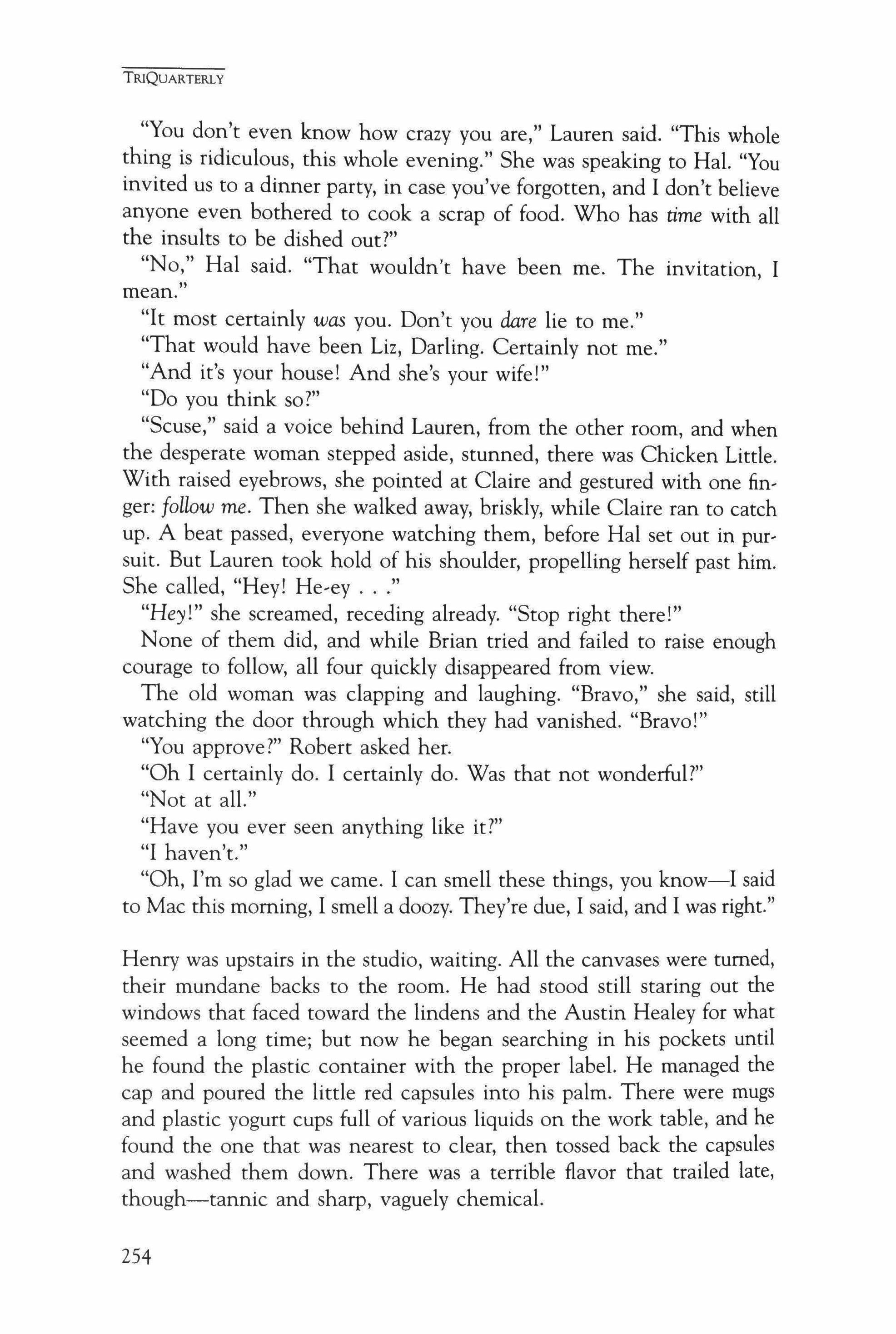
"You don't even know how crazy you are," Lauren said. "This whole thing is ridiculous, this whole evening." She was speaking to Hal. "You invited us to a dinner party, in case you've forgotten, and I don't believe anyone even bothered to cook a scrap of food. Who has time with all the insults to be dished out?"
"No," Hal said. "That wouldn't have been me. The invitation, I mean."
"It most certainly was you. Don't you dare lie to me."
"That would have been Liz, Darling. Certainly not me."
"And it's your house! And she's your wife!"
"Do you think SO?"
"Scuse," said a voice behind Lauren, from the other room, and when the desperate woman stepped aside, stunned, there was Chicken Little. With raised eyebrows, she pointed at Claire and gestured with one finger: follow me. Then she walked away, briskly, while Claire ran to catch up. A beat passed, everyone watching them, before Hal set out in pursuit. But Lauren took hold of his shoulder, propelling herself past him. She called, "Hey! He-ey
"Hey!" she screamed, receding already. "Stop right there!"
None of them did, and while Brian tried and failed to raise enough courage to follow, all four quickly disappeared from view.
The old woman was clapping and laughing. "Bravo," she said, still watching the door through which they had vanished. "Bravo!"
"You approve?" Robert asked her.
"Oh I certainly do. I certainly do. Was that not wonderful?"
"Not at all."
"Have you ever seen anything like it?"
"I haven't."
"Oh, I'm so glad we came. I can smell these things, you know-I said to Mac this morning, I smell a doozy. They're due, I said, and I was right."
Henry was upstairs in the studio, waiting. All the canvases were turned, their mundane backs to the room. He had stood still staring out the windows that faced toward the lindens and the Austin Healey for what seemed a long time; but now he began searching in his pockets until he found the plastic container with the proper label. He managed the cap and poured the little red capsules into his palm. There were mugs and plastic yogurt cups full of various liquids on the work table, and he found the one that was nearest to clear, then tossed back the capsules and washed them down. There was a terrible flavor that trailed late, though-tannic and sharp, vaguely chemical.
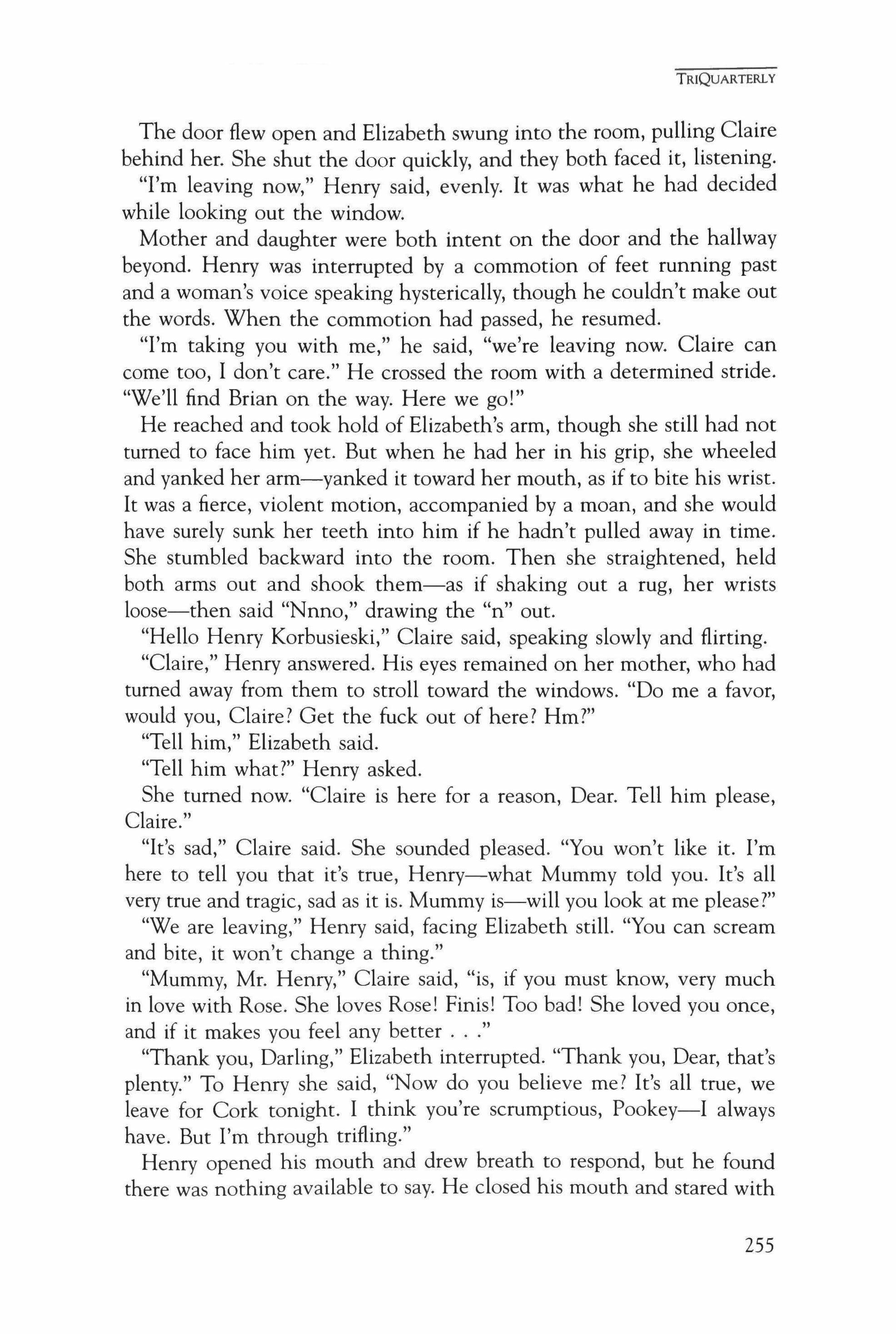
The door flew open and Elizabeth swung into the room, pulling Claire behind her. She shut the door quickly, and they both faced it, listening.
"I'm leaving now," Henry said, evenly. It was what he had decided while looking out the window.
Mother and daughter were both intent on the door and the hallway beyond. Henry was interrupted by a commotion of feet running past and a woman's voice speaking hysterically, though he couldn't make out the words. When the commotion had passed, he resumed.
"I'm taking you with me," he said, "we're leaving now. Claire can come too, I don't care." He crossed the room with a determined stride. "We'll find Brian on the way. Here we go!"
He reached and took hold of Elizabeth's arm, though she still had not turned to face him yet. But when he had her in his grip, she wheeled and yanked her arm-yanked it toward her mouth, as if to bite his wrist. It was a fierce, violent motion, accompanied by a moan, and she would have surely sunk her teeth into him if he hadn't pulled away in time. She stumbled backward into the room. Then she straightened, held both arms out and shook them-as if shaking out a rug, her wrists loose-then said "Nnno," drawing the "n" out.
"Hello Henry Korbusieski," Claire said, speaking slowly and flirting. "Claire," Henry answered. His eyes remained on her mother, who had turned away from them to stroll toward the windows. "Do me a favor, would you, Claire? Get the fuck out of here? Hm?"
"Tell him," Elizabeth said.
"Tell him what?" Henry asked.
She turned now. "Claire is here for a reason, Dear. Tell him please, Claire."
"It's sad," Claire said. She sounded pleased. "You won't like it. I'm here to tell you that it's true, Henry-what Mummy told you. It's all very true and tragic, sad as it is. Mummy is-will you look at me please?"
"We are leaving," Henry said, facing Elizabeth still. "You can scream and bite, it won't change a thing."
"Mummy, Mr. Henry," Claire said, "is, if you must know, very much in love with Rose. She loves Rose! Finis! Too bad! She loved you once, and if it makes you feel any better
"Thank you, Darling," Elizabeth interrupted. "Thank you, Dear, that's plenty." To Henry she said, "Now do you believe me? It's all true, we leave for Cork tonight. I think you're scrumptious, Pookey-I always have. But I'm through trifling."
Henry opened his mouth and drew breath to respond, but he found there was nothing available to say. He closed his mouth and stared with

dumb wonder at this lover who had often astonished him. She was lovely-yes-but not startling, really. Not extraordinary. Nothing special, finally. She was not young anymore; she was as old as he was. There were lines at the comers of her eyes and her forehead creased more often than not. It's possible her hair was colored. He felt unwell, and his vision seemed to be blurring, probably from whatever had been in that cup he drank from, but it was true-he felt he could trust this realization the moment it arrived: she wasn't stunning anymore. She wasn't rich, really-it was Hal's fortune. She was crazy, and inept, when you got down to it, at any endeavor other than fucking. She wasn't even a very good actress anymore. She wouldn't last a day outside the Tri-state area, much less in Cork with Rose the nanny. What in the world was he doing here? How had it gotten this far?
Henry himself was just past forty now, though his fair complexion and his surplus of energy suggested a younger man. There had been a night, not long ago, driving the hour back home from a rendezvous with Elizabeth, when he had thought, I can't keep doing this. I'm becoming a fool. The lake at home was desolate, as usual, but the light upon itthe reflection of so many fallen leaves-was beautiful in its way that night, if you took a second look. The air smelled of snow-a cleansing, portentous chill. It usually depressed him to drive home in winter, when his town had been stripped to its core of farms, the wealthy returned to their first homes, but this particular evening it had occurred to him that there were people down in the city-his clients, in fact-who would kill to stay out here all year. Angela had greeted him cheerfully, as he supposed she nearly always did. Her cheek was flush and warm to kiss. She herself had been his prize once, abducted from Elizabeth's end of the state. She wore sleeveless shirts back then; she rowed crew at Yale. She had impressed him the night they met (though unintentionally; she hadn't cared to impress him then) with her batch of gimlets in a tall pitcher. This particular evening she'd made the season's first wassail-the house was saturated with a fragrance out of some uptown boutique. He was disappointed, at first, to find June Kantor and Mary Phillips in the living room, but there was a fire lit, and the women were both solicitous, and Mary smelled sweetly of com and pumpkins and June was a head-turner beneath the frumpy sweaters. He sat with the women and chatted and laughed; drank his wassail and fed the fire. And he found himself taking what he hoped was an honest accounting of the measure of allure still left to him. His jowls, he knew, were the jowls of an older man. He had a menacing brow (it had served him well),
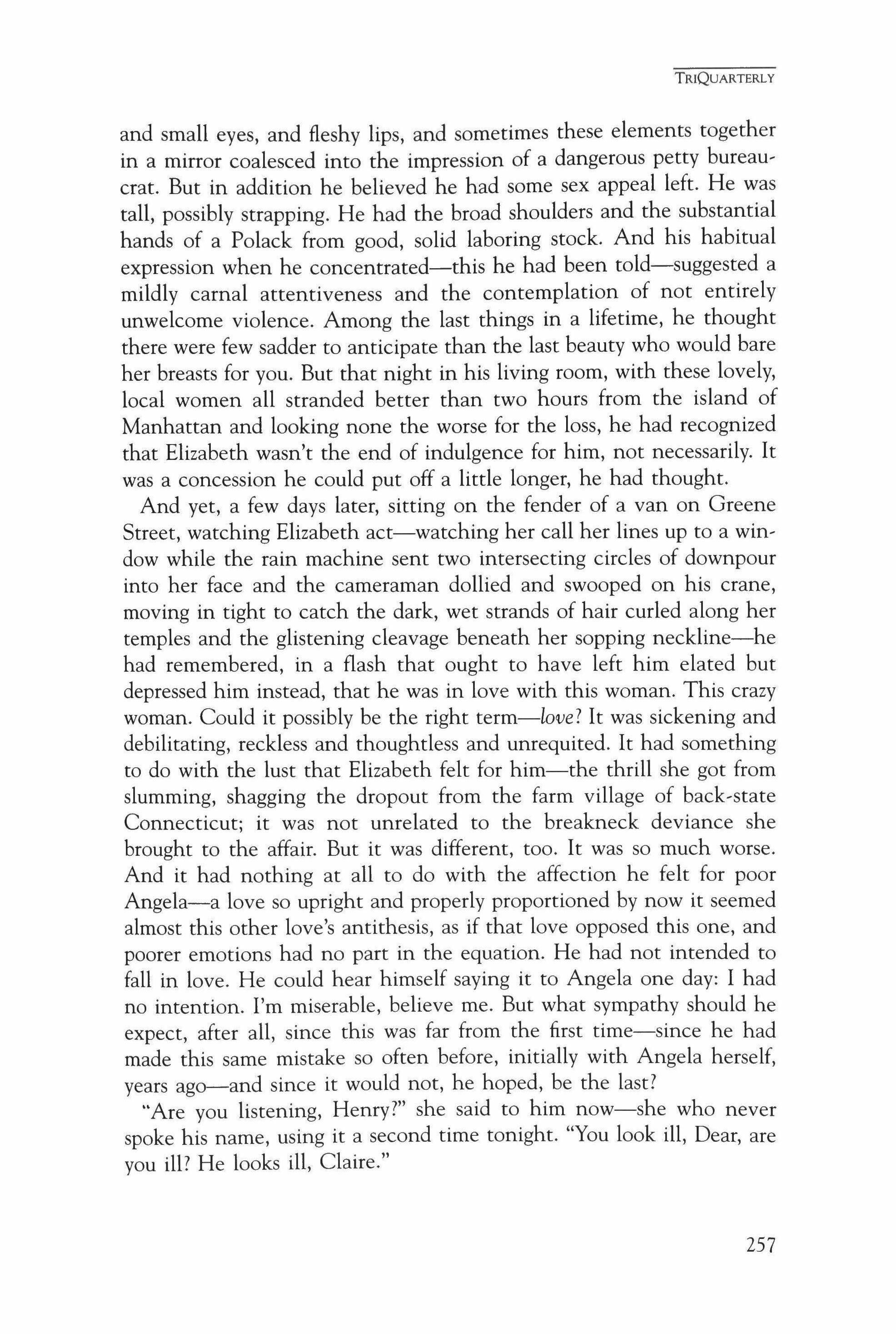
and small eyes, and fleshy lips, and sometimes these elements together in a mirror coalesced into the impression of a dangerous petty bureaucrat. But in addition he believed he had some sex appeal left. He was tall, possibly strapping. He had the broad shoulders and the substantial hands of a Polack from good, solid laboring stock. And his habitual expression when he concentrated-this he had been told-suggested a mildly carnal attentiveness and the contemplation of not entirely unwelcome violence. Among the last things in a lifetime, he thought there were few sadder to anticipate than the last beauty who would bare her breasts for you. But that night in his living room, with these lovely, local women all stranded better than two hours from the island of Manhattan and looking none the worse for the loss, he had recognized that Elizabeth wasn't the end of indulgence for him, not necessarily. It was a concession he could put off a little longer, he had thought.
And yet, a few days later, sitting on the fender of a van on Greene Street, watching Elizabeth act-watching her call her lines up to a window while the rain machine sent two intersecting circles of downpour into her face and the cameraman dollied and swooped on his crane, moving in tight to catch the dark, wet strands of hair curled along her temples and the glistening cleavage beneath her sopping neckline-he had remembered, in a flash that ought to have left him elated but depressed him instead, that he was in love with this woman. This crazy woman. Could it possibly be the right term-love? It was sickening and debilitating, reckless and thoughtless and unrequited. It had something to do with the lust that Elizabeth felt for him-the thrill she got from slumming, shagging the dropout from the farm village of back-state Connecticut; it was not unrelated to the breakneck deviance she brought to the affair. But it was different, too. It was so much worse. And it had nothing at all to do with the affection he felt for poor Angela-a love so upright and properly proportioned by now it seemed almost this other love's antithesis, as if that love opposed this one, and poorer emotions had no part in the equation. He had not intended to fall in love. He could hear himself saying it to Angela one day: I had no intention. I'm miserable, believe me. But what sympathy should he expect, after all, since this was far from the first time-since he had made this same mistake so often before, initially with Angela herself, years ago-and since it would not, he hoped, be the last?
"Are you listening, Henry?" she said to him now-she who never spoke his name, using it a second time tonight. "You look ill, Dear, are you ill? He looks ill, Claire."
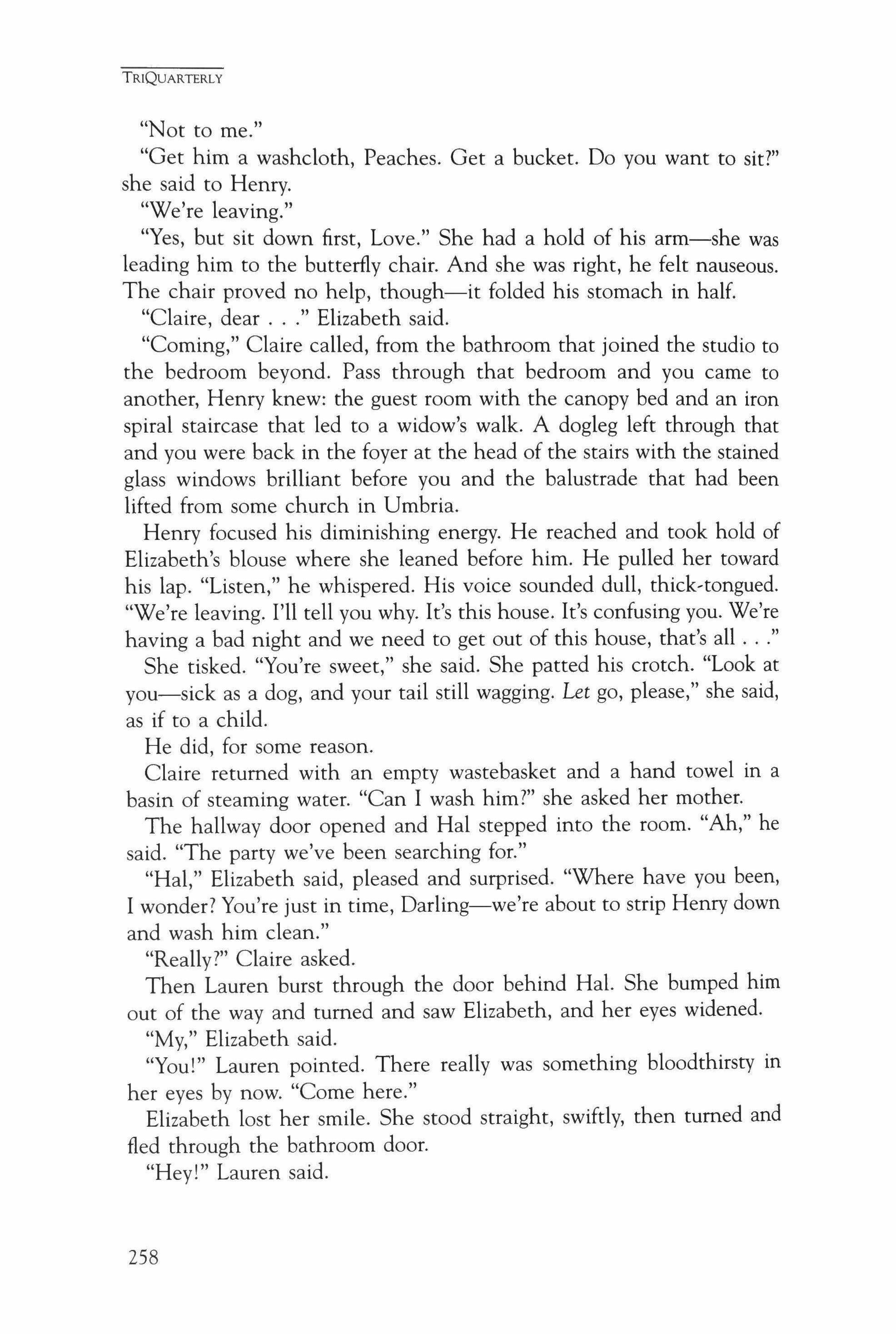
"Not to me."
"Get him a washcloth, Peaches. Get a bucket. Do you want to sit?" she said to Henry.
"We're leaving."
"Yes, but sit down first, Love." She had a hold of his arm-she was leading him to the butterfly chair. And she was right, he felt nauseous. The chair proved no help, though-it folded his stomach in half.
"Claire, dear Elizabeth said.
"Coming," Claire called, from the bathroom that joined the studio to the bedroom beyond. Pass through that bedroom and you came to another, Henry knew: the guest room with the canopy bed and an iron spiral staircase that led to a widow's walk. A dogleg left through that and you were back in the foyer at the head of the stairs with the stained glass windows brilliant before you and the balustrade that had been lifted from some church in Umbria.
Henry focused his diminishing energy. He reached and took hold of Elizabeth's blouse where she leaned before him. He pulled her toward his lap. "Listen," he whispered. His voice sounded dull, thick-tongued. "We're leaving. I'll tell you why. It's this house. It's confusing you. We're having a bad night and we need to get out of this house, that's all
She tisked. "You're sweet," she said. She patted his crotch. "Look at you-sick as a dog, and your tail still wagging. Let go, please," she said, as if to a child.
He did, for some reason.
Claire returned with an empty wastebasket and a hand towel in a basin of steaming water. "Can I wash him?" she asked her mother.
The hallway door opened and Hal stepped into the room. "Ah," he said. "The party we've been searching for."
"Hal," Elizabeth said, pleased and surprised. "Where have you been, I wonder? You're just in time, Darling-we're about to strip Henry down and wash him clean."
"Really?" Claire asked.
Then Lauren burst through the door behind Hal. She bumped him out of the way and turned and saw Elizabeth, and her eyes widened.
"My," Elizabeth said.
"You!" Lauren pointed. There really was something bloodthirsty in her eyes by now. "Come here."
Elizabeth lost her smile. She stood straight, swiftly, then turned and fled through the bathroom door.
"Hey!" Lauren said.

She pushed past Hal, who moved aside. Even Claire stepped out of her way. But there was something that rose then in Henry-to his distorted sensibilities, it seemed a noble impulse toward some act of chivalry. He had his fleeing lover in mind. As Lauren passed he reached out from where he sat in the butterfly chair and caught hold of her ankle-he had aimed for the left but ended up with the right. She toppled over and landed solidly. She picked her face up from the paintsplattered floor and looked at him with surprise-an evident sense of betrayal, even, as if she had counted on his support. She struggled to stand. But he had her ankle in his fist still and he slouched back in his chair without letting go, so that she slipped and fell again, awkwardly, her skirt riding up her pale legs. Claire laughed, then covered her mouth. Henry heard Hal say "Oh dear" under his breath.
Lauren turned to Henry again. "What's the matter with you?" she asked, the tears just beginning to break from the comers of her eyes.
He didn't know, exactly. But he kept her cool, bony ankle in his hand-like clutching a cat by the tail.
Brian stood in the doorway where Claire had just now left him. He took a deep breath, not at all sure of what to do with himself. He wondered where his father was. Then it occurred to him that he was supposed to be waiting outside, in the car. The old woman sat stiffly, grinning, as if through an intermission-her hands folded in her lap. Above her, Robert slouched and stared into the empty space between himself and one high comer of the ceiling. He seemed prepared to cry. Brian backed out quietly, and quietly slid the door to.
He approached the leaded windows in the adjoining room and cupped his hands against the glass to see out past his reflection. The Austin Healey was there still, across the lawn, at the head of the row of linden trees. There was a moon out, flashing momentarily between the clouds and lighting the silver car, and the wind blew the wooden wings of the goose. Only when he heard this clacking sound from through the window did the music still spilling from the piano beside him register in his brain. He turned around. The gray-bearded man sat playing, watching Brian over the top of his glasses.
He bore a stern frown, not angry so much as disgusted. "Please," he said, his voice a pitted rumble. "Take a seat."
He gestured, with the shift of his eyes, to a sofa not far from the window, facing the piano. Brian sat down. For the first time all evening, he half wished (surprised at himself) that the mistake which had taken him
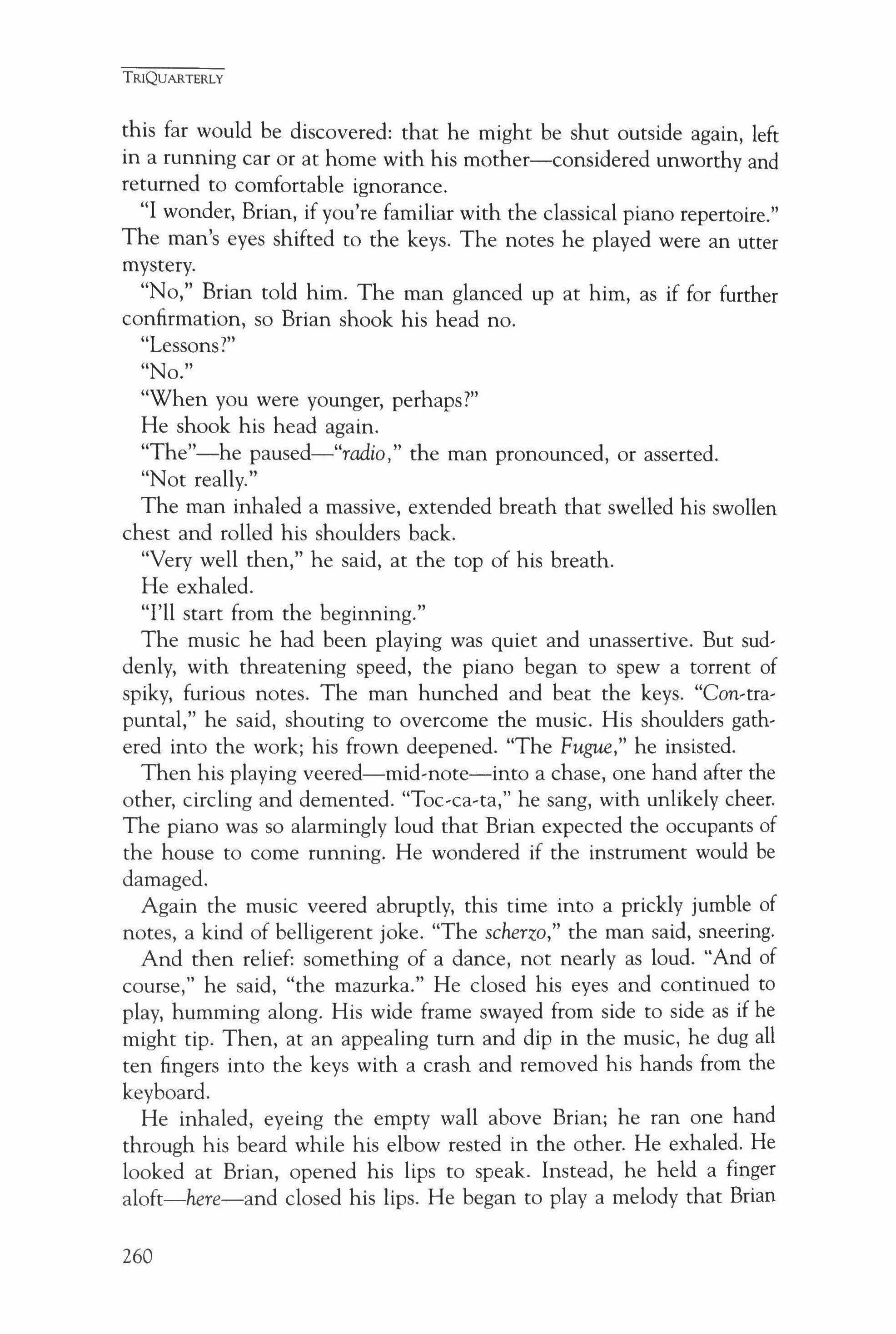
this far would be discovered: that he might be shut outside again, left in a running car or at home with his mother-considered unworthy and returned to comfortable ignorance.
"I wonder, Brian, if you're familiar with the classical piano repertoire." The man's eyes shifted to the keys. The notes he played were an utter mystery.
"No," Brian told him. The man glanced up at him, as if for further confirmation, so Brian shook his head no.
"Lessons?"
"No."
"When you were younger, perhaps?"
He shook his head again.
"The"-he paused-"radio," the man pronounced, or asserted.
"Not really."
The man inhaled a massive, extended breath that swelled his swollen chest and rolled his shoulders back.
"Very well then," he said, at the top of his breath.
He exhaled.
"I'll start from the beginning."
The music he had been playing was quiet and unassertive. But suddenly, with threatening speed, the piano began to spew a torrent of spiky, furious notes. The man hunched and beat the keys. "Con-trapuntal," he said, shouting to overcome the music. His shoulders gathered into the work; his frown deepened. "The Fugue," he insisted.
Then his playing veered-mid-note-into a chase, one hand after the other, circling and demented. "Toc-ca-ta," he sang, with unlikely cheer. The piano was so alarmingly loud that Brian expected the occupants of the house to come running. He wondered if the instrument would be damaged.
Again the music veered abruptly, this time into a prickly jumble of notes, a kind of belligerent joke. "The scherzo," the man said, sneering.
And then relief: something of a dance, not nearly as loud. "And of course," he said, "the mazurka." He closed his eyes and continued to play, humming along. His wide frame swayed from side to side as if he might tip. Then, at an appealing turn and dip in the music, he dug all ten fingers into the keys with a crash and removed his hands from the keyboard.
He inhaled, eyeing the empty wall above Brian; he ran one hand through his beard while his elbow rested in the other. He exhaled. He looked at Brian, opened his lips to speak. Instead, he held a finger aloft-here-and closed his lips. He began to playa melody that Brian
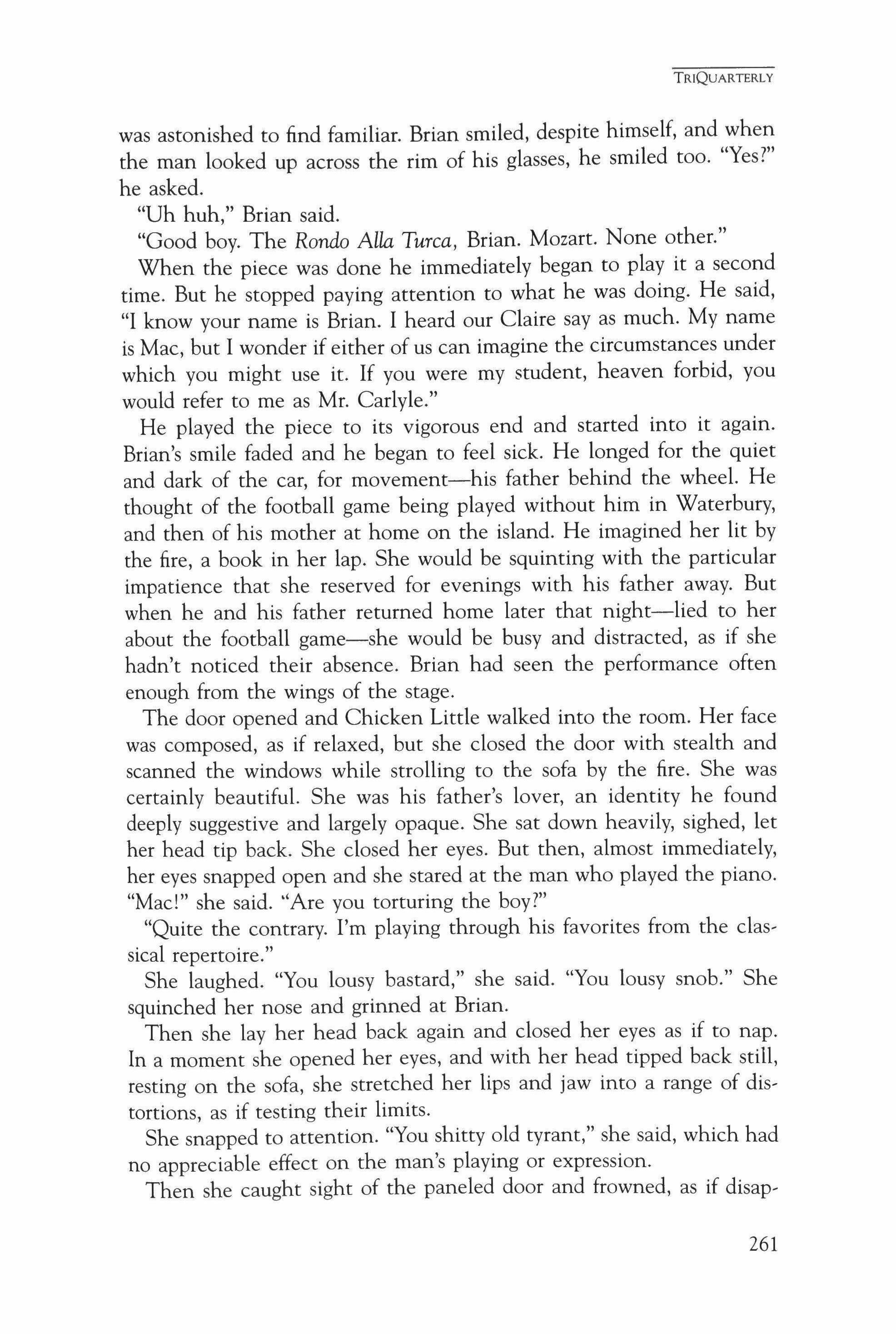
was astonished to find familiar. Brian smiled, despite himself, and when the man looked up across the rim of his glasses, he smiled too. "Yes?" he asked.
"Uh huh," Brian said.
"Good boy. The Rondo Alla Turca, Brian. Mozart. None other."
When the piece was done he immediately began to play it a second time. But he stopped paying attention to what he was doing. He said, "I know your name is Brian. I heard our Claire say as much. My name is Mac, but I wonder if either of us can imagine the circumstances under which you might use it. If you were my student, heaven forbid, you would refer to me as Mr. Carlyle."
He played the piece to its vigorous end and started into it again. Brian's smile faded and he began to feel sick. He longed for the quiet and dark of the car, for movement-his father behind the wheel. He thought of the football game being played without him in Waterbury, and then of his mother at home on the island. He imagined her lit by the fire, a book in her lap. She would be squinting with the particular impatience that she reserved for evenings with his father away. But when he and his father returned home later that night-lied to her about the football game-she would be busy and distracted, as if she hadn't noticed their absence. Brian had seen the performance often enough from the wings of the stage.
The door opened and Chicken Little walked into the room. Her face was composed, as if relaxed, but she closed the door with stealth and scanned the windows while strolling to the sofa by the fire. She was certainly beautiful. She was his father's lover, an identity he found deeply suggestive and largely opaque. She sat down heavily, sighed, let her head tip back. She closed her eyes. But then, almost immediately, her eyes snapped open and she stared at the man who played the piano. "Mac!" she said. "Are you torturing the boy?"
"Quite the contrary. I'm playing through his favorites from the classical repertoire."
She laughed. "You lousy bastard," she said. "You lousy snob." She squinched her nose and grinned at Brian.
Then she lay her head back again and closed her eyes as if to nap. In a moment she opened her eyes, and with her head tipped back still, resting on the sofa, she stretched her lips and jaw into a range of distortions, as if testing their limits.
She snapped to attention. "You shitty old tyrant," she said, which had no appreciable effect on the man's playing or expression.
Then she caught sight of the paneled door and frowned, as if disap-

pointed by its presence. Springing from the couch, she crossed the room on stockinged tiptoes. His lover, Brian thought again, less and less pleased with the notion.
There was an old-fashioned keyhole in the door, and she crouched to look through it first, then put her ear to it. With her profile to the door, she was facing Brian. She raised her eyebrows, then motioned for him to come and listen. Which he did, though he really didn't want to.
There were voices there, but the words were indistinct. Chicken Little-close beside him and vaguely fragrant-gestured with absolute disgust at the man playing the piano, who was just then crashing through the last notes of the Mozart. To Brian's surprise, he followed with something quiet and gentle, and now they could hear the voices in the next room. The old woman was speaking-not quite clearlyand then came Robert's voice. "Do you have a strong faith, then?" he asked.
"Well," the woman answered, hesitating, "for me it comes and it goes."
"Yes."
"I believe in God, sure, but I have my doubts about this Holy Spirit."
"Yes. Tell me, do you believe in redemption?"
"Redemption.
"Yes."
"I don't talk religion all that much, is the thing. The thing is, most people I talk to don't talk religion."
"Naturally."
"Sin and be forgiven-I believe in that. To a point."
"Noc-tume," the man at the piano intoned.
"Poor Robert," Chicken Little whispered.
She turned her ear from the door and said to Brian, whispering, "Do you want to know something about your father, Dear? Do you want the absolute bottom line on your father-as I see him, anyway? The be-all, end-all bottom line?"
He did and he didn't. It was terrible to believe she could know. He said "Yes" though, finally.
But she said, "My goodness," distracted again, "Claire's right. You do have lovely lashes."
Brian shrugged-disappointed, now that the opportunity had passed.
She said, "You've seen my Rose, I guess? Well then you know a thing or two about eyes. I don't think I can let her go, Brian, I really don't."
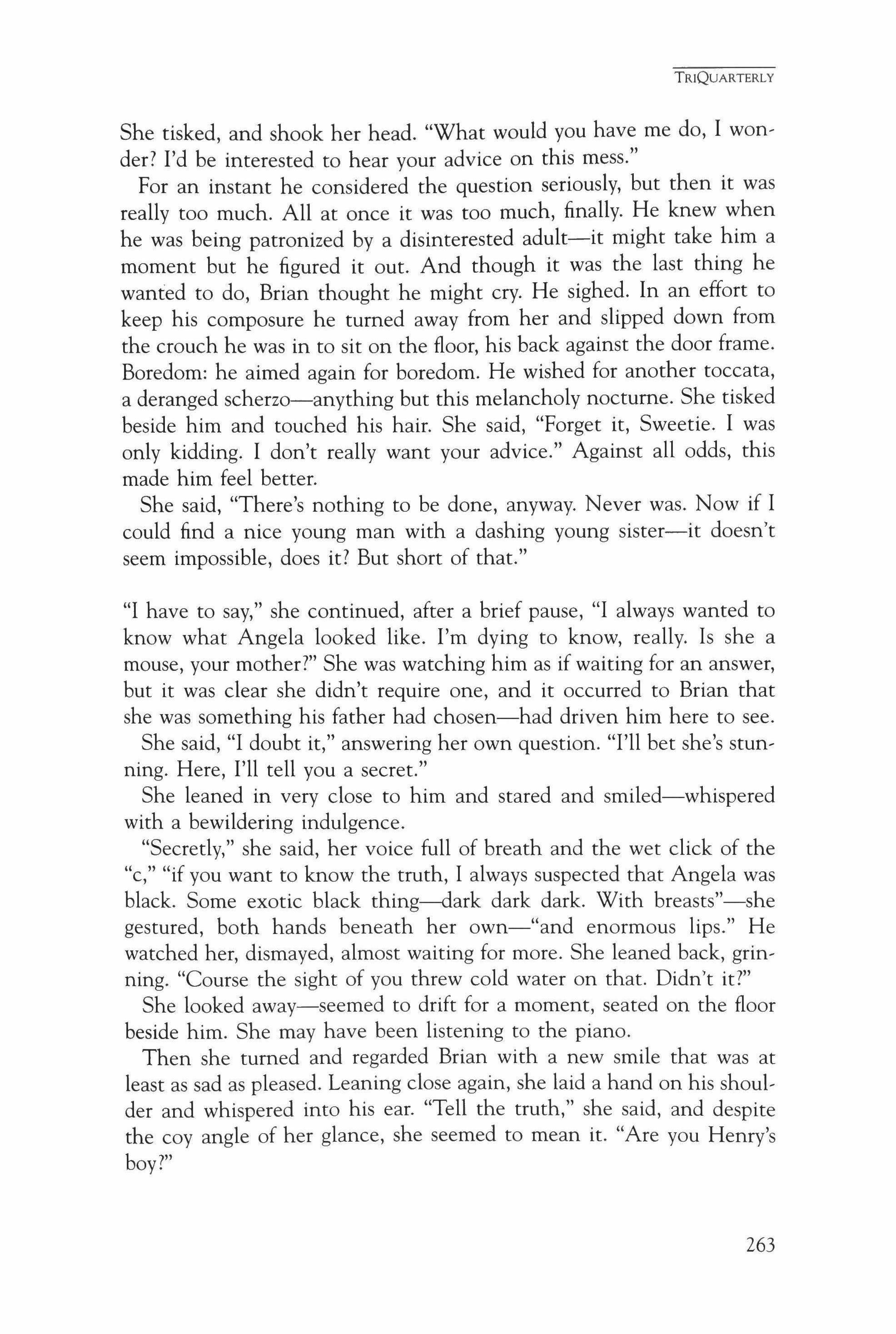
She tisked, and shook her head. "What would you have me do, I wonder? I'd be interested to hear your advice on this mess."
For an instant he considered the question seriously, but then it was really too much. All at once it was too much, finally. He knew when he was being patronized by a disinterested adult-it might take him a moment but he figured it out. And though it was the last thing he wanted to do, Brian thought he might cry. He sighed. In an effort to keep his composure he turned away from her and slipped down from the crouch he was in to sit on the floor, his back against the door frame. Boredom: he aimed again for boredom. He wished for another toccata, a deranged scherzo-anything but this melancholy nocturne. She tisked beside him and touched his hair. She said, "Forget it, Sweetie. I was only kidding. I don't really want your advice." Against all odds, this made him feel better.
She said, "There's nothing to be done, anyway. Never was. Now if I could find a nice young man with a dashing young sister-it doesn't seem impossible, does it? But short of that."
"I have to say," she continued, after a brief pause, "I always wanted to know what Angela looked like. I'm dying to know, really. Is she a mouse, your mother?" She was watching him as if waiting for an answer, but it was clear she didn't require one, and it occurred to Brian that she was something his father had chosen-had driven him here to see.
She said, "I doubt it," answering her own question. "I'll bet she's stunning. Here, I'll tell you a secret."
She leaned in very close to him and stared and smiled-whispered with a bewildering indulgence.
"Secretly," she said, her voice full of breath and the wet click of the "c," "if you want to know the truth, I always suspected that Angela was black. Some exotic black thing-dark dark dark. With breasts"-she gestured, both hands beneath her own-"and enormous lips." He watched her, dismayed, almost waiting for more. She leaned back, grinning. "Course the sight of you threw cold water on that. Didn't it?"
She looked away-seemed to drift for a moment, seated on the floor beside him. She may have been listening to the piano.
Then she turned and regarded Brian with a new smile that was at least as sad as pleased. Leaning close again, she laid a hand on his shoulder and whispered into his ear. "Tell the truth," she said, and despite the coy angle of her glance, she seemed to mean it. "Are you Henry's boy?"
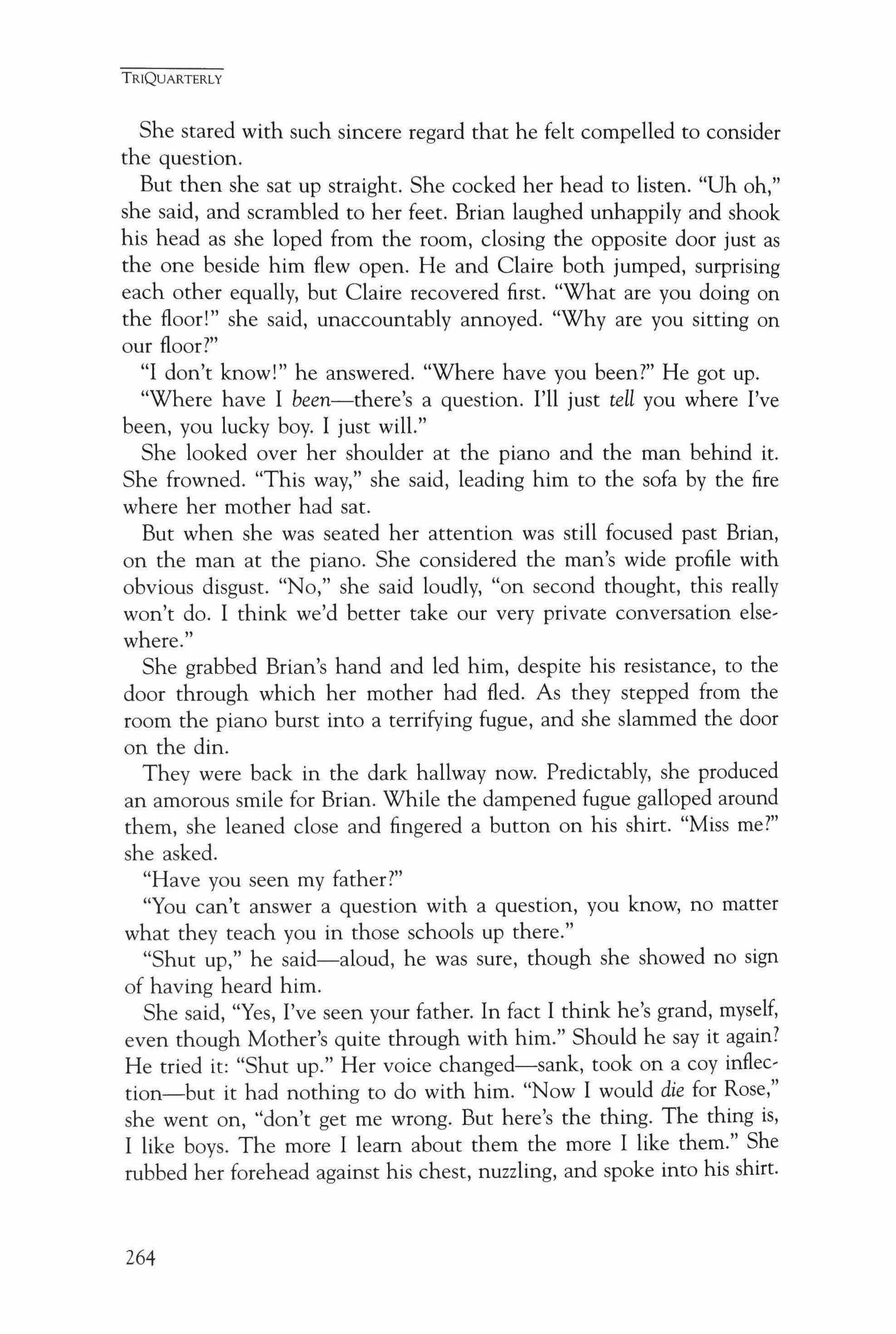
She stared with such sincere regard that he felt compelled to consider the question.
But then she sat up straight. She cocked her head to listen. "Uh oh," she said, and scrambled to her feet. Brian laughed unhappily and shook his head as she loped from the room, closing the opposite door just as the one beside him flew open. He and Claire both jumped, surprising each other equally, but Claire recovered first. "What are you doing on the floor!" she said, unaccountably annoyed. "Why are you sitting on our floor?"
"I don't know!" he answered. "Where have you been?" He got up.
"Where have I been-there's a question. I'll just tell you where I've been, you lucky boy. I just will."
She looked over her shoulder at the piano and the man behind it. She frowned. "This way," she said, leading him to the sofa by the fire where her mother had sat.
But when she was seated her attention was still focused past Brian, on the man at the piano. She considered the man's wide profile with obvious disgust. "No," she said loudly, "on second thought, this really won't do. I think we'd better take our very private conversation elsewhere."
She grabbed Brian's hand and led him, despite his resistance, to the door through which her mother had fled. As they stepped from the room the piano burst into a terrifying fugue, and she slammed the door on the din.
They were back in the dark hallway now. Predictably, she produced an amorous smile for Brian. While the dampened fugue galloped around them, she leaned close and fingered a button on his shirt. "Miss me?" she asked.
"Have you seen my father?"
"You can't answer a question with a question, you know, no matter what they teach you in those schools up there."
"Shut up," he said-aloud, he was sure, though she showed no sign of having heard him.
She said, "Yes, I've seen your father. In fact I think he's grand, myself, even though Mother's quite through with him." Should he say it again? He tried it: "Shut up." Her voice changed-sank, took on a coy inflection-but it had nothing to do with him. "Now I would die for Rose," she went on, "don't get me wrong. But here's the thing. The thing is, I like boys. The more I learn about them the more I like them." She rubbed her forehead against his chest, nuzzling, and spoke into his shirt.

"I can't imagine who wouldn't like boys, really. 1 can't see why boys waste time on girls, even. Would you like to explain that to me, Brianwhy it is that boys waste their time on girls? Would you explain it slowly, so that I'll understand?"
He was out of patience. He wanted to hit something, kick something, break something; he had been wanting to do a little damage for a while now, it seemed; his muscles ached for release. He wanted to shock. He took her chin into his palm and lifted her face and kissed it. He aimed for her lips but when he missed that seemed better. She made a funny sound at first-a kind of moan, a sound suggesting pain-but then she kissed him back, or missed, or connected glancingly on his nose and chin. And now that he had started, he didn't know where to go. His arms ached, so he wrapped them across her back and squeezed her-his muscles needed to be drained-then took her bottom into his hands and squeezed, his teeth clenched, kissing her, his teeth clicking against hers. He could crush her. He tried to-he wanted to hurt her, a little. But she was pushing away, her hands in his chest, and grunting. She was trying to speak. For how long had she been pushing away? He let go of her, he was out of breath, and already he was prepared to apologize.
She stepped back from him, appraising. But she grinned then, and giggled, nervously. She made up the step and took hold of his hand. "You sweet sweet boy," she said. "You devil. Not here, though."
So she was leading him again. She led him through the dark hallway, and the lit, empty rooms of the house, to the foyer by the garage and then outside into the cold. The night smells rose up, and the breeze blew around them. He felt so much better-in an instant. He felt he could breathe outside of the house. She shivered, leading him across the lawn toward a dark place by the tennis court. What a pleasure it was to see her shiver; what a pleasure the cold was-his own. There was the rowboat here: this was her destination. She crouched and reached up under the seat of the overturned boat. She felt around, blindly, until she found a beach towel and a thick wool blanket. She unfolded these and spread them on the grass under the boat. It was tight work-not a lot of clearance. Brian scanned the lit windows of the house and it seemed that every one of them accommodated some agitation-shadows moving against the curtains. It gave the impression of a party or a heated argument raging from room to room. Voices could be heard indistinctly. The sky began to spit rain.
"You first, Romeo," said Claire beside him. She held the rowboat so

that it tipped away and gestured for him to climb underneath it. Which he did.
She slipped in with him and they lay together close. The seat of the boat, tight against his hip, made it hard to turn over or move, but there was space up here beneath the bow. There was a fat candle tucked behind the seat where the blanket had been and she lit this. Rain tapped intermittently on their aluminum roof. Claire was busy and impatient, but Brian was gaining his bearings still. His frustration-the ache-had been drained by the night air. But Claire adjusted the blanket, pulled the ends of it over them haphazardly, then undressed, shimmying her skirt down, flopping like a fish close against him, her shoulder catching his nose.
"Sorry," she whispered, distracted.
When she had her skirt and underwear down at her ankles she covered her crotch with her hands. His view was shaded by the partial cover of the blanket and the seat of the boat close above her. The candlelight was yellow and brittle, reflected against the belly of the boat. She bit her lip and turned her eyes to him. She lay on her back and he on his side, facing her. The rain picked up, and the wind blew against his back, but in front he was warmed by the heat of her agitation and the rub of her skin against him. She looked sad and intent, chewing her lip. He felt he had missed a cue, and worried he had misrepresented himself in the dark hallway. He heard the wooden clack of the goose's wings in the midst of the metal tap of the rain. "Well?" she said, whispered. She took his hand, put it into the mix with her own: soft and bony, alternating. "Your hand is cold," she said quietly, holding it close. She watched him. She pushed his hand in time with her own, then closed her eyes, let go of his hand, made a small sound something like a sigh and began to breathe. He left his hand there, feeling the motion of her own hands beneath his and the stranger forms beneath that. She pushed, and the back of his hand pressed against the cold of the rowboat seat. The candle tipped precariously. Their shadows lurched. He wasn't sure if he was neglecting an opportunity or being excluded from it, and some part of him was certain that this wasn't the full extent of his anticipated involvement. The sounds she made became urgent and muffled at once, and the rain fell harder, briefly, in a tin patter on the boat. Her breathing shortened until it stopped, and she was taut, her chin tipped, her neck fully exposed-in that moment she seemed a thing apart, more than he had ever guessed at. His own breath caughthere I am. She held it.
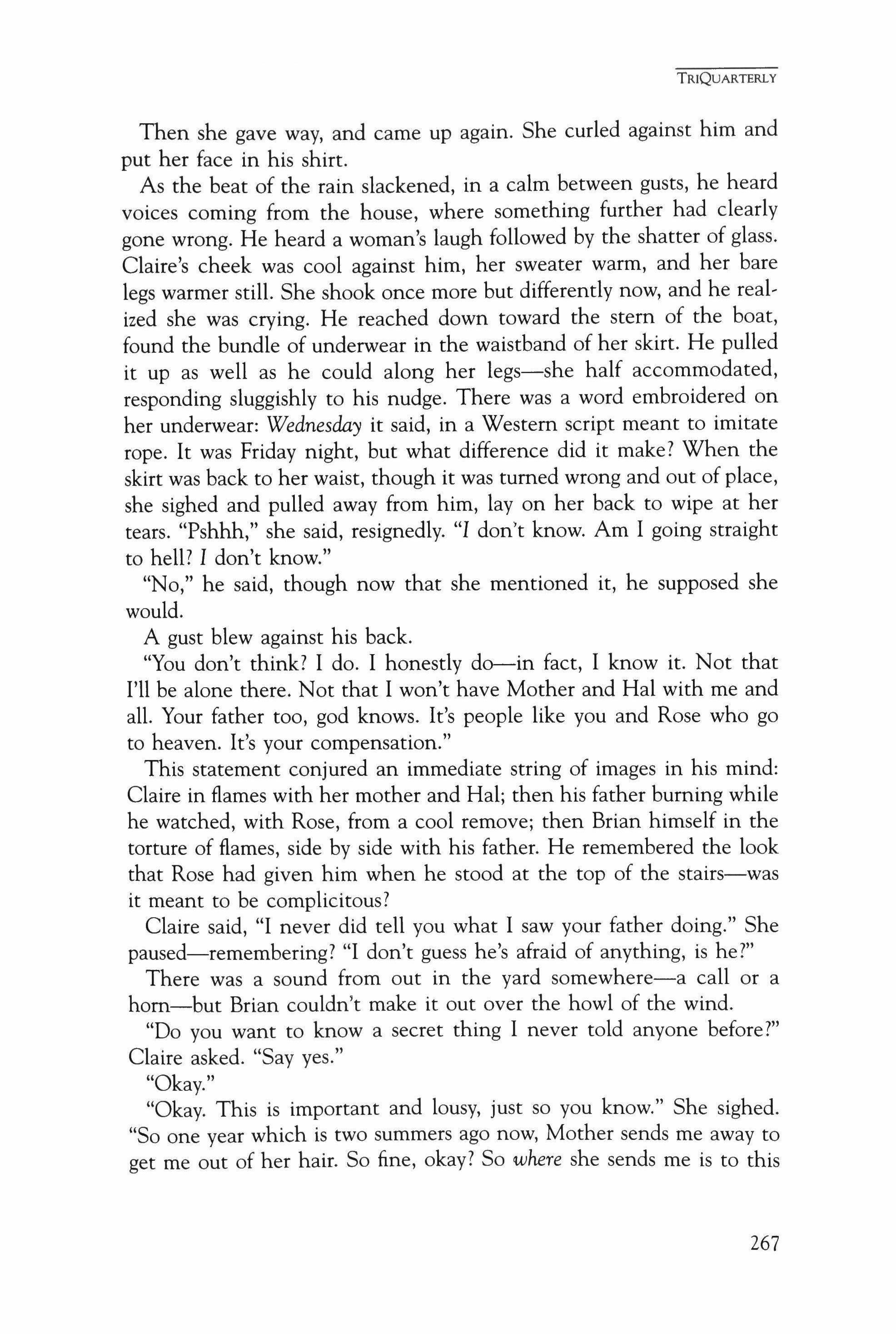
Then she gave way, and came up again. She curled against him and put her face in his shirt.
As the beat of the rain slackened, in a calm between gusts, he heard voices coming from the house, where something further had clearly gone wrong. He heard a woman's laugh followed by the shatter of glass. Claire's cheek was cool against him, her sweater warm, and her bare legs warmer stilL She shook once more but differently now, and he realized she was crying. He reached down toward the stern of the boat, found the bundle of underwear in the waistband of her skirt. He pulled it up as well as he could along her legs-she half accommodated, responding sluggishly to his nudge. There was a word embroidered on her underwear: Wednesday it said, in a Western script meant to imitate rope. It was Friday night, but what difference did it make? When the skirt was back to her waist, though it was turned wrong and out of place, she sighed and pulled away from him, lay on her back to wipe at her tears. "Pshhh," she said, resignedly. "1 don't know. Am I going straight to hell? I don't know."
"No," he said, though now that she mentioned it, he supposed she would.
A gust blew against his back.
"You don't think? I do. I honestly do-in fact, I know it. Not that I'll be alone there. Not that I won't have Mother and Hal with me and all. Your father too, god knows. It's people like you and Rose who go to heaven. It's your compensation."
This statement conjured an immediate string of images in his mind: Claire in flames with her mother and Hal; then his father burning while he watched, with Rose, from a cool remove; then Brian himself in the torture of flames, side by side with his father. He remembered the look that Rose had given him when he stood at the top of the stairs-was it meant to be complicitous?
Claire said, "I never did tell you what I saw your father doing." She paused-remembering? "I don't guess he's afraid of anything, is he?"
There was a sound from out in the yard somewhere-a call or a horn-but Brian couldn't make it out over the howl of the wind.
"Do you want to know a secret thing I never told anyone before?" Claire asked. "Say yes."
"Okay."
"Okay. This is important and lousy, just so you know." She sighed. "So one year which is two summers ago now, Mother sends me away to get me out of her hair. So fine, okay? So where she sends me is to this
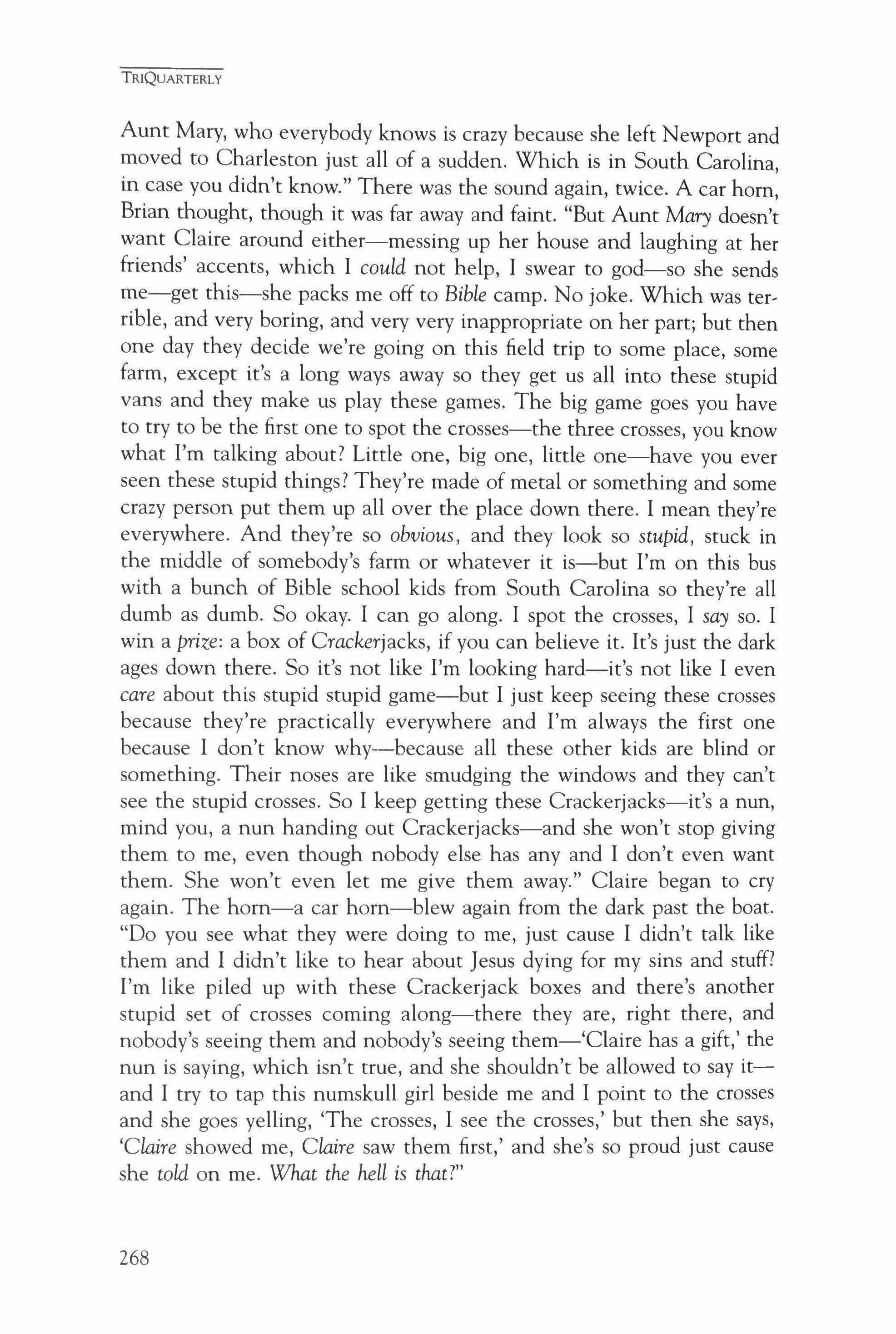
Aunt Mary, who everybody knows is crazy because she left Newport and moved to Charleston just all of a sudden. Which is in South Carolina, in case you didn't know." There was the sound again, twice. A car hom, Brian thought, though it was far away and faint. "But Aunt Mary doesn't want Claire around either-messing up her house and laughing at her friends' accents, which I could not help, I swear to god-so she sends me-get this-she packs me off to Bible camp. No joke. Which was terrible, and very boring, and very very inappropriate on her part; but then one day they decide we're going on this field trip to some place, some farm, except it's a long ways away so they get us all into these stupid vans and they make us play these games. The big game goes you have to try to be the first one to spot the crosses-the three crosses, you know what I'm talking about? Little one, big one, little one-have you ever seen these stupid things? They're made of metal or something and some crazy person put them up all over the place down there. I mean they're everywhere. And they're so obvious, and they look so stupid, stuck in the middle of somebody's farm or whatever it is-but I'm on this bus with a bunch of Bible school kids from South Carolina so they're all dumb as dumb. So okay. I can go along. I spot the crosses, I say so. I win a prize: a box of Crackerjacks, if you can believe it. It's just the dark ages down there. So it's not like I'm looking hard-it's not like I even care about this stupid stupid game-but I just keep seeing these crosses because they're practically everywhere and I'm always the first one because I don't know why-because all these other kids are blind or something. Their noses are like smudging the windows and they can't see the stupid crosses. So I keep getting these Crackerjacks-it's a nun, mind you, a nun handing out Crackerjacks-and she won't stop giving them to me, even though nobody else has any and I don't even want them. She won't even let me give them away." Claire began to cry again. The hom-a car hom-blew again from the dark past the boat. "Do you see what they were doing to me, just cause I didn't talk like them and I didn't like to hear about Jesus dying for my sins and stuff? I'm like piled up with these Crackerjack boxes and there's another stupid set of crosses coming along-there they are, right there, and nobody's seeing them and nobodv's seeing them-'Claire has a gift,' the nun is saying, which isn't true, and she shouldn't be allowed to say itand I try to tap this numskull girl beside me and I point to the crosses and she goes yelling, 'The crosses, I see the crosses,' but then she says, 'Claire showed me, Claire saw them first,' and she's so proud just cause she told on me. What the hell is that?"
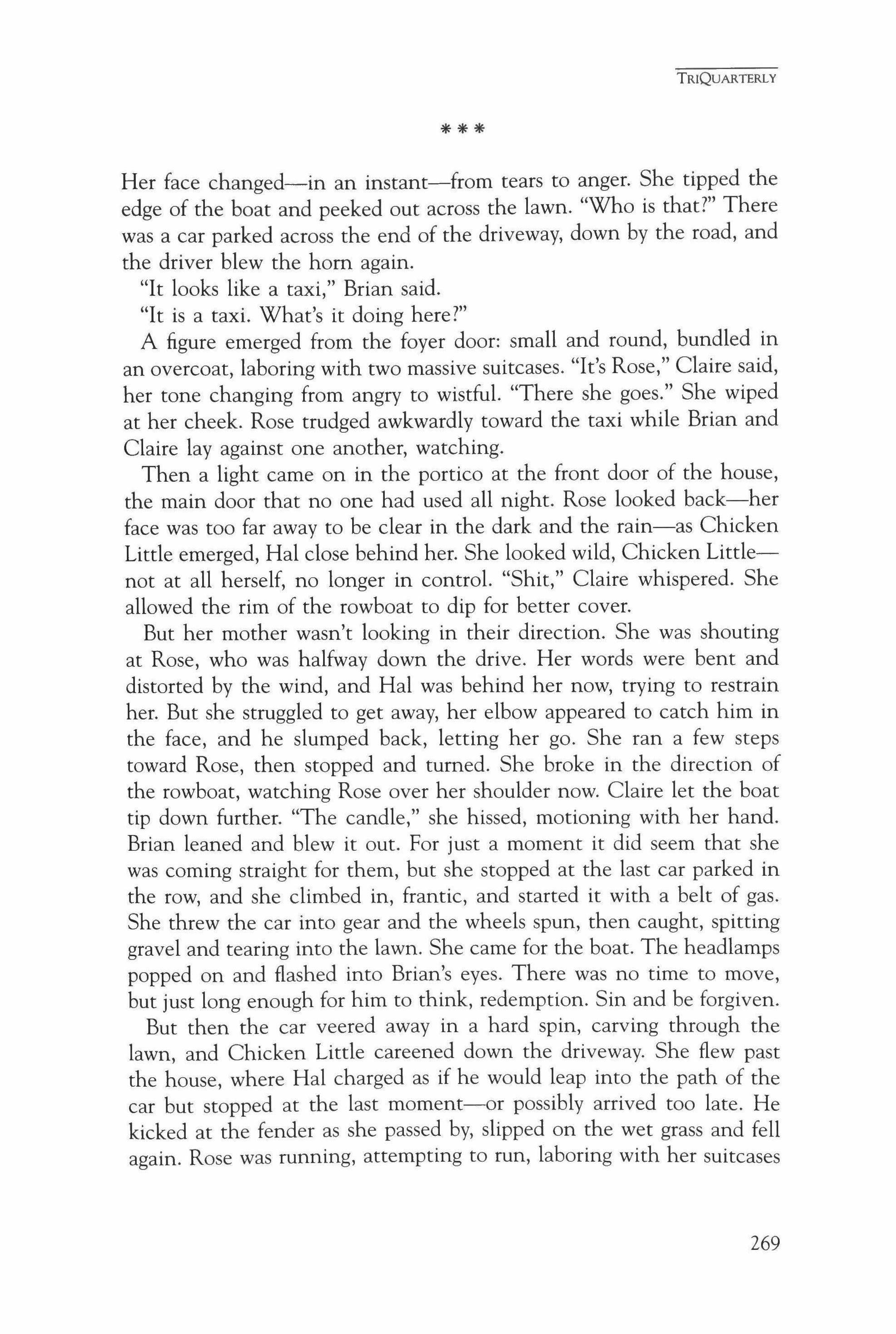
Her face changed-in an instant-from tears to anger. She tipped the edge of the boat and peeked out across the lawn. "Who is that?" There was a car parked across the end of the driveway, down by the road, and the driver blew the hom again.
"It looks like a taxi," Brian said.
"It is a taxi. What's it doing here?"
A figure emerged from the foyer door: small and round, bundled in an overcoat, laboring with two massive suitcases. "It's Rose," Claire said, her tone changing from angry to wistful. "There she goes." She wiped at her cheek. Rose trudged awkwardly toward the taxi while Brian and Claire lay against one another, watching.
Then a light came on in the portico at the front door of the house, the main door that no one had used all night. Rose looked back-her face was too far away to be clear in the dark and the rain-as Chicken Little emerged, Hal close behind her. She looked wild, Chicken Littlenot at all herself, no longer in control. "Shit," Claire whispered. She allowed the rim of the rowboat to dip for better cover.
But her mother wasn't looking in their direction. She was shouting at Rose, who was halfway down the drive. Her words were bent and distorted by the wind, and Hal was behind her now, trying to restrain her. But she struggled to get away, her elbow appeared to catch him in the face, and he slumped back, letting her go. She ran a few steps toward Rose, then stopped and turned. She broke in the direction of the rowboat, watching Rose over her shoulder now. Claire let the boat tip down further. "The candle," she hissed, motioning with her hand. Brian leaned and blew it out. For just a moment it did seem that she was coming straight for them, but she stopped at the last car parked in the row, and she climbed in, frantic, and started it with a belt of gas. She threw the car into gear and the wheels spun, then caught, spitting gravel and tearing into the lawn. She came for the boat. The headlamps popped on and flashed into Brian's eyes. There was no time to move, but just long enough for him to think, redemption. Sin and be forgiven.
But then the car veered away in a hard spin, carving through the lawn, and Chicken Little careened down the driveway. She flew past the house, where Hal charged as if he would leap into the path of the car but stopped at the last moment-or possibly arrived too late. He kicked at the fender as she passed by, slipped on the wet grass and fell again. Rose was running, attempting to run, laboring with her suitcases
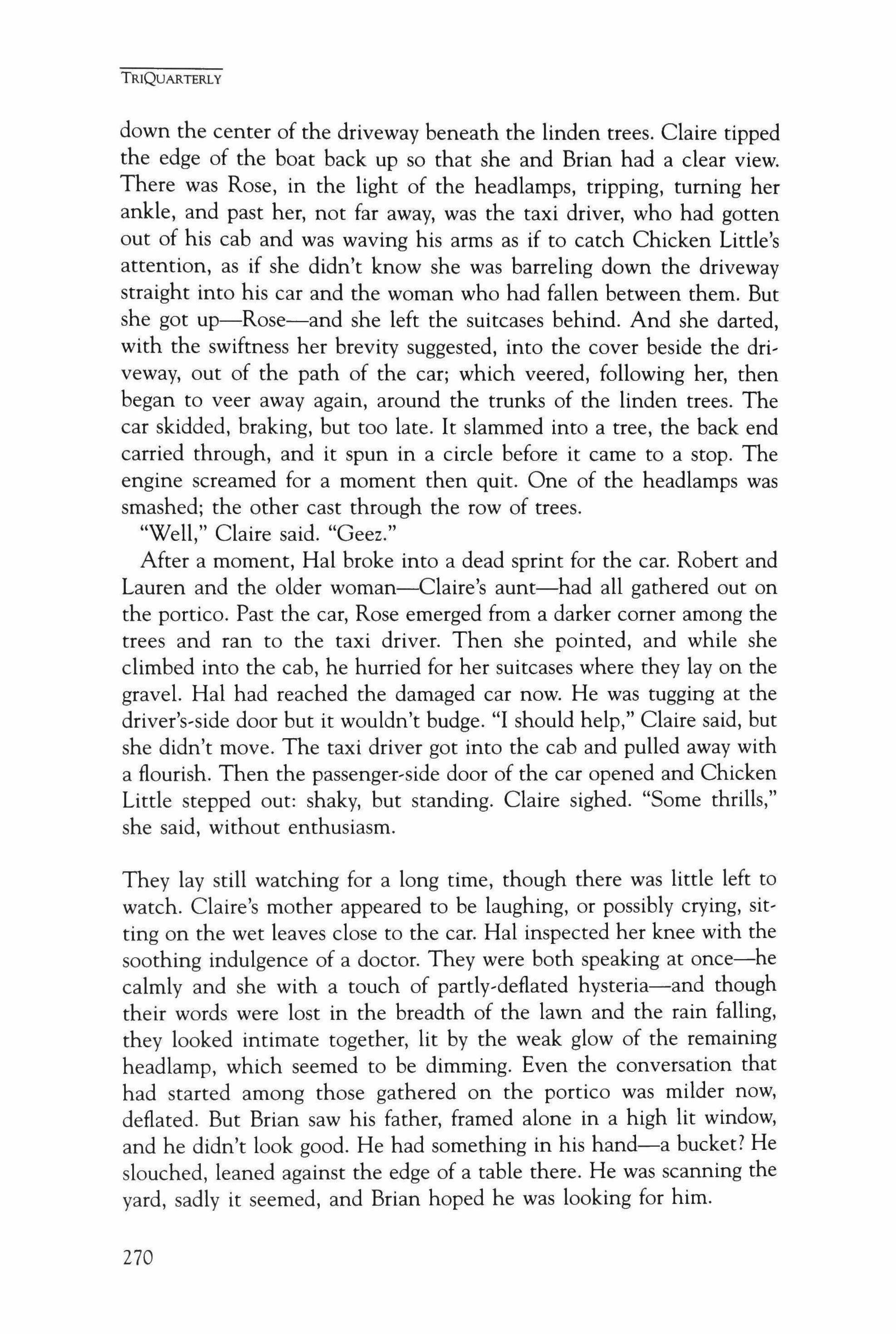
down the center of the driveway beneath the linden trees. Claire tipped the edge of the boat back up so that she and Brian had a clear view. There was Rose, in the light of the headlamps, tripping, turning her ankle, and past her, not far away, was the taxi driver, who had gotten out of his cab and was waving his arms as if to catch Chicken Little's attention, as if she didn't know she was barreling down the driveway straight into his car and the woman who had fallen between them. But she got up-Rose-and she left the suitcases behind. And she darted, with the swiftness her brevity suggested, into the cover beside the driveway, out of the path of the car; which veered, following her, then began to veer away again, around the trunks of the linden trees. The car skidded, braking, but too late. It slammed into a tree, the back end carried through, and it spun in a circle before it came to a stop. The engine screamed for a moment then quit. One of the headlamps was smashed; the other cast through the row of trees.
"Well," Claire said. "Geez."
After a moment, Hal broke into a dead sprint for the car. Robert and Lauren and the older woman-Claire's aunt-had all gathered out on the portico. Past the car, Rose emerged from a darker comer among the trees and ran to the taxi driver. Then she pointed, and while she climbed into the cab, he hurried for her suitcases where they lay on the gravel. Hal had reached the damaged car now. He was tugging at the driver's-side door but it wouldn't budge. "I should help," Claire said, but she didn't move. The taxi driver got into the cab and pulled away with a flourish. Then the passenger-side door of the car opened and Chicken Little stepped out: shaky, but standing. Claire sighed. "Some thrills," she said, without enthusiasm.
They lay still watching for a long time, though there was little left to watch. Claire's mother appeared to be laughing, or possibly crying, sitting on the wet leaves close to the car. Hal inspected her knee with the soothing indulgence of a doctor. They were both speaking at once-he calmly and she with a touch of partly-deflated hysteria-and though their words were lost in the breadth of the lawn and the rain falling, they looked intimate together, lit by the weak glow of the remaining headlamp, which seemed to be dimming. Even the conversation that had started among those gathered on the portico was milder now, deflated. But Brian saw his father, framed alone in a high lit window, and he didn't look good. He had something in his hand-a bucket? He slouched, leaned against the edge of a table there. He was scanning the yard, sadly it seemed, and Brian hoped he was looking for him.
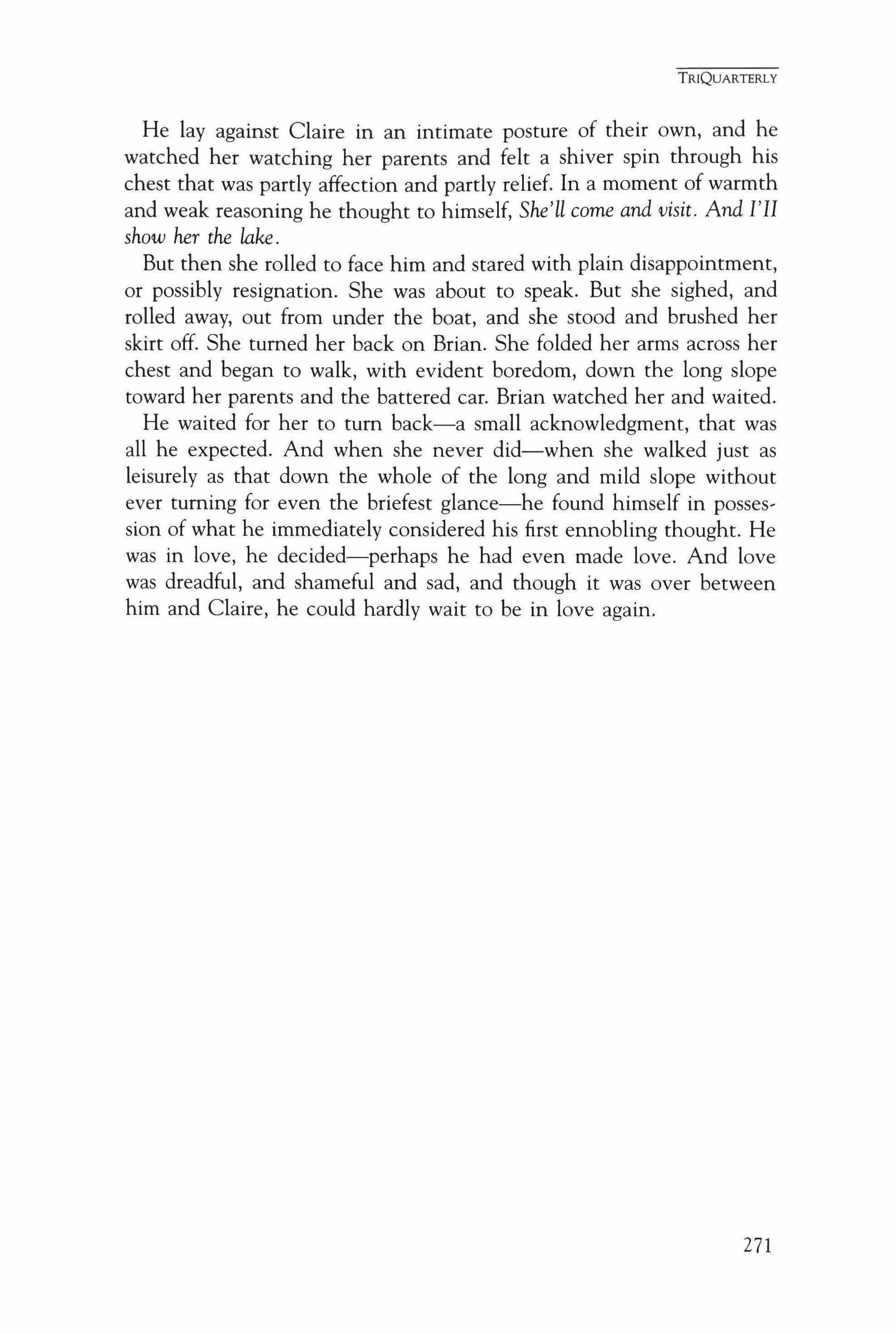
He lay against Claire in an intimate posture of their own, and he watched her watching her parents and felt a shiver spin through his chest that was partly affection and partly relief. In a moment of warmth and weak reasoning he thought to himself, She'll come and visit. And I'll show her the lake.
But then she rolled to face him and stared with plain disappointment, or possibly resignation. She was about to speak. But she sighed, and rolled away, out from under the boat, and she stood and brushed her skirt off. She turned her back on Brian. She folded her arms across her chest and began to walk, with evident boredom, down the long slope toward her parents and the battered car. Brian watched her and waited.
He waited for her to tum back-a small acknowledgment, that was all he expected. And when she never did-when she walked just as leisurely as that down the whole of the long and mild slope without ever turning for even the briefest glance-he found himself in possession of what he immediately considered his first ennobling thought. He was in love, he decided-perhaps he had even made love. And love was dreadful, and shameful and sad, and though it was over between him and Claire, he could hardly wait to be in love again.
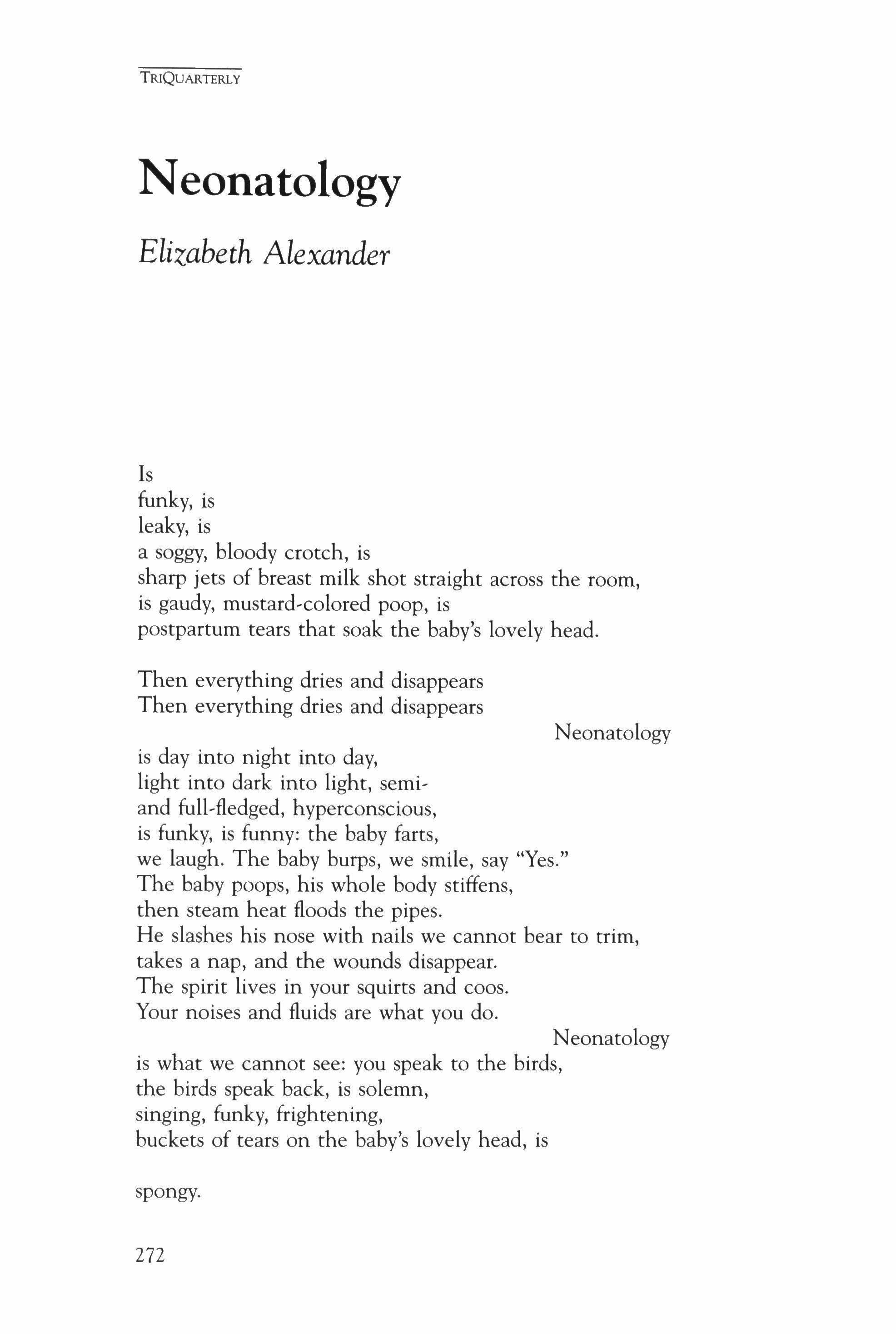
Is funky, is leaky, is a soggy, bloody crotch, is sharp jets of breast milk shot straight across the room, is gaudy, mustard-colored poop, is postpartum tears that soak the baby's lovely head.
Then everything dries and disappears Then everything dries and disappears
Neonatology
is day into night into day, light into dark into light, semiand full-fledged, hyperconscious, is funky, is funny: the baby farts, we laugh. The baby burps, we smile, say "Yes." The baby poops, his whole body stiffens, then steam heat floods the pipes. He slashes his nose with nails we cannot bear to trim, takes a nap, and the wounds disappear. The spirit lives in your squirts and coos. Your noises and fluids are what you do.
Neonatology is what we cannot see: you speak to the birds, the birds speak back, is solemn, singing, funky, frightening, buckets of tears on the baby's lovely head, is spongy.
*
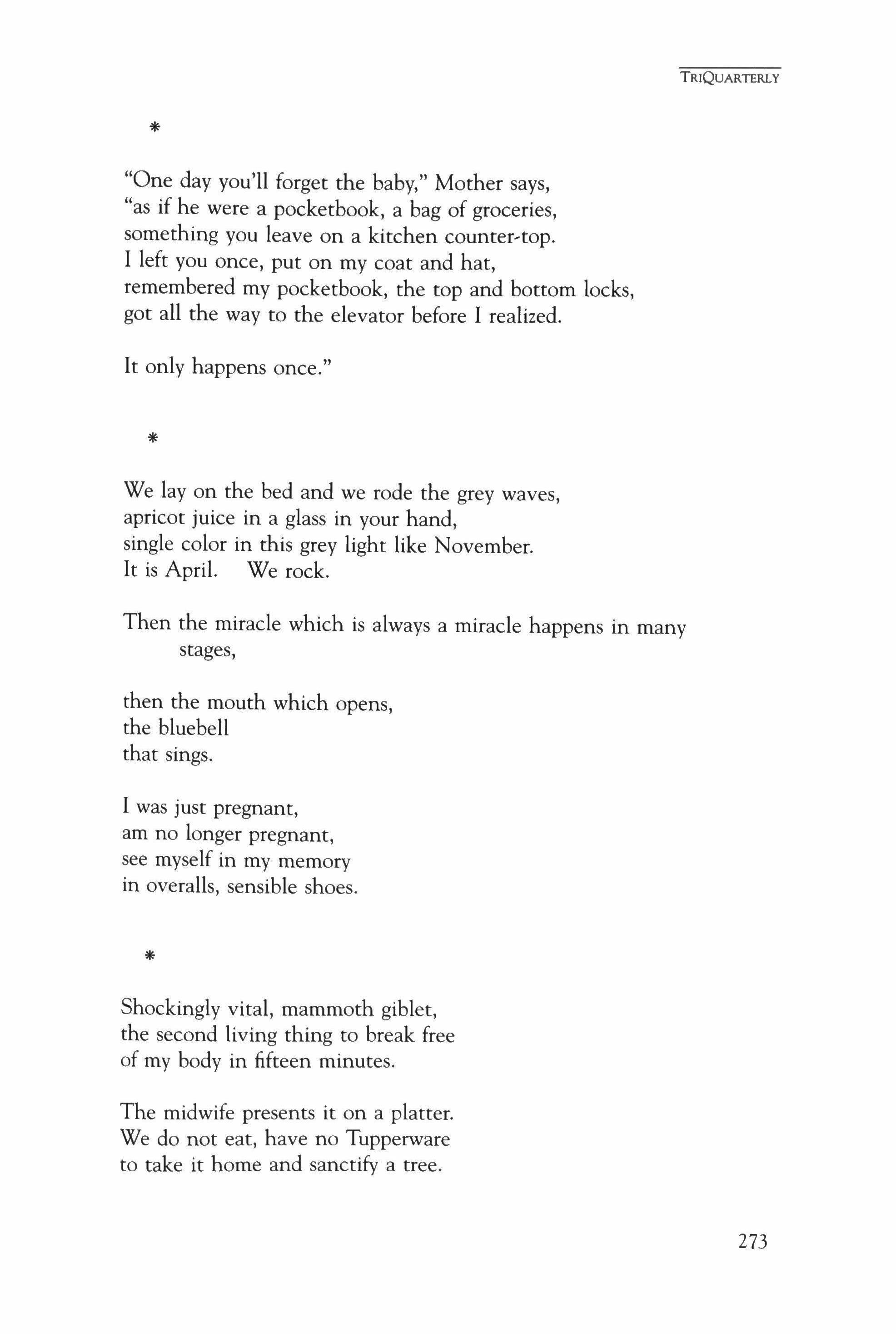
"One day you'll forget the baby," Mother says, "as if he were a pocketbook, a bag of groceries, something you leave on a kitchen counter-top. I left you once, put on my coat and hat, remembered my pocketbook, the top and bottom locks, got all the way to the elevator before I realized.
It only happens once."
*
We lay on the bed and we rode the grey waves, apricot juice in a glass in your hand, single color in this grey light like November. It is April. We rock.
Then the miracle which is always a miracle happens in many stages,
then the mouth which opens, the bluebell that sings.
I was just pregnant, am no longer pregnant, see myself in my memory in overalls, sensible shoes.
*
Shockingly vital, mammoth giblet, the second living thing to break free of my body in fifteen minutes.
The midwife presents it on a platter. We do not eat, have no Tupperware to take it home and sanctify a tree.
TRIQUARTERLY
Instead, we marvel at my cast-off meat, the almost-pulsing slab, bloody mesa, what lived moments ago and now has died.
Now I must take the baby to my breast. There is no mother here but me. The midwife discards the placenta.
*
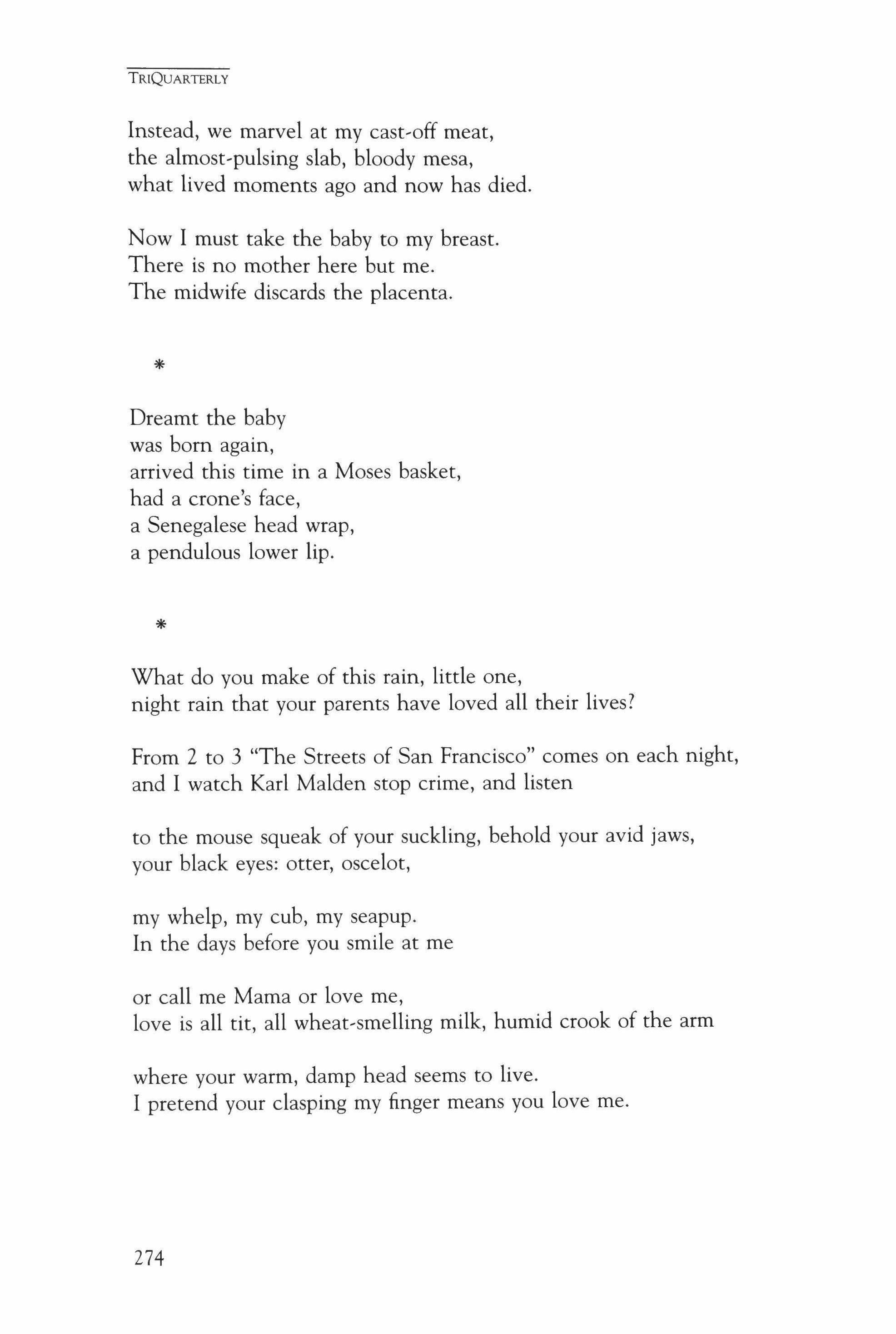
Dreamt the baby was born again, arrived this time in a Moses basket, had a crone's face, a Senegalese head wrap, a pendulous lower lip.
*
What do you make of this rain, little one, night rain that your parents have loved all their lives?
From 2 to 3 "The Streets of San Francisco" comes on each night, and I watch Karl Malden stop crime, and listen
to the mouse squeak of your suckling, behold your avid jaws, your black eyes: otter, oscelot, my whelp, my cub, my seapup. In the days before you smile at me or call me Mama or love me, love is all tit, all wheat-smelling milk, humid crook of the arm
where your warm, damp head seems to live. I pretend your clasping my finger means you love me.
*
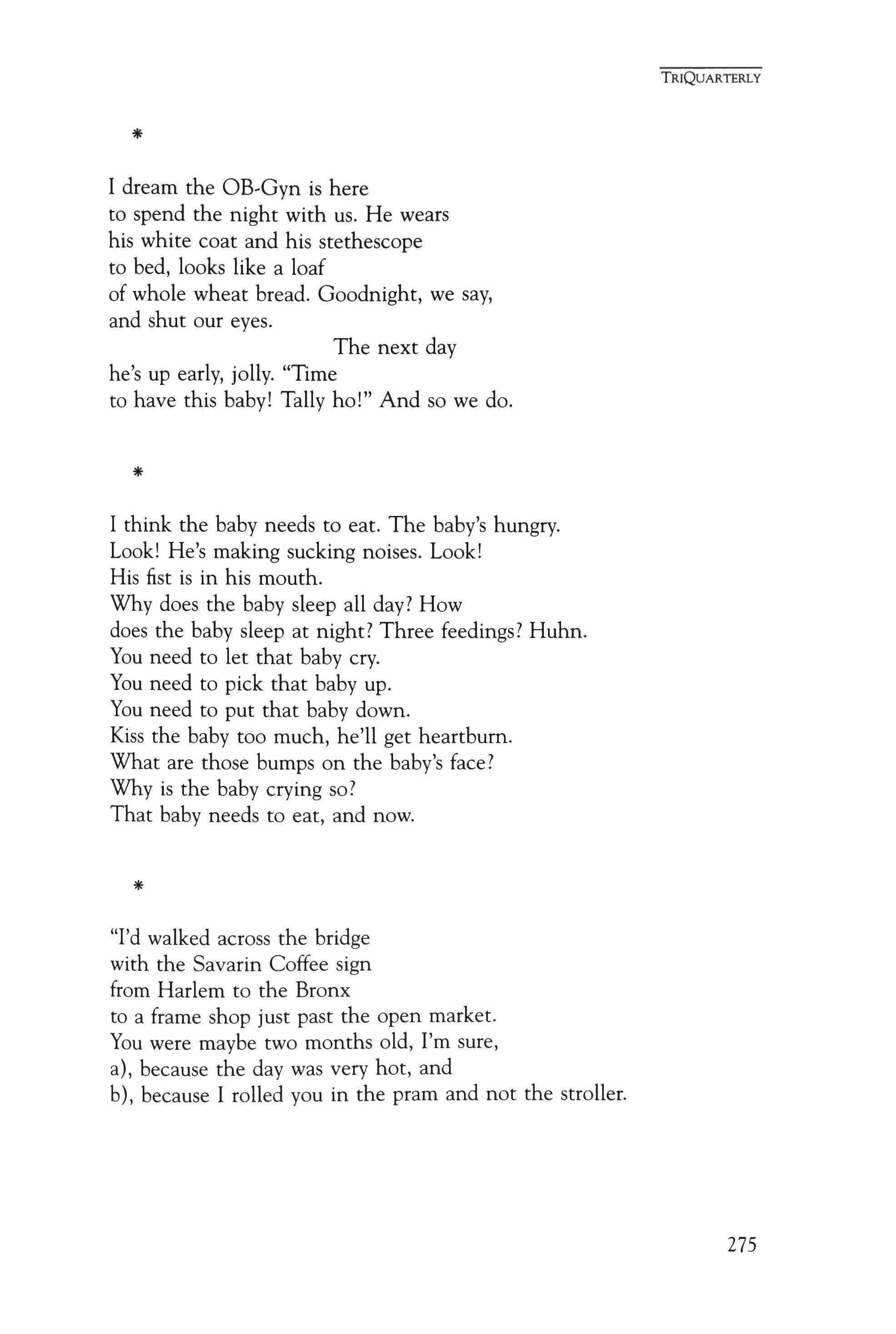
I dream the OB�Gyn is here to spend the night with us. He wears his white coat and his stethescope to bed, looks like a loaf of whole wheat bread. Goodnight, we say, and shut our eyes.
The next day he's up early, jolly. "Time to have this baby! Tally ho!" And so we do.
*
I think the baby needs to eat. The baby's hungry. Look! He's making sucking noises. Look! His fist is in his mouth. Why does the baby sleep all day? How does the baby sleep at night? Three feedings? Huhn. You need to let that baby cry. You need to pick that baby up. You need to put that baby down. Kiss the baby too much, he'll get heartburn. What are those bumps on the baby's face? Why is the baby crying so? That baby needs to eat, and now.
*
"I'd walked across the bridge with the Savarin Coffee sign from Harlem to the Bronx to a frame shop just past the open market. You were maybe two months old, I'm sure, a), because the day was very hot, and b), because I rolled you in the pram and not the stroller.
I was having the Japanese woodcuts framed, the ones by Daddy's dresser. Something must have struck you funny, and right in the middle of the shop you laughed, loudly, a real laugh. I never told you? I must have told you. That was the first time I heard you laugh."
*
All of my aunties chatting like crows on a line, all of my aunties on electric breast pumps, the double kind, one for each exhausted tit.
Mommy, the baby's head popped off! A tiny head, white, wet, bloodless, heartbeat still on the soft spot. She tells me, Stick it back on, Girl. Don't be afraid.
You can't show your children you're afraid.
A paraffin seam bubbles on his scalp. A pink cicatrix lines his lovely neck.
* Mamma Zememesh, I dreamt your sister's names. They floated around me as objects, satellites: Zayd Ntutu
Yeshareg Asefash
a spinning, turning, turning, spin.
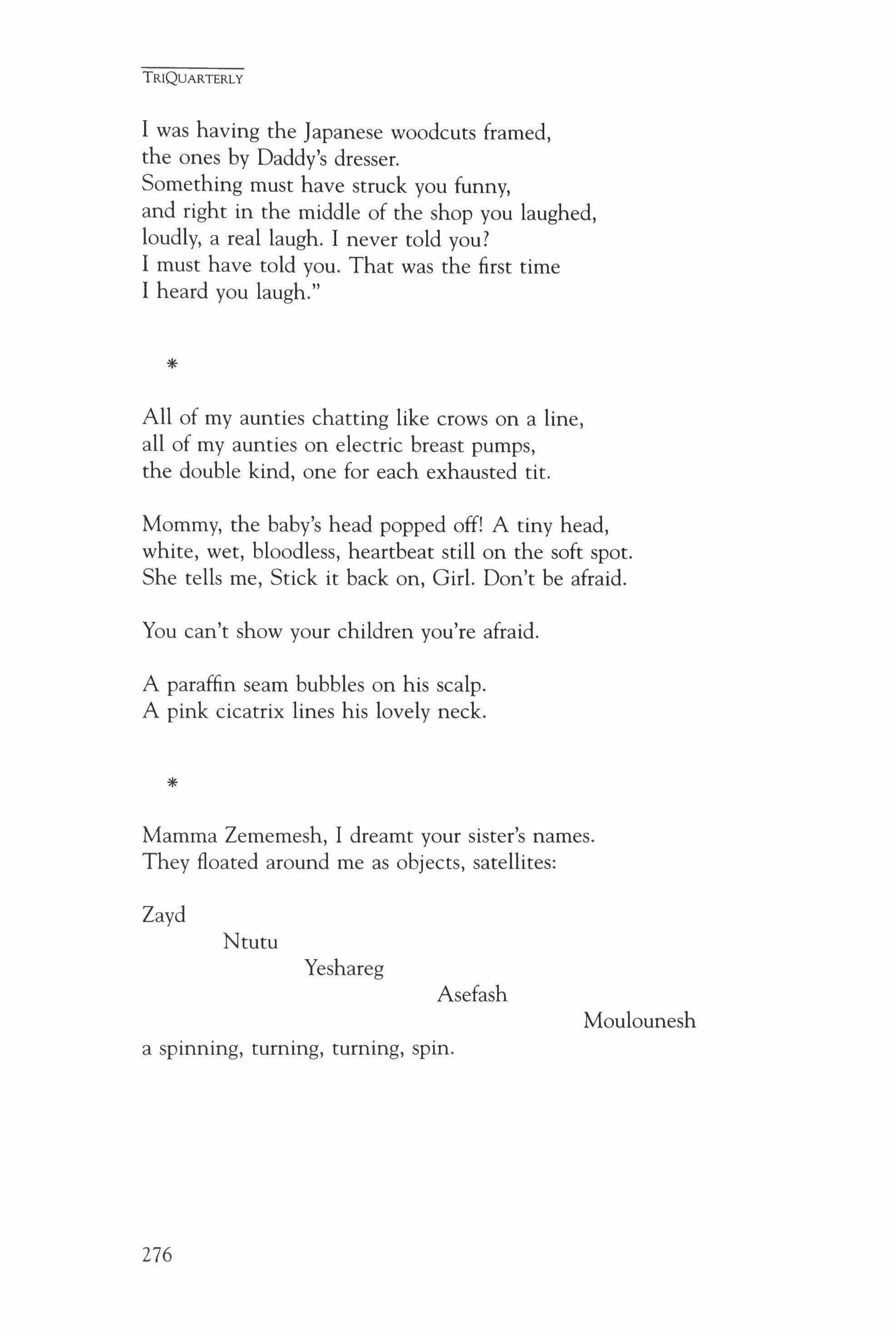
Moulounesh
*

Giving birth is like jazz, something from silence, then all of it. Long, elegant boats, blood-boiling sunshine, human cargo, a hand-made kite-
Post-partum.
No longer a celebrity, pregnant lady, expectant. It has happened; you are here, each dram you drain a step away from flushed and floating, lush and curled. Now you are the pink one, the movie star. It has happened. You are here, and you sing, mewl, holler, peep, swallow the light and bubble it back, shine, contain multitudes, gleam. You are the new one, the movie star, and birth is like jazz, from silence and blood, silence then everything, jazz.
First will come the winter called Fimbulvetr. Snow will drive from all quarters, there will be hard frosts and biting winds, the sun will be no use. There will be three such winters with no summer between. -from The Prose Edda of Snorri Sturluson
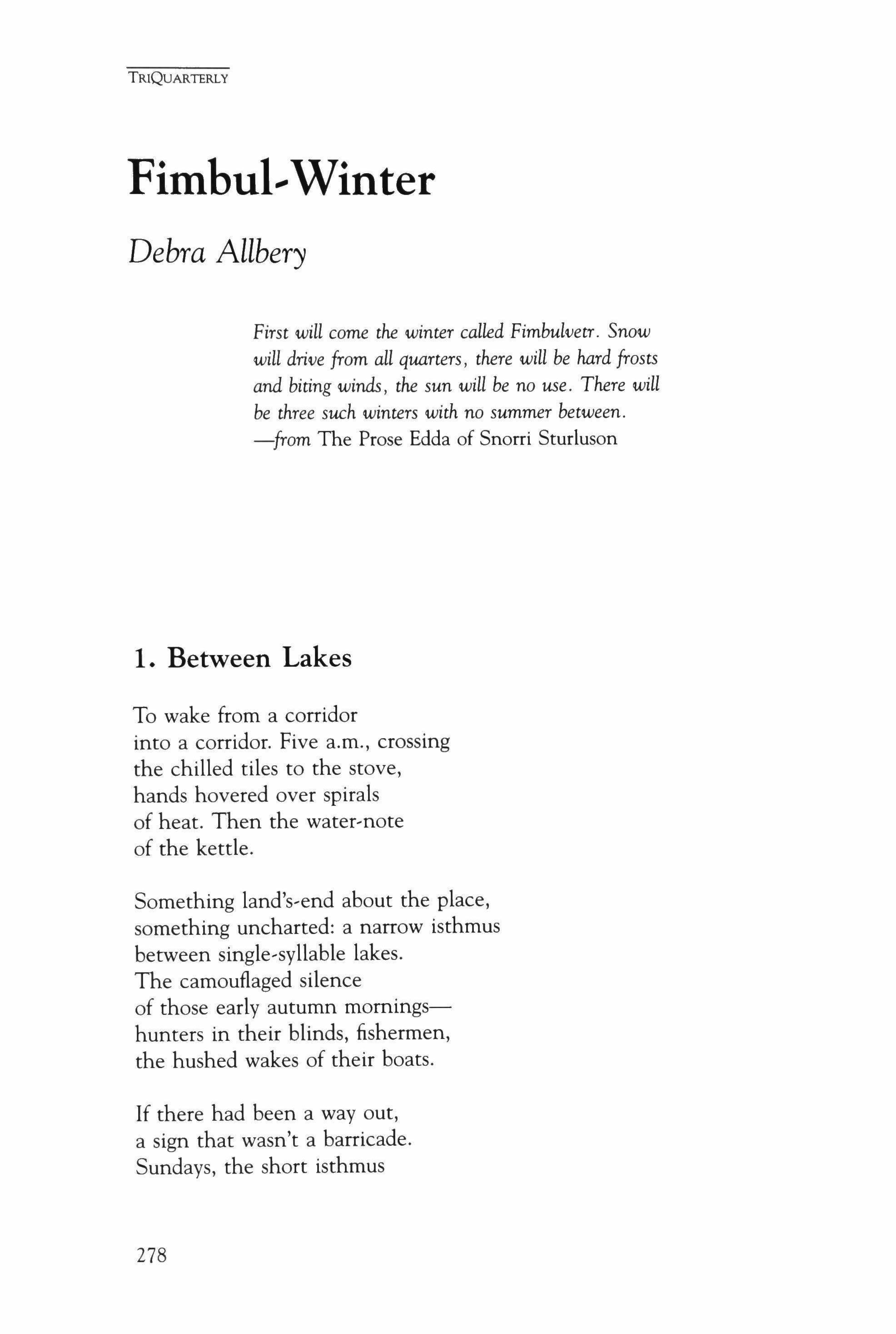
To wake from a corridor into a corridor. Five a.m., crossing the chilled tiles to the stove, hands hovered over spirals of heat. Then the water-note of the kettle.
Something land's-end about the place, something uncharted: a narrow isthmus between single-syllable lakes. The camouflaged silence of those early autumn momingshunters in their blinds, fishermen, the hushed wakes of their boats.
If there had been a way out, a sign that wasn't a barricade. Sundays, the short isthmus
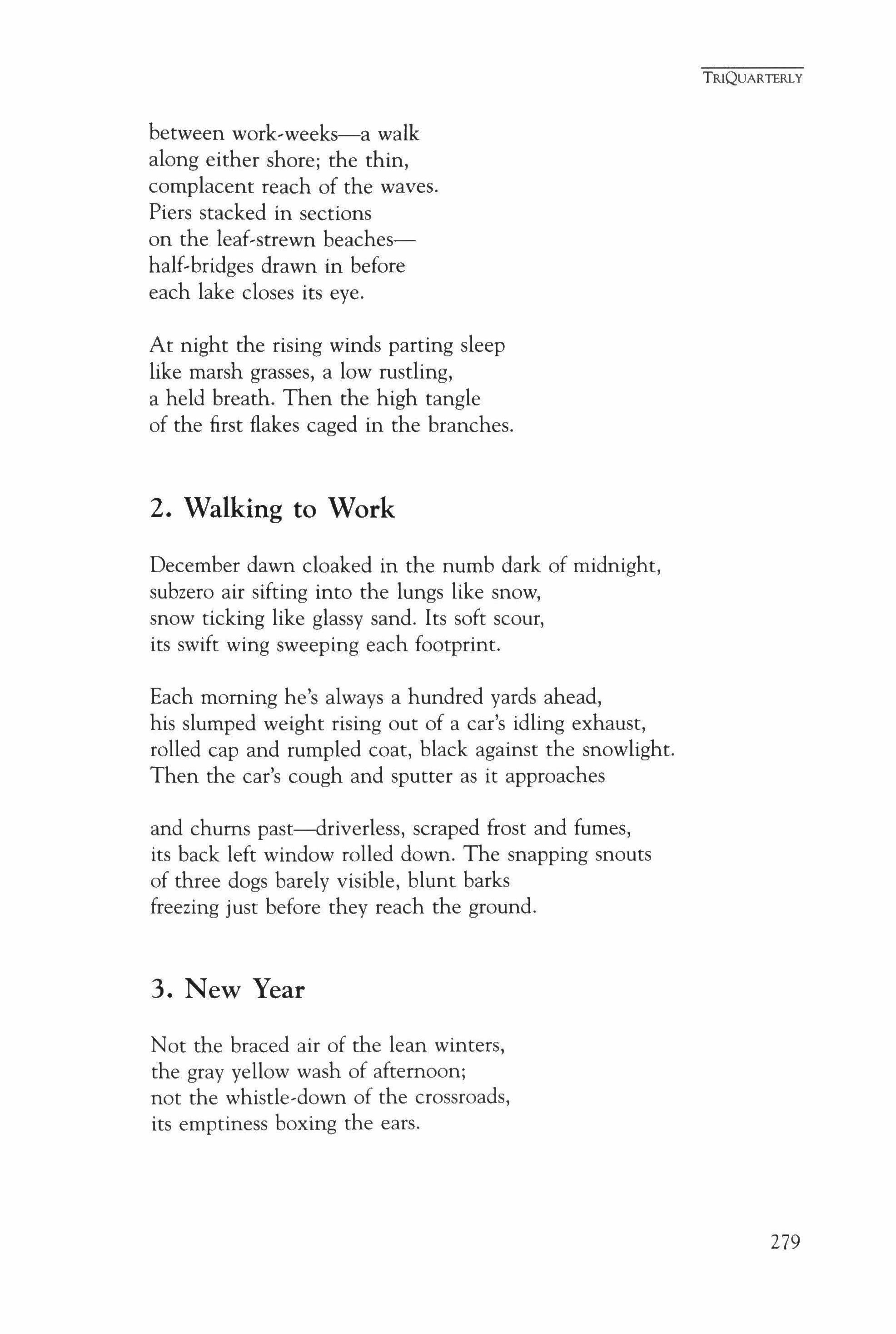
between work-weeks-s-a walk along either shore; the thin, complacent reach of the waves. Piers stacked in sections on the leaf-strewn beacheshalf-bridges drawn in before each lake closes its eye.
At night the rising winds parting sleep like marsh grasses, a low rustling, a held breath. Then the high tangle of the first flakes caged in the branches.
December dawn cloaked in the numb dark of midnight, subzero air sifting into the lungs like snow, snow ticking like glassy sand. Its soft scour, its swift wing sweeping each footprint.
Each morning he's always a hundred yards ahead, his slumped weight rising out of a car's idling exhaust, rolled cap and rumpled coat, black against the snowlight. Then the car's cough and sputter as it approaches and chums past-driverless, scraped frost and fumes, its back left window rolled down. The snapping snouts of three dogs barely visible, blunt barks freezing just before they reach the ground.
Not the braced air of the lean winters, the gray yellow wash of afternoon; not the whistle-down of the crossroads, its emptiness boxing the ears.
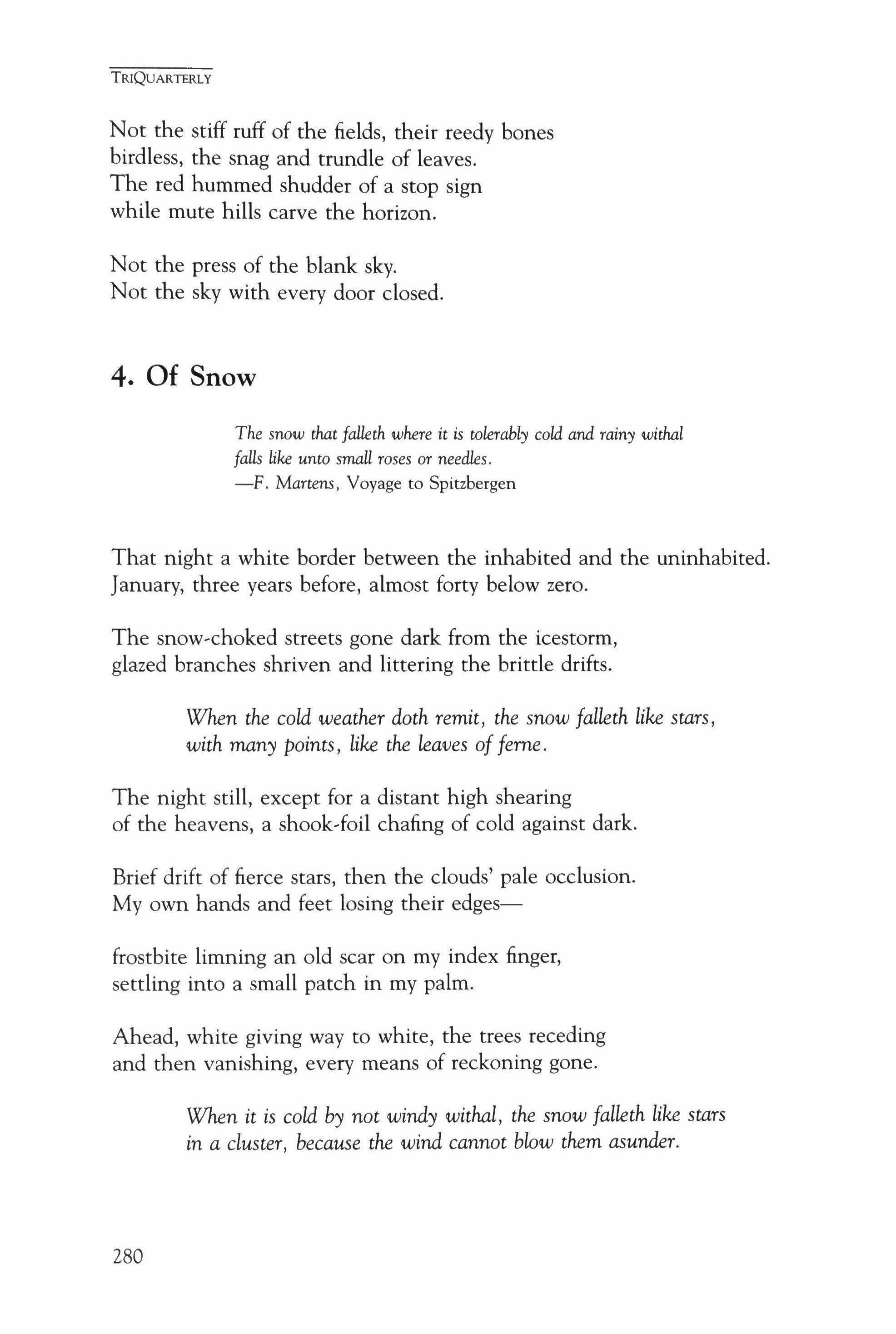
Not the stiff ruff of the fields, their reedy bones birdless, the snag and trundle of leaves. The red hummed shudder of a stop sign while mute hills carve the horizon.
Not the press of the blank sky. Not the sky with every door closed.
The snow that falleth where it is tolerably cold and rainy withal falls like unto small roses or needles.
-F. Martens, Voyage to Spitzbergen
That night a white border between the inhabited and the uninhabited. January, three years before, almost forty below zero.
The snow-choked streets gone dark from the icestorm, glazed branches shriven and littering the brittle drifts.
When the cold weather doth remit, the snow falleth like stars, with many points, like the leaves offeme.
The night still, except for a distant high shearing of the heavens, a shook-foil chafing of cold against dark.
Brief drift of fierce stars, then the clouds' pale occlusion. My own hands and feet losing their edges-
frostbite limning an old scar on my index finger, settling into a small patch in my palm.
Ahead, white giving way to white, the trees receding and then vanishing, every means of reckoning gone.
When it is cold by not windy withal, the snow falleth like stars in a cluster, because the wind cannot blow them asunder.
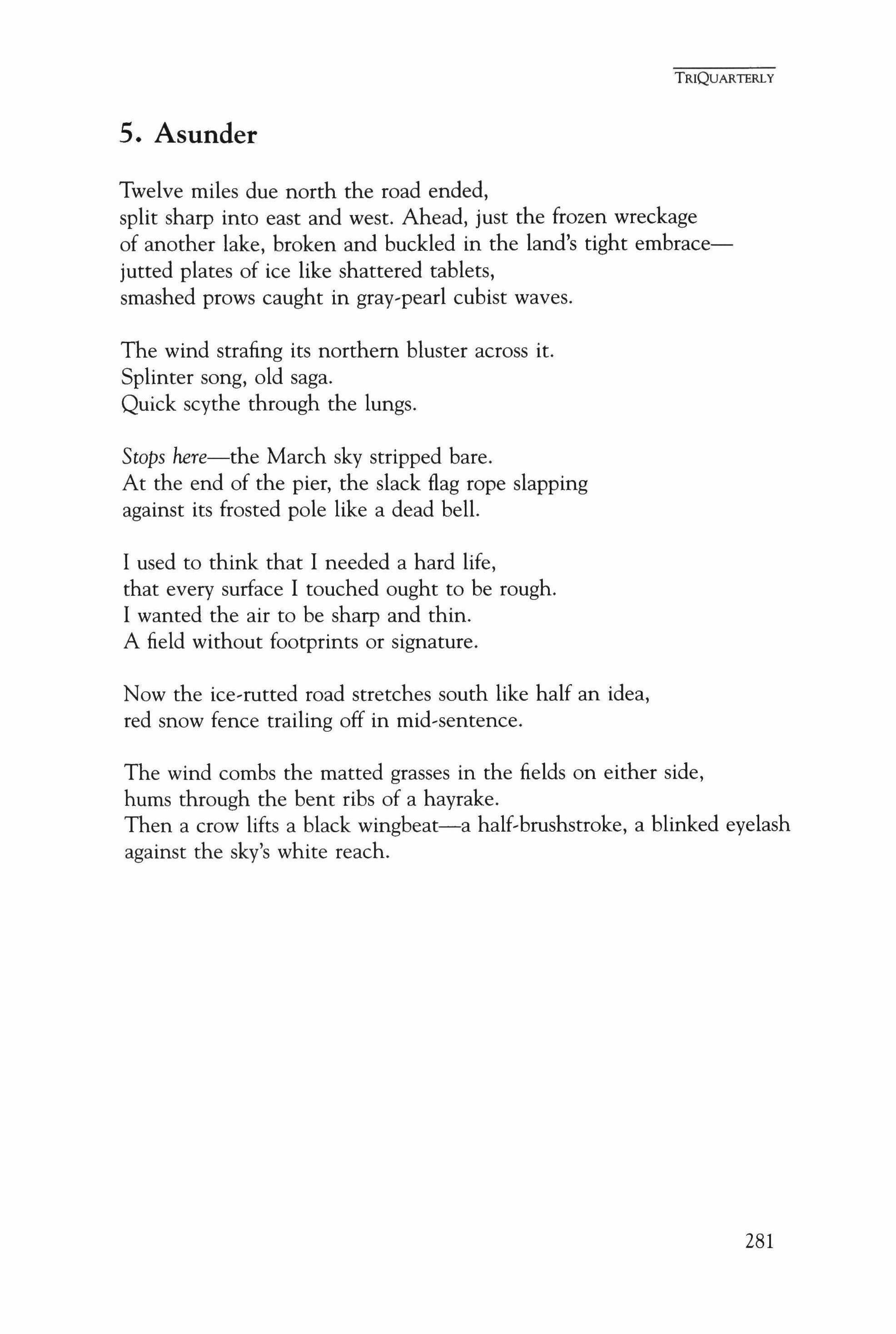
Twelve miles due north the road ended, split sharp into east and west. Ahead, just the frozen wreckage of another lake, broken and buckled in the land's tight embracejutted plates of ice like shattered tablets, smashed prows caught in gray-pearl cubist waves.
The wind strafing its northern bluster across it. Splinter song, old saga. Quick scythe through the lungs.
Stops here-the March sky stripped bare. At the end of the pier, the slack flag rope slapping against its frosted pole like a dead bell.
I used to think that I needed a hard life, that every surface I touched ought to be rough. I wanted the air to be sharp and thin. A field without footprints or signature.
Now the ice-rutted road stretches south like half an idea, red snow fence trailing off in mid-sentence.
The wind combs the matted grasses in the fields on either side, hums through the bent ribs of a hayrake. Then a crow lifts a black wingbeat-a half-brushstroke, a blinked eyelash against the sky's white reach.

even in this dark country we say Dasa darkone go to hell straight to we say varna color aura caste can't agree on codifications we sing lightskin light up my lucky sky fairskin fortune Bentley bright my Rolls
look the apple-cheeked Kashmiri passes in a white club or look the darkness of the darkest member broad-nosed Dasa once a metropole's guard tee-time early to get him off the course first yet you're darker than he Krishna even a God can't explain what skin is
sometimes I think Britishers hated their own pallor feared us I hid in my body sinuous on peat tealeaves peppercorn cinnamon other worldly macadam macabre music of my drum your blueness
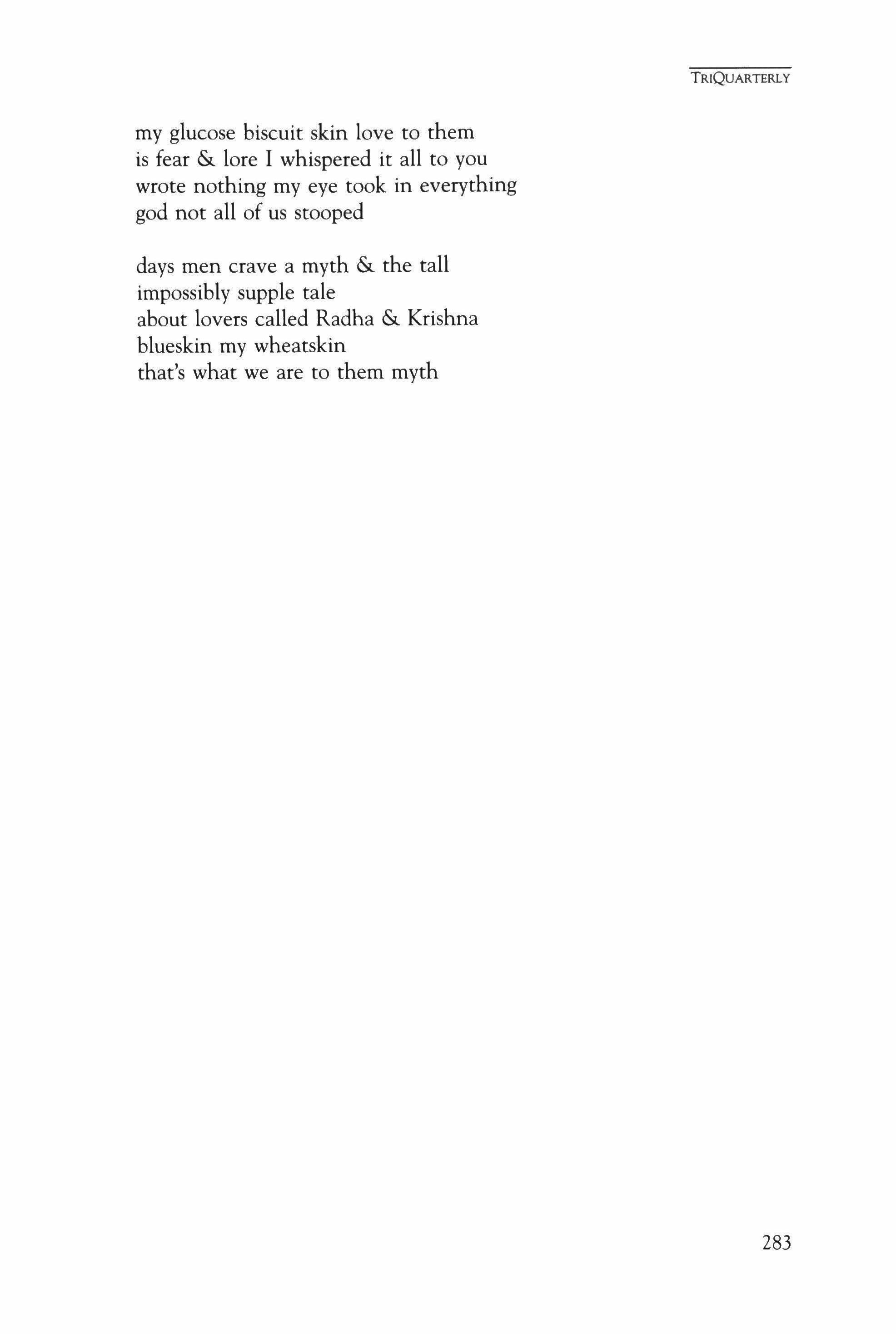
my glucose biscuit skin love to them is fear & lore I whispered it all to you wrote nothing my eye took in everything god not all of us stooped
days men crave a myth & the tall impossibly supple tale about lovers called Radha & Krishna blueskin my wheatskin that's what we are to them myth
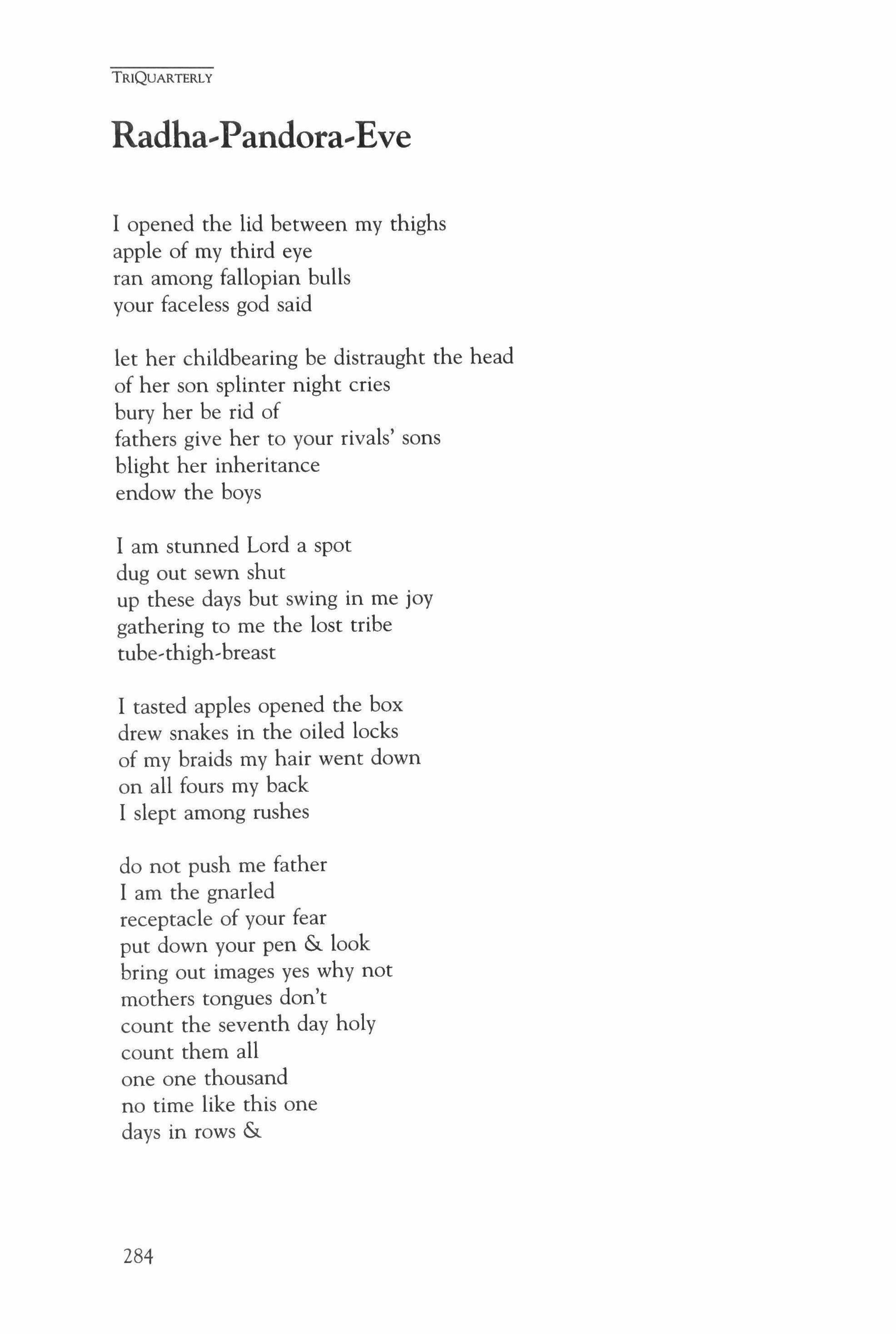
I opened the lid between my thighs apple of my third eye ran among fallopian bulls your faceless god said
let her childbearing be distraught the head of her son splinter night cries bury her be rid of fathers give her to your rivals' sons blight her inheritance endow the boys
I am stunned Lord a spot dug out sewn shut up these days but swing in me joy gathering to me the lost tribe tube-thigh-breast
I tasted apples opened the box drew snakes in the oiled locks of my braids my hair went down on all fours my back I slept among rushes
do not push me father I am the gnarled receptacle of your fear put down your pen & look bring out images yes why not mothers tongues don't count the seventh day holy count them all one one thousand no time like this one days in rows &

trees phalanxes of guns passing through my circuitry the chill automobile metal digital conversations & cash won't change this coming out of me roses

yes never mind the flickering lamp I am lying on my side & you who's known all breathing patterns who's finished meditating on this earth forever forgoing desire descend to my room for the last time
white elephant entering my womb unclasping anklets rubies neck upturning water urn my three ladies asleep on black braids enter me slowly like lamplight touch me go on I too soon will know exhalation & leave the earth
nothing will strain me exile nor abduction here I let enter here I left nineteen inches of me red sandstone maya seeta rita radha I've been small a railing medallion on a stupa I called my world
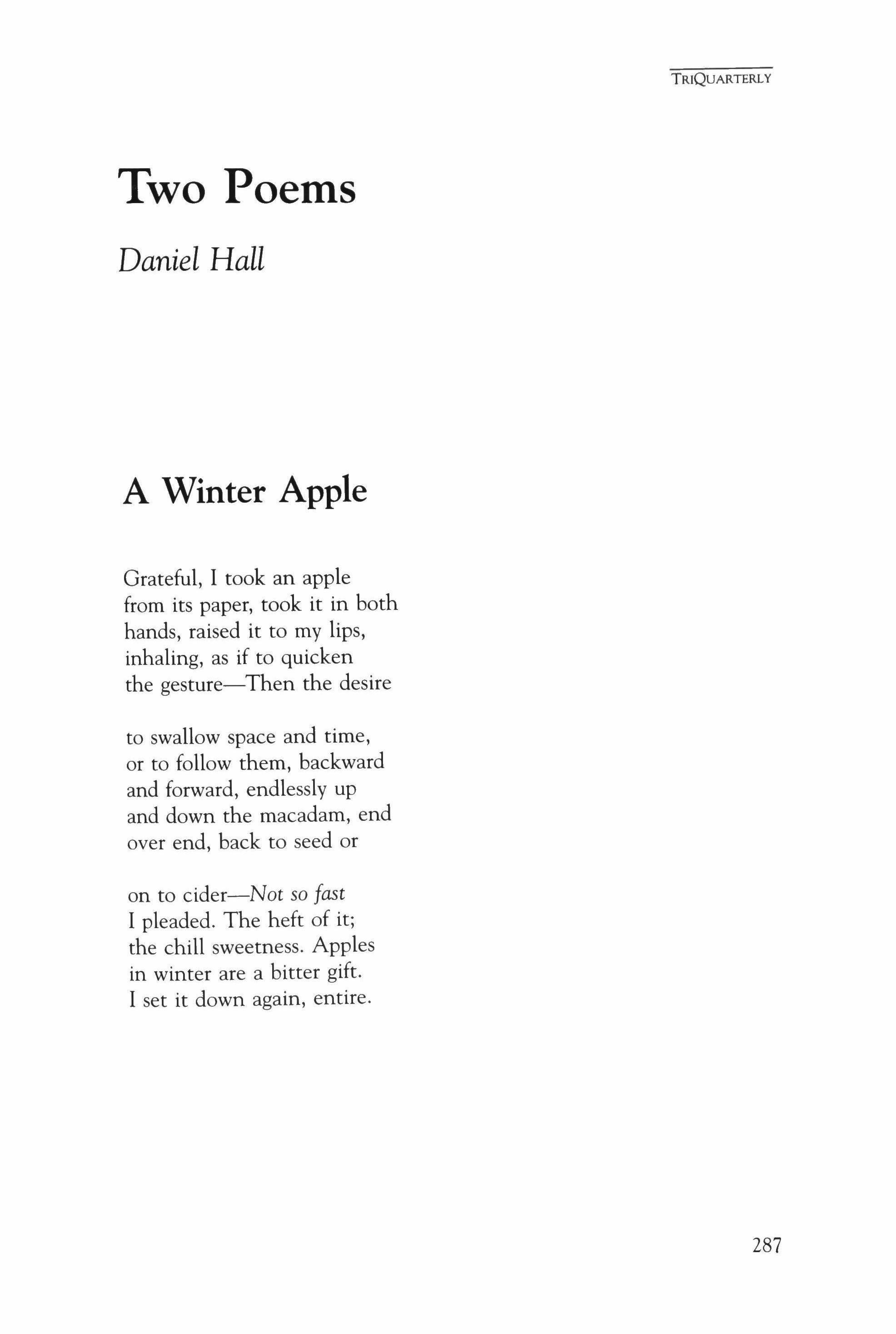
Grateful, I took an apple from its paper, took it in both hands, raised it to my lips, inhaling, as if to quicken the gesture-Then the desire
to swallow space and time, or to follow them, backward and forward, endlessly up and down the macadam, end over end, back to seed or
on to cider-Not so fast I pleaded. The heft of it; the chill sweetness. Apples in winter are a bitter gift. I set it down again, entire.
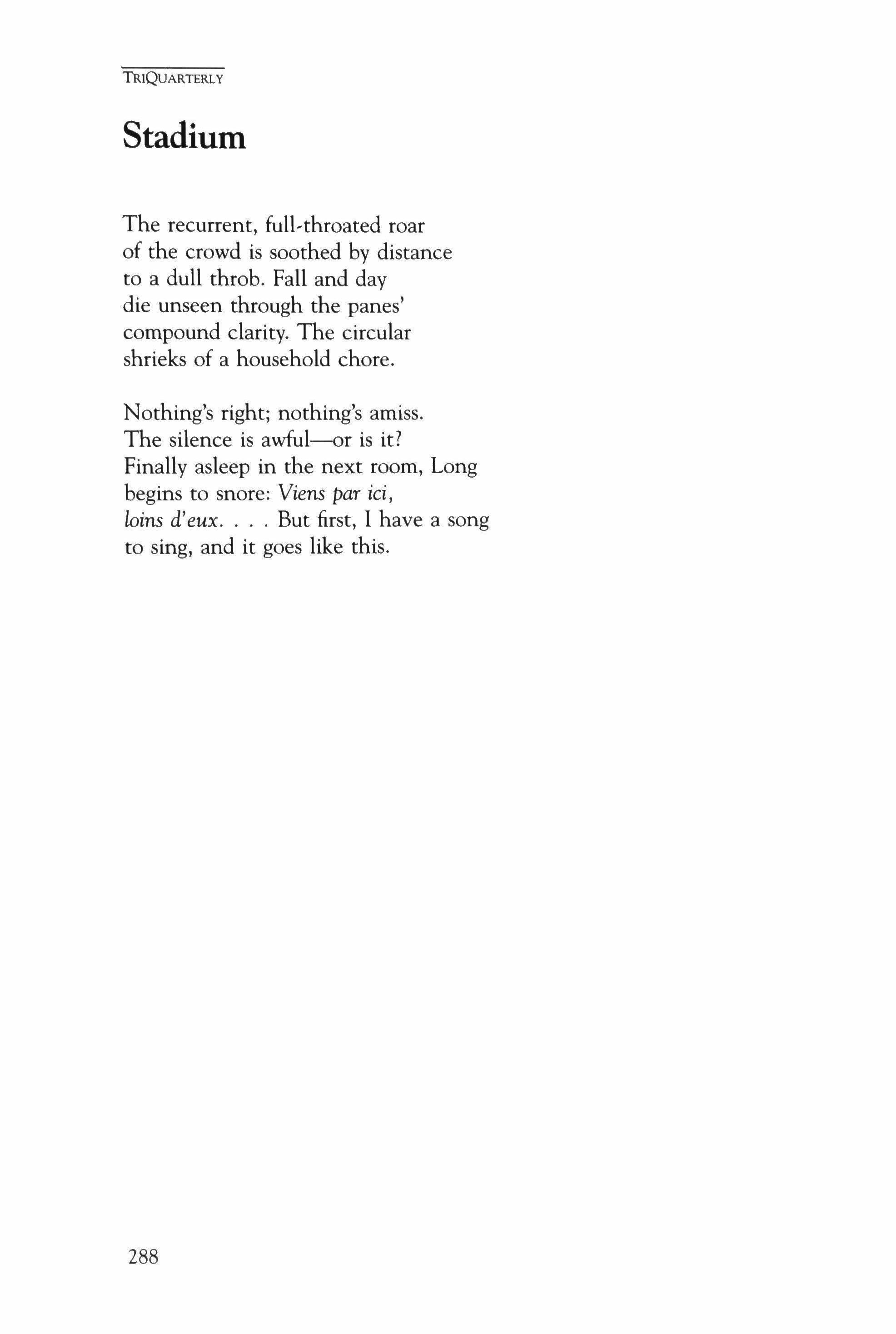
The recurrent, full-throated roar of the crowd is soothed by distance to a dull throb. Fall and day die unseen through the panes' compound clarity. The circular shrieks of a household chore.
Nothing's right; nothing's amiss. The silence is awful-or is it?
Finally asleep in the next room, Long begins to snore: Viens par ici, loins d'eux But first, I have a song to sing, and it goes like this.
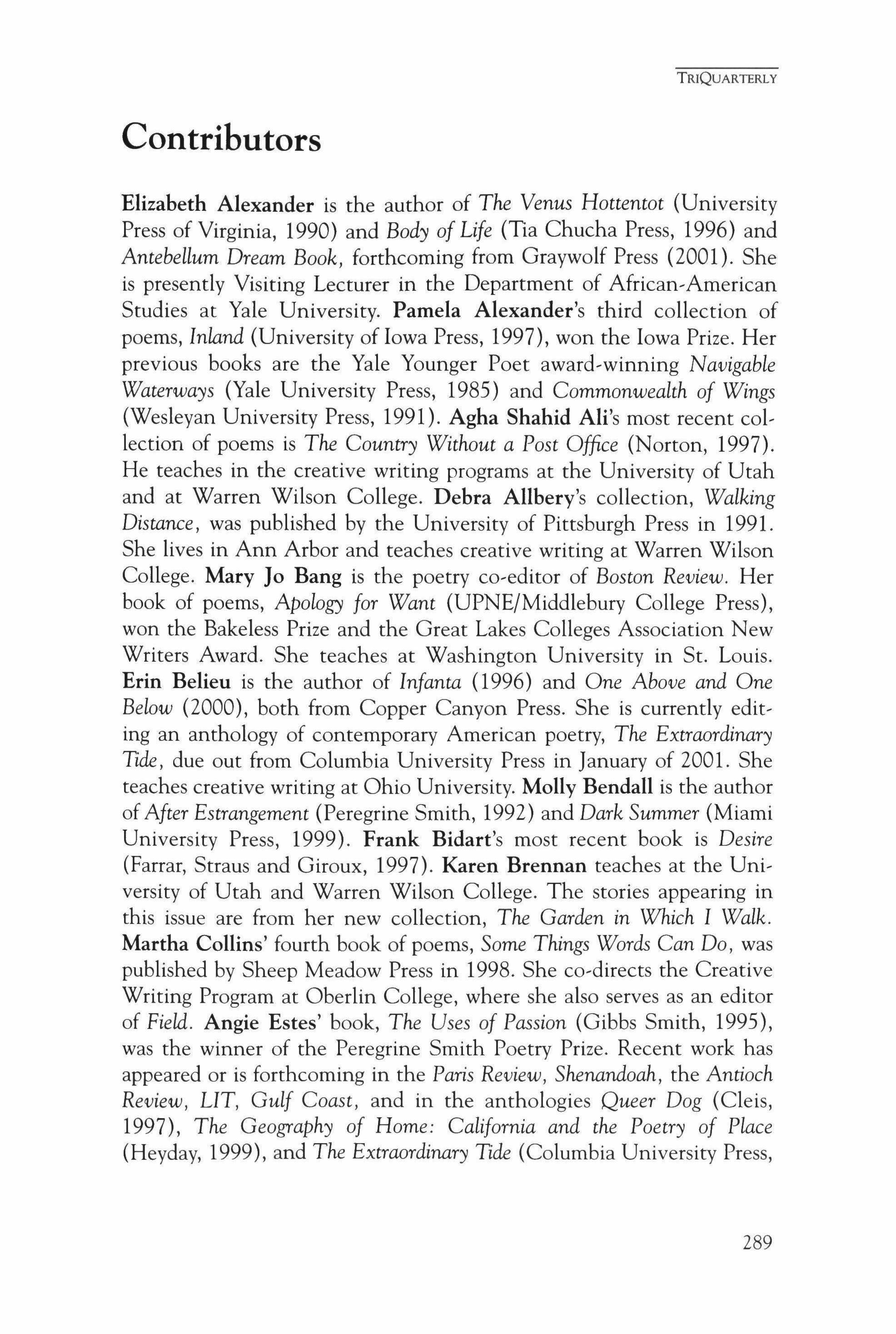
Elizabeth Alexander is the author of The Venus Hottentot (University Press of Virginia, 1990) and Body of Life (Tia Chucha Press, 1996) and Antebellum Dream Book, forthcoming from Graywolf Press (2001). She is presently Visiting Lecturer in the Department of African-American Studies at Yale University. Pamela Alexander's third collection of poems, Inland (University of Iowa Press, 1997), won the Iowa Prize. Her previous books are the Yale Younger Poet award-winning Navigable Waterways (Yale University Press, 1985) and Commonwealth of Wings (Wesleyan University Press, 1991). Agha Shahid Ali's most recent collection of poems is The Country Without a Post Office (Norton, 1997). He teaches in the creative writing programs at the University of Utah and at Warren Wilson College. Debra Allbery's collection, Walking Distance, was published by the University of Pittsburgh Press in 1991. She lives in Ann Arbor and teaches creative writing at Warren Wilson College. Mary jo Bang is the poetry co-editor of Boston Review. Her book of poems, Apology for Want (UPNE/Middlebury College Press), won the Bakeless Prize and the Great Lakes Colleges Association New Writers Award. She teaches at Washington University in St. Louis. Erin Belieu is the author of Infanta (1996) and One Above and One Below (2000), both from Copper Canyon Press. She is currently editing an anthology of contemporary American poetry, The Extraordinary Tule, due out from Columbia University Press in January of 2001. She teaches creative writing at Ohio University. Molly Bendall is the author of After Estrangement (Peregrine Smith, 1992) and Dark Summer (Miami University Press, 1999). Frank Bidart's most recent book is Desire (Farrar, Straus and Giroux, 1997). Karen Brennan teaches at the University of Utah and Warren Wilson College. The stories appearing in this issue are from her new collection, The Garden in Which I Walk. Martha Collins' fourth book of poems, Some Things Words Can Do, was published by Sheep Meadow Press in 1998. She co-directs the Creative Writing Program at Oberlin College, where she also serves as an editor of Field. Angie Estes' book, The Uses of Passion (Gibbs Smith, 1995), was the winner of the Peregrine Smith Poetry Prize. Recent work has appeared or is forthcoming in the Paris Review, Shenandoah, the Antioch Review, LIT, Gulf Coast, and in the anthologies Queer Dog (Cleis, 1997), The Geography of Home: California and the Poetry of Place (Heyday, 1999), and The Extraordinary Tide (Columbia University Press, 289
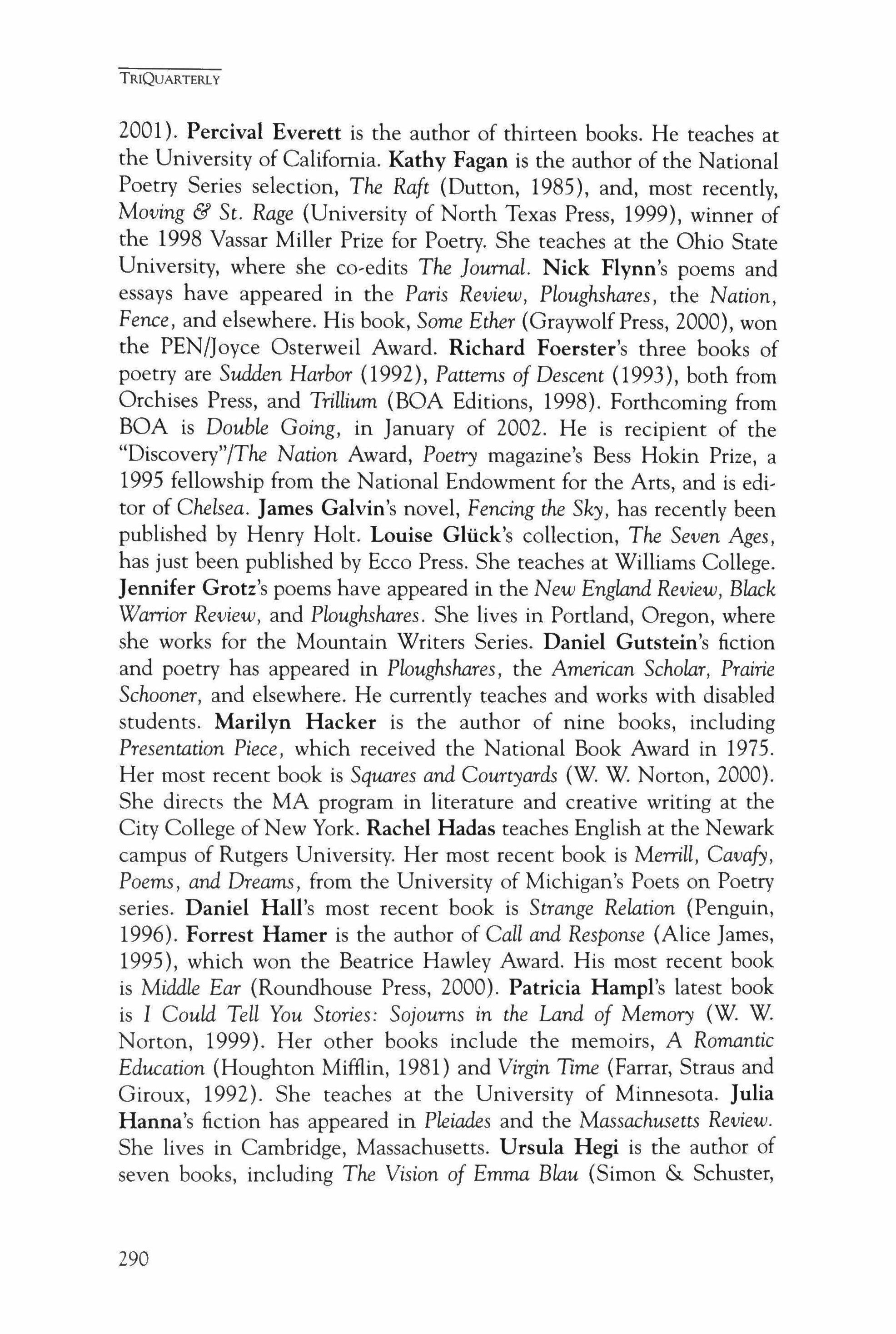
2001). Percival Everett is the author of thirteen books. He teaches at the University of California. Kathy Fagan is the author of the National Poetry Series selection, The Raft (Dutton, 1985), and, most recently, Moving & St. Rage (University of North Texas Press, 1999), winner of the 1998 Vassar Miller Prize for Poetry. She teaches at the Ohio State University, where she co-edits The Journal. Nick Flynn's poems and essays have appeared in the Paris Review, Ploughshares, the Nation, Fence, and elsewhere. His book, Some Ether (GraywolfPress, 2000), won the PENlJoyce Osterweil Award. Richard Foerster's three books of poetry are Sudden Harbor (1992), Patterns of Descent (1993), both from Orchises Press, and Trillium (BOA Editions, 1998). Forthcoming from BOA is Double Going, in January of 2002. He is recipient of the "Discovery"/The Nation Award, Poetry magazine's Bess Hokin Prize, a 1995 fellowship from the National Endowment for the Arts, and is editor of Chelsea. James Galvin's novel, Fencing the Sky, has recently been published by Henry Holt. Louise Gluck's collection, The Seven Ages, has just been published by Ecco Press. She teaches at Williams College. Jennifer Grotz's poems have appeared in the New England Review, Black Warrior Review, and Ploughshares. She lives in Portland, Oregon, where she works for the Mountain Writers Series. Daniel Gutstein's fiction and poetry has appeared in Ploughshares, the American Scholar, Prairie Schooner, and elsewhere. He currently teaches and works with disabled students. Marilyn Hacker is the author of nine books, including Presentation Piece, which received the National Book Award in 1975. Her most recent book is Squares and Courtyards (W. W. Norton, 2000). She directs the MA program in literature and creative writing at the City College ofNew York. Rachel Hadas teaches English at the Newark campus of Rutgers University. Her most recent book is Merrill, Cavafy, Poems, and Dreams, from the University of Michigan's Poets on Poetry series. Daniel Hall's most recent book is Strange Relation (Penguin, 1996). Forrest Hamer is the author of Call and Response (Alice James, 1995), which won the Beatrice Hawley Award. His most recent book is Middle Ear (Roundhouse Press, 2000). Patricia Hampl's latest book is 1 Could Tell You Stories: Sojourns in the Land of Memory (W. W. Norton, 1999). Her other books include the memoirs, A Romantic Education (Houghton Mifflin, 1981) and Virgin Time (Farrar, Straus and Giroux, 1992). She teaches at the University of Minnesota. Julia Hanna's fiction has appeared in Pleiades and the Massachusetts Review. She lives in Cambridge, Massachusetts. Ursula Hegi is the author of seven books, including The Vision of Emma Blau (Simon & Schuster,

2000), Tearing the Silence: Being Gennan in America (Simon & Schuster, 1997), and Stones from the River (Simon & Schuster, 1997). Marshall Klimasewiski's stories have appeared in the New Yorker, the Atlantic, Ploughshares, the Yale Review, and Best American Short Stories. Gail Mazur's collection of poems, Can't Take That Away from Me, is due out from the University of Chicago Press in April of 2001. Among her pre, vious books were The Common (University of Chicago Press, 1995) and The Pose of Happiness (David R. Godine, 1986). She is the Poet,in, Residence at the Emerson College Graduate Writing Program. Kevin McIlvoy's novel, Hyssop, was published by TriQuarterly Books in 1998, and in paperback by Avon/Bard in 1999. He has published stories recently in Chelsea and the Southern Review. He teaches at New Mexico State University, where he is also editor in chief of Puerto del Sol.
J. D. McClatchy's most recent books are a collection of poems Ten Commandments (Knopf, 1998) and a collection of essays, Twenty Ques, tions (Columbia University Press, 1998). He is editor of the Yale Review. Lynne McMahon's most recent book of poems is The House of Enter, taining Science (David R. Godine, 1999). Jane Mead's The Lord and the General Din of the World was published by Sarabande Books in 1996. The recipient of a Whiting Writer's Award and a Completion Grant from the Lannan Foundation, she is Poet-in-Residence at Wake Forest University. Carol Muske-Dukes has published six books of poems, most recently An Octave Above Thunder (Penguin, 1997), and two novels. Her third novel, After Life, will be published by Random House in the Spring of 2001. She is director of the Phd program in Literature and Creative Writing at the University of Southern California. HeidiLynn Nilsson's work has appeared in Agni, Pleiades, and Imperfect Paradise: New Young American Poets. Joe Osterhaus' first collection, "The Domed Road," was published in Take Three: 1 (Graywolf Press, 1996). His poems and reviews have appeared or are forthcoming in Agni, the Antioch Review, the Paris Review, Slate, and elsewhere. Christine Perrin lives in Harrisburg, Pennsylvania, where she teaches poetry at Messiah College. Robert Pinsky's most recent books are Jersey Rain (2000) and The Sounds of Poetry: A Brief Guide (1999), both from Farrar, Straus and Giroux. Kevin Prufer is the author of Strange Wood, winner of the 1997 Wintrop Poetry Series. He is also editor of The New Young American Poets (Southern Illinois University Press, 2000) and Pleiades. His newest poems appear in the Antioch Review, Boulevard, the Southern Review, and elsewhere. Claudia Rankine's third collection, Plot, will be pub, lished by Grove/Atlantic, Spring 2001. She is the author most recently
of The End of the Alphabet (Grove, 1998). Martha Rhodes is the author of two poetry collections: At the Gate (Provincetown Arts Press, 1995) and Perfect Disappearance, winner of the 2000 Green Rose Prize (New Issues Press, 2000). A founding editor and the director of Four Way Books, she teaches at New School University and Emerson College. Hozy Rossi lives in San Francisco. Appointment with Il Duce will be published by Welcome Rain Press in the spring of 2001. Sherod Santos is the author of four books of poetry, most recently Re Pilot Star Elegies (W. W. Norton, 1999). A new collection of essays, A Poetry of Two Minds, was released in the spring by the University of Georgia Press. Grace Schulman's new poetry collection, The Paintings of Our Lives, is forthcoming from Houghton Mifflin in February, 2001. Her other books of poems include From That Day Only (1994), Hemispheres, both by Sheep Meadow Press, and Bum Down the Icons (Princeton University Press, 1976). Lynn Sharon Schwartz is the author of eleven books, including, most recently, the novel, In the Family Way; An Urban Comedy (1999), and Only Connect?, a collection of essays. Her earlier books include the novel Leaving Brooklyn (Penguin, 1990) and the memoir Ruined by Reading; A Life in Books (Beacon Press, 1997). Evelyn Twitchell is a painter who lives and works in New York City. Reetika Vazirani is the author of White Elephants (Beacon Press, 1996). Poems from a new collection appear in Best American Poetry 2000 and the Pushcart Prize Anthology. She is the Banister Writer�in�Residence at Sweet Briar College. Ellen Bryant Voigt's most recent books are her fifth volume of poems, Kyrie (W. W. Norton, 1995), a National Book Critics Circle Award finalist and the winner of the Teasdale Award, and her collection of craft essays, The Flexible Lyric (University of Georgia Press, 1999). She teaches in the MFA program at Warren Wilson College. Emily Wilson is the proprietor of Spurwink Press in Portland, Maine. Kevin Young's first book, Most Way Home, recently reprinted by Zoland Books, won the National Poetry Series and the Zacharis First Book Prize from Ploughshares. His second collection, To Repel Ghosts, will be published by Zoland Books in 2001. He is associate professor of English and African American Studies at the University of Georgia.
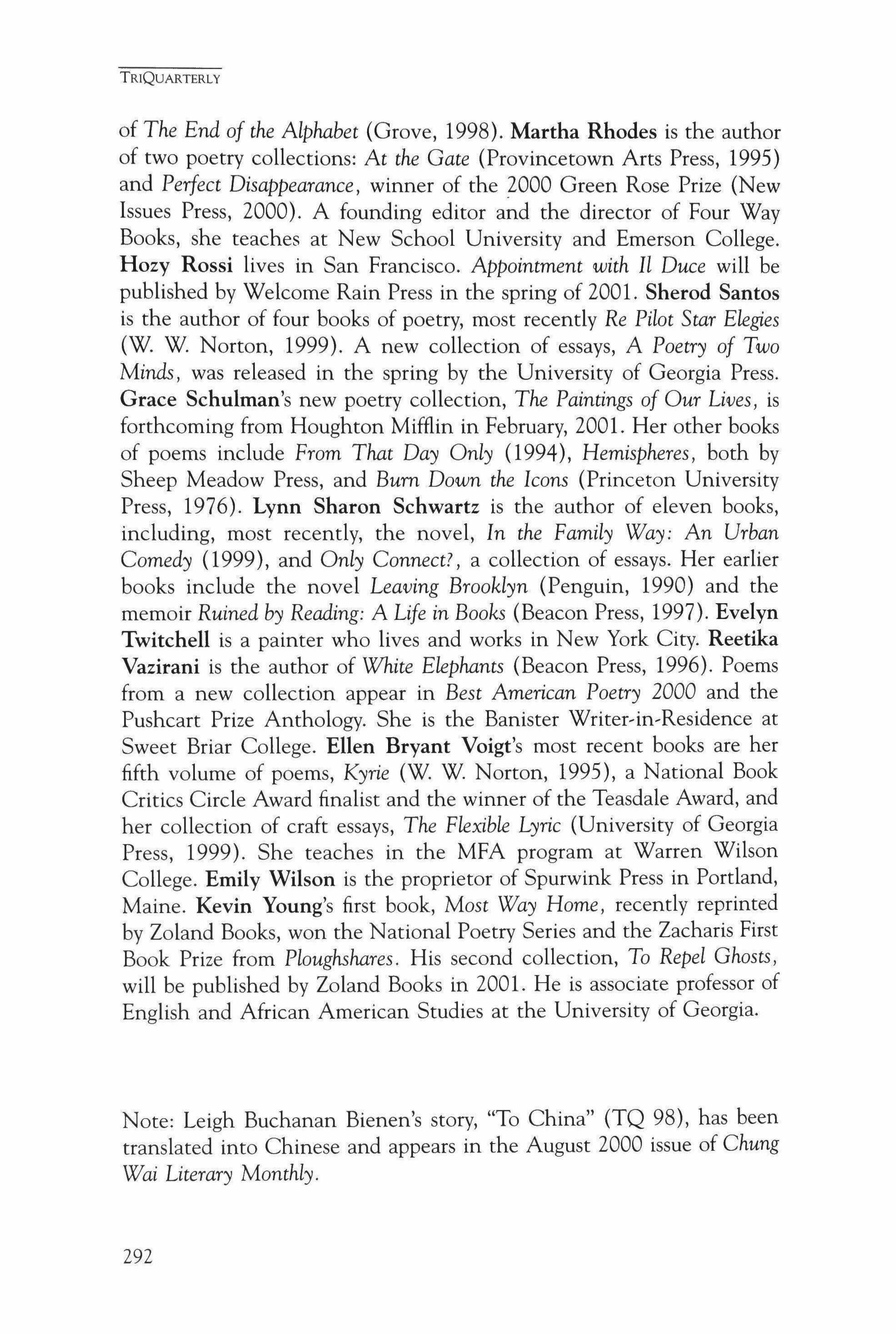
Note: Leigh Buchanan Bienen's story, "To China" (TQ 98), has been translated into Chinese and appears in the August 2000 issue of Chung Wai Literary Monthly.
PRESENTS A SPECIAL ISSUE FOR WINTER 2001
Guest editors
Robert E. Grese and John R. Knott
Essays: Sandra Alcosser on the poetry of earth, Julene Bair on the Mojave Desert and Disneyland, John R. Gillis on the mystique of islands, Linda Hasselstrom on a women writers' retreat in South Dakota, Tom Jenz on the Black Hills Wild Horse Sanctuary, Ted Mclachlan on the prairies and the horizon, Shirley Neuman on Canadian landscape and women's writing, Kent C. Ryden on "crossing the line into nature", Gary Snyder on alien intrusions, John Tallmadge on native and alien species, Yi-Fu Tan on falling in love with the desert, Rinda West on Louise �rdrich
Fiction and Poetry: Annie Finch, Paula Friedman, John Glowney, Dolores Hayden, Elizabeth Holmes, Susan lasher, Walt McDonald, Paula Nangle, Mary Oliver, Amy Spade, Virgil Suarez
Reviews: Richard Francaviglia, Michael Kowalewski, and Randall Roorda survey and evaluate books in the field of environmental studies
Graphic works: Alex Maclean contributes a color portfolio of new photographs, with a preface
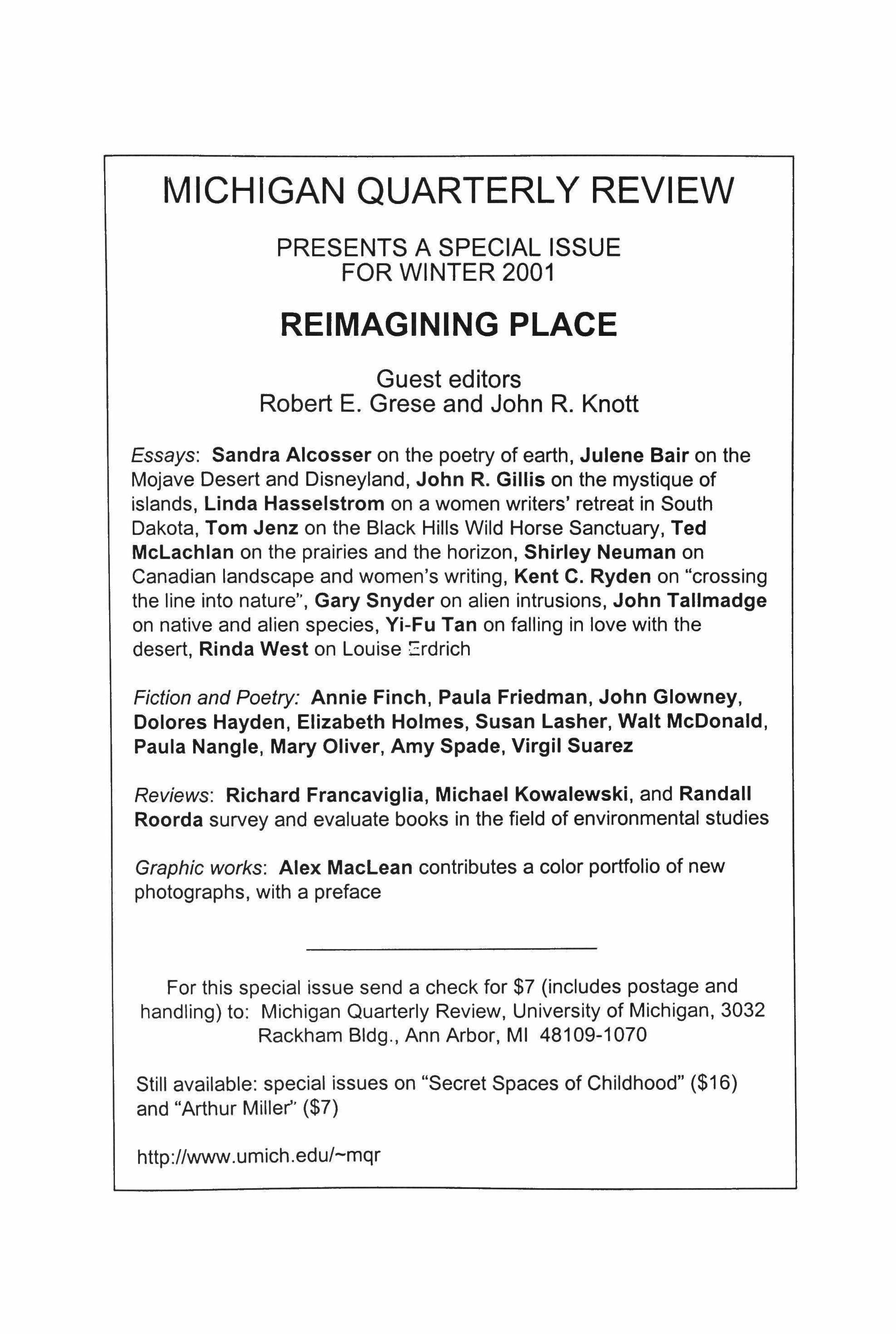
For this special issue send a check for $7 (includes postage and handling) to: Michigan Quarterly Review, University of Michigan, 3032 Rackham Bldg., Ann Arbor, MI 48109-1070
Still available: special issues on "Secret Spaces of Childhood" ($16) and "Arthur Miller" ($7)
http://www.umich.edu/-mqr
This is Stephen Dixon's first written novel and his most seminal work. Readers of Dixon's work will not be disappointed.
ThIS is the novel where all my work sprung from. - Stephen Dixon
ISBN: 1-888996-19-6
184 pages * tradepaper
Send $14.95 + $3.00 S&H

Red Hen Press .. P.O. Box 902587 Palmdale, CA 935902587
Red Hen Press titles are available from Valentine Publisin Grou and Baker & Ta lor
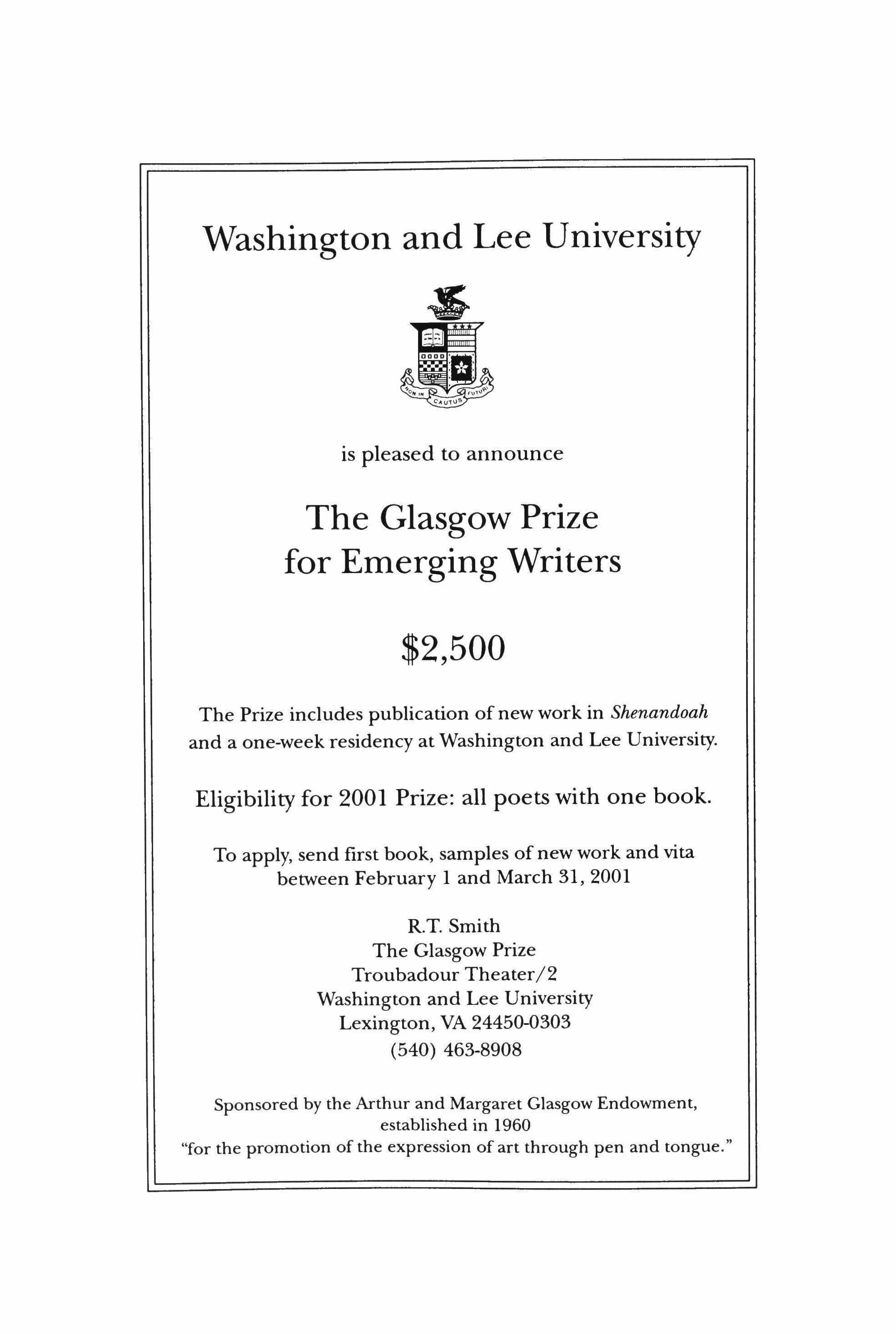
is pleased to announce
$2,500
The Prize includes publication of new work in Shenandoah and a one-week residency at Washington and Lee University.
Eligibility for 2001 Prize: all poets with one book.
To apply, send first book, samples of new work and vita between February 1 and March 31, 2001
R.T. SmithThe Glasgow Prize Troubadour Theater/2 Washington and Lee University Lexington, VA 24450-0303 (540) 463-8908
Sponsored by the Arthur and Margaret Glasgow Endowment, established in 1960 "for the promotion of the expression of art through pen and tongue."

Ourprogram, one of the oldest and most prestigious in the nation, is small (no more than a dozen students admitted in any genre, with all workshops limited to twelve members); very intensive (the Master's degree is ordinarily awarded after the academic year of eight courses); and highly competitive (normally sixteen students apply for each spot in fiction and poetry). We are best known for the quality of our graduate workshops. All of these are held in the same small room, which allows through its dusty windows a glimpse of the Charles River. Perhaps the most remarkable such workshop occurred when Sylvia Plath,Anne Sexton, and George Starbuck gathered for instruction by Robert Lowell--gathered, by the way, less often in that little room than at the Ritz Bar. These days, the poetry workshops are run by our regular faculty of Poet Laureate Robert Pinsky and Nobel Laureate DerekWalcott, who also conducts the playwriting workshops, and those in fiction are led by Leslie Epstein, Ralph Lombreglia, Susanna Kaysen, and the newest addition to our permanent faculty, Ha Jin. Of course our students have about them the resources of a great university.That means they often take courses with a superb faculty in literature that includes, besides the poets Geoffrey Hill and RosannaWarren, the scholar Christopher Ricks and Boston University's two other Nobel Prize winners, Saul Bellow and Elie Wiesel. It is difficult to know how best to measure a student's success, or the worth of a program to a writer; we can say that our graduates in each genre have accomplished a good deal. Over the last few years our playwrights have been awarded the ABC National Playwriting Prize, the Charles MacArthur Award for Comedy, the Heideman Award, first prize in both the 21st Century Playwrights' Festival and the Baltimore Playwrights' Festival, and productions with Naked Angels and the Manhattan Class Co. Quite recently our graduates in poetry have won the $30,000WhitingAward, the Barnard New Women Poets Series, a grant from the NEA, and the Norma Farber First Book Award from the Poetry Society of America; there have been three winners in three years of the Discovery/The Nation Award, and two winners of the National Poetry Series. In fiction, our students have also won the Whiting Award, along with an inordinate share of the nationwide Henfield Awards. In 1999 our writers swept every major literary award in the country, with Ha Jin winning the National Book Award and the PEN/Faulkner, and Jhumpa Lahiri the PEN/Hemingway and the Pulitzer Prize. Not a year goes by without a graduate of our program bringing out a book with a major publisher, and some, like Sue Miller and Arthur Golden, spend a good deal of time on best-seller lists. Over the last decade we have placed more than a dozen of our graduates in tenure-track positions at major American universities. We make, of course, no such assurances. Our only promise, to those who join us, is of a fair amount of time in that river-view room, time shared with other writers in a common, most difficult pursuit: the perfection of one's craft. For more information about the program, visiting writers, and financial aid (our teaching fellows conduct undergraduate creative writing classes), write to Director, Creative Writing Program, Boston University, 236 Bay State Road, Boston, MA 02215 or visit our Web site at www.bu.edu/writing/.
Boston University is an equal opportunity, affirmative action institution

